•
Eleanor Wilner ON MEDUSA and W. S. Di Piero ON WRITING

FICTION AND POETRY BY
Alberto Savini
Janet Kauffman
Margot Livesey
Joyce Carol Oates
Attilio Bertolucci
Sterling Plumpp
Josephine Jacobsen and others
PLUS A NOVELLA BY Amy Godine
POEMS, TRANSLATIONS AND ART BY
Charles Tomlinson
AND MORE
• • •
• • •
• • •
Publication of TTiQuaTteTly is made possible in part by the donors of gifts and grants to the magazine. For their recent and continuing support, we are very pleased to thank the Illinois Arts Council, the Lannan Foundation, the National Endowment for the Arts, the Sara Lee Foundation, the Wendling Foundation, and individual donors. Major new marketing initiatives at TTiQuaTteTly have been made possible by the Lila Wallace Reader's Digest Literary Publishers Marketing Development Program, funded through a grant to the Council of Literary Magazines and Presses.

NOTE: TTiQuaTteTly welcomes financial support in the form of donations, bequests and planned gifts. Please write to Reginald Gibbons, editor. Please see the last page and the inside back cover for names of individual donors to TTiQuaTteTly.
Please sign me up for:
o a two-year subscription for $36.
o a one-year subscription for $20.

a
Foreign subscribers please add $5per year.
subscription for $500. o $ enclosed. 0 This is a renewal.
Please begin my subscription with issue#
Please sign me up for:
o
Foreign
Please
TO TRIQUARTERLY!
SUBSCRIBE
Name Address Or call US toll-free at 800-832·3615 to charge it! BI88
o
life
TRIQUARTERLY!
SUBSCRIBE TO
a two-year subscription for $36.
o a one-year subscription for $20.
subscribers please add $5per year.
Name Address Or call US toll-free at 800·832·3615 to charge it! BI88 GIVE TRIQUARTERLY! 0$ enclosed. Buy your first TriQuarterly gift subscription for $20, and each additional gift subscription costs only $17!! Name Name Address Gift-card message Address 2nd gift subscription ($17) 1st gift subscription ($20) Name Address Gift-card message Add $5/year for foreign subscriptions.BG88
begin my subscription with issue# o a life subscription for $500. o $._____ enclosed. 0 This is a renewal.
TriQuarterly
NORTHWESTERN UNIVERSITY
2020 RIDGE AVE.
EVANSTON, IL 60208-4302

TriQuarterly
NORTHWESTERN UNIVERSITY
2020 RI DGE AVE.
EVANSTON, IL 60208-4302
TriQuarterly
NORTHWESTERN UNIVERSITY
2020 RIDGE AVE.
EVANSTON, IL 60208-4302

1993 BOOKS and selected backlist
ANGELA JACKSON
Dark Legs and Silk Kisses: The Beatitudes of the Spinners
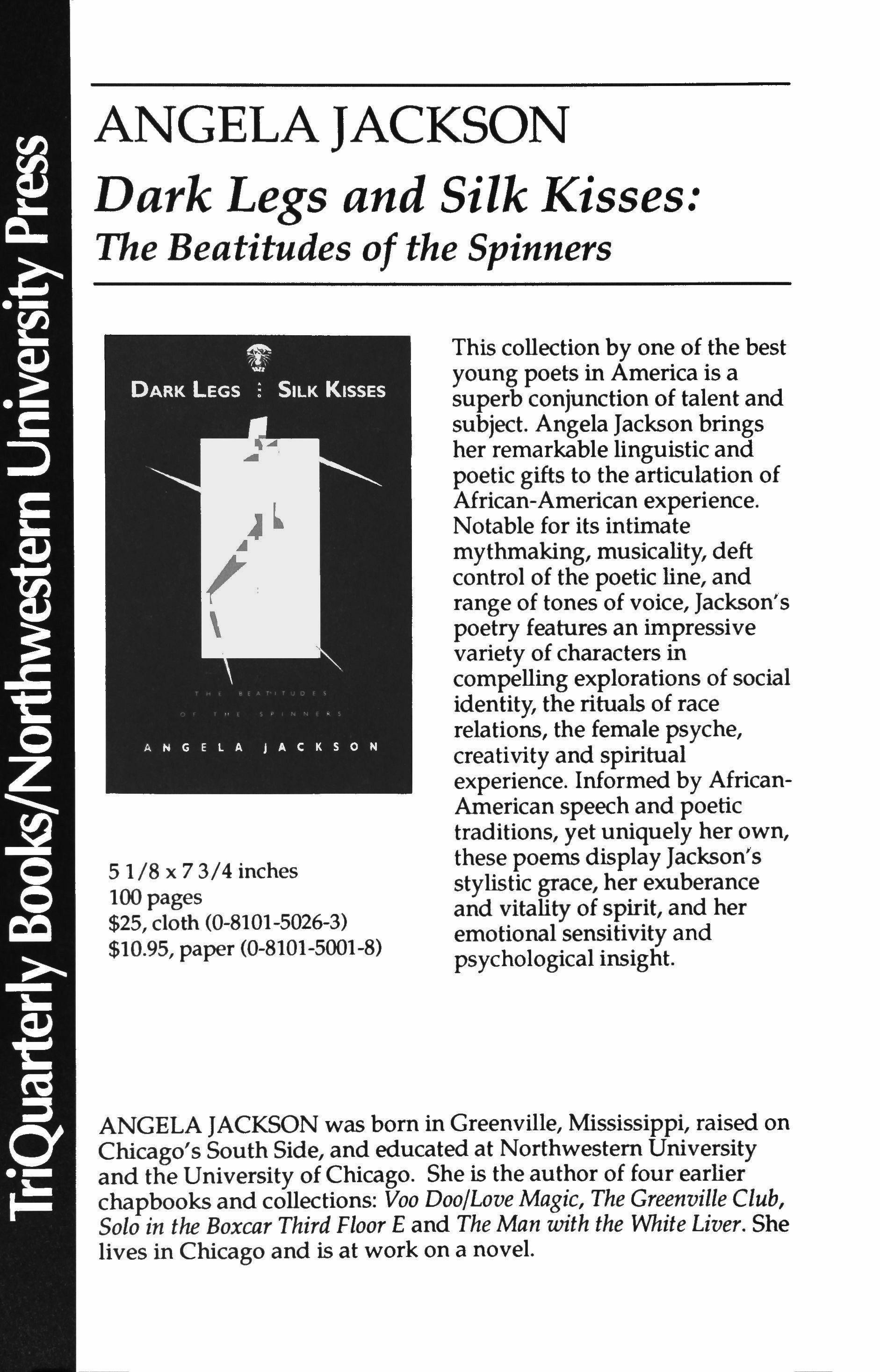
51/8 x 73/4 inches
100 pages
$25, cloth (0-8101-5026-3)
$10.95, paper (0-8101-5001-8)
This collection by one of the best young poets in America is a superb conjunction of talent and subject. Angela Jackson brings her remarkable linguistic and poetic gifts to the articulation of African-American experience. Notable for its intimate mythmaking, musicality, deft control of the poetic line, and range of tones of voice, Jackson's poetry features an impressive variety of characters in compelling explorations of social identity, the rituals of race relations, the female psyche, creativity and spiritual experience. Informed by AfricanAmerican speech and poetic traditions, yet uniquely her own, these poems display Jackson's stylistic grace, her exuberance and vitality of spirit, and her emotional sensitivity and psychological insight.
ANGELA JACKSON was born in Greenville, Mississippi, raised on Chicago's South Side, and educated at Northwestern University and the University of Chicago. She is the author of four earlier chapbooks and collections: Voo Doo/Love Magic, The Greenville Club, Solo in the Boxcar Third Floor E and The Man with the White Liver. She lives in Chicago and is at work on a novel.
TIMOTHY RUSSELL
Adversaria
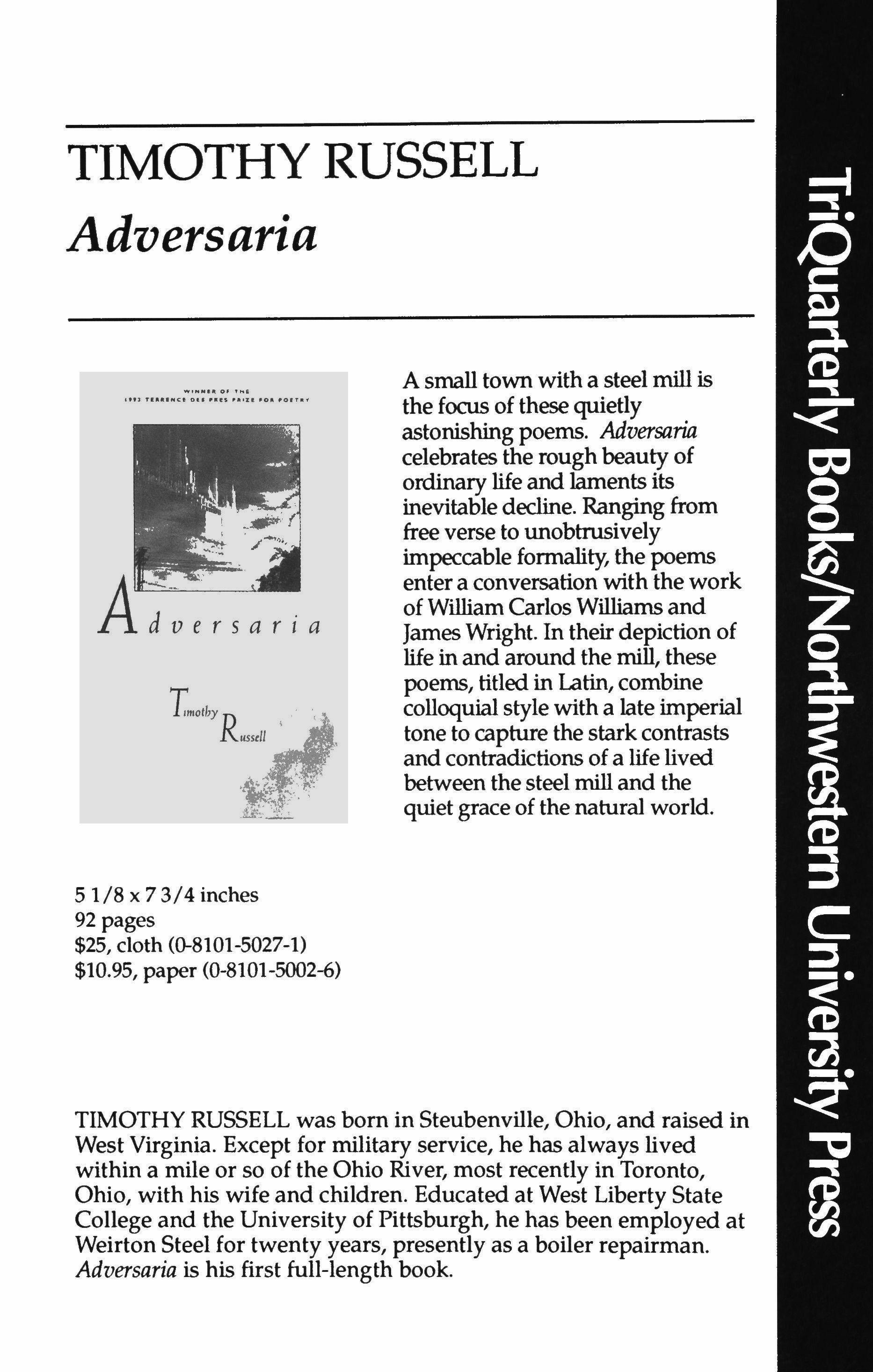
51/8 x 73/4 inches
92 pages
$25, cloth (0-8101-5027-1)
$10.95, paper (0-8101-5002-6)
A small town with a steel mill is the focus of these quietly astonishing poems. Adversaria celebrates the roughbeauty of ordinary life and laments its inevitable decline. Ranging from free verse to unobtrusively impeccable formality, the poems enter a conversation with the work of William Carlos Williams and JamesWright. In their depiction of life in and around the mill, these poems, titled in Latin, combine colloquial style with a late imperial tone to capture the stark contrasts and contradictions of a life lived between the steel mill and the quiet grace of the natural world.
TIMOTHY RUSSELL was born in Steubenville, Ohio, and raised in West Virginia. Except for military service, he has always lived within a mile or so of the Ohio River, most recently in Toronto, Ohio, with his wife and children. Educated at West Liberty State College and the University of Pittsburgh, he has been employed at Weirton Steel for twenty years, presently as a boiler repairman. Adversaria is his first full-length book.
11 Of !til TI 'NCf Ott p.e, "1111:1 '011 'OIT.t
ANNE CALCAGNO Prayfor Yourself
and Other Stories

51/8 x 73/4 inches
136 pages
$26.95, cloth (0-8101-5000-X)
$12.95, paper (0-8101-5003-4)
Wmner of the 1993
James D. Phelan Literary
Award
This exhilaratinglyoriginal first collection of short stories vividly captures the textures of women's lives. Calcagno'sstyle is at once idiomatic and metaphorical: her dramatic situations are extreme, edgy and utterlyconvincing. Calcagno's characters grapple with problemsranging from domestic violence to obsessiveness with body weight and speak with conviction and authority about the complex obstacles in their lives.
Here are nine stories, poignant and almost shy. Anne Calcagno has written not ofthe sexual politics of strife, but ofthe deeperunderstanding oflife's complicated mismatches and inevitable miscalculations. Calcagno has the clean voice and sharp unblinking eye ofa true storyteller.
-Larry Heinemann National Book Award Winner
ANNE CALCAGNO was raised in Rome and lives in Chicago. She is a professor of creative writing at DePaul University. For stories in Prayfor Yourself, she received fellowships from the National Endowment for the Arts and the Illinois Arts Council. Her fiction has appeared in TriQuarterly, North American Review, Denver Quarterly and other literary magazines, as well as the anthologies, Fiction of the Eighties and American Fiction.
c.
ALAN SHAPIRO
In Praise of the Impure: Poetry and the Ethical Imagination
Alan Shapiro is not only a much-lauded poet, but also one of America's most intelligent and clear-headed thinkers about poetry. In Praise ofthe Impure: Poetryand the Ethical Imagination collects his passionate, rigorously argued essays on the situation of poetry in American culture today.
Refreshingly,Shapiro takes an historically and aesthetically comprehensive view of the writing and reading of poetry, grounding the teaching of creative writing in the perspective of the long history of poetic tradition in the West. Suspicious of grand claims of either the excellence or emptiness of contemporarypoetry in America, Shapiro stands against shoddy and loose thinking about poetry and on the side of the most informed poetic practice. This brilliantly reasoned and unusually learned book should be read by any poet who teaches in the United States and by anyone with an interest in contemporary poetry-whether as reader, fellow writer, teacher or student. It will become a benchmark for discussion of contemporary American poetry.
ALAN SHAPIRO is the author of four books of poetry, including Happy Hour, which won the William Carlos Williams Award of the PoetrySociety of America, and Covenant. He teaches at the University of North Carolina, Greensboro, and is the recipient of a Lila Wallace-Reader's Digest Writer's Award.

51/8 x 73/4 inches
104 pages
$39.95, cloth (0-8101-5025-5)
$12.95, paper (0-8101-5028-X)
EVAN ZIMROTH
Dead, Dinner, or Naked
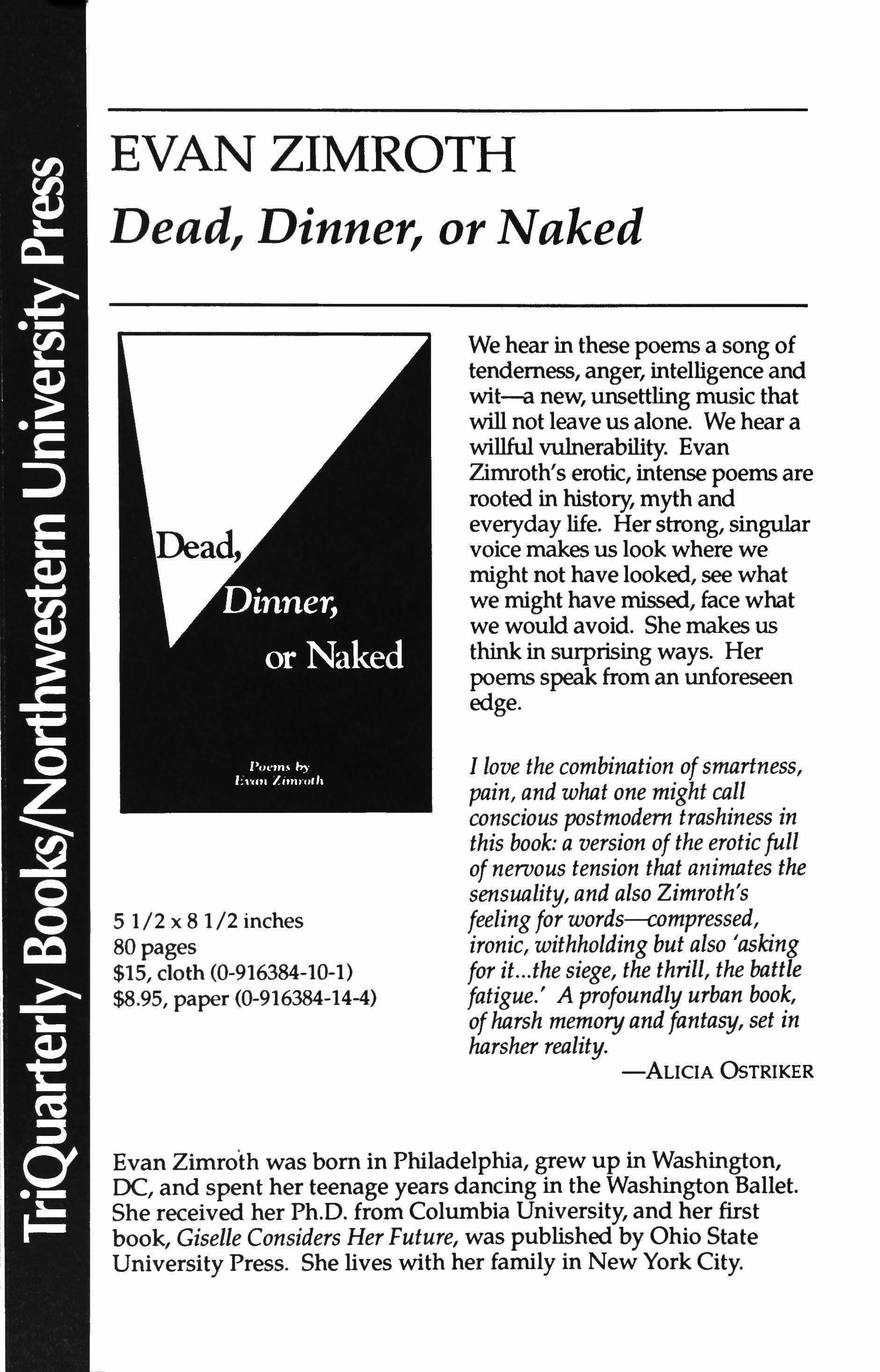
5 1/2 x 81/2 inches
80 pages
$15, cloth (0-916384-10-1)
$8.95, paper (0-916384-14-4)
We hear in these poems a song of tenderness, anger, intelligence and wit-a new, unsettling music that will not leave us alone. We hear a willful vulnerability. Evan Zimroth's erotic, intense poems are rooted in history, myth and everyday life. Her strong, singular voice makes us look where we might not have looked, see what we might have missed, face what we would avoid. She makes us think in surprising ways. Her poems speak from an unforeseen edge.
I love the combination ofsmartness, pain, and what one might call conscious postmodern trashiness in this book: a version of the eroticfull of nervous tension that animates the sensuality, and also Zimroth's feelingforwords-compressed, ironic, withholding but also 'asking for it...the siege, the thrill, the battle fatigue.' A profoundly urban book, ofharsh memory and fantasy, set in harsher reality.
-ALICIA OsTRIKER
Evan Zimroth was born in Philadelphia, grew up in Washington, DC, and spent her teenage years dancing in the Washington Ballet. She received her Ph.D. from Columbia University, and her first book, Giselle Considers Her Future, was published by Ohio State University Press. She lives with her family in New York City.
New Writingfrom Mexico
Edited by Reginald Gibbons
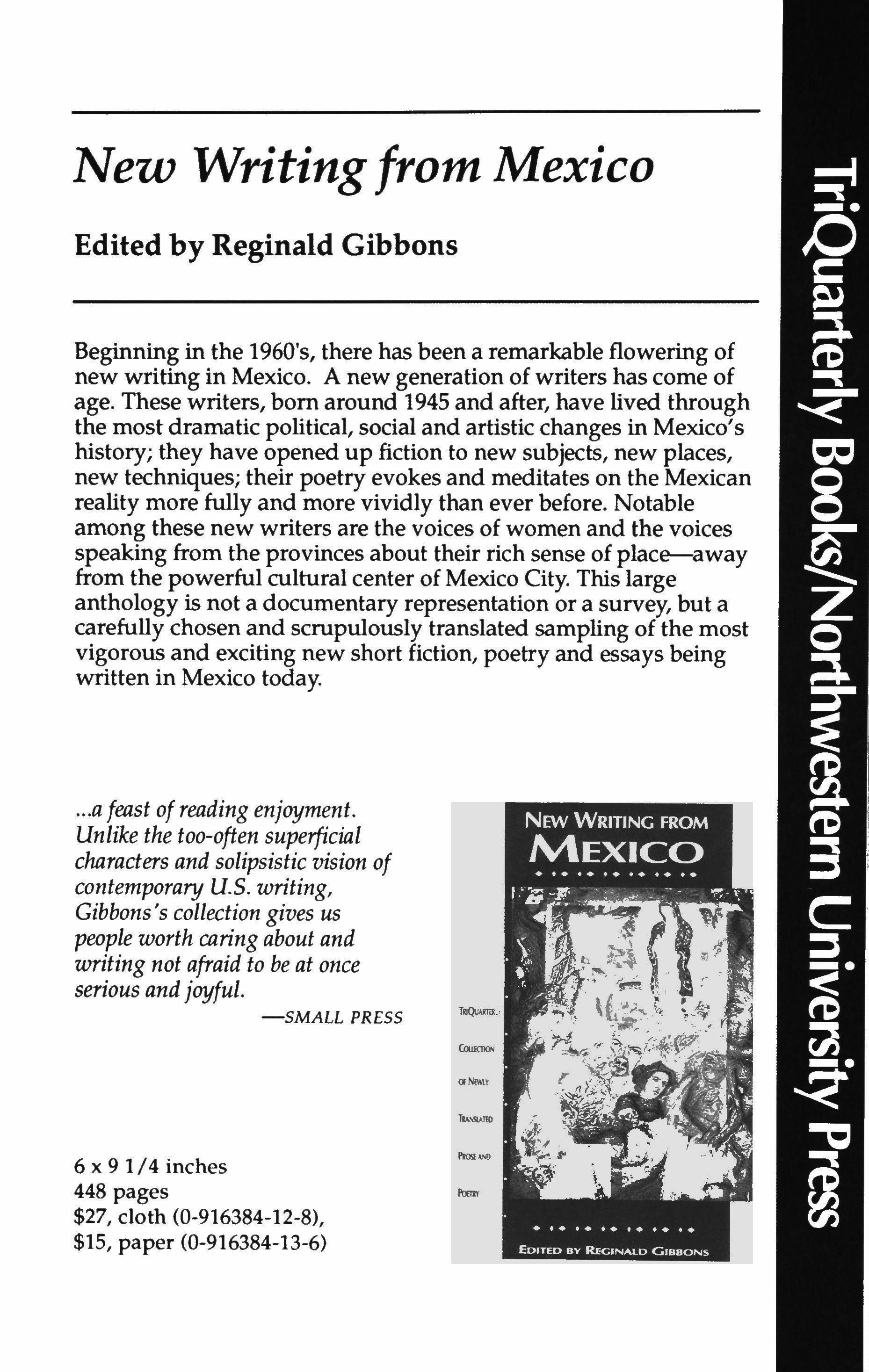
Beginning in the 1960's, there has been a remarkable flowering of new writing in Mexico. A new generation of writers has come of age. These writers, born around 1945 and after, have lived through the most dramatic political, social and artistic changes in Mexico's history; they have opened up fiction to new subjects, new places, new techniques; their poetry evokes and meditates on the Mexican reality more fully and more vividly than ever before. Notable among these new writers are the voices of women and the voices speaking from the provinces about their rich sense of place-away from the powerful cultural center of Mexico City. This large anthology is not a documentary representation or a survey, but a carefully chosen and scrupulously translated sampling of the most vigorous and exciting new short fiction, poetry and essays being written in Mexico today
a feast ofreading enjoyment. Unlike the too-often superficial characters and solipsistic vision of contemporary u.s. writing, Gibbons's collection gives us people worth caring about and writing not afraid to be at once serious and joyful.
-SMALL PRESS
6 x 91/4 inches
448 pages
$27, cloth (O-916384-12-8), $15, paper (O-916384-13-6)
MURIEL RUKEYSER
Out of Silence: Selected Poems
Edited by Kate Daniels
In a recent article, someone defined the deplorable state ofpublishing (and the Republic) by a singlefact: Muriel Rukeyser's poetry was out of print. So this is not just another book: it is a restitution. Muriel Rukeyser held her ground at the bloody crossroads ofpolitics and art; she gave the word "witness" poetic weight. Thefirst of our women poets to enter and engage the Western tradition ofprophetic outrage, she warmed it with the living voices of the injured. And in her activism and generosity, Rukeyser was as good as her word. She said it best: "It is a great thing to hear the words of those who are worthy to speak them."
-ELEANOR WILNER
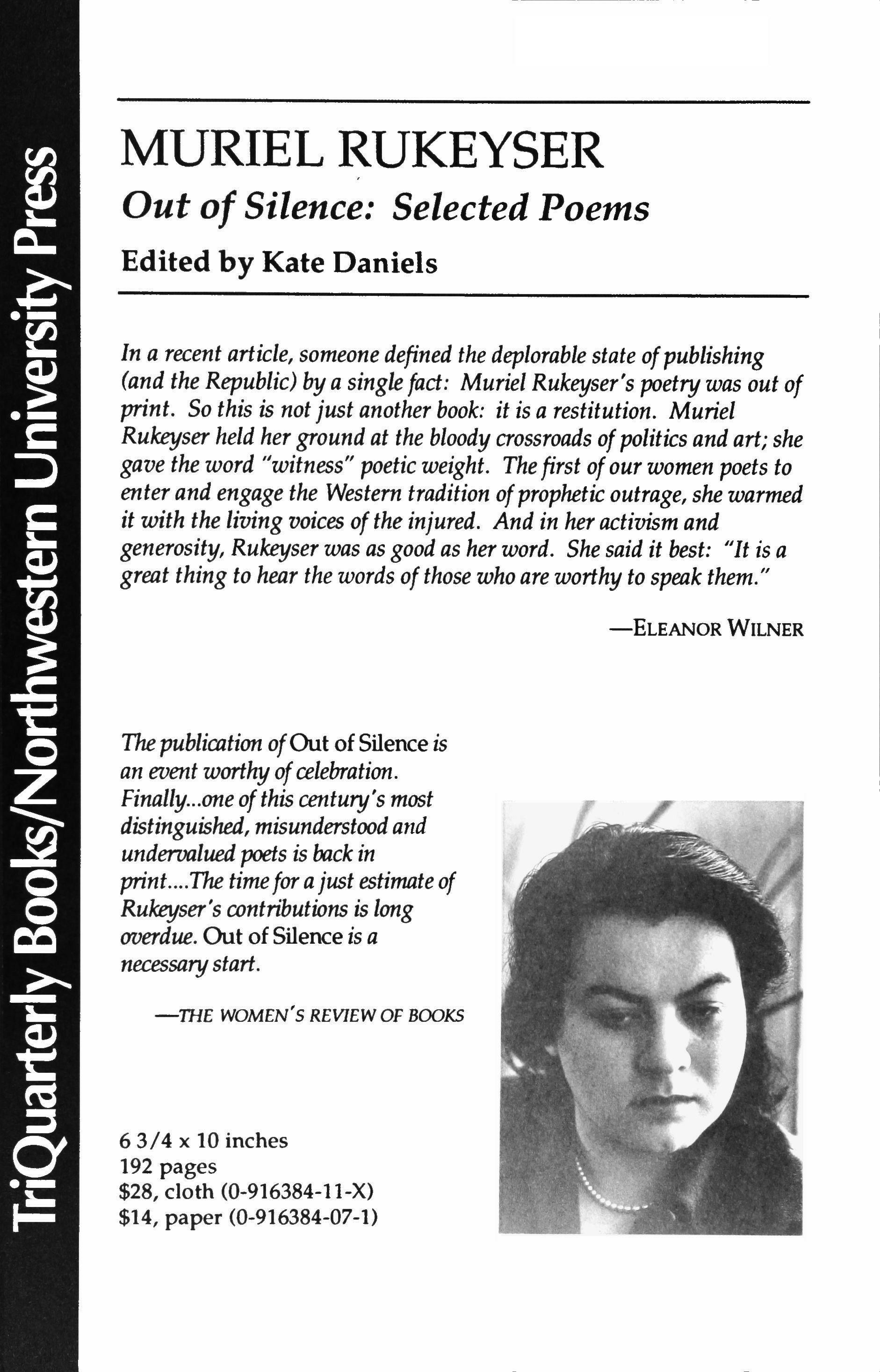
Thepublication ofOut of Silence is an event worthyofcelebration. Finally one ofthis century's most distinguished, misunderstood and undervalued poets is back in print The timefor a just estimate of Rukeyser's contributions is long ooerdue. Out of Silence is a necessary start.
-TIfE WOMEN'S REVIEW OF BOOKS
63/4 x 10 inches
192 pages
$28, cloth (0-916384-11-X)
$14, paper (0-916384-07-1)
BRUCE WEIGL
What Saves Us
In these wrenching, elegant poems Bruce Weigl writes out of uncompromising memory and vision. His subject is both the transport and the anguish of being open to the lived and living moment. He writes of love, sex, violence, and the inhuman crossfire of historical forces. From bars and bedrooms, in Ohio and Nicaragua and Vietnam, his voice rises through the noise of history and habit to reach us with impeccable grace and remarkable invention. The images he discovers do not fade from our minds, and we are grateful for "what saves us" no matter who we are or where we have been.
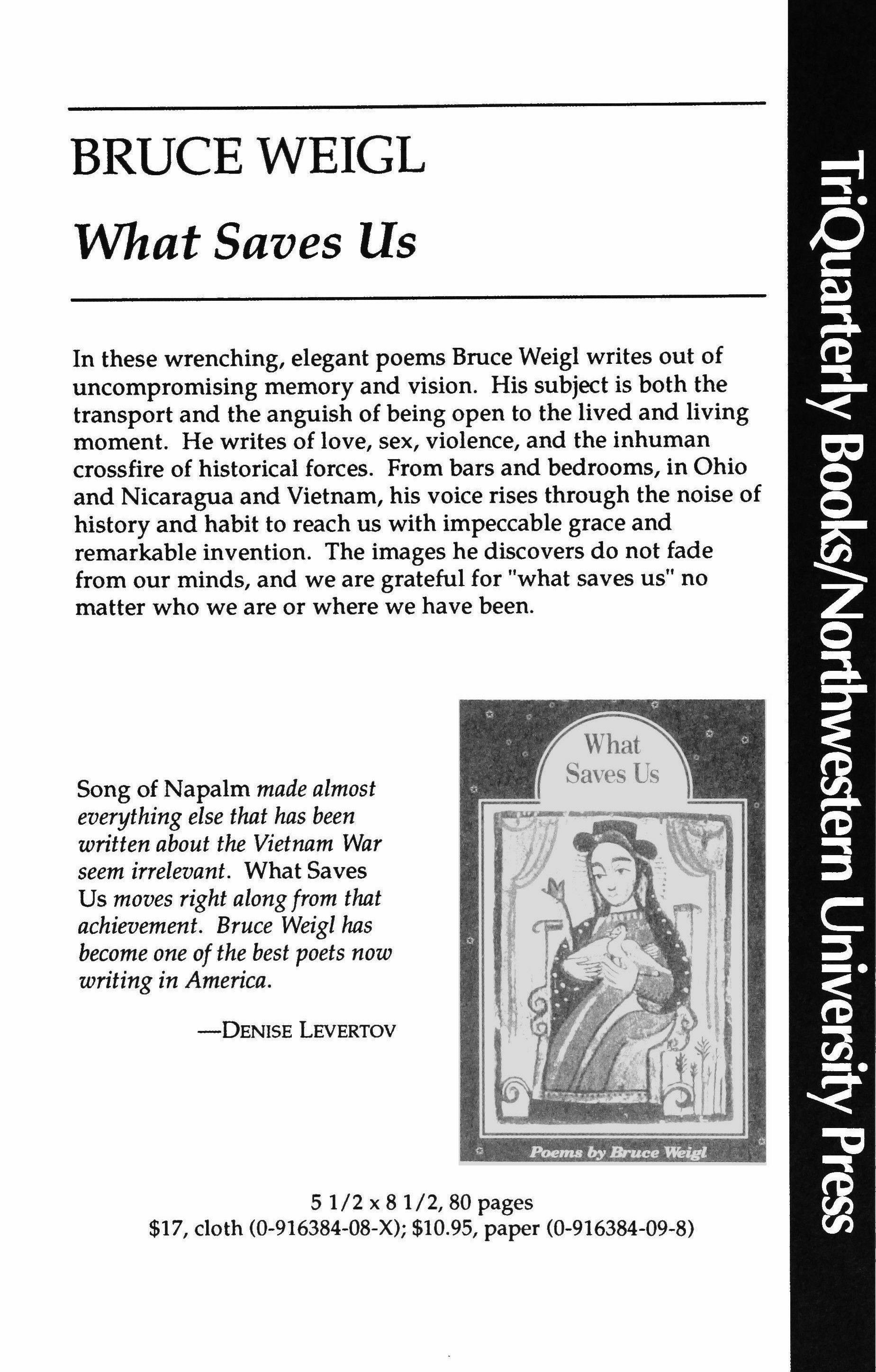
Song of Napalm made almost everything else that has been written about the Vietnam War seem irrelevant. What Saves Us moves right alongfrom that achievement. Bruce Weigl has become one of the best poets now writing in America.
-DENISE LEVERTOV
5 1/2 x 81/2,80 pages $17, cloth (0-916384-08-X); $10.95, paper (0-916384-09-8)
LINDA McCARRISTON Eva-Mary
Winner of the Terrence

Winner of the 1991 Terrence Des Pres Prize for Poetry
NOW IN A TIDRD PRINTING!
An extended poetic meditation on suffering and change, on cruelty and innocence, on love and endurance. Exploring what she calls "acculturation in ignorance," McCarriston writes of parents and children, the natural world and domestic and sexual violence; in so doing she powerfully reshapes her emotional inheritance and creates a passionate form of survival.
Linda McCarriston
51/2 x 81/2 inches
80 pages $10.95, paper (0-929968-26-3)
An immensely moving book,fearless in its passion. Linda McCarriston accomplishes a near miracle, transforming memories of trauma into poems that are luminous and often sacramental, arriving at a hard-won peace.
-LISEL MUELLER
Des Pres Prize for Poetry
Fiction of the Eighties
Edited by Reginald Gibbons and Susan Hahn

A landmark anthology marking the 25th anniversary of TriQuarteriy, this 592-page volume includes 47 of the best short stories to have appeared during the past decade.
Among those represented are Grace Paley, William Goyen, Raymond Carver, Richard Ford, Amy Hempel, Robert Coover, Joyce Carol Oates and many new writers. These stories range widely over the experience of modern life, and share a high level of artistry and an unmistakable atmosphere of the 1980s. An incomparable primer of the contemporary possibilities of fiction.
For contemporaryfiction [Fiction of the Eighties] is a standardbearer The multiplicity and depth of the fictional lives here are astonishing wisdom and wildness of writers too numerous to thank. -PUBLISHERS WEEKLY
6 x 91/4 inches 592 pages
$26.95, cloth (0-916384-05-5)
$16.95, paper (0-916384-06-3)
Stephen Deutch, Photographer: From Paris to Chicago, 1932-1989

The gift book-with stunning photos ofChicago over decades ofchange,including Deutch's Pulitzer-nominated photos from the Daily News. This collectionand analysis of Deutch's work, with plates both in duotone and in color, is the first full record. ofDeutch's achievement to be published.
144 pages $45, cloth (0-929968-05-0) $23.50, paper (0-929968-06-9)
Writers from South Africa
Based on the proceedings of a literary conference hosted by TriQuarterlymagazine and Northwestern University in the autumn of 1987, this collection of speeches and dialoguesby fourteen leading South African writers, poets and intellectuals opens up the world of contemporary South African literary culture to U.S. audiences, outlining such concerns as writing and censorship, worker poetry, the place of poetry in society and many others.
Writers from South Africa
128 pages $6.50, paper (0-916384-03-9)
� Ste � De I Pht li �
CULTURE. POUTICS AND UTERANY THEORY AND ACTNITY IN SOUTH AFRICA TODAY 7�.(Jlw""<'T{tS.·,,,,,,, (",/1 .-", nJCullu�.No 2
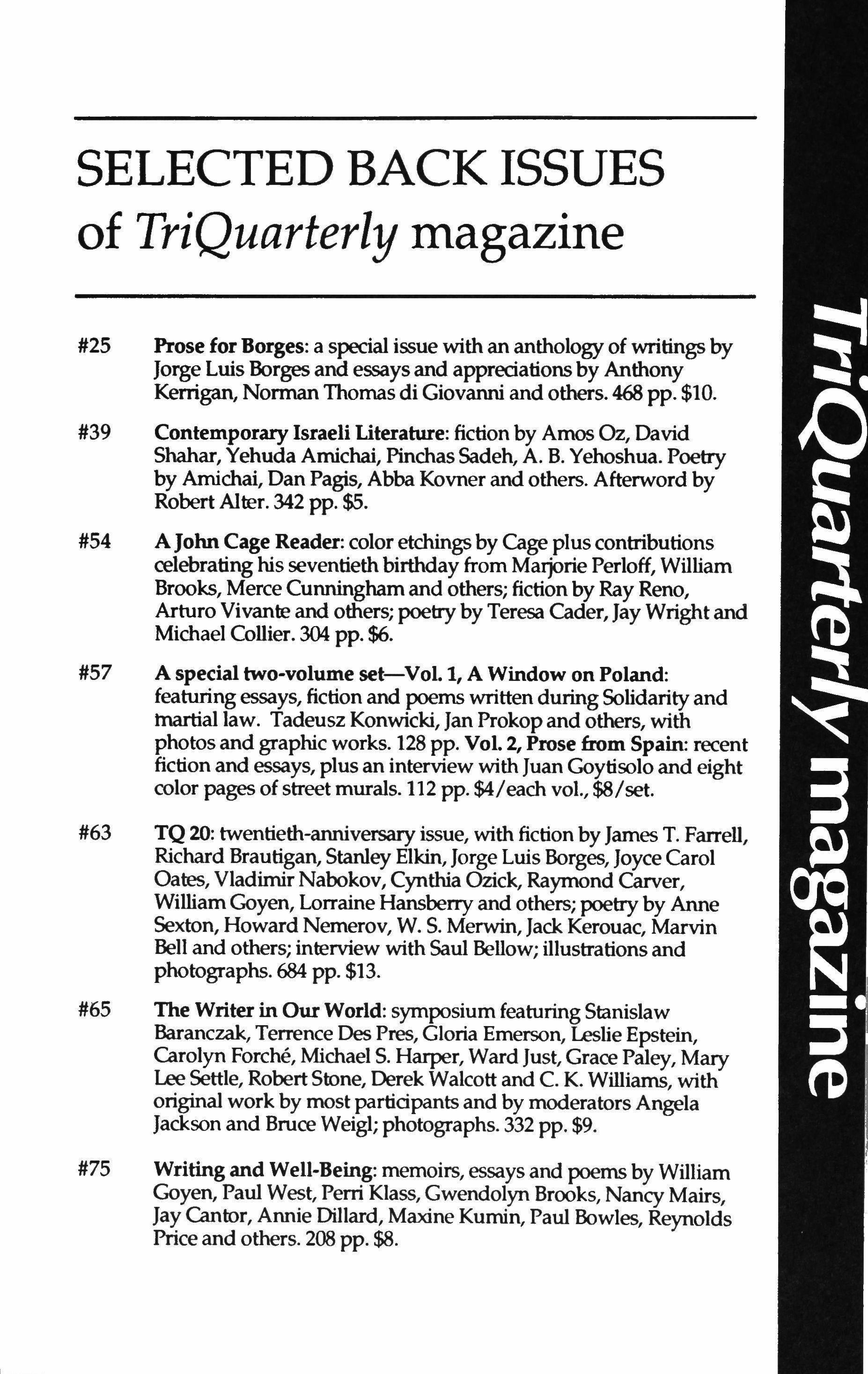
SELECTED BACK ISSUES
of TriQuarterly magazine
#25 Prose for Borges: a special issue with an anthology of writingsby Jorge Luis Borges and essays and appreciationsby Anthony Kerrigan, Norman Thomas di Giovanni and others. 468 pp. $10.
#39 Contemporary Israeli literature: fiction by Amos Oz, David Shahar, Yehuda Amichai, Pinchas Sadeh, A. B. Yehoshua. Poetry by Amichai, Dan Pagis, Abba Kovner and others. Afterword by Robert Alter. 342 pp. $5.
#54 AJohn Cage Reader: color etchingsby Cage plus contributions celebrating his seventieth birthday from Marjorie Perloff, William Brooks, Merce Cunningham and others; fiction by Ray Reno, Arturo Vivante and others; poetry by Teresa Cader, JayWright and Michael Collier. 304 pp. $6.
#57 A special two-volume set-Vol. 1, A Window on Poland: featuring essays, fiction and poems written duringSolidarity and tnartiallaw. Tadeusz Konwicki, Jan Prokop and others, with photos and graphic works. 128 pp. Vol. 2, Prose from Spain: recent fiction and essays, plus an interview with Juan Goytisolo and eight color pages of street murals. 112 pp. $41each vol., $BIsel.
#63 TQ 20: twentieth-anniversary issue, with fiction by James T. Farrell, Richard Brautigan, Stanley Elkin, Jorge Luis Borges, Joyce Carol Oates, Vladimir Nabokov, Cynthia Ozick, Raymond Carver, William Goyen, Lorraine Hansberry and others; poetry by Anne Sexton, Howard Nemerov, W. S. Merwin, Jack Kerouac, Marvin Bell and others; interview with Saul Bellow; illustrations and photographs. 684 pp. $13.
#65 The Writer in Our World: symposium featuring Stanislaw Baranczak, Terrence Des Pres, Gloria Emerson, Leslie Epstein, Carolyn Porche, Michael S. Harper, Ward Just, Grace Paley, Mary Lee Settle, Robert Stone, Derek Walcott and C. K. Williams, with original work by most participants and by moderators Angela Jackson and Bruce Weigl;photographs. 332 pp. $9.
#75 Writing and Well-Being: memoirs, essays and poems by William Goyen, Paul West, Perri Klass, Gwendolyn Brooks, Nancy Mairs, Jay Cantor, Annie Dillard, Maxine Kumin, Paul Bowles, Reynolds Price and others. 208 pp. $B.

ORDERING INFORMATION
TriQuarterly Books/Northwestern University Press
You may order books under the TriQuarterly Books imprint of Northwestern University Press (Jackson, Russell, Calcagno, Shapiro, Zimroth, New Writingfrom Mexico, Rukeyser, Weigl and McCarriston) from:
Northwestern University Press
Chicago Distribution Center 11030 South Langley Avenue
Chicago, IL 60628
Tel. 800/621-2736
Fax 312/660-2235
TriQuarterly Books
You may order remaining TriQuarterly Books titles (Fiction of the Eighties; Stephen Deutch, Photographer and Writers from South Africa) and back issues of the magazine from our editorial office:
TriQuarterly Books
Northwestern University 2020 Ridge Avenue
Evanston,IL 60208-4302
Tel. 800/832-3615
Fax 708/467-2096
Subscriptions to TriQuarterly magazine
TriQuarterly is available to individuals at the following rates: 1
Subscribers may purchase additional giftsubscriptions for only $17/year. Foreign subscribers please add $5 per year. Direct subscription inquiries to our editorial office: TriQuarterly, Northwestern University, 2020 Ridge Avenue, Evanston, IL 602084302, Tel. 800/832-3615, Fax 708/467-2096
year-$20 2 years-$36 Life-$500
Fall 1993
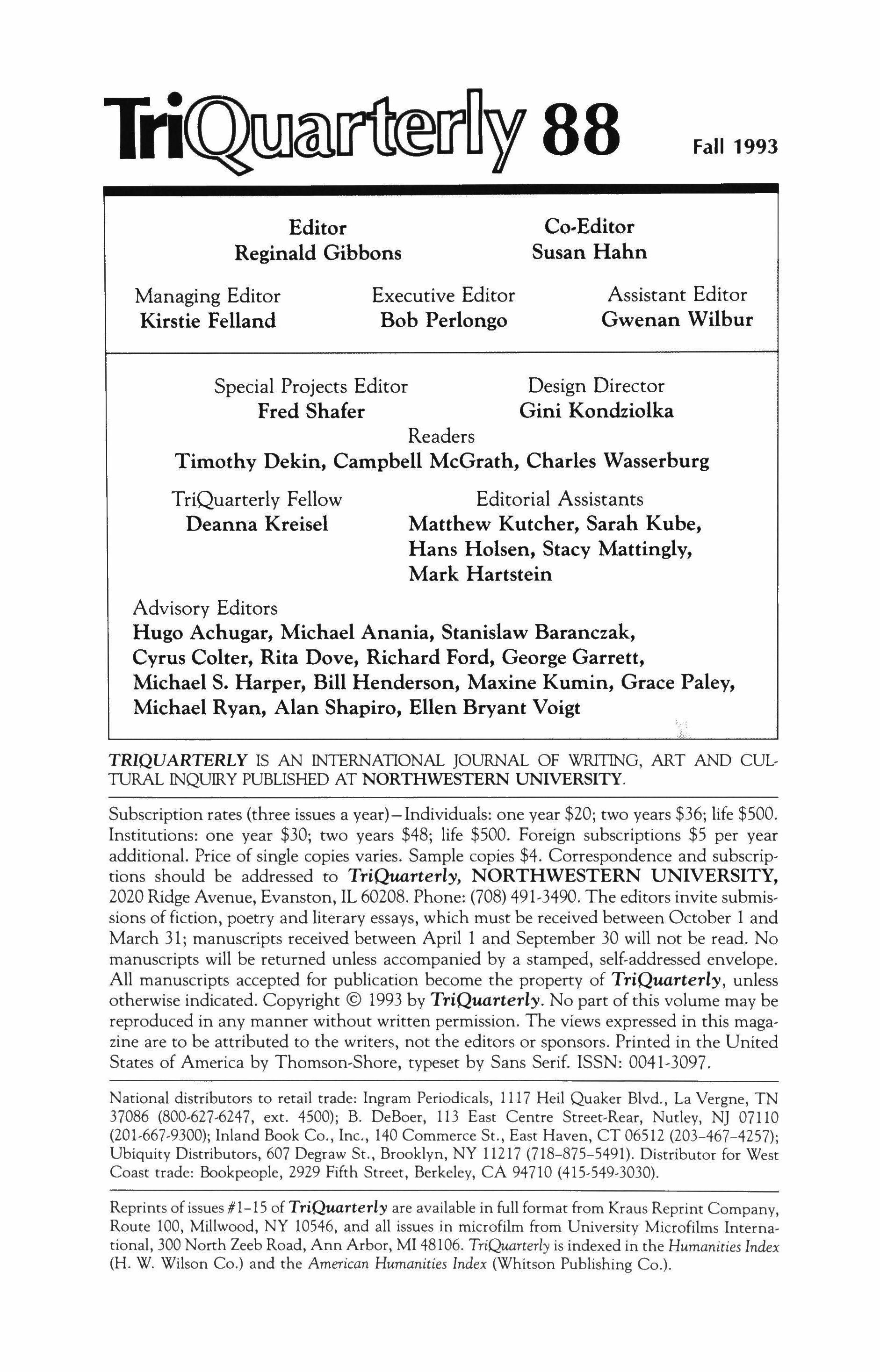
Editor
Reginald Gibbons
Managing Editor
Kirstie Felland
Executive Editor Bob Perlongo
Special Projects Editor
Fred Shafer
Co-Editor Susan Hahn
Assistant Editor Gwenan Wilbur
Design Director Gini Kondziolka
Readers
Timothy Dekin, Campbell McGrath, Charles Wasserburg
TriQuarterly Fellow
Deanna Kreisel
Advisory Editors
Editorial Assistants
Matthew Kutcher, Sarah Kube, Hans Holsen, Stacy Mattingly, Mark Hartstein
Hugo Achugar, Michael Anania, Stanislaw Baranczak, Cyrus Colter, Rita Dove, Richard Ford, George Garrett, Michael S. Harper, Bill Henderson, Maxine Kumin, Grace Paley, Michael Ryan, Alan Shapiro, Ellen Bryant Voigt
TRIQUARTERLY IS AN INTERNATIONAL JOURNAL OF WRITING, ART AND CULTURAL INQUIRY PUBLISHED AT NORTHWESTERN UNIVERSITY.
Subscription rates (three issues a year}-Individuals: one year $20; two years $36; life $500. Institutions: one year $30; two years $48; life $500. Foreign subscriptions $5 per year additional. Price of single copies varies. Sample copies $4. Correspondence and subscriptions should be addressed to TriQuarterly, NORTHWESTERN UNIVERSITY, 2020 Ridge Avenue, Evanston, IL 60208. Phone: (708) 491-3490. The editors invite submissions of fiction, poetry and literary essays, which must be received between October 1 and March 31; manuscripts received between April 1 and September 30 will not be read. No manuscripts will be returned unless accompanied by a stamped, self-addressed envelope. All manuscripts accepted for publication become the property of TriQuarterly, unless otherwise indicated. Copyright © 1993 by TriQuarterly. No part of this volume may be reproduced in any manner without written permission. The views expressed in this magazine are to be attributed to the writers, not the editors or sponsors. Printed in the United States of America by Thomson-Shore, typeset by Sans Serif. ISSN: 0041-3097.
National distributors to retail trade: Ingram Periodicals, 1117 Heil Quaker Blvd., La Vergne, TN 37086 (800-627-6247, ext. 4500); B. DeBoer, 113 East Centre Street-Rear, Nutley, NJ 07110 (201-667-9300); Inland Book Co., Inc., 140 Commerce St., East Haven, CT 06512 (203-467-4257); Ubiquity Distributors, 607 Degraw St., Brooklyn, NY 11217 (718-875-5491). Distributor for West Coast trade: Bookpeople, 2929 Fifth Street, Berkeley, CA 94710 (415-549-3030).
Reprints of issues #1-15 of TriQuarterly are available in full format from Kraus Reprint Company, Route 100, Millwood, NY 10546, and all issues in microfilm from University Microfilms International, 300 North Zeeb Road, Ann Arbor, MI 48106. TriQuarterly is indexed in the Humanities Index (H. W. Wilson Co.) and the American Humanities Index (Whitson Publishing Co.).
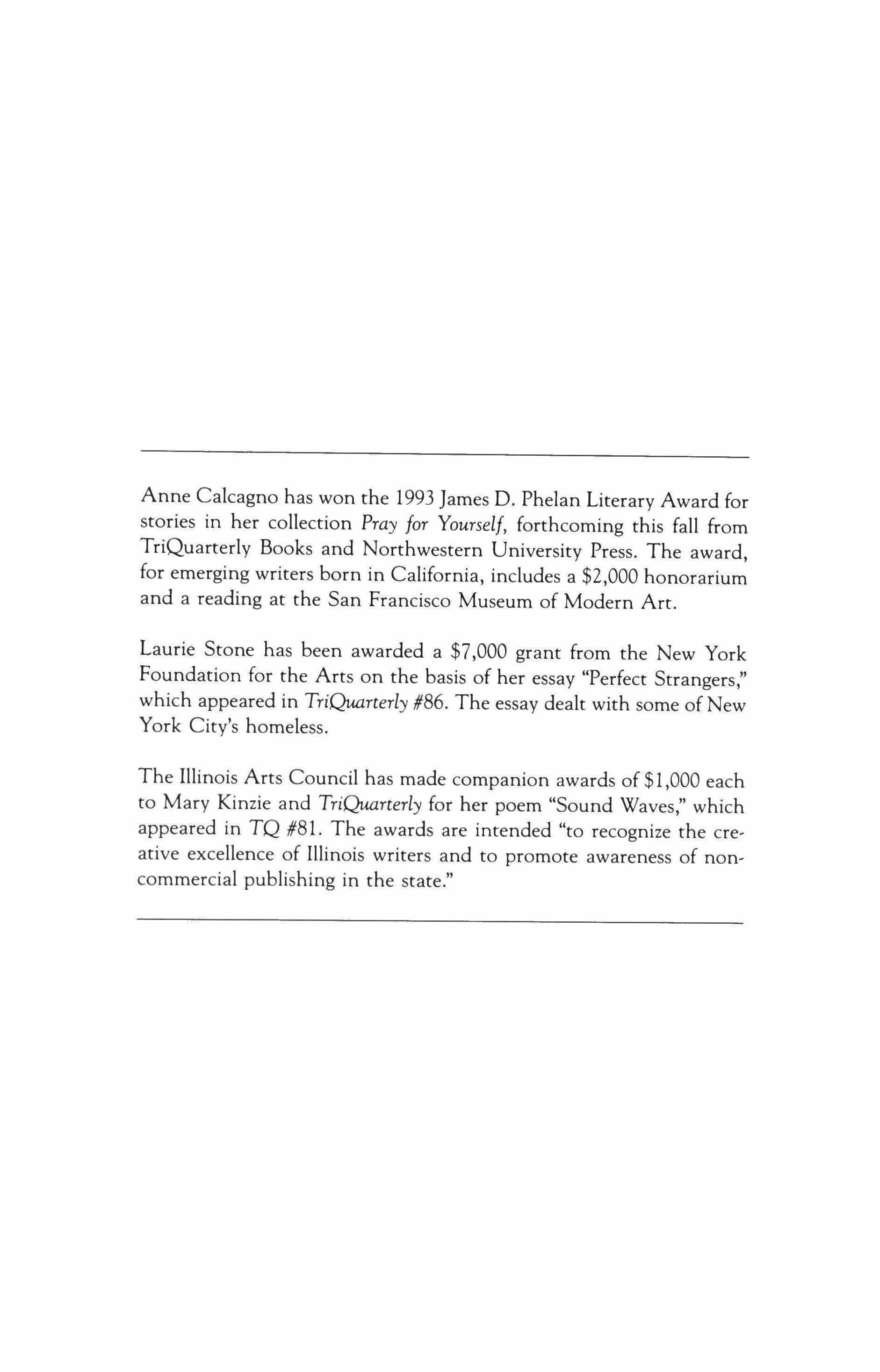
Anne Calcagno has won the 1993 James D. Phelan Literary Award for stories in her collection Pray for Yourself, forthcoming this fall from TriQuarterly Books and Northwestern University Press. The award, for emerging writers born in California, includes a $2,000 honorarium and a reading at the San Francisco Museum of Modern Art.
Laurie Stone has been awarded a $7,000 grant from the New York Foundation for the Arts on the basis of her essay "Perfect Strangers," which appeared in TriQuarterly #86. The essay dealt with some of New York City's homeless.
The Illinois Arts Council has made companion awards of $1,000 each to Mary Kinzie and TriQuarterly for her poem "Sound Waves," which appeared in TQ #81. The awards are intended "to recognize the creative excellence of Illinois writers and to promote awareness of noncommercial publishing in the state."
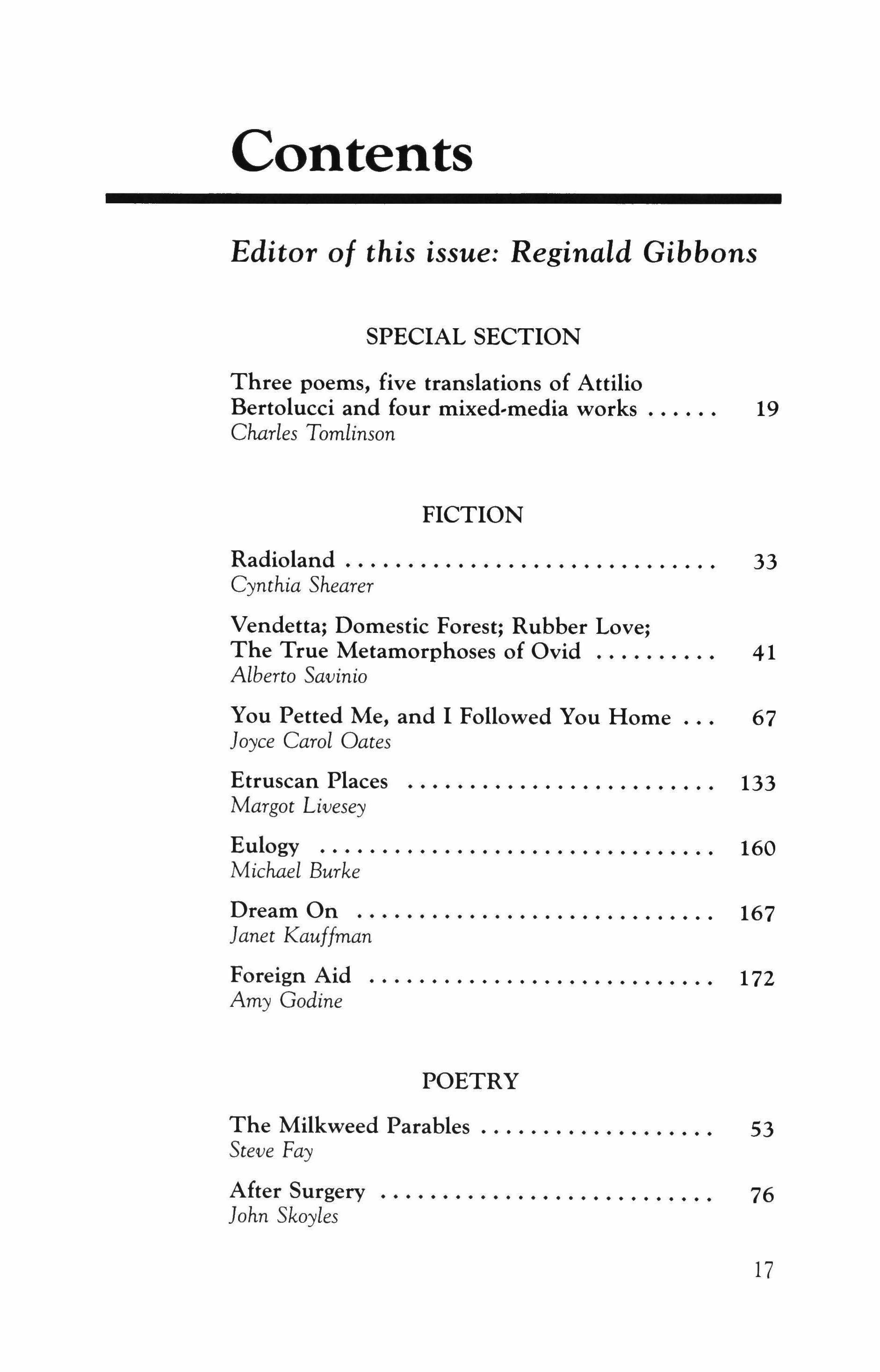
Editor of this issue: Reginald Gibbons
Contents
SPECIAL SECTION Three poems, five translations of Attilio Bertolucci and four mixed-media works 19 Charles Tomlinson FICTION Radioland 33 Cynthia Shearer Vendetta; Domestic Forest; Rubber Love; The True Metamorphoses of Ovid 41 Alberto Savinio You Petted Me, and I Followed You Home 67 Joyce Carol Oates Etruscan Places Margot Livesey Eulogy 160 Michael Burke 133 Dream On 167 Janet Kauffman Foreign Aid Amy Godine 172 POETRY The Milkweed Parables 53 Steve Fay After Surgery John Skoyles 76 17
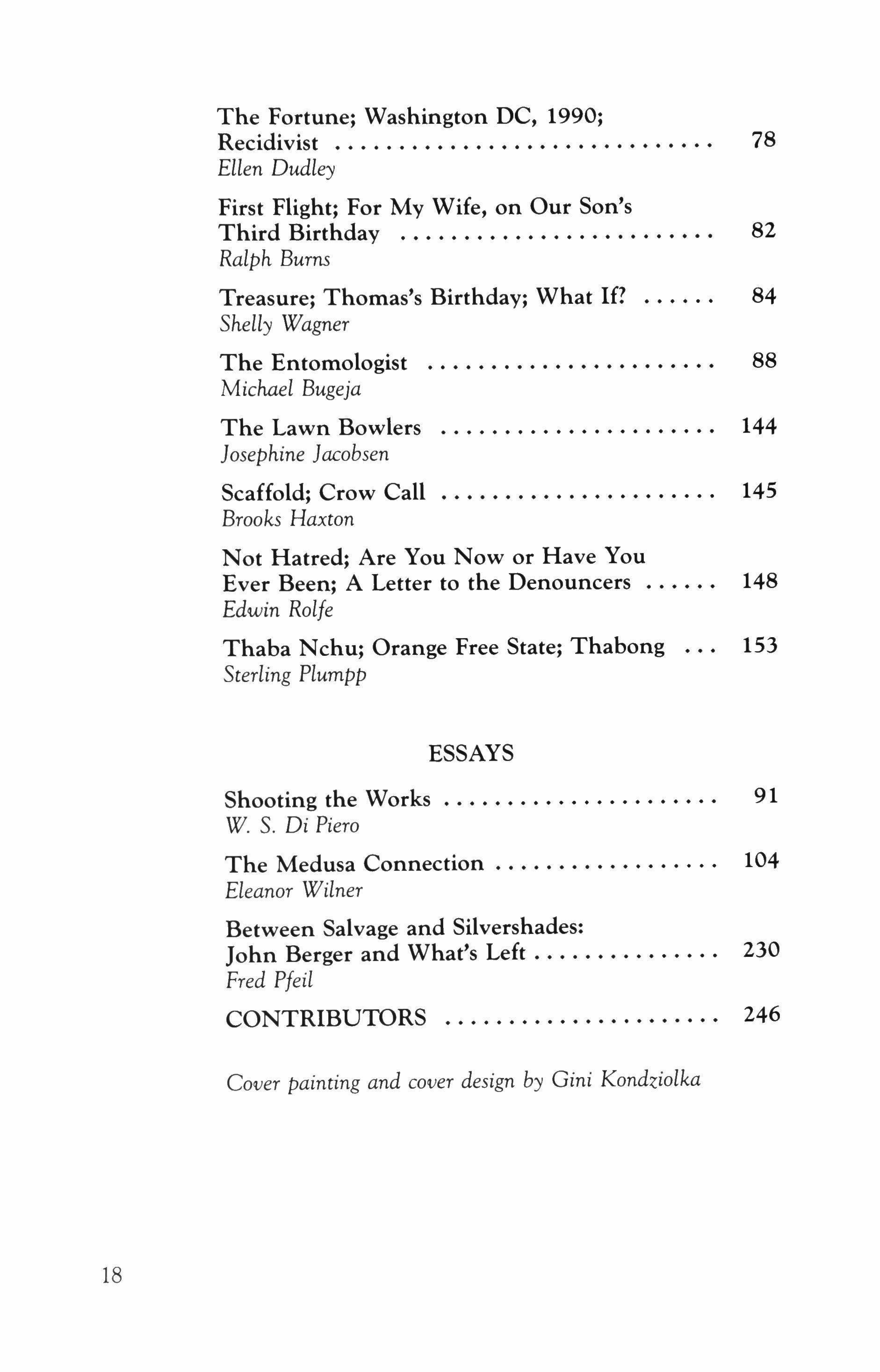
The Fortune; Washington DC, 1990; Recidivist 78 Ellen Dudley First Flight; For My Wife, on Our Son's Third Birthday 82 Ralph Burns Treasure; Thomas's Birthday; What If? Shelly Wagner The Entomologist 88 Michael Bugeja 84 The Lawn Bowlers Josephine Jacobsen Scaffold; Crow Call Brooks Haxton Not Hatred; Are You Now or Have You Ever Been; A Letter to the Denouncers 148 Edwin Rolfe 144 145 Thaba Nchu; Orange Free State; Thabong 153 Sterling Plumpp ESSAYS Shooting the Works 91 W. S. tx Piero The Medusa Connection. 104 Eleanor Wilner Between Salvage and Silvershades: John Berger and What's Left. 230 Fred Pfeil CONTRIBUTORS ................•....• 246 Cover painting and cover design by Gini Kondziolka 18
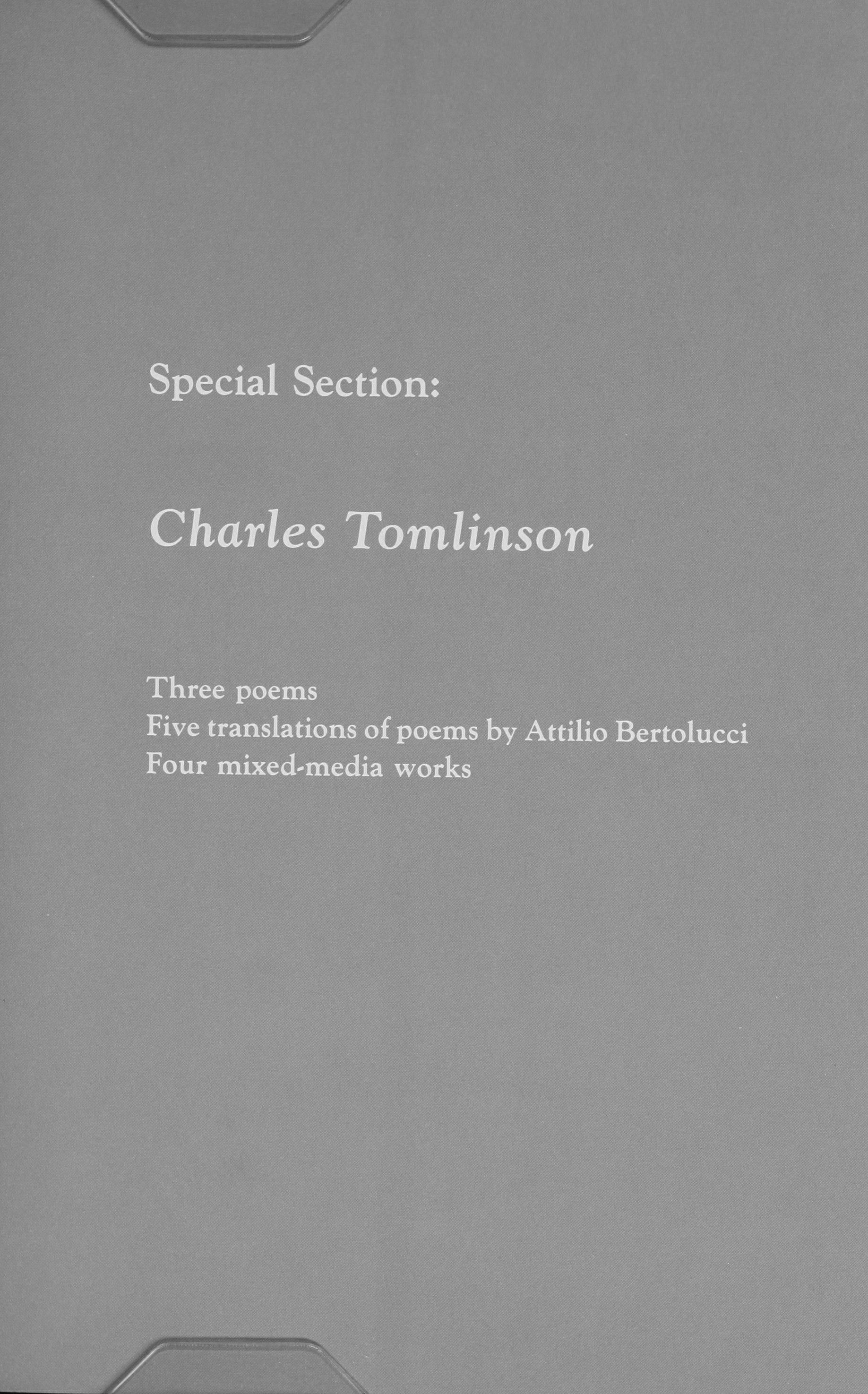

Three Poems
Charles Tomlinson
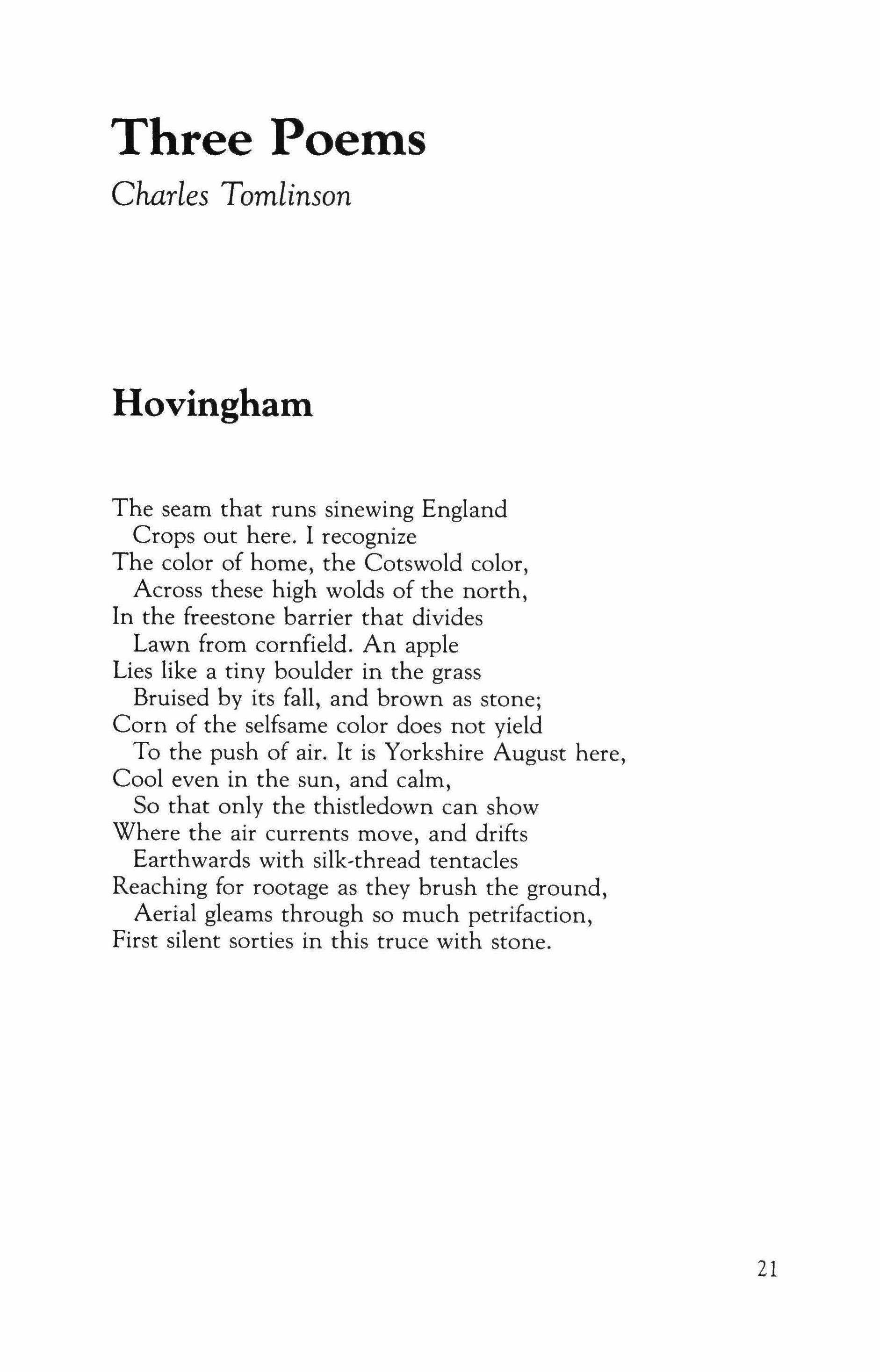
Hovingham
The seam that runs sinewing England Crops out here. I recognize The color of home, the Cotswold color, Across these high wolds of the north, In the freestone barrier that divides Lawn from cornfield. An apple Lies like a tiny boulder in the grass Bruised by its fall, and brown as stone; Corn of the selfsame color does not yield To the push of air. It is Yorkshire August here, Cool even in the sun, and calm, So that only the thistledown can show Where the air currents move, and drifts Earthwards with silk-thread tentacles
Reaching for rootage as they brush the ground, Aerial gleams through so much petrifaction, First silent sorties in this truce with stone.
21
Cosmology
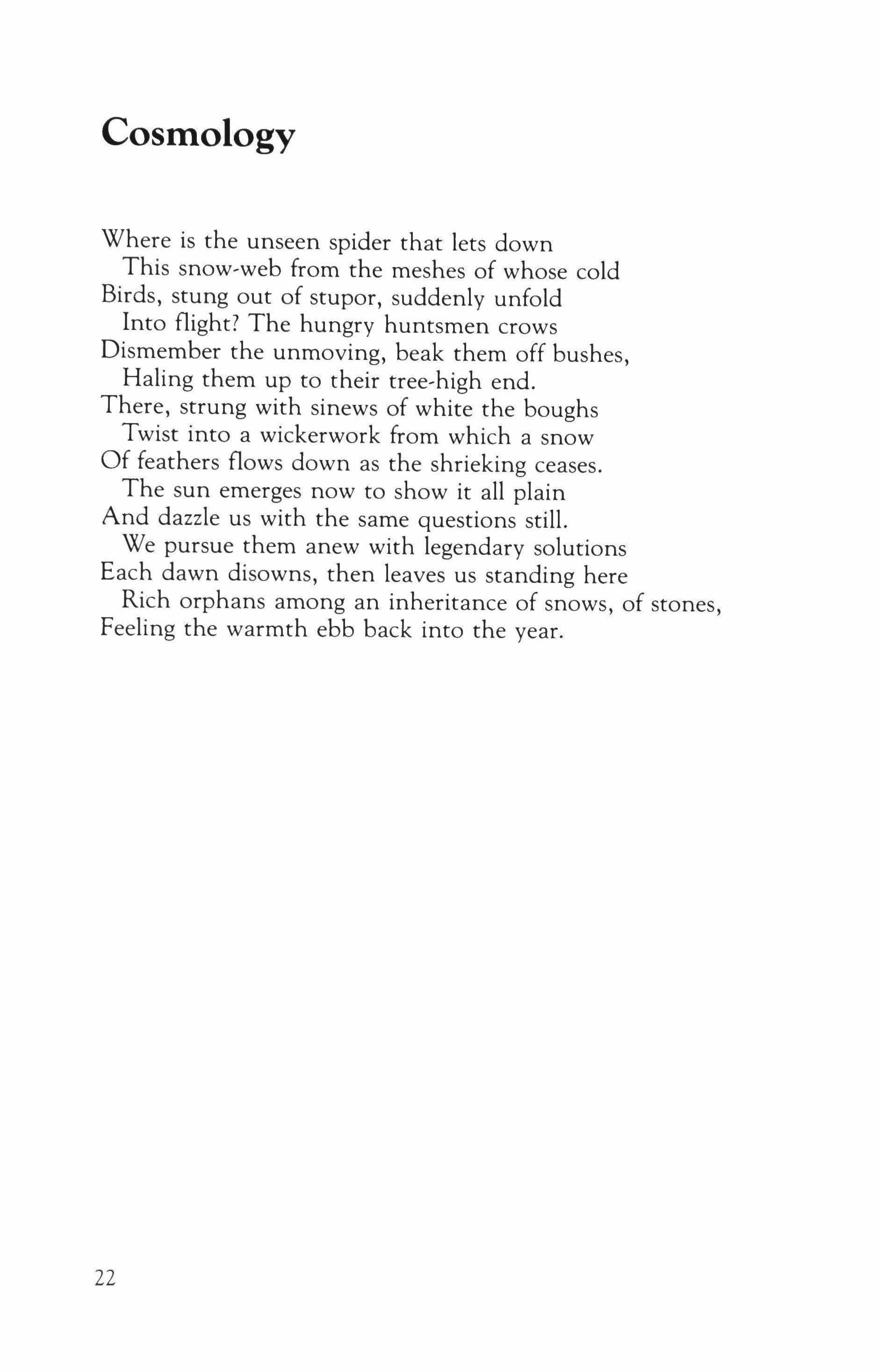
Where is the unseen spider that lets down This snow-web from the meshes of whose cold Birds, stung out of stupor, suddenly unfold Into flight? The hungry huntsmen crows Dismember the unmoving, beak them off bushes, Haling them up to their tree-high end. There, strung with sinews of white the boughs Twist into a wickerwork from which a snow Of feathers flows down as the shrieking ceases. The sun emerges now to show it all plain And dazzle us with the same questions still. We pursue them anew with legendary solutions Each dawn disowns, then leaves us standing here Rich orphans among an inheritance of snows, of stones, Feeling the warmth ebb back into the year.
22
To a Photographer
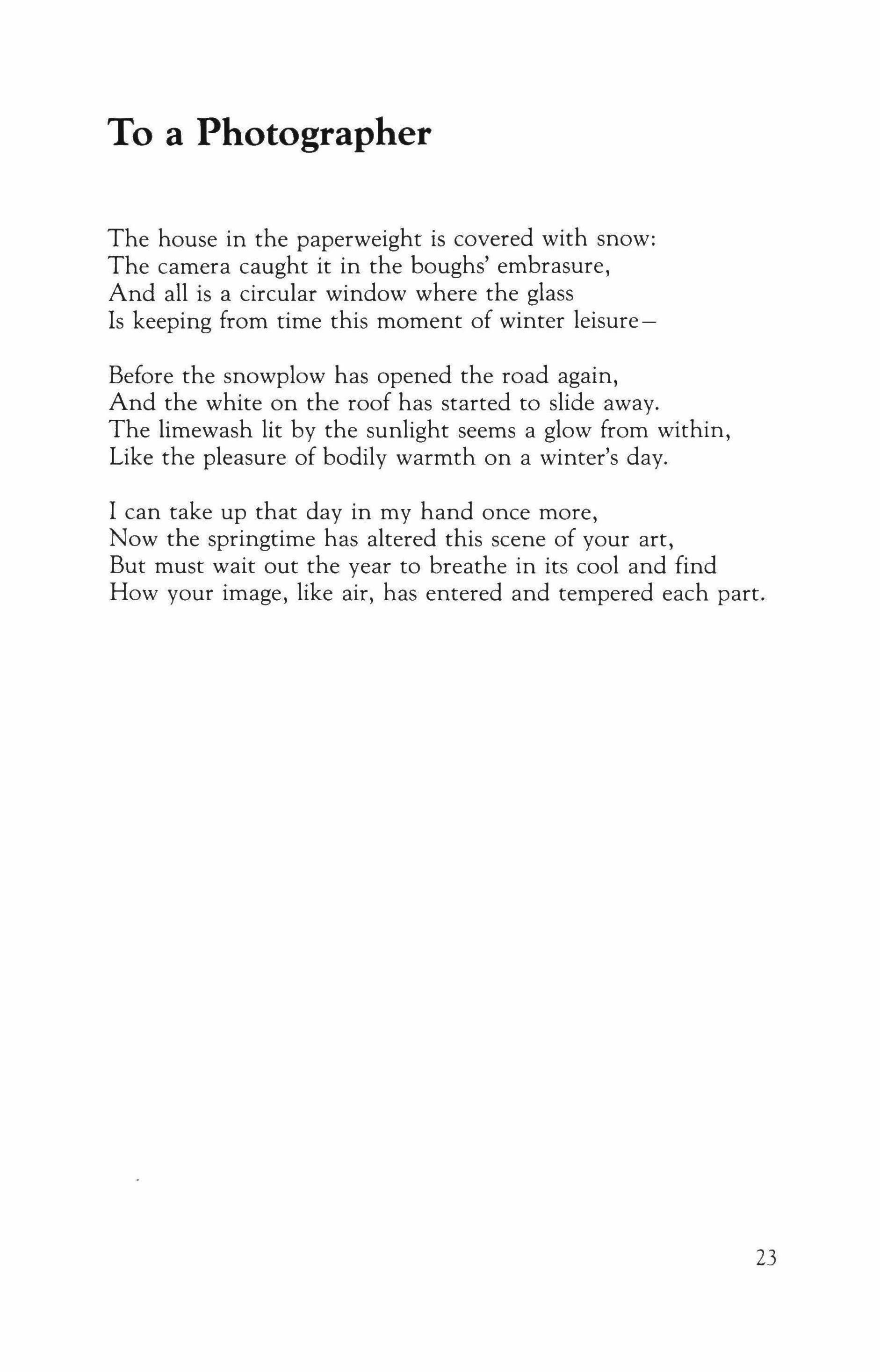
The house in the paperweight is covered with snow: The camera caught it in the boughs' embrasure, And all is a circular window where the glass Is keeping from time this moment of winter leisure-
Before the snowplow has opened the road again, And the white on the roof has started to slide away. The limewash lit by the sunlight seems a glow from within, Like the pleasure of bodily warmth on a winter's day.
I can take up that day in my hand once more, Now the springtime has altered this scene of your art, But must wait out the year to breathe in its cool and find How your image, like air, has entered and tempered each part.
23
Five Poems
Attilio Bertolucci
 Translated by Charles Tomlinson
Translated by Charles Tomlinson
Fires in November
They are burning weeds in the fields they set off a lively fire and a cheerless smoke. The white mist takes refuge among the acacias but the slow smoke coming up close will not let it be. The boys run round in a circle about the fire hand in hand, absentmindedly, as if they were drunk with wine. For a long time they will remember with delight fires that men light in November at the edges of the field.
24
April for B-
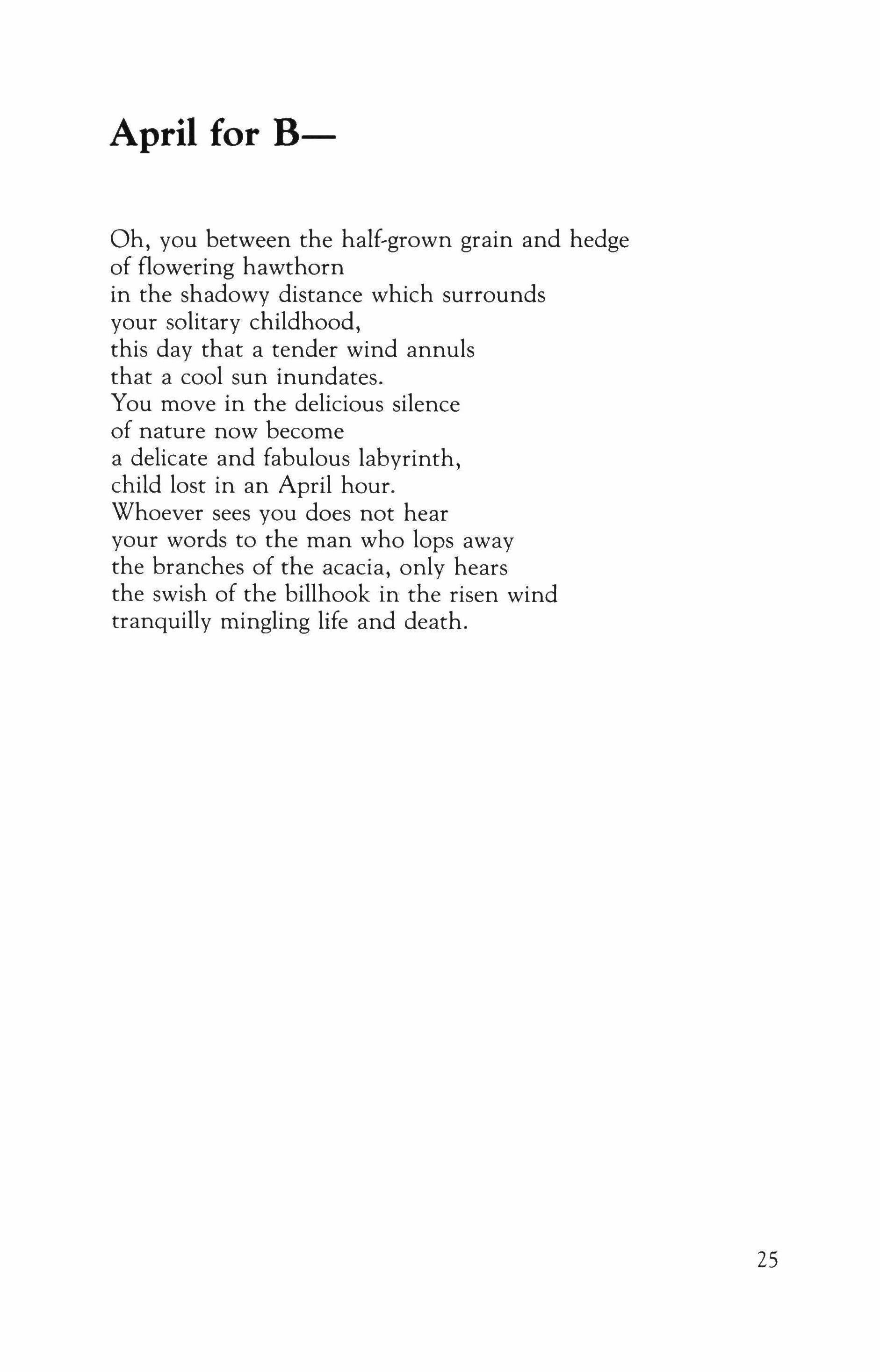
Oh, you between the half-grown grain and hedge of flowering hawthorn in the shadowy distance which surrounds your solitary childhood, this day that a tender wind annuls that a cool sun inundates. You move in the delicious silence of nature now become a delicate and fabulous labyrinth, child lost in an April hour. Whoever sees you does not hear your words to the man who lops away the branches of the acacia, only hears the swish of the billhook in the risen wind tranquilly mingling life and death.
25
October
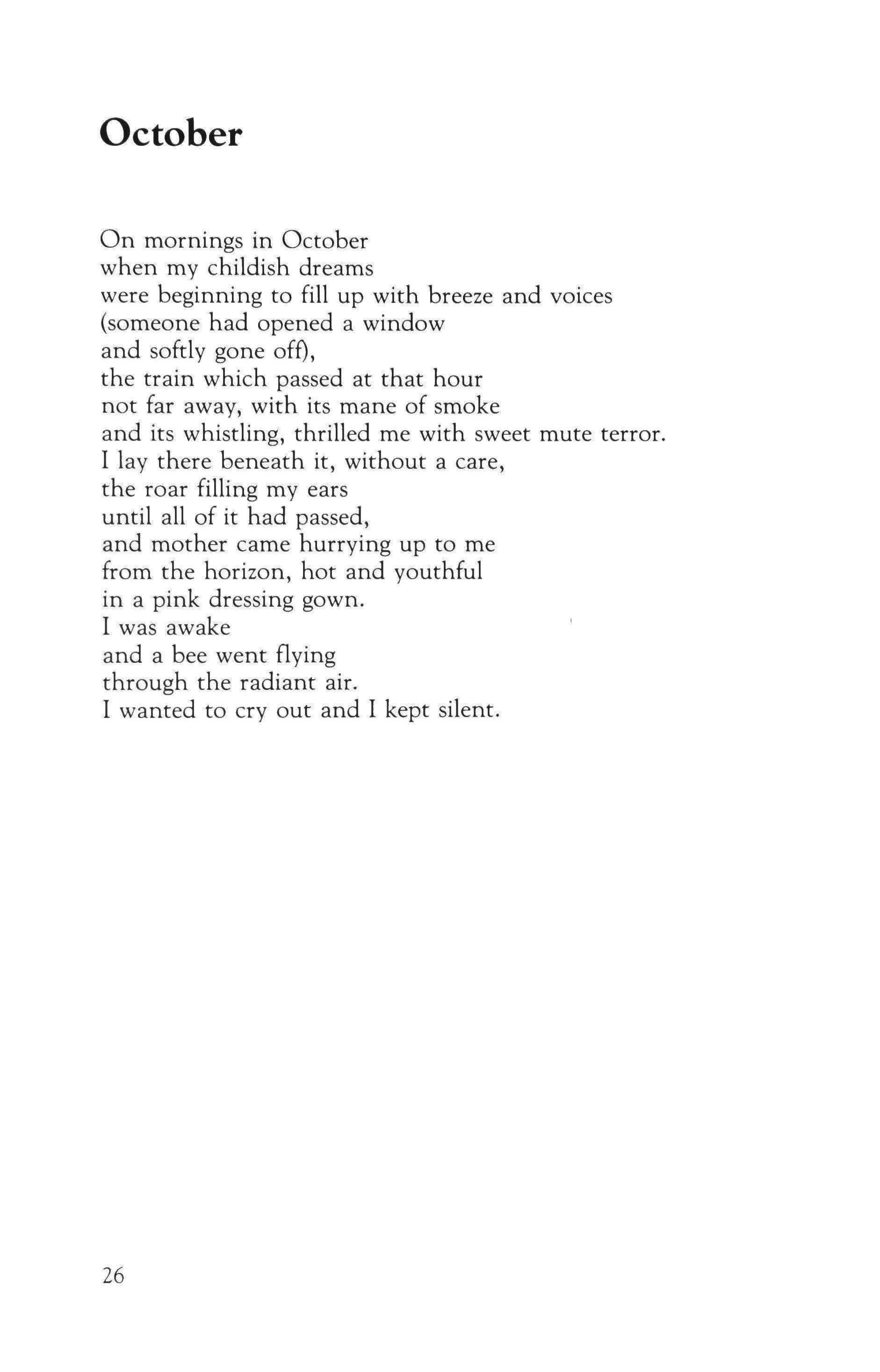
On mornings in October when my childish dreams were beginning to fill up with breeze and voices (someone had opened a window and softly gone off), the train which passed at that hour not far away, with its mane of smoke and its whistling, thrilled me with sweet mute terror. I lay there beneath it, without a care, the roar filling my ears until all of it had passed, and mother came hurrying up to me from the horizon, hot and youthful in a pink dressing gown. I was awake and a bee went flying through the radiant air. I wanted to cry out and I kept silent.
26
To
His Mother
Whose Name Was Maria

It is you, invoked every evening, depicted on the clouds that redden our open plain and the one who moves in it, with children as fresh as leaves and wet women traveling towards the city in the light of a shower just ending, it is you, mother forever young in virtue of the death that plucked you, rose at that point just before the petals fall, you who are the origin of all the neurosis and the anxiety that is my torture, and because of that I thank you for time past present and future.
27
To Giuseppe in October
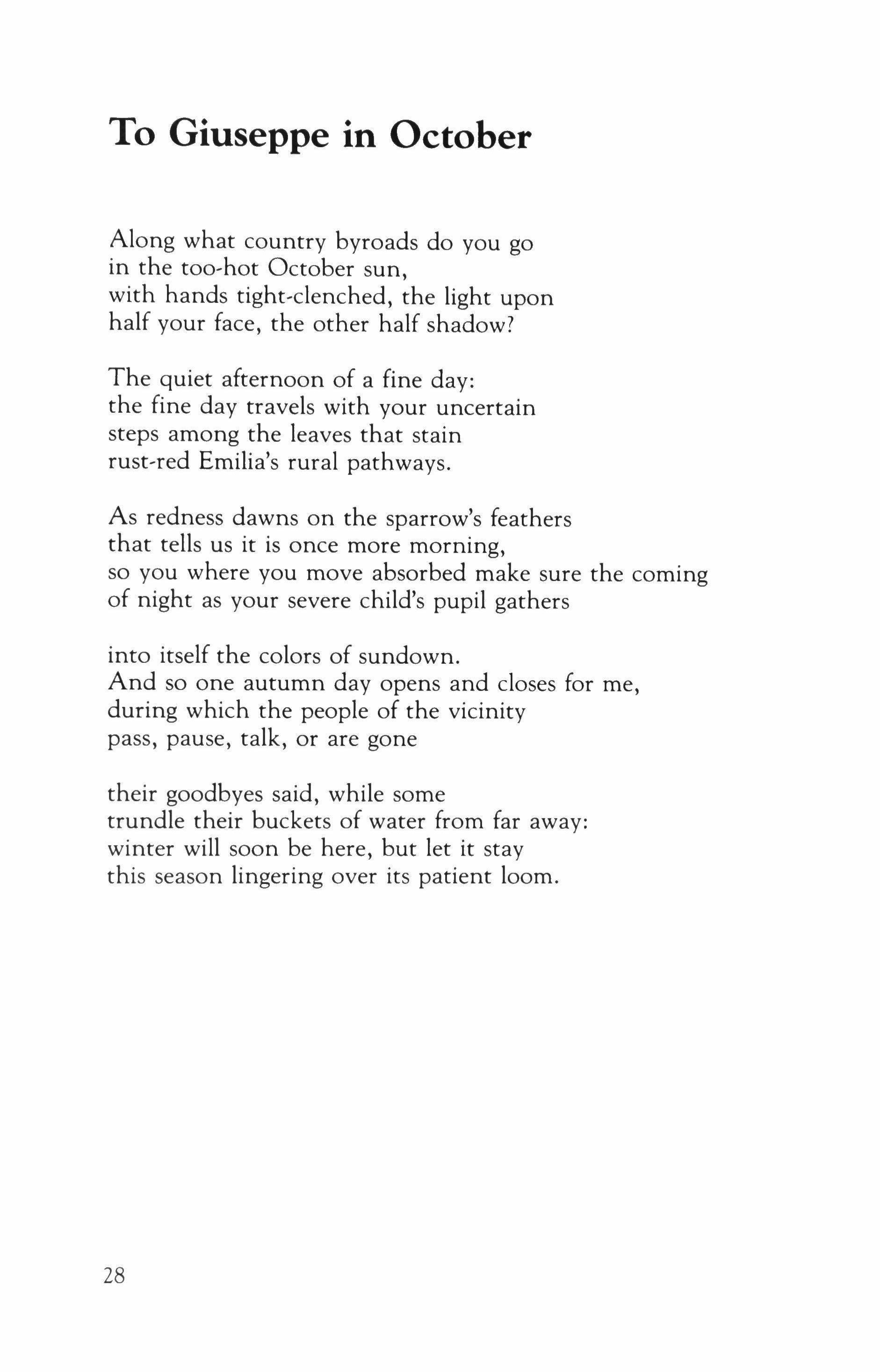
Along what country byroads do you go in the too'hot October sun, with hands tight-clenched, the light upon half your face, the other half shadow?
The quiet afternoon of a fine day: the fine day travels with your uncertain steps among the leaves that stain rust-red Emilia's rural pathways.
As redness dawns on the sparrow's feathers that tells us it is once more morning, so you where you move absorbed make sure the coming of night as your severe child's pupil gathers into itself the colors of sundown. And so one autumn day opens and closes for me, during which the people of the vicinity pass, pause, talk, or are gone
their goodbyes said, while some trundle their buckets of water from far away: winter will soon be here, but let it stay this season lingering over its patient loom.
28
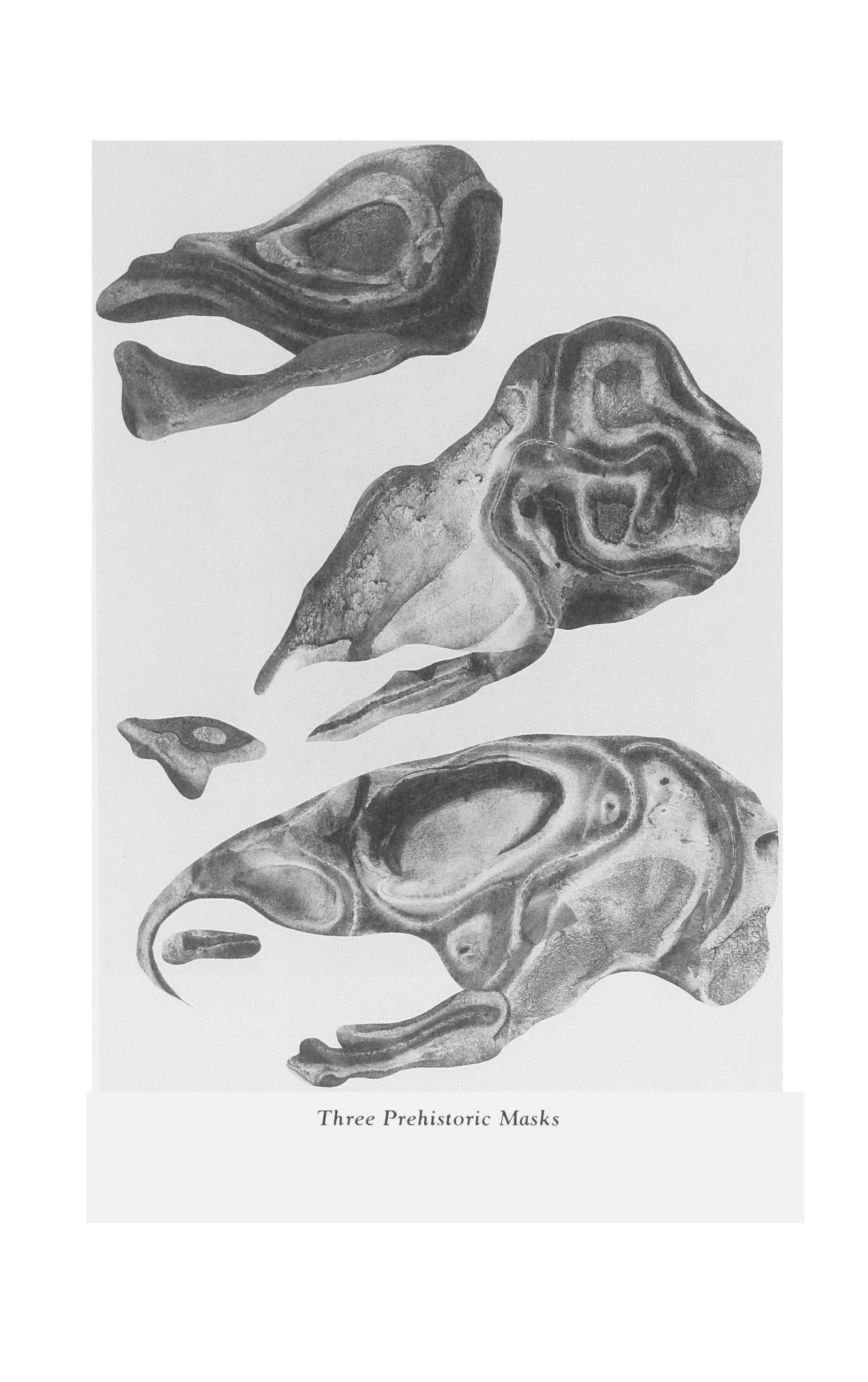
�.Jr' \t'
Three Prehistoric Masks
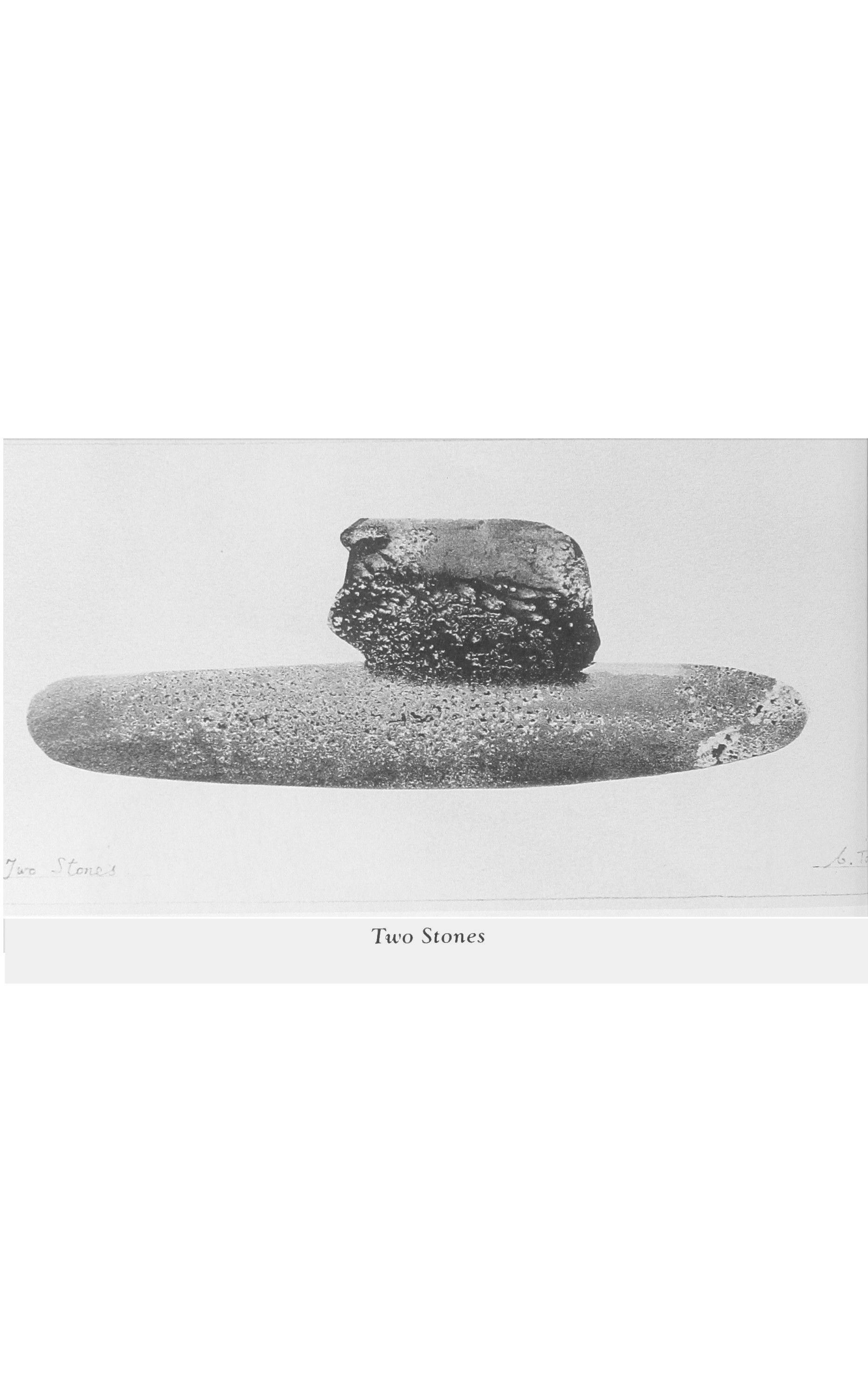
\ I--
-
Tt(JO Stones
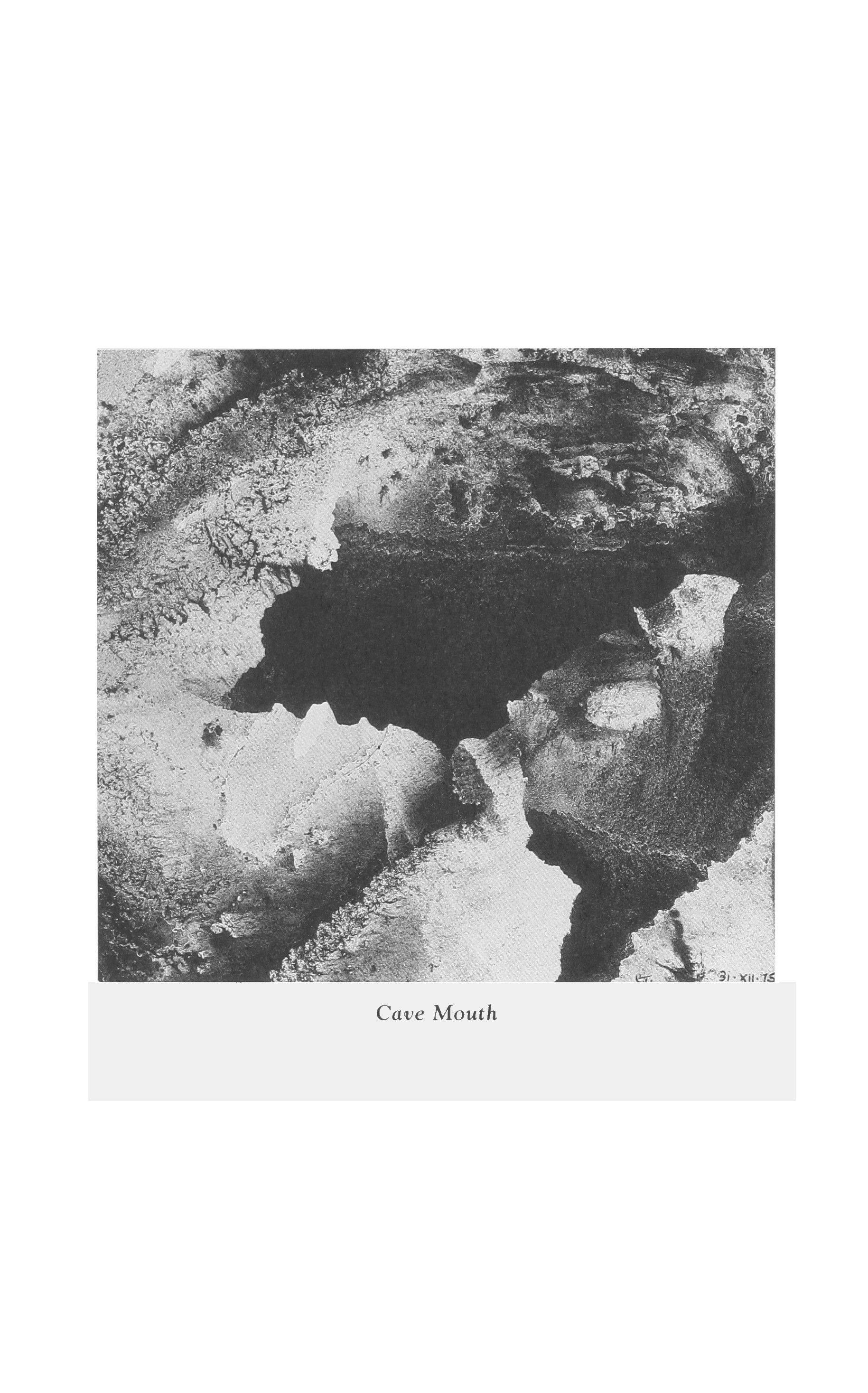 Cave Mouth
Cave Mouth

The Sleep of Animals
:11 Ii ;, wt I I I f t' I
Radioland
Cynthia Shearer
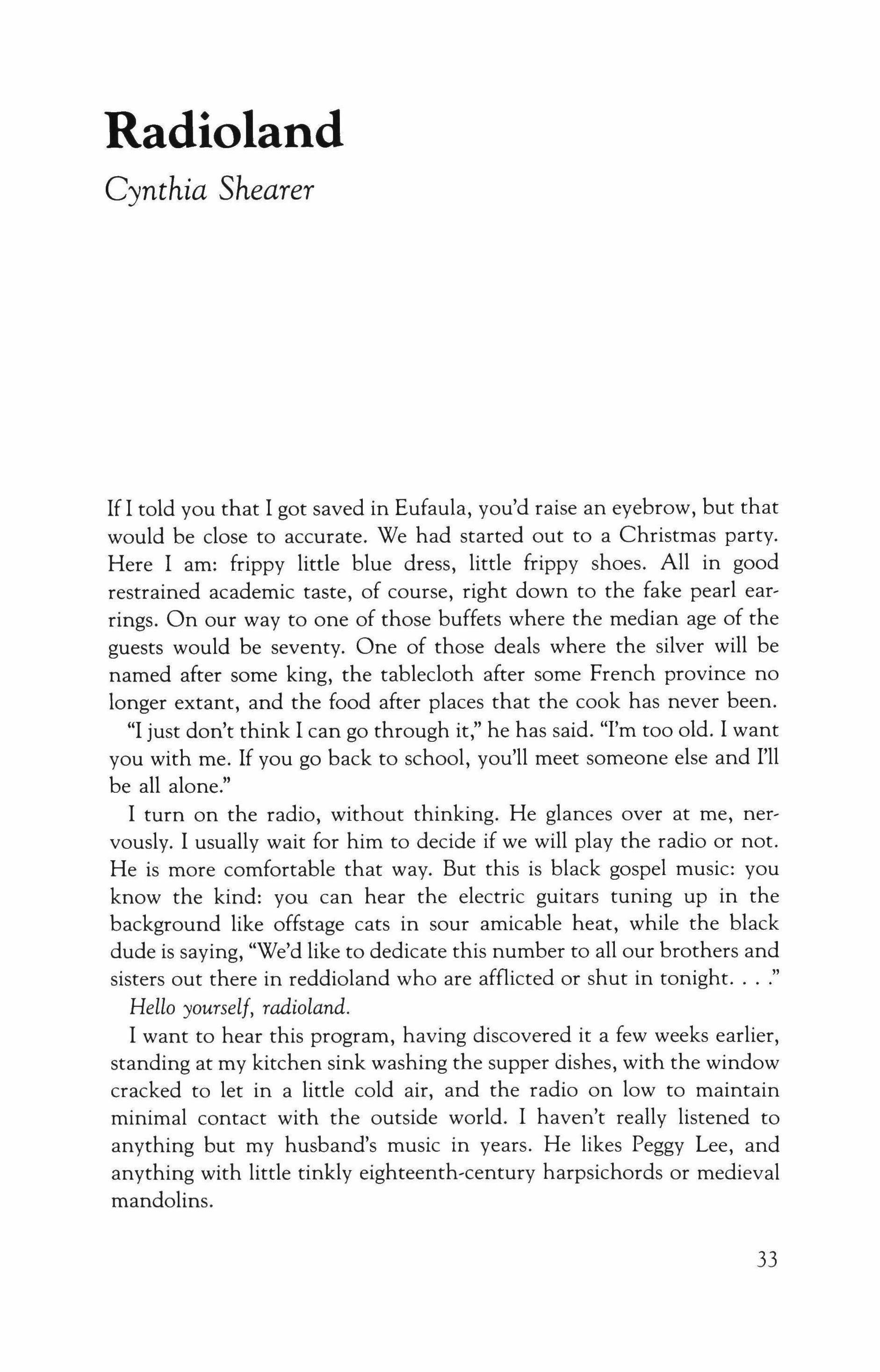
If! told you that I got saved in Eufaula, you'd raise an eyebrow, but that would be close to accurate. We had started out to a Christmas party. Here I am: frippy little blue dress, little frippy shoes. All in good restrained academic taste, of course, right down to the fake pearl earrings. On our way to one of those buffets where the median age of the guests would be seventy. One of those deals where the silver will be named after some king, the tablecloth after some French province no longer extant, and the food after places that the cook has never been.
"I just don't think I can go through it," he has said. "I'm too old. I want you with me. If you go back to school, you'll meet someone else and I'll be all alone."
I turn on the radio, without thinking. He glances over at me, nervously. I usually wait for him to decide if we will play the radio or not. He is more comfortable that way. But this is black gospel music: you know the kind: you can hear the electric guitars tuning up in the background like offstage cats in sour amicable heat, while the black dude is saying, "We'd like to dedicate this number to all our brothers and sisters out there in reddioland who are afflicted or shut in tonight Hello yourself, radioland.
I want to hear this program, having discovered it a few weeks earlier, standing at my kitchen sink washing the supper dishes, with the window cracked to let in a little cold air, and the radio on low to maintain minimal contact with the outside world. I haven't really listened to anything but my husband's music in years. He likes Peggy Lee, and anything with little tinkly eighteenth-century harpsichords or medieval mandolins.
33

Another nervous glance from him. "I have a headache, May," he warns me.
I compromise and turn it down, but I can still hear. He's looking at me with annoyance. Here it comes, something. I brace myself.
"Can't you find something that doesn't sound like whining niggers?" he says, his hands tightening on the leather-covered wheel. And I turn it off.
That's what it is like, when you are May and he is December. We cruise along in silence through the winter-naked woods.
"The Wadlingtons started the museum and then turned it over to the foundation," December is saying. "I want to meet them because they give lots of money for projects like mine."
He's not going to notice if I respond or not, so I don't respond.
"You look nice," he adds, glancing over at me. "You'll be the youngest wife there."
We pass the Headhunters Beauty Salon, the Ola Mae Kitchenette, and the Holy Tabernacle of the Precious Host, where an old school bus painted green and gold is parked, a throng of green and gold people milling around it. "The Lanford Family Singers from Decatur AI," the blinking sign announces to the corridor of air we leave as our car whizzes past. It's like riding in a bullet down a black lace tunnel, the tree branches arching over the road, the headlights fanning out. We pass two men in front of the Super Bad Television Repair Shop, and a woman running toward them carrying a red tulle dress on a hanger.
I close my eyes to see how long the image lingers on my retinas. I'm thinking: Did they ever decide if light is energy or matter or what? Do I carry that red tulle dress with me everywhere I go now? What's to keep it from waiting off in some pigeonhole, then roaring across some synapse years later, hitting me with the same force as, say, the Carmina Burana? Then I'm off and running with a thought about dendrites, and how amazing it is that nervous impulses ever actually make it to their appointed destinations. Could there be an illness where somebody's dendrites get scrambled, and the information misfires? Is there such a thing as a dead-letter dendrite?
"You'll want to talk to Pudge," he is saying. "She's been giving elegant parties since she was a blushing young bride in the Delta." He always has this way of speaking, bogged up in the phrases of some bygone era. He can't help it, he writes history books. "That house is always a showpiece, and she's just perfect. I think you'll like her," he is saying.
It's getting dark now, and the big houses that line the main drag of Eufaula look like moored white-lace steamboats, outlined for the holidays with a wiry thinness, a gold filigree of lights that do not blink. They
34
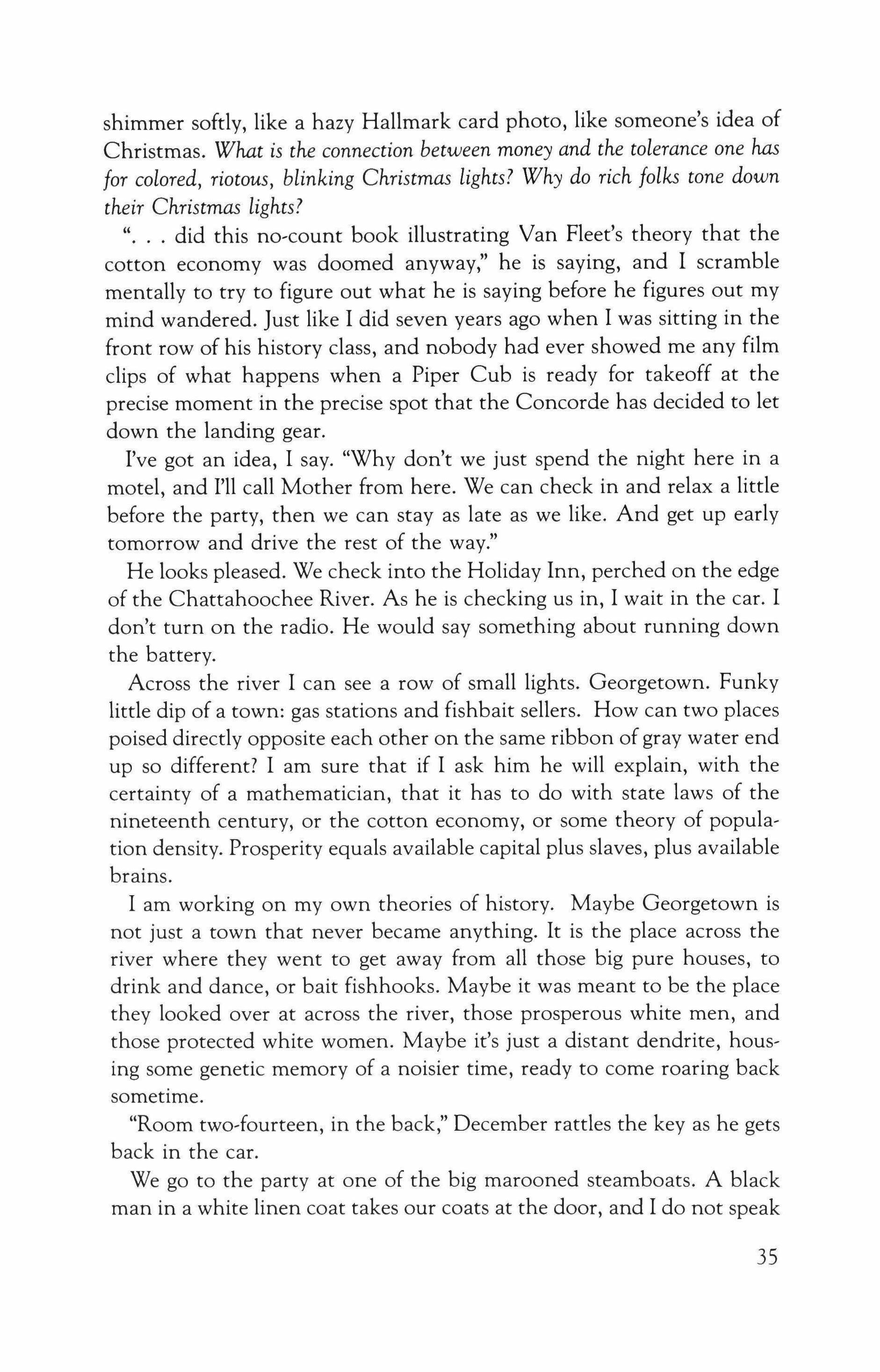
shimmer softly, like a hazy Hallmark card photo, like someone's idea of Christmas. What is the connection between money and the tolerance one has for colored, riotous, blinking Christmas lights? Why do rich folks tone down their Christmas lights?
did this no-count book illustrating Van Fleet's theory that the cotton economy was doomed anyway," he is saying, and I scramble mentally to try to figure out what he is saying before he figures out my mind wandered. Just like I did seven years ago when I was sitting in the front row of his history class, and nobody had ever showed me any film clips of what happens when a Piper Cub is ready for takeoff at the precise moment in the precise spot that the Concorde has decided to let down the landing gear.
I've got an idea, I say. "Why don't we just spend the night here in a motel, and I'll call Mother from here. We can check in and relax a little before the party, then we can stay as late as we like. And get up early tomorrow and drive the rest of the way."
He looks pleased. We check into the Holiday Inn, perched on the edge of the Chattahoochee River. As he is checking us in, I wait in the car. I don't turn on the radio. He would say something about running down the battery.
Across the river I can see a row of small lights. Georgetown. Funky little dip of a town: gas stations and fishbait sellers. How can two places poised directly opposite each other on the same ribbon of gray water end up so different? I am sure that if I ask him he will explain, with the certainty of a mathematician, that it has to do with state laws of the nineteenth century, or the cotton economy, or some theory of population density. Prosperity equals available capital plus slaves, plus available brains.
I am working on my own theories of history. Maybe Georgetown is not just a town that never became anything. It is the place across the river where they went to get away from all those big pure houses, to drink and dance, or bait fishhooks. Maybe it was meant to be the place they looked over at across the river, those prosperous white men, and those protected white women. Maybe it's just a distant dendrite, housing some genetic memory of a noisier time, ready to come roaring back sometime.
"Room two-fourteen, in the back," December rattles the key as he gets back in the car.
We go to the party at one of the big marooned steamboats. A black man in a white linen coat takes our coats at the door, and I do not speak
35
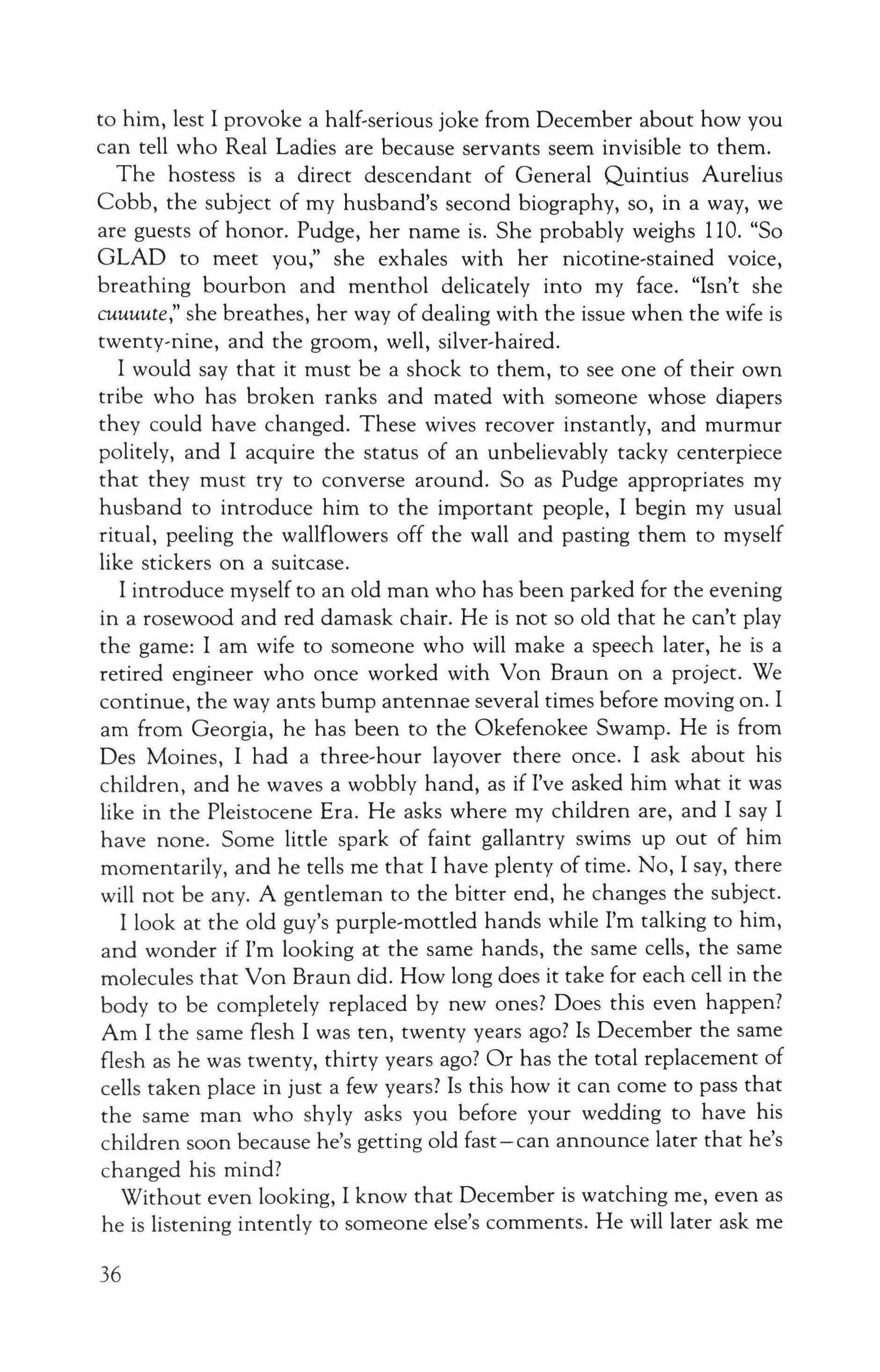
to him, lest I provoke a half-serious joke from December about how you can tell who Real Ladies are because servants seem invisible to them.
The hostess is a direct descendant of General Quintius Aurelius Cobb, the subject of my husband's second biography, so, in a way, we are guests of honor. Pudge, her name is. She probably weighs 110. "So GLAD to meet you," she exhales with her nicotine-stained voice, breathing bourbon and menthol delicately into my face. "Isn't she cuuuute," she breathes, her way of dealing with the issue when the wife is twenty-nine, and the groom, well, silver-haired.
I would say that it must be a shock to them, to see one of their own tribe who has broken ranks and mated with someone whose diapers they could have changed. These wives recover instantly, and murmur politely, and I acquire the status of an unbelievably tacky centerpiece that they must try to converse around. So as Pudge appropriates my husband to introduce him to the important people, I begin my usual ritual, peeling the wallflowers off the wall and pasting them to myself like stickers on a suitcase.
I introduce myself to an old man who has been parked for the evening in a rosewood and red damask chair. He is not so old that he can't play the game: I am wife to someone who will make a speech later, he is a retired engineer who once worked with Von Braun on a project. We continue, the way ants bump antennae several times before moving on. I am from Georgia, he has been to the Okefenokee Swamp. He is from Des Moines, I had a three-hour layover there once. I ask about his children, and he waves a wobbly hand, as if I've asked him what it was like in the Pleistocene Era. He asks where my children are, and I say I have none. Some little spark of faint gallantry swims up out of him momentarily, and he tells me that I have plenty of time. No, I say, there will not be any. A gentleman to the bitter end, he changes the subject.
I look at the old guy's purple-mottled hands while I'm talking to him, and wonder if I'm looking at the same hands, the same cells, the same molecules that Von Braun did. How long does it take for each cell in the body to be completely replaced by new ones? Does this even happen? Am I the same flesh I was ten, twenty years ago? Is December the same flesh as he was twenty, thirty years ago? Or has the total replacement of cells taken place in just a few years? Is this how it can come to pass that the same man who shyly asks you before your wedding to have his children soon because he's getting old fast-can announce later that he's changed his mind?
Without even looking, I know that December is watching me, even as he is listening intently to someone else's comments. He will later ask me
36
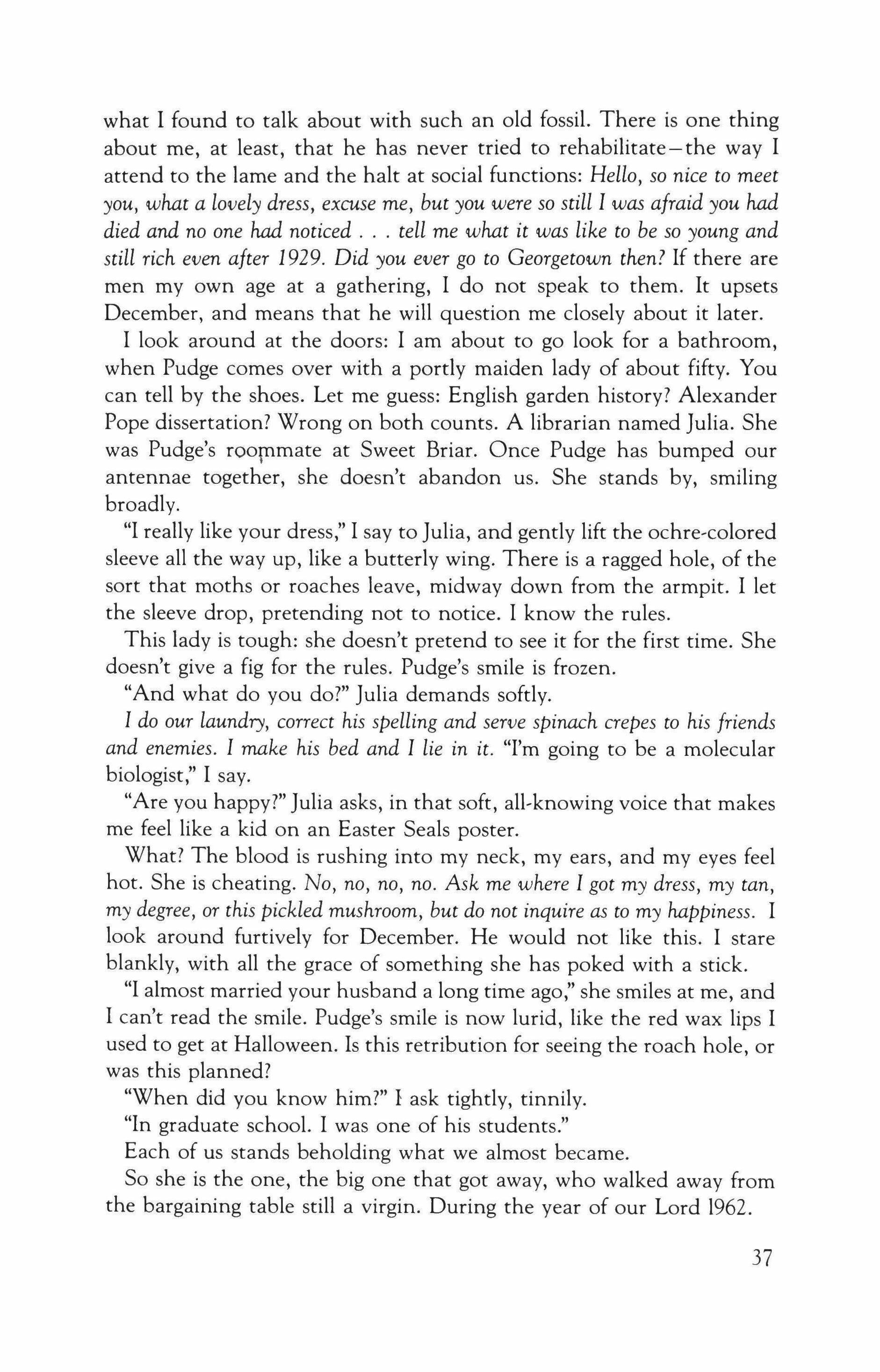
what I found to talk about with such an old fossil. There is one thing about me, at least, that he has never tried to rehabilitate-the way I attend to the lame and the halt at social functions: Hello, so nice to meet you, what a lovely dress, excuse me, but you were so still I was afraid you had died and no one had noticed tell me what it was like to be so young and still rich even after 1929. Did you ever go to Georgetown then? If there are men my own age at a gathering, I do not speak to them. It upsets December, and means that he will question me closely about it later.
I look around at the doors: I am about to go look for a bathroom, when Pudge comes over with a portly maiden lady of about fifty. You can tell by the shoes. Let me guess: English garden history? Alexander Pope dissertation? Wrong on both counts. A librarian named Julia. She was Pudge's roommate at Sweet Briar. Once Pudge has bumped our antennae together, she doesn't abandon us. She stands by, smiling broadly.
"I really like your dress," I say to Julia, and gently lift the ochre-colored sleeve all the way up, like a butterly wing. There is a ragged hole, of the sort that moths or roaches leave, midway down from the armpit. I let the sleeve drop, pretending not to notice. I know the rules.
This lady is tough: she doesn't pretend to see it for the first time. She doesn't give a fig for the rules. Pudge's smile is frozen.
"And what do you do?" Julia demands softly.
I do our laundry, correct his spelling and serve spinach crepes to his friends and enemies. I make his bed and I lie in it. "I'm going to be a molecular biologist," I say.
"Are you happy?" Julia asks, in that soft, all-knowing voice that makes me feel like a kid on an Easter Seals poster.
What? The blood is rushing into my neck, my ears, and my eyes feel hot. She is cheating. No, no, no, no. Ask me where I got my dress, my tan, my degree, or this pickled mushroom, but do not inquire as to my happiness. I look around furtively for December. He would not like this. I stare blankly, with all the grace of something she has poked with a stick.
"I almost married your husband a long time ago," she smiles at me, and I can't read the smile. Pudge's smile is now lurid, like the red wax lips I used to get at Halloween. Is this retribution for seeing the roach hole, or was this planned?
"When did you know him?" I ask tightly, tinnily. "In graduate school. I was one of his students."
Each of us stands beholding what we almost became.
So she is the one, the big one that got away, who walked away from the bargaining table still a virgin. During the year of our Lord 1962.
37

She and Pudge are both looking at me expectantly, the way people watch a polio victim with a leg brace pause at the bottom of a flight of stairs.
"So was I," I laugh, offering redundant information. Pudge relaxes. I have passed some kind of test. They both seem pleased. I am acting pleased. But an image of myself in a previous incarnation comes roaring up out of nowhere, out of some old siderailed memory: me: long-haired and in blue jeans: whizzing along on a ten-speed bike down a hill, on my way to the first class of December's, so fast that it made my earrings whistle.
Later, December is pleased, when I report to him "You handled that well," he says, smiling, and taking off his shoes. He will want to make love. He always wants to make love after a party, after the other men have gone home with their wives. He will especially want to make love to me after seeing, no, after my being seen by, Julia. "I'm a lucky man," he will say, afterwards, smiling up into the dark. "Do you realize that most men my age sleep with women who have stretch marks and varicose veins?"
Our motel room seems haunted, not just with the ghosts of truckdrivers, Sunbelt sales reps and Midwestern tuiistas bound for Disney World. There are also the ghosts of everyone at the party, especially the men who will go home with their tired wives and lie in the same dark that covers us, and think of what December must be doing to me. I speak nothing of these presences to my husband.
"Let's go down to the bar," I say. He looks uneasy for a moment, then he likes the idea.
The bar is smoky; I order a Manhattan, though I rarely drink. He looks at me with curiosity, and fidgets uncomfortably. He doesn't like the music, but I know that he will tolerate it because it will give him a story to tell later: a redneck bar in Alabama: it's the next best thing to seeing snakehandling in a country church. I know this man. Sometimes his thoughts cross through my synapses first, faster. I watch the dancers, he watches me.
December doesn't dance. At least he has never danced with me. Not even at home, with curtains drawn.
I remember the last time I danced. It was in my first apartment. He had told me that once he read my final exam, he knew that I was the one he had been waiting for all his life. I had confessed a similar feeling, like: I know you: you fit this memory I have always had. I had danced across the room towards him with a wine bottle, and he had said, "In my
38

time, the dances all had set moves that people knew how to do. You didn't just make it up yourself."
I never danced in front of him again.
My Manhattan comes, along with December's usual scotch and soda. And roaring up out of some old province of memory comes the feel of dance, of bass guitar and drums so loud that every cell in your body wants to move.
I want to dance. Not that he would ask. I look around the room. Maybe if I watch long and hard enough, he will ask. I single out a couple to watch.
They are December's age, but dressed in work jeans, and slightly flushed with drink. The man's balding head is pale where he has taken his hat off. Her brown hair has been sprayed into an armor-plated swirl. She is looking at him, he at her, and they are smiling. They know each other. They know each other very well: I can intercept the messages that their eyes are sending to each other. Their arms are waving in some crazy way, and their knees bob strangely, but they act like they know what they are doing.
I laugh, delighted, prompting an inquiry from December.
"They can't dance all that well, but they're having a good time," I explain.
"That," December informs me haughtily, "is the Carolina Shag, and they are doing it perfectly."
I look at his glass, his drink's half gone. Maybe when he's finished it he will just ask me, I think. He takes another sip, another and another, until the drink is gone. And he does not ask me to dance. "Teach me how to shag," I say. He shakes his head, annoyed.
After a moment there is nothing but this weird padded silence in the air. His long thin fingers look like foreign objects to me. Then the song cuts through like a message in an airport:
Stay on the streets of this town; And they'll be carvin' you up, all right. They say you gotta stay hungry: Hey baby, I'm just about starvin' tonight.
That's when, from some old retrieval system, two images roar up across the synapses at the same time: me in my kitchen with the window cracked and the radio on low; the Jews in the ovens looking for the cracks at the last minute: air, air.
I look out the bar window, across the river to the blinking bridge
39
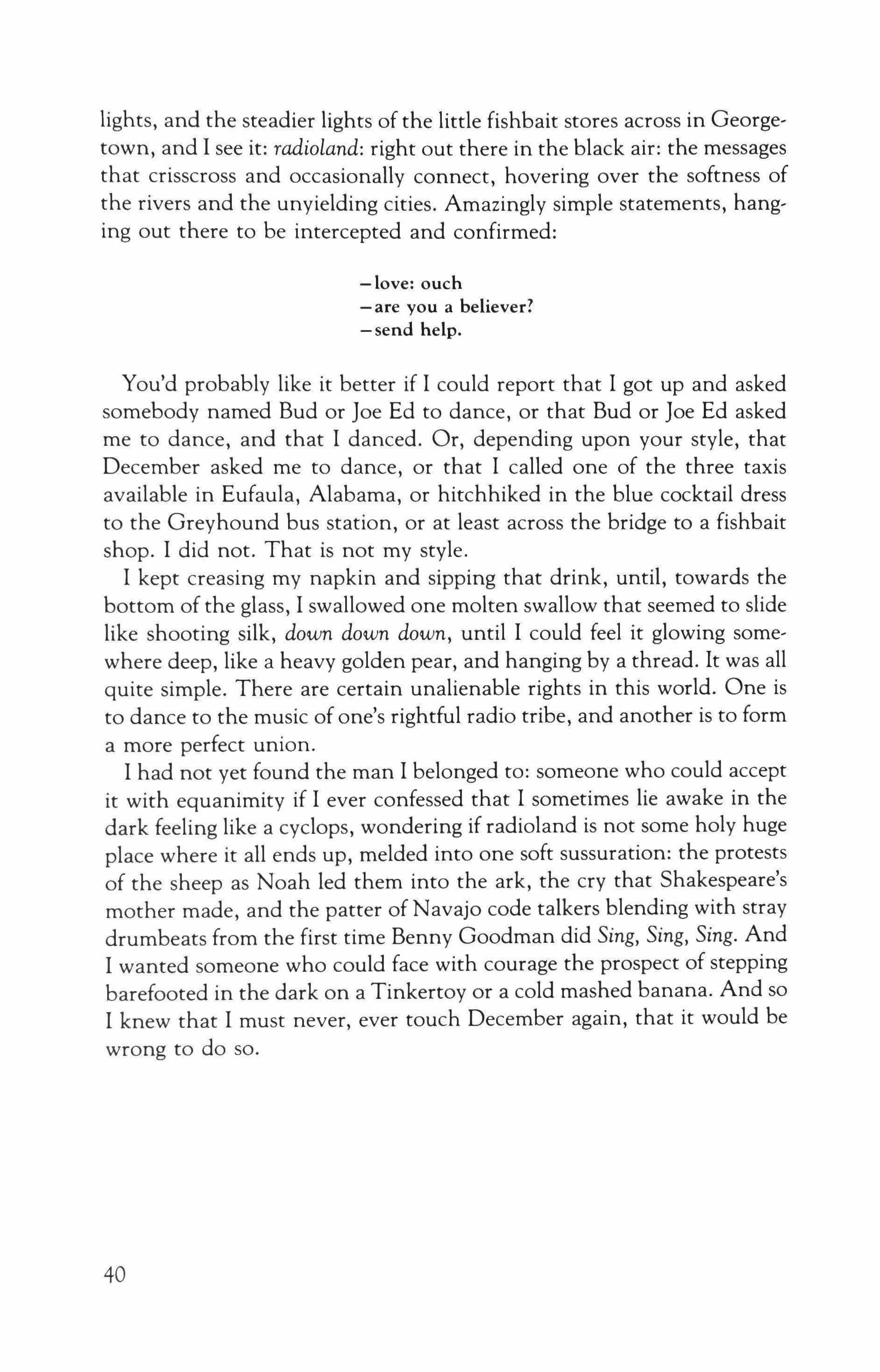
lights, and the steadier lights of the little fishbait stores across in Georgetown, and I see it: radioland: right out there in the black air: the messages that crisscross and occasionally connect, hovering over the softness of the rivers and the unyielding cities. Amazingly simple statements, hanging out there to be intercepted and confirmed:
-love: ouch
-are you a believer?
-send help.
You'd probably like it better if I could report that I got up and asked somebody named Bud or Joe Ed to dance, or that Bud or Joe Ed asked me to dance, and that I danced. Or, depending upon your style, that December asked me to dance, or that I called one of the three taxis available in Eufaula, Alabama, or hitchhiked in the blue cocktail dress to the Greyhound bus station, or at least across the bridge to a fishbait shop. I did not. That is not my style.
I kept creasing my napkin and sipping that drink, until, towards the bottom of the glass, I swallowed one molten swallow that seemed to slide like shooting silk, down down down, until I could feel it glowing somewhere deep, like a heavy golden pear, and hanging by a thread. It was all quite simple. There are certain unalienable rights in this world. One is to dance to the music of one's rightful radio tribe, and another is to form a more perfect union.
I had not yet found the man I belonged to: someone who could accept it with equanimity if I ever confessed that I sometimes lie awake in the dark feeling like a cyclops, wondering if radioland is not some holy huge place where it all ends up, melded into one soft sussuration: the protests of the sheep as Noah led them into the ark, the cry that Shakespeare's mother made, and the patter of Navajo code talkers blending with stray drumbeats from the first time Benny Goodman did Sing, Sing, Sing. And I wanted someone who could face with courage the prospect of stepping barefooted in the dark on a Tinkertoy or a cold mashed banana. And so I knew that I must never, ever touch December again, that it would be wrong to do so.
40
Four Stories
Alberto Savinio
 Translated by Gilbert Alter-Gilbert
Translated by Gilbert Alter-Gilbert
Vendetta
A single, sorrow-filled month after the death of my poor Victor, it takes a rare presumption, Monsieur Ernest, to make me propositions such as these! I don't want to hear them! Go away! No! No! No! A thousand times No! But the indignation of the beautiful Madame Hyacinth is more apparent than real, for Madame Hyacinth is already bending forward, already she is inclining her face, already her head is tilted towards the divan. And the young Monsieur Ernest, conducting his consummate strategic maneuver, positions himself to pluck from the garden of the widow, the same ripe fruit that poor Monsieur Victor savored legally every Saturday night.
At this moment, the door opens without a sound, and a pink foot, a plaster foot, appears on the threshold, pausing just long enough to gather momentum and, after describing a perfect parabola, lets fly a prodigious kick which lands squarely upon the seat of the pants of Monsieur Ernest. Now, lightly and leapingly, it traverses the salon, recrosses the sill, and resumes its place of repose in the broom closet, among the worn-out luggage and old, beat-up mops, where no one has given a thought to it since the day that its creator, the orthopedist, introduced it to this house to serve as a model for the special shoes worn by poor Monsieur Victor, lame in the right foot.
41

Domestic Forest
Everywhere in those days, the press was abuzz with news of a startling phenomenon in the person of Doctor Eleuthere Mikalis, Europe's premier nudist. While visiting the Grecian capitol, I couldn't pass up the opportunity to make the acquaintance of so picturesquely famous a personage. I do not know in which branch of knowledge Eleuthere Mikalis had taken his diploma; I can say with certainty, however, that he was a gentleman both polite and punctual. I sent a letter to him by Thursday's last courier; the next day, I received a reply from the doctor, insisting that I present myself at his house at one o'clock that same afternoon.
I prepared myself for that visit as if for a romantic rendezvous. But I couldn't escape the gnawing fear that our interview might come off badly. Piraeus Street, across from the conservatory, the amiable letter specified.
The afternoon sweltered with summer heat. The windows of the conservatory noisily exhaled the resounding chords of a Chopin polonaise, the liquid arpeggios of a symphony of Saint-Saens, and a creaky chromatic scale executed by a tireless trombone.
I was going to inquire as to the whereabouts of the elevator from a doorman who was braided and epauletted like a general and majestically seated in a glass booth, when I don't know what defensive instinct impelled me to take the stairs; whether to command a more thorough sweep of the zone of operations and to permit myself to monitor any movements around me, or, perhaps, should the need arise, to be situated in the most advantageous position from which to take flight.
The lower floors resembled those of certain commercial office buildings; the other floors were obviously reserved for residential habitation. White wall paneling, rising to the height of a man, was interrupted now and then by a few doors of no particular mystery, doors which gave access, here to the law firm of attorney Spiridion Papanastassiu, there to the workroom of the engineer Protopapadakis, specialist in pumps and derricks; another was the clinic of Sofrosine Koromilas, licensed midwife. But in proportion as I progressed above street level, the doors seemed more and more anxious to conceal some domiciliary secret. From the third floor upwards, the door plaques still stated the names of
42
the residents, but, with regard to their professions and titles, kept the strictest and most rigorous silence. Finally, arriving at the uppermost landing, 1 found myself head to head with a diminutive portal, bearing no nameplate, and marked with the figure thirteen.
A domestic servant bald as an egg brought me into the reception area of a large, formal office, from the far end of which Doctor Mikalis came to greet me with an icy affability. The doctor appeared to be a gentleman bearded and severely dressed in black, but no sooner had 1 formed this first impression, than 1 perceived that, clothed in his "natural" attire, Eleuthere Mikalis was completely nude.
-Are you here to see the forest? he asked me; and, acknowledging my affirmative response, he pointed with his finger to a small door which opened between two sections of the vast library.
-Remove your cloak, instructed the doctor. You may keep your hat upon your head.
-And you?
1 will go as 1 am, Mikalis said.
Down the hallway blew the cool, fresh air of the countryside.
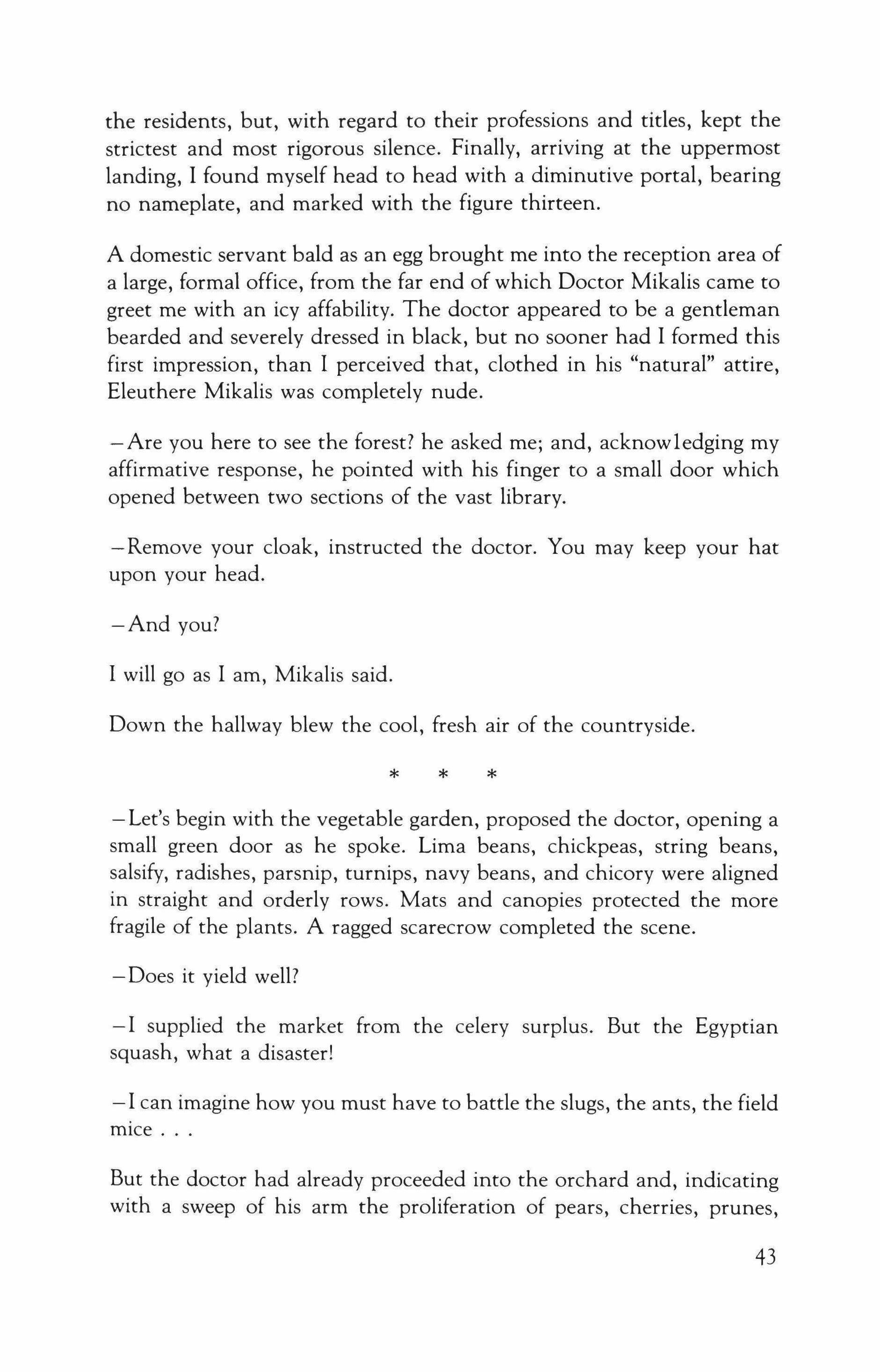
- Let's begin with the vegetable garden, proposed the doctor, opening a small green door as he spoke. Lima beans, chickpeas, string beans, salsify, radishes, parsnip, turnips, navy beans, and chicory were aligned in straight and orderly rows. Mats and canopies protected the more fragile of the plants. A ragged scarecrow completed the scene.
- Does it yield well?
-I supplied the market from the celery surplus. But the Egyptian squash, what a disaster!
-I can imagine how you must have to battle the slugs, the ants, the field mice
But the doctor had already proceeded into the orchard and, indicating with a sweep of his arm the proliferation of pears, cherries, prunes,
* * *
43
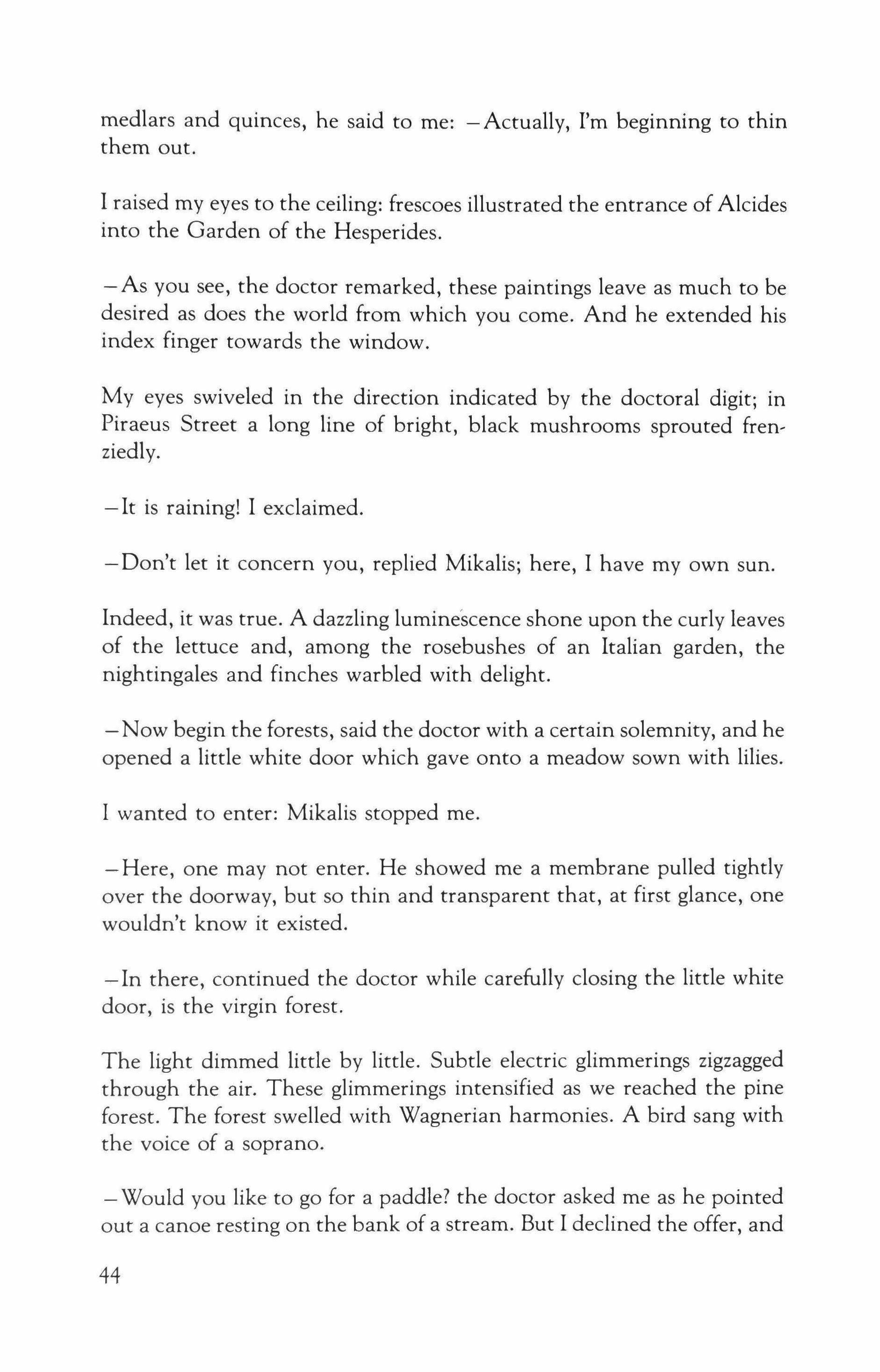
medlars and quinces, he said to me: - Actually, I'm beginning to thin them out.
I raised my eyes to the ceiling: frescoes illustrated the entrance of Alcides into the Garden of the Hesperides.
- As you see, the doctor remarked, these paintings leave as much to be desired as does the world from which you come. And he extended his index finger towards the window.
My eyes swiveled in the direction indicated by the doctoral digit; in Piraeus Street a long line of bright, black mushrooms sprouted frenziedly.
-It is raining! I exclaimed.
- Don't let it concern you, replied Mikalis; here, I have my own sun.
Indeed, it was true. A dazzling luminescence shone upon the curly leaves of the lettuce and, among the rosebushes of an Italian garden, the nightingales and finches warbled with delight.
- Now begin the forests, said the doctor with a certain solemnity, and he opened a little white door which gave onto a meadow sown with lilies.
I wanted to enter: Mikalis stopped me.
- Here, one may not enter. He showed me a membrane pulled tightly over the doorway, but so thin and transparent that, at first glance, one wouldn't know it existed.
-In there, continued the doctor while carefully closing the little white door, is the virgin forest.
The light dimmed little by little. Subtle electric glimmerings zigzagged through the air. These glimmerings intensified as we reached the pine forest. The forest swelled with Wagnerian harmonies. A bird sang with the voice of a soprano.
- Would you like to go for a paddle? the doctor asked me as he pointed out a canoe resting on the bank of a stream. But I declined the offer, and
44
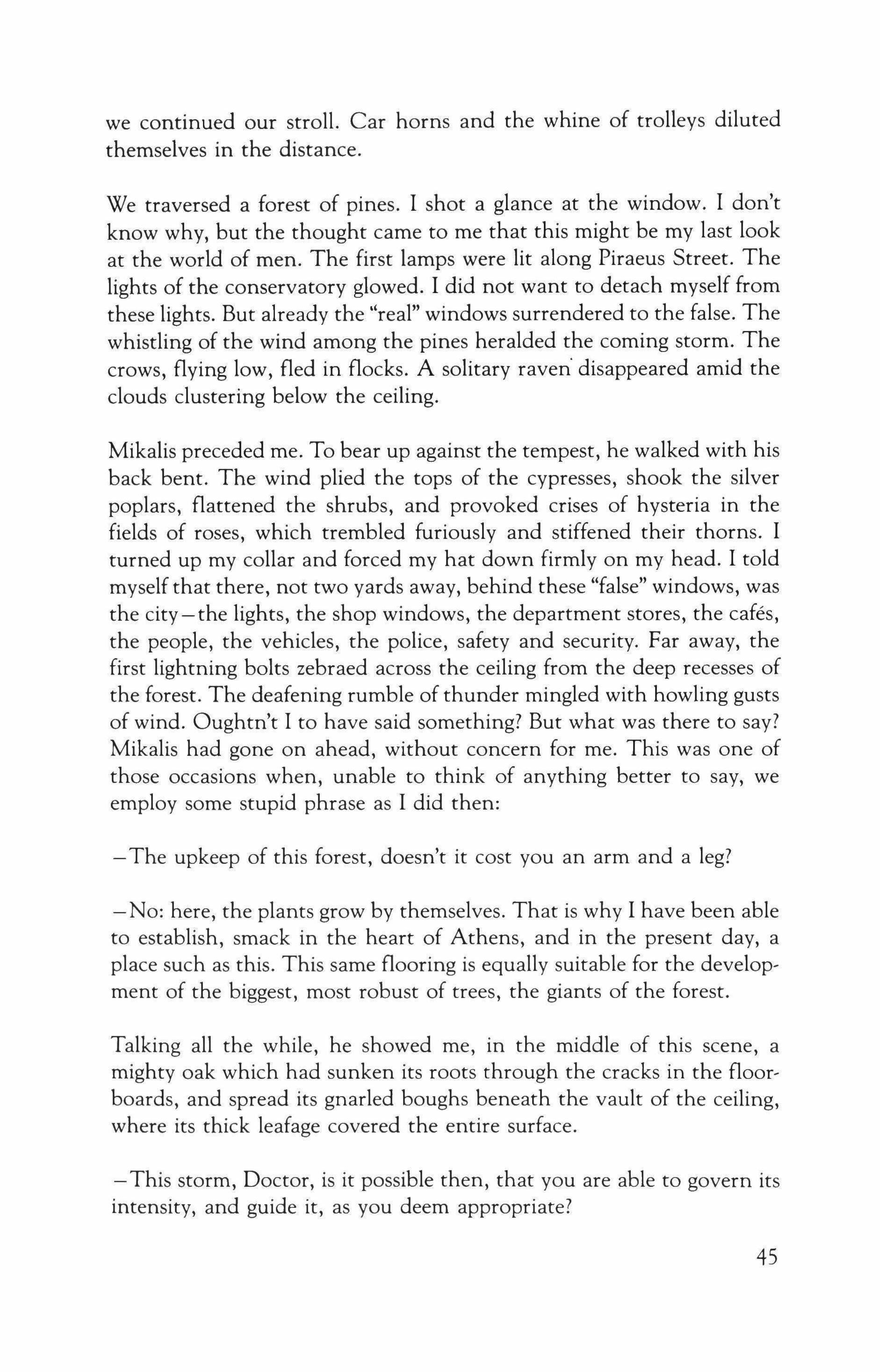
we continued our stroll. Car horns and the whine of trolleys diluted themselves in the distance.
We traversed a forest of pines. I shot a glance at the window. I don't know why, but the thought carne to me that this might be my last look at the world of men. The first lamps were lit along Piraeus Street. The lights of the conservatory glowed. I did not want to detach myself from these lights. But already the "real" windows surrendered to the false. The whistling of the wind among the pines heralded the coming storm. The crows, flying low, fled in flocks. A solitary raven' disappeared amid the clouds clustering below the ceiling.
Mikalis preceded me. To bear up against the tempest, he walked with his back bent. The wind plied the tops of the cypresses, shook the silver poplars, flattened the shrubs, and provoked crises of hysteria in the fields of roses, which trembled furiously and stiffened their thorns. I turned up my collar and forced my hat down firmly on my head. I told myself that there, not two yards away, behind these "false" windows, was the city-the lights, the shop windows, the department stores, the cafes, the people, the vehicles, the police, safety and security. Far away, the first lightning bolts zebraed across the ceiling from the deep recesses of the forest. The deafening rumble of thunder mingled with howling gusts of wind. Oughtn't I to have said something? But what was there to say? Mikalis had gone on ahead, without concern for me. This was one of those occasions when, unable to think of anything better to say, we employ some stupid phrase as I did then:
- The upkeep of this forest, doesn't it cost you an arm and a leg?
- No: here, the plants grow by themselves. That is why I have been able to establish, smack in the heart of Athens, and in the present day, a place such as this. This same flooring is equally suitable for the development of the biggest, most robust of trees, the giants of the forest.
Talking all the while, he showed me, in the middle of this scene, a mighty oak which had sunken its roots through the cracks in the floorboards, and spread its gnarled boughs beneath the vault of the ceiling, where its thick leafage covered the entire surface.
- This storm, Doctor, is it possible then, that you are able to govern its intensity, and guide it, as you deem appropriate?
45
-Not on your life! screeched the doctor. I gathered all of Nature into my house, but this tour de force brought with it certain handicaps. Over the elements, I haven't the slightest authority. At some future date, I hope to achieve dominion over them, but for the present it is the elements which dominate me.
A flash blinded me; a sickening terror clutched at my stomach.
The doctor was no longer there. The voice of my father, dead twenty years, called to me from a neighboring room.
The room was deserted: inhabited only by a solitary oak which the hurricane shook and which the thunderbolts lit up with a sinister glow.
The voice called from another place, always farther away. I sped through a labyrinth of chambers, each resembling the one before, each inhabited by a solitary oak, in the middle of a raging storm, chasing after the voice of my father who died twenty years ago

Uneasy about my disappearance, the Italian consulate launched a search, in collaboration with the local police. They found me at the foot of an oak. The storm had passed. A radiant sun illumined the forest of Doctor Mikalis. I was unconscious, but safe.
* * *
46
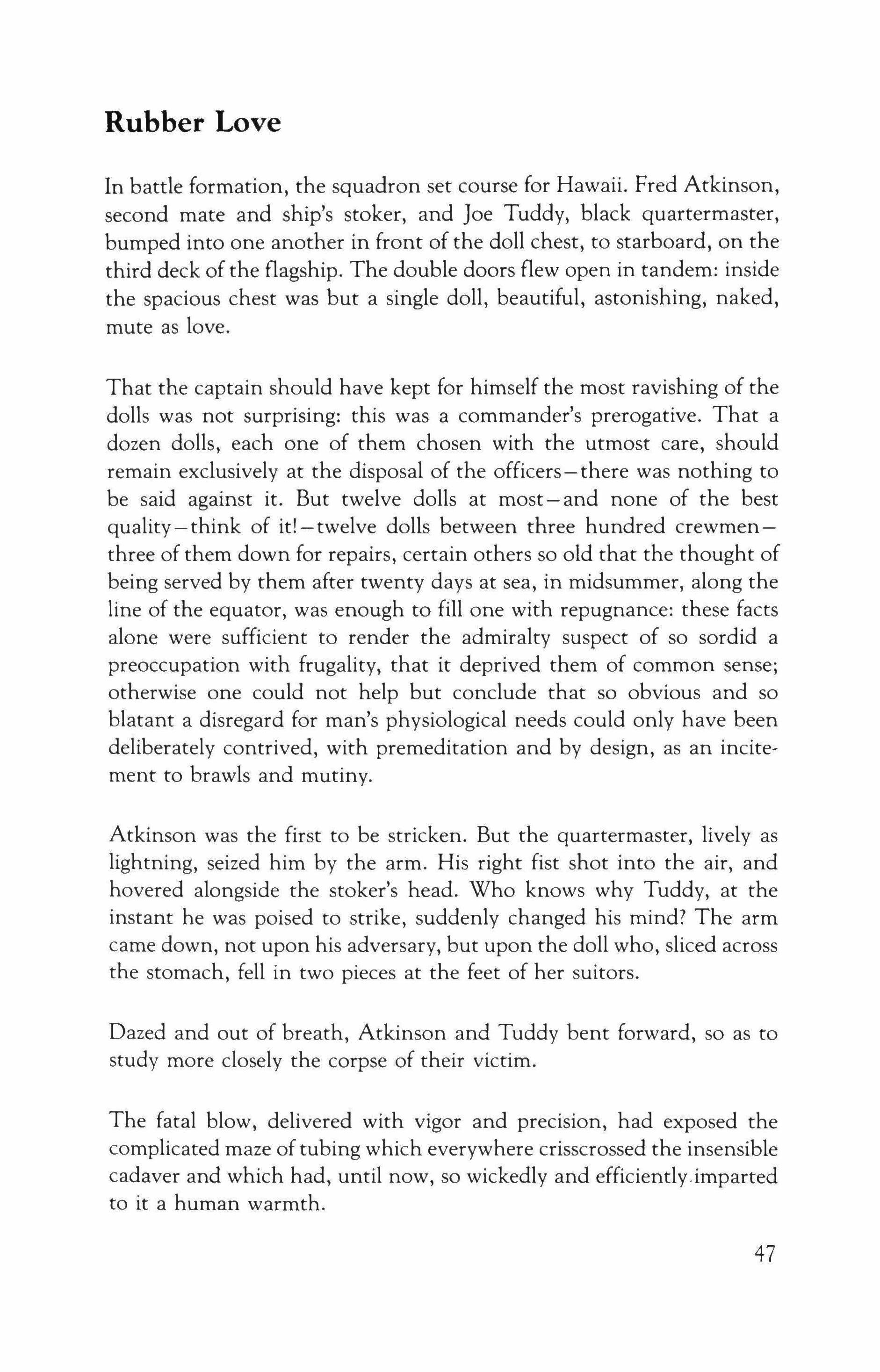
Rubber Love
In battle formation, the squadron set course for Hawaii. Fred Atkinson, second mate and ship's stoker, and Joe Tuddy, black quartermaster, bumped into one another in front of the doll chest, to starboard, on the third deck of the flagship. The double doors flew open in tandem: inside the spacious chest was but a single doll, beautiful, astonishing, naked, mute as love.
That the captain should have kept for himself the most ravishing of the dolls was not surprising: this was a commander's prerogative. That a dozen dolls, each one of them chosen with the utmost care, should remain exclusively at the disposal of the officers-there was nothing to be said against it. But twelve dolls at most - and none of the best quality - think of it! - twelve dolls between three hundred crewmenthree of them down for repairs, certain others so old that the thought of being served by them after twenty days at sea, in midsummer, along the line of the equator, was enough to fill one with repugnance: these facts alone were sufficient to render the admiralty suspect of so sordid a preoccupation with frugality, that it deprived them of common sense; otherwise one could not help but conclude that so obvious and so blatant a disregard for man's physiological needs could only have been deliberately contrived, with premeditation and by design, as an incitement to brawls and mutiny.
Atkinson was the first to be stricken. But the quartermaster, lively as lightning, seized him by the arm. His right fist shot into the air, and hovered alongside the stoker's head. Who knows why Tuddy, at the instant he was poised to strike, suddenly changed his mind? The arm came down, not upon his adversary, but upon the doll who, sliced across the stomach, fell in two pieces at the feet of her suitors.
Dazed and out of breath, Atkinson and Tuddy bent forward, so as to study more closely the corpse of their victim.
The fatal blow, delivered with vigor and precision, had exposed the complicated maze of tubing which everywhere crisscrossed the insensible cadaver and which had, until now, so wickedly and efficiently.imparted to it a human warmth.
47
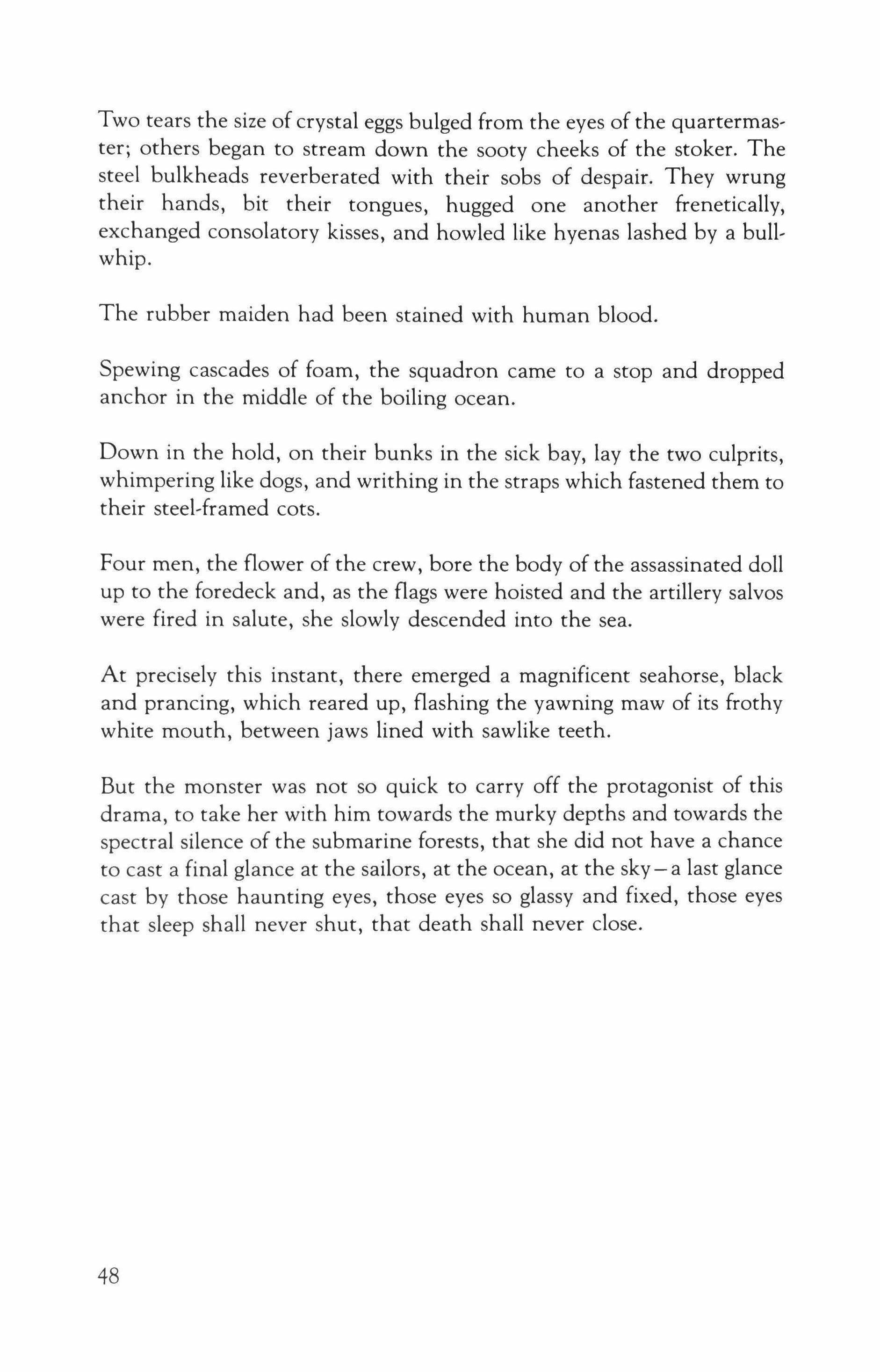
Two tears the size of crystal eggs bulged from the eyes of the quartermaster; others began to stream down the sooty cheeks of the stoker. The steel bulkheads reverberated with their sobs of despair. They wrung their hands, bit their tongues, hugged one another frenetically, exchanged consolatory kisses, and howled like hyenas lashed by a bullwhip.
The rubber maiden had been stained with human blood.
Spewing cascades of foam, the squadron came to a stop and dropped anchor in the middle of the boiling ocean.
Down in the hold, on their bunks in the sick bay, lay the two culprits, whimpering like dogs, and writhing in the straps which fastened them to their steel-framed cots.
Four men, the flower of the crew, bore the body of the assassinated doll up to the foredeck and, as the flags were hoisted and the artillery salvos were fired in salute, she slowly descended into the sea.
At precisely this instant, there emerged a magnificent seahorse, black and prancing, which reared up, flashing the yawning maw of its frothy white mouth, between jaws lined with sawlike teeth.
But the monster was not so quick to carry off the protagonist of this drama, to take her with him towards the murky depths and towards the spectral silence of the submarine forests, that she did not have a chance to cast a final glance at the sailors, at the ocean, at the sky - a last glance cast by those haunting eyes, those eyes so glassy and fixed, those eyes that sleep shall never shut, that death shall never close.
48
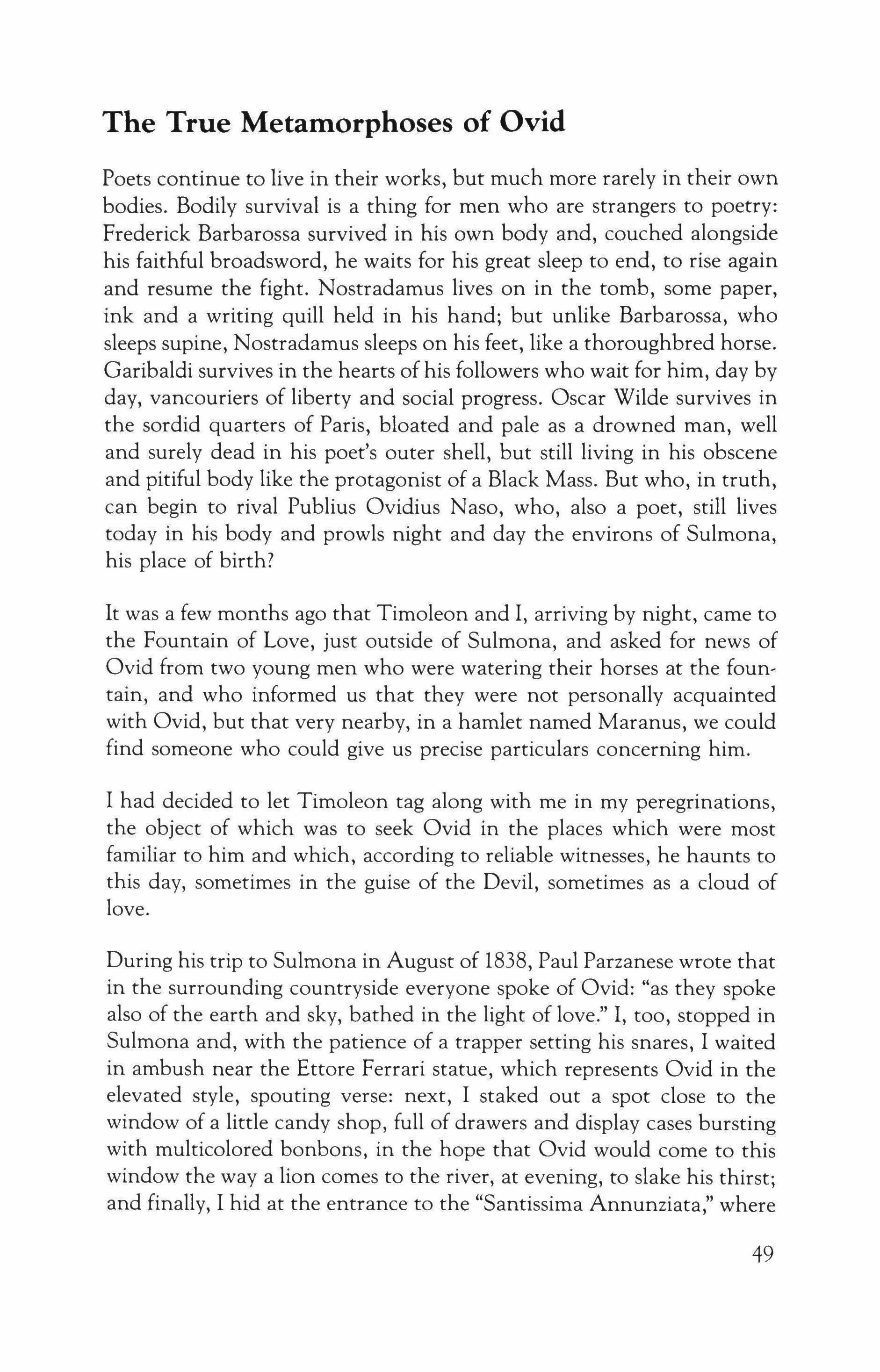
The True Metamorphoses of Ovid
Poets continue to live in their works, but much more rarely in their own bodies. Bodily survival is a thing for men who are strangers to poetry: Frederick Barbarossa survived in his own body and, couched alongside his faithful broadsword, he waits for his great sleep to end, to rise again and resume the fight. Nostradamus lives on in the tomb, some paper, ink and a writing quill held in his hand; but unlike Barbarossa, who sleeps supine, Nostradamus sleeps on his feet, like a thoroughbred horse. Garibaldi survives in the hearts of his followers who wait for him, day by day, vancouriers of liberty and social progress. Oscar Wilde survives in the sordid quarters of Paris, bloated and pale as a drowned man, well and surely dead in his poet's outer shell, but still living in his obscene and pitiful body like the protagonist of a Black Mass. But who, in truth, can begin to rival Publius Ovidius Naso, who, also a poet, still lives today in his body and prowls night and day the environs of Sulmona, his place of birth?
It was a few months ago that Timoleon and I, arriving by night, came to the Fountain of Love, just outside of Sulmona, and asked for news of Ovid from two young men who were watering their horses at the fountain, and who informed us that they were not personally acquainted with Ovid, but that very nearby, in a hamlet named Maranus, we could find someone who could give us precise particulars concerning him.
I had decided to let Timoleon tag along with me in my peregrinations, the object of which was to seek Ovid in the places which were most familiar to him and which, according to reliable witnesses, he haunts to this day, sometimes in the guise of the Devil, sometimes as a cloud of love.
During his trip to Sulmona in August of 1838, Paul Parzanese wrote that in the surrounding countryside everyone spoke of Ovid: "as they spoke also of the earth and sky, bathed in the light of love." I, too, stopped in Sulmona and, with the patience of a trapper setting his snares, I waited in ambush near the Ettore Ferrari statue, which represents Ovid in the elevated style, spouting verse: next, I staked out a spot close to the window of a little candy shop, full of drawers and display cases bursting with multicolored bonbons, in the hope that Ovid would come to this window the way a lion comes to the river, at evening, to slake his thirst; and finally, I hid at the entrance to the "Santissima Annunziata," where
49
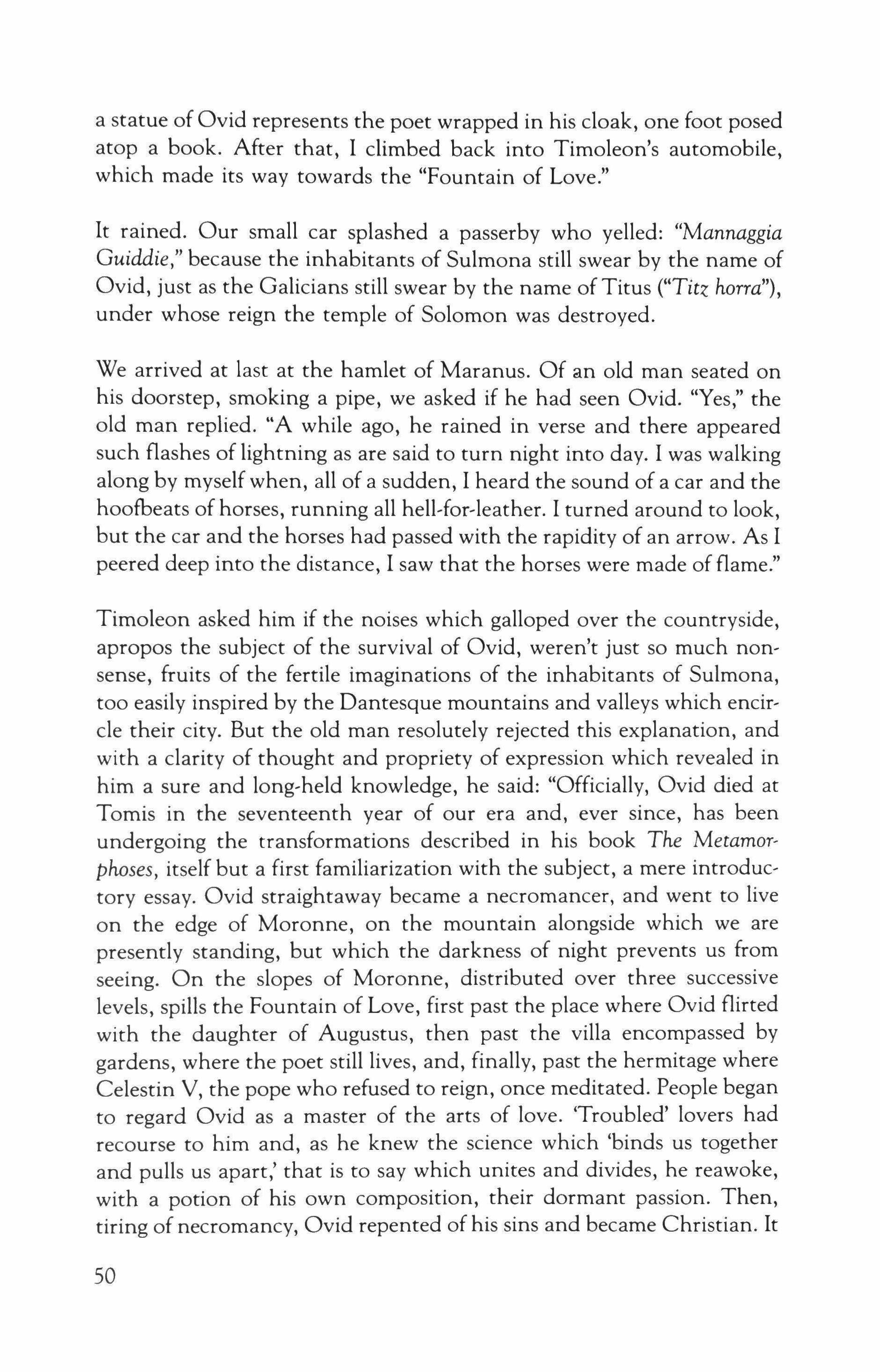
a statue of Ovid represents the poet wrapped in his cloak, one foot posed atop a book. After that, I climbed back into Timoleon's automobile, which made its way towards the "Fountain of Love."
It rained. Our small car splashed a passerby who yelled: "Mannaggia Guiddie," because the inhabitants of Sulmona still swear by the name of Ovid, just as the Galicians still swear by the name of Titus ("Titz horra"), under whose reign the temple of Solomon was destroyed.
We arrived at last at the hamlet of Maranus. Of an old man seated on his doorstep, smoking a pipe, we asked if he had seen Ovid. "Yes," the old man replied. "A while ago, he rained in verse and there appeared such flashes of lightning as are said to turn night into day. I was walking along by myself when, all of a sudden, I heard the sound of a car and the hoofbeats of horses, running all hell-for-leather. I turned around to look, but the car and the horses had passed with the rapidity of an arrow. As I peered deep into the distance, I saw that the horses were made of flame."
Timoleon asked him if the noises which galloped over the countryside, apropos the subject of the survival of Ovid, weren't just so much nonsense, fruits of the fertile imaginations of the inhabitants of Sulmona, too easily inspired by the Dantesque mountains and valleys which encircle their city. But the old man resolutely rejected this explanation, and with a clarity of thought and propriety of expression which revealed in him a sure and long-held knowledge, he said: "Officially, Ovid died at Tomis in the seventeenth year of our era and, ever since, has been undergoing the transformations described in his book The Metamorphoses, itself but a first familiarization with the subject, a mere introductory essay. Ovid straightaway became a necromancer, and went to live on the edge of Moronne, on the mountain alongside which we are presently standing, but which the darkness of night prevents us from seeing. On the slopes of Moronne, distributed over three successive levels, spills the Fountain of Love, first past the place where Ovid flirted with the daughter of Augustus, then past the villa encompassed by gardens, where the poet still lives, and, finally, past the hermitage where Celestin V, the pope who refused to reign, once meditated. People began to regard Ovid as a master of the arts of love. 'Troubled' lovers had recourse to him and, as he knew the science which 'binds us together and pulls us apart,' that is to say which unites and divides, he reawoke, with a potion of his own composition, their dormant passion. Then, tiring of necromancy, Ovid repented of his sins and became Christian. It
50

should be noted, spiritually speaking, that it has always been and still remains the memory of his Christian virtues which mosts endears Ovid to the barbarous populations near whom he spent his bitter exile. The peasants of the precincts still speak of how, in those distant times, a man of extraordinary nobility arrived among them on the banks of the Tiber. He had the sweetness of a child and the benevolence of a father.
"Often, he sighed or softly whispered to himself. But when he addressed someone, it is said that honey and nectar spilled from his lips. The same local denizens affirm that Ovid wrote a few poems in the Moldavian language, of which, unfortunately, there remains not a trace.
"Eugene Delacroix, in one of his frescoes at the Bourbon Palace, depicted Ovid in a soft and languid mood, encircled by admiring Scyrhians who, stupefied and deeply moved, not daring to approach his person, competed with one another to offer him magnificent gifts. Ovid was profoundly learned. His works became innumerable. When he wrote, his plume flew over the parchment without being withdrawn from it, nor ever once being dipped in the inkwell. He attributed his wisdom to his nose, and it is for this reason that he is called Naso. 'A man with a good nose,' as we say in our day, corresponds to the Latin expression: 'emunctare naris.' Jean des Buonsignori, who lived around the year 1300 and wrote Allegorie ed Exposizioni della Metamorfosi, explained that Ovid was also called Naso 'because, just as we use our noses to detect the odors of things, so Ovid was able to detect odor, and came to know all there was to know about his century.'
"Becoming officially Christian, Ovid founded, here where we are, a school where he taught the children Christian doctrine and The Book of Seven Trumpets. He compiled a treasury of Christian maxims and a collection of fables. He transmitted the light of his knowledge to Saint Pierre Celestin, who met with him up there in his hermitage on Mount Moronne, and with whom he talked all night while stalking the cells of the monastery. Of the numerous works written by Ovid 'next,' nothing remains. At the beginning of the last century, there was a dignitary of Sulmona who owned a book of Ovid, but a general of Napoleon, who came upon his house purely by accident, wanted the book and took it. One Monday morning soon after, the general set sail for France, and carried the book with him, thinking to afford his fellow citizens the delight of sharing its discoveries and inventions. The reputation of Ovid reached even the King of Naples, who would no longer make laws
51
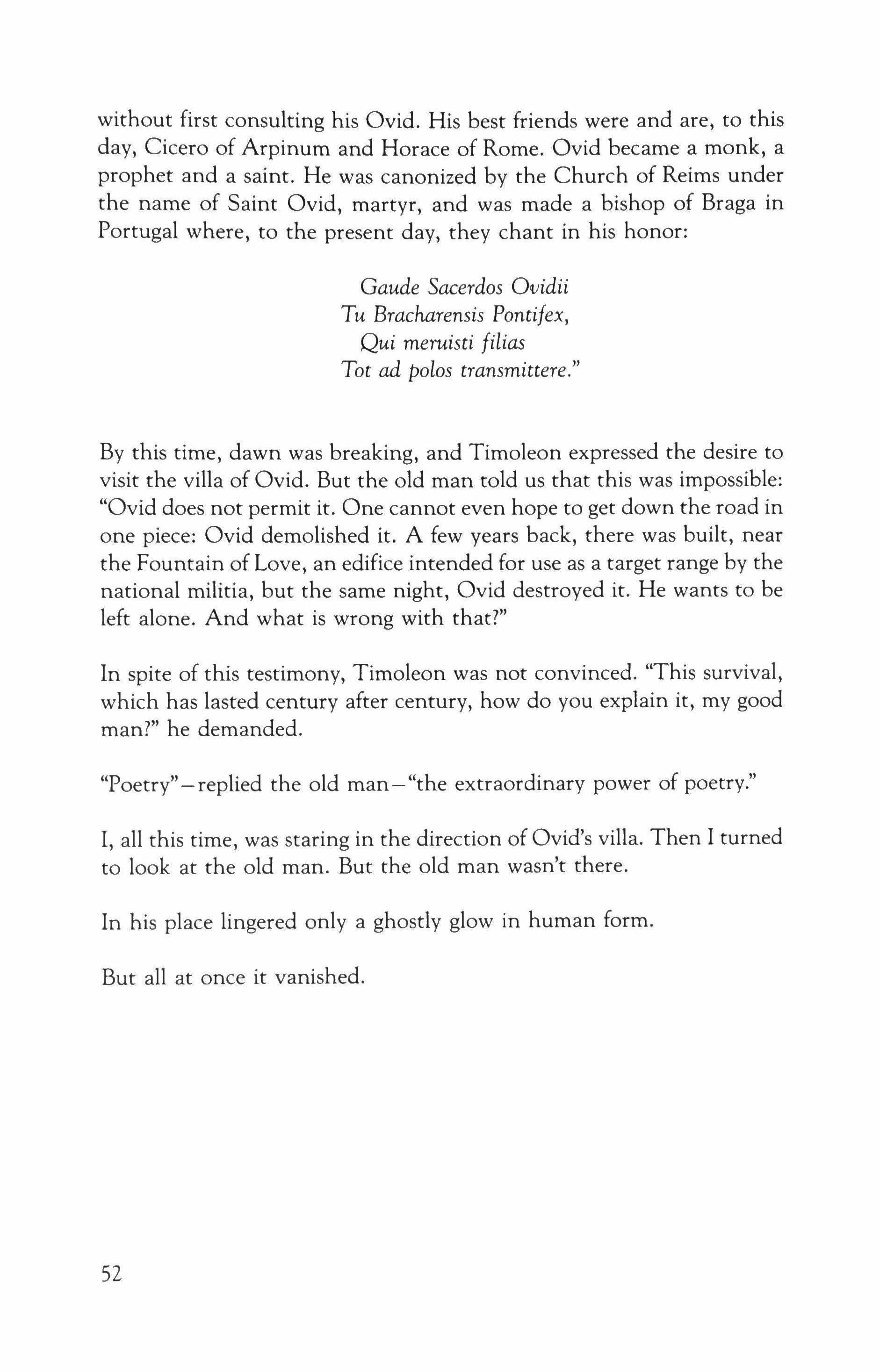
without first consulting his Ovid. His best friends were and are, to this day, Cicero of Arpinum and Horace of Rome. Ovid became a monk, a prophet and a saint. He was canonized by the Church of Reims under the name of Saint Ovid, martyr, and was made a bishop of Braga in Portugal where, to the present day, they chant in his honor:
Gaude Sacerdos Ovidii
Tu Bracharensis Pontifex, Qui meruisti filias
Tot ad polos transmittere."
By this time, dawn was breaking, and Timoleon expressed the desire to visit the villa of Ovid. But the old man told us that this was impossible: "Ovid does not permit it. One cannot even hope to get down the road in one piece: Ovid demolished it. A few years back, there was built, near the Fountain of Love, an edifice intended for use as a target range by the national militia, but the same night, Ovid destroyed it. He wants to be left alone. And what is wrong with that?"
In spite of this testimony, Timoleon was not convinced. "This survival, which has lasted century after century, how do you explain it, my good man?" he demanded.
"Poetry" - replied the old man - "the extraordinary power of poetry."
I, all this time, was staring in the direction of Ovid's villa. Then I turned to look at the old man. But the old man wasn't there.
In his place lingered only a ghostly glow in human form.
But all at once it vanished.
52
The Milkweed Parables
Steve Fay

We bear the seeds of our return forever, the flowers of our leaving, fruit of flight
- Muriel Rukeyser
I. The Keeper
1
The girl saw something like it in the eyes of the men as they discussed how best to stack straw or butcher hogs.
Silently stirring the lard kettle with the heavy paddle, she would watch them argue about seasoning the sausage, then later, alone in the woods, try to wrinkle her nose like Augie Ochslein as if to interrupt her uncle, Nein-Kein garlic! Oskar, du weisst-no garlic in mine.
The others would laugh at him, but Mr. Ochslein clearly took pride in being the most persnickety neighbor.
Turning over leaves to find the new ginger shoots, she knew no adult would have appreciated such a finickiness in her, unless it was applied to swishing the bluebottles away from the cooling mincemeat pies.
So her vision grew in her eyes and her fingertips, and was called out at evening when the crows gathered along the opposite bluff of the creek.
53
And she said to no one but herself, Tomorrow the hickory buds will open their small hands and call down rain.
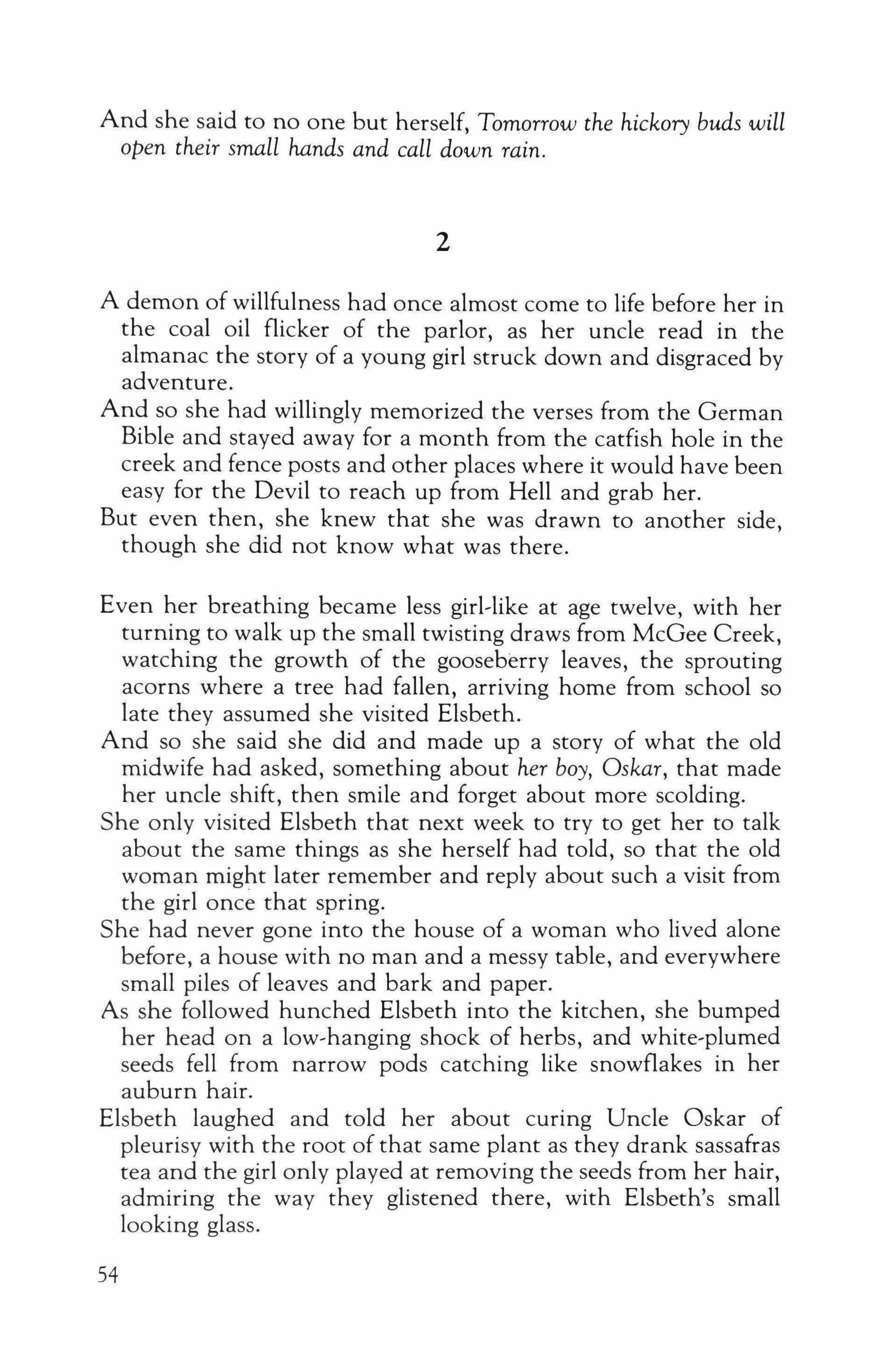
2
A demon of willfulness had once almost come to life before her in the coal oil flicker of the parlor, as her uncle read in the almanac the story of a young girl struck down and disgraced by adventure.
And so she had willingly memorized the verses from the German Bible and stayed away for a month from the catfish hole in the creek and fence posts and other places where it would have been easy for the Devil to reach up from Hell and grab her.
But even then, she knew that she was drawn to another side, though she did not know what was there.
Even her breathing became less girl-like at age twelve, with her turning to walk up the small twisting draws from McGee Creek, watching the growth of the gooseberry leaves, the sprouting acorns where a tree had fallen, arriving home from school so late they assumed she visited Elsbeth.
And so she said she did and made up a story of what the old midwife had asked, something about her boy, Oskar, that made her uncle shift, then smile and forget about more scolding.
She only visited Elsbeth that next week to try to get her to talk about the same things as she herself had told, so that the old woman might later remember and reply about such a visit from the girl once that spring.
She had never gone into the house of a woman who lived alone before, a house with no man and a messy table, and everywhere small piles of leaves and bark and paper.
As she followed hunched Elsbeth into the kitchen, she bumped her head on a low-hanging shock of herbs, and white-plumed seeds fell from narrow pods catching like snowflakes in her auburn hair.
Elsbeth laughed and told her about curing Uncle Oskar of pleurisy with the root of that same plant as they drank sassafras tea and the girl only played at removing the seeds from her hair, admiring the way they glistened there, with Elsbeth's small looking glass.
54
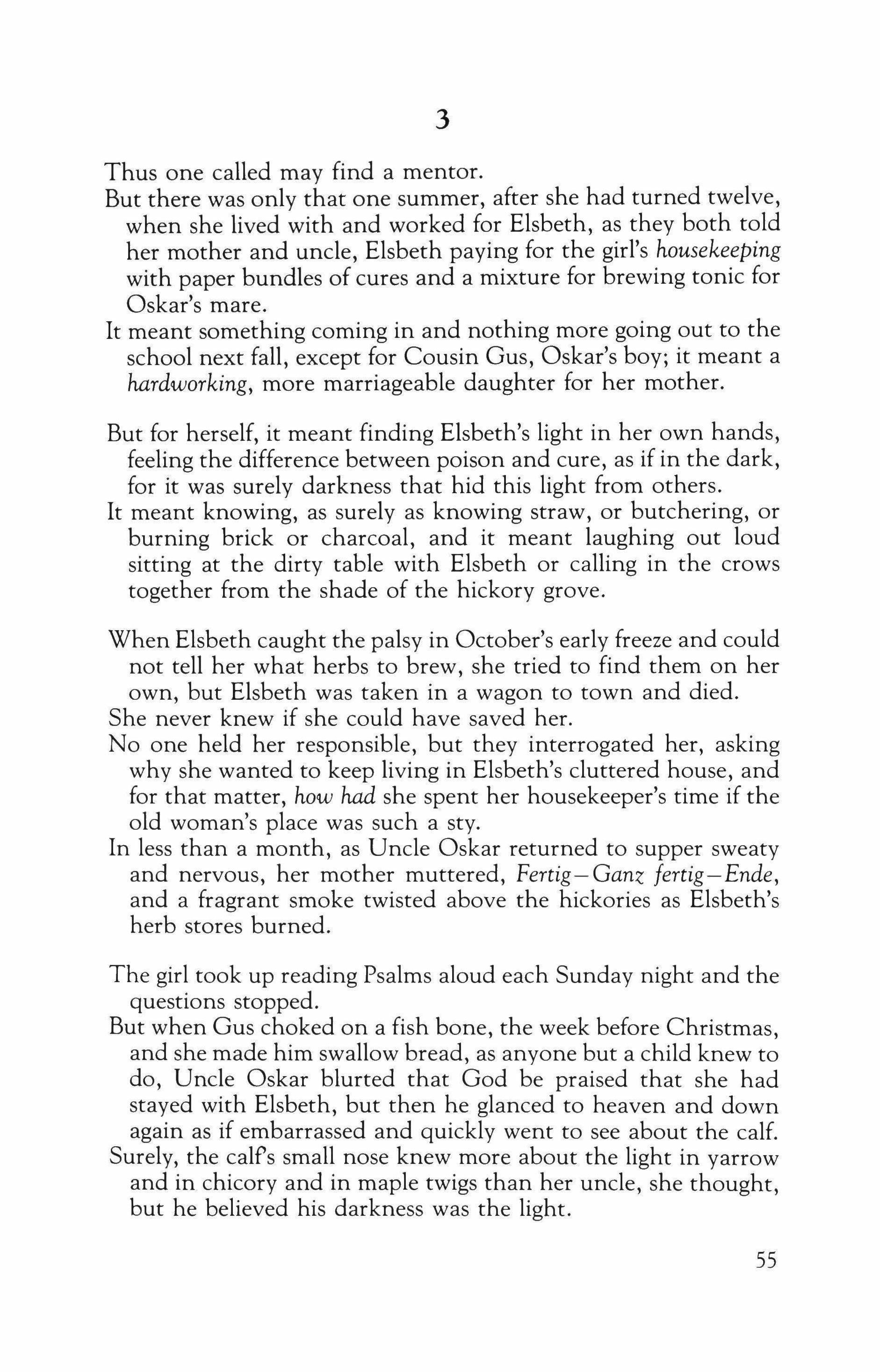
Thus one called may find a mentor.
But there was only that one summer, after she had turned twelve, when she lived with and worked for Elsbeth, as they both told her mother and uncle, Elsbeth paying for the girl's housekeeping with paper bundles of cures and a mixture for brewing tonic for Oskar's mare.
It meant something coming in and nothing more going out to the school next fall, except for Cousin Gus, Oskar's boy; it meant a hardworking, more marriageable daughter for her mother.
But for herself, it meant finding Elsbeth's light in her own hands, feeling the difference between poison and cure, as if in the dark, for it was surely darkness that hid this light from others.
It meant knowing, as surely as knowing straw, or butchering, or burning brick or charcoal, and it meant laughing out loud sitting at the dirty table with Elsbeth or calling in the crows together from the shade of the hickory grove.
When Elsbeth caught the palsy in October's early freeze and could not tell her what herbs to brew, she tried to find them on her own, but Elsbeth was taken in a wagon to town and died.
She never knew if she could have saved her.
No one held her responsible, but they interrogated her, asking why she wanted to keep living in Elsbeth's cluttered house, and for that matter, how had she spent her housekeeper's time if the old woman's place was such a sty.
In less than a month, as Uncle Oskar returned to supper sweaty and nervous, her mother muttered, Fertig-Ganz /ertig-Ende, and a fragrant smoke twisted above the hickories as Elsbeth's herb stores burned.
The girl took up reading Psalms aloud each Sunday night and the questions stopped.
But when Gus choked on a fish bone, the week before Christmas, and she made him swallow bread, as anyone but a child knew to do, Uncle Oskar blurted that God be praised that she had stayed with Elsbeth, but then he glanced to heaven and down again as if embarrassed and quickly went to see about the calf.
Surely, the calfs small nose knew more about the light in yarrow and in chicory and in maple twigs than her uncle, she thought, but he believed his darkness was the light.
3
55
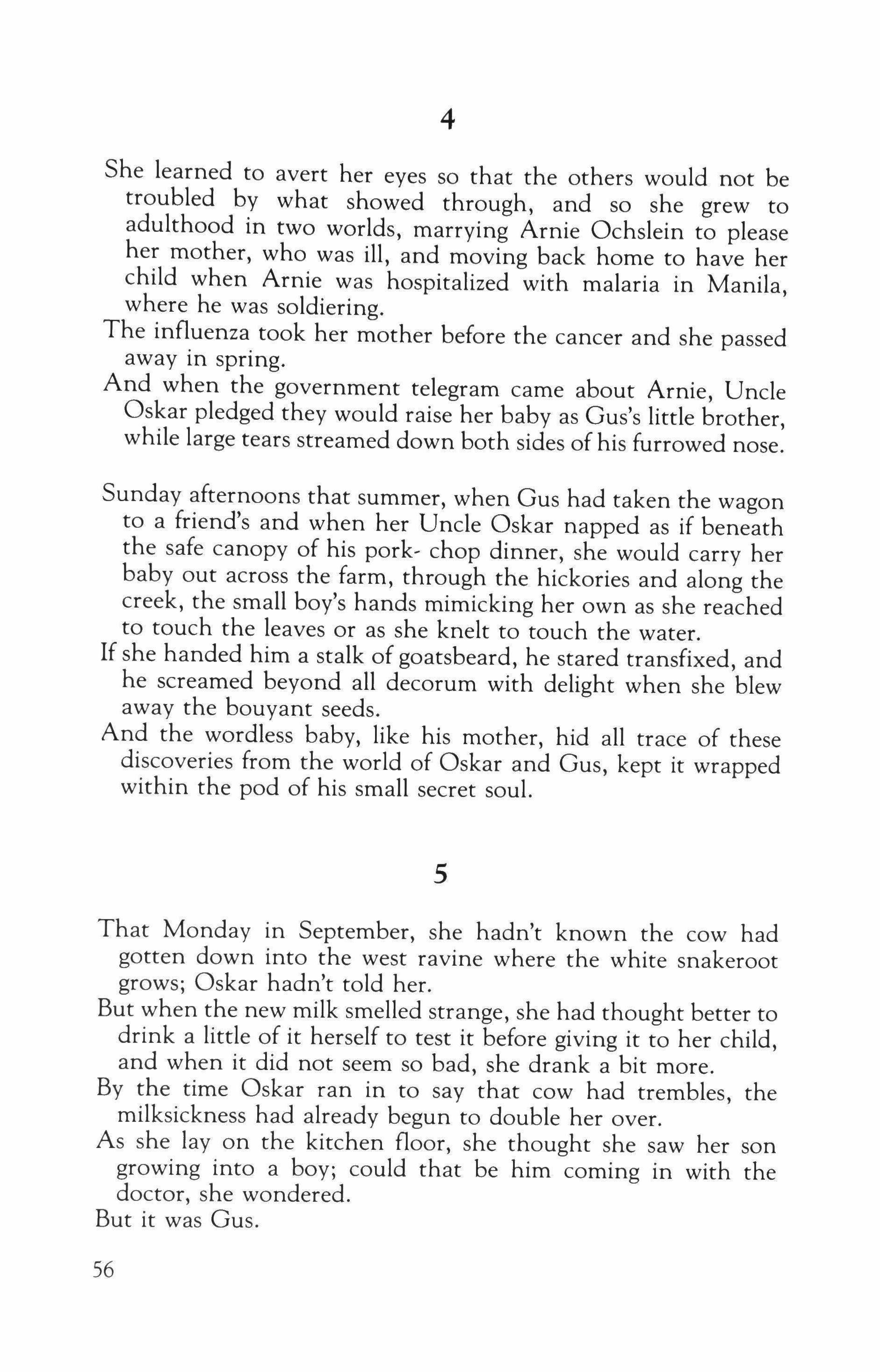
She learned to avert her eyes so that the others would not be troubled by what showed through, and so she grew to adulthood in two worlds, marrying Arnie Ochslein to please her mother, who was ill, and moving back home to have her child when Arnie was hospitalized with malaria in Manila, where he was soldiering.
The influenza took her mother before the cancer and she passed away in spring.
And when the government telegram came about Arnie, Uncle Oskar pledged they would raise her baby as Gus's little brother, while large tears streamed down both sides of his furrowed nose.
Sunday afternoons that summer, when Gus had taken the wagon to a friend's and when her Uncle Oskar napped as if beneath the safe canopy of his pork- chop dinner, she would carry her baby out across the farm, through the hickories and along the creek, the small boy's hands mimicking her own as she reached to touch the leaves or as she knelt to touch the water.
If she handed him a stalk of goatsbeard, he stared transfixed, and he screamed beyond all decorum with delight when she blew away the bouyant seeds.
And the wordless baby, like his mother, hid all trace of these discoveries from the world of Oskar and Gus, kept it wrapped within the pod of his small secret soul.
5
That Monday in September, she hadn't known the cow had gotten down into the west ravine where the white snakeroot grows; Oskar hadn't told her.
But when the new milk smelled strange, she had thought better to drink a little of it herself to test it before giving it to her child, and when it did not seem so bad, she drank a bit more.
By the time Oskar ran in to say that cow had trembles, the milksickness had already begun to double her over.
As she lay on the kitchen floor, she thought she saw her son growing into a boy; could that be him coming in with the doctor, she wondered.
But it was Gus.
4
56
The delirium's taking her the doctor's words floated apart from his bobbing face in the misty kitchen, the coma's next takes a poison to fight a poison arsenic back, Lad, enough to kill a horse
She fought the pill, trying to push from deep within, as if she were again giving birth, but the last push seemed to heave her clear, beyond and above the house, far above poor Uncle Oskar rocking a baby in his arms and standing beside the doctor's carriage.
Her hands reaching at last into the top of the hickory grove, now she could count the weight of the kernels ripening before the frost.
She could hear the crows calling from the horizon, the echo of Elsbeth's laugh.
Far on the other knoll, across the creek, they seemed to be covering something - baskets of new potatoes, she thought - in the kitchen of a farmhouse; a black carriage drove away, splashed through the ford, then kicked a small curl of yellow dust above the bramble patch at the turn toward town.
II. The Flyer

1
In the black pool of McGee Creek, he touched his face, and it dissolved in rings of light.
That game might have been at his young mother's urging, but he had long abandoned such play when already the hired blade of the dozer severed the meanders wreathing his lowland, to shunt the current down a straight trough along the eastern boundary of the farm.
And after the willows had been smacked smooth, as he had heard the pioneers called it, and the old way of the creek graded level, each corner of the new field lay quietly in the sun.
There was a year of gigantic corn.
But that triumph seemed a cheating when the next year floods
57

rotted the seeds, and the third autumn brought hail just before the harvest.
He might not have cursed the roping clouds that day had he known of the coming decade of dust, years when the seedlings shot up as if to make a bounty, only to wither by July.
At first he blamed the insidious milkweeds that also claimed his field of sun.
For weeks he patrolled the furrows with his hoe, striking off their milky heads, but still they rose by the thousands above the dying corn, their seeds wrapped like snake-scales within the ovarian pods.
By November, their white hair shaken dry, they rose like a mist above the bottomland with every breeze rattling the frayed corn.
It seemed that the channel he had made worked too well, cutting fast and deep, drawing down the water table as quickly as the earth along the gully fell away from the foot of his corner post. Only stapled wire held him when the war came, and he was not as sorry as some others for his calling up.
2
In every way, the training suited him.
His carbine seemed much lighter than the hoe, and his field pack weighed no more from season to season.
He became a navigator in the Air Corps and watched the earth fall away farther and farther beneath his straightedge and protractor, triangles gathering fields, woods, and seas.
On his vellum charts, Normandy itself looked no bigger than his farm, and the shadow of the bomber stirred glimmers on the Channel effortlessly as a child's hand swishing in a bucket, or a creek.
He felt blessed when his parachute opened out of the choking, black smoke of the plane.
But soon after the crash, clouds gathering from the North Atlantic obscured his bobbing face from the other flights he heard passing homeward overhead.
He cut the lines away but tried to keep one billow of the floating chute around his legs, in hopes it might hold a day's warmth within its white folds, as night came on.
58
Suspended among the swells in his life preserver, he dreamt of tropic bays and jellyfish dangling their tentacles, always with a cold sloshing at his ear.
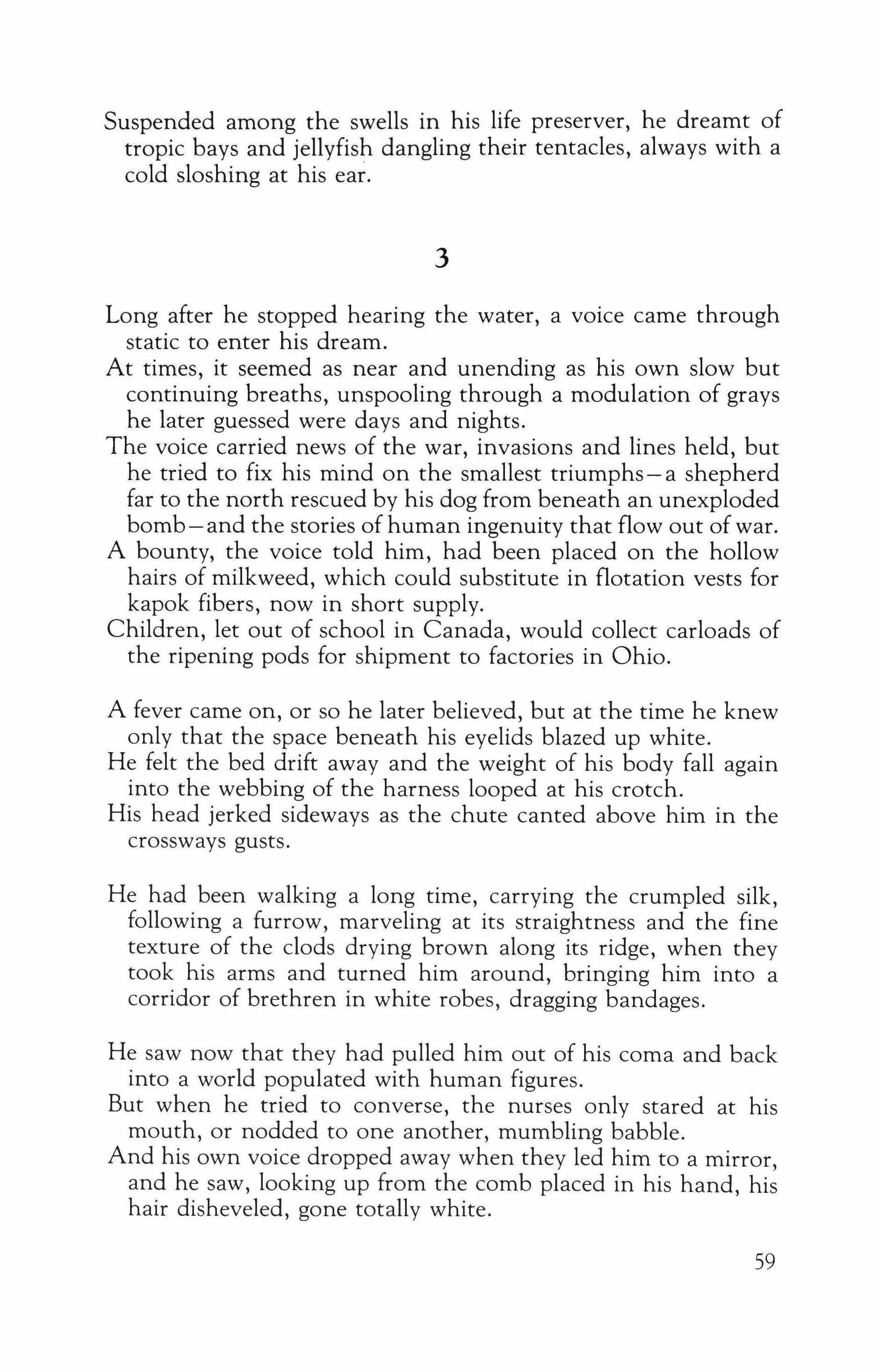
Long after he stopped hearing the water, a voice came through static to enter his dream.
At times, it seemed as near and unending as his own slow but continuing breaths, unspooling through a modulation of grays he later guessed were days and nights.
The voice carried news of the war, invasions and lines held, but he tried to fix his mind on the smallest triumphs-a shepherd far to the north rescued by his dog from beneath an unexploded bomb-and the stories of human ingenuity that flow out of war.
A bounty, the voice told him, had been placed on the hollow hairs of milkweed, which could substitute in flotation vests for kapok fibers, now in short supply.
Children, let out of school in Canada, would collect carloads of the ripening pods for shipment to factories in Ohio.
A fever came on, or so he later believed, but at the time he knew only that the space beneath his eyelids blazed up white.
He felt the bed drift away and the weight of his body fall again into the webbing of the harness looped at his crotch.
His head jerked sideways as the chute canted above him in the crossways gusts.
He had been walking a long time, carrying the crumpled silk, following a furrow, marveling at its straightness and the fine texture of the clods drying brown along its ridge, when they took his arms and turned him around, bringing him into a corridor of brethren in white robes, dragging bandages.
He saw now that they had pulled him out of his coma and back into a world populated with human figures.
But when he tried to converse, the nurses only stared at his mouth, or nodded to one another, mumbling babble.
And his own voice dropped away when they led him to a mirror, and he saw, looking up from the comb placed in his hand, his hair disheveled, gone totally white.
3
59
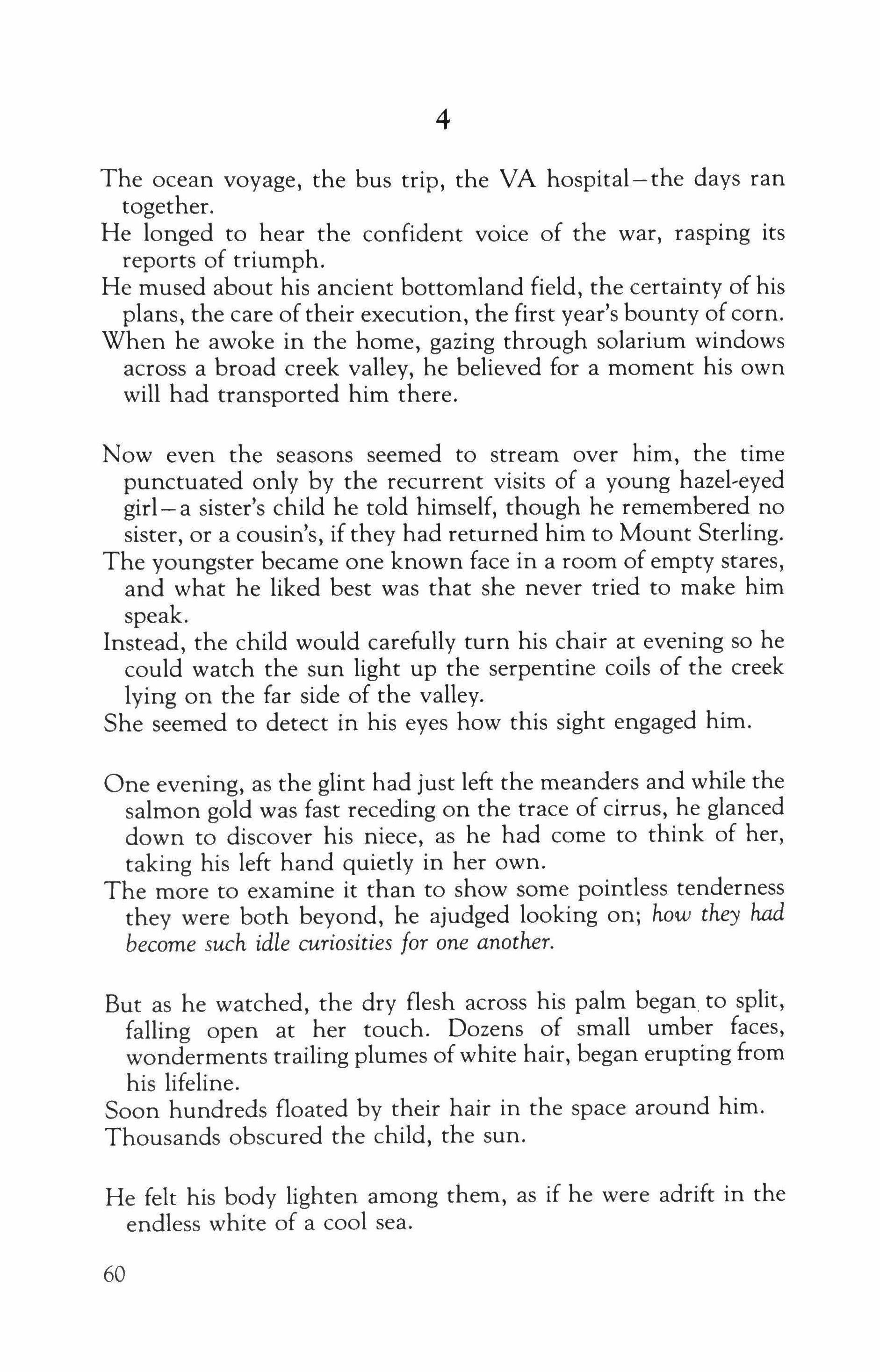
The ocean voyage, the bus trip, the VA hospital- the days ran together.
He longed to hear the confident voice of the war, rasping its reports of triumph.
He mused about his ancient bottomland field, the certainty of his plans, the care of their execution, the first year's bounty of corn. When he awoke in the home, gazing through solarium windows across a broad creek valley, he believed for a moment his own will had transported him there.
Now even the seasons seemed to stream over him, the time punctuated only by the recurrent visits of a young hazel-eyed girl- a sister's child he told himself, though he remembered no sister, or a cousin's, if they had returned him to Mount Sterling.
The youngster became one known face in a room of empty stares, and what he liked best was that she never tried to make him speak.
Instead, the child would carefully turn his chair at evening so he could watch the sun light up the serpentine coils of the creek lying on the far side of the valley.
She seemed to detect in his eyes how this sight engaged him.
One evening, as the glint had just left the meanders and while the salmon gold was fast receding on the trace of cirrus, he glanced down to discover his niece, as he had come to think of her, taking his left hand quietly in her own.
The more to examine it than to show some pointless tenderness they were both beyond, he ajudged looking on; how they had become such idle curiosities for one another.
But as he watched, the dry flesh across his palm began to split, falling open at her touch. Dozens of small umber faces, wonderments trailing plumes of white hair, began erupting from his lifeline.
Soon hundreds floated by their hair in the space around him. Thousands obscured the child, the sun.
He felt his body lighten among them, as if he were adrift in the endless white of a cool sea.
4
60
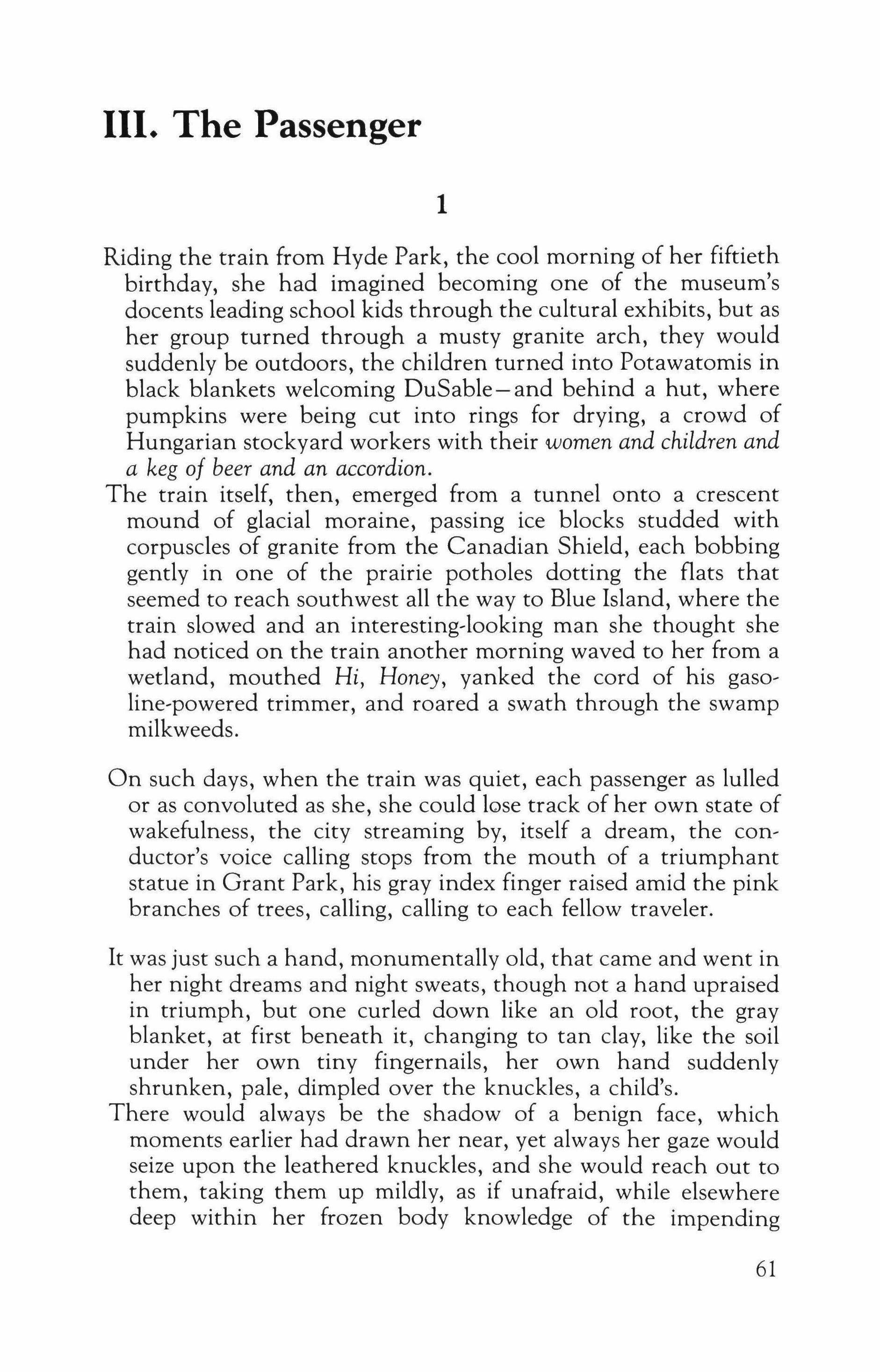
III. The Passenger 1
Riding the train from Hyde Park, the cool morning of her fiftieth birthday, she had imagined becoming one of the museum's docents leading school kids through the cultural exhibits, but as her group turned through a musty granite arch, they would suddenly be outdoors, the children turned into Potawatomis in black blankets welcoming DuSable-and behind a hut, where pumpkins were being cut into rings for drying, a crowd of Hungarian stockyard workers with their women and children and a keg of beer and an accordion.
The train itself, then, emerged from a tunnel onto a crescent mound of glacial moraine, passing ice blocks studded with corpuscles of granite from the Canadian Shield, each bobbing gently in one of the prairie potholes dotting the flats that seemed to reach southwest all the way to Blue Island, where the train slowed and an interesting-looking man she thought she had noticed on the train another morning waved to her from a wetland, mouthed Hi, Honey, yanked the cord of his gasoline-powered trimmer, and roared a swath through the swamp milkweeds.
On such days, when the train was quiet, each passenger as lulled or as convoluted as she, she could lose track of her own state of wakefulness, the city streaming by, itself a dream, the conductor's voice calling stops from the mouth of a triumphant statue in Grant Park, his gray index finger raised amid the pink branches of trees, calling, calling to each fellow traveler.
It was just such a hand, monumentally old, that came and went in her night dreams and night sweats, though not a hand upraised in triumph, but one curled down like an old root, the gray blanket, at first beneath it, changing to tan clay, like the soil under her own tiny fingernails, her own hand suddenly shrunken, pale, dimpled over the knuckles, a child's. There would always be the shadow of a benign face, which moments earlier had drawn her near, yet always her gaze would seize upon the leathered knuckles, and she would reach out to them, taking them up mildly, as if unafraid, while elsewhere deep within her frozen body knowledge of the impending
61
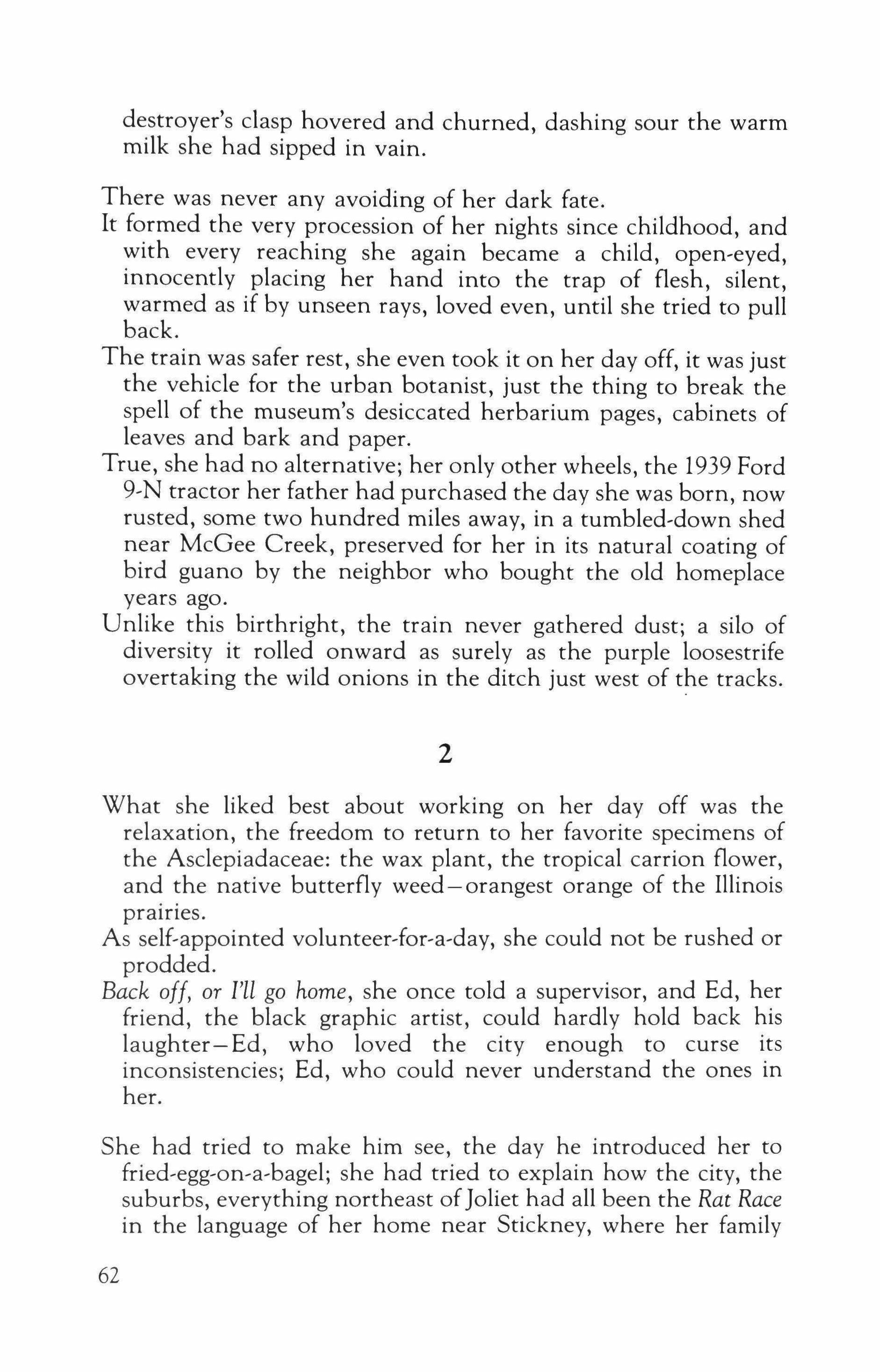
destroyer's clasp hovered and churned, dashing sour the warm milk she had sipped in vain.
There was never any avoiding of her dark fate. It formed the very procession of her nights since childhood, and with every reaching she again became a child, open-eyed, innocently placing her hand into the trap of flesh, silent, warmed as if by unseen rays, loved even, until she tried to pull back.
The train was safer rest, she even took it on her day off, it was just the vehicle for the urban botanist, just the thing to break the spell of the museum's desiccated herbarium pages, cabinets of leaves and bark and paper.
True, she had no alternative; her only other wheels, the 1939 Ford 9�N tractor her father had purchased the day she was born, now rusted, some two hundred miles away, in a tumbled-down shed near McGee Creek, preserved for her in its natural coating of bird guano by the neighbor who bought the old homeplace years ago.
Unlike this birthright, the train never gathered dust; a silo of diversity it rolled onward as surely as the purple loosestrife overtaking the wild onions in the ditch just west of the tracks.
2
What she liked best about working on her day off was the relaxation, the freedom to return to her favorite specimens of the Asclepiadaceae: the wax plant, the tropical carrion flower, and the native butterfly weed-orangest orange of the Illinois prairies.
As self-appointed volunteer-for-a-day, she could not be rushed or prodded.
Back off, or I'll go home, she once told a supervisor, and Ed, her friend, the black graphic artist, could hardly hold back his laughter-Ed, who loved the city enough to curse its inconsistencies; Ed, who could never understand the ones in her.
She had tried to make him see, the day he introduced her to fried-egg-on-a-bagel; she had tried to explain how the city, the suburbs, everything northeast ofJoliet had all been the Rat Race in the language of her home near Stickney, where her family
62
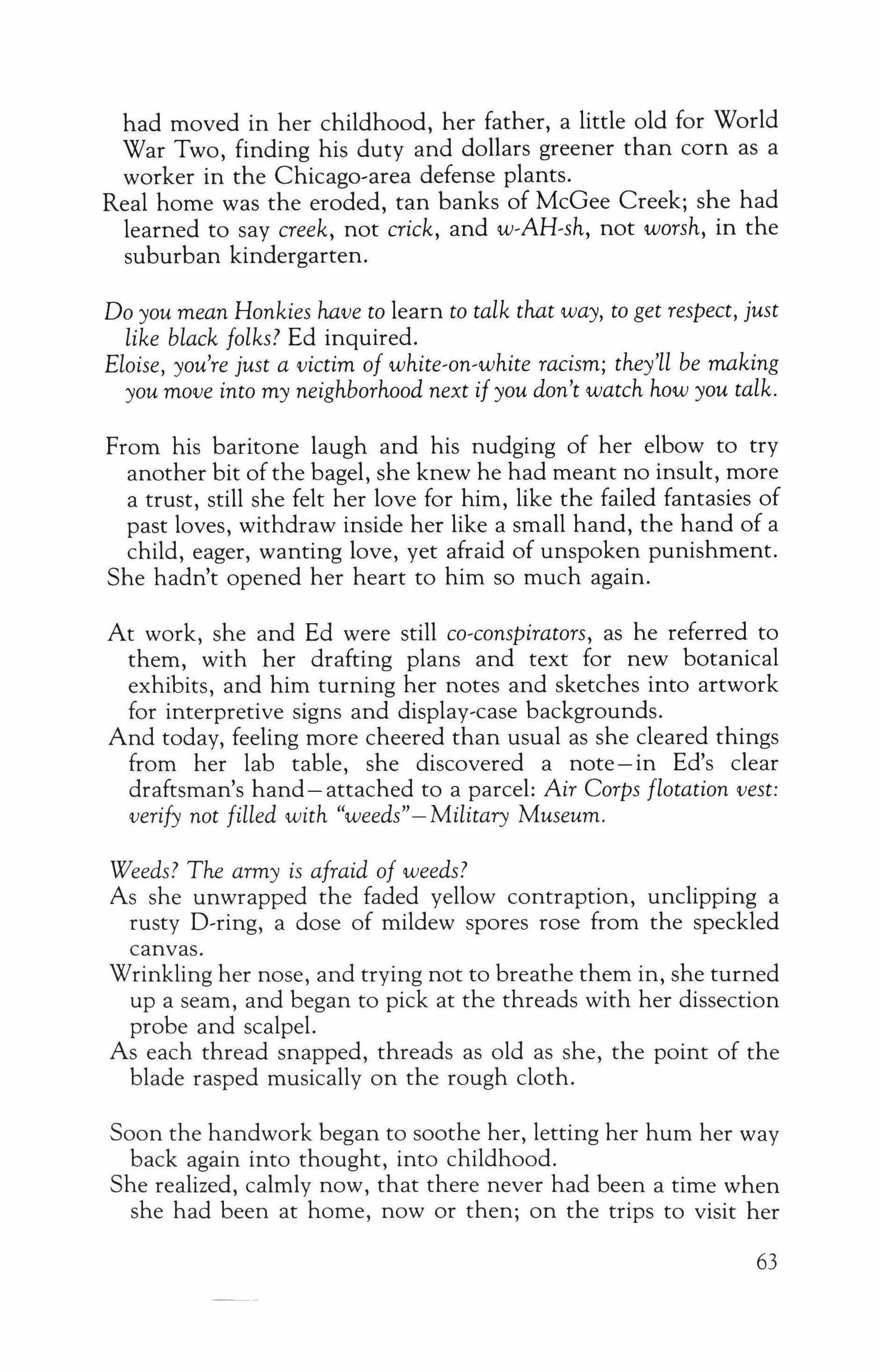
had moved in her childhood, her father, a little old for World War Two, finding his duty and dollars greener than corn as a worker in the Chicago-area defense plants.
Real home was the eroded, tan banks of McGee Creek; she had learned to say creek, not crick, and w-AH-sh, not worsh, in the suburban kindergarten.
Do you mean Honkies have to learn to talk that way, to get respect, just like black folks? Ed inquired.
Eloise, you're just a victim of white-on-white racism; they'll be making you move into my neighborhood next if you don't watch how you talk.
From his baritone laugh and his nudging of her elbow to try another bit ofthe bagel, she knew he had meant no insult, more a trust, still she felt her love for him, like the failed fantasies of past loves, withdraw inside her like a small hand, the hand of a child, eager, wanting love, yet afraid of unspoken punishment. She hadn't opened her heart to him so much again.
At work, she and Ed were still co-conspirators, as he referred to them, with her drafting plans and text for new botanical exhibits, and him turning her notes and sketches into artwork for interpretive signs and display-case backgrounds.
And today, feeling more cheered than usual as she cleared things from her lab table, she discovered a note-in Ed's clear draftsman's hand - attached to a parcel: Air Corps flotation vest: verify not filled with "weeds" - Military Museum.
Weeds? The army is afraid of weeds?
As she unwrapped the faded yellow contraption, unclipping a rusty D-ring, a dose of mildew spores rose from the speckled canvas.
Wrinkling her nose, and trying not to breathe them in, she turned up a seam, and began to pick at the threads with her dissection probe and scalpel.
As each thread snapped, threads as old as she, the point of the blade rasped musically on the rough cloth.
Soon the handwork began to soothe her, letting her hum her way back again into thought, into childhood. She realized, calmly now, that there never had been a time when she had been at home, now or then; on the trips to visit her
63
country cousins, she had never been one of them with her citified talk and ways: she got into fights.
The closest connection came that autumn when she turned seven, when her father was laid off from the plant for a time and they had stayed on her uncle's farm.
The uncle, really her father's second cousin, hadn't lived on the farm himself since before the war, had been shot down over the Channel, shocked into silence, withering like a cabbage in the nursing home window - surely no one to display alongside the sabers at the military museum.
She recalled his wavering slate eyes and white-ash hair.
With the tip of her forceps, she withdrew a bright, downy structure from the vest's crumbly interior.
Milkweed coma, she said, raising the specimen up to Ed, who had just returned with a cup of coffee.
I knew you'd know! he exhaled over the brew; may as well throw it out, though; they don't want to know the truth about weeds.
She couldn't help smiling, wondering at Ed's faith in her and at her own knack for taxonomy-where had it come from?
Her uncle's mother, it had been said, was a bit of an herbalist, but not a great one, having died of milksickness like Lincoln's mother.
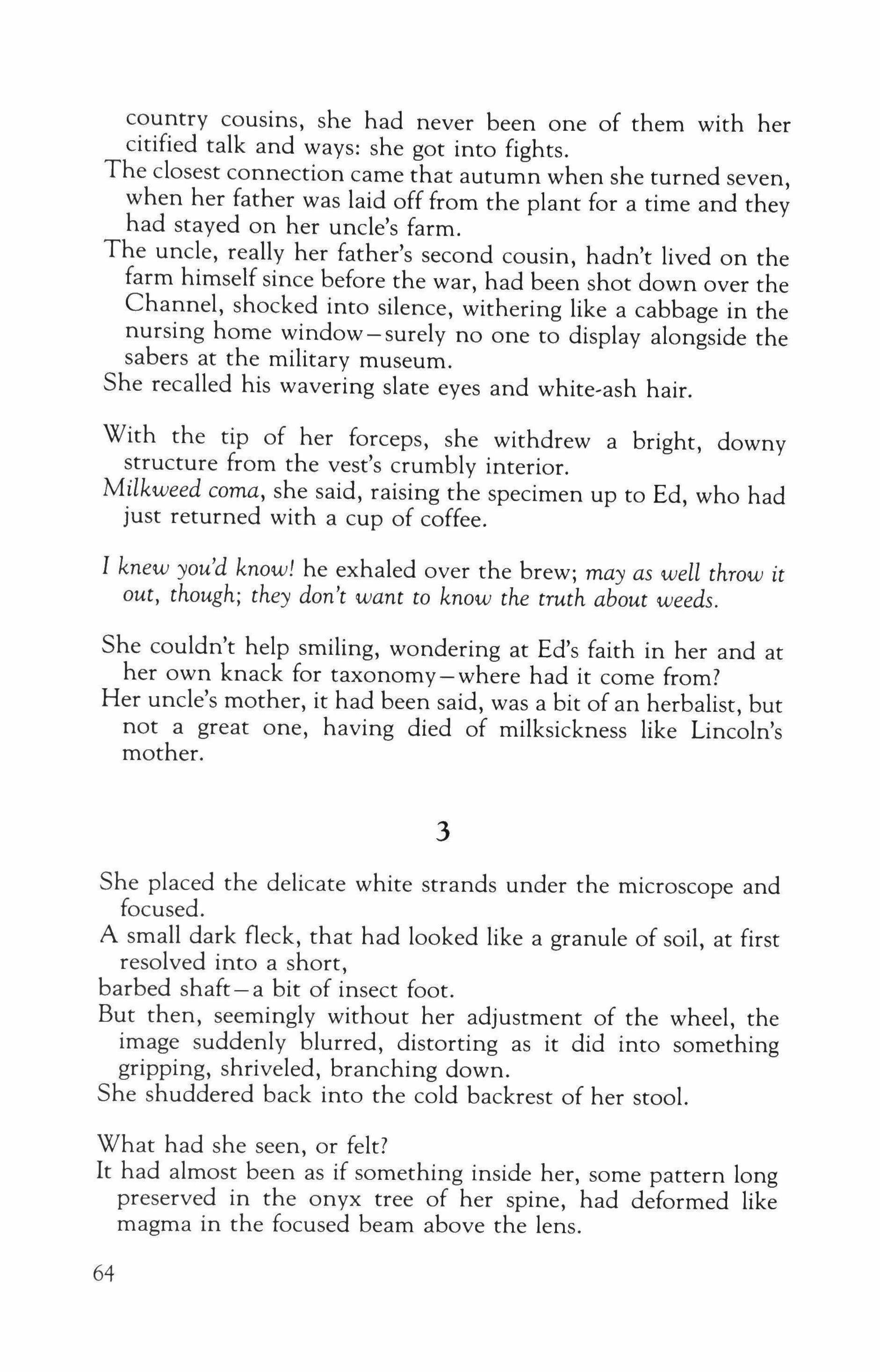
She placed the delicate white strands under the microscope and focused.
A small dark fleck, that had looked like a granule of soil, at first resolved into a short, barbed shaft - a bit of insect foot.
But then, seemingly without her adjustment of the wheel, the image suddenly blurred, distorting as it did into something gripping, shriveled, branching down.
She shuddered back into the cold backrest of her stool.
What had she seen, or felt?
It had almost been as if something inside her, some pattern long preserved in the onyx tree of her spine, had deformed like magma in the focused beam above the lens.
3
64
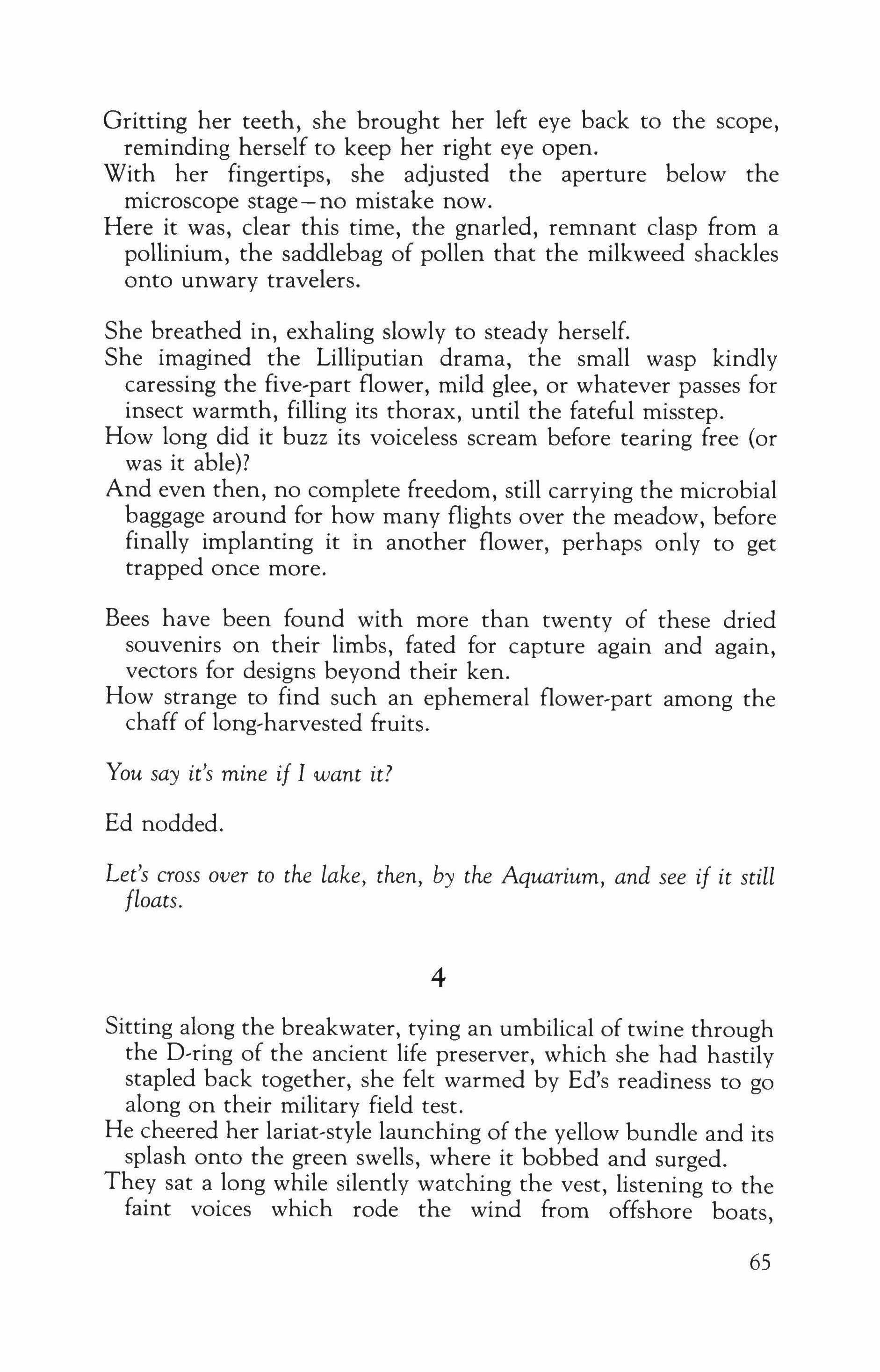
Gritting her teeth, she brought her left eye back to the scope, reminding herself to keep her right eye open.
With her fingertips, she adjusted the aperture below the microscope stage - no mistake now.
Here it was, clear this time, the gnarled, remnant clasp from a pollinium, the saddlebag of pollen that the milkweed shackles onto unwary travelers.
She breathed in, exhaling slowly to steady herself.
She imagined the Lilliputian drama, the small wasp kindly caressing the five-part flower, mild glee, or whatever passes for insect warmth, filling its thorax, until the fateful misstep.
How long did it buzz its voiceless scream before tearing free {or was it able}?
And even then, no complete freedom, still carrying the microbial baggage around for how many flights over the meadow, before finally implanting it in another flower, perhaps only to get trapped once more.
Bees have been found with more than twenty of these dried souvenirs on their limbs, fated for capture again and again, vectors for designs beyond their ken.
How strange to find such an ephemeral flower-part among the chaff of long-harvested fruits.
You say it's mine if I want it?
Ed nodded.
Let's cross over to the lake, then, by the Aquarium, and see if it still floats.
4
Sitting along the breakwater, tying an umbilical of twine through the D-ring of the ancient life preserver, which she had hastily stapled back together, she felt warmed by Ed's readiness to go along on their military field test.
He cheered her lariat-style launching of the yellow bundle and its splash onto the green swells, where it bobbed and surged. They sat a long while silently watching the vest, listening to the faint voices which rode the wind from offshore boats,
65
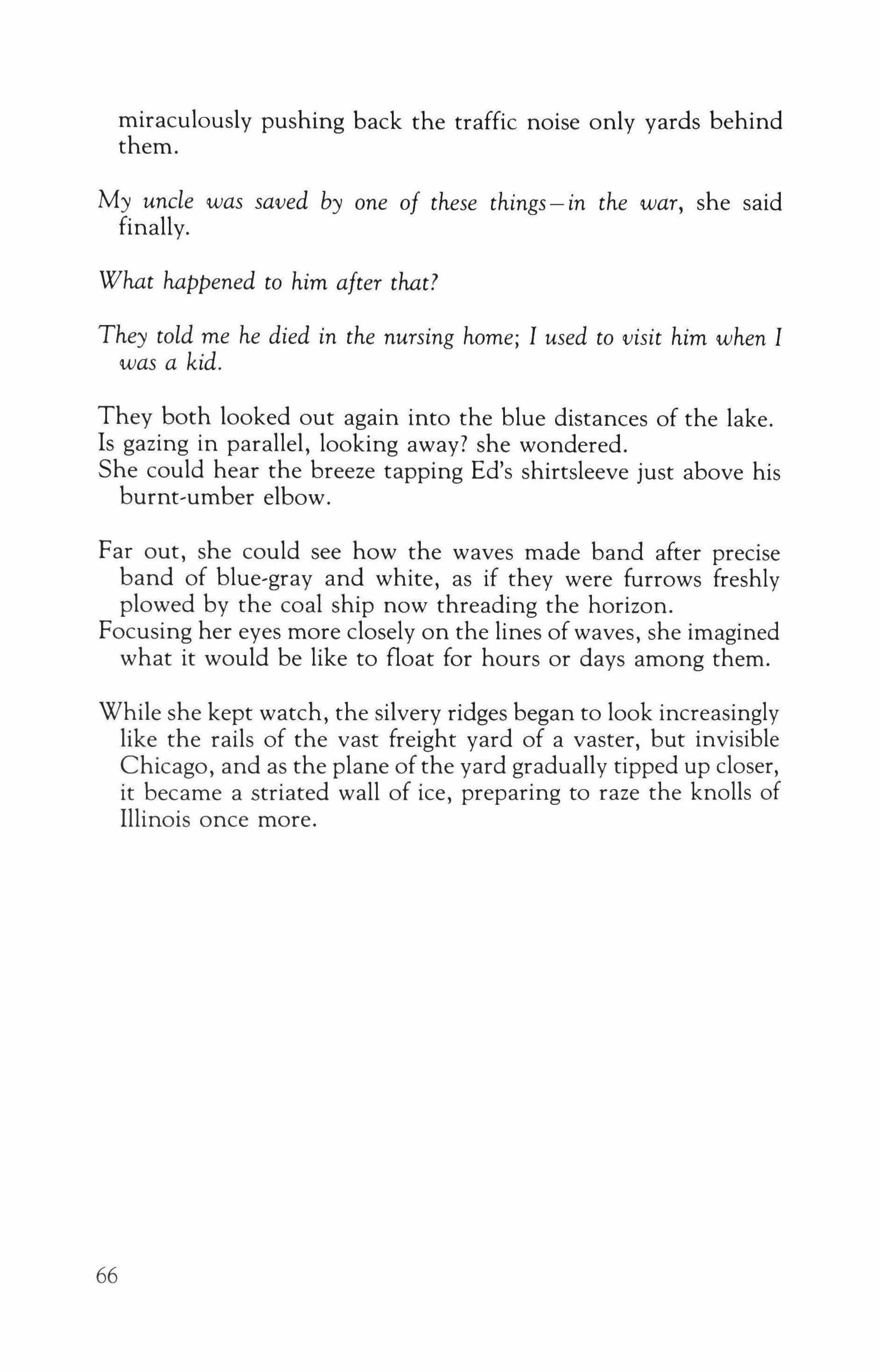
miraculously pushing back the traffic noise only yards behind them.
My uncle was saved by one of these things-in the war, she said finally.
What happened to him after that?
They told me he died in the nursing home; I used to visit him when I was a kid.
They both looked out again into the blue distances of the lake. Is gazing in parallel, looking away? she wondered. She could hear the breeze tapping Ed's shirtsleeve just above his burnt-umber elbow.
Far out, she could see how the waves made band after precise band of blue-gray and white, as if they were furrows freshly plowed by the coal ship now threading the horizon. Focusing her eyes more closely on the lines of waves, she imagined what it would be like to float for hours or days among them.
While she kept watch, the silvery ridges began to look increasingly like the rails of the vast freight yard of a vaster, but invisible Chicago, and as the plane ofthe yard gradually tipped up closer, it became a striated wall of ice, preparing to raze the knolls of Illinois once more.
66
You Petted Me, and I Followed You Home
]oyce Carol Oates

Since they'd arrived at their friends' place, earlier that night, the drizzle had turned to a gritty wind-blown snow-the first real snow of the season. They were between cars and it was too far to walk home, and late. Vic was in the street looking for a cab and Dawn was saying, tugging at his arm, it was the only way you could talk to him sometimes, by touching him first, "Honey, why don't we go back, and ask if somebody can drive us home? Harry, maybe?" Vic shrugged, and ignored her. He was looking for a taxi: his eyes were angry. Dawn said, laughing, that thin nervous laugh, "Do you have enough for a taxi? -I mean, a tip? I didn't bring along my wallet."
Vic pushed her a little, toward the curb. "Go wait on the sidewalk," he said. "Those shoes-!" He meant Dawn's spike-heeled shoes with the spaghetti-thin straps, through which her textured, translucent black stockings shone. Black patent-leather shoes, so impractical for walking any distance at all. But he liked her shoes, didn't he?
Sure he did.
Dawn was shivering in the damp wind that smelled of the river, huddling in the doorway of the building they'd just left, and hoping that none of the others would be leaving the party right now, and see them. It wasn't Dawn but Vic who felt it: not having his own car, even if it was temporary-it was humiliating, somehow. For him, not her. But, if for him, for her too. They were married now.
And there it was, as if waiting for them: a little lost dog. A little lost dog, out of nowhere suddenly, on the sidewalk. Peering up anxiously at Dawn. Panting-its breath steaming faintly. Its fur was curly, matted, damp.
"Aren't you darling!" Dawn cried. It was her party manner, a little
67

loud. Girlish and good-hearted. You wouldn't know she'd been drinking until she exclaimed like this, over some small or silly or sentimental thing. "Are you lost?"
The dog was a mongrel, small, wiry, ribs prominent through its fur. Part cocker spaniel, with a spaniel's long loose ears, a stubby battered tail, mournful eyes- beautiful eyes. When Dawn petted the dog, murmuring and exclaiming, it licked her gloved hands shyly, and its small body quivered with excitement. Then Vic came over, and petted it too, more roughly, scratching it behind the ears so the dog whimpered and squirmed with a pleasure almost too intense to be borne. It was licking Vic's bare hands urgently, its bony hindquarters thrashing from side to side, as in a comically erotic, exaggerated dance. Vic laughed. Vic liked dogs, he'd had dogs as a kid, growing up. "Hey boy, hiya boy, you lost?no collar?" To Dawn he said, disgusted, "Somebody dumped it, for sure. See?-the fur's worn on its neck, from a collar." Dawn said, "Oh, let's take it home!" Vic rubbed the dog's head with his knuckles. The dog was making flurried, flailing gestures with its front paws, as if about to leap up against Vic's legs, at the same time holding itself back, like a dog that has been kicked often, and has grown wise. Its eyes were a dog's eyes, but wise.
Finally a taxi came by, and Vic hailed it, and he and Dawn climbed inside. The interior was overheated, airless, smelling of damp wool and stale cigarette smoke though the driver, a young Hispanic, was not now smoking.
It was a ten-minute ride to their place, on the west side. The driver kept missing lights-you couldn't exactly say on purpose. Vic was watching the meter, Dawn tried not to see.
Vic surprised Dawn by gripping her hand, as, before they were married, he'd do, suddenly, to scare her a little, teasing. Looking at her sidelong, his eyes hooded, suggestive. As if knowing something about her she herself did not know "You were having a great time tonight, huh? -like I haven't seen you in a long time."
Dawn stared at him, not knowing what to say-was he serious?-or testing her? She said, laughing, "I don't feel comfortable with those people, they're your friends, mainly." The illogic of her remark, following his, seemed to have passed unnoticed. Dawn turned to look out the rear window, stricken. "That poor darling little dog - we should have brought it home with us."
Vic laughed, and squeezed her hand, in irony. "Yeah. Sure."
68
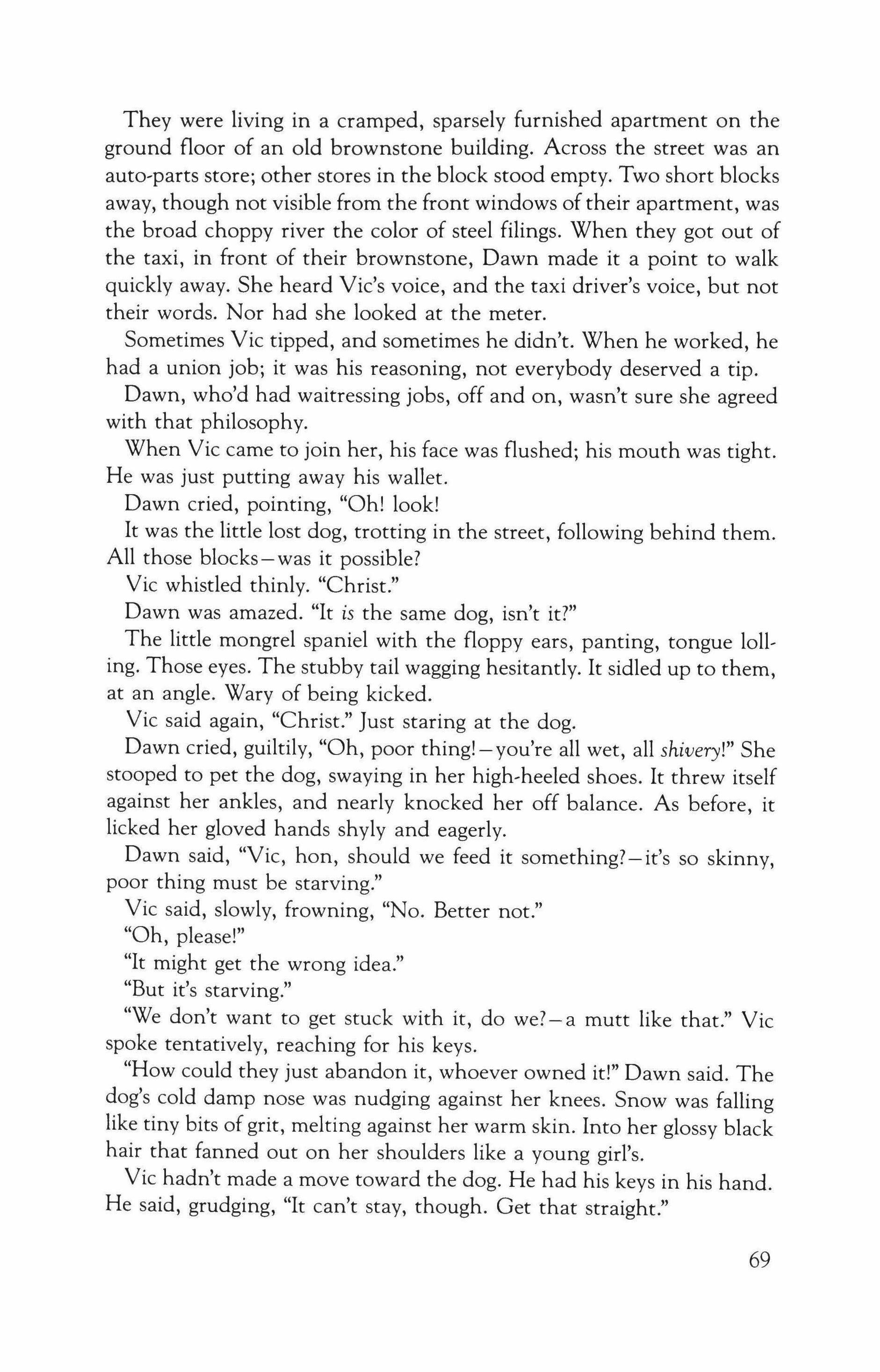
They were living in a cramped, sparsely furnished apartment on the ground floor of an old brownstone building. Across the street was an auto-parts store; other stores in the block stood empty. Two short blocks away, though not visible from the front windows of their apartment, was the broad choppy river the color of steel filings. When they got out of the taxi, in front of their brownstone, Dawn made it a point to walk quickly away. She heard Vic's voice, and the taxi driver's voice, but not their words. Nor had she looked at the meter.
Sometimes Vic tipped, and sometimes he didn't. When he worked, he had a union job; it was his reasoning, not everybody deserved a tip.
Dawn, who'd had waitressing jobs, off and on, wasn't sure she agreed with that philosophy.
When Vic came to join her, his face was flushed; his mouth was tight. He was just putting away his wallet.
Dawn cried, pointing, "Oh! look!
It was the little lost dog, trotting in the street, following behind them. All those blocks-was it possible?
Vic whistled thinly. "Christ."
Dawn was amazed. "It is the same dog, isn't it?"
The little mongrel spaniel with the floppy ears, panting, tongue lolling. Those eyes. The stubby tail wagging hesitantly. It sidled up to them, at an angle. Wary of being kicked.
Vic said again, "Christ." Just staring at the dog.
Dawn cried, guiltily, "Oh, poor thing! - you're all wet, all shivery!" She stooped to pet the dog, swaying in her high-heeled shoes. It threw itself against her ankles, and nearly knocked her off balance. As before, it licked her gloved hands shyly and eagerly.
Dawn said, "Vic, han, should we feed it something? - it's so skinny, poor thing must be starving."
Vic said, slowly, frowning, "No. Better not."
"Oh, please!"
"It might get the wrong idea."
"But it's starving."
"We don't want to get stuck with it, do we? - a mutt like that." Vic spoke tentatively, reaching for his keys.
"How could they just abandon it, whoever owned it!" Dawn said. The dog's cold damp nose was nudging against her knees. Snow was falling like tiny bits of grit, melting against her warm skin. Into her glossy black hair that fanned out on her shoulders like a young girl's.
Vic hadn't made a move toward the dog. He had his keys in his hand. He said, grudging, "It can't stay, though. Get that straight."
69
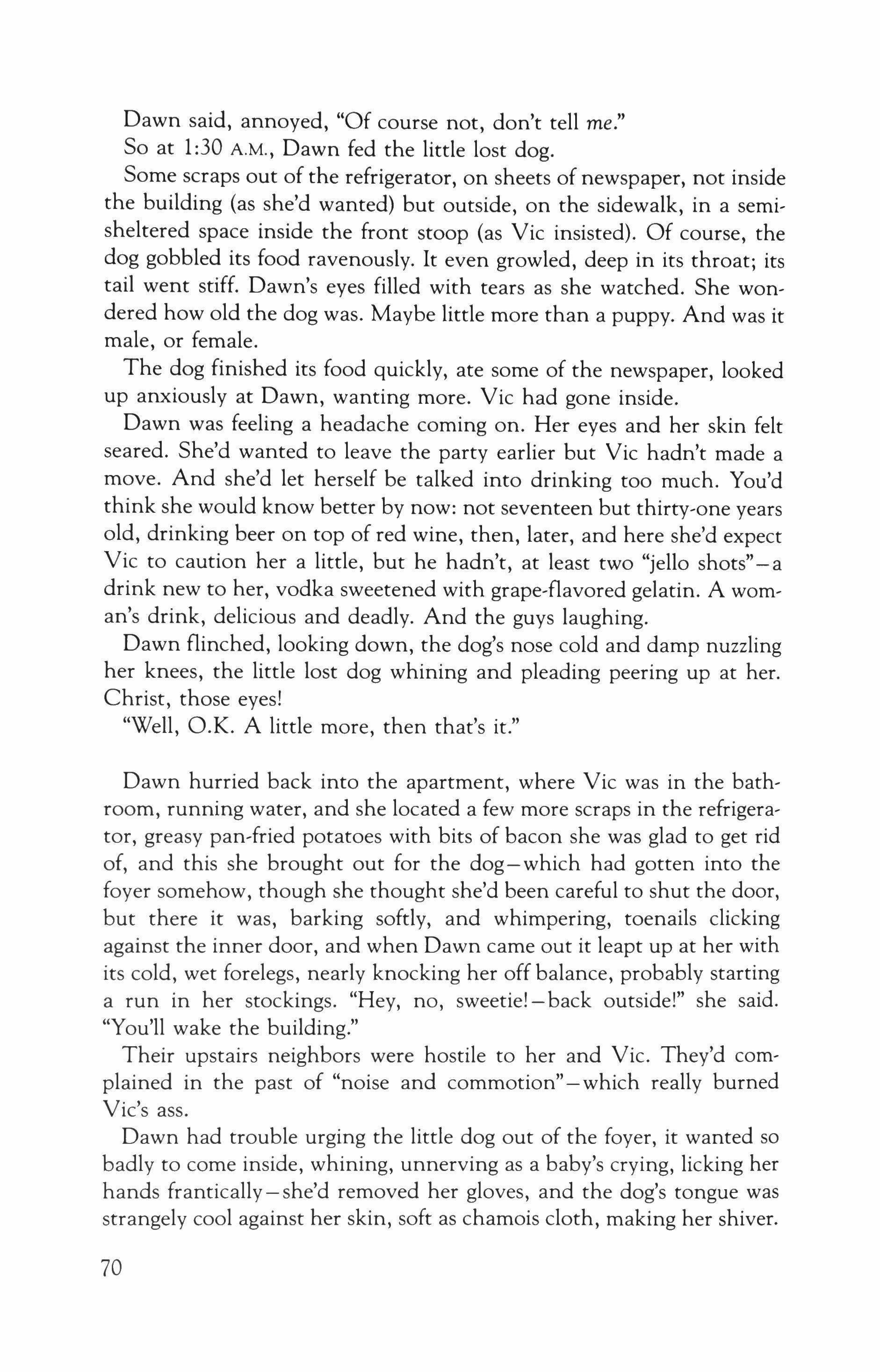
Dawn said, annoyed, "Of course not, don't tell me."
So at 1:30 A.M., Dawn fed the little lost dog.
Some scraps out of the refrigerator, on sheets of newspaper, not inside the building (as she'd wanted) but outside, on the sidewalk, in a semisheltered space inside the front stoop (as Vic insisted). Of course, the dog gobbled its food ravenously. It even growled, deep in its throat; its tail went stiff. Dawn's eyes filled with tears as she watched. She wondered how old the dog was. Maybe little more than a puppy. And was it male, or female.
The dog finished its food quickly, ate some of the newspaper, looked up anxiously at Dawn, wanting more. Vic had gone inside.
Dawn was feeling a headache coming on. Her eyes and her skin felt seared. She'd wanted to leave the party earlier but Vic hadn't made a move. And she'd let herself be talked into drinking too much. You'd think she would know better by now: not seventeen but thirty-one years old, drinking beer on top of red wine, then, later, and here she'd expect Vic to caution her a little, but he hadn't, at least two "jello shots"-a drink new to her, vodka sweetened with grape-flavored gelatin. A woman's drink, delicious and deadly. And the guys laughing.
Dawn flinched, looking down, the dog's nose cold and damp nuzzling her knees, the little lost dog whining and pleading peering up at her. Christ, those eyes!
"Well, O.K. A little more, then that's it."
Dawn hurried back into the apartment, where Vic was in the bathroom, running water, and she located a few more scraps in the refrigerator, greasy pan-fried potatoes with bits of bacon she was glad to get rid of, and this she brought out for the dog-which had gotten into the foyer somehow, though she thought she'd been careful to shut the door, but there it was, barking softly, and whimpering, toenails clicking against the inner door, and when Dawn came out it leapt up at her with its cold, wet forelegs, nearly knocking her off balance, probably starting a run in her stockings. "Hey, no, sweetie! - back outside!" she said. "You'll wake the building."
Their upstairs neighbors were hostile to her and Vic. They'd complained in the past of "noise and commotion" - which really burned Vic's ass.
Dawn had trouble urging the little dog out of the foyer, it wanted so badly to come inside, whining, unnerving as a baby's crying, licking her hands frantically-she'd removed her gloves, and the dog's tongue was strangely cool against her skin, soft as chamois cloth, making her shiver.
70

"That's enough!" she scolded. Finally she was able to divert its attention to the fried potatoes she scraped off onto the newspaper, and it began eating quickly again, its small body quivering. So hungry. So-physical: without a mind. Dawn stared at the little dog and felt a sense of loss, of terrible and final and irrevocable loss, not to be named.
Oh, God. A headache coming on.
She said, lightly, as if the dog could understand, "Now, that's all! It really is! You'll have to be content with that-that's all."
She hurried back up the steps, hoping the dog wouldn't follow. It paused in its eating to peer up at her, its eyes stricken, quizzical. Muzzle damp with saliva and grease. She shuddered, and went inside.
Making sure the outer door of the foyer, and then the inner door, were shut tight, thus locked.
Vic was in the kitchen, not in the bedroom, or in bed, as Dawn had hoped he'd be. He laughed at her, her concern for the dog, shaking his head. He was drinking from a can of Coors, in his undershirt. Wiry dark hairs bristled on his chest, which was a compact, muscular chest, pushing through the cotton fabric, thick under his arms and on his forearms. Dawn murmured, "Hon, it's late!" and Vic shrugged, that way he had of acknowledging he'd heard her, but whatever she'd said wasn't worth answering.
Dawn was feeling reckless, risky. Kicking off these damned high heels, standing in her stocking feet on the cold linoleum floor. Vic was looking at her, steady, level-that look of his, in this mood of his, that went through her like a razor. She knew what he was thinking, and he knew that she knew. When they'd first started going together and she'd seen him look at her like that, his eyes sleepy, hooded, she'd felt the shock of it in the pit of her belly, leaving her weak, faint. Now, since the baby, that's to say the miscarriage, she saw that look in Vic's eyes less often, mainly when he was drunk. And she was drunk. And the anger, the bafflement, beneath.
"Want some?-nightcap?" Vic said, and Dawn said, "No thanks!" but when he stuck out the can she took it, clumsily steadying his hand so she could take a sip. He was watching her closely. His forearm grazing her breast.
Flat-footed, Dawn felt dumpy, fat-her jersey dress tight across her hips. She hated that. She'd gained maybe ten, maybe fifteen pounds in the past year, she didn't exactly want to know. First, she'd lost weight; then gained. She didn't dwell upon it, much. You must focus upon the present: the "here-and-now." She knew that,
71

but it was hard. But it was no good, brooding, crying, making yourself sick when your personality wasn't that way at all- not at all. Dawn's own mother had taken to hanging up the phone, those times Dawn had called her, crying. Vic had never known. You just can't let yourself go like that, Dawn's mother said. Any experience with grief teaches you that.
Still, she was going to lose the extra weight, and she'd feel good about that. Soon as she felt more in control. Cut down on the drinking, the sweets. Breasts, hips, thighs. That soft roll of flesh around her waist she'd knead sometimes, unconsciously.
And her belly: Vic was touching her there, teasing the way he did, but a little rough too, rubbing his hand, squeezing. Baring his teeth in a grin. He liked her with a little more weight than she'd had, getting a grip on her hips, her buttocks, but he never spoke of such things: his lovemaking words were few, and invariable. How great she was, how beautiful. Oh, baby! - beautiful.
Dawn pushed his hand away, just gently. He'd been backing her against the kitchen counter and it hurt.
Talking with her girlfriend at the deli where they both worked, after she and Vic were married, she'd said, the main difference is, now you can't say no. It had come out sort of naive, solemn - Dawn and her girlfriend both started laughing, like kids. Her friend wasn't married, but living with a guy, so it came to the same thing.
Dawn laughed now, and Vic asked what's so funny, and Dawn said, giggling, "Poor Aileen-she was really wrecked."
Vic laughed. His friend from work, Harry, just divorced, was going out with this woman Aileen, a screamer and shrieker, big damp eyes she was forever widening like a goose's. Dawn was generally ashamed of ridiculing this woman behind her back, like the others; but, still, she did. Vic always laughed. Even Harry laughed.
"That pathetic-" Vic broke off, maybe he was going to say "cunt," and changed his mind.
They were headed for bed when, suddenly, there came a scratching noise, as of a dog's sharp claws against the door to the hall, and a dog's forlorn, high-pitched whining. Vic looked sharply at Dawn. His smile faded.
He cursed, went to the door, opened it-and there was the little lost dog, pawing at his legs, barking in quick begging yelps. In the light, its fur looked coarse and whorled, the drab dun color of deer in winter. It would have scrambled inside except Vic blocked it with his foot, then kicked it, not hard, but hard enough to discourage it from trying to get
72
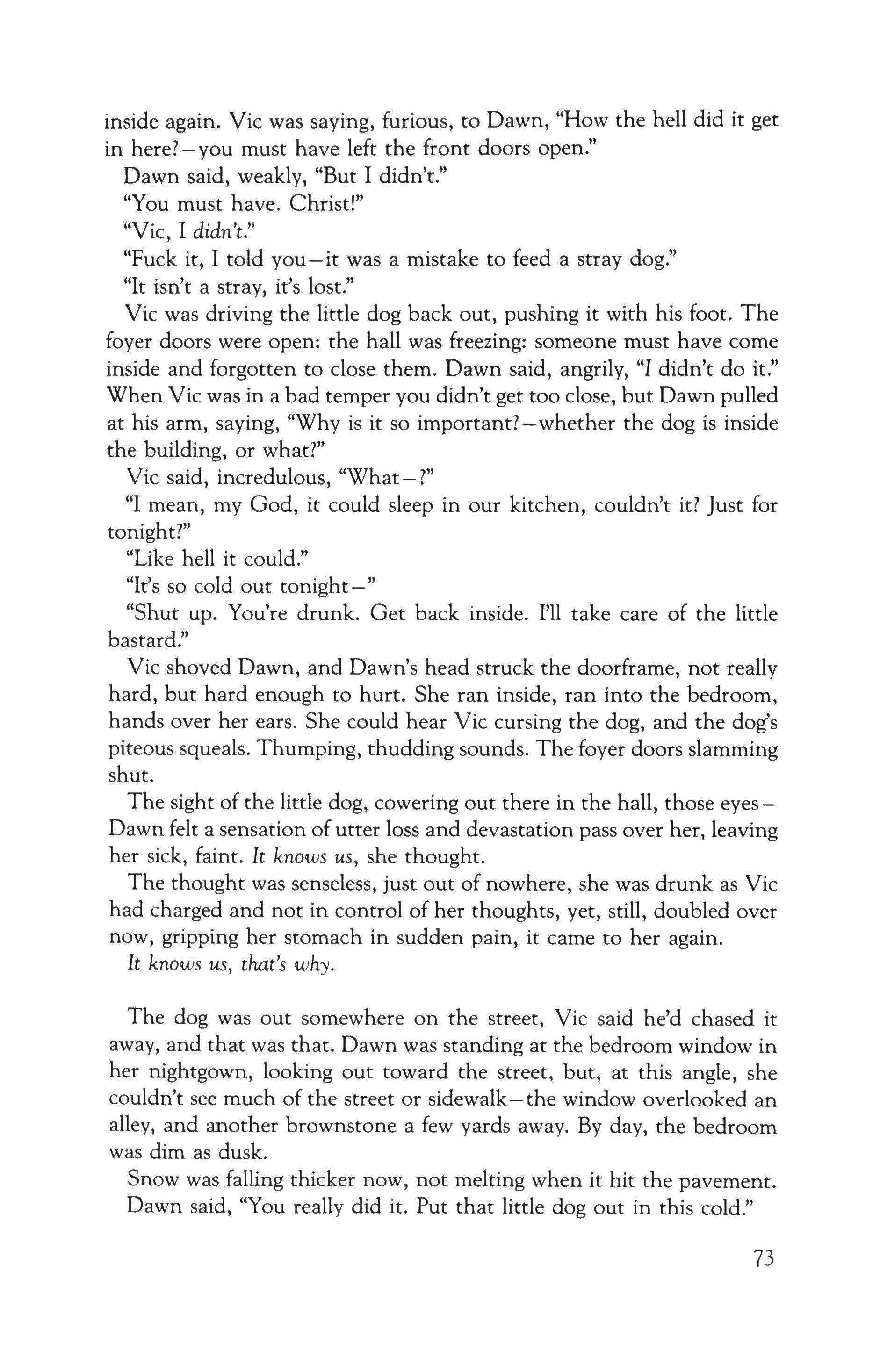
inside again. Vic was saying, furious, to Dawn, "How the hell did it get in here? -you must have left the front doors open."
Dawn said, weakly, "But 1 didn't."
"You must have. Christ!"
"Vic, 1 didn't."
"Fuck it, 1 told you - it was a mistake to feed a stray dog."
"It isn't a stray, it's lost."
Vic was driving the little dog back out, pushing it with his foot. The foyer doors were open: the hall was freezing: someone must have come inside and forgotten to close them. Dawn said, angrily, "I didn't do it."
When Vic was in a bad temper you didn't get too close, but Dawn pulled at his arm, saying, "Why is it so important? - whether the dog is inside the building, or what?"
Vic said, incredulous, "What-?"
"1 mean, my God, it could sleep in our kitchen, couldn't it? Just for tonight?"
"Like hell it could."
"It's so cold out tonight -"
"Shut up. You're drunk. Get back inside. I'll take care of the little bastard."
Vic shoved Dawn, and Dawn's head struck the doorframe, not really hard, but hard enough to hurt. She ran inside, ran into the bedroom, hands over her ears. She could hear Vic cursing the dog, and the dog's piteous squeals. Thumping, thudding sounds. The foyer doors slamming shut.
The sight of the little dog, cowering out there in the hall, those eyesDawn felt a sensation of utter loss and devastation pass over her, leaving her sick, faint. It knows us, she thought.
The thought was senseless, just out of nowhere, she was drunk as Vic had charged and not in control of her thoughts, yet, still, doubled over now, gripping her stomach in sudden pain, it came to her again.
It knows us, that's why.
The dog was out somewhere on the street, Vic said he'd chased it away, and that was that. Dawn was standing at the bedroom window in her nightgown, looking out toward the street, but, at this angle, she couldn't see much of the street or sidewalk-the window overlooked an alley, and another brownstone a few yards away. By day, the bedroom was dim as dusk.
Snow was falling thicker now, not melting when it hit the pavement. Dawn said, "You really did it. Put that little dog out in this cold."
73
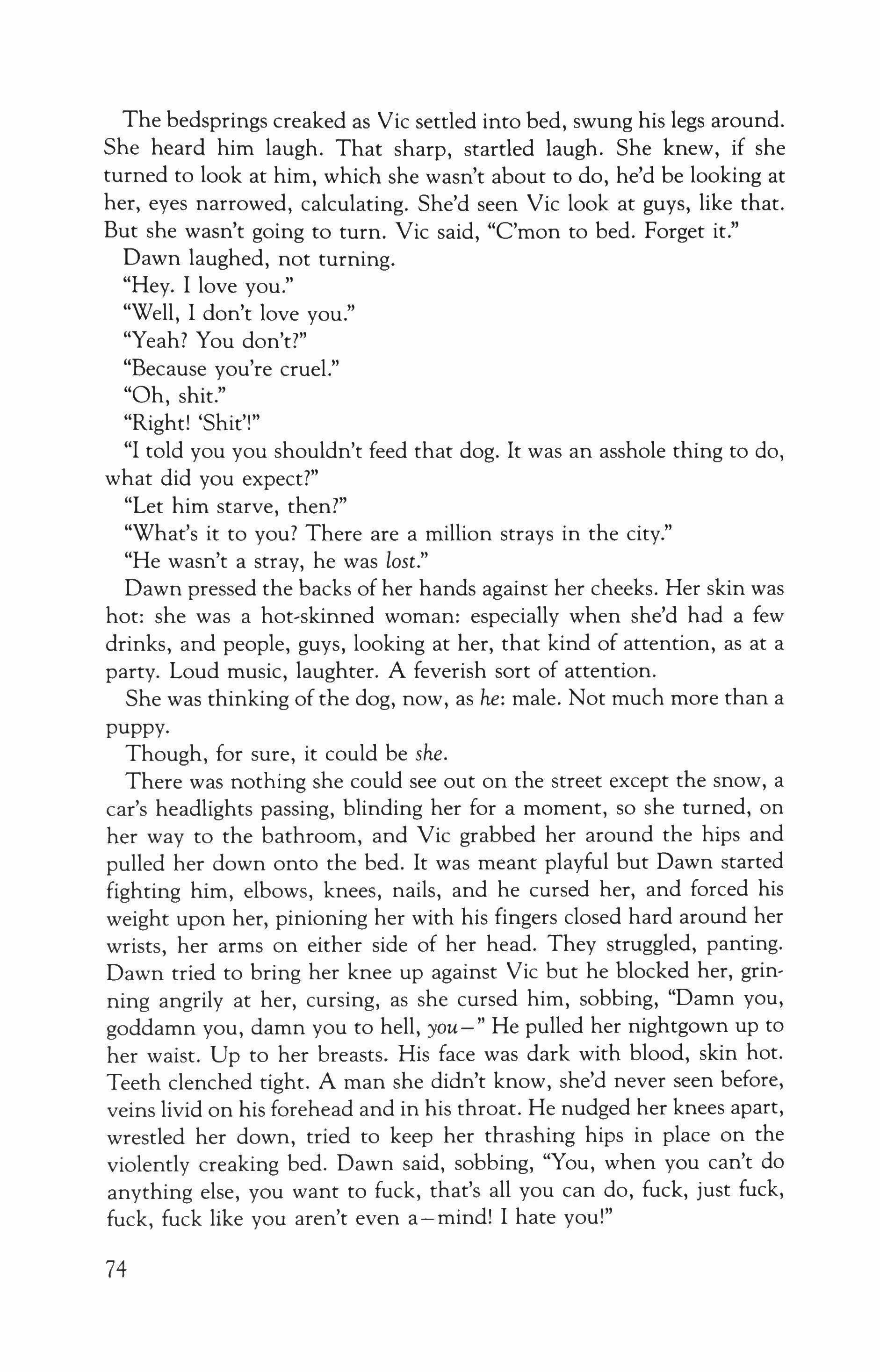
The bedsprings creaked as Vic settled into bed, swung his legs around. She heard him laugh. That sharp, startled laugh. She knew, if she turned to look at him, which she wasn't about to do, he'd be looking at her, eyes narrowed, calculating. She'd seen Vic look at guys, like that. But she wasn't going to turn. Vic said, "C'mon to bed. Forget it."
Dawn laughed, not turning.
"Hey. I love you."
"Well, I don't love you."
"Yeah? You don't?"
"Because you're cruel."
"Oh, shit."
"Right! 'Shit'!"
"I told you you shouldn't feed that dog. It was an asshole thing to do, what did you expect?"
"Let him starve, then?"
"What's it to you? There are a million strays in the city."
"He wasn't a stray, he was lost."
Dawn pressed the backs of her hands against her cheeks. Her skin was hot: she was a hot-skinned woman: especially when she'd had a few drinks, and people, guys, looking at her, that kind of attention, as at a party. Loud music, laughter. A feverish sort of attention.
She was thinking of the dog, now, as he: male. Not much more than a puppy.
Though, for sure, it could be she.
There was nothing she could see out on the street except the snow, a car's headlights passing, blinding her for a moment, so she turned, on her way to the bathroom, and Vic grabbed her around the hips and pulled her down onto the bed. It was meant playful but Dawn started fighting him, elbows, knees, nails, and he cursed her, and forced his weight upon her, pinioning her with his fingers closed hard around her wrists, her arms on either side of her head. They struggled, panting. Dawn tried to bring her knee up against Vic but he blocked her, grinning angrily at her, cursing, as she cursed him, sobbing, "Damn you, goddamn you, damn you to hell, you-" He pulled her nightgown up to her waist. Up to her breasts. His face was dark with blood, skin hot. Teeth clenched tight. A man she didn't know, she'd never seen before, veins livid on his forehead and in his throat. He nudged her knees apart, wrestled her down, tried to keep her thrashing hips in place on the violently creaking bed. Dawn said, sobbing, "You, when you can't do anything else, you want to fuck, that's all you can do, fuck, just fuck, fuck, fuck like you aren't even a - mind! I hate you!"
74
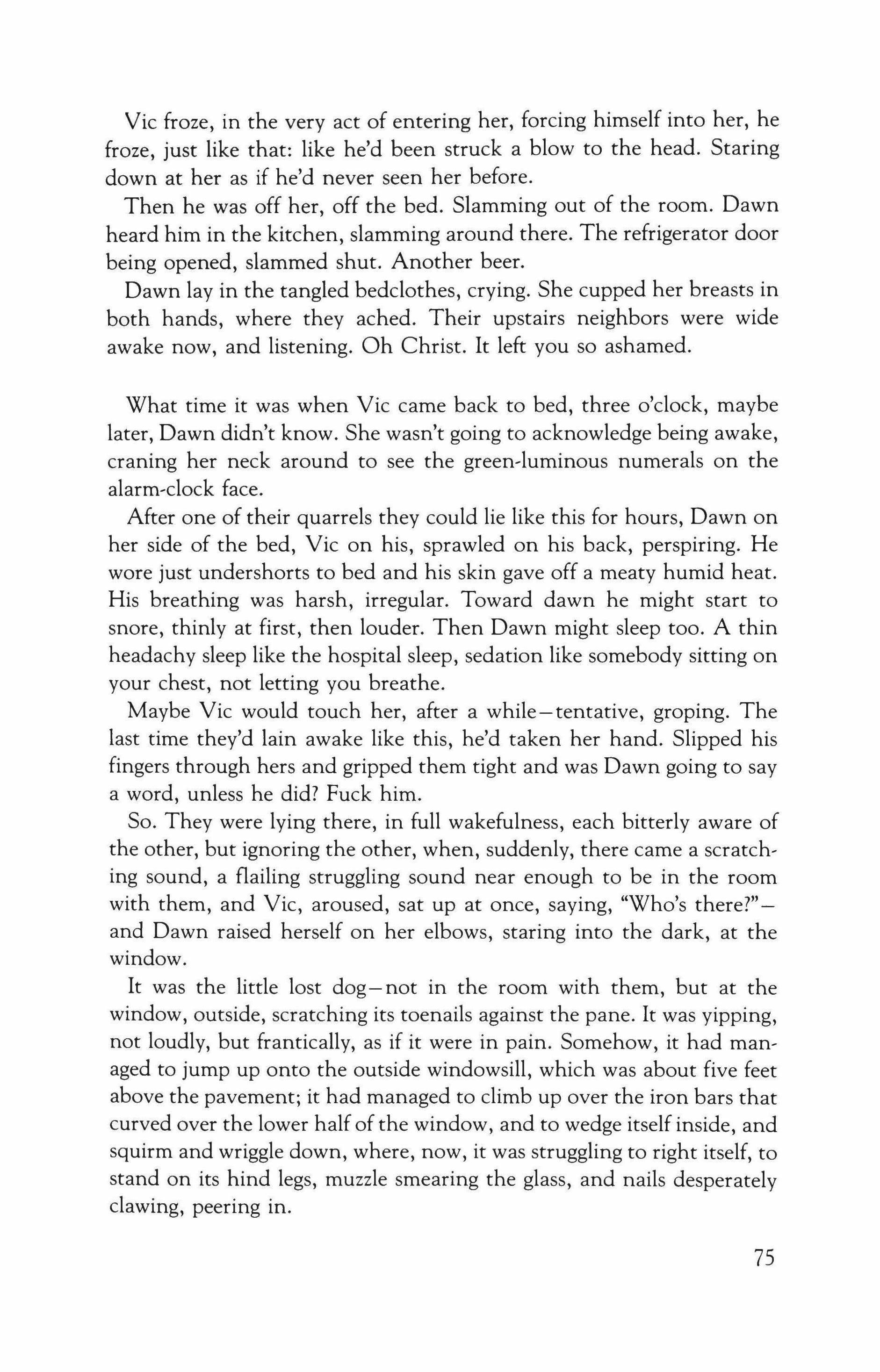
Vic froze, in the very act of entering her, forcing himself into her, he froze, just like that: like he'd been struck a blow to the head. Staring down at her as if he'd never seen her before.
Then he was off her, off the bed. Slamming out of the room. Dawn heard him in the kitchen, slamming around there. The refrigerator door being opened, slammed shut. Another beer.
Dawn lay in the tangled bedclothes, crying. She cupped her breasts in both hands, where they ached. Their upstairs neighbors were wide awake now, and listening. Oh Christ. It left you so ashamed.
What time it was when Vic came back to bed, three o'clock, maybe later, Dawn didn't know. She wasn't going to acknowledge being awake, craning her neck around to see the green-luminous numerals on the alarm-clock face.
After one of their quarrels they could lie like this for hours, Dawn on her side of the bed, Vic on his, sprawled on his back, perspiring. He wore just undershorts to bed and his skin gave off a meaty humid heat. His breathing was harsh, irregular. Toward dawn he might start to snore, thinly at first, then louder. Then Dawn might sleep too. A thin headachy sleep like the hospital sleep, sedation like somebody sitting on your chest, not letting you breathe.
Maybe Vic would touch her, after a while-tentative, groping. The last time they'd lain awake like this, he'd taken her hand. Slipped his fingers through hers and gripped them tight and was Dawn going to say a word, unless he did? Fuck him.
So. They were lying there, in full wakefulness, each bitterly aware of the other, but ignoring the other, when, suddenly, there came a scratching sound, a flailing struggling sound near enough to be in the room with them, and Vic, aroused, sat up at once, saying, "Who's there?"and Dawn raised herself on her elbows, staring into the dark, at the window.
It was the little lost dog-not in the room with them, but at the window, outside, scratching its toenails against the pane. It was yipping, not loudly, but frantically, as if it were in pain. Somehow, it had managed to jump up onto the outside windowsill, which was about five feet above the pavement; it had managed to climb up over the iron bars that curved over the lower halfof the window, and to wedge itself inside, and squirm and wriggle down, where, now, it was struggling to right itself, to stand on its hind legs, muzzle smearing the glass, and nails desperately clawing, peering in.
75
After Surgery
John Skoyles

Walking the hall was like circling the dance floor the night Piggy's got strobe lights. Just as you sidestepped the waitress she clanged you with her tray, the eclipse too quick for those of us laboring under the ruling constellations, slaving like ice in tumblers of gin. A codeine sleep our sole release except for baseball, a pleasure wrecked all week by the ubiquitous presence of a part-time catcher from Chicago named Karkovice whose name boiled up in fever dreams as a refrain that tugged my head from one side of the bed to the other.
Karkovice, a voodoo doctor mixing a potion called "J azz Drool."
Karkovice, the tarpit that flummoxed the last mastodon.
Karkovice, an overthrown dictator manacled to his wife.
Karkovice, the phrase, in Stupka, for "more than enough."
76
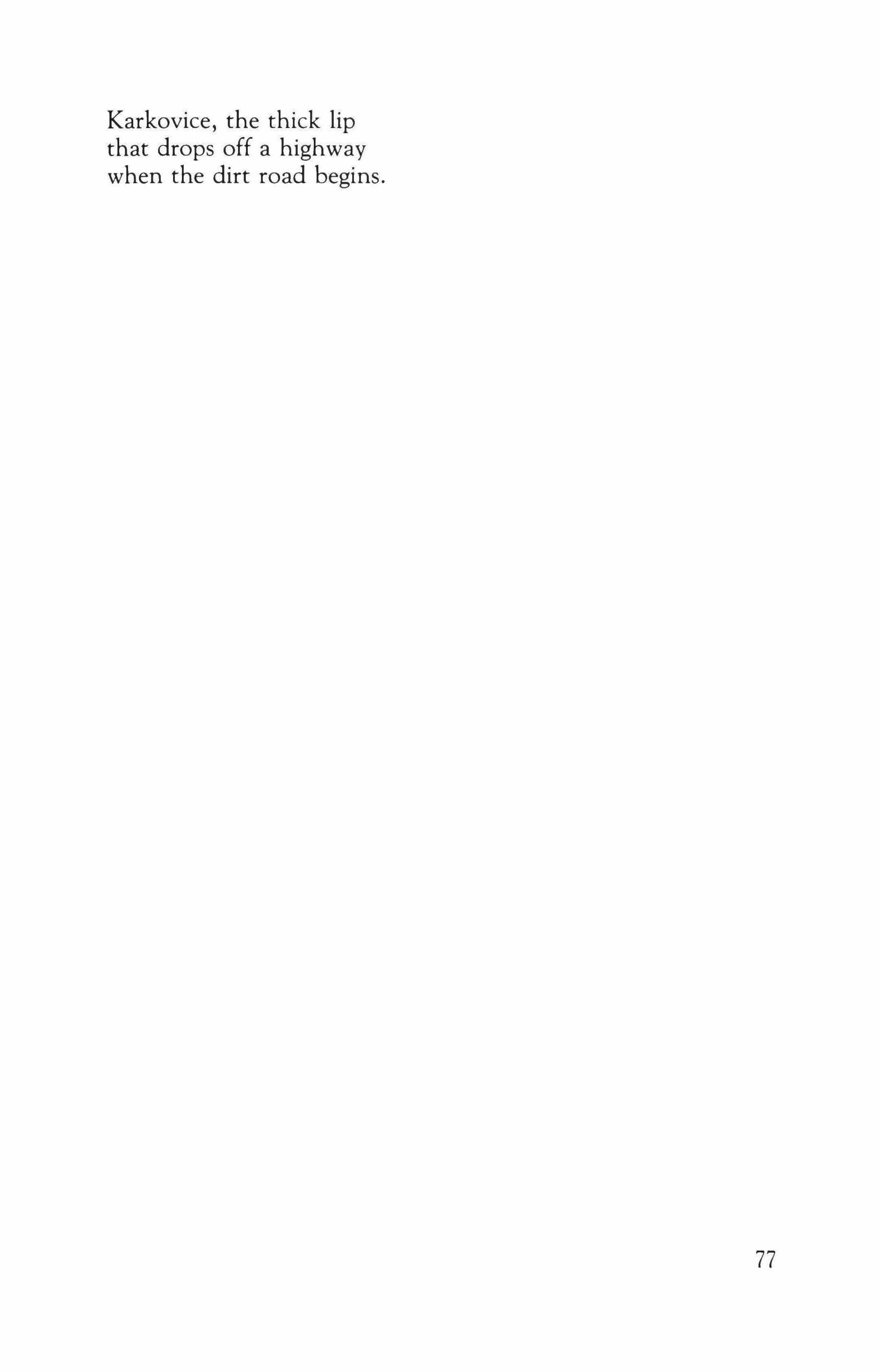
Karkovice, the thick lip that drops off a highway when the dirt road begins.
77
Three Poems
Ellen Dudley
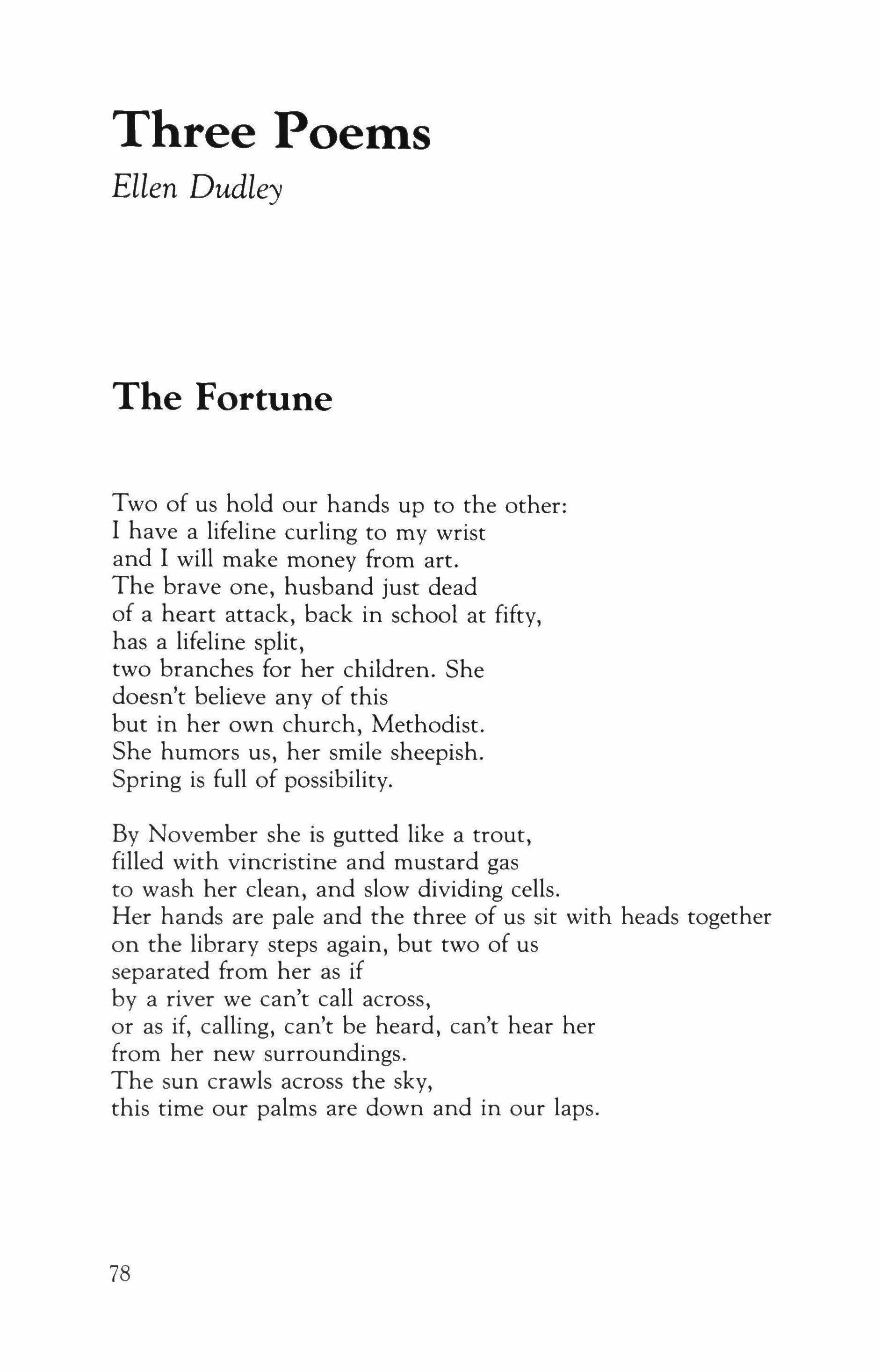
The Fortune
Two of us hold our hands up to the other: I have a lifeline curling to my wrist and I will make money from art. The brave one, husband just dead of a heart attack, back in school at fifty, has a lifeline split, two branches for her children. She doesn't believe any of this but in her own church, Methodist. She humors us, her smile sheepish. Spring is full of possibility.
By November she is gutted like a trout, filled with vincristine and mustard gas to wash her clean, and slow dividing cells. Her hands are pale and the three of us sit with heads together on the library steps again, but two of us separated from her as if by a river we can't call across, or as if, calling, can't be heard, can't hear her from her new surroundings. The sun crawls across the sky, this time our palms are down and in our laps.
78
Washington DC, 1990

In the hot April sun the little girl stared and said my eyes were uneven and was I born like that. A split orbit and crooked mouth drove me to the wall to look for a name that afternoon, yet no matter how I spelled it, he was not there. Twenty years since I last saw him, in the motel lot outside his room, black stitches in my eye and glass from the little Triumph weeping from my cheek as it would for months, and he would not look at me. Back from his second tour in Vietnam, he looked over my shoulder; he liked his things perfect: the red Corvette, Swiss watch. The sun shines on the black granite and the planes of my face reflect back, marked not by scars but by names. I reach out and touch one from 1970, still trying to settle something. I came to the wall not to grieve but because I wanted to find him there.
79
Recidivist

The fat white candles, I think they must be religious candles, the ceremonial candles splatter light on the wall, and what sits in the three feet between us is desire. Desire is a pile of kindling and I have a handful of matches, a mouthful. Instead of leaning across that space to kiss the corner of his mouth, I could get up and walk through the door and shut it. I could walk to the lighted hallway to my own bed, which, these nights, is full of the others who turn their faces to the wall, as if I wouldn't know them, the set of their shoulders, their smells:
The hitchhiker; the junkie from Montreal; the Israeli boy in Athens; the gardener who carried the spermy scent of yew trees; my Marine, dead at Khe Sanh with my teeth marks still in his shoulder; white Alma, who sat on the edge of the bathtub, her blond hair falling outside her knees, her hands clenched between them, crooning "touch her, touch her," and Meg backed up against the bathroom door, the whole world opening in her mouth, red and wet and perfect as it came down on mine and blue velvet sliding on nylon and the awful pounding on the door, a husband, some husband, howlingthe three of us scrambling up, Meg picking the rug lint from my velvet, thumb and index meeting as they would meet on a nipple, shrewd and soft and unwilling to let go, and Alma opening the door, the flush fading from her face, from all of us, and longing unfinished to this day.
80
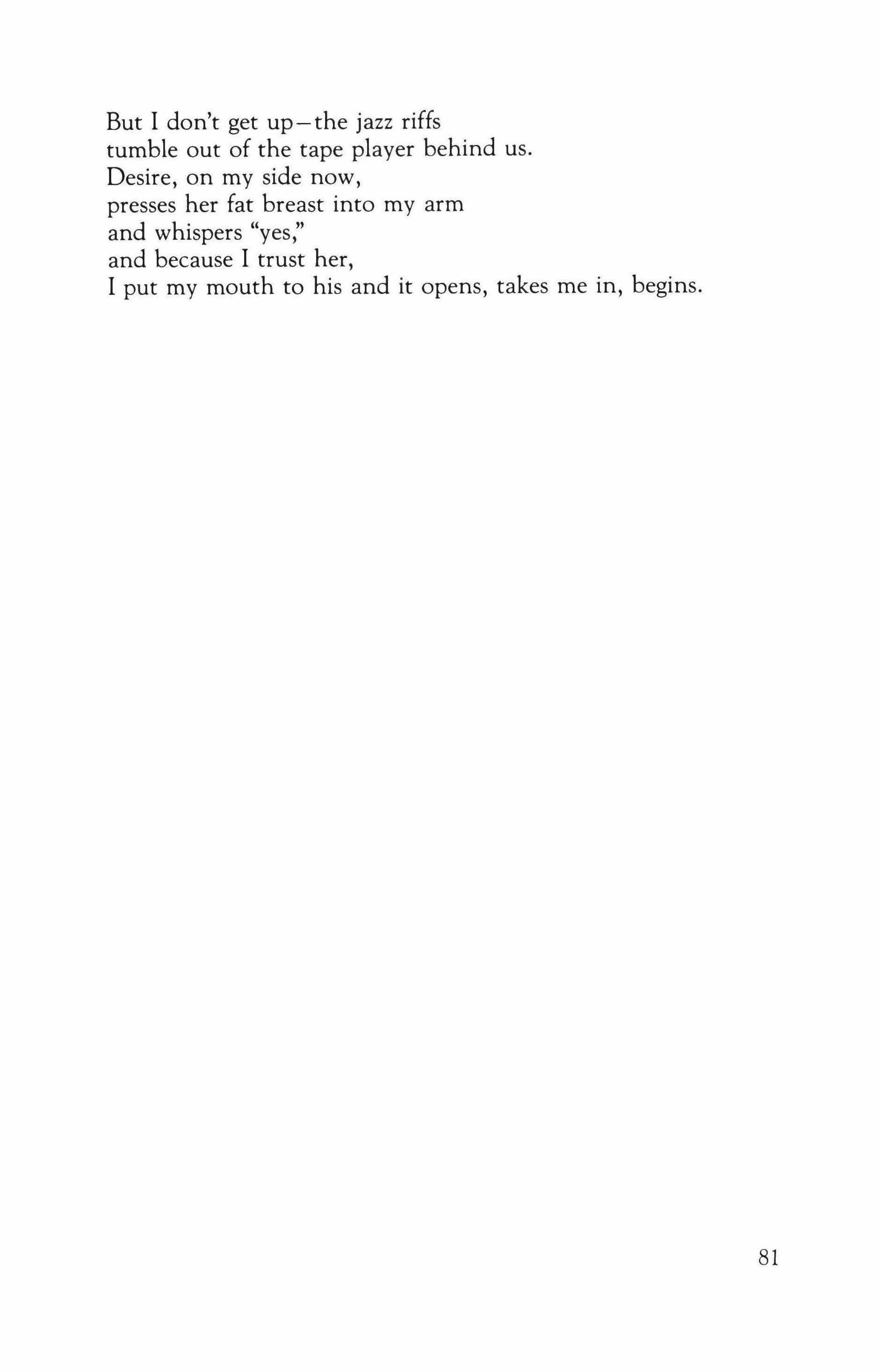
But I don't get up-the jazz riffs tumble out of the tape player behind us. Desire, on my side now, presses her fat breast into my arm and whispers "yes," and because I trust her, I put my mouth to his and it opens, takes me in, begins.
81
Two Poems
Ralph Burns

First Flight
I shucked my lucky clothes and jumped in, swam beyond the bushes, thick canebrake until I reached a tangle of grapevine and low mesquite which hid me from the party. I listened. I think that's when I saw her breast I saw him kiss her breast. I leaned on a hinge of small mesquite. A sound unearthed itself from his throat. Hey boy, is that you? I scraped my body on rock and bark hoping to fly - cardinalis cardinalis. Clad in leaves, reeking black, familiar mud, I saw two rough lovers love, I saw them love and move. I swam and then I put on clothes and ran through vacant lots. That half-chimney was still standing, so was the houseful of stolen parts, so was the fence where once a boy asked to pay me just to drink my piss. Reader, where did I run, whose breathing you must have heard, when I was thirteen or fourteen, your own desire just beginning to speak openly in my pulse? That random synapse leap of the world caught me, too, just as I broke into the open, just as I busted through the trees.
82
For My Wife, on Our Son's Third Birthday
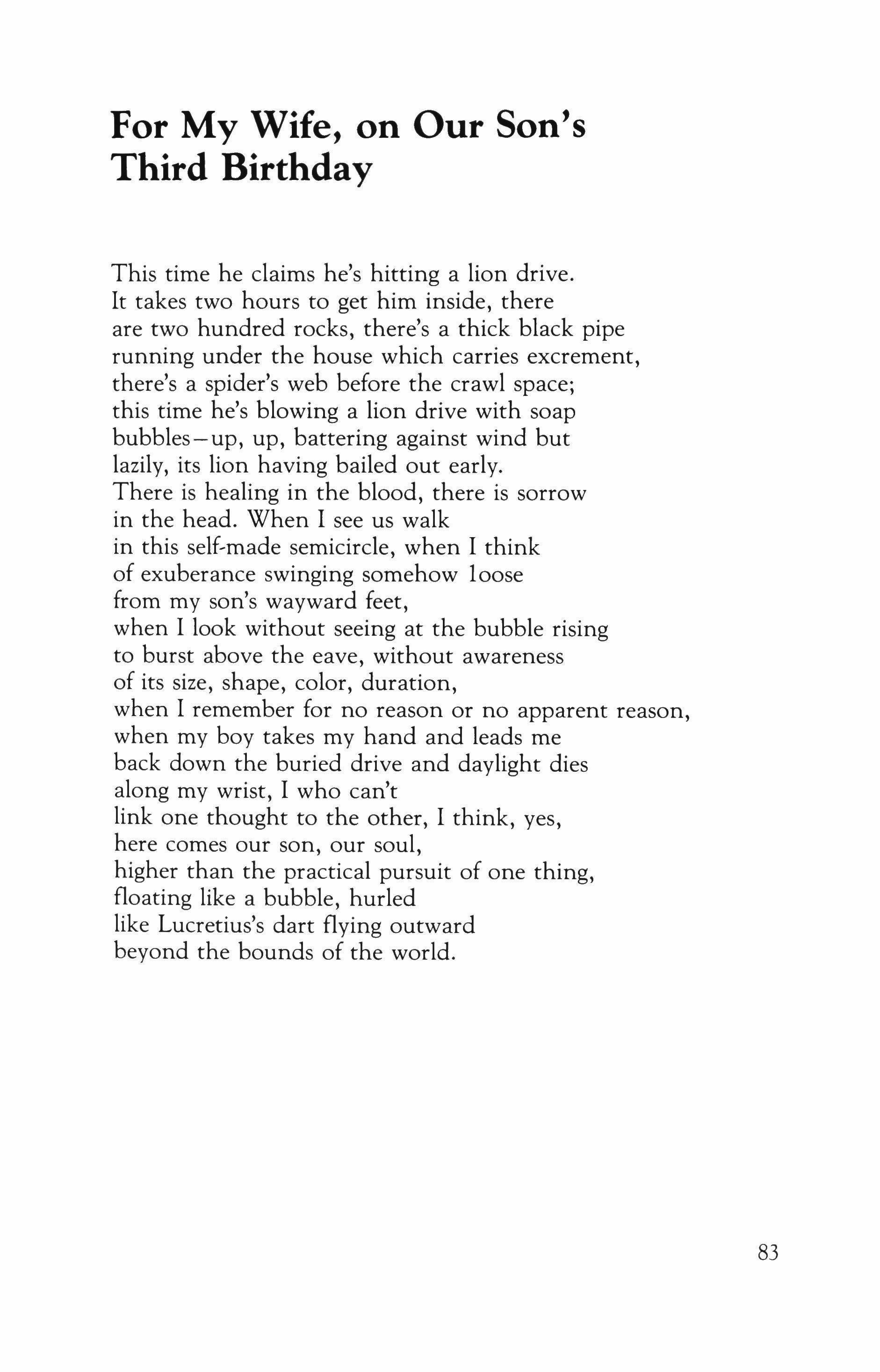
This time he claims he's hitting a lion drive. It takes two hours to get him inside, there are two hundred rocks, there's a thick black pipe running under the house which carries excrement, there's a spider's web before the crawl space; this time he's blowing a lion drive with soap bubbles-up, up, battering against wind but lazily, its lion having bailed out early. There is healing in the blood, there is sorrow in the head. When I see us walk in this self-made semicircle, when I think of exuberance swinging somehow loose from my son's wayward feet, when I look without seeing at the bubble rising to burst above the eave, without awareness of its size, shape, color, duration, when I remember for no reason or no apparent reason, when my boy takes my hand and leads me back down the buried drive and daylight dies along my wrist, I who can't link one thought to the other, I think, yes, here comes our son, our soul, higher than the practical pursuit of one thing, floating like a bubble, hurled like Lucretius's dart flying outward beyond the bounds of the world.
83
Three Poem.s
Shelly Wagner
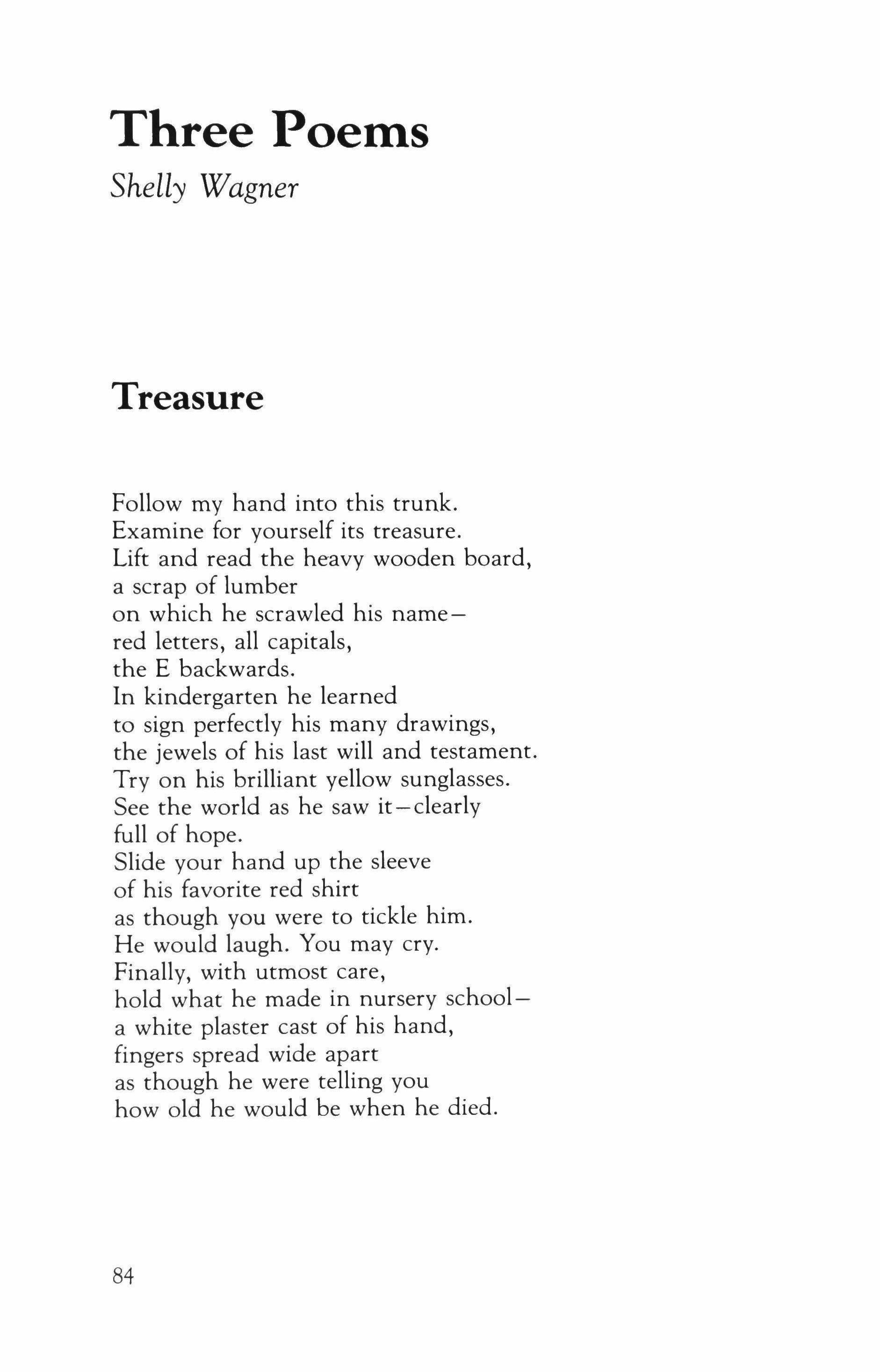
Treasure
Follow my hand into this trunk. Examine for yourself its treasure. Lift and read the heavy wooden board, a scrap of lumber on which he scrawled his namered letters, all capitals, the E backwards. In kindergarten he learned to sign perfectly his many drawings, the jewels of his last will and testament. Tryon his brilliant yellow sunglasses. See the world as he saw it - clearly full of hope.
Slide your hand up the sleeve of his favorite red shirt as though you were to tickle him. He would laugh. You may cry. Finally, with utmost care, hold what he made in nursery schoola white plaster cast of his hand, fingers spread wide apart as though he were telling you how old he would be when he died.
84
Thomas's Birthday

You drowned on Thursday. We buried you on Saturday. Your brother's birthday was Sunday. We didn't need food. Friends had filled our home with deviled eggs, fried chicken, cold cuts, cooked hams. You would have loved our stuffed refrigerator, its door still sporting your drawings. Someone brought a cake with twelve candles. We circled the kitchen table. Your brother smiled bravely; thanked everyone for their gifts, including the brightly striped beach chair with a matching towel. For a moment Thomas tried to amuse us. He wrapped the colored towel around his shoulders and sat in his striped chair. He was a sight. Some laughed. But to me it looked like Joseph's coat of many colors-proof that a son was dead. I left to find the sparklers we had saved from the Fourth of July. I put one on the cake, lit it, we all sang. The sparkler burned and exploded until it was a charred black stick crumpled in the center of the cake filling the house with smoky incense. Someone was worried it would burn down the house.
85
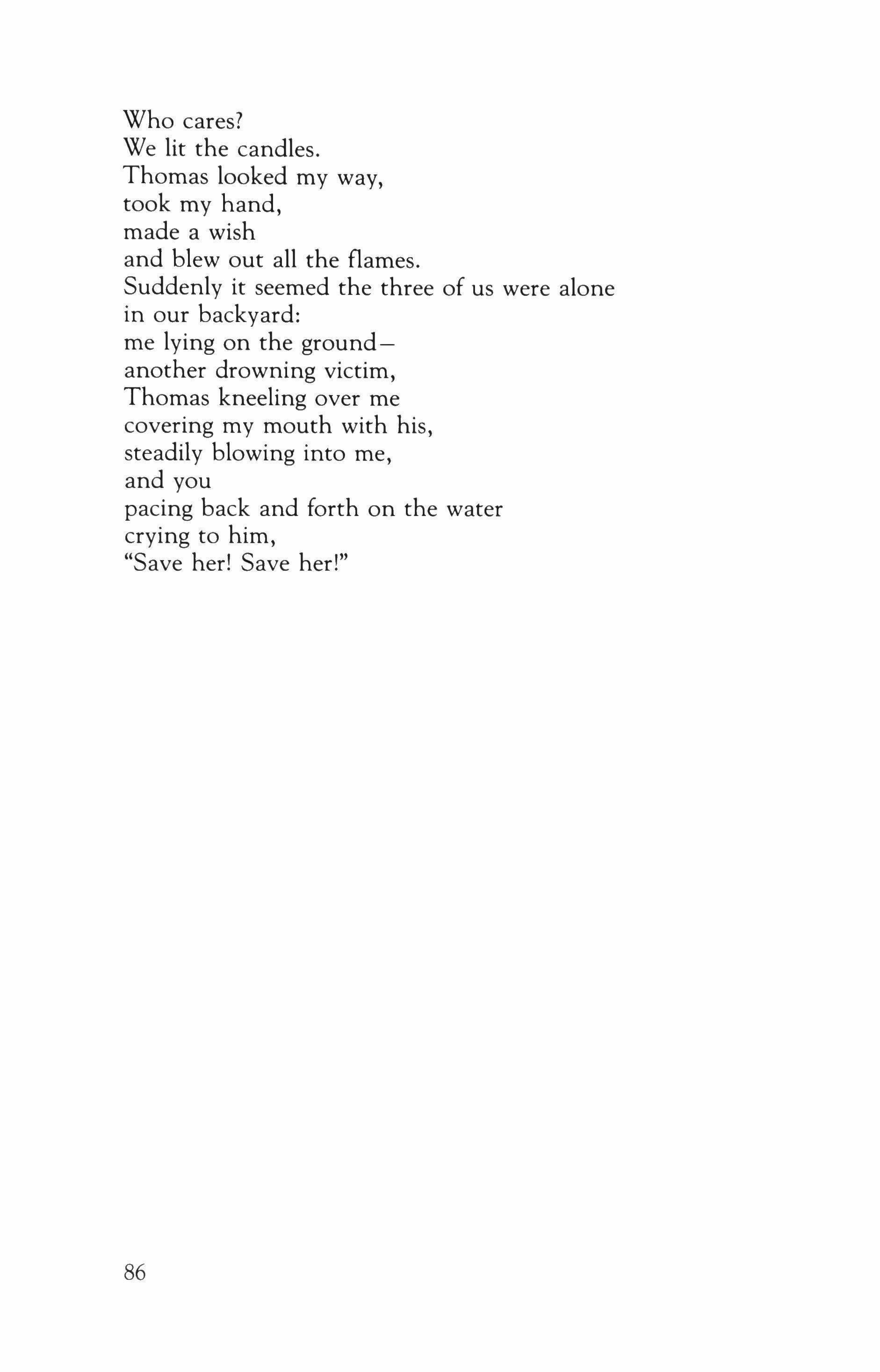
Who cares?
We lit the candles. Thomas looked my way, took my hand, made a wish and blew out all the flames. Suddenly it seemed the three of us were alone in our backyard: me lying on the groundanother drowning victim, Thomas kneeling over me covering my mouth with his, steadily blowing into me, and you pacing back and forth on the water crying to him, "Save herl Save her!"
86
What If?
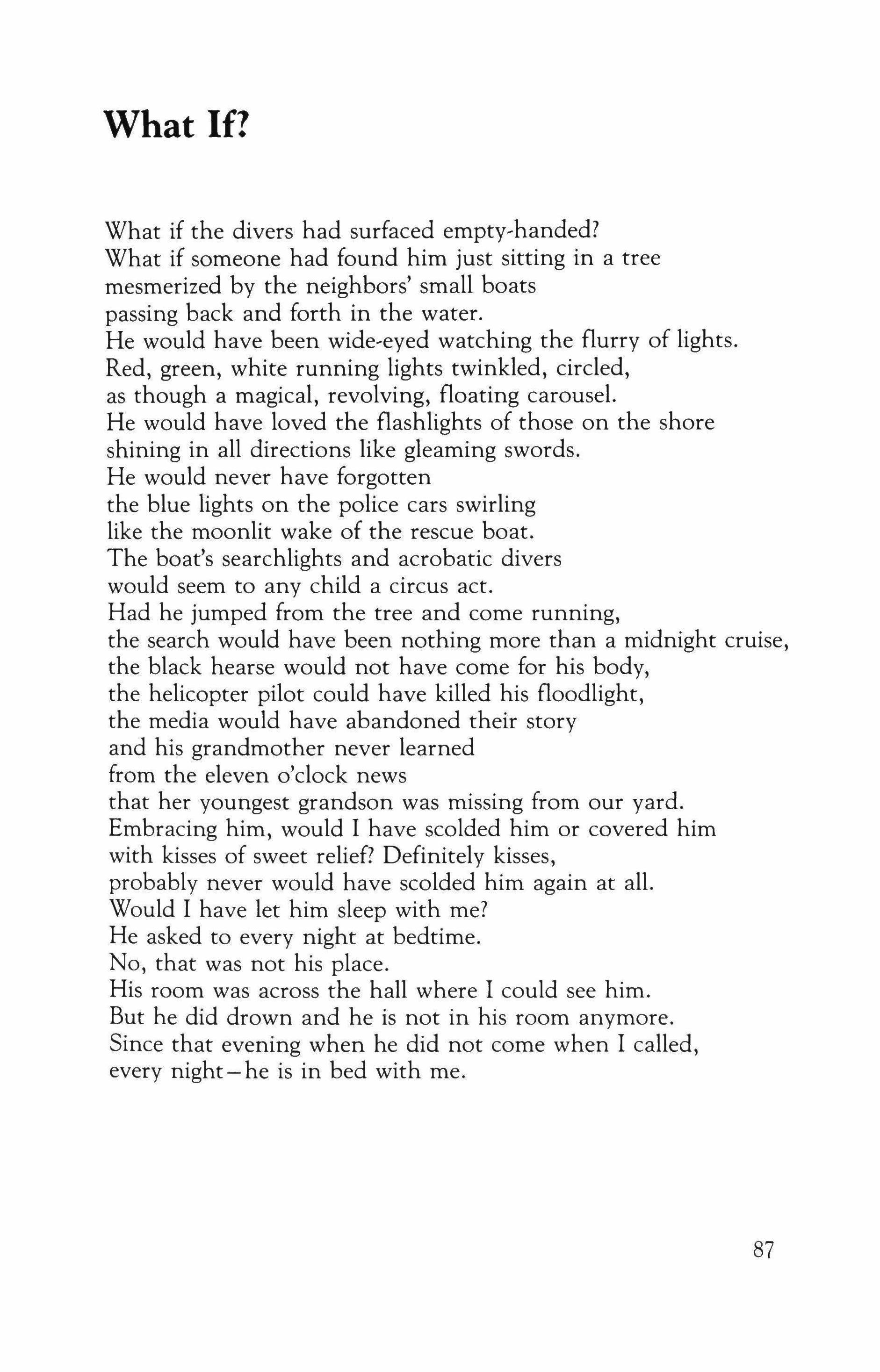
What if the divers had surfaced ernptv-handed?
What if someone had found him just sitting in a tree mesmerized by the neighbors' small boats passing back and forth in the water. He would have been wide-eyed watching the flurry of lights. Red, green, white running lights twinkled, circled, as though a magical, revolving, floating carousel. He would have loved the flashlights of those on the shore shining in all directions like gleaming swords. He would never have forgotten the blue lights on the police cars swirling like the moonlit wake of the rescue boat. The boat's searchlights and acrobatic divers would seem to any child a circus act. Had he jumped from the tree and come running, the search would have been nothing more than a midnight cruise, the black hearse would not have come for his body, the helicopter pilot could have killed his floodlight, the media would have abandoned their story and his grandmother never learned from the eleven o'clock news that her youngest grandson was missing from our yard. Embracing him, would I have scolded him or covered him with kisses of sweet relief? Definitely kisses, probably never would have scolded him again at all. Would I have let him sleep with me? He asked to every night at bedtime. No, that was not his place. His room was across the hall where I could see him. But he did drown and he is not in his room anymore. Since that evening when he did not come when I called, every night-he is in bed with me.
87
The Entomologist
Michael Bugeja

He knows now why insects will Inherit the earth, your basic Roach as prehistoric as a shark
Asphyxiating in an oil slick,
Your basic ant colony
Overpopulated as any homo-sapiens City, with greater overall bioMass. You have to admire them,
The compound eyes and antennae, Exoskeletons of armor, stylets
Sharp as ice pick, enough poison In a scorpion to halt the heart.
So easy then to fall in love
With bugs as a boy, memorizing Phyla while his parents fought On a farm in Pennsylvania.
He would slip to the flowering Meadow with a canning jar
Whose lid had no holes for air, Mini coliseum, the specimens
He caught, the gladiators: Lady" water" and lightningbugs,
88
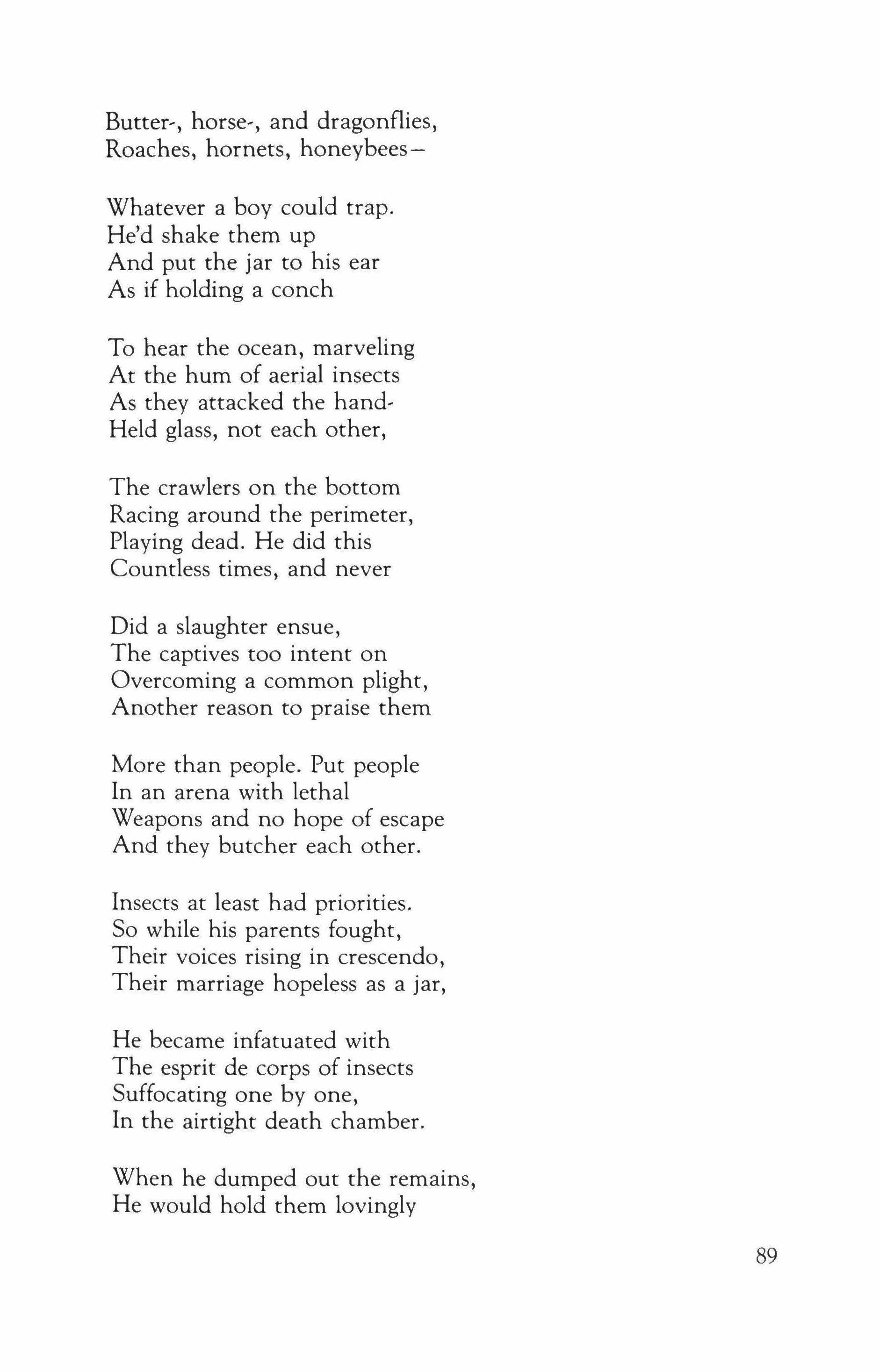
Butter" horse', and dragonflies, Roaches, hornets, honeybees-
Whatever a boy could trap. He'd shake them up
And put the jar to his ear As if holding a conch
To hear the ocean, marveling At the hum of aerial insects
As they attacked the hand, Held glass, not each other,
The crawlers on the bottom Racing around the perimeter, Playing dead. He did this Countless times, and never
Did a slaughter ensue, The captives too intent on Overcoming a common plight, Another reason to praise them
More than people. Put people In an arena with lethal Weapons and no hope of escape And they butcher each other.
Insects at least had priorities. So while his parents fought, Their voices rising in crescendo, Their marriage hopeless as a jar,
He became infatuated with The esprit de corps of insects Suffocating one by one, In the airtight death chamber.
When he dumped out the remains, He would hold them lovingly
89
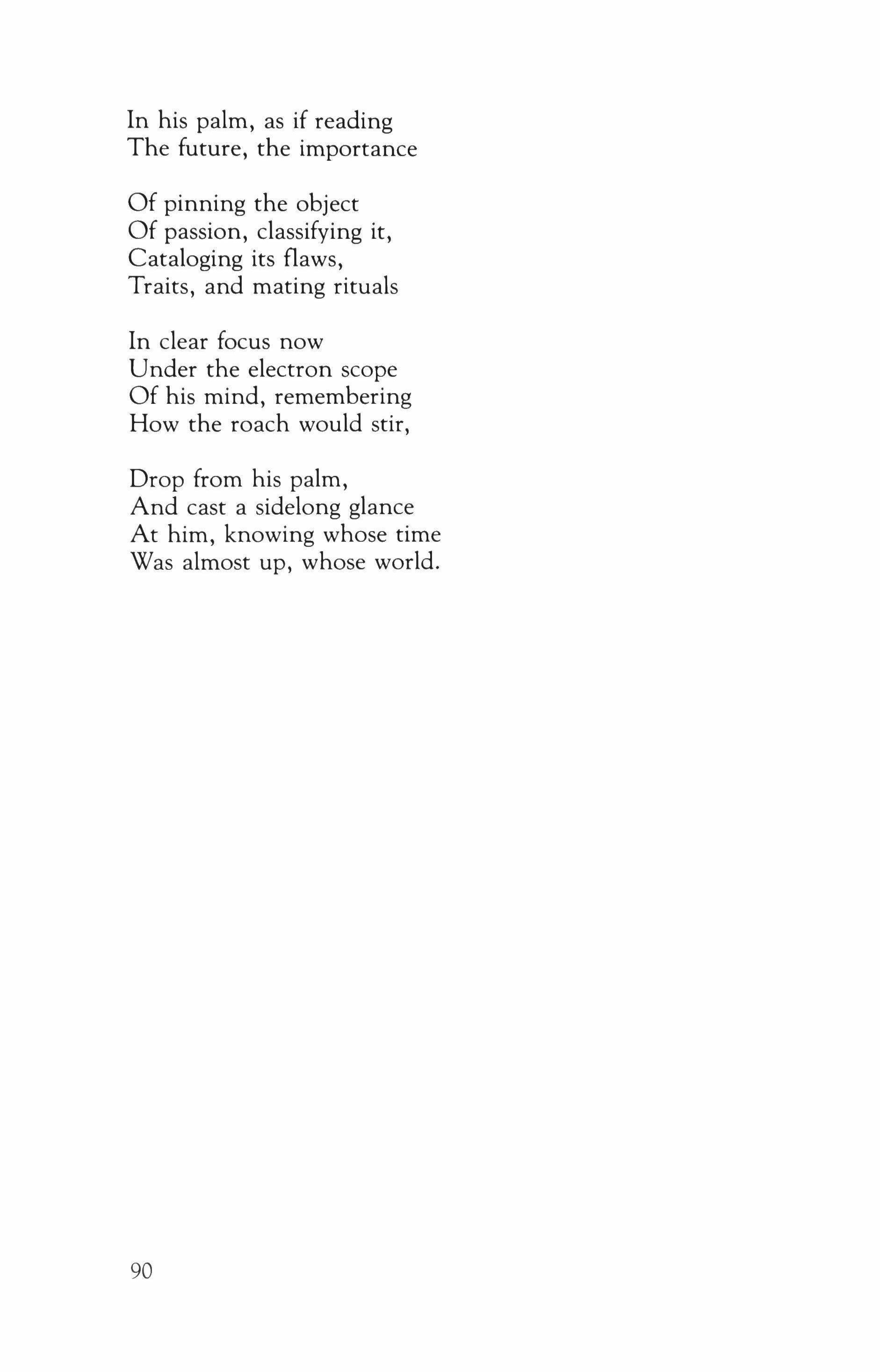
In his palm, as if reading The future, the importance
Of pinning the object
Of passion, classifying it, Cataloging its flaws, Traits, and mating rituals
In clear focus now
Under the electron scope Of his mind, remembering How the roach would stir,
Drop from his palm, And cast a sidelong glance At him, knowing whose time Was almost up, whose world.
90
Shooting the Works
w. s. Di Pieto

Charm
You're walking on a beach and find a small stone, nearly round and worn smooth except for a prickly spur or notch, some flaw that breaks up the curvilinear perfection the friction of sea and sand has contrived. The irregularity, its oddness, its completed imperfectedness, gives it special value. If it were sweetly roundly beautiful, you might throw it back or take it home and add it to your collection, on a shelf, behind glass. Throw it away or display it - it makes no difference. But because of its flawed or disrupted form, you put it in your pocket and keep it there, an amulet, to bring good fortune or beat away bad, precisely because it does not fit right and good in the cavity of your fist.
Some fourteen years ago, living in south Louisiana, I sometimes went to an informal gathering of poets from the area. It was the usual sort of get-together of people who were writing and wanted a neighborhood of criticism. (I was teaching composition at the local state university; I was the only one in our group who had not been in a writing workshop.) By that time I had written poems that would later appear in a book called The Only Dangerous Thing, in which I tried to tell a pattern of emigration, the passion of dispersal and cultural dispossession, that was part of my own history and seemed also a general American story. I brought a few of the poems to one of our meetings, and the only comment I still remember is that the poems lacked charm. I'd never heard that word used to describe a desirable quality of poetry-used by a writer, I meanand it confused me. I knew charm to be poetry's first, Orphic power, when the music of voice and words falls upon the wild things of the world and stills them for the duration of the song. But this is charm as enchantment, a narcotic power that draws on the savage entanglements of magic and nature. My critic had something more social in mind, a quality of collegial amenity, the preservation of experience in forms that can be processed by readers or listeners without too much anxiety or
91
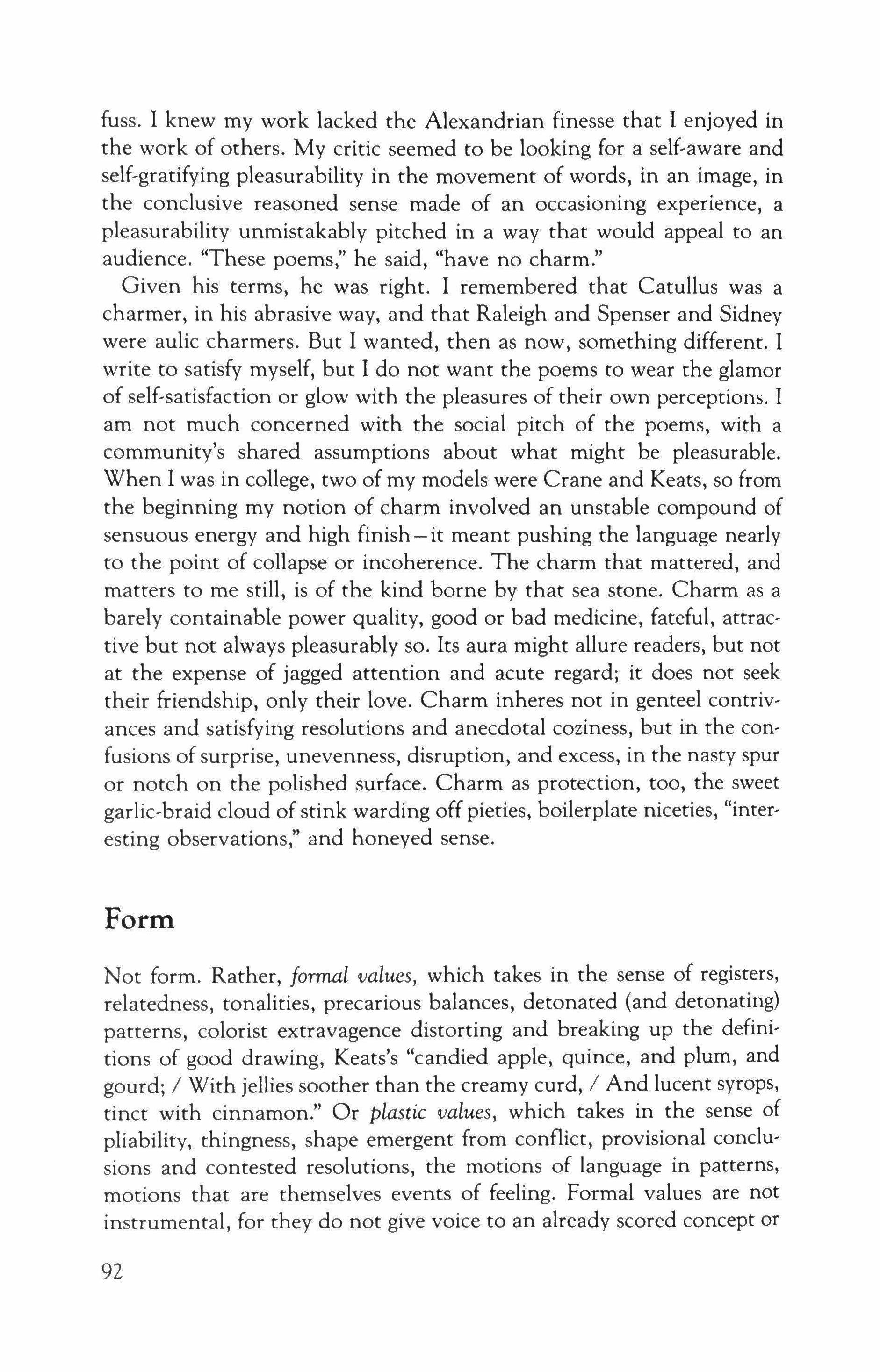
fuss. I knew my work lacked the Alexandrian finesse that I enjoyed in the work of others. My critic seemed to be looking for a self-aware and self-gratifying pleasurability in the movement of words, in an image, in the conclusive reasoned sense made of an occasioning experience, a pleasurability unmistakably pitched in a way that would appeal to an audience. "These poems," he said, "have no charm."
Given his terms, he was right. I remembered that Catullus was a charmer, in his abrasive way, and that Raleigh and Spenser and Sidney were aulic charmers. But I wanted, then as now, something different. I write to satisfy myself, but I do not want the poems to wear the glamor of self-satisfaction or glow with the pleasures of their own perceptions. I am not much concerned with the social pitch of the poems, with a community's shared assumptions about what might be pleasurable. When I was in college, two of my models were Crane and Keats, so from the beginning my notion of charm involved an unstable compound of sensuous energy and high finish - it meant pushing the language nearly to the point of collapse or incoherence. The charm that mattered, and matters to me still, is of the kind borne by that sea stone. Charm as a barely containable power quality, good or bad medicine, fateful, attractive but not always pleasurably so. Its aura might allure readers, but not at the expense of jagged attention and acute regard; it does not seek their friendship, only their love. Charm inheres not in genteel contrivances and satisfying resolutions and anecdotal coziness, but in the confusions of surprise, unevenness, disruption, and excess, in the nasty spur or notch on the polished surface. Charm as protection, too, the sweet garlic-braid cloud of stink warding off pieties, boilerplate niceties, "interesting observations," and honeyed sense.
Form
Not form. Rather, formal values, which takes in the sense of registers, relatedness, tonalities, precarious balances, detonated (and detonating) patterns, colorist extravagence distorting and breaking up the definitions of good drawing, Keats's "candied apple, quince, and plum, and gourd; / With jellies soother than the creamy curd, / And lucent syrops, tinct with cinnamon." Or plastic values, which takes in the sense of pliability, thingness, shape emergent from conflict, provisional conclusions and contested resolutions, the motions of language in patterns, motions that are themselves events of feeling. Formal values are not instrumental, for they do not give voice to an already scored concept or
92
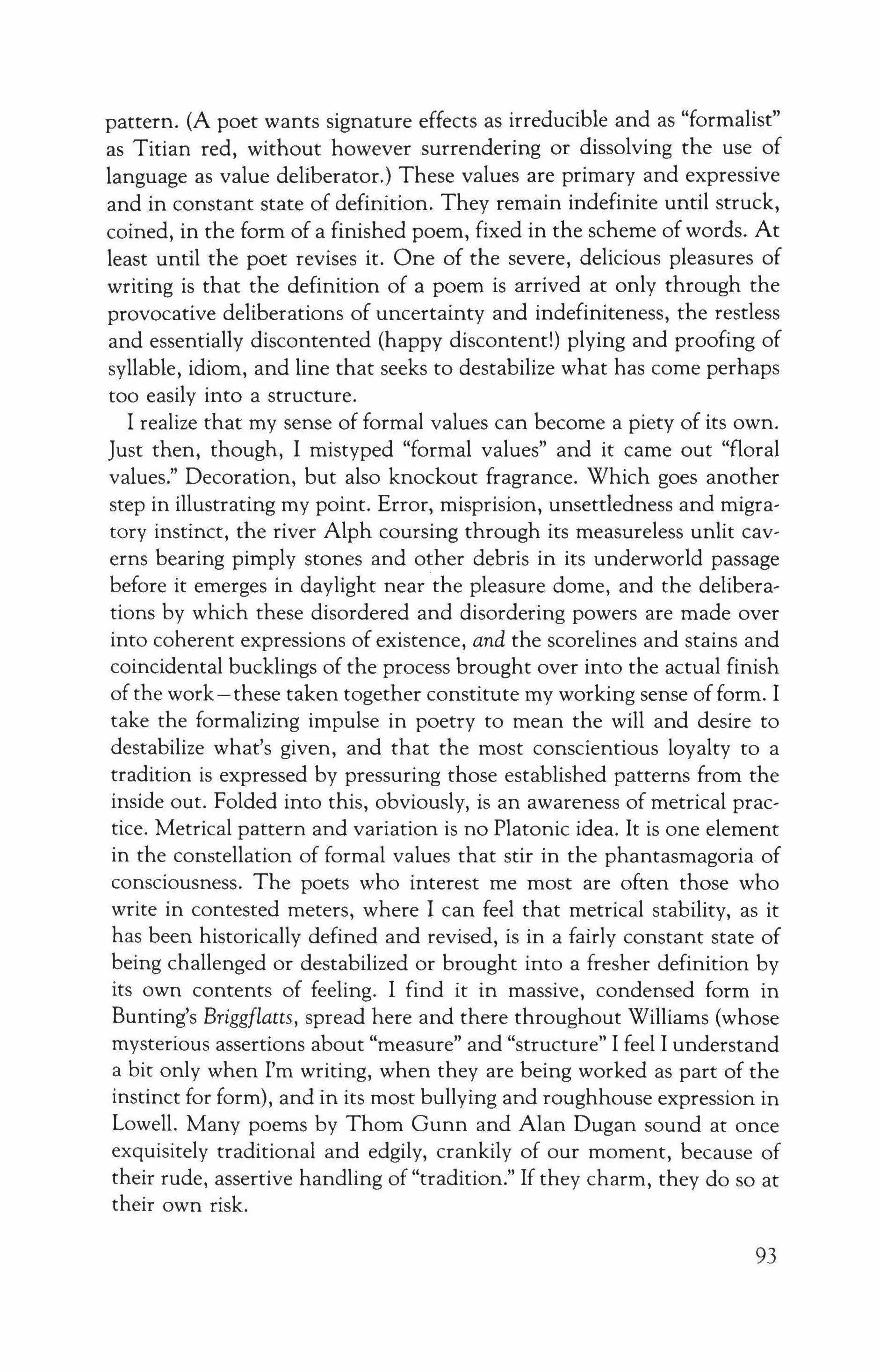
pattern. (A poet wants signature effects as irreducible and as "formalist" as Titian red, without however surrendering or dissolving the use of language as value deliberator.) These values are primary and expressive and in constant state of definition. They remain indefinite until struck, coined, in the form of a finished poem, fixed in the scheme of words. At least until the poet revises it. One of the severe, delicious pleasures of writing is that the definition of a poem is arrived at only through the provocative deliberations of uncertainty and indefiniteness, the restless and essentially discontented (happy discontent!) plying and proofing of syllable, idiom, and line that seeks to destabilize what has come perhaps too easily into a structure.
I realize that my sense of formal values can become a piety of its own. Just then, though, I mistyped "formal values" and it came out "floral values." Decoration, but also knockout fragrance. Which goes another step in illustrating my point. Error, misprision, unsettledness and migratory instinct, the river Alph coursing through its measureless unlit caverns bearing pimply stones and other debris in its underworld passage before it emerges in daylight near the pleasure dome, and the deliberations by which these disordered and disordering powers are made over into coherent expressions of existence, and the scorelines and stains and coincidental bucklings of the process brought over into the actual finish of the work-these taken together constitute my working sense ofform. I take the formalizing impulse in poetry to mean the will and desire to destabilize what's given, and that the most conscientious loyalty to a tradition is expressed by pressuring those established patterns from the inside out. Folded into this, obviously, is an awareness of metrical practice. Metrical pattern and variation is no Platonic idea. It is one element in the constellation of formal values that stir in the phantasmagoria of consciousness. The poets who interest me most are often those who write in contested meters, where I can feel that metrical stability, as it has been historically defined and revised, is in a fairly constant state of being challenged or destabilized or brought into a fresher definition by its own contents of feeling. I find it in massive, condensed form in Bunting's Briggflaus, spread here and there throughout Williams (whose mysterious assertions about "measure" and "structure" I feel I understand a bit only when I'm writing, when they are being worked as part of the instinct for form), and in its most bullying and roughhouse expression in Lowell. Many poems by Thorn Gunn and Alan Dugan sound at once exquisitely traditional and edgily, crankily of our moment, because of their rude, assertive handling of "tradition." If they charm, they do so at their own risk.
93

Most of those in recent years who have been called, or who call themselves, New Formalists, are essentially illustrators. Form for them is instrumental, not substantive; it annotates or describes emotion but is not expressive of emotion. For these poets, form may be entirely articulated by the mere shape of anecdotal content. I never feel in their work any internal force pushing or pulling the language. It is an exceedingly polite poetry, its language mostly at ease in its own equilibrium and unperturbed knowingness. It takes the complex, painfully adjustive concepts of the Aristotelian mean and flexible ruler and turns them into a justification for handily-arrived-at moral sentences for the good life. This kind of poetry has its pleasures, and only a fool would deny them or their considerable power to charm. They are the pleasures of fine, civilized decoration, an impeccable scrollwork casting its shadows on finely detailed wallpaper. But such poetry often mistakes good manners for formal values. The kind of writing I prefer may not be any more desirable than decorative art, but it is surely something quite different. It is the difference between the poised, ungainsayable, self-absolving melancholy of Philip Larkin, and the inquisitive, volatile, punishing formal dynamics of W. S. Graham or Geoffrey Hill.
History
Mircea Eliade often spoke of the terror of history, "the feeling experienced by a man who is no longer religious, who therefore has no hope of finding any ultimate meaning in the drama of history, and who must undergo the crimes of history without grasping the meaning of them." Captive Israelites knew their suffering had meaning because it was Yahweh's mysterious will at work. Hegel found meaning in events because they were manifestations of Universal Spirit. But in our time, as Eliade saw it, events are so emptied of transhistorical significance that the course of history, the narrative we enact and scrutinize, is trapped in its own cell of self-reference. History thus becomes a terror to be endured for biological reasons only, for species survival. We live in the present, those of us who are not true believers, without any sense of transcendent moral sponsorship, and we experience a neurotic dread, a sense of deprivation and estrangement, and a panic, that were in some ways mitigated by religious belief in most civilizations that have preceded our own. When Salman Rushdie was condemned to death by the Ayatollah Khomeini for blasphemies against Islam in The Satanic Verses, the astonished outrage many Westerners felt made it clear that, quite apart from
94
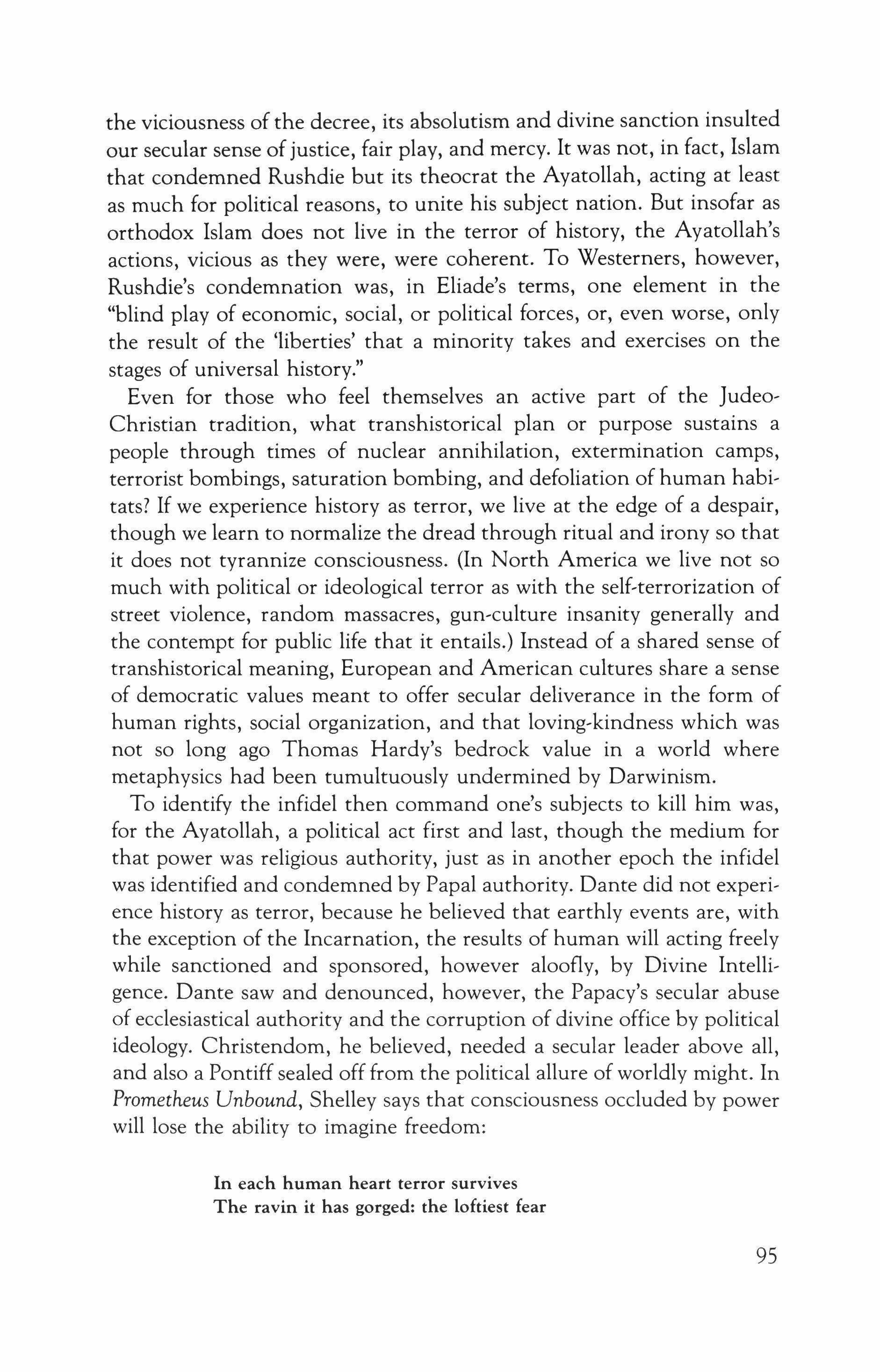
the viciousness of the decree, its absolutism and divine sanction insulted our secular sense ofjustice, fair play, and mercy. It was not, in fact, Islam that condemned Rushdie but its theocrat the Ayatollah, acting at least as much for political reasons, to unite his subject nation. But insofar as orthodox Islam does not live in the terror of history, the Ayatollah's actions, vicious as they were, were coherent. To Westerners, however, Rushdie's condemnation was, in Eliade's terms, one element in the "blind play of economic, social, or political forces, or, even worse, only the result of the 'liberties' that a minority takes and exercises on the stages of universal history."
Even for those who feel themselves an active part of the [udeoChristian tradition, what transhistorical plan or purpose sustains a people through times of nuclear annihilation, extermination camps, terrorist bombings, saturation bombing, and defoliation of human habitats? If we experience history as terror, we live at the edge of a despair, though we learn to normalize the dread through ritual and irony so that it does not tyrannize consciousness. (In North America we live not so much with political or ideological terror as with the self-terrorization of street violence, random massacres, gun-culture insanity generally and the contempt for public life that it entails.) Instead of a shared sense of transhistorical meaning, European and American cultures share a sense of democratic values meant to offer secular deliverance in the form of human rights, social organization, and that loving,kindness which was not so long ago Thomas Hardy's bedrock value in a world where metaphysics had been tumultuously undermined by Darwinism.
To identify the infidel then command one's subjects to kill him was, for the Ayatollah, a political act first and last, though the medium for that power was religious authority, just as in another epoch the infidel was identified and condemned by Papal authority. Dante did not experience history as terror, because he believed that earthly events are, with the exception of the Incarnation, the results of human will acting freely while sanctioned and sponsored, however aloofly, by Divine Intelligence. Dante saw and denounced, however, the Papacy's secular abuse of ecclesiastical authority and the corruption of divine office by political ideology. Christendom, he believed, needed a secular leader above all, and also a Pontiff sealed off from the political allure of worldly might. In Prometheus Unbound, Shelley says that consciousness occluded by power will lose the ability to imagine freedom:
In each human heart terror survives The ravin it has gorged: the loftiest fear
95

All that they would disdain to think were true: Hypocrisy and custom make their minds
The fanes of many a worship, now outworn. They dare not devise good for man's estate, And yet they know not that they do not dare. The good want power, but to weep barren tears. The powerful goodness want: worse need for them. The wise want love; and those who love want wisdom; And all best things are thus confused to ill.
Laughter
How do poets respond to living in the terror of history? They live entirely in their moment, as Dante and Shelley did, and also live intensely the near memory of those justifications that once gave (and for believers still give) structure and purpose to horrible events. They exercise, indeed cultivate, skepticism toward authority, which survives largely by denying or shackling imagination. Sometimes the skepticism is expressed most intimately, as dismantlings or interrogations ofpoetry's authority of forms, its available conventions and received assumptions. Sometimes openly, as abrasive, blasphemous, chaotic humor. The Aristophanes of the Thesmophoriazusae was a deeply religious artist, though not a complacently pious one. Euripides is probably the most religious of the tragic poets (much more than he is the magisterial rationalist he has often been made to seem) because his lyric skepticism questions the very way consciousness interprets the relation between divine authority and human agency.
When government or rulership is sustained by appeals to religious loyalties, whether by the fundamentalist fanaticism of Islam under the Ayatollah or the moral blackmail of the American Presidency appealing to a bland, approving, Lincolnesque deity, those in power would have us believe that human good is served best by impersonality, beneficent coercion, and generalization about need and duty. Authority thus elevates law above embodiment, abstract generalization over individual recognitions, programmed slogans over hunger cries. When writers like Rushdie suffer at the hands of a fanatic, it is because their views of reality and techniques for apprehending reality are not only different but contrary. The ideologue sees reality as a great unitary mass cohering in one idea; every nuance of change and difference must be answerable
96
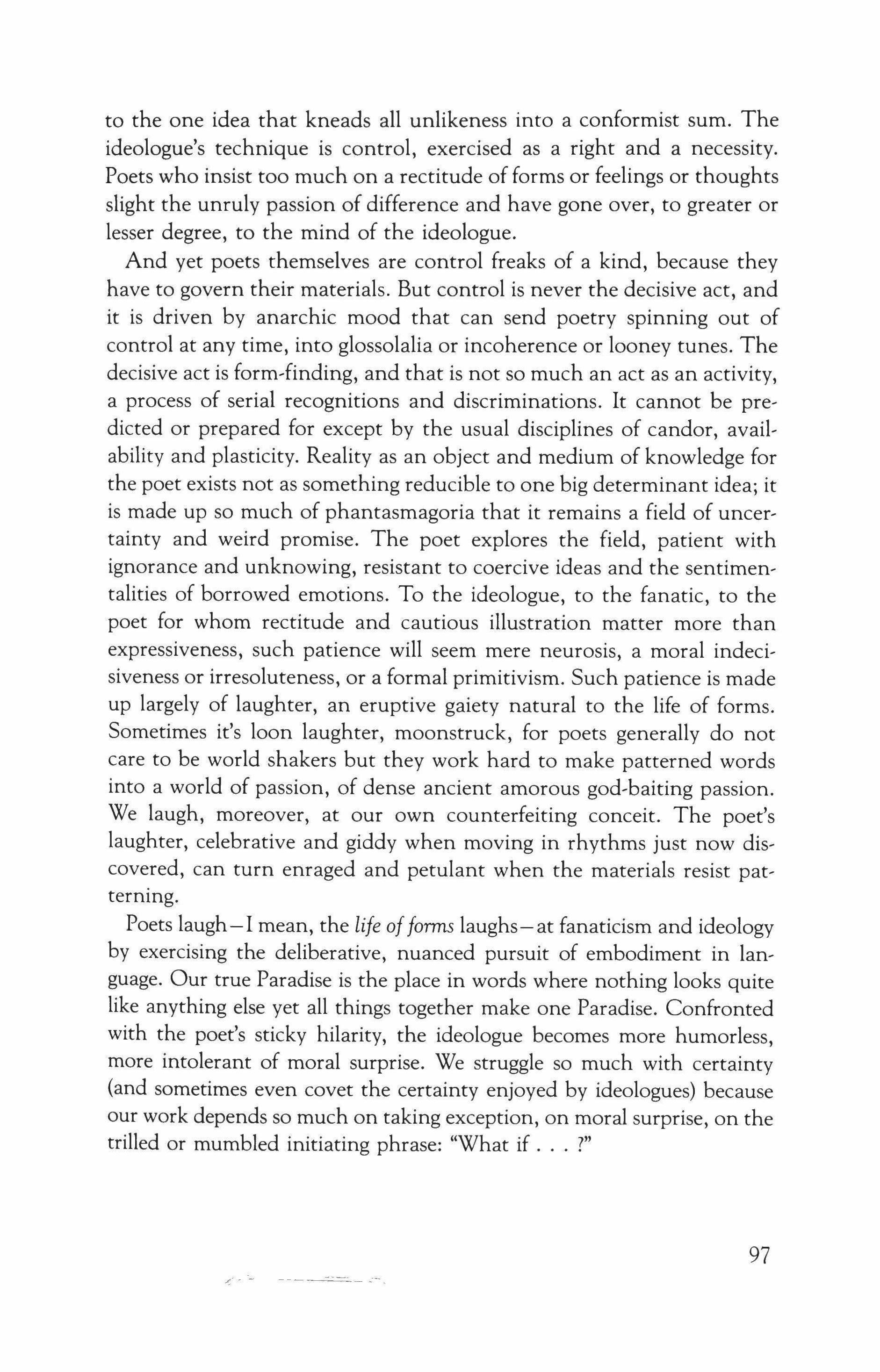
to the one idea that kneads all unlikeness into a conformist sum. The ideologue's technique is control, exercised as a right and a necessity. Poets who insist too much on a rectitude of forms or feelings or thoughts slight the unruly passion of difference and have gone over, to greater or lesser degree, to the mind of the ideologue.
And yet poets themselves are control freaks of a kind, because they have to govern their materials. But control is never the decisive act, and it is driven by anarchic mood that can send poetry spinning out of control at any time, into glossolalia or incoherence or looney tunes. The decisive act is form-finding, and that is not so much an act as an activity, a process of serial recognitions and discriminations. It cannot be predicted or prepared for except by the usual disciplines of candor, availability and plasticity. Reality as an object and medium of knowledge for the poet exists not as something reducible to one big determinant idea; it is made up so much of phantasmagoria that it remains a field of uncertainty and weird promise. The poet explores the field, patient with ignorance and unknowing, resistant to coercive ideas and the sentimentalities of borrowed emotions. To the ideologue, to the fanatic, to the poet for whom rectitude and cautious illustration matter more than expressiveness, such patience will seem mere neurosis, a moral indecisiveness or irresoluteness, or a formal primitivism. Such patience is made up largely of laughter, an eruptive gaiety natural to the life of forms. Sometimes it's loon laughter, moonstruck, for poets generally do not care to be world shakers but they work hard to make patterned words into a world of passion, of dense ancient amorous god-baiting passion. We laugh, moreover, at our own counterfeiting conceit. The poet's laughter, celebrative and giddy when moving in rhythms just now discovered, can turn enraged and petulant when the materials resist patterning.
Poets laugh-I mean, the life offorms laughs-at fanaticism and ideology by exercising the deliberative, nuanced pursuit of embodiment in language. Our true Paradise is the place in words where nothing looks quite like anything else yet all things together make one Paradise. Confronted with the poet's sticky hilarity, the ideologue becomes more humorless, more intolerant of moral surprise. We struggle so much with certainty (and sometimes even covet the certainty enjoyed by ideologues) because our work depends so much on taking exception, on moral surprise, on the trilled or mumbled initiating phrase: "What if ?"
97
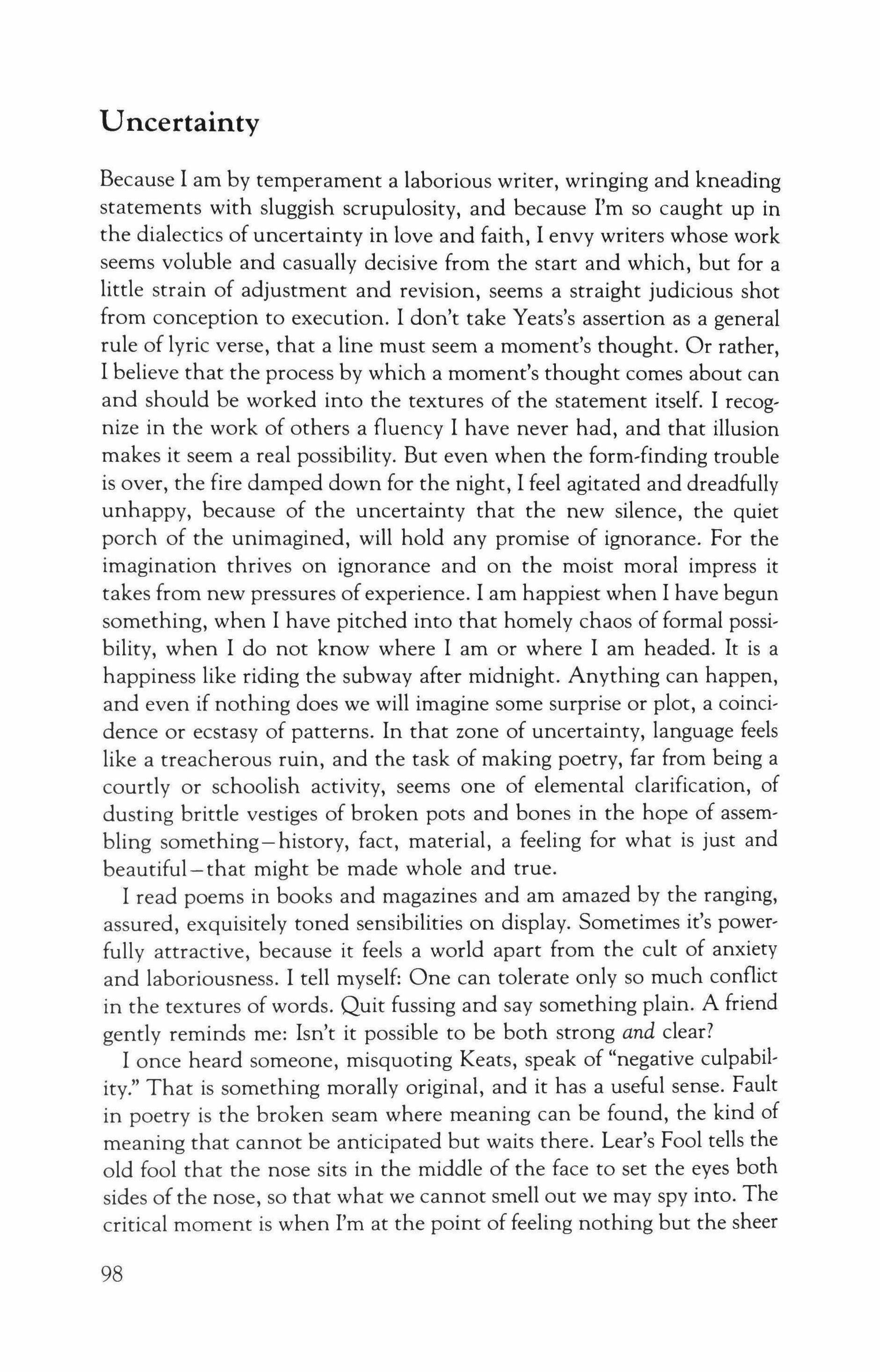
Uncertainty
Because I am by temperament a laborious writer, wringing and kneading statements with sluggish scrupulosity, and because I'm so caught up in the dialectics of uncertainty in love and faith, I envy writers whose work seems voluble and casually decisive from the start and which, but for a little strain of adjustment and revision, seems a straight judicious shot from conception to execution. I don't take Yeats's assertion as a general rule of lyric verse, that a line must seem a moment's thought. Or rather, I believe that the process by which a moment's thought comes about can and should be worked into the textures of the statement itself. I recognize in the work of others a fluency I have never had, and that illusion makes it seem a real possibility. But even when the form-finding trouble is over, the fire damped down for the night, I feel agitated and dreadfully unhappy, because of the uncertainty that the new silence, the quiet porch of the unimagined, will hold any promise of ignorance. For the imagination thrives on ignorance and on the moist moral impress it takes from new pressures ofexperience. I am happiest when I have begun something, when I have pitched into that homely chaos of formal possibility, when I do not know where I am or where I am headed. It is a happiness like riding the subway after midnight. Anything can happen, and even if nothing does we will imagine some surprise or plot, a coincidence or ecstasy of patterns. In that zone of uncertainty, language feels like a treacherous ruin, and the task of making poetry, far from being a courtly or schoolish activity, seems one of elemental clarification, of dusting brittle vestiges of broken pots and bones in the hope of assembling something-history, fact, material, a feeling for what is just and beautiful-that might be made whole and true.
I read poems in books and magazines and am amazed by the ranging, assured, exquisitely toned sensibilities on display. Sometimes it's powerfully attractive, because it feels a world apart from the cult of anxiety and laboriousness. I tell myself: One can tolerate only so much conflict in the textures of words. Quit fussing and say something plain. A friend gently reminds me: Isn't it possible to be both strong and clear?
I once heard someone, misquoting Keats, speak of "negative culpability." That is something morally original, and it has a useful sense. Fault in poetry is the broken seam where meaning can be found, the kind of meaning that cannot be anticipated but waits there. Lear's Fool tells the old fool that the nose sits in the middle of the face to set the eyes both sides of the nose, so that what we cannot smell out we may spy into. The critical moment is when I'm at the point of feeling nothing but the sheer
98

plasticity of the words, when negative culpability itself drains away into the tidal switchings of the words. All the moral quality of statement breaks down into the voluptuous massiveness of color and sound. At that point, everything is at stake and nothing matters. Occasion, intent and enforced shapeliness dissolve into a buzzing, marshy uncertainty. It's the moment when I reckon again that my attempt to write poetry, with all its halting correctiveness and will toward coherence, is of no consequence to the starry sky. To say something of consequence to another, or something which in the simple drift of its words gives a sensuous pinch or chill entirely of the moment, seems at once the best offering I can make and also just a (same old) beginning.
Ecstasy
I ask myself: What is the work of poetry? I find one answer in Ruskin:
Labor is the contest of the life of man with an opposite;the term 'life' including his intellect, soul, and philosophical power, contending with question, difficulty, trial, or material force.
[Unto This Last]
Ruskin was writing chiefly about manual labor, but with an eye also on intellectual and artistic activity. Somewhere else in his writings he remarks on the importance to a painter of physical strength and stamina, and Ruskin's own life as a critic was an illustration of the intellectual applications of his definition of labor. The way of contestation as a way of poetry has been familiar to me for a long time; it has also sustained me, too ably perhaps, for in the end it can induce a too-astringent purposefulness and a prideful certainty that contestation is the one true way.
I would stir into Ruskin's definition the quality of ecstasy, for the ecstasy of labor cannot be separated out from the confrontational elements he identifies- question, difficulty, trial, material force. Indeed, sometimes ecstasy is the effect of repeated actions, of serial exasperating trials, the recopying or revising of lines, the turning of the simplest phrase as if on a lathe, pulling it in and out of different shapes, newel post to broom handle. (The mechanical action of recopying is so physically keyed to this, and to the possibility of discovery through mistakes born from the boredom of the work, that is useless a computer for this activity.) Ecstasy is induced as well by the intensity of finding the poetry
99

in materials given or found-finding the poem in its occasion. It is the strange molecular displacement whereby we seem to be somehow an extract of ourselves suddenly come to life in a line or phrase, out of ourselves, out of the body, made over into language as if in a sciencefiction cloning dream, a Golem in reverse.
Ecstasy is not happiness, which requires harmony, suitedness, a sense of untranslatable well-being, balance and justification in the moment. Ecstasy is the child of excess and denial, of superfluity and poverty. Question, difficulty and trial are its favorite companions and guides. On occasion it is a gift from nowhere, or from the Goddess, the housefly goddess on the windowsill. A line or phrase comes to mind, mostly already made, the finished fragment of a heavenly or diabolical script, and in that piece of language forged elsewhere you are momentarily out of yourself, out of your mind, at the mercy of the delirium of the gift.
Occasion
It is the initiating event, physical or mental. The starter. But the occasion for a poem can be so intensely lived through, physically and mentally, during the actual writing of a poem that it feels like something more comprehensive than just an initiating event. It becomes diffused in the process of the writing, coextensive with the subject matter, worked into the plastic compound of words. Occasion - an anniversary, a battle, a recollection, the smell of a rose, the touch of a hand-is the single event that becomes the actual stirring of spirit toward recognition or understanding, the movement of words toward realization. A poet who assumes life goes on as an occasion for poetry has got the process backward. Existence does not need to demonstrate its usefulness or sense of availability to us. It confuses me to hear people talk about "getting a poem out of" some experience, of squeezing from occasion the juice of sensibility. Existence is indeed an ongoing feast of occasions, but as I take my place at the board I hear William James's fury and frustration coming from the far end, that he had to forge every sentence of the Principles of Psychology "in the teeth of irreducible and stubborn fact."
So occasion is not just an initiator, it is also the poem's medium, a squirming context for discovery. I think of it as a way of love, which is the desire to know the individual other. It is reality we want to know, and the way of love, which is constant movement, takes a poet behind what James calls the foreground of existence and reaches down "to that curious sense of the whole residual cosmos as an everlasting presence,
100

intimate or alien, terrible or amusing, lovable or odious." Occasion pursued allows one to try to express the most particular, authentic, provisional answers to James's question: "What is the character of the universe in which we dwell?" It allows also for a common sense and public regard. Probing, adventuring, scrutinizing, making and unmaking, asserting and revising, these are some of the specific acts of mind that conduct a poet through the process of occasion. The inquiring soul, however it must paint the props and backdrops of the show it puts on in words, needs to stay in motion. The motion traces the desire to recognize origins and destiny in the homeliest and most abject particulars of plain life. If that motion stops, the soul dims and becomes merely reactive to the world's occasions, it seeks comfort in the protective coloring of mock prophecy or senatorial wisdom. Ortega says that love requires centrifugal motion, fleeing the center, so that one's spirit is "psychically in motion, en route toward an object and continually on the march from our inner being toward another." And that it is not a single discharge but a current, "a psychic radiation which proceeds from the lover to the beloved."
Occasion calls us to attention, and the plying of occasion is a current of sustained attention. Dante's physical movement through the three zones of attention in the Divine Comedy enacts the movement of his soul. He moves and, moving, comes to recognize. His action can be graphed as a current of energy. The initiating occasion is his coming into consciousness in the dark wood, dripping with uncertainty and the grief of concupiscence, which throughout his journey he will seek to smell out or spy into. The movement of love, in most poetry, begins with such an act of attention, often stunned or sudden, impaling consciousness on its own line of vision. The poet, the lyric poet especially, is Ortega's maniac: "The maniac is a man with an abnormal attention span." The quality of Dante's attention, the comprehensive intensity of his stare, is tested along the way. He listens, beckons, nods, quarrels, assents, chastises, and brings news. He looks too long on Master Adam beating the drum of his dropsical partner's belly and is scolded by Virgil for degrading the very act of looking. When the pilgrim descends to the floor of Cocytus, he sees souls frozen in the ice, filthily glittering travesties of attention doomed to stare down at the reflected image of their own corrupted wills. Dante accidentally kicks one, stubbing his own attention, reminding us that there are different species of maniacs. Those horrible figures in the ice exercise a useless, unchangeably self-attentive attention; they are emblems of the solipsistic melodrama so dear and close to lyric poets. For if the poet allows occasion to become prideful opportunity for mere
101

self-display - self-display, so essential to lyric poetry - or a frame for obsessive loveless observation of detail, the poet's gaze may, like that of the traitors in the ice, freeze, locked downwards, our tears freezing in little icy arcs delicately bridging our eyes to the ground, the path of the solipsist's gaze.
Accident
Poetry is a constant mediation between will and fantasy. The will wants and seeks to contrive a certain arrangement of elements, bearing the burden of Iris Murdoch's remark that artists are pattern-makers. The will is procedural and conceptualizing; it can lead to overdetermined effects or canny maxims too easily arrived at. Its hunger is real but programmatic and is satisfied finally by the sensation of coherent completion. The fantasy is prodigal, a mess of laughter, satyrish and dissolute - Harpo in his fright wig disguised as a cop. It welcomes extreme tones, actions without contexts, speaking in tongues, certainties gone up in smoke. Fantasy is not driven by desire, for it is too passive and recumbent to be driven to anything, though it is subject to a pathetic and maniacal excitability. Above all, it receives, often indiscriminately, and when serious deliberation begins-grave deliberations about moral quality, formal rectitude, dyspeptic dialectics, and definitions of terms - it wants nothing more than a long afternoon nap or strawberries with cream. Its voice is the languid, sleepy voice of the caterpillar smoking its hookah, asking a probing, curious, bound-for-certainty Alice: "Who are you?" Language, abstract as it is, is yet so sensuous and feels so much like pliable matter (and bears the thumbprint of temperament) that, in the service offantasy, it sometimes desires nothing so much as its own pleasure, the delight of its own voluptuous densities, harmonies, unspooled vowel voodoo. The will, which really is a cop, wants not harmonies boiling over and margin-busting colorism, but coherence and resolution: every poem, for the will, is a case to be closed. What does accident have to do with this? Accident may be gift or distraction, a wayward tone, a confabulation, something gone wrong, a wrecked phrase, a cry from the nursery that wants into the speech of the poem. Formal becomes floral. Error spills like life onto the will's hermetic soundstage. George Herbert's flower grows and groans toward heaven, because the sensuous tune of the poem takes him that way. And what sort of a man was Fragonard anyway, and does that answer anything? Accident can be induced, by breaking the spine of an established
102

syntax in the hope of finding a different, richer, more destabilizing rhythm or structure. The relation of one object to another, of the eye to its motif, of the poet's self-consciousness in relation to them both, may be disturbed or changed by accident. When accident comes as a disruptive gift, the will welcomes it because it can seal a structure, complete a feeling-it aids in the necessary determination. To the fantasy, accident as gift or distraction is all the same. Let distraction lead me from what I thought a poem was becoming. Delinquency, wrong roads, wastes of time, superfluities, sketch after sketch and false start after false start, general vagrancy as part of the critical work of writing poetry-these are the things that fantasy values. Accident is another excuse not to go to work. Let chance meet the poem as it pursues its love, for chance may in the end do the most important work of all.
When I remind myself that the great thing is to keep the process in motion, I don't mean giving license to fantasy to determine the structure and sense of a poem. That is the proper task of the will. Poetry as pure fantasy would be poetry in which doors are constantly opening or closing, creatures coming and going, and under these conditions the act of attention, at least in my own experience, falters or dissipates. To keep the process in motion is to have the imagination restlessly mediating and blending, in all its plastic, image-forging industry, the directed passions of the will and the casual, extravagant, supercilious, dilatory, oblivious prolixity of fantasy. That act of tipping one smelly sulfuric beaker into another, testing the compounds, is the motion that keeps poetry alive and dense with surprise. Surprise for the poet, that is. Let poetry be entirely of accidental consequence for any person beyond its maker. Its surprise lives on, available to readers who turn to poetry not for curricular pedantries or workshop brilliancies but for the plain promise of language to embody the passion of consciousness, which is the ordinary work of the imagination. Alice tells the caterpillar that someday he will surely feel as strange as she does (she is only a few inches tall) when he turns into a chrysalis and then turns into a butterfly. "I should think," she says, "you'll feel it a little queer, won't you?" And the caterpillar replies: "Not a bit."
103
The Medusa Connection
Eleanor Wilner

An awkward stumbling on the brink of speech. Think of the penguin. The penguin of the present age who cannot fly, but whose long-ago ancestor could. Watching the penguin careen toward the brink, then slide with a glorious ease into the water, it seems natural to wonder: does evolution reverse itself? Is this a sign that one can lose an evolutionary advantage; regress, as it were, to an earlier form? The question is not an idle one. Built into it is a culture's long bias in favor of flight, its angelic fantasies that gave virtue wings; its desire to disembody itself, to rise, to measure value by height and weigh perfection by loss of gravitational mass. As if attachment to earth were an insult to spirit. Looking, then, through the lens of an old bias, the penguin's move from wings to fins seems a regression, a devolution.
There is another cultural bias that drives that presumption-that time is linear, something like a highway on which it is possible to move ahead or go back the other way - ideas of progress and reversion being two sides of the same coin. And this linear notion has traditionally been joined to the paradoxical teleology which sees time as a progression toward its own extinction in some divinely ordained freeze-frame bliss, an unchanging state superintended by God and intended for us.
Reversing the maxims of the Right, poverty we may hope to extinguish, but time we shall always have with us. Though whether time will always include us is a far more vexed question, a fear for ourselves which certainly feeds the current obsession with species extinction. For nature does not repeat itself, and evolution is like the Heraclitean river in which you can never step twice. The penguin's seeming reversal of evolution is an illusion sponsored by our prior assumptions. In fact, says Victor Scheffer: "in giving up wings capable of flight, penguins did not
104

reverse in their tracks; they simply advanced on a route that took a hairpin curve. The wings of the modern penguins are not atavistic structures but are strong and dependable swimming organs."!
In the world of imagination, similar adaptations seem to be underway. As this essay sets out to track the spontaneous recurrence in our poetry of one ancient trans-personal figure, the Medusa, it may be well to remember from the outset that adaptation is not regression, but a change that continuity requires. As fins were a fresh advantage for the penguin, so, in a parallel imaginative development, new forms that resemble older ones may in fact be something quite new, an adaptation to changed circumstances, carrying us into the fluid medium of real time with an ease that resembles the modern penguin's sudden access of grace when it enters water.
It has been a long time, culturally speaking, since the "Spirit moved upon the face of the waters" in Genesis, and the world was created by fiat and by division. That recorded the moment, some 1500 to 1200 years B.C., when the sky gods, over the deserts ofthe Middle East and the dry hills of Greece, usurped the old animal powers and established their dominion, and with it, another kind of dominion-the snake in the talons of the eagle's judgment-that of detached mind over the older cyclical powers of the earth. Time, henceforth, was to be ruled from above, as by an absentee landlord.
Now this is not going to be another version of that foolish ahistorical diatribe against the mythic and cultural formulations that arose out of the pressures and necessities of a vastly different age (though I'm sure this discussion will provide some foolishness of its own). Nor will it attempt to judge intention by distant effects. For we are living, not in those changing human minds and circumstances which originally produced that great shift in the balance of mythical powers, but with the very long-term consequences of decisions made in earlier times, and therefore with a knowledge which may feel to us like wisdom but is really a combination of inheritance, hindsight and fresh quandary.
Although living in a time of lengthening shadows, it is possible, with some historical imagination, to reawaken the excitement of that dawn when, in Joseph Campbell's phrasing of it, "the shining righteous deedsman of autonomous human will" broke through the passes of history, newly mounted on horseback, winged in feelings of mental powerheroes to serve the sky gods, who, for all the differences between those of Greece and Palestine, were alike to break the power of the old nature religions, their priesthoods and their determinism, and to celebrate the mythic representation of that act through stories of the slaying of drag-
105

ons or the treading underfoot of the devalued and demonized snake. Those dawn riders of nearly four millennia ago, high on their defeat of the serpents of time whose cyclic coils they had cut through with swords both literal and intellectual, could not have anticipated an age as addicted to and appalled .by the long-term consequences of their triumph as our own. Nor one in which the dragon slayers of the West have met the dragon worshippers of the East, and have begun, in the crucible of the imagination, to forge a new vision.
It is often politically expedient and psychologically seductive to mistake desire for history, not only in the judgment of an earlier period through the anachronistic lens of our own resentment, but equally through the invocation and idealization of a deeper past to set precedent and authorize the emergent against the entrenched. But as figures from deeper strata spontaneously recur in the poetic imagination of our own time, they come not to announce the neo-primitive return of the past, but, on the contrary, to accomplish the alteration of its meaning in the mind of the present. These chastened and conscious figures, trailing the shrouds of what was once called glory, are both recognizable and fundamentally altered by the work of time.
So, transformed and transformative, Medusa resurfaces, the figure emblematic of a relocation of the sacred and a new sense of order involving a reconnection with natural history, human intellect in a loving relation with the matter of which it is made. For it is not nature as mindless matter that returns, but nature mindful of itself, nature's lost head - not the severed head of Orpheus, that bard of nostalgia - but the head of an open-eyed Medusa, not severed but crowning-the word used in obstetrics for the appearance of the infant's head in birth. The head is perceived in this positioning as the emergence of a whole being, a re-capitarion that delivers from monstrosity the natural imagery of creation and birth from within, and forges a metaphoric link between natural birth and time-ripened, world-engendered spiritual and intellectual rebirth. An animating figure for a poetics of generation, this Medusa is no mere replay of an ancient figure, for even as complex forms of life continue but never exactly repeat themselves, so her contemporary embodiment is shaped by all that has intervened.
She stepped out of the framing circle of the dark. We thought, as she approached, to see her clearly, but her features only grew more indistinct as she drew nearer, like those of statues long submerged in water. We couldn't name her, she who can't be seen
106
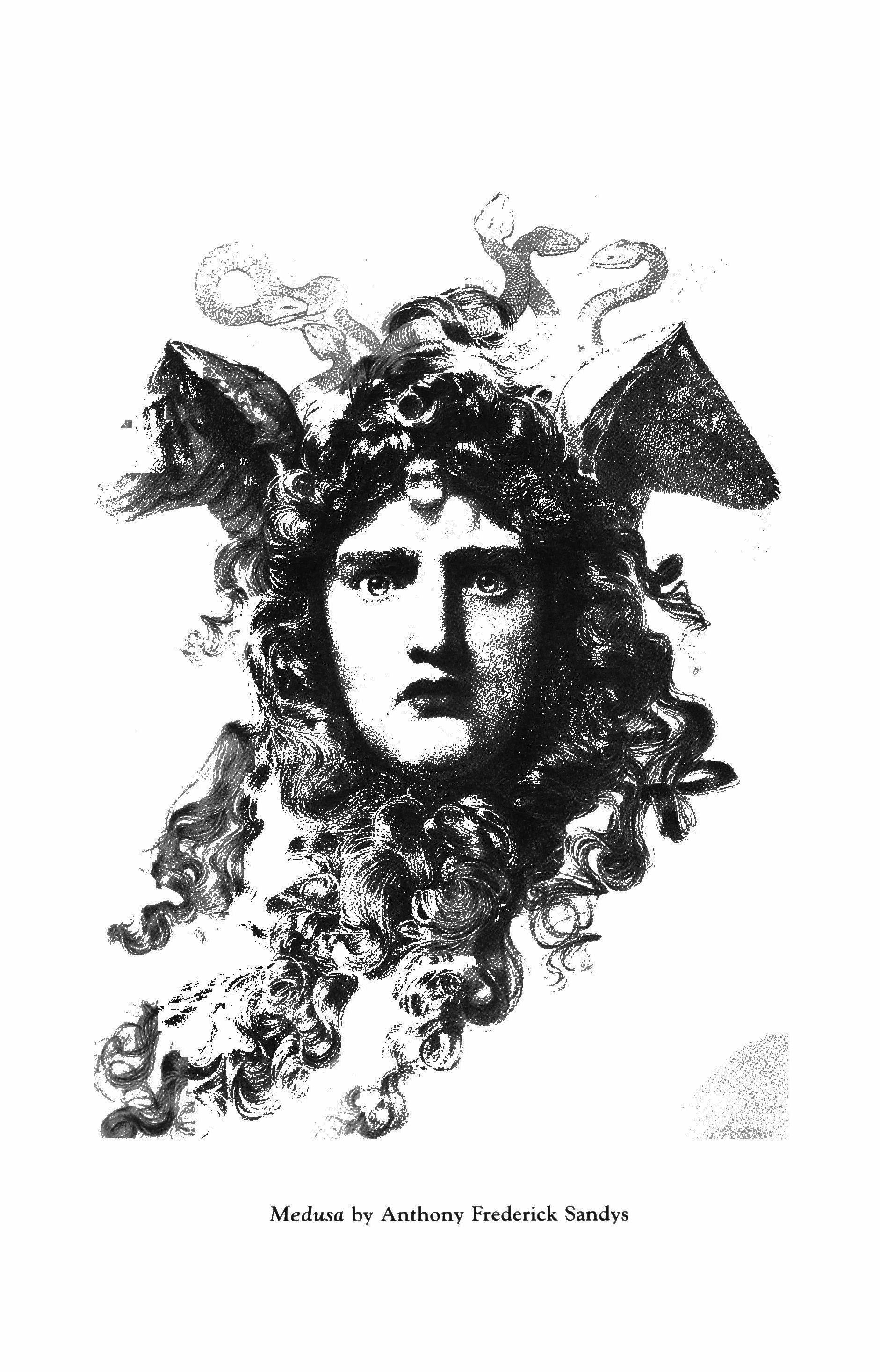 Medusa by Anthony Frederick Sandys
Medusa by Anthony Frederick Sandys
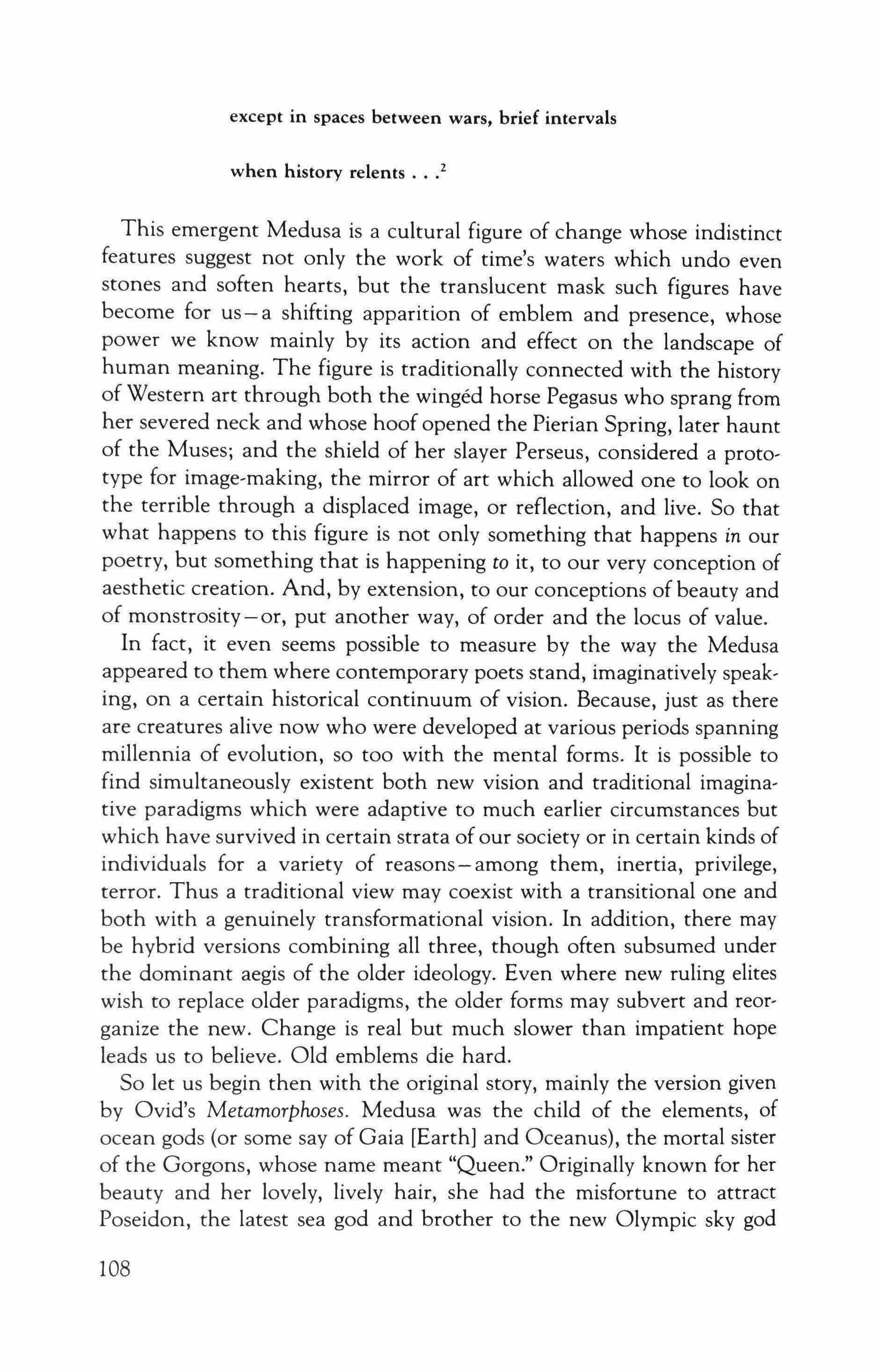
except in spaces between wars, brief intervals when history relents 2
This emergent Medusa is a cultural figure of change whose indistinct features suggest not only the work of time's waters which undo even stones and soften hearts, but the translucent mask such figures have become for us-a shifting apparition of emblem and presence, whose power we know mainly by its action and effect on the landscape of human meaning. The figure is traditionally connected with the history of Western art through both the winged horse Pegasus who sprang from her severed neck and whose hoof opened the Pierian Spring, later haunt of the Muses; and the shield of her slayer Perseus, considered a prototype for image-making, the mirror of art which allowed one to look on the terrible through a displaced image, or reflection, and live. So that what happens to this figure is not only something that happens in our poetry, but something that is happening to it, to our very conception of aesthetic creation. And, by extension, to our conceptions of beauty and of monstrosity-or, put another way, of order and the locus of value.
In fact, it even seems possible to measure by the way the Medusa appeared to them where contemporary poets stand, imaginatively speaking, on a certain historical continuum of vision. Because, just as there are creatures alive now who were developed at various periods spanning millennia of evolution, so too with the mental forms. It is possible to find simultaneously existent both new vision and traditional imaginative paradigms which were adaptive to much earlier circumstances but which have survived in certain strata of our society or in certain kinds of individuals for a variety of reasonsamong them, inertia, privilege, terror. Thus a traditional view may coexist with a transitional one and both with a genuinely transformational vision. In addition, there may be hybrid versions combining all three, though often subsumed under the dominant aegis of the older ideology. Even where new ruling elites wish to replace older paradigms, the older forms may subvert and reorganize the new. Change is real but much slower than impatient hope leads us to believe. Old emblems die hard.
So let us begin then with the original story, mainly the version given by Ovid's Metamorphoses. Medusa was the child of the elements, of ocean gods (or some say of Gaia [Earth] and Oceanus), the mortal sister of the Gorgons, whose name meant "Queen." Originally known for her beauty and her lovely, lively hair, she had the misfortune to attract Poseidon, the latest sea god and brother to the new Olympic sky god
108
Zeus, who raped Medusa in the shrine of Athena, armored goddess of wisdom and war, female mind recast by cerebral birth from the head of her father Zeus. It was Athena, angry at the desecration of her shrine, who transformed Medusa into the monstrous female with snakes for tresses, making of the old serpentine gods of natural renewal a hideous crown, and of Medusa a figure of paralyzing dread, the sight of whom, or whose gaze (both versions are given), turned men to stone.

It should be obvious from the story that it retells the history of migration and invasion and of the overthow of one religion by another: of the older, elemental gods-those of nature and generation, of human subjugation to the serpent/chthonic powers of the earth and the cycles of seasonal time-by the new immortal gods of high Olympus, sky gods of intellect and will, sponsors of the new, and tragic, heroes of human autonomy. It is one of those heroes, Perseus, who hunts Medusa to her lair at the horizon's rim in that darkness where heavenly bodies vanish for rebirth; it is there we find the figure now, at the edge of the known, like a new sun rising so many centuries after these mythically mirrored events, and out of the dark sea of their consequences.
The second part of the story finishes the job of desecration/ transformation through the agency of Perseus, "[c[hild of the sunlight in the tower room,"} who, aided by a shield, the gift of Athena (naturally), is able to fix the Medusa's image in its bright mirror, and so behead her without himselfbeing transfixed. Out of her severed trunk - delivered in a perverse, matricidal birth-the airborne Pegasus springs, his hoof opening the springs of artistic inspiration, revealing how this violent separation was felt as creatively energizing to the culture of that time.
Archaic head of Medusa
Rondanini Medusa
109
Perseus, with Medusa's head secured, goes on to play out the tale's convention (one that would last, moralized and spiritualized, into the Christian era): to slay a sea dragon, rescue a helpless maiden, and thereby inherit a kingdom. Power is, as it always has been, the ultimate issue in these myths that mark a change of worlds, and of rulers. And, as the divine analog to this earthly re-ordering of powers, Athena took the severed but still dreadful head of Medusa and affixed it to the breastplate of her armor, taking unto herself the ruined powers of her enemy, making of nature and the lower world the captured emblem of her own chilly aegis. It is worth noting, though, that it took centuries to complete the demonizing of this older form of the sacred. Though divided and
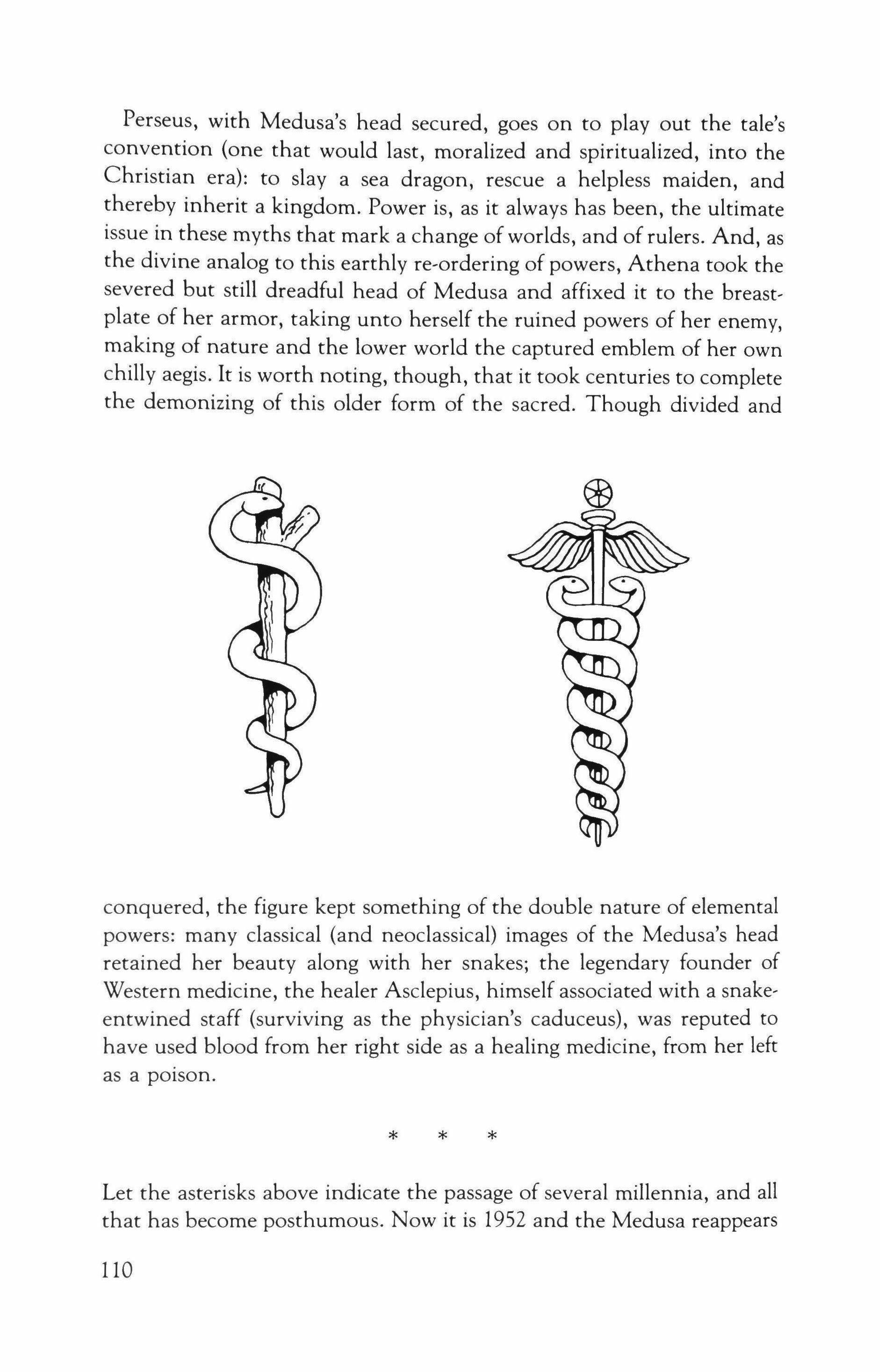
conquered, the figure kept something of the double nature of elemental powers: many classical (and neoclassical) images of the Medusa's head retained her beauty along with her snakes; the legendary founder of Western medicine, the healer Asclepius, himself associated with a snakeentwined staff (surviving as the physician's caduceus), was reputed to have used blood from her right side as a healing medicine, from her left as a poison.
Let the asterisks above indicate the passage of several millennia, and all that has become posthumous. Now it is 1952 and the Medusa reappears
* * *
110

in the eye of a changed Perseus, drawn by W. S. Merwin in the tranced world of his first book, A Mask for Janus, where "One dreams fixed beasts not blinking [ejxhausted leaves, suspended no breath moving the gray flowers." In his cryptic "Ode: The Medusa Face," the first-person hero is a maze of questions for whom "healing," when it is connected with a perfection that rests on the denial of time, has become equivocal: "I cannot tell if stone is upon me / Healing me, clotting time until I stand / Dead." He has come to where "tall over the breathless shore this day / Lifts on one equal glare / The crass and curling face." This arrested wave is poised on an invisible watershed of vision about to come down to earth; lifted, it hangs in suspense. Here the Medusa's glare is the blinding sheen of sun on the water, her face and its crown of snakes identified with the curling lift of ocean itself, carrying in the word "crass" a Calvinist judgment of the tidal surge of life. Here is a wave raised and about to break, about to inundate the ''breathless shore." The hero, unsure whether in fact "the heart still moves," as he reaches for his customary weapons against this "enemy," falls into perplexity: "What shield were faithful found, / What weapon"? And then we see his immobility as a monumental hesitation ("I stand as in a sloth of stone"), for he is paralyzed not by the Medusa but by a new sense that what he does to her will happen to him:
Amazed, for a maimed piece of one's own death, Should that lithe hair stiffen, Were the shape of her fall.s
Another, more open act of identification with the Medusa-as-victim takes place when-late in the 1950s, writing of the city of Florence, of the way nature in Italy is more implicated in human meaning than it is in America, and thinking back to the golden apples of Classical mythology, ripening now into real fruit - Robert Lowell wrote:
The apple was more human there than here, but it took a long time for the blinding golden rind to mellow.
How vulnerable the horseshoe crabs dredging the bottom like flat-irons in their antique armor, with their swordgrass blackbone tails, made for a child to grab and throw strangling ashore!
111

l '_, ;.._'
\
Perseus by Benvenuto Cellini


Oh Florence, Florence, patroness of the lovely tyrannicides!
Where the tower of the Old Palace pierces the sky like a hypodermic needle, Perseus, David and Judith, lords and ladies of the Blood, Greek demi-gods of the Cross, rise sword in hand above the unshaven, formless decapitation of the monsters, tubs of guts, mortifying chunks for the pack.
Pity the monsters!
Pity the monsters!
Perhaps, one always took the wrong sideAh, to have known, to have loved too many Davids and Judiths!
My heart bleeds black blood for the monster.
I have seen the Gorgon.
The erotic terror of her helpless, big bosomed body lay like slop.
Wall-eyed, staring the despot to stone, her severed head swung like a lantern in the victor's hand."
Looking up from his observation of (and identification with?) the armored and vulnerable horseshoe crab to the towers and righteous beheaders ofWestern founding myths, Greek and Biblical (the righteousness of the latter reinforced by the Puritan New England strain), and putting his radical hesitation in the slightly self-conscious style of a highly educated Boston Brahmin, Lowell allows that: "Perhaps, one always took the wrong side-" On that perhaps as fulcrum, the balance of cultural sympathies shifts. "Pity the monsters!" twice repeated, and then, the full transfusion of fellow feeling: "My heart bleeds black blood for the monster."
And perhaps most compelling is the striking simile in the last lines: "her severed head swung / like a lantern in the victor's hand." Indeed, the way the Cellini Perseus holds the head before him to turn his enemies to stone, invites the reading as lantern but only to one prepared, as was Lowell, and Howard Nemerov in his seventies poem "Hero with Girl and Gorgon," to perceive this once-horrific image as a new source of illumination: "that great head," says Nemerov, "swung by the serpents held I At lantern height before you, lighting your way
The Lowell poem is a transitional one in several ways. First, it mixes,
114
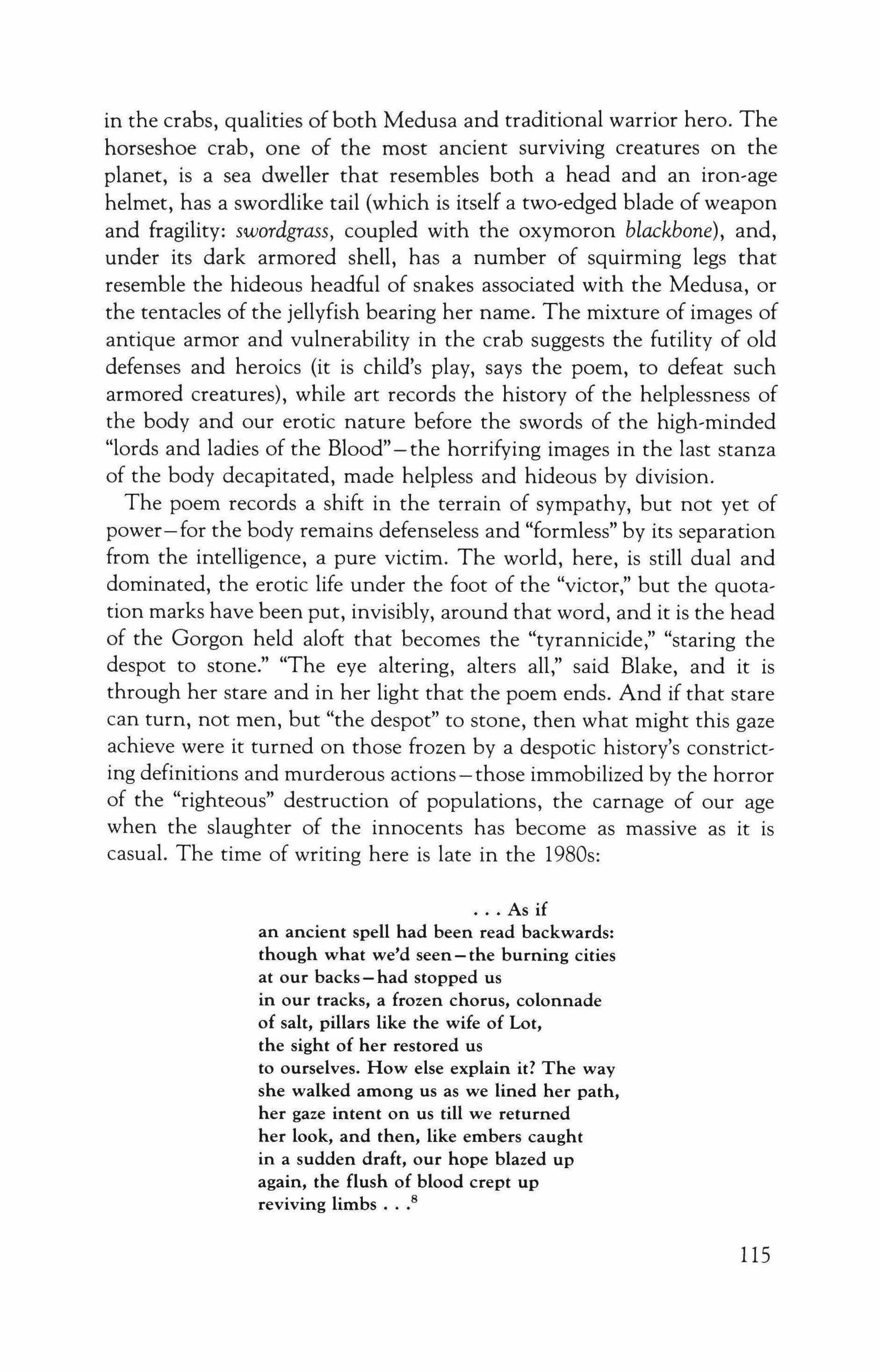
in the crabs, qualities of both Medusa and traditional warrior hero. The horseshoe crab, one of the most ancient surviving creatures on the planet, is a sea dweller that resembles both a head and an iron-age helmet, has a swordlike tail (which is itself a two-edged blade of weapon and fragility: swordgrass, coupled with the oxymoron blackbone), and, under its dark armored shell, has a number of squirming legs that resemble the hideous headful of snakes associated with the Medusa, or the tentacles of the jellyfish bearing her name. The mixture of images of antique armor and vulnerability in the crab suggests the futility of old defenses and heroics (it is child's play, says the poem, to defeat such armored creatures), while art records the history of the helplessness of the body and our erotic nature before the swords of the high-minded "lords and ladies of the Blood" - the horrifying images in the last stanza of the body decapitated, made helpless and hideous by division.
The poem records a shift in the terrain of sympathy, but not yet of power-for the body remains defenseless and "formless" by its separation from the intelligence, a pure victim. The world, here, is still dual and dominated, the erotic life under the foot of the "victor," but the quotation marks have been put, invisibly, around that word, and it is the head of the Gorgon held aloft that becomes the "tyrannicide," "staring the despot to stone." "The eye altering, alters all," said Blake, and it is through her stare and in her light that the poem ends. And if that stare can turn, not men, but "the despot" to stone, then what might this gaze achieve were it turned on those frozen by a despotic history's constricting definitions and murderous actions-those immobilized by the horror of the "righteous" destruction of populations, the carnage of our age when the slaughter of the innocents has become as massive as it is casual. The time of writing here is late in the 1980s:
As if
an ancient spell had been read backwards: though what we'd seen-the burning cities at our backs - had stopped us in our tracks, a frozen chorus, colonnade of salt, pillars like the wife of Lot, the sight of her restored us to ourselves. How else explain it? The way she walked among us as we lined her path, her gaze intent on us till we returned her look, and then, like embers caught in a sudden draft, our hope blazed up again, the flush of blood crept up reviving limbs 8
115
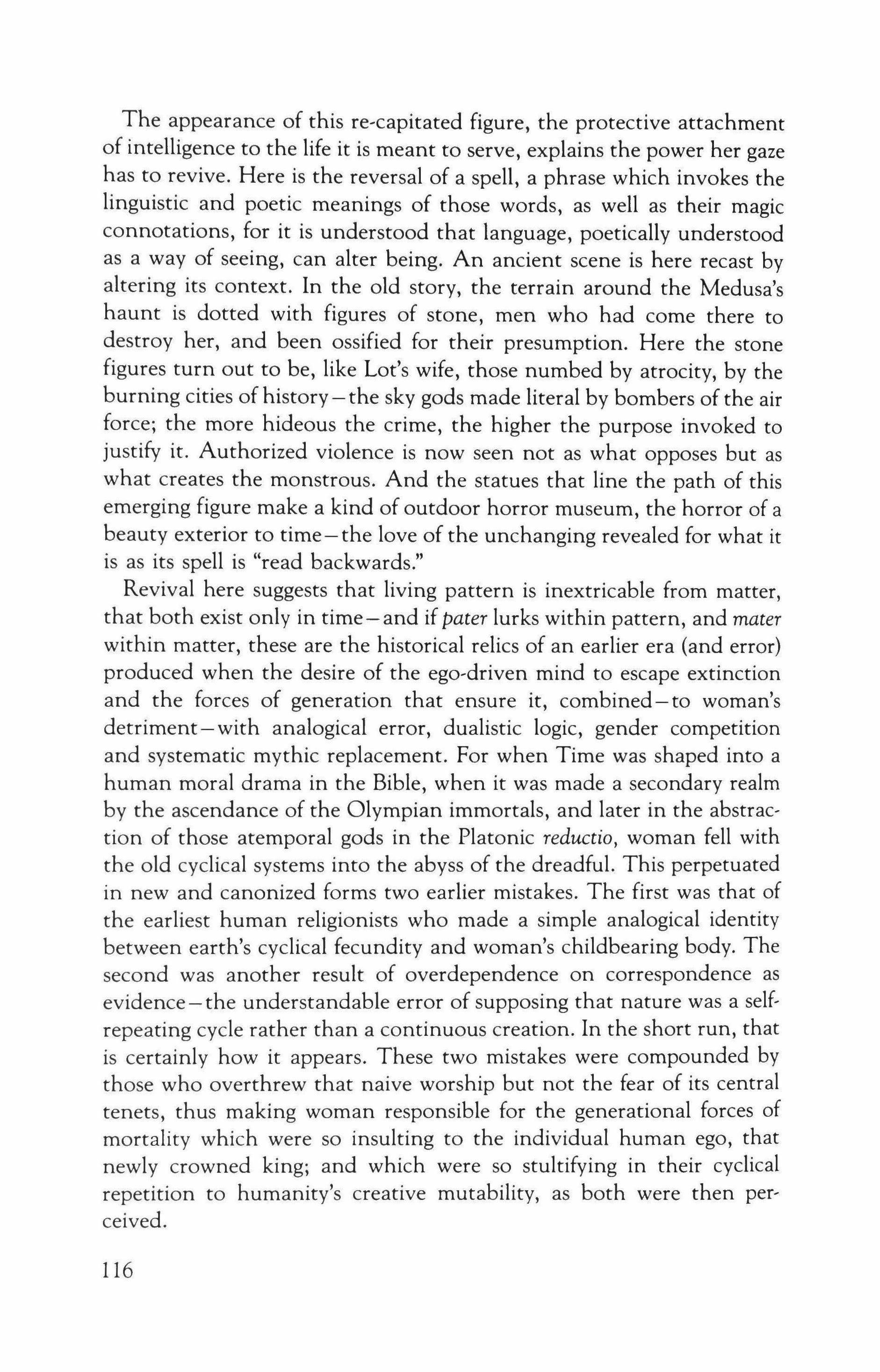
The appearance of this re-capitated figure, the protective attachment of intelligence to the life it is meant to serve, explains the power her gaze has to revive. Here is the reversal of a spell, a phrase which invokes the linguistic and poetic meanings of those words, as well as their magic connotations, for it is understood that language, poetically understood as a way of seeing, can alter being. An ancient scene is here recast by altering its context. In the old story, the terrain around the Medusa's haunt is dotted with figures of stone, men who had come there to destroy her, and been ossified for their presumption. Here the stone figures turn out to be, like Lot's wife, those numbed by atrocity, by the burning cities of history - the sky gods made literal by bombers of the air force; the more hideous the crime, the higher the purpose invoked to justify it. Authorized violence is now seen not as what opposes but as what creates the monstrous. And the statues that line the path of this emerging figure make a kind of outdoor horror museum, the horror of a beauty exterior to time-the love of the unchanging revealed for what it is as its spell is "read backwards."
Revival here suggests that living pattern is inextricable from matter, that both exist only in time-and if pater lurks within pattern, and mater within matter, these are the historical relics of an earlier era (and error) produced when the desire of the ego-driven mind to escape extinction and the forces of generation that ensure it, combined-to woman's detriment-with analogical error, dualistic logic, gender competition and systematic mythic replacement. For when Time was shaped into a human moral drama in the Bible, when it was made a secondary realm by the ascendance of the Olympian immortals, and later in the abstraction of those atemporal gods in the Platonic reductio, woman fell with the old cyclical systems into the abyss of the dreadful. This perpetuated in new and canonized forms two earlier mistakes. The first was that of the earliest human religionists who made a simple analogical identity between earth's cyclical fecundity and woman's childbearing body. The second was another result of overdependence on correspondence as evidence-the understandable error of supposing that nature was a selfrepeating cycle rather than a continuous creation. In the short run, that is certainly how it appears. These two mistakes were compounded by those who overthrew that naive worship but not the fear of its central tenets, thus making woman responsible for the generational forces of mortality which were so insulting to the individual human ego, that newly crowned king; and which were so stultifying in their cyclical repetition to humanity's creative mutability, as both were then perceived.
116

That the figure of the Medusa should return in female guise is a part of that tradition, and needful, no doubt, to its rectification, but, as the various exemplars from poetry should make clear, there is no gender specificity to what has been enlivened by her gaze, nor is the fate of woman different from the fate of man nor either from the fate of the Earth. It is one of the ironies of history that the very powers for so long identified with woman should be precisely those that the imagination of our own time-both scientific and artistic-should see as most needful for our survival, and should value most. No wonder the Medusa, as the feminist writer/critic Helene Cixous imagines her, is laughing." Or that Helen, as she appears in powerful new poems by Yannis Ritsos'? and C. K. Williams, II should be dying. The Ritsos poem, is, however, backward-looking, mourning the end of a Greek ideal in the shabby precincts of the present, whereas C. K. Williams's poem refuses, courageously, to look away from a dying woman, and, as she becomes fully human, he ennobles the real with the dignity that profound human feeling and lucid awareness achieve when they are joined.
The traditional Western notion of beauty was an eternal perfection, above and exterior to time, unchanging. Beauty in the world was but the image of this eternal form; spiritual value grew with distance from living matter. It is the work of our own time's imagination to stop mourning the loss of this ideal and instead to see clearly its effect on the real world, this error that turned the real hideous, and made body count a proof of divine power, as if success at slaughter were proof of a just case. The Helen who stands on the high walls ofTroy presides only over a field of corpses and a burning city; she comes down to our time as a grotesque, the aging Elizabeth Taylor, the simultaneous literalization and unmasking of the Western myth of beauty. Eavan Boland, the contemporary Irish poet, brings this home in her "Tirade for the Lyric Muse," the muse a woman in the hospital wearing the "smocked mouth" and white bandages of her latest face-lift: "You are the victim of a perfect crime. / You have no sense of time. / You never had.?"
And even as the image of a time-arrested beauty should now appear as a cosmetic nightmare, so it is hardly surprising that the Medusa, time's familiar, should reappear not as a hideous figure but as a shimmering avatar of recovery, and as one who animates and enlivens what had been immobilized - all that froze with her arrest by division, that world of generation in which we have our being. Much has been made, in modern comparative mythopoesis, of the Fisher King's illness and its wasteland effect on the world. Its corollary might be seen in the effect of the severed Medusan stare, not just on those who met her gaze, but on
117
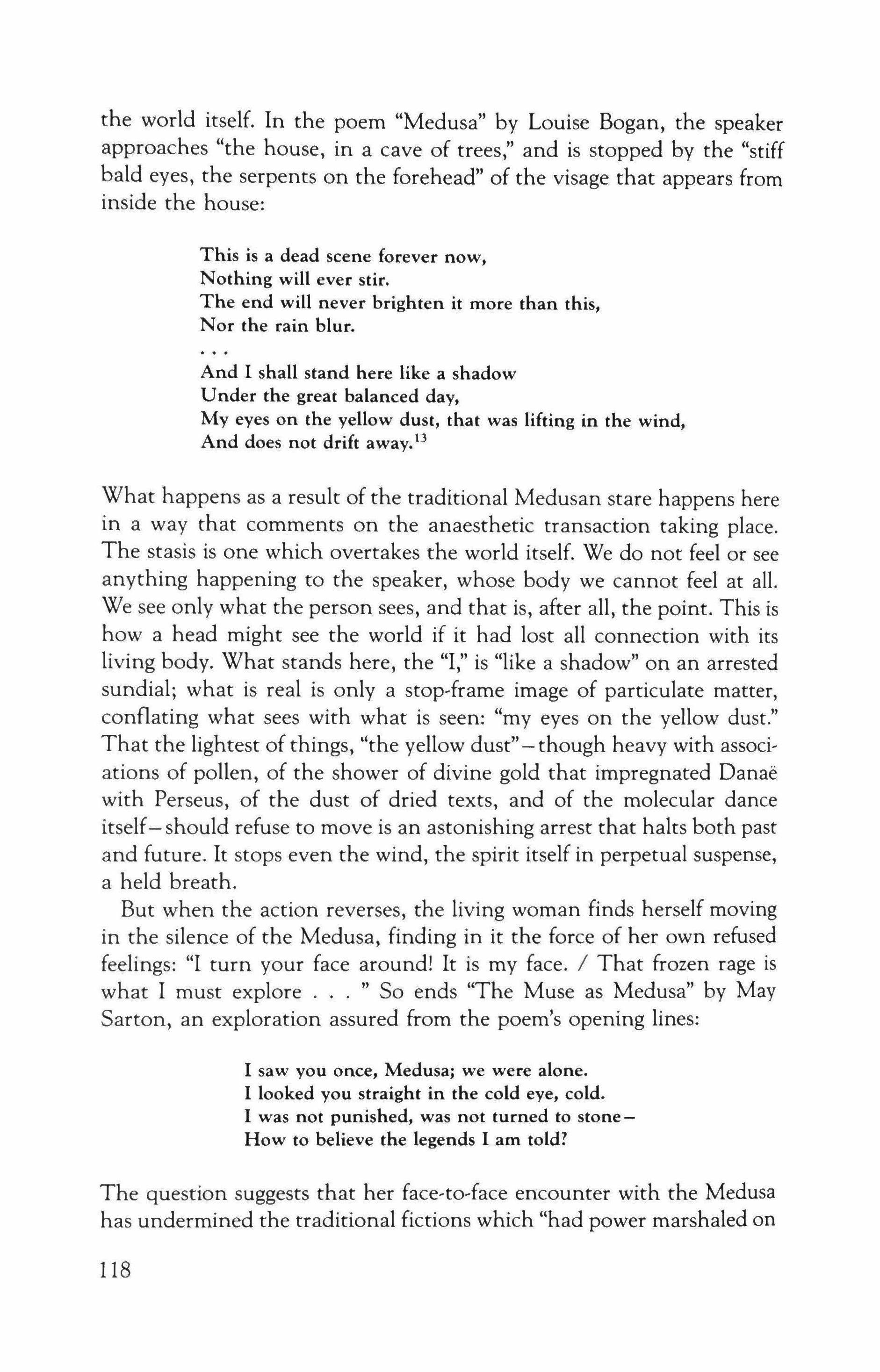
the world itself. In the poem "Medusa" by Louise Bogan, the speaker approaches "the house, in a cave of trees," and is stopped by the "stiff bald eyes, the serpents on the forehead" of the visage that appears from inside the house:
This is a dead scene forever now, Nothing will ever stir. The end will never brighten it more than this, Nor the rain blur.
And I shall stand here like a shadow Under the great balanced day, My eyes on the yellow dust, that was lifting in the wind, And does not drift away.13
What happens as a result of the traditional Medusan stare happens here in a way that comments on the anaesthetic transaction taking place. The stasis is one which overtakes the world itself. We do not feel or see anything happening to the speaker, whose body we cannot feel at all. We see only what the person sees, and that is, after all, the point. This is how a head might see the world if it had lost all connection with its living body. What stands here, the "I," is "like a shadow" on an arrested sundial; what is real is only a stop-frame image of particulate matter, conflating what sees with what is seen: "my eyes on the yellow dust." That the lightest of things, "the yellow dust"-though heavy with associations of pollen, of the shower of divine gold that impregnated Danae with Perseus, of the dust of dried texts, and of the molecular dance itself - should refuse to move is an astonishing arrest that halts both past and future. It stops even the wind, the spirit itself in perpetual suspense, a held breath.
But when the action reverses, the living woman finds herself moving in the silence of the Medusa, finding in it the force of her own refused feelings: "I turn your face around! It is my face. / That frozen rage is what I must explore " So ends "The Muse as Medusa" by May Sarton, an exploration assured from the poem's opening lines:
I saw you once, Medusa; we were alone. I looked you straight in the cold eye, cold. I was not punished, was not turned to stoneHow to believe the legends I am told?
The question suggests that her face-to-face encounter with the Medusa has undermined the traditional fictions which "had power marshaled on
118

[their] side," legends through which we learned to see ourselves. Now the power of possibility replaces authority with her "perhaps." "Being, perhaps, allowed to swim my way," she imagines herself as a fish, that lively denizen of the most fluid medium - "fluid, it is also full of healing" - that she will identify with "that world of feeling / Where thoughts, those fishes, silent, feed and rove," an image which animates even as it reunifies thought with feeling and appetite. She introduces those lines with these:
The fish, Medusa, did not come to grief, But swims still in a fluid mystery.
Forget the image: your silence is my ocean And even now it teems with life 14
So we move into futurity through a conscious re-entry of Medusa's long silence which Sarton equates with our own oceanic origin, the realm that Freud feared, and associated with both religious feeling and chaos, the place of terrors for the analytic mind which, unmoored from feeling, feels helplessly tossed in the very medium where the sympathetic intellect swims with such ease. Faced with the riddle of the Sphinx, of our mortal condition, the mind, fearing extinction, tries to deny its own connection to generation. Thus did King Laius, with the oracle's blessing and Queen jocasta's collusion, have his own son Oedipus put out to die, and thus did [ocasta try to take him back, all unconsciously, to the place where he was conceived. Both actions may be seen as attempts to undo the work of time and reverse the laws of generation, rather than, as the Freudians see them, a bitter family romance. IS Intellect that stays apart cannot play its role as the brilliant, faithful and disobedient servant that corrects our despotism in the name of our common life, as Kent and the Fool to Lear-but becomes instead its jailer or, worse, its executioner. What began as a protection - in traditional terms, a sword and shield against our own extinction-like the Department of Defense, ends by becoming death's agent, "the fearful armories within."
As Amy Clampitt writes of "Athena,"
cool
guarantor of the averted look, the guide of Perseus, who killed and could not kill
the thing he'd hounded to its source, the dread thing-in-itself none can elude
-a space to savor
119
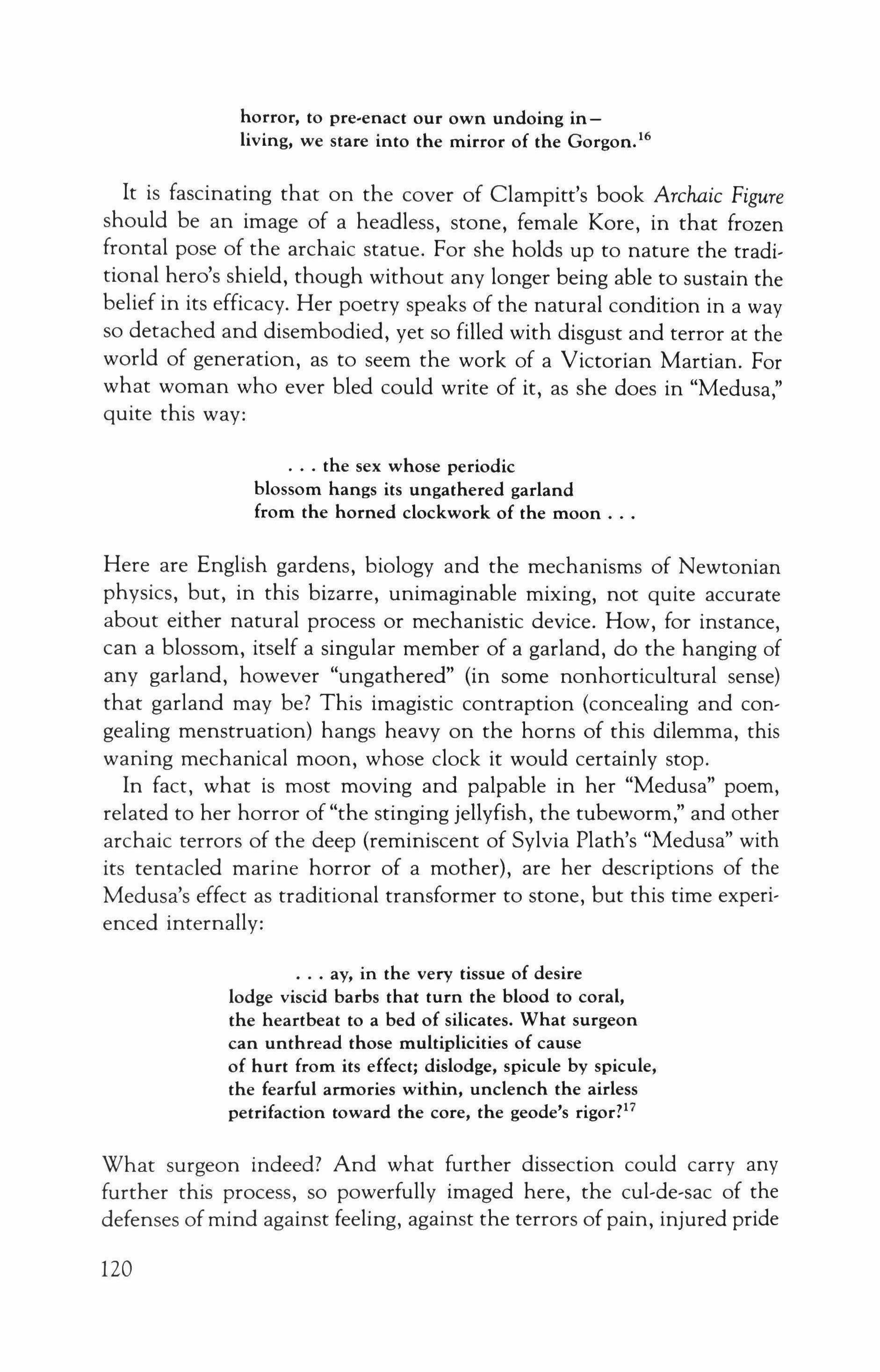
horror, to pre-enact our own undoing inliving, we stare into the mirror of the Gorgon. 16
It is fascinating that on the cover of Clampitt's book Archaic Figure should be an image of a headless, stone, female Kore, in that frozen frontal pose of the archaic statue. For she holds up to nature the traditional hero's shield, though without any longer being able to sustain the belief in its efficacy. Her poetry speaks of the natural condition in a way so detached and disembodied, yet so filled with disgust and terror at the world of generation, as to seem the work of a Victorian Martian. For what woman who ever bled could write of it, as she does in "Medusa," quite this way:
the sex whose periodic blossom hangs its ungathered garland from the horned clockwork of the moon
Here are English gardens, biology and the mechanisms of Newtonian physics, but, in this bizarre, unimaginable mixing, not quite accurate about either natural process or mechanistic device. How, for instance, can a blossom, itself a singular member of a garland, do the hanging of any garland, however "ungathered" (in some nonhorticultural sense) that garland may be? This imagistic contraption (concealing and congealing menstruation) hangs heavy on the horns of this dilemma, this waning mechanical moon, whose clock it would certainly stop.
In fact, what is most moving and palpable in her "Medusa" poem, related to her horror of "the stinging jellyfish, the tubeworm," and other archaic terrors of the deep (reminiscent of Sylvia Plath's "Medusa" with its tentacled marine horror of a mother), are her descriptions of the Medusa's effect as traditional transformer to stone, but this time experienced internally:
ay, in the very tissue of desire lodge viscid barbs that turn the blood to coral, the heartbeat to a bed of silicates. What surgeon can unthread those multiplicities of cause of hurt from its effect; dislodge, spicule by spicule, the fearful armories within, unclench the airless petrifaction toward the core, the geode's rigor?l?
What surgeon indeed? And what further dissection could carry any further this process, so powerfully imaged here, the cul-de-sac of the defenses of mind against feeling, against the terrors ofpain, injured pride
120
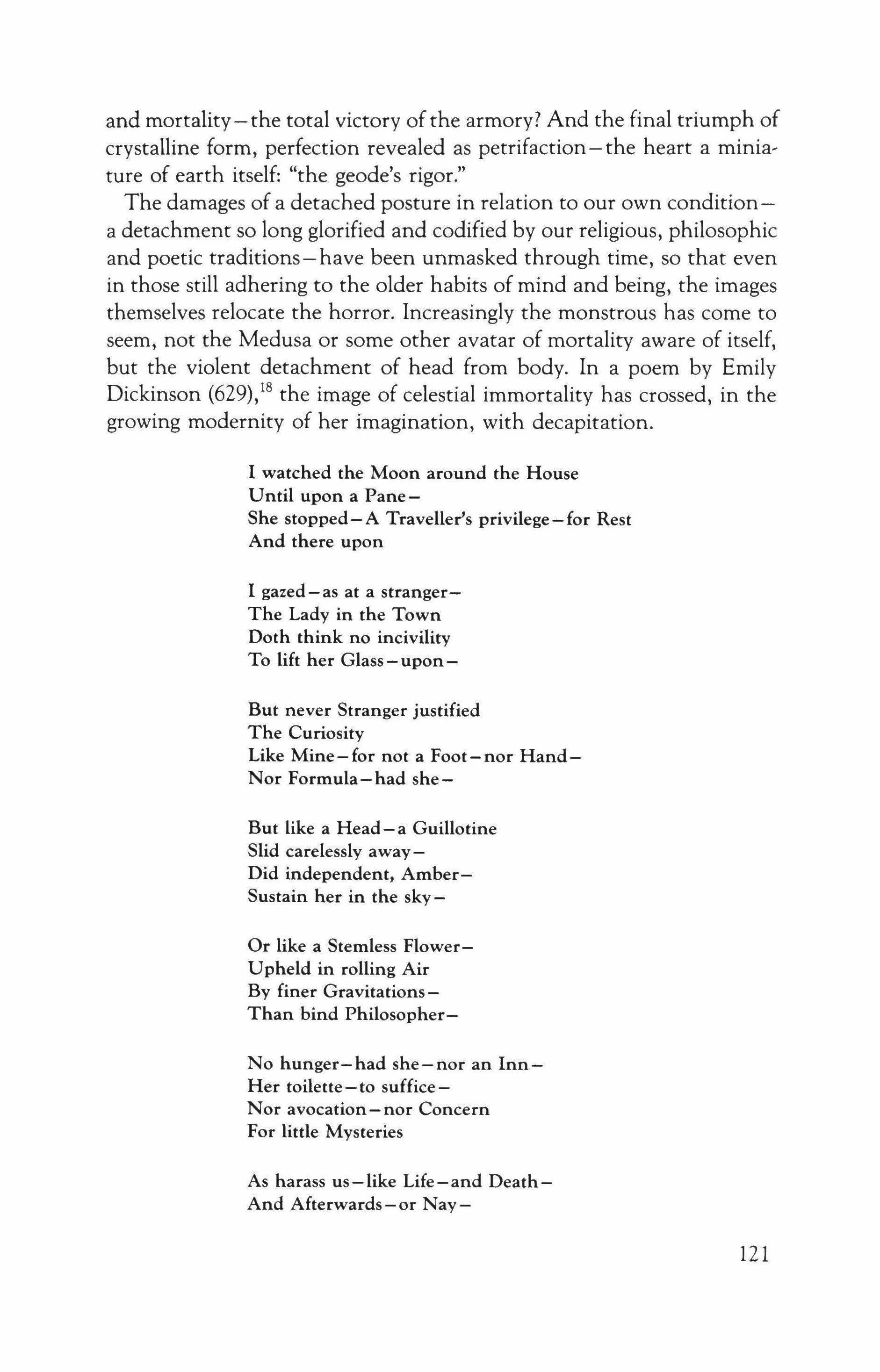
and mortality-the total victory ofthe armory? And the final triumph of crystalline form, perfection revealed as petrifaction - the heart a miniature of earth itself: "the geode's rigor."
The damages of a detached posture in relation to our own conditiona detachment so long glorified and codified by our religious, philosophic and poetic traditions-have been unmasked through time, so that even in those still adhering to the older habits of mind and being, the images themselves relocate the horror. Increasingly the monstrous has come to seem, not the Medusa or some other avatar of mortality aware of itself, but the violent detachment of head from body. In a poem by Emily Dickinson (629),18 the image of celestial immortality has crossed, in the growing modernity of her imagination, with decapitation.
I watched the Moon around the House
Until upon a PaneShe stopped-A Traveller's privilege-for Rest And there upon
I gazed - as at a strangerThe Lady in the Town Doth think no incivility
To lift her Glass-upon-
But never Stranger justified
The Curiosity
Like Mine-for not a Foot-nor HandNor Formula-had she-
But like a Head - a Guillotine
Slid carelessly awayDid independent, AmberSustain her in the sky-
Or like a Stemless Flower
Upheld in rolling Air
By finer GravitationsThan bind Philosopher-
No hunger-had she-nor an 1nn
Her toilette-to sufficeNor avocation-nor Concern For little Mysteries
As harass us -like Life - and DeathAnd Afterwards-or Nay-
121
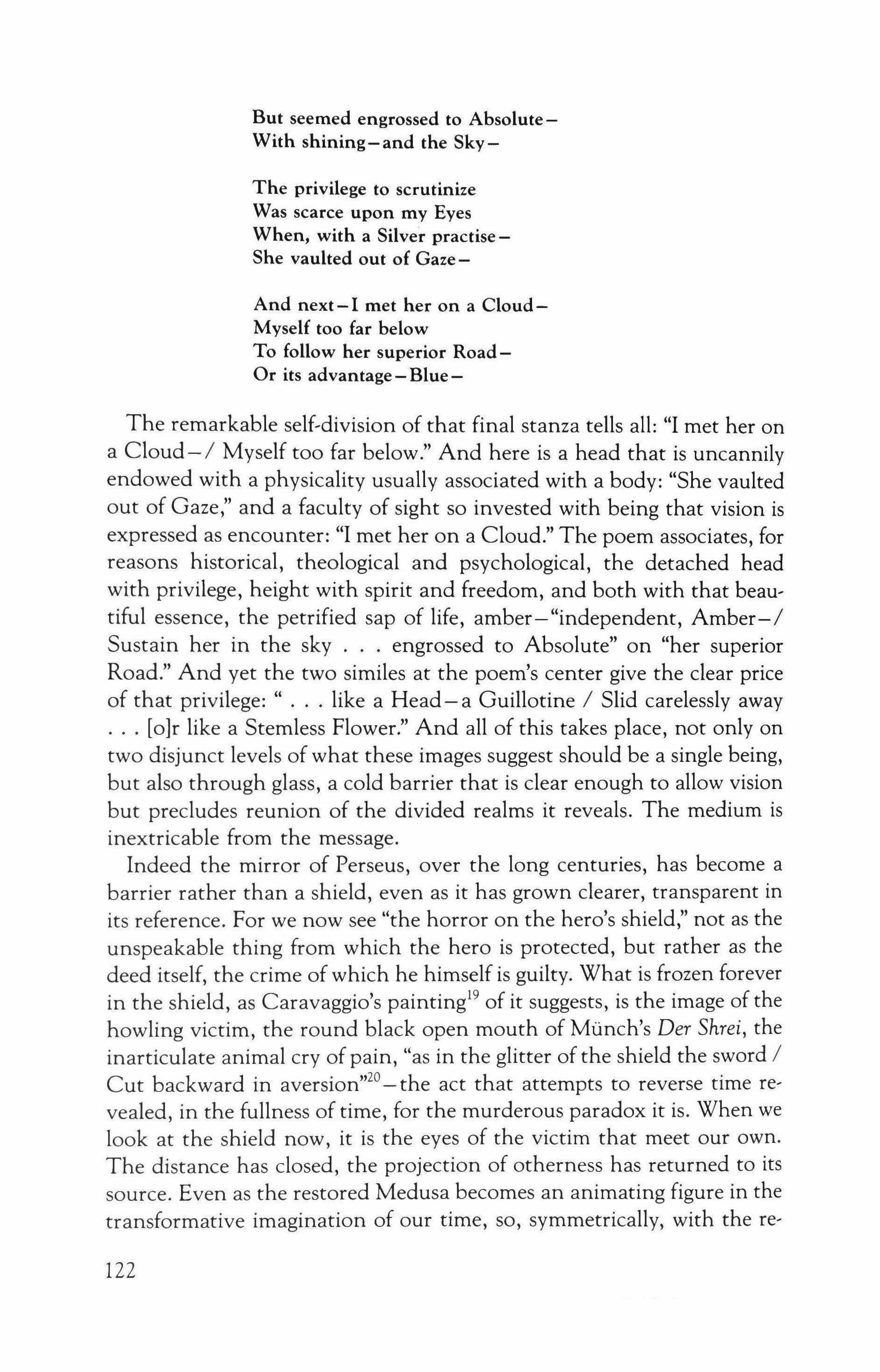
But seemed engrossed to AbsoluteWith shining-and the Sky-
The privilege to scrutinize Was scarce upon my Eyes When, with a Silver practiseShe vaulted out of Gaze-
And next - I met her on a CloudMyself too far below To follow her superior RoadOr its advantage-Blue-
The remarkable self-division of that final stanza tells all: "I met her on a Cloud-/ Myself too far below." And here is a head that is uncannily endowed with a physicality usually associated with a body: "She vaulted out of Gaze," and a faculty of sight so invested with being that vision is expressed as encounter: "I met her on a Cloud." The poem associates, for reasons historical, theological and psychological, the detached head with privilege, height with spirit and freedom, and both with that beautiful essence, the petrified sap of life, amber-"independent, Amber-/ Sustain her in the sky engrossed to Absolute" on "her superior Road." And yet the two similes at the poem's center give the clear price of that privilege: like a Head - a Guillotine / Slid carelessly away [ojr like a Stemless Flower." And all of this takes place, not only on two disjunct levels of what these images suggest should be a single being, but also through glass, a cold barrier that is clear enough to allow vision but precludes reunion of the divided realms it reveals. The medium is inextricable from the message.
Indeed the mirror of Perseus, over the long centuries, has become a barrier rather than a shield, even as it has grown clearer, transparent in its reference. For we now see "the horror on the hero's shield," not as the unspeakable thing from which the hero is protected, but rather as the deed itself, the crime of which he himself is guilty. What is frozen forever in the shield, as Caravaggio's painting" of it suggests, is the image of the howling victim, the round black open mouth of Munch's Der Shrei, the inarticulate animal cry ofpain, "as in the glitter of the shield the sword / Cut backward in aversion't" - the act that attempts to reverse time revealed, in the fullness of time, for the murderous paradox it is. When we look at the shield now, it is the eyes of the victim that meet our own. The distance has closed, the projection of otherness has returned to its source. Even as the restored Medusa becomes an animating figure in the transformative imagination of our time, so, symmetrically, with the re-
122
 Medusa by Caravaggio
Medusa by Caravaggio
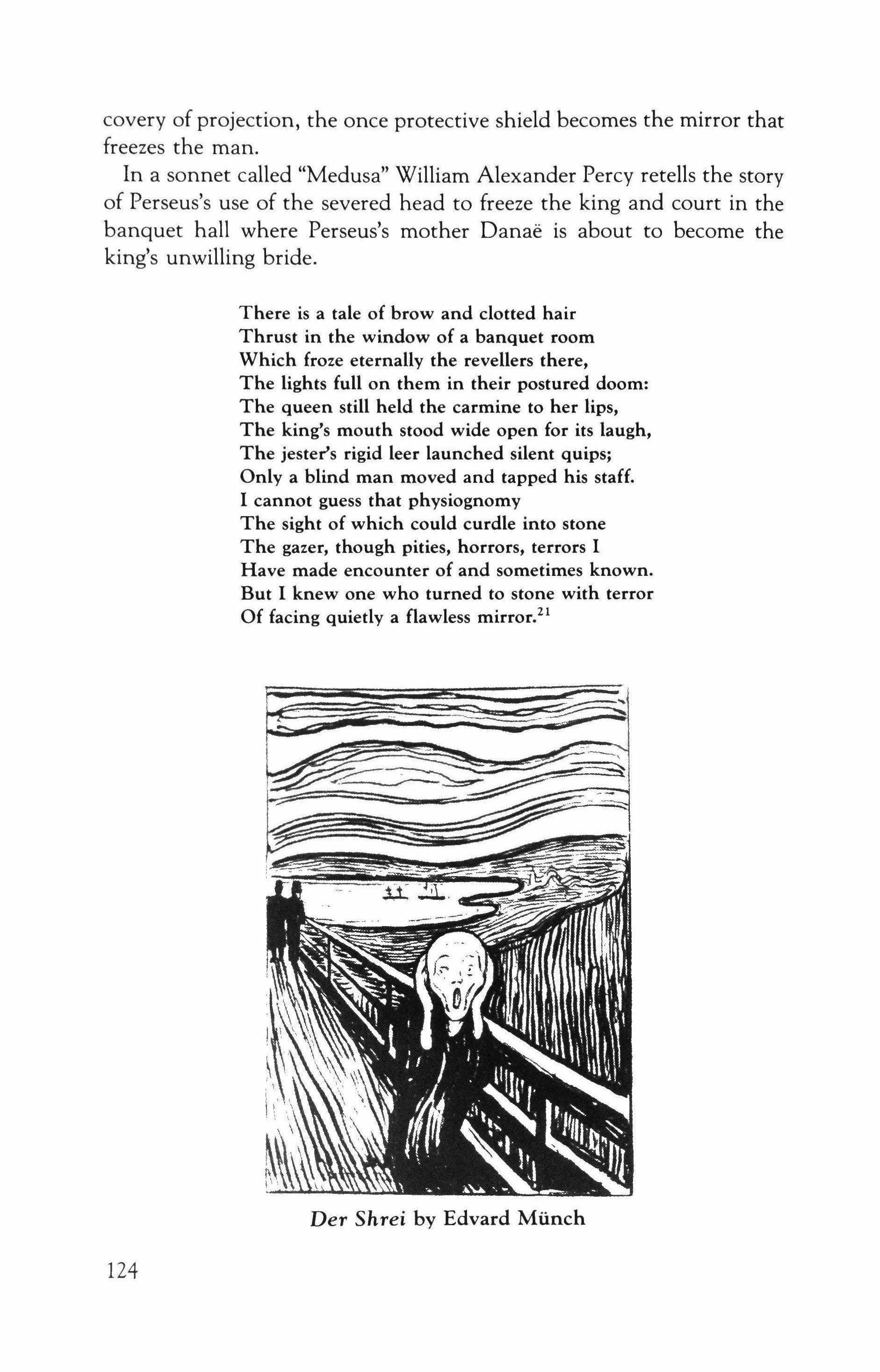
covery of projection, the once protective shield becomes the mirror that freezes the man.
In a sonnet called "Medusa" William Alexander Percy retells the story of Perseus's use of the severed head to freeze the king and court in the banquet hall where Perseus's mother Danae is about to become the king's unwilling bride.
There is a tale of brow and clotted hair
Thrust in the window of a banquet room Which froze eternally the revellers there, The lights full on them in their postured doom: The queen still held the carmine to her lips, The king's mouth stood wide open for its laugh, The jester's rigid leer launched silent quips; Only a blind man moved and tapped his staff.
I cannot guess that physiognomy The sight of which could curdle into stone
The gazer, though pities, horrors, terrors I Have made encounter of and sometimes known. But I knew one who turned to stone with terror Of facing quietly a flawless mirror.I!
124
Der Shrei by Edvard Munch
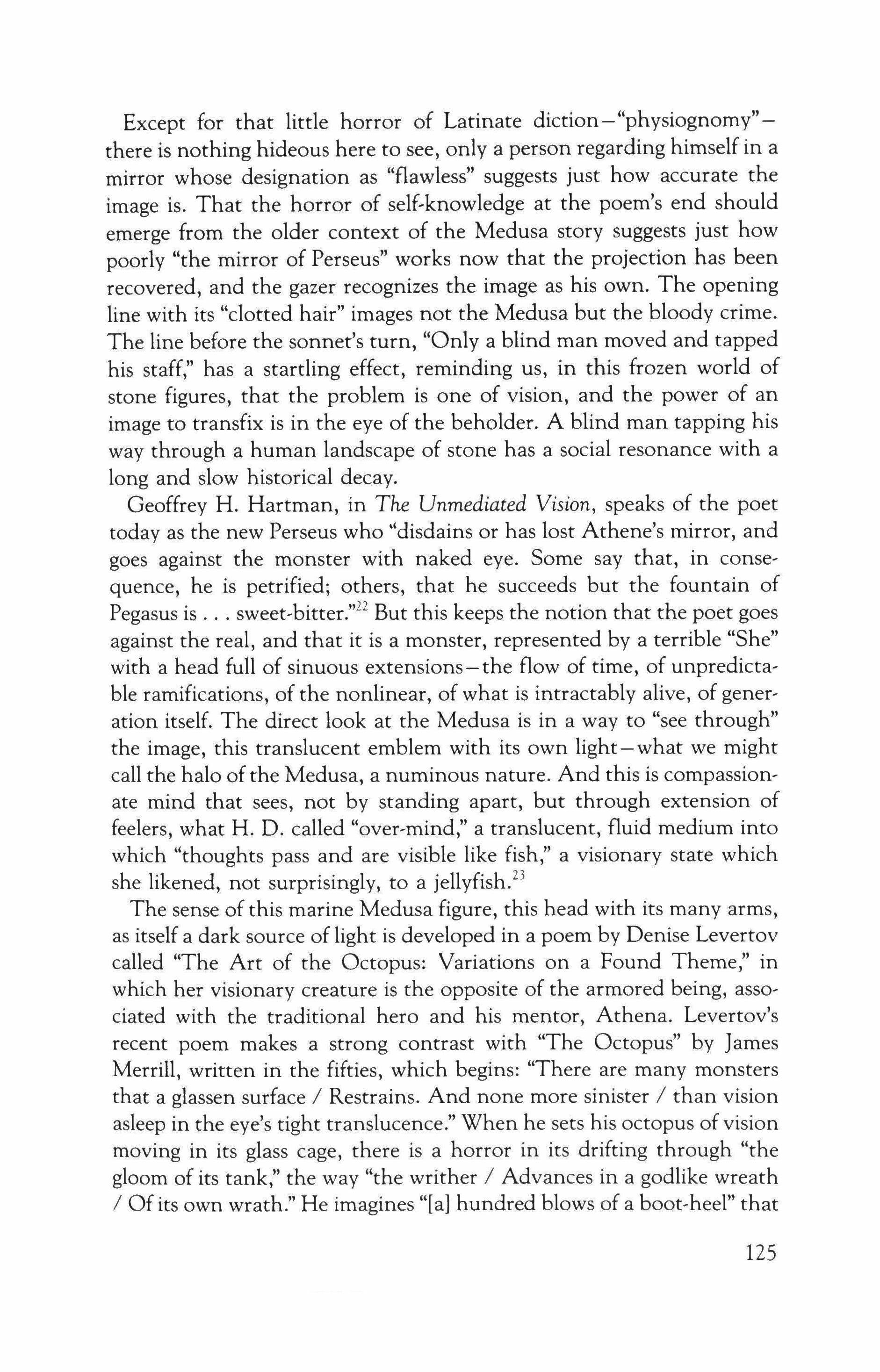
Except for that little horror of Latinate diction - "physiognomy"there is nothing hideous here to see, only a person regarding himself in a mirror whose designation as "flawless" suggests just how accurate the image is. That the horror of self-knowledge at the poem's end should emerge from the older context of the Medusa story suggests just how poorly "the mirror of Perseus" works now that the projection has been recovered, and the gazer recognizes the image as his own. The opening line with its "clotted hair" images not the Medusa but the bloody crime. The line before the sonnet's turn, "Only a blind man moved and tapped his staff," has a startling effect, reminding us, in this frozen world of stone figures, that the problem is one of vision, and the power of an image to transfix is in the eye of the beholder. A blind man tapping his way through a human landscape of stone has a social resonance with a long and slow historical decay.
Geoffrey H. Hartman, in The Unmediated Vision, speaks of the poet today as the new Perseus who "disdains or has lost Athene's mirror, and goes against the monster with naked eye. Some say that, in consequence, he is petrified; others, that he succeeds but the fountain of Pegasus is sweet-bitter.t'" But this keeps the notion that the poet goes against the real, and that it is a monster, represented by a terrible "She" with a head full of sinuous extensions-the flow of time, of unpredictable ramifications, of the nonlinear, of what is intractably alive, of generation itself. The direct look at the Medusa is in a way to "see through" the image, this translucent emblem with its own light-what we might call the halo of the Medusa, a numinous nature. And this is compassionate mind that sees, not by standing apart, but through extension of feelers, what H. D. called "over-mind," a translucent, fluid medium into which "thoughts pass and are visible like fish," a visionary state which she likened, not surprisingly, to a jellyfish.r'
The sense of this marine Medusa figure, this head with its many arms, as itself a dark source of light is developed in a poem by Denise Levertov called "The Art of the Octopus: Variations on a Found Theme," in which her visionary creature is the opposite of the armored being, associated with the traditional hero and his mentor, Athena. Levertov's recent poem makes a strong contrast with "The Octopus" by James Merrill, written in the fifties, which begins: "There are many monsters that a glassen surface / Restrains. And none more sinister / than vision asleep in the eye's tight translucence." When he sets his octopus of vision moving in its glass cage, there is a horror in its drifting through "the gloom of its tank," the way "the writher / Advances in a godlike wreath / Of its own wrath." He imagines "[a] hundred blows of a boot-heel" that
125
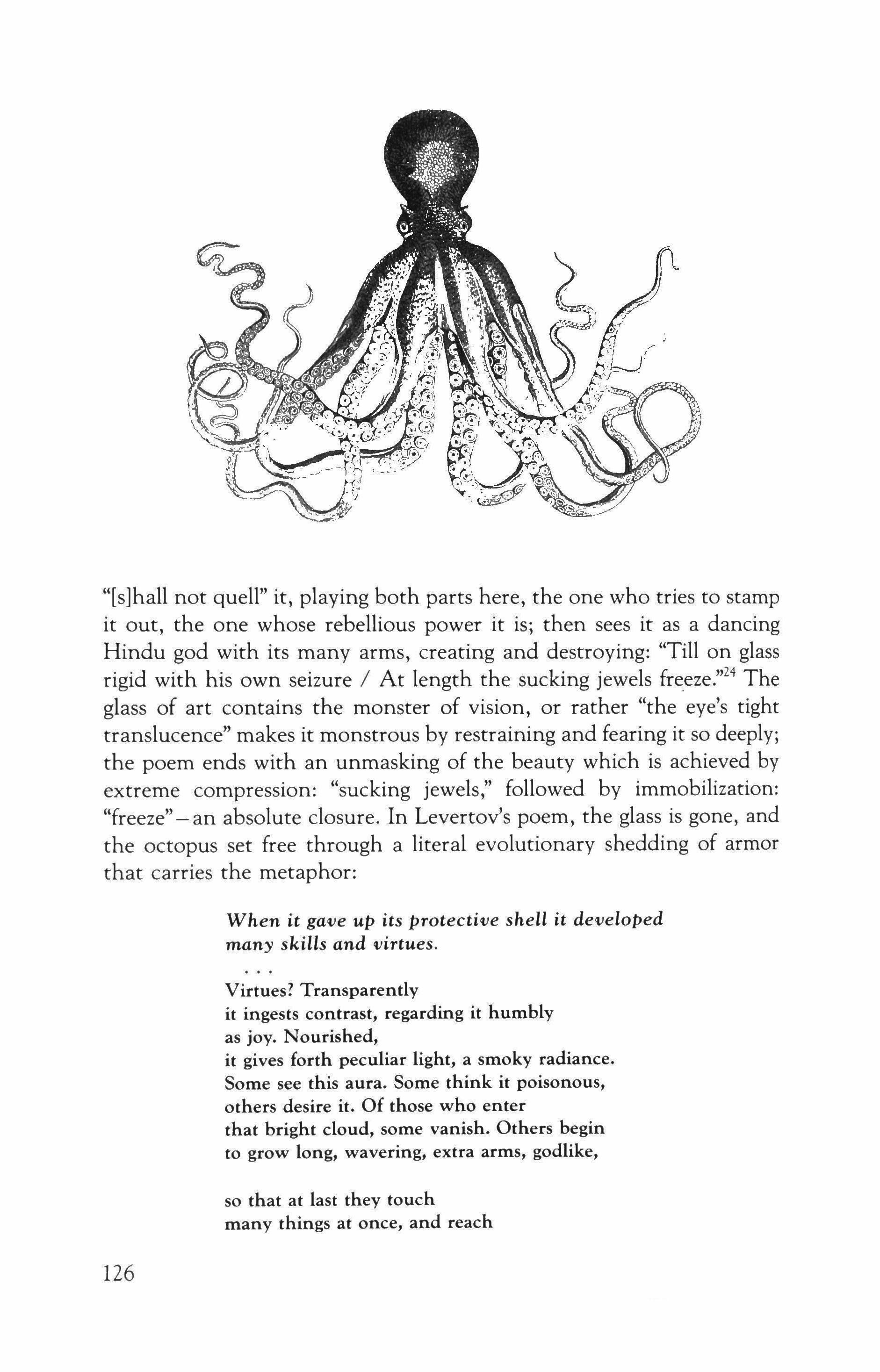
"[sjhall not quell" it, playing both parts here, the one who tries to stamp it out, the one whose rebellious power it is; then sees it as a dancing Hindu god with its many arms, creating and destroying: "Till on glass rigid with his own seizure / At length the sucking jewels freeze."z4 The glass of art contains the monster of vision, or rather "the eye's tight translucence" makes it monstrous by restraining and fearing it so deeply; the poem ends with an unmasking of the beauty which is achieved by extreme compression: "sucking jewels," followed by immobilization: "freeze" - an absolute closure. In Levertov's poem, the glass is gone, and the octopus set free through a literal evolutionary shedding of armor that carries the metaphor:
When it gave up its protective shell it developed many skills and virtues.
Virtues? Transparently it ingests contrast, regarding it humbly as joy. Nourished, it gives forth peculiar light, a smoky radiance. Some see this aura. Some think it poisonous, others desire it. Of those who enter that bright cloud, some vanish. Others begin to grow long, wavering, extra arms, godlike,
so that at last they touch many things at once, and reach
126

towards everything; they too begin the solitary dance.P
The dark becomes a source of light as this dancing, feeling mind ingests contrasts and overcomes old opposites, as what was once despised comes to seem the "soul unshelled'f" and takes on the numinous radiance of the sacred. To see the serpentine as both tactile mind and a formal principle of order, one which moves in time as if in a fluid medium, is perhaps to suggest one reason why "chaos" mathematics and its images have had such a remarkable lay appeal, particularly to artists. Where systems are dynamic, complex and nonlinear; where time itself is a variable of for, mal beauty; where that beauty comes of curvilinear symmetries at various scales; where, in time, turbulence and chaos produce gorgeous or' der; where reality is so infinitely responsive that the most subtle variable can produce long-term changes so enormous that order and predictability are no longer synonymous-these characteristics accord so thor, oughly with the contemporary experience of creative process, what we might, having reached this point in the discussion, venture to call "the Medusan vision," that it is difficult not to see a kind of Zeitgeist here, a similar way in which aberration, disorder or monstrosity suddenly appear as a new locus of order and beauty, carrying both the explanatory power and ultimate mystery we associate with the sacred. What once froze the mind now excites it; as the physicist, Ronald Fox, put it: "There was a place where you quit looking at [a problem] because it became nonlinear. Now you know how to look at it and you go back.,m
In a rather bizarre fiction called The Medusa Frequency, Russell Hoban's protagonist is sitting before his computer screen when a strange tentacled head, "the Kraken," floats up to him. The Kraken-who speaks always in capital letters like the captions of a comic book or a dreambecomes his conduit to a whole submerged world, which leads to a friendship of sorts with the head of Orpheus (always vocal though alternately appearing as a head of lettuce or a grapefruit), and finally, after a series of antic adventures, to a dawn vision:
Out of the pinky dawn water, naked and shining in the dawn, rose Luise, like a mirage between the beach and the island seen across the water. Quivering, shimmering, her body becoming, becoming, becoming a face loosely grinning, with hissing snakes writhing round it in the shining dawn. Around me ceased the sounds of the day; the stone of me cracked and I came out of myself quite clean, like a snake out of an egg, nothing obscuring my sight or my hearing. The Gorgon's head, the face of Medusa, shimmered luminous in a silence that crackled with its brilliance Kraken, I typed, can you tell me anything about this mystery?
127
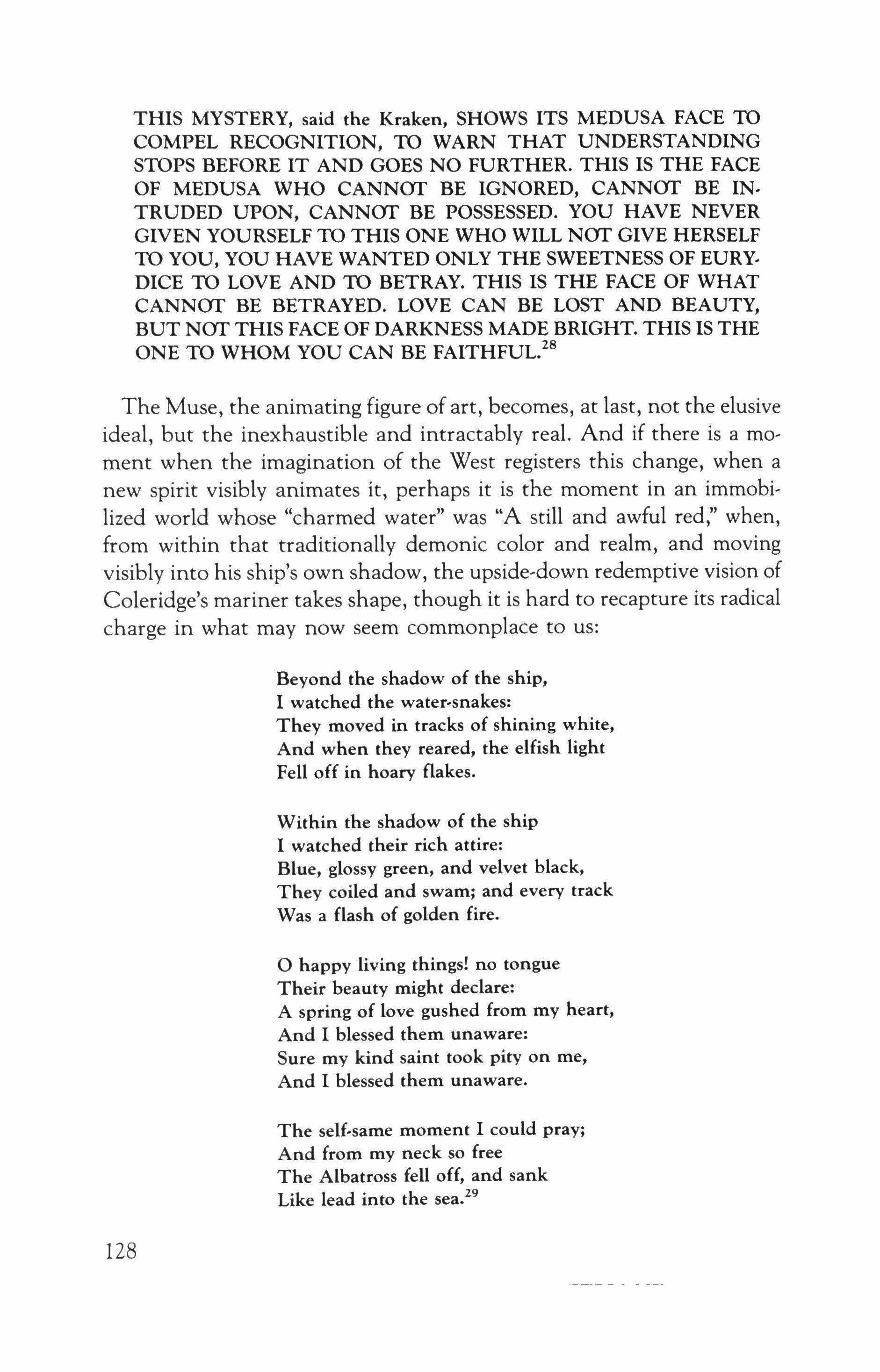
THIS MYSTERY, said the Kraken, SHOWS ITS MEDUSA FACE TO COMPEL RECOGNITION, TO WARN THAT UNDERSTANDING STOPS BEFORE IT AND GOES NO FURTHER. THIS IS THE FACE OF MEDUSA WHO CANNOf BE IGNORED, CANNOf BE INTRUDED UPON, CANNOf BE POSSESSED. YOU HAVE NEVER GIVEN YOURSELF TO THIS ONE WHO WILL NOf GIVE HERSELF TO YOU, YOU HAVE WANTED ONLY THE SWEETNESS OF EURYDICE TO LOVE AND TO BETRAY. THIS IS THE FACE OF WHAT CANNOf BE BETRAYED. LOVE CAN BE LOST AND BEAUTY, BUT NOf THIS FACE OF DARKNESS MADE BRIGHT. THIS IS THE ONE TO WHOM YOU CAN BE FAITHFUL.28
The Muse, the animating figure of art, becomes, at last, not the elusive ideal, but the inexhaustible and intractably real. And if there is a moment when the imagination of the West registers this change, when a new spirit visibly animates it, perhaps it is the moment in an immobilized world whose "charmed water" was "A still and awful red," when, from within that traditionally demonic color and realm, and moving visibly into his ship's own shadow, the upside-down redemptive vision of Coleridge's mariner takes shape, though it is hard to recapture its radical charge in what may now seem commonplace to us:
Beyond the shadow of the ship, I watched the water-snakes: They moved in tracks of shining white, And when they reared, the elfish light Fell off in hoary flakes.
Within the shadow of the ship I watched their rich attire: Blue, glossy green, and velvet black, They coiled and swam; and every track Was a flash of golden fire.
o happy living things! no tongue Their beauty might declare: A spring of love gushed from my heart, And I blessed them unaware: Sure my kind saint took pity on me, And I blessed them unaware.
The self-same moment I could pray; And from my neck so free The Albatross fell off, and sank Like lead into the sea.29
128
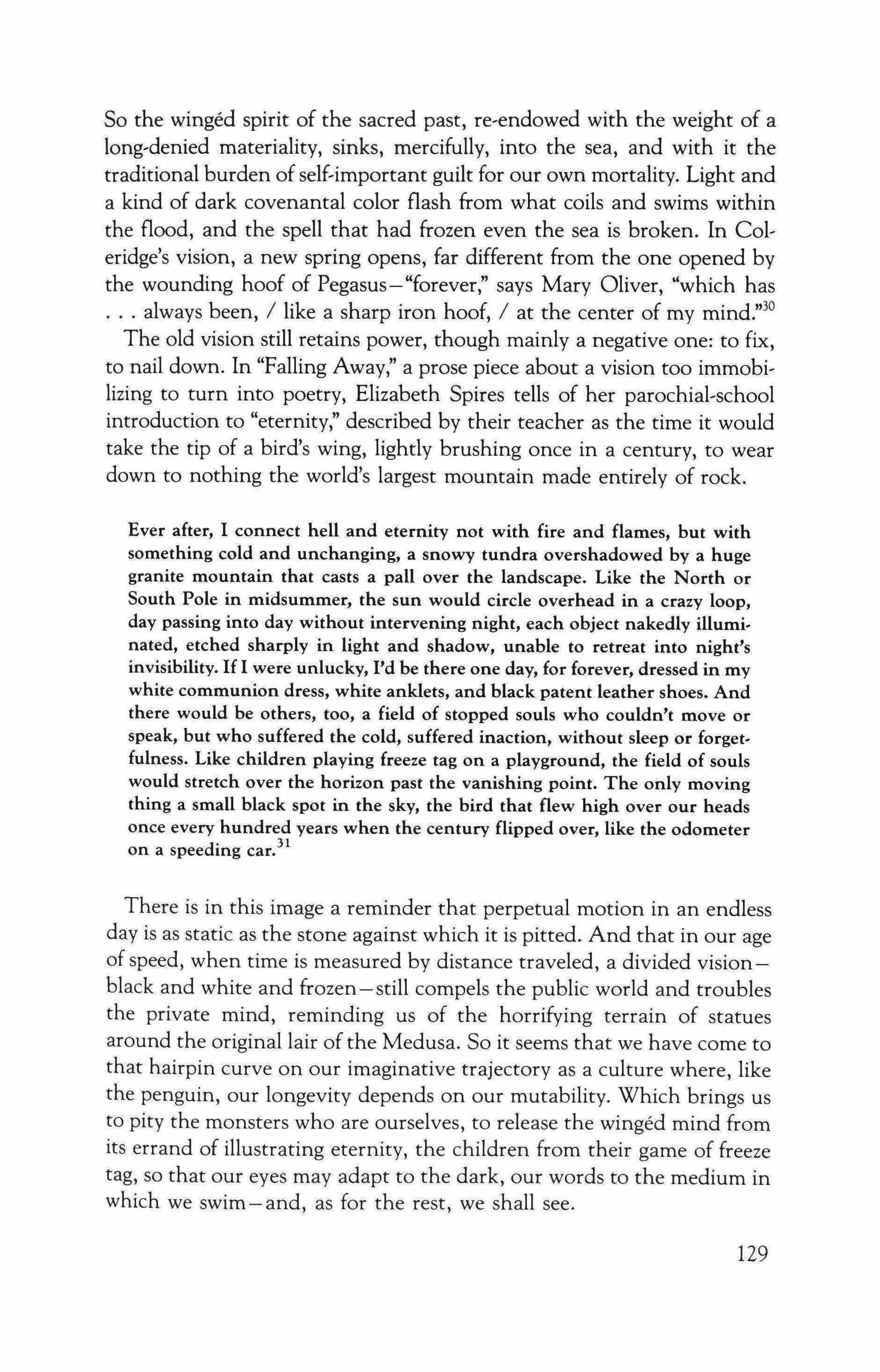
So the winged spirit of the sacred past, re-endowed with the weight of a long-denied materiality, sinks, mercifully, into the sea, and with it the traditional burden of self-important guilt for our own mortality. Light and a kind of dark covenantal color flash from what coils and swims within the flood, and the spell that had frozen even the sea is broken. In Coleridge's vision, a new spring opens, far different from the one opened by the wounding hoof of Pegasus-"forever," says Mary Oliver, "which has always been, I like a sharp iron hoof, I at the center of my mind."30
The old vision still retains power, though mainly a negative one: to fix, to nail down. In "Falling Away; a prose piece about a vision too immobilizing to turn into poetry, Elizabeth Spires tells of her parochial-school introduction to "eternity:' described by their teacher as the time it would take the tip of a bird's wing, lightly brushing once in a century, to wear down to nothing the world's largest mountain made entirely of rock.
Ever after, I connect hell and eternity not with fire and flames, but with something cold and unchanging, a snowy tundra overshadowed by a huge granite mountain that casts a pall over the landscape. Like the North or South Pole in midsummer, the sun would circle overhead in a crazy loop, day passing into day without intervening night, each object nakedly illuminated, etched sharply in light and shadow, unable to retreat into night's invisibility. If I were unlucky, I'd be there one day, for forever, dressed in my white communion dress, white anklets, and black patent leather shoes. And there would be others, too, a field of stopped souls who couldn't move or speak, but who suffered the cold, suffered inaction, without sleep or forgetfulness. Like children playing freeze tag on a playground, the field of souls would stretch over the horizon past the vanishing point. The only moving thing a small black spot in the sky, the bird that flew high over our heads once every hundred years when the century flipped over, like the odometer on a speeding car.31
There is in this image a reminder that perpetual motion in an endless day is as static as the stone against which it is pitted. And that in our age of speed, when time is measured by distance traveled, a divided visionblack and white and frozen - still compels the public world and troubles the private mind, reminding us of the horrifying terrain of statues around the original lair of the Medusa. So it seems that we have come to that hairpin curve on our imaginative trajectory as a culture where, like the penguin, our longevity depends on our mutability. Which brings us to pity the monsters who are ourselves, to release the winged mind from its errand of illustrating eternity, the children from their game of freeze tag, so that our eyes may adapt to the dark, our words to the medium in which we swim - and, as for the rest, we shall see.
129
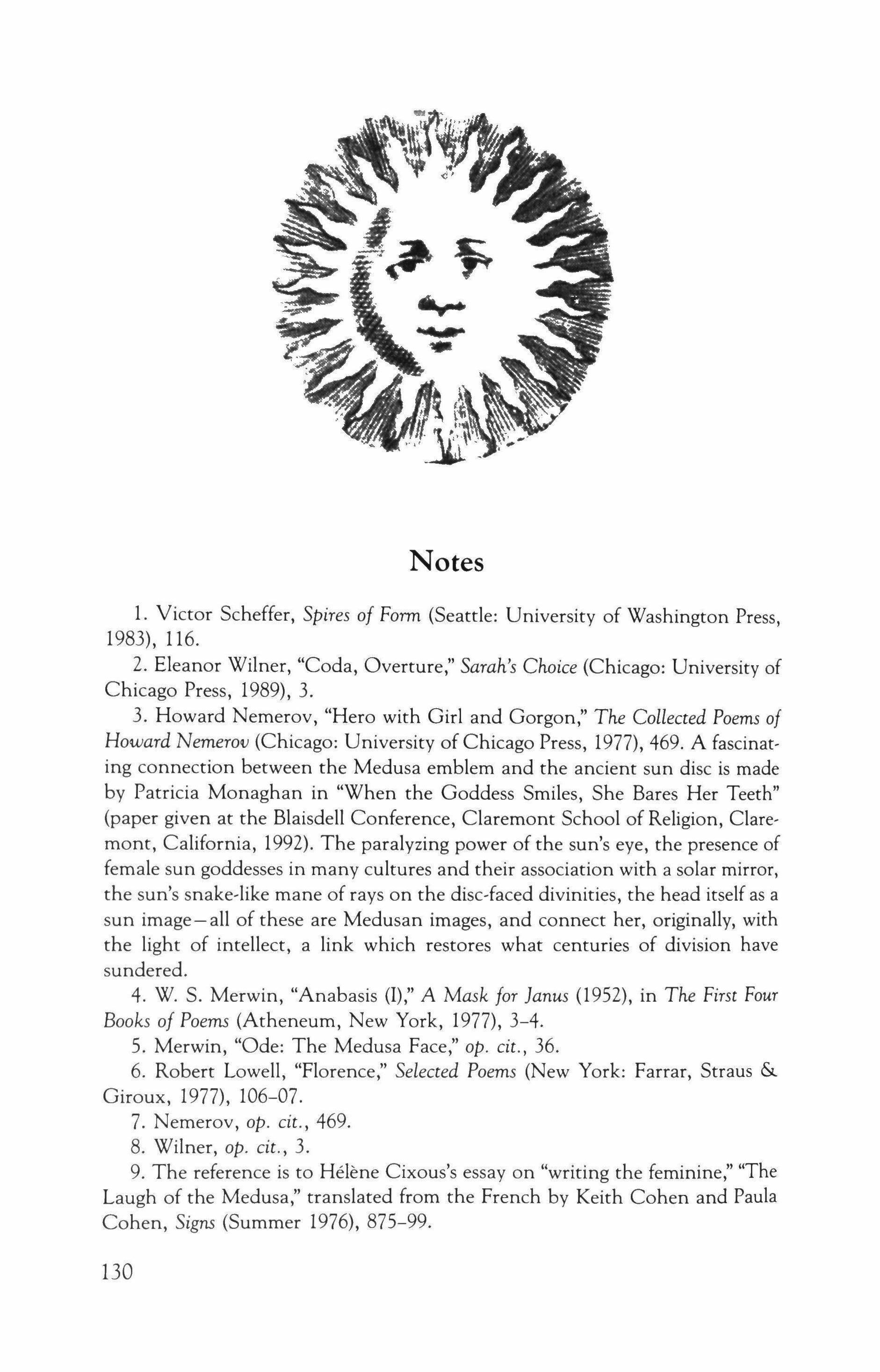
Notes
1. Victor Scheffer, Spires of Form (Seattle: University of Washington Press, 1983),116.
2. Eleanor Wilner, "Coda, Overture," Sarah's Choice (Chicago: University of Chicago Press, 1989), 3.
3. Howard Nemerov, "Hero with Girl and Gorgon," The Collected Poems of Howard Nemerov (Chicago: University of Chicago Press, 1977),469. A fascinating connection between the Medusa emblem and the ancient sun disc is made by Patricia Monaghan in "When the Goddess Smiles, She Bares Her Teeth" (paper given at the Blaisdell Conference, Claremont School of Religion, Claremont, California, 1992). The paralyzing power of the sun's eye, the presence of female sun goddesses in many cultures and their association with a solar mirror, the sun's snake-like mane of rays on the disc-faced divinities, the head itself as a sun image-all of these are Medusan images, and connect her, originally, with the light of intellect, a link which restores what centuries of division have sundered.
4. W. S. Merwin, "Anabasis (I)," A Mask for Janus (1952), in The First Four Books of Poems (Atheneum, New York, 1977), 3-4.
5. Merwin, "Ode: The Medusa Face," op. cit., 36.
6. Robert Lowell, "Florence," Selected Poems (New York: Farrar, Straus & Giroux, 1977), 106-07.
7. Nemerov, op. cit., 469.
8. Wilner, op. cit., 3.
9. The reference is to Helene Cixous's essay on "writing the feminine," "The Laugh of the Medusa," translated from the French by Keith Cohen and Paula Cohen, Signs (Summer 1976), 875-99.
130
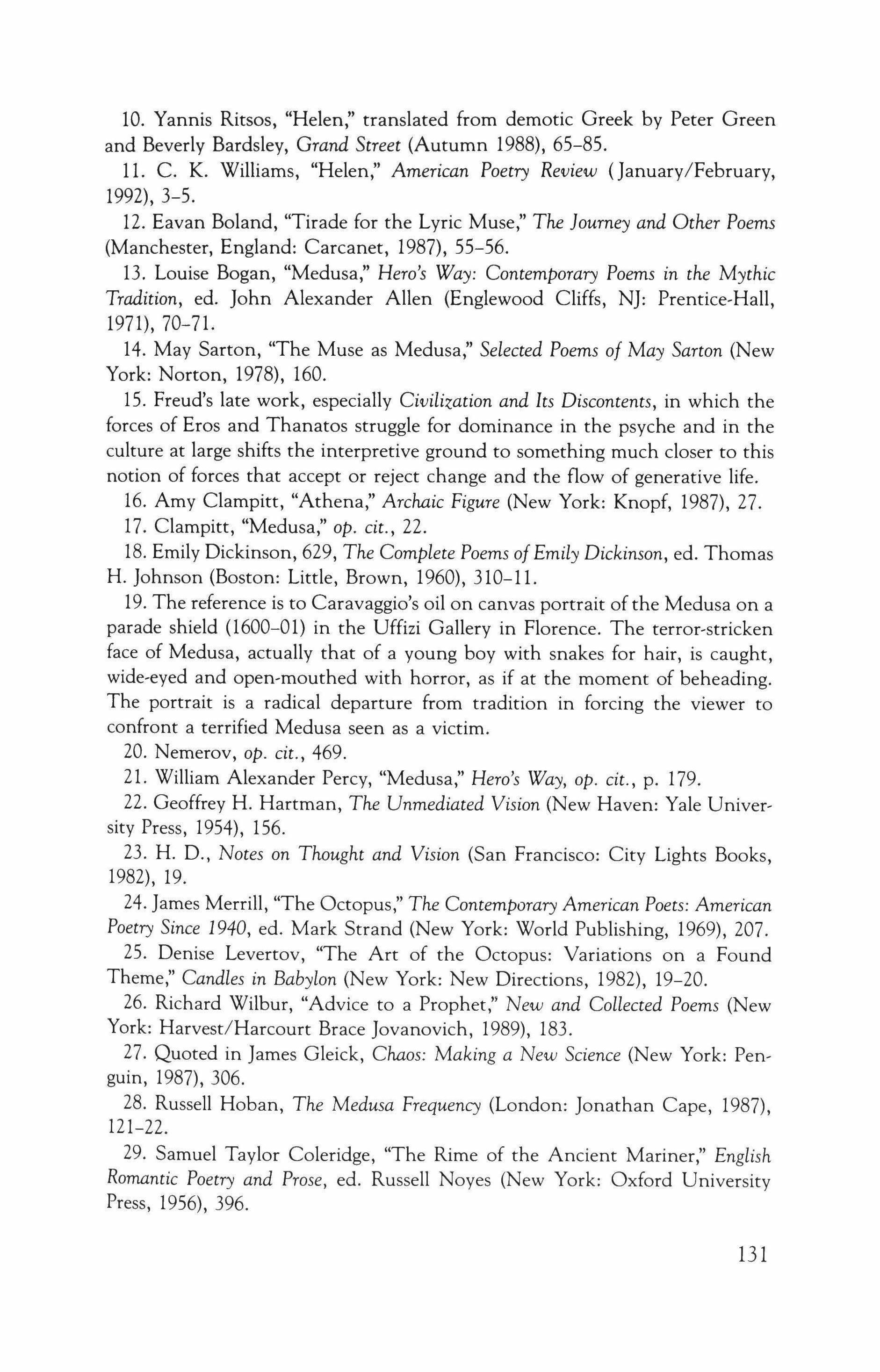
10. Yannis Ritsos, "Helen:' translated from demotic Greek by Peter Green and Beverly Bardsley, Grand Street (Autumn 1988), 65-85.
11. C. K. Williams, "Helen," American Poetry Review (January/February, 1992), 3-5.
12. Eavan Boland, "Tirade for the Lyric Muse," The Journey and Other Poems (Manchester, England: Carcanet, 1987), 55-56.
13. Louise Bogan, "Medusa," Hero's Way: Contemporary Poems in the Mythic Tradition, ed. John Alexander Allen (Englewood Cliffs, NJ: Prentice-Hall, 1971),70-71.
14. May Sarton, "The Muse as Medusa," Selected Poems of May Sarton (New York: Norton, 1978), 160.
15. Freud's late work, especially Civilization and Its Discontents, in which the forces of Eros and Thanatos struggle for dominance in the psyche and in the culture at large shifts the interpretive ground to something much closer to this notion of forces that accept or reject change and the flow of generative life.
16. Amy Clampitt, "Athena," Archaic Figure (New York: Knopf, 1987), 27.
17. Clampitt, "Medusa," op. cit., 22.
18. Emily Dickinson, 629, The Complete Poems ofEmily Dickinson, ed. Thomas H. Johnson (Boston: Little, Brown, 1960),310-11.
19. The reference is to Caravaggio's oil on canvas portrait of the Medusa on a parade shield (1600-01) in the Uffizi Gallery in Florence. The terror-stricken face of Medusa, actually that of a young boy with snakes for hair, is caught, wide-eyed and open-mouthed with horror, as if at the moment of beheading. The portrait is a radical departure from tradition in forcing the viewer to confront a terrified Medusa seen as a victim.
20. Nemerov, op. cii., 469.
21. William Alexander Percy, "Medusa," Hero's Way, op. cit., p. 179.
22. Geoffrey H. Hartman, The Unmediated Vision (New Haven: Yale University Press, 1954), 156.
23. H. D., Notes on Thought and Vision (San Francisco: City Lights Books, 1982), 19.
24. James Merrill, "The Octopus," The Contemporary American Poets: American Poetry Since 1940, ed. Mark Strand (New York: World Publishing, 1969), 207.
25. Denise Levertov, "The Art of the Octopus: Variations on a Found Theme," Candles in Babylon (New York: New Directions, 1982), 19-20.
26. Richard Wilbur, "Advice to a Prophet," New and Collected Poems (New York: Harvest/Harcourt Brace Jovanovich, 1989), 183.
27. Quoted in James Gleick, Chaos: Making a New Science (New York: Penguin, 1987), 306.
28. Russell Hoban, The Medusa Frequency (London: Jonathan Cape, 1987), 121-22.
29. Samuel Taylor Coleridge, "The Rime of the Ancient Mariner," English Romantic Poetry and Prose, ed. Russell Noyes (New York: Oxford University Press, 1956), 396.
131
30. Mary Oliver, "One or Two Things," Dream Work (New York: Atlantic Monthly Press, 1986), 51.
31. Elizabeth Spires, "Falling Away," Annonciade (New York: Viking, 1989), 38.
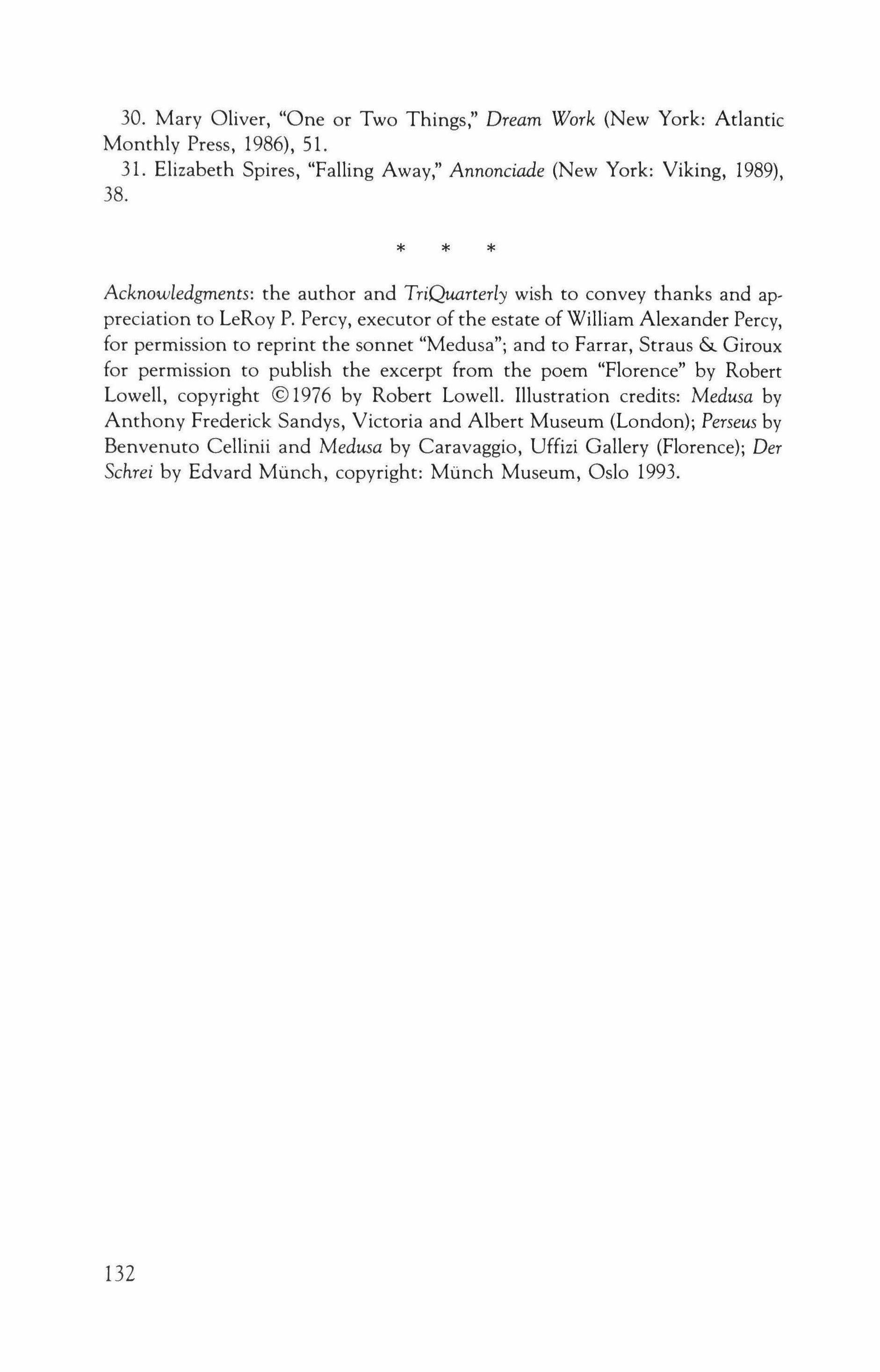
Acknowledgments: the author and TriQuarterly wish to convey thanks and appreciation to LeRoy P. Percy, executor of the estate of William Alexander Percy, for permission to reprint the sonnet "Medusa"; and to Farrar, Straus & Giroux for permission to publish the excerpt from the poem "Florence" by Robert Lowell, copyright © 1976 by Robert Lowell. Illustration credits: Medusa by Anthony Frederick Sandys, Victoria and Albert Museum (London); Perseus by Benvenuto Cellinii and Medusa by Caravaggio, Uffizi Gallery (Florence); Der Schrei by Edvard Munch, copyright: Munch Museum, Oslo 1993.
* * *
132
Etruscan Places
Margot Livesey
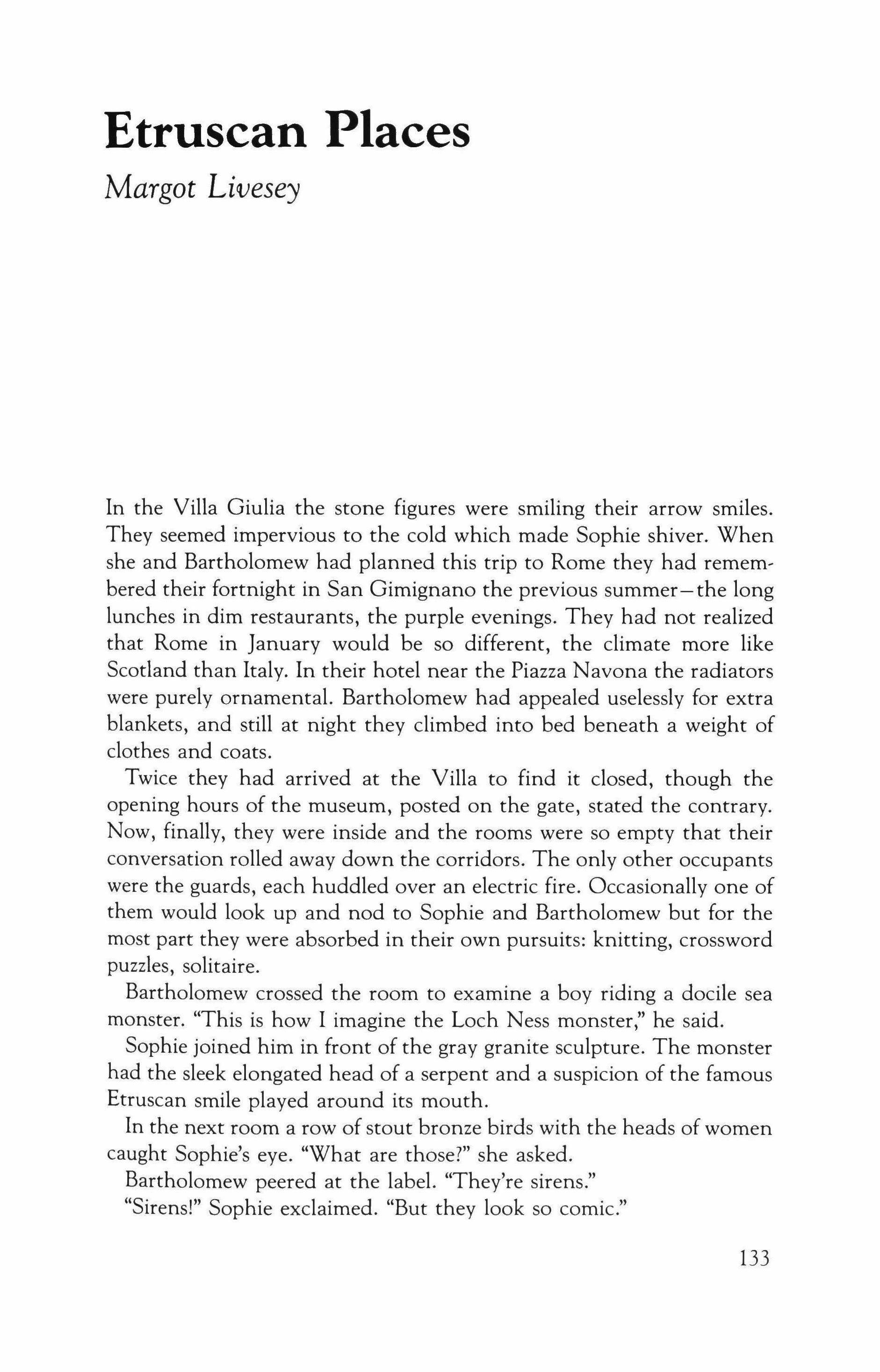
In the Villa Giulia the stone figures were smiling their arrow smiles. They seemed impervious to the cold which made Sophie shiver. When she and Bartholomew had planned this trip to Rome they had remembered their fortnight in San Gimignano the previous summer-the long lunches in dim restaurants, the purple evenings. They had not realized that Rome in January would be so different, the climate more like Scotland than Italy. In their hotel near the Piazza Navona the radiators were purely ornamental. Bartholomew had appealed uselessly for extra blankets, and still at night they climbed into bed beneath a weight of clothes and coats.
Twice they had arrived at the Villa to find it closed, though the opening hours of the museum, posted on the gate, stated the contrary. Now, finally, they were inside and the rooms were so empty that their conversation rolled away down the corridors. The only other occupants were the guards, each huddled over an electric fire. Occasionally one of them would look up and nod to Sophie and Bartholomew but for the most part they were absorbed in their own pursuits: knitting, crossword puzzles, solitaire.
Bartholomew crossed the room to examine a boy riding a docile sea monster. "This is how I imagine the Loch Ness monster," he said.
Sophie joined him in front of the gray granite sculpture. The monster had the sleek elongated head of a serpent and a suspicion of the famous Etruscan smile played around its mouth.
In the next room a row of stout bronze birds with the heads of women caught Sophie's eye. "What are those?" she asked.
Bartholomew peered at the label. "They're sirens." "Sirens!" Sophie exclaimed. "But they look so comic."
133
"It wasn't their appearance that was fatal," said Bartholomew. "It was their voices. As long as they kept singing, you were done for."
"Were they fatal to women too?"
"I don't know. Maybe all Ulysses's problems would have been solved if he'd had a woman at the helm." He smiled and took Sophie's hand. They came to the famous sarcophagus-the one that was reproduced everywhere. In rosy terra-cotta a husband and wife reclined together on a banqueting couch. The man was propped up on a cushion behind the woman and his arms reached around her. She had long braided hair, and he had a beard. Their hands were outstretched with the animated delicacy of dancers. Perhaps they had once been holding things-eggs, flowers, mirrors-now all gone.
Bartholomew began to read from the guidebook. "The unusual grace and vitality of this couple, sixth century B.C., go a long way to explaining our continuing fascination with the Etruscans. Almost everything we know of these mysterious people comes from the habitations they gave their dead."
Sophie gazed at the rapturous faces of the man and the woman and tried to experience the fascination, but her new shoes intervened. They pinched painfully. She had bought them as an alibi for her trip to another museum, the one on Chamber Street in Edinburgh.

Ten days before they entered the Villa Giulia Sophie and Bartholomew had flown from Toronto to Scotland to spend Christmas with Sophie's family. When she still lived in Scotland Sophie had sometimes spent Christmas with friends, but now that she lived in Toronto, with Bartholomew, she was insistent about coming home for crackers and plum pudding.
That first night in her parents' house Sophie had realized her situation. She lay beside Bartholomew counting over and over, wishing she could get up to look at her diary. She was sure that Bartholomew was asleep but suddenly he whispered, "Sophie, are you all right?" and put his arm around her shoulders.
Briefly Sophie considered answering his question truthfully. Was it possible he could understand how sad she had been? That Irwin had been a moment of stupidity, weighing less than a feather against her love for him? All she could imagine was Bartholomew shouting that she had betrayed him and he never wanted to see her again.
"I'm fine;' she said. In the darkness she ran her hands down his back.
* * *
134
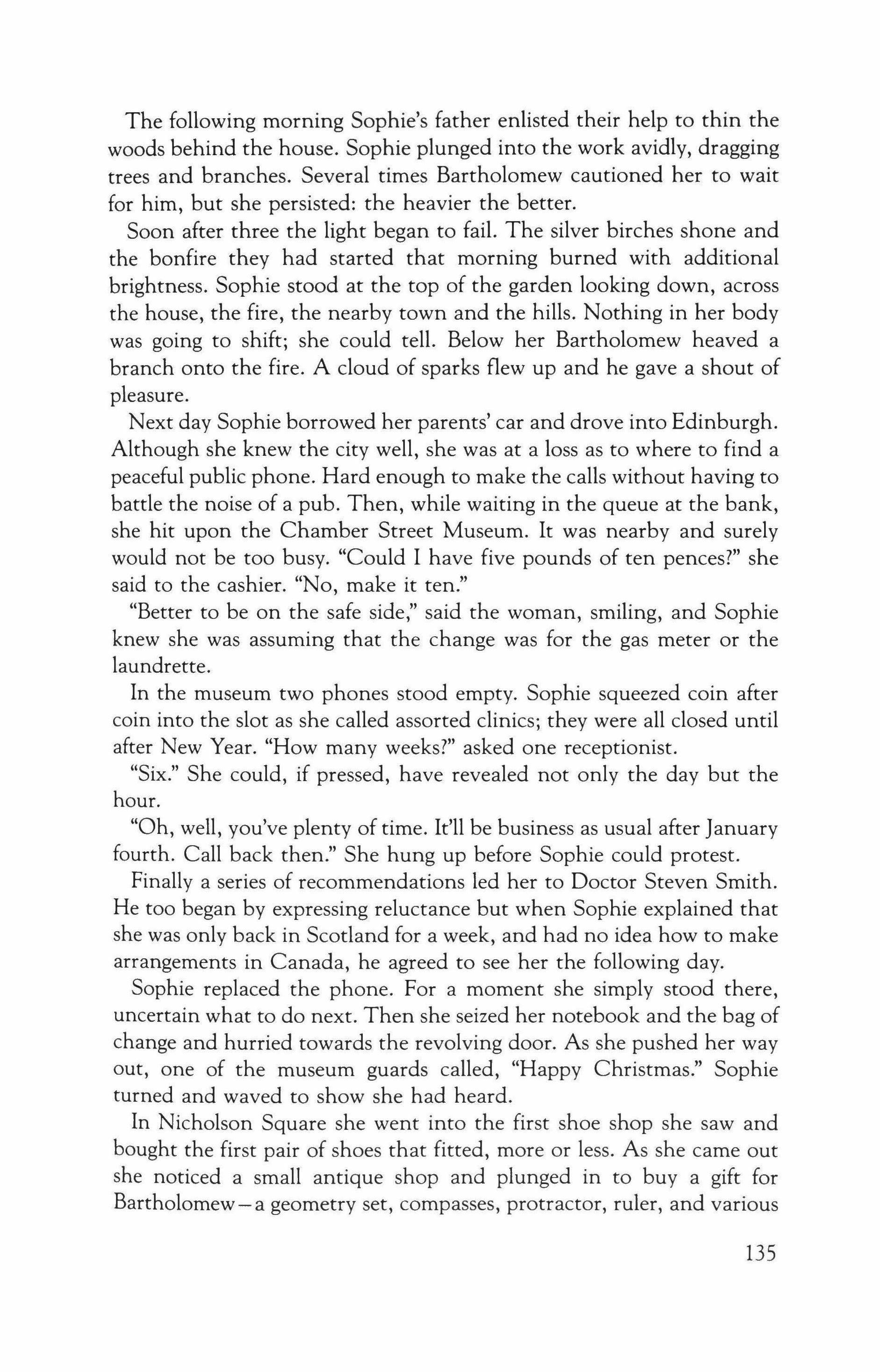
The following morning Sophie's father enlisted their help to thin the woods behind the house. Sophie plunged into the work avidly, dragging trees and branches. Several times Bartholomew cautioned her to wait for him, but she persisted: the heavier the better.
Soon after three the light began to fail. The silver birches shone and the bonfire they had started that morning burned with additional brightness. Sophie stood at the top of the garden looking down, across the house, the fire, the nearby town and the hills. Nothing in her body was going to shift; she could tell. Below her Bartholomew heaved a branch onto the fire. A cloud of sparks flew up and he gave a shout of pleasure.
Next day Sophie borrowed her parents' car and drove into Edinburgh. Although she knew the city well, she was at a loss as to where to find a peaceful public phone. Hard enough to make the calls without having to battle the noise of a pub. Then, while waiting in the queue at the bank, she hit upon the Chamber Street Museum. It was nearby and surely would not be too busy. "Could I have five pounds of ten pences?" she said to the cashier. "No, make it ten."
"Better to be on the safe side," said the woman, smiling, and Sophie knew she was assuming that the change was for the gas meter or the laundrette.
In the museum two phones stood empty. Sophie squeezed coin after coin into the slot as she called assorted clinics; they were all closed until after New Year. "How many weeks?" asked one receptionist.
"Six." She could, if pressed, have revealed not only the day but the hour.
"Oh, well, you've plenty of time. It'll be business as usual after January fourth. Call back then." She hung up before Sophie could protest. Finally a series of recommendations led her to Doctor Steven Smith. He too began by expressing reluctance but when Sophie explained that she was only back in Scotland for a week, and had no idea how to make arrangements in Canada, he agreed to see her the following day.
Sophie replaced the phone. For a moment she simply stood there, uncertain what to do next. Then she seized her notebook and the bag of change and hurried towards the revolving door. As she pushed her way out, one of the museum guards called, "Happy Christmas." Sophie turned and waved to show she had heard.
In Nicholson Square she went into the first shoe shop she saw and bought the first pair of shoes that fitted, more or less. As she came out she noticed a small antique shop and plunged in to buy a gift for Bartholomew-a geometry set, compasses, protractor, ruler, and various
135
instruments in a small wooden case. Only on her way back to the car did it occur to Sophie that the last thing she wanted Bartholomew to do was measure.

A high point of their trip the previous summer had been the visit to the tomb at Tarquinii. According to the guidebook Tarquinii had been an important Etruscan city, a center for art and commerce. The present village, however, consisted of a few dozen houses. They located the caretaker's house on the edge of the olive groves without difficulty. A woman in an apron opened the door. What did they want? she asked.
Bartholomew and Sophie repeated in careful phrases that they had come to visit the tomb of hunting and fishing. Last spring when they had taken Italian lessons their teacher's most frequent comment had been "Excellent." Now the woman disappeared and returned with a small cheese.
Bartholomew shook his head. "Tomba," he repeated and pointed at the ground.
"Ah," said the woman. Her husband was away. He would be back soon. She eased the door shut in gentle dismissal.
They sat under an olive tree beside their car, talking about where to have lunch and whether there might be a place to swim nearby. Bartholomew was unfolding the map when a voice cried, "Buon giorno."
A plump man in shirt-sleeves was pushing a bicycle towards them. He rested the bicycle against the olive tree and shook both their hands. "You want to see the tomb," he said in English.
"Yes, please," said Bartholomew. "The Etruscan tomb."
The man nodded. He seemed pleased. "I am the guardian. Wait here while I get a light." He picked up his bicycle and headed towards the house.
Bartholomew turned to Sophie with a smile. "The question is did he mean before or after the siesta."
But the man was back in a few minutes carrying a large key and a torch. He held up the torch and named it. "You speak good English," Bartholomew said. "Have you been there?"
"Tunbridge Wells. Nineteen forty-three to forty-five. I met some nice people, very nice. I always planned to go back for a holiday but we go to Sicily instead. My wife has cousins there."
He led them down the road to a grassy hummock which they had passed without noticing. In the side of the hummock was an iron door,
* * *
136
with a small notice: "Tomba." He opened the door. A set of steps led down into the earth. "I go first," said the guardian. "Be careful."
Bartholomew followed, then Sophie. The shock of entering the tomb was immediate. The air was cold and slightly damp. Sophie kept one hand on the wall. For the first few steps the light reached through the doorway, then there was only the glow of the guardian's torch.
"Here we are," he said. "Close your eyes."
Sophie tried to forget about the dark soil above her and did as she was told.
"Now open them."
She found herself looking at the sea. The water was a deep and tranquil blue. A troop of dolphins swam alongside a small boat in which sat two fishermen. Schools of brightly colored fishes ignored their lines.
Underground the guardian shed his affability. He moved the torch steadily around the tomb, ignoring Sophie and Bartholomew's cries of pleasure and amazement. There was a man aiming his sling at some flying ducks. Another man diving into a pool of water. Sophie was marveling at his grace when the guardian switched off the torch. "Enough," he said.
"Oh, please," said Sophie.
"Can we see it a little longer?" asked Bartholomew.
"Time is money," said the guardian.
They agreed on two thousand lire. The light came on again and began its circling motion, even faster than before. In a matter of minutes the guardian once more declared enough. He ushered them up the stairs and out into the sunlight. They left him locking the door of the tomb.
As they walked back to the car, Bartholomew remarked that he must have been a pow. "Why else would an Italian man pay an extended visit to Tunbridge Wells during the Second World War? Maybe that's why he's so curmudgeonly. He's getting his revenge by keeping the tomb to himself."
Sophie nodded and blinked. She could not have explained the emotion that gripped her. She wanted a torch of her own and time, time to go back and forth from the sunlight into that mysterious darkness.

Sophie had met Bartholomew when he attended Edinburgh University for his year abroad. He and Sophie's boyfriend, Michael, shared a passion for mountaineering and had gone on several expeditions together. For the next half dozen years, long after Sophie had lost touch with
* * *
137

Michael, Bartholomew had sent Christmas cards with photographs showing his increasing family: first a wife, then two daughters. The summer after he and his wife separated he came back to Scotland and rented a cottage on the Isle of Skye; he planned to do some climbing in the Cullins. Sophie went up to spend a weekend with him. They barely glimpsed the mountains through the rain.
A month later Sophie went to Toronto to visit Bartholomew, and the following spring they married in order for Sophie to become a Canadian citizen. Bartholomew was a member of a firm of architects and looked set to become a partner in the next few years. Sophie, with a degree in English, worked in a bookshop. It was run by Miss Harris, a pleasant, reserved woman, who appreciated Sophie's accent and taste in books.
In the summer the Polish restaurant next door to the bookshop was taken over. The first Sophie knew about it was when she went in for her usual late lunch and found that borscht had been replaced by vichyssoise. "You'll like it," the woman behind the counter said confidently. Sophie carried the soup to a table by the window and took out her book. She had almost finished eating when a voice said, "So, how was it?" She looked up to see the woman standing beside her. Sophie pronounced the soup delicious. They introduced themselves; the woman's name was Anne. "What are you reading?" she asked.
"A biography of Auden."
"Oh," said Anne, "I always think biographies are so sad. Even when things are going well, you know there won't be a happy ending."
Another customer came in and Anne retreated to the counter. Sophie stood up to leave. As she gathered her things together, she thought how Scottish Anne looked with her reddish brown hair and pale freckled skin. Later she was gratified to learn that her mother came from Inverness.
Anne was a sculptor and Stewart, whom Sophie met the following day, was a drummer. They had bought the restaurant in order to make money for their real work. "I want to start a band and a recording studio," said Stewart. "And Anne works in metal. She needs all these blowtorches."
"He means welding equipment," said Anne. "I already have that but you can't do large pieces without assistants. They're what cost the money."
Sophie was so engrossed in their plans that she was late getting back to the bookshop. When Miss Harris raised her eyebrows, she said she had run into some friends. From then on she saw Anne and Stewart almost every day either at the restaurant or at the shop. Anne, wearing her
138
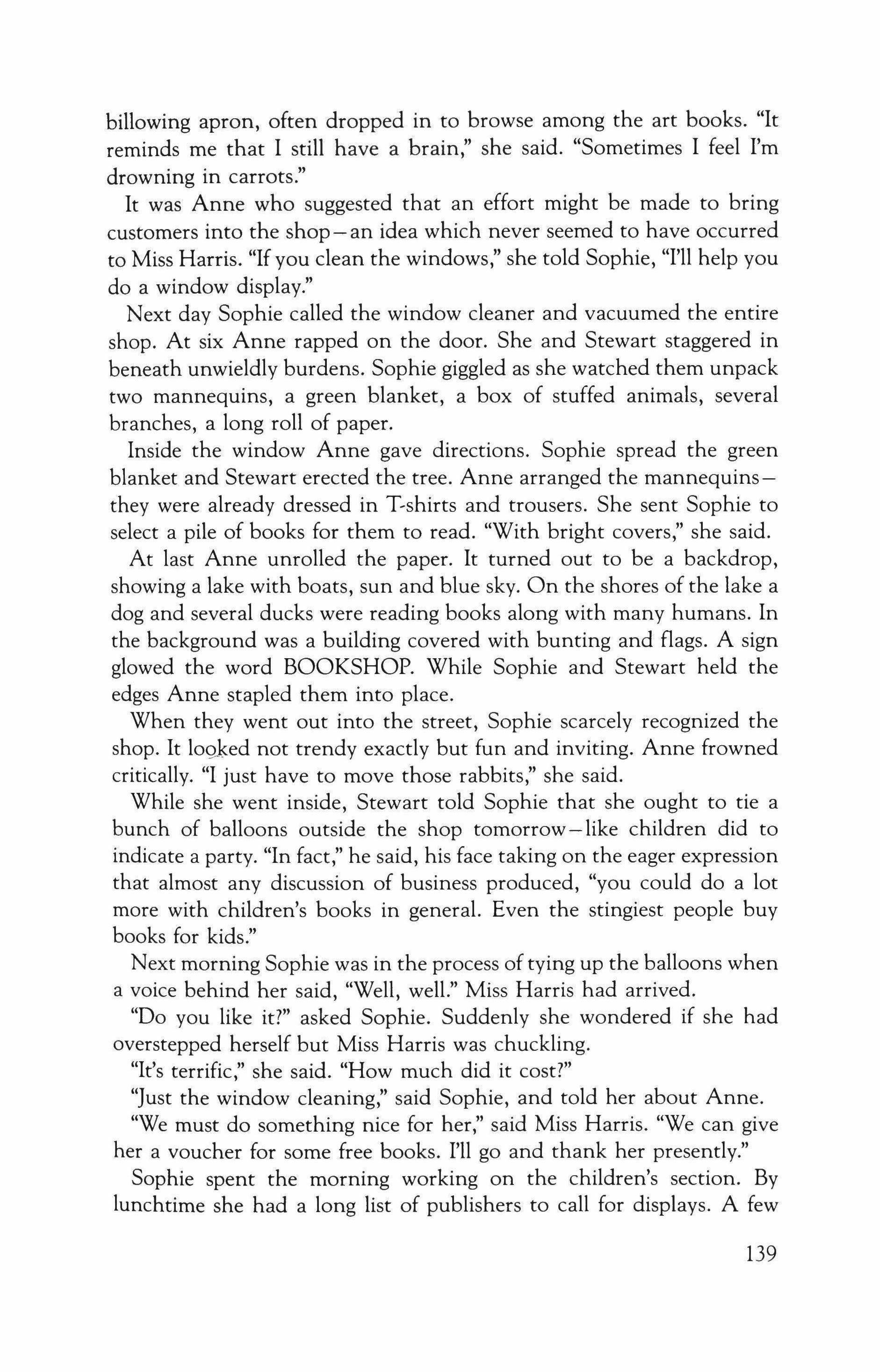
billowing apron, often dropped in to browse among the art books. "It reminds me that I still have a brain," she said. "Sometimes I feel I'm drowning in carrots."
It was Anne who suggested that an effort might be made to bring customers into the shop - an idea which never seemed to have occurred to Miss Harris. "If you clean the windows," she told Sophie, "I'll help you do a window display."
Next day Sophie called the window cleaner and vacuumed the entire shop. At six Anne rapped on the door. She and Stewart staggered in beneath unwieldly burdens. Sophie giggled as she watched them unpack two mannequins, a green blanket, a box of stuffed animals, several branches, a long roll of paper.
Inside the window Anne gave directions. Sophie spread the green blanket and Stewart erected the tree. Anne arranged the mannequinsthey were already dressed in Tshirts and trousers. She sent Sophie to select a pile of books for them to read. "With bright covers," she said.
At last Anne unrolled the paper. It turned out to be a backdrop, showing a lake with boats, sun and blue sky. On the shores of the lake a dog and several ducks were reading books along with many humans. In the background was a building covered with bunting and flags. A sign glowed the word BOOKSHOP. While Sophie and Stewart held the edges Anne stapled them into place.
When they went out into the street, Sophie scarcely recognized the shop. It looked not trendy exactly but fun and inviting. Anne frowned critically. "I just have to move those rabbits," she said.
While she went inside, Stewart told Sophie that she ought to tie a bunch of balloons outside the shop tomorrow -like children did to indicate a party. "In fact," he said, his face taking on the eager expression that almost any discussion of business produced, "you could do a lot more with children's books in general. Even the stingiest people buy books for kids."
Next morning Sophie was in the process of tying up the balloons when a voice behind her said, "Well, well." Miss Harris had arrived.
"Do you like it?" asked Sophie. Suddenly she wondered if she had overstepped herself but Miss Harris was chuckling.
"It's terrific," she said. "How much did it cost?"
"Just the window cleaning," said Sophie, and told her about Anne. "We must do something nice for her," said Miss Harris. "We can give her a voucher for some free books. I'll go and thank her presently."
Sophie spent the morning working on the children's section. By lunchtime she had a long list of publishers to call for displays. A few
139
days later with Miss Harris's agreement she purchased a set of children's furniture.

It was a chain reaction. You could not have an operation without an appointment; you could not have an appointment without a positive test. That was what Doctor Steven Smith explained to Sophie as she climbed onto the narrow examination table.
"I know I'm pregnant," Sophie said. "I can feel it." Normally she would have been disconcerted by the fact that the doctor was young and goodlooking but now all that mattered was to convince him.
"I'm sure you're right. Look here, and here." He pointed out the swelling of her breasts and the blueness of the veins.
When Sophie described what she considered her unique situation, Doctor Smith shrugged. "I see several women a month whose husbands have had vasectomies:' he said. He agreed to schedule an operation, but he would have to cancel it if she did not have the test result in time. Sophie had the result and in the morning darkness a taxi took her to the hospital. She told Bartholomew it was a minor operation, something to do with polyps.
Later she remembered three moments from that long day. The stern woman doctor who went through the consent form listing dire possibilities; her name was Calderone. The nurses joking with her as the anesthesiologist searched for a vein in her arm. And then, almost as soon as she came round, getting up to go to the bathroom. She had to recover quickly in order to appear normal for Bartholomew. But in the small, white room she had been overwhelmed by a loneliness so acute she had thought she would never know anything else.
The following day she and Bartholomew took the train to London and made their way to Heathrow. There had been a bomb scare the week before and security was ferocious. The guard who searched their luggage questioned Bartholomew about the geometry set.
"It was a gift," said Bartholomew.
"A gift?" said the guard, testing the points of the compasses.
"I'm an architect," said Bartholomew.
"Oh," said the guard. "What do you think of the Pompidou Center?"
On the plane Sophie was too tired even to read. She had got away with it, she thought. She had saved her relationship with Bartholomew; now all she needed to do was to forget. But when she closed her eyes she
* * *
140
found herself remembering with disturbing clarity the set of weights at the end of Irwin's bed and the bedspread patterned in leopard spots.
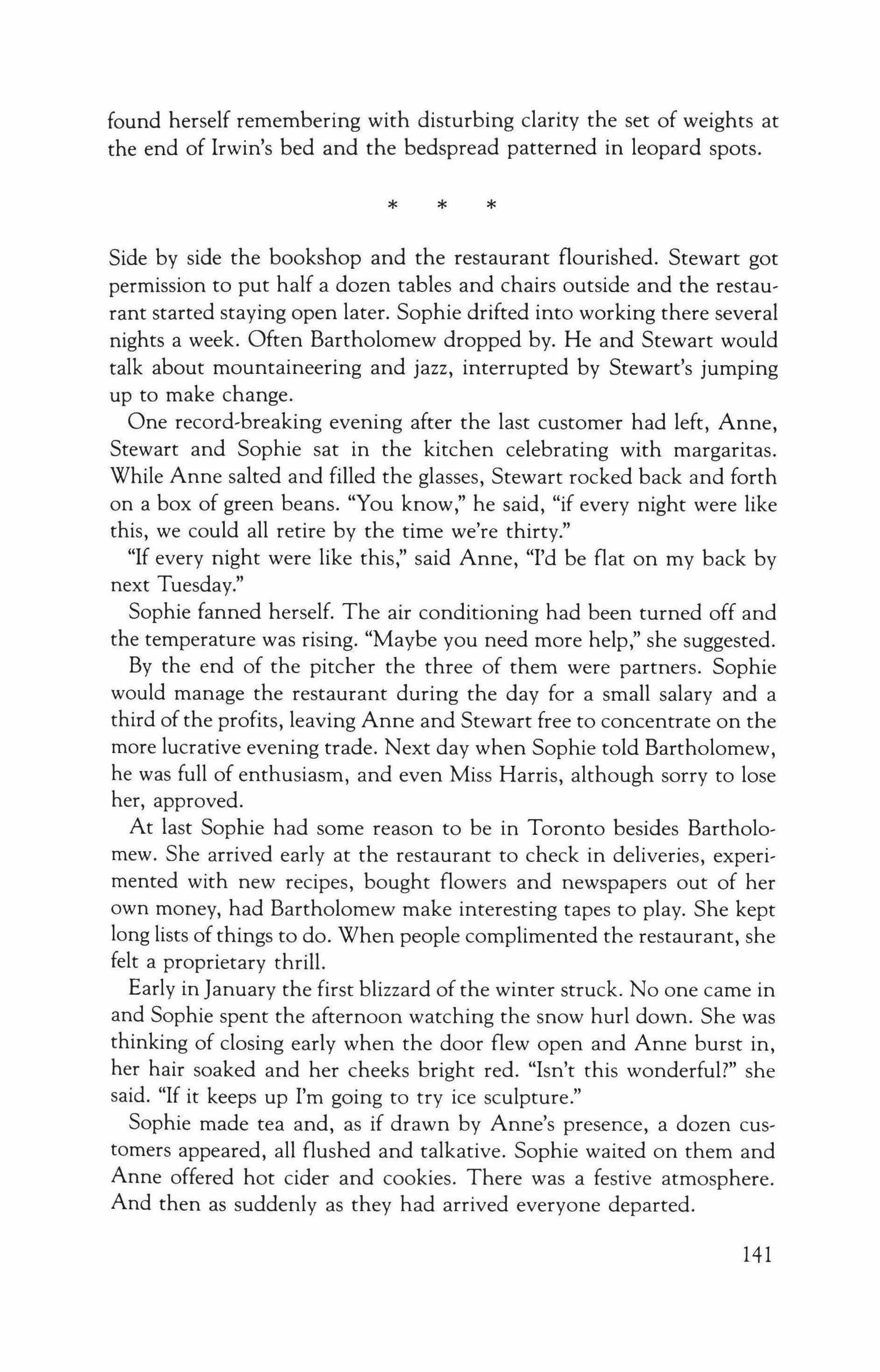
Side by side the bookshop and the restaurant flourished. Stewart got permission to put half a dozen tables and chairs outside and the restaurant started staying open later. Sophie drifted into working there several nights a week. Often Bartholomew dropped by. He and Stewart would talk about mountaineering and jazz, interrupted by Stewart's jumping up to make change.
One record-breaking evening after the last customer had left, Anne, Stewart and Sophie sat in the kitchen celebrating with margaritas. While Anne salted and filled the glasses, Stewart rocked back and forth on a box of green beans. "You know," he said, "if every night were like this, we could all retire by the time we're thirty."
"If every night were like this," said Anne, "I'd be flat on my back by next Tuesday."
Sophie fanned herself. The air conditioning had been turned off and the temperature was rising. "Maybe you need more help," she suggested. By the end of the pitcher the three of them were partners. Sophie would manage the restaurant during the day for a small salary and a third of the profits, leaving Anne and Stewart free to concentrate on the more lucrative evening trade. Next day when Sophie told Bartholomew, he was full of enthusiasm, and even Miss Harris, although sorry to lose her, approved.
At last Sophie had some reason to be in Toronto besides Bartholomew. She arrived early at the restaurant to check in deliveries, experimented with new recipes, bought flowers and newspapers out of her own money, had Bartholomew make interesting tapes to play. She kept long lists of things to do. When people complimented the restaurant, she felt a proprietary thrill.
Early in January the first blizzard of the winter struck. No one came in and Sophie spent the afternoon watching the snow hurl down. She was thinking of closing early when the door flew open and Anne burst in, her hair soaked and her cheeks bright red. "Isn't this wonderful?" she said. "If it keeps up I'm going to try ice sculpture."
Sophie made tea and, as if drawn by Anne's presence, a dozen customers appeared, all flushed and talkative. Sophie waited on them and Anne offered hot cider and cookies. There was a festive atmosphere. And then as suddenly as they had arrived everyone departed.
* * *
141

Sophie closed the door behind the last customer and turned to survey the room. It was filled with dirty tables, each ringed with muddy footprints. "I hate winter," she said.
Anne looked up from scrubbing the counter. "Stewart told me that from now until the summer solstice each day is a minute longer. Doesn't that make you feel better?"
"Yes," said Sophie. It did.
The days did grow longer and, almost as remorselessly, the partnership began to sour. While chopping vegetables and scrubbing pots, Sophie had plenty of time to ponder that she was earning roughly half what she used to. By early June she had decided to get another, higherpaying job. She would continue to manage the restaurant, dropping in for an hour or two each day but someone else would do the menial work.
When she announced this at their weekly meeting, Anne frowned. "You can't just stop working here:' she said.
Stewart agreed. "It's stupid to say you're losing money. At the end of two years, barring major disasters, you'll have a guaranteed profit."
Sophie explained again her present loss of income. Stewart produced a graph showing the projected profits. She tried to interrupt him and realized she was close to tears.
In late July Sophie relinquished her share of the partnership and went to Italy for a fortnight with Bartholomew. They stayed in San Gimignano and visited Etruscan remains. On their return to Toronto she took a job in another bookshop, and it seemed as if everything could be forgotten. She was surely no worse off than she had been before. But she found herself brooding. Anne and Stewart had enlarged her sense of possibilities, and the life which had previously been adequate now seemed shrunken and impoverished.
During this time Irwin started coming to the bookshop. He was bright-eyed and voluble and made clear that he found her attractive. As a salesgirl, she was at his mercy to be courted. And the courtship made Sophie feel faintly better in a way that all Bartholomew's patient kindness had failed to do.
Then one day Bartholomew came home and said that Lorraine was in love with him. Lorraine was a tall, graceful woman from Liverpool who worked part-time as a receptionist at Bartholomew's architectural firm.
"Oh," said Sophie carefully. "And how do you feel about her?"
"I like her but I can't imagine falling in love with her. I'm in love with you.
Ostensibly it was the perfect answer and yet Sophie was upset. She
142
was jealous of Lorraine-somehow it made matters worse that she too was British- and jealous of Bartholomew. In her head she listed his accomplishments: a successful career, two daughters who lived with his first wife in Vancouver, friends, a house, and now Lorraine. The sense of her own failure deepened.
In November Bartholomew went to Windsor for two days to look at a new site and Sophie at last agreed to go out with Irwin. Over dinner she told him about the partnership. He smiled. "What an innocent you are, Sophie. They just wanted cheap, intelligent labor."
Later that evening she had gone back to his apartment.
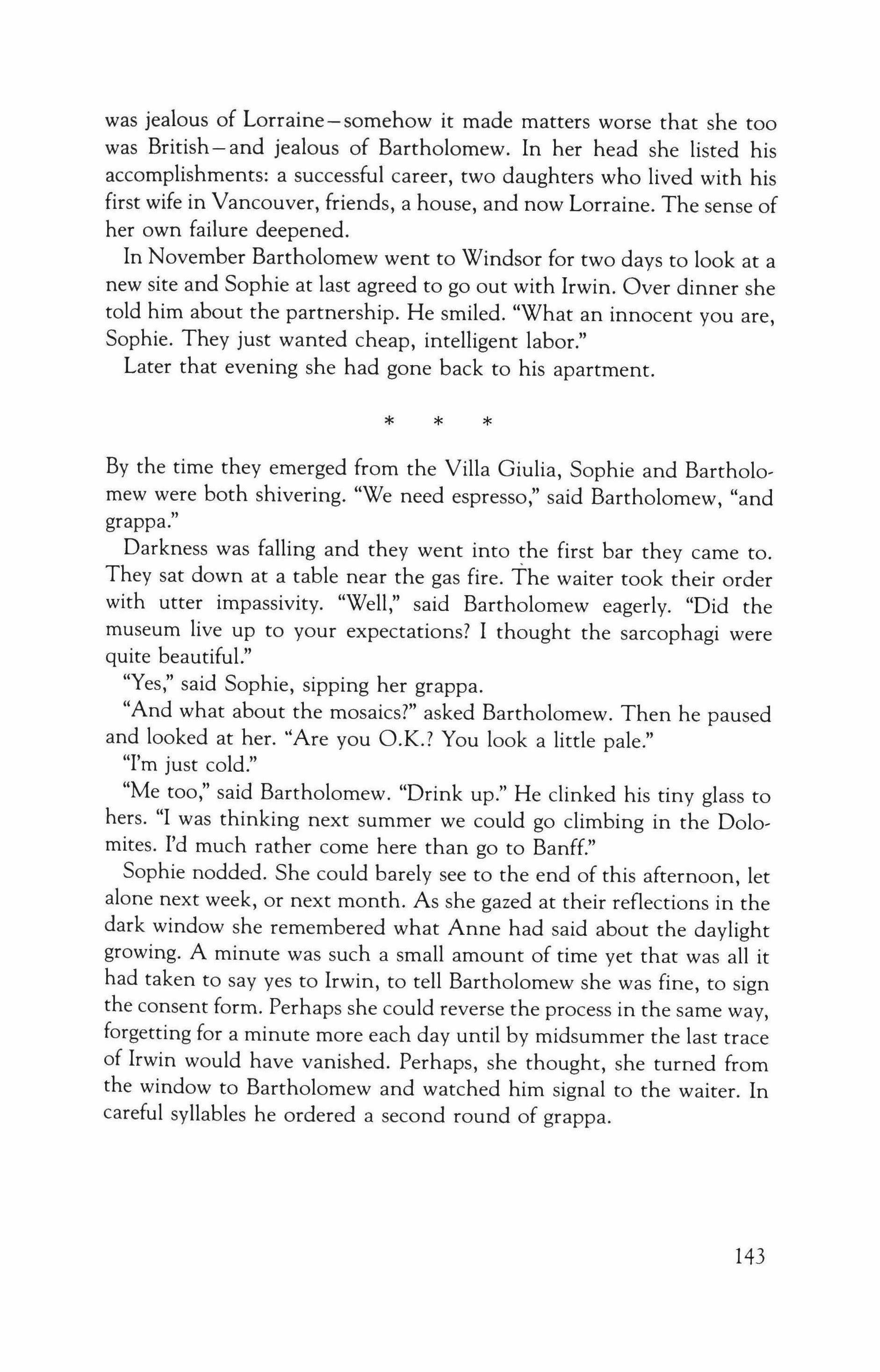
By the time they emerged from the Villa Giulia, Sophie and Bartholomew were both shivering. "We need espresso," said Bartholomew, "and grappa."
Darkness was falling and they went into the first bar they came to. They sat down at a table near the gas fire. The waiter took their order with utter impassivity. "Well," said Bartholomew eagerly. "Did the museum live up to your expectations? I thought the sarcophagi were quite beautiful."
"Yes," said Sophie, sipping her grappa.
"And what about the mosaics?" asked Bartholomew. Then he paused and looked at her. "Are you O.K.? You look a little pale."
"I'm just cold."
"Me too," said Bartholomew. "Drink up." He clinked his tiny glass to hers. "I was thinking next summer we could go climbing in the Dolomites. I'd much rather come here than go to Banff."
Sophie nodded. She could barely see to the end of this afternoon, let alone next week, or next month. As she gazed at their reflections in the dark window she remembered what Anne had said about the daylight growing. A minute was such a small amount of time yet that was all it had taken to say yes to Irwin, to tell Bartholomew she was fine, to sign the consent form. Perhaps she could reverse the process in the same way, forgetting for a minute more each day until by midsummer the last trace of Irwin would have vanished. Perhaps, she thought, she turned from the window to Bartholomew and watched him signal to the waiter. In careful syllables he ordered a second round of grappa.
* * *
143
The Lawn Bowlers
Josephine Jacobsen
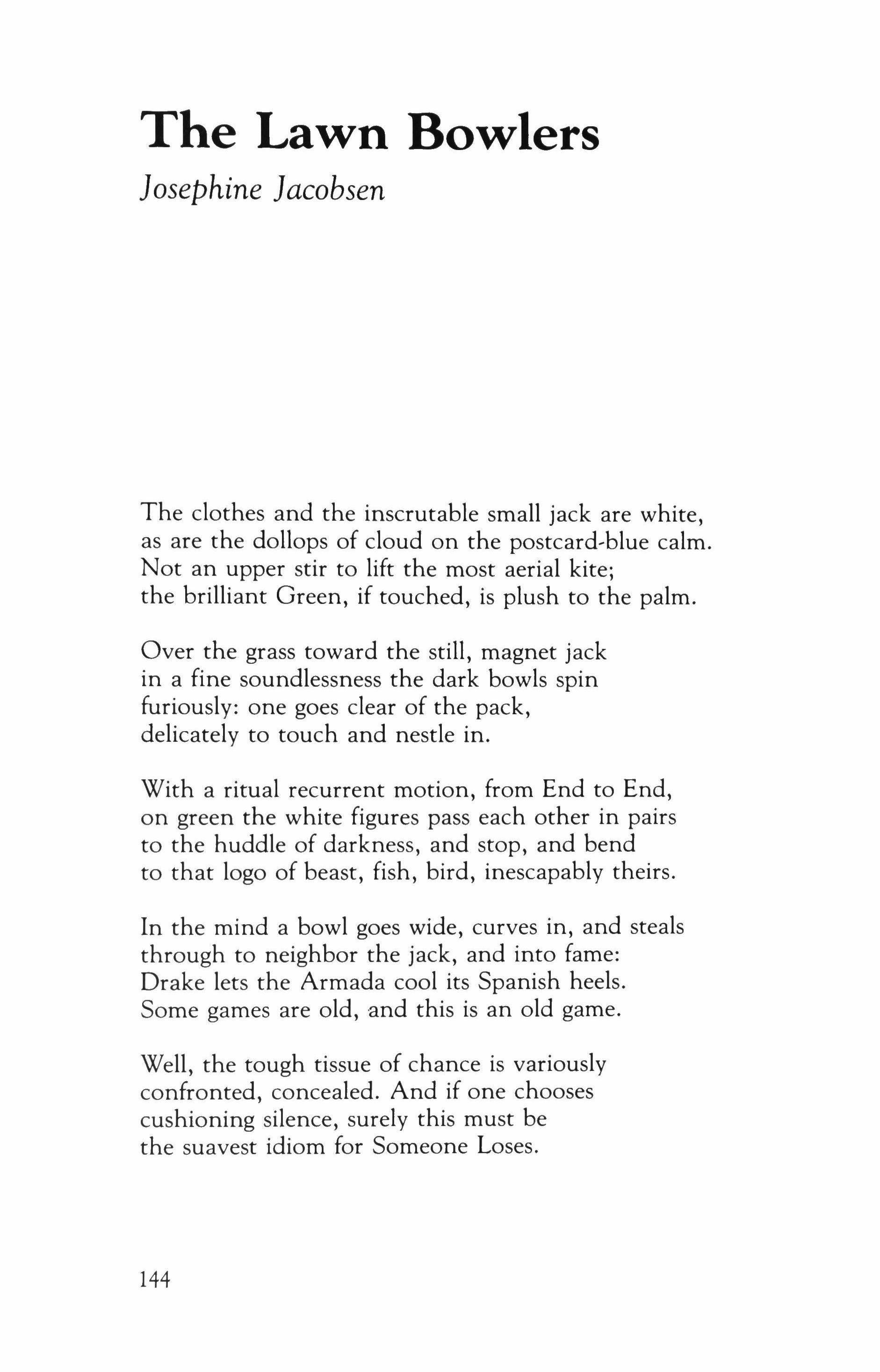
The clothes and the inscrutable small jack are white, as are the dollops of cloud on the postcard-blue calm. Not an upper stir to lift the most aerial kite; the brilliant Green, if touched, is plush to the palm.
Over the grass toward the still, magnet jack in a fine soundlessness the dark bowls spin furiously: one goes clear of the pack, delicately to touch and nestle in.
With a ritual recurrent motion, from End to End, on green the white figures pass each other in pairs to the huddle of darkness, and stop, and bend to that logo of beast, fish, bird, inescapably theirs.
In the mind a bowl goes wide, curves in, and steals through to neighbor the jack, and into fame: Drake lets the Armada cool its Spanish heels. Some games are old, and this is an old game.
Well, the tough tissue of chance is variously confronted, concealed. And if one chooses cushioning silence, surely this must be the suavest idiom for Someone Loses.
144
Two Poems
Brooks Haxton
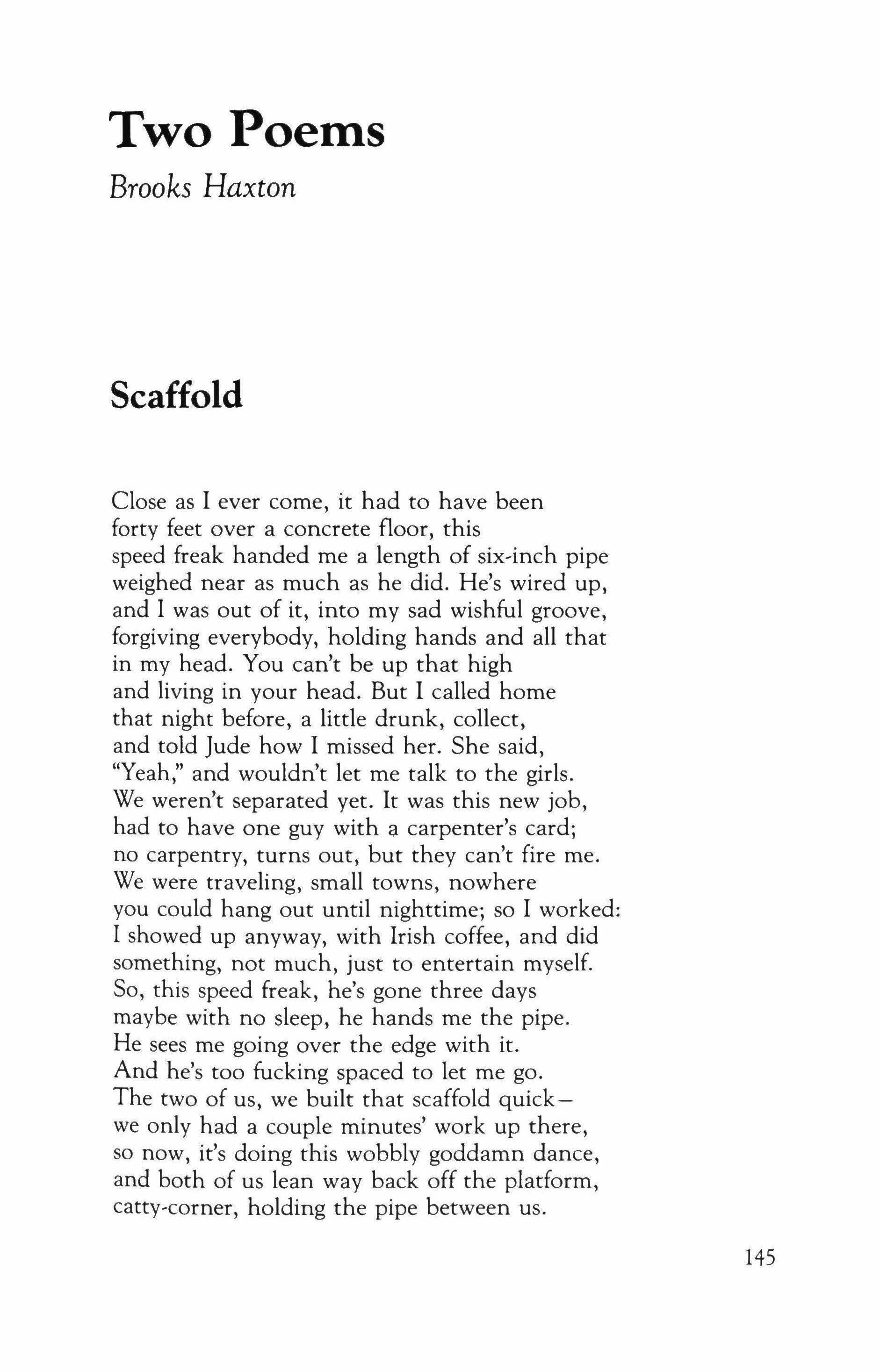
Scaffold
Close as I ever come, it had to have been forty feet over a concrete floor, this speed freak handed me a length of six-inch pipe weighed near as much as he did. He's wired up, and I was out of it, into my sad wishful groove, forgiving everybody, holding hands and all that in my head. You can't be up that high and living in your head. But I called home that night before, a little drunk, collect, and told Jude how I missed her. She said, "Yeah," and wouldn't let me talk to the girls. We weren't separated yet. It was this new job, had to have one guy with a carpenter's card; no carpentry, turns out, but they can't fire me. We were traveling, small towns, nowhere you could hang out until nighttime; so I worked: I showed up anyway, with Irish coffee, and did something, not much, just to entertain myself. So, this speed freak, he's gone three days maybe with no sleep, he hands me the pipe. He sees me going over the edge with it. And he's too fucking spaced to let me go. The two of us, we built that scaffold quickwe only had a couple minutes' work up there, so now, it's doing this wobbly goddamn dance, and both of us lean way back off the platform, catty-corner, holding the pipe between us.
145

He must be one-forty. I'm two-twenty, plus, and drunk. I looked him in the face: kind of guy, he tensed up working; he was a drinker too, he did that same thing drinking, bore down, all the time; not now though, now he's giving me a whole new look. I heaved the pipe so it fell back onto the scaffold, and it took us with it. But what gets me-even before I knew which way we'd fall-what gets me is the calm I see coming over this guy's face.
146
Crow Call

When a child who eavesdrops on the crows for secret knowledge finds a black wingfeather tricked with nits and lice and dabbles it in holy water, he may keep or lose it, but the stone that marks his body will be turned to flame. His grave will be upharrowed and left open, while the crow (under the black sheen of his vestment, under the cobweb nerves, the whitish pignut skull with its bad-tasting fruit and beakbones blacked with rhamphotheca, hidden sex, and heart like ours with four chambers}-whole crow, purpled by broad sunlight, flies into the heat spell, through subzero winter rules the farmstead, dump, dead milltown. Any bone or branch latched into the black foot is his outpost. Every sunrise rears him to cry havoc.
When a forthright child, therefore, has learned the habit of the crows, taking no thought to understand them, that child cries their very word among them laughing after his grave has been forgotten.
147
Four Poems
Edwin Rolfe (1909-54)
Not Hatred
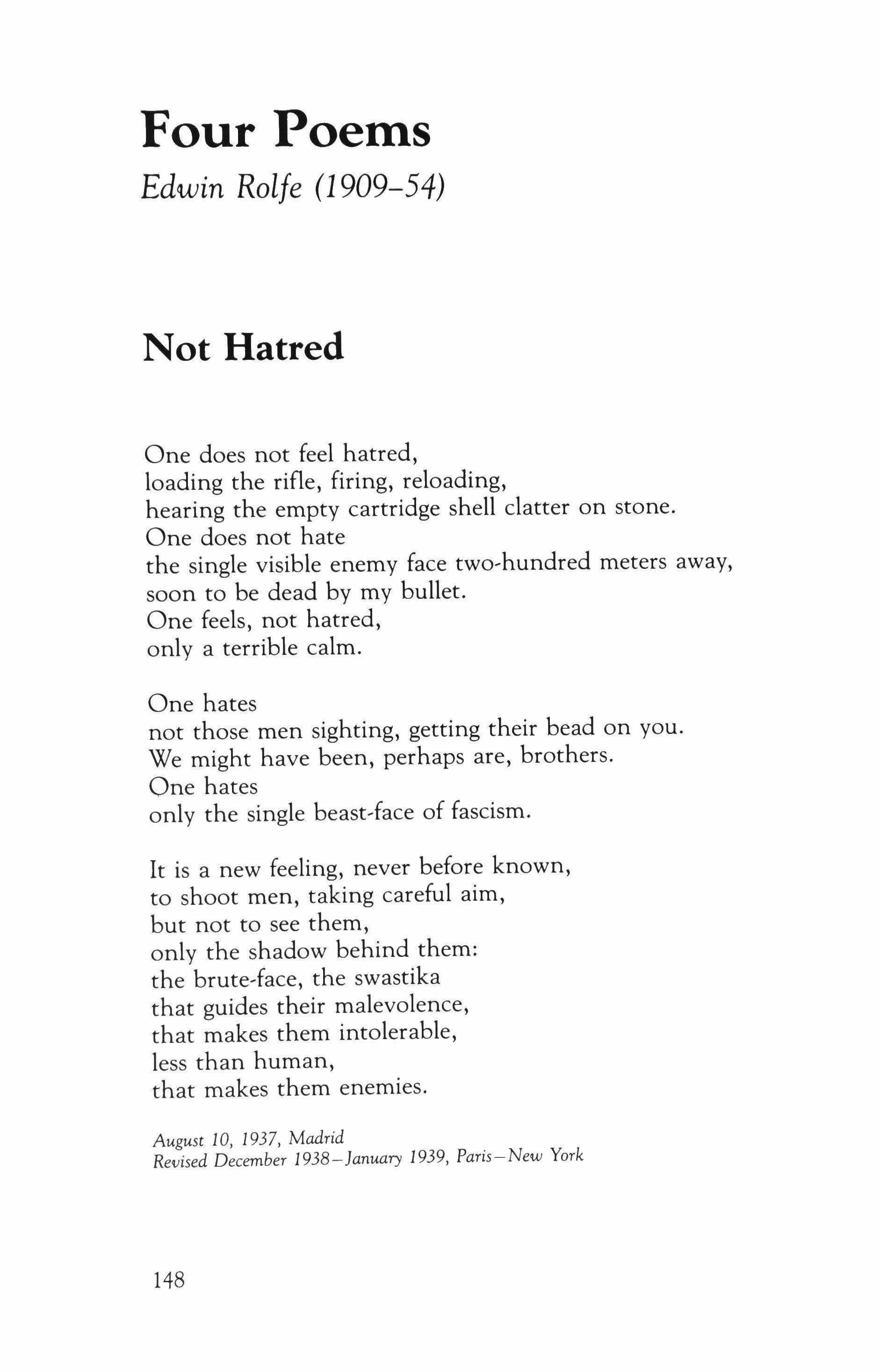
One does not feel hatred, loading the rifle, firing, reloading, hearing the empty cartridge shell clatter on stone. One does not hate the single visible enemy face two-hundred meters away, soon to be dead by my bullet. One feels, not hatred, only a terrible calm.
One hates not those men sighting, getting their bead on you. We might have been, perhaps are, brothers. One hates only the single beast-face of fascism.
It is a new feeling, never before known, to shoot men, taking careful aim, but not to see them, only the shadow behind them: the brute-face, the swastika that guides their malevolence, that makes them intolerable, less than human, that makes them enemies.
August 10, 1937, Madrid Revised December 1938-}anuary 1939, Paris-New York
148
Are You Now or Have You Ever Been
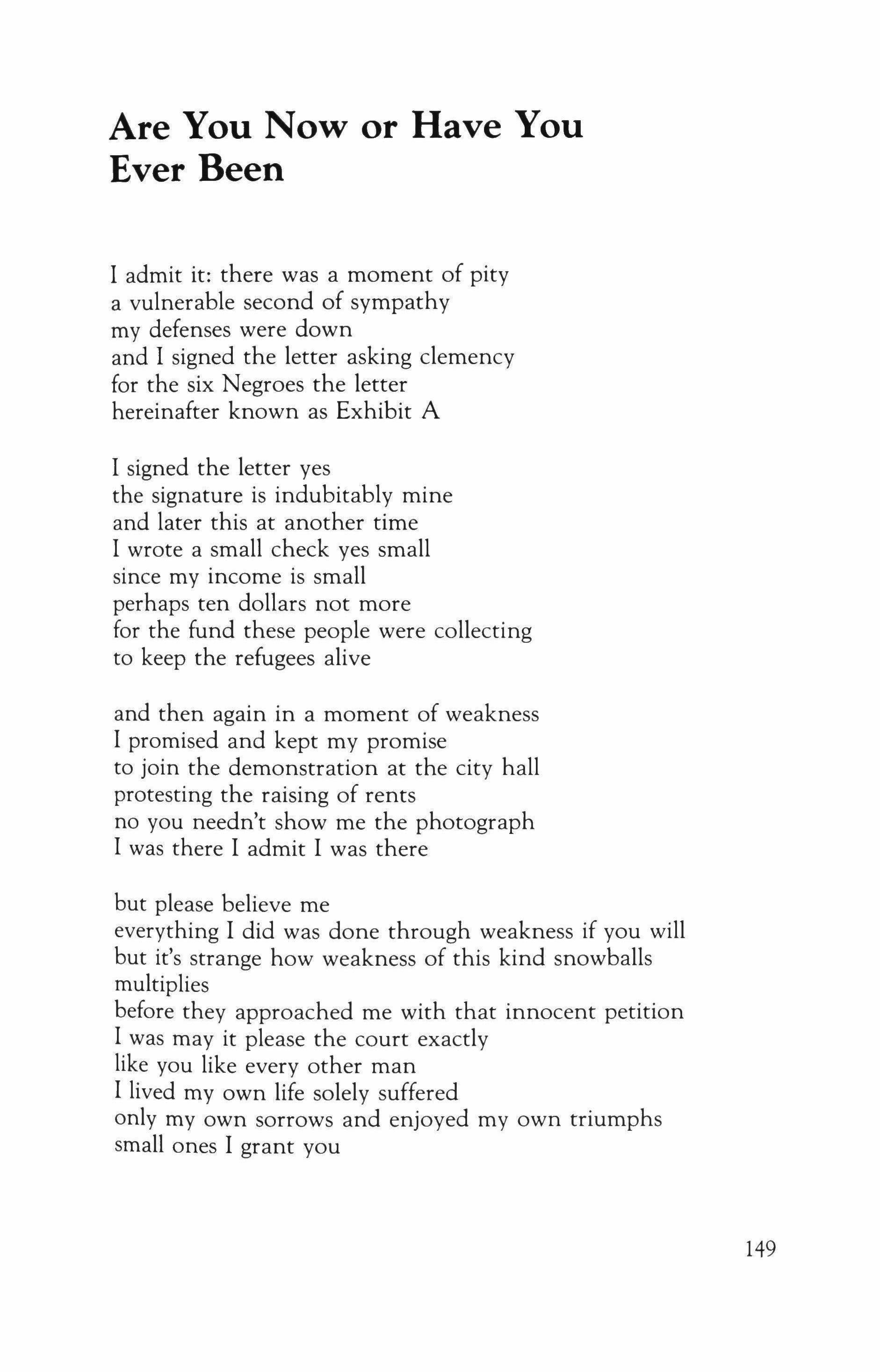
I admit it: there was a moment of pity a vulnerable second of sympathy my defenses were down and I signed the letter asking clemency for the six Negroes the letter hereinafter known as Exhibit A
I signed the letter yes the signature is indubitably mine and later this at another time I wrote a small check yes small since my income is small perhaps ten dollars not more for the fund these people were collecting to keep the refugees alive and then again in a moment of weakness I promised and kept my promise to join the demonstration at the city hall protesting the raising of rents no you needn't show me the photograph I was there I admit I was there but please believe me everything I did was done through weakness if you will but it's strange how weakness of this kind snowballs multiplies before they approached me with that innocent petition I was may it please the court exactly like you like every other man I lived my own life solely suffered only my own sorrows and enjoyed my own triumphs small ones I grant you
149

asked nothing from gave nothing to any man
except myself my wife my children
so there you have it it is all true
Exhibits A and Band C and the witnesses don't lie I wanted to help those six men stay alive I thought them innocent I honestly believed the rents were too high (no, I own no tenements) and the anguish of the refugees starving far from home moved me I admit more than it should have perhaps because I still retain a fleeting childhood picture of my great grandfather's face he too was a refugee
Written circa 1950
150
A Letter to the Denouncers
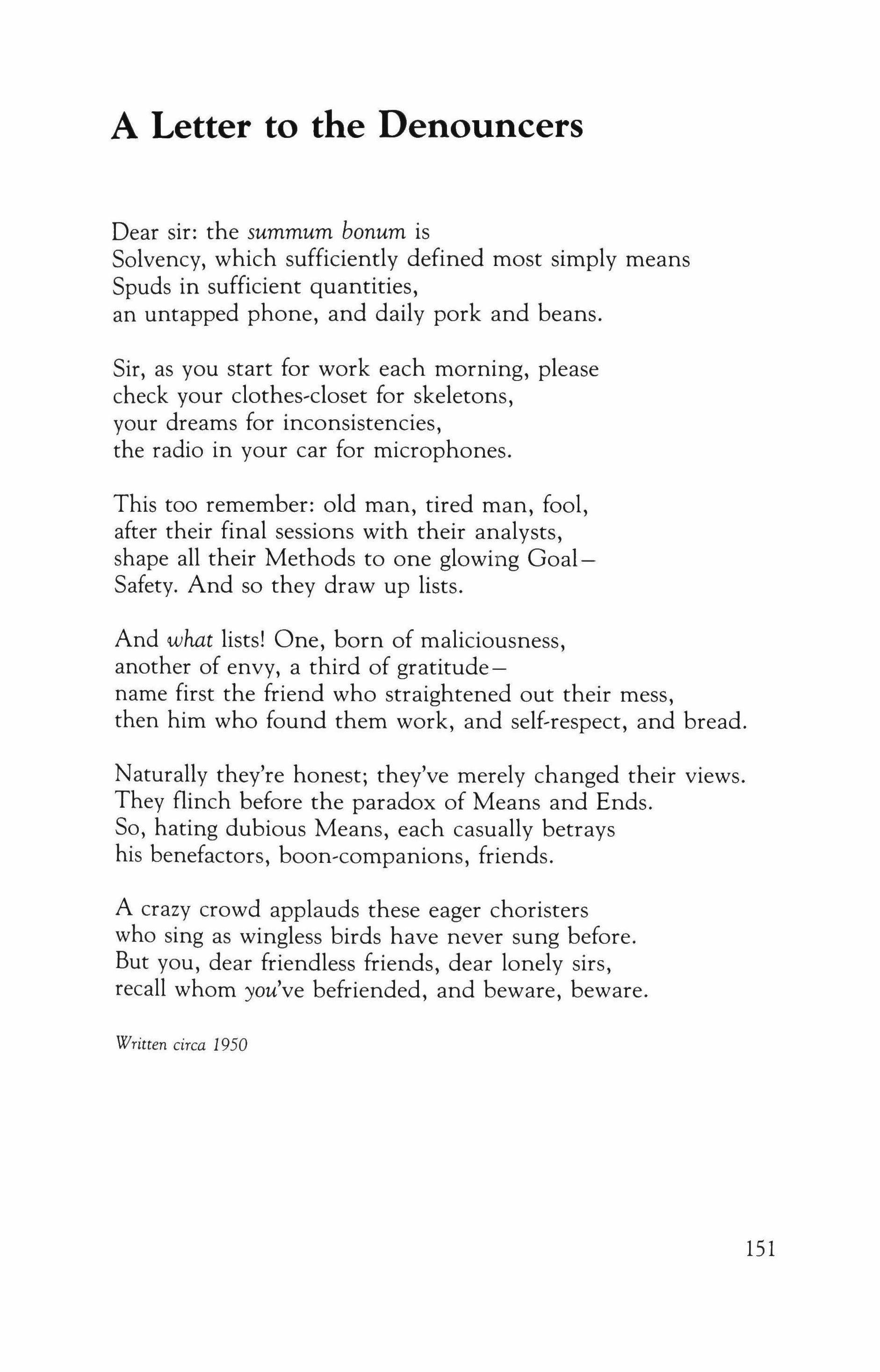
Dear sir: the summum bonum is Solvency, which sufficiently defined most simply means Spuds in sufficient quantities, an untapped phone, and daily pork and beans.
Sir, as you start for work each morning, please check your clothes-closer for skeletons, your dreams for inconsistencies, the radio in your car for microphones.
This too remember: old man, tired man, fool, after their final sessions with their analysts, shape all their Methods to one glowing GoalSafety. And so they draw up lists.
And what lists! One, born of maliciousness, another of envy, a third of gratitudename first the friend who straightened out their mess, then him who found them work, and self-respect, and bread.
Naturally they're honest; they've merely changed their views. They flinch before the paradox of Means and Ends. So, hating dubious Means, each casually betrays his benefactors, boon-companions, friends.
A crazy crowd applauds these eager choristers who sing as wingless birds have never sung before. But you, dear friendless friends, dear lonely sirs, recall whom you've befriended, and beware, beware. Written circa 1950
151
Pastoral-1954
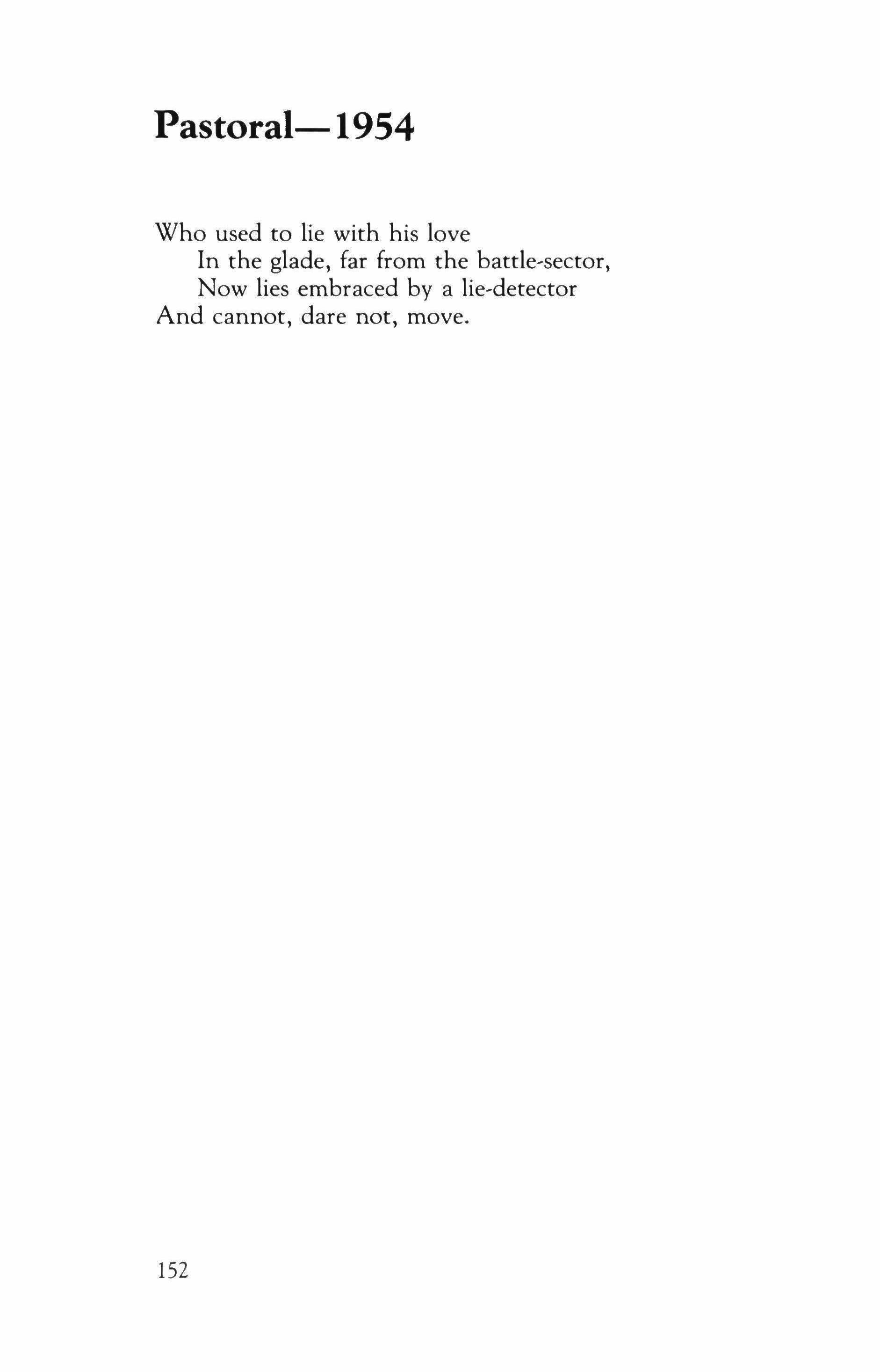
Who used to lie with his love
In the glade, far from the battle-sector, Now lies embraced by a lie-detector And cannot, dare not, move.
152
Three Poems
Sterling Plumpp

Thaba Nchu
You call me from your chair of riveting nights. A fire place by your spirit. Mountain of songs where languages gather. You call me.
Near your dark feet they hitch teams in towns; a cryptic reminder of my grandfather's Saturdays in Mississippi. His week done and meal and sugar needed for another. His week done and he gone to Bolton or Clinton till long after darkness.
Crescent beauty of your landscapes bearing rich dark bosoms. Where cassava or melon or okra or yam or bean or cabbage
153
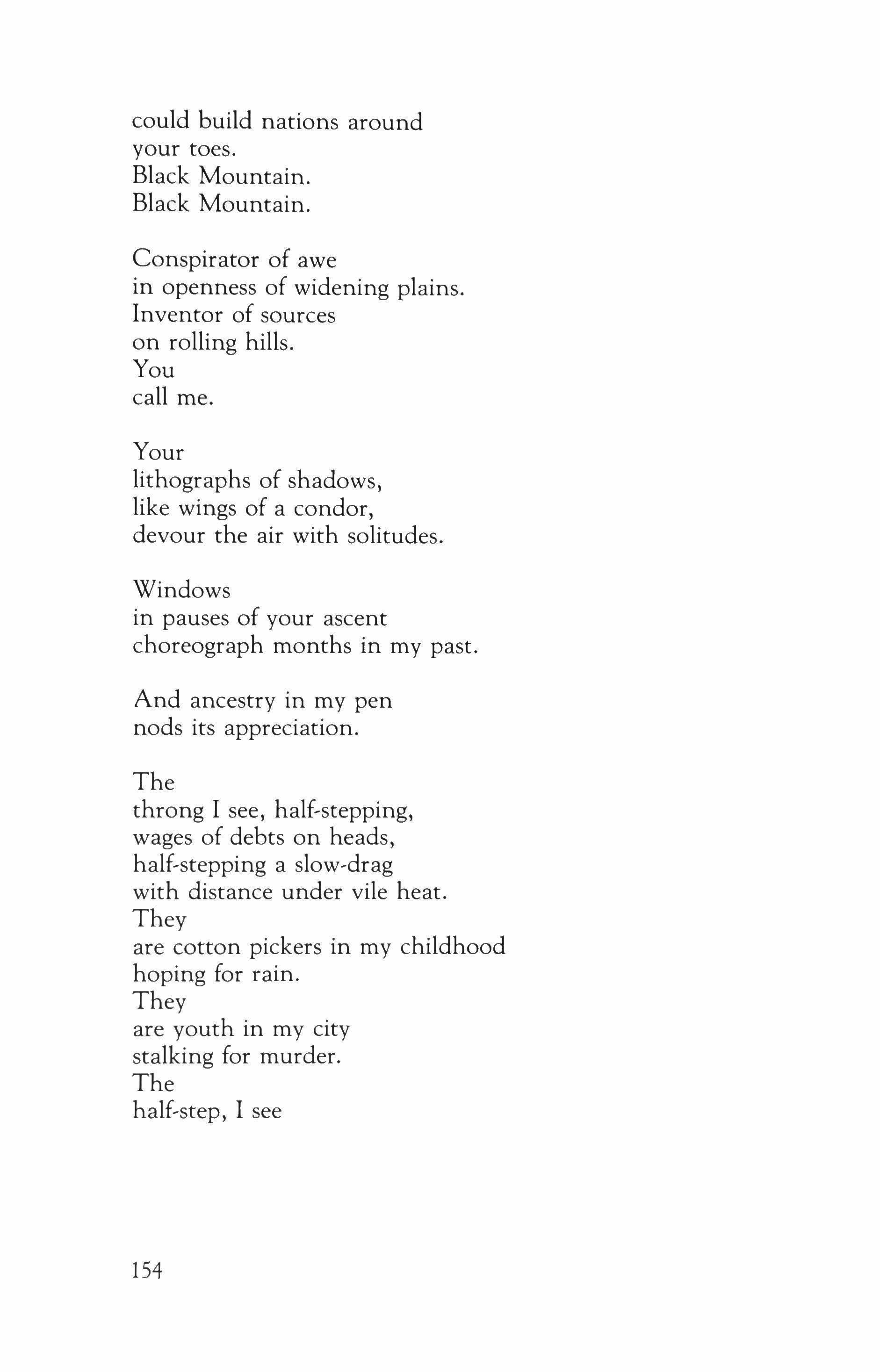
could build nations around your toes.
Black Mountain. Black Mountain.
Conspirator of awe in openness of widening plains. Inventor of sources on rolling hills. You call me.
Your lithographs of shadows, like wings of a condor, devour the air with solitudes.
Windows in pauses of your ascent choreograph months in my past. And ancestry in my pen nods its appreciation.
The throng I see, half-stepping, wages of debts on heads, half-stepping a slow-drag with distance under vile heat. They are cotton pickers in my childhood hoping for rain. They are youth in my city stalking for murder. The half-step, I see
154
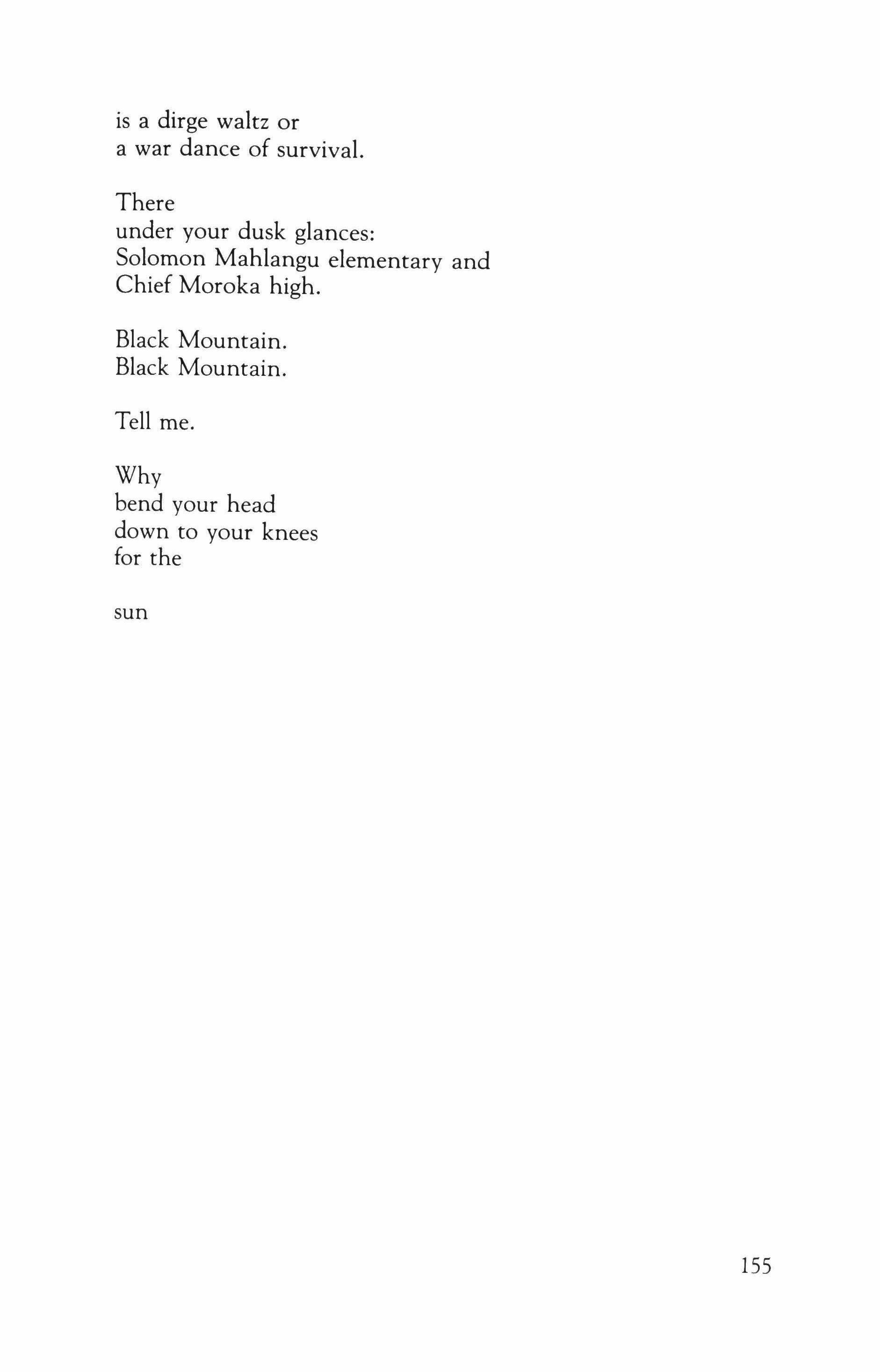
is a dirge waltz or a war dance of survival.
There under your dusk glances: Solomon Mahlangu elementary and Chief Moroka high.
Black Mountain. Black Mountain.
Tell me.
Why bend your head down to your knees for the sun
155
Orange Free State
 for Lionel Beukes
for Lionel Beukes
Rows and rows and rows.
Match box shacks. Perhaps, your shot gun is not architecture.
But, your dark faces wandering paths. Your miles and miles and miles of wealth. Reflect the Mississippi Delta with ored-veins. Your blacks huddled at the cross roads must have a Robert Johnson or Bessie Smith to moan destinies from flooded overtures.
Some how Your land scapes are familiar.
I have been here. In easy rhythms of black women, some thing balanced on their heads, a hymn
156
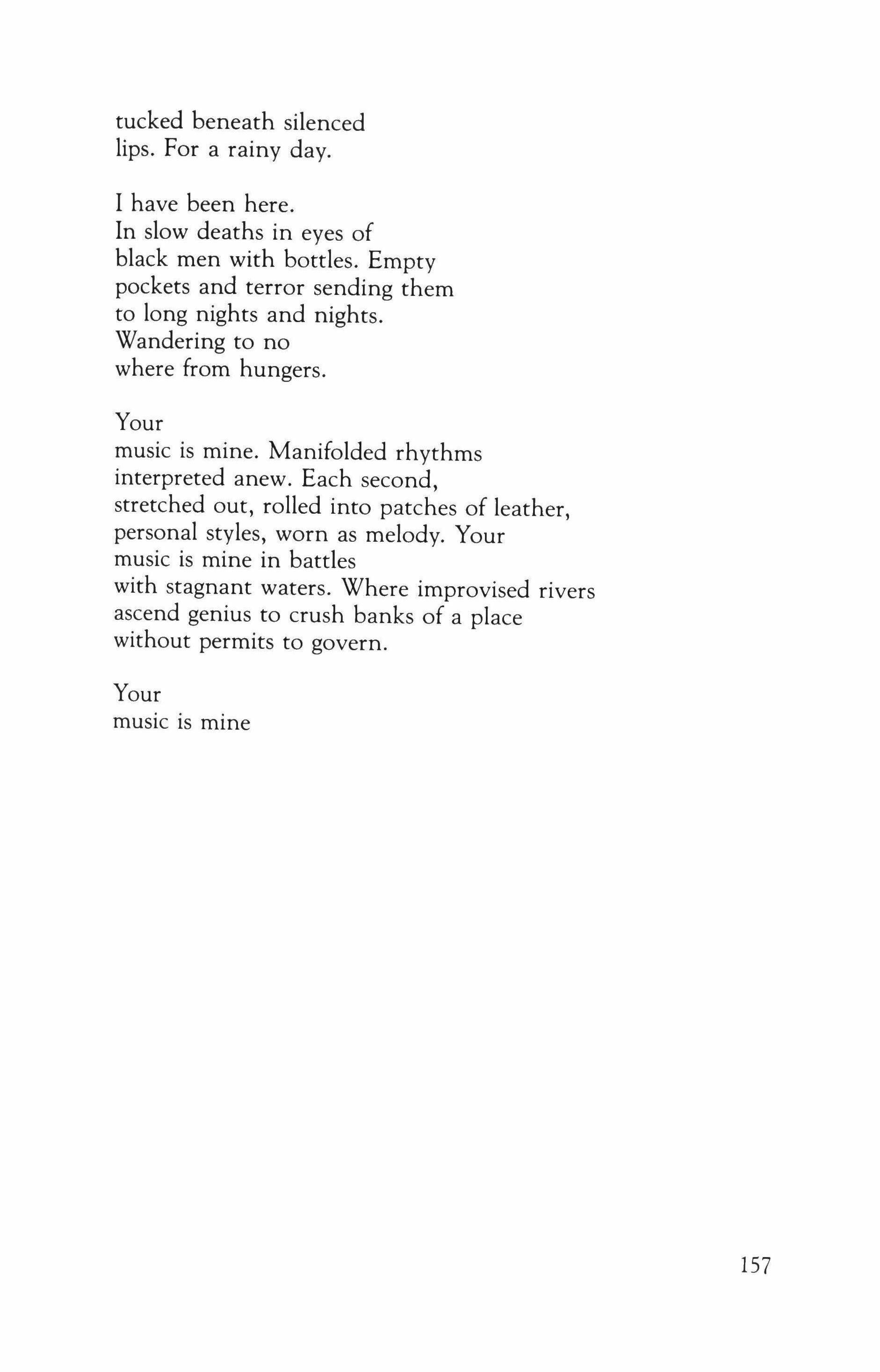
tucked beneath silenced lips. For a rainy day.
I have been here. In slow deaths in eyes of black men with bottles. Empty pockets and terror sending them to long nights and nights. Wandering to no where from hungers.
Your music is mine. Manifolded rhythms interpreted anew. Each second, stretched out, rolled into patches of leather, personal styles, worn as melody. Your music is mine in battles with stagnant waters. Where improvised rivers ascend genius to crush banks of a place without permits to govern.
Your music is mine
157
Thabong
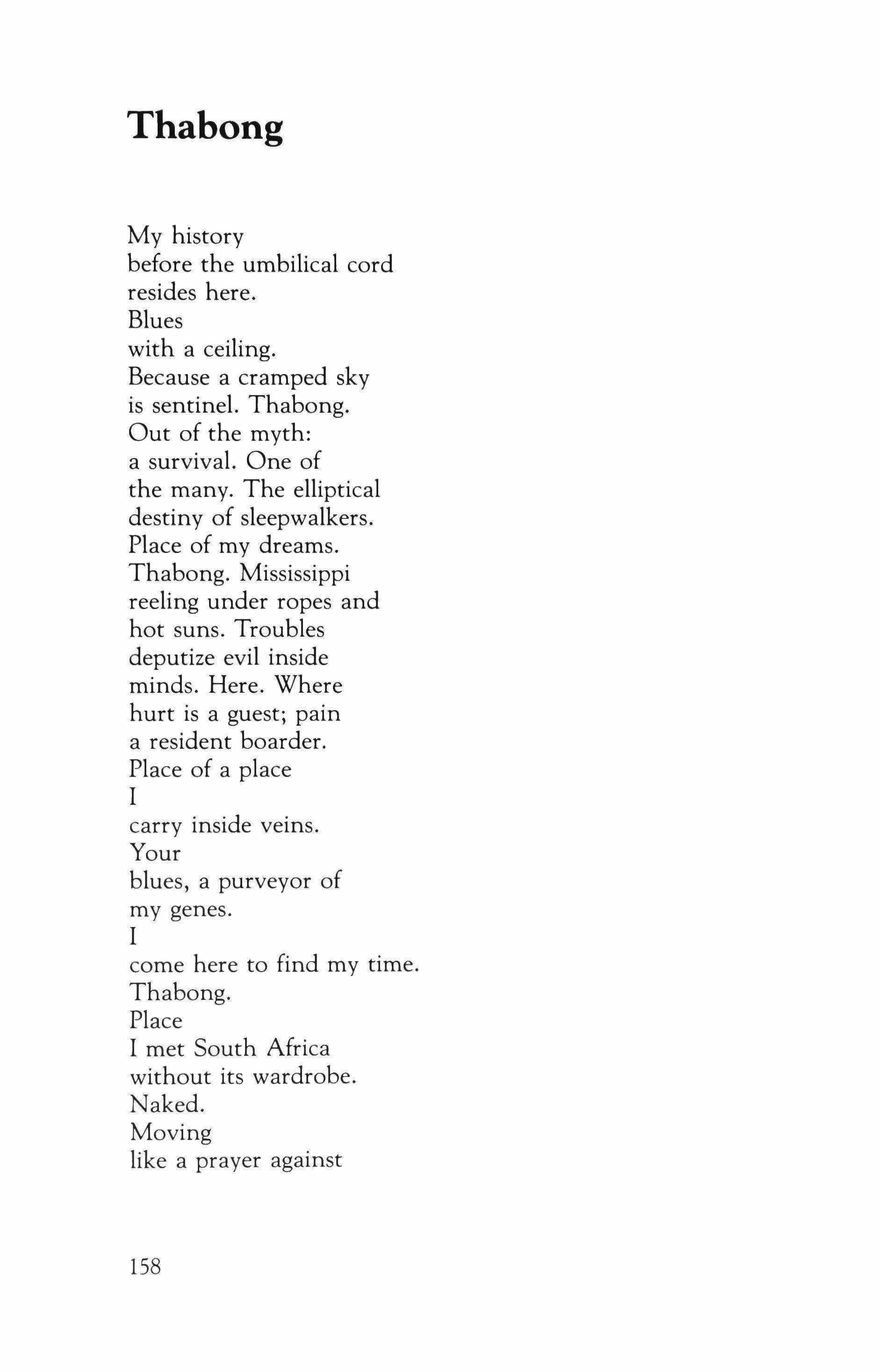
My history before the umbilical cord resides here. Blues with a ceiling. Because a cramped sky is sentinel. Thabong. Out of the myth: a survival. One of the many. The elliptical destiny of sleepwalkers. Place of my dreams. Thabong. Mississippi reeling under ropes and hot suns. Troubles deputize evil inside minds. Here. Where hurt is a guest; pain a resident boarder. Place of a place I carry inside veins. Your blues, a purveyor of my genes. I come here to find my time. Thabong. Place I met South Africa without its wardrobe. Naked. Moving like a prayer against 158

a storm. Moving. One of the many. A place I know. A place in my dreams. I rehearse on your landscapes to claim my past. Freed of debris.
I am one you folded into vision. Child of soil come home to self.
159
Eulogy
Michael Burke

I know what they will say when I am dead. They will say, "Matthew Connors should have tried harder."
Kent and I are driving along the flat, two-lane roads that reach across northern Illinois, the narrow, blacktopped highways that stretch among the cornfields of Midwest, middle-class, middle-of-the-road America.
Kent is my younger brother. He is seventeen years old. I am driving. Kent got high with friends last night and was left at a party on a farm in Hinckley. Maybe you know how to find Hinckley. I needed a map. "I think it's near Rockford, maybe," was all Kent could say when he finally telephoned this morning.
Kent says nothing now and just sits close to the door, with the sun and wind on his face. He wears a black T-shirt, black pants and black boots. He also wears a tiny silver earring.
Kent turns off the radio when I turn it on.
"I almost forgot to tell you," he says. "Tommy Burns is dead."
I manage to keep my eyes on the road.
Kent tells me that Tommy Burns, who was my brother's age, was found three days ago hanging in his bedroom closet. Kent tells me that Tommy was naked and that a pants belt looped around his throat had been fastened to a wooden ceiling beam. Tommy, Kent says, had been jerking off. The idea of the belt was to cut off oxygen to his brain until the very moment he came, thereby doubling-tripling the impact of his orgasm.
Kent smiles when he tells me the next part: Tommy was found by his older brother.
160
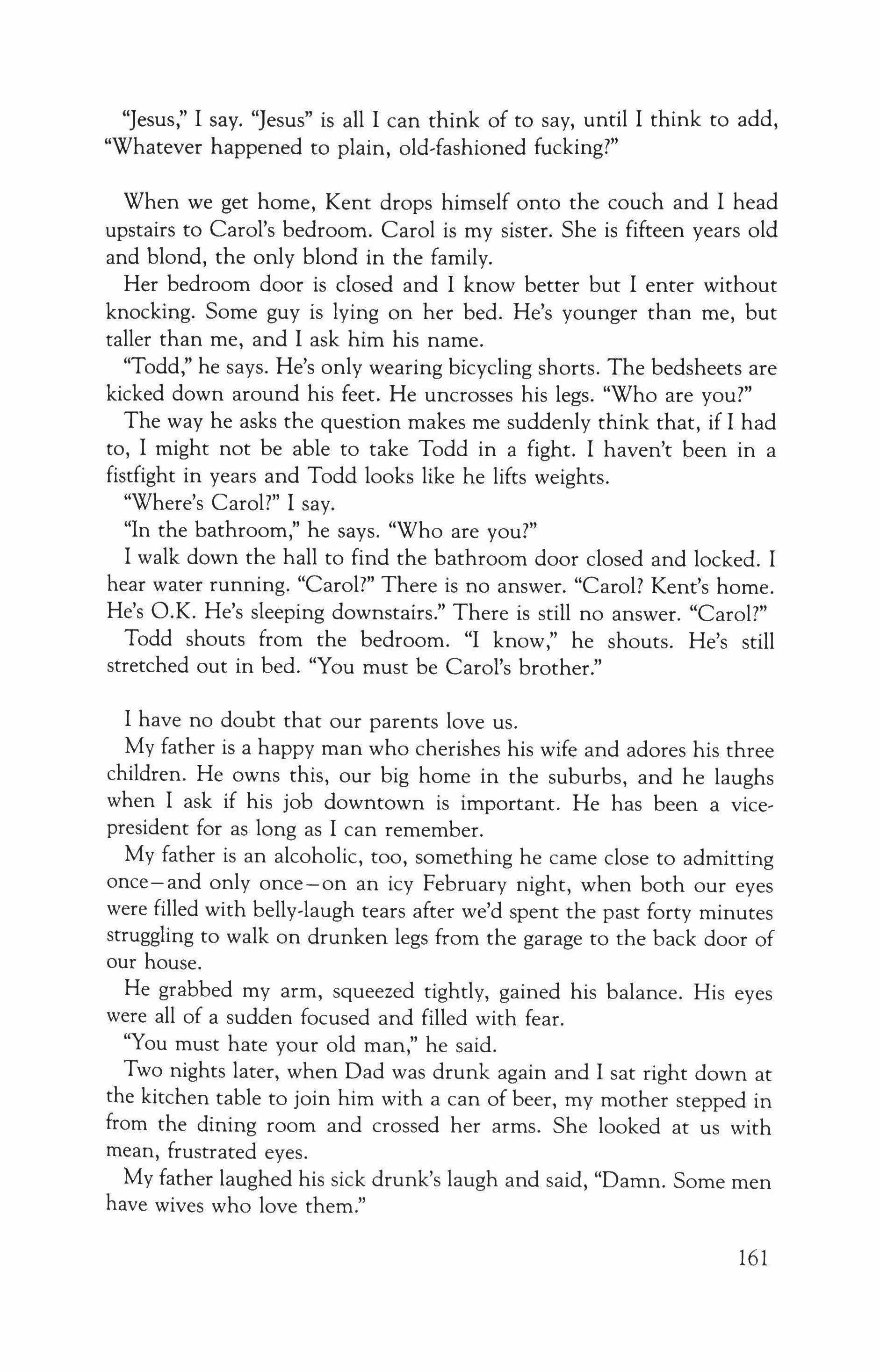
"Jesus," I say. "Jesus" is all I can think of to say, until I think to add, "Whatever happened to plain, old-fashioned fucking?"
When we get home, Kent drops himself onto the couch and I head upstairs to Carol's bedroom. Carol is my sister. She is fifteen years old and blond, the only blond in the family.
Her bedroom door is closed and I know better but I enter without knocking. Some guy is lying on her bed. He's younger than me, but taller than me, and I ask him his name.
"Todd," he says. He's only wearing bicycling shorts. The bedsheets are kicked down around his feet. He uncrosses his legs. "Who are you?"
The way he asks the question makes me suddenly think that, if I had to, I might not be able to take Todd in a fight. I haven't been in a fistfight in years and Todd looks like he lifts weights.
"Where's Carol?" I say.
"In the bathroom," he says. "Who are you?"
I walk down the hall to find the bathroom door closed and locked. I hear water running. "Carol?" There is no answer. "Carol? Kent's home. He's O.K. He's sleeping downstairs." There is still no answer. "Carol?"
Todd shouts from the bedroom. "I know," he shouts. He's still stretched out in bed. "You must be Carol's brother."
I have no doubt that our parents love us.
My father is a happy man who cherishes his wife and adores his three children. He owns this, our big home in the suburbs, and he laughs when I ask if his job downtown is important. He has been a vicepresident for as long as I can remember.
My father is an alcoholic, too, something he came close to admitting once-and only once-on an icy February night, when both our eyes were filled with belly-laugh tears after we'd spent the past forty minutes struggling to walk on drunken legs from the garage to the back door of our house.
He grabbed my arm, squeezed tightly, gained his balance. His eyes were all of a sudden focused and filled with fear.
"You must hate your old man," he said.
Two nights later, when Dad was drunk again and I sat right down at the kitchen table to join him with a can of beer, my mother stepped in from the dining room and crossed her arms. She looked at us with mean, frustrated eyes.
My father laughed his sick drunk's laugh and said, "Damn. Some men have wives who love them."
161

My mother uncrossed her arms. "Don't say I don't love you," she said, "because you might make it come true."
I had witnessed this fight before, many times before, and usually I just stayed quiet, waited it out, until Mom returned to her bedroom so Dad and I could resume drinking. But on that night, Mom stayed and stared and I did the unthinkable: I raised my can of beer toward her.
"Relax," I said. "Have a drink."
She stepped forward and cracked the grin off my face with the back of her hand. "1 am trying to save your father's life," she said.
This all happened when I was eighteen years old and Dad and I were such good friends. Now, 1 am nineteen and my mother is still trying to save my father's life. From that night-the night my father saw, through blurry eyes, his wife slap his son - he sincerely tried giving up booze. He went a few weeks without a drink and then he drank again. Then he went a few months without a drink and when he started to waver, my mother came up with the idea that they, just the two of them, should take a long driving vacation out West. My father embraced the idea and within a week they were gone, leaving me to look after Kent and Carol.
So I have no doubt that our parents love us. But I have come to learn that there are priorities in love. And at this moment in our love, my father is the first priority.
I know what they will say when I am dead.
They will say, "Matthew Connors should have known better."
We live in an old town with brick homes, narrow streets and tall trees. The night sky is dark, but to the east-taller than the tops of the village square shops, but lower than the lowest clouds-is a bright orange neon cross. The cross is fixed to the steeple of the Lutheran Church, but on some nights it looks like an electric angel.
When I was five and a half years old, in fact, my best friend Andrew convinced me that the electric angel had come down from heaven, hunting for me. The story goes that I ran away in fear and wasn't found by my mother until close to midnight, but I don't recall running away. I do remember Andrew's lie.
Andrew is still my best friend and he still lies. He lies about the cash he owes me and swears he's "definitely paying back tomorrow." He lies about the car his stepfather is supposedly buying him, "a black Porsche,"
162
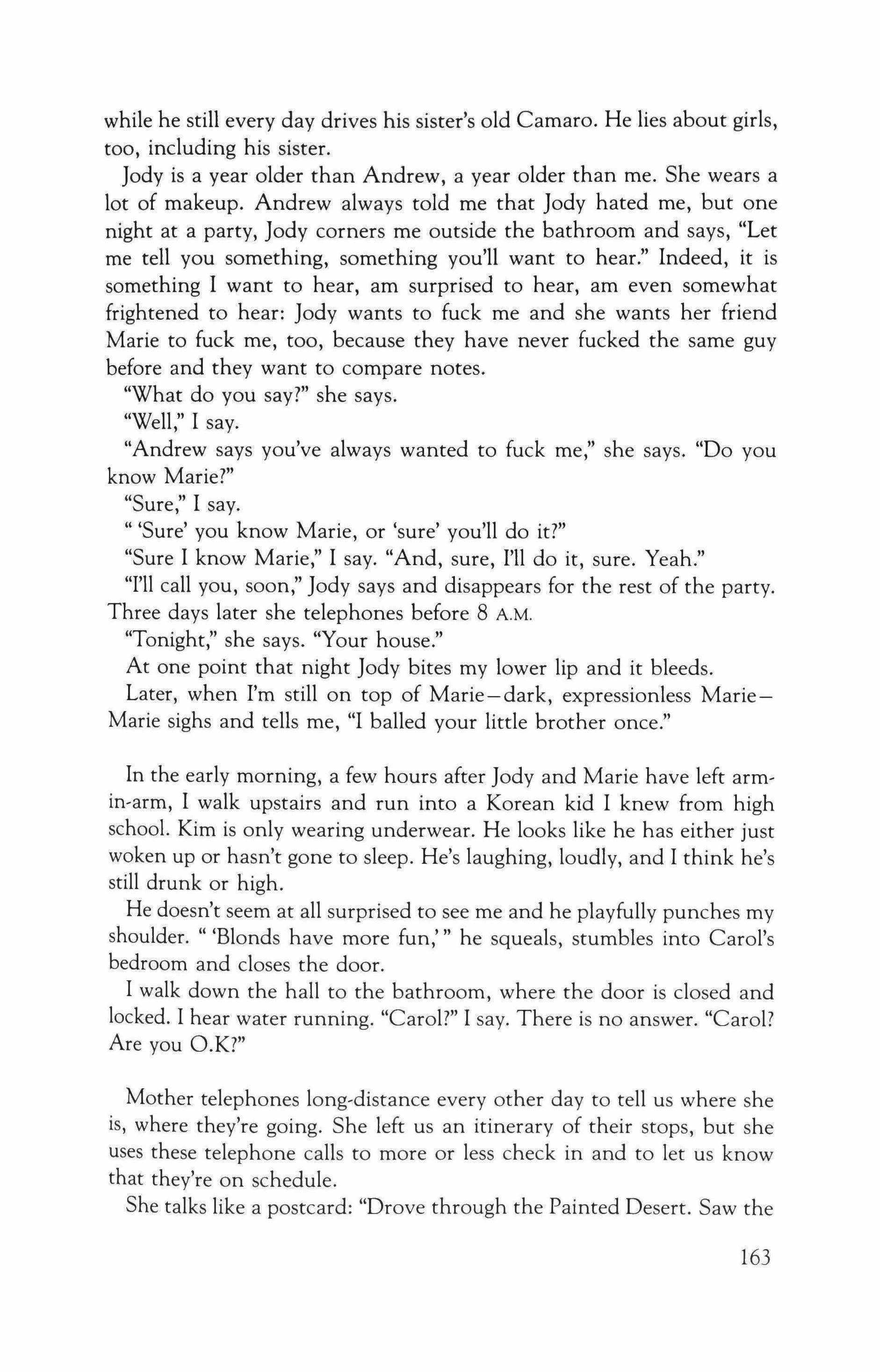
while he still every day drives his sister's old Camaro. He lies about girls, too, including his sister.
[ody is a year older than Andrew, a year older than me. She wears a lot of makeup. Andrew always told me that Jody hated me, but one night at a party, [odv corners me outside the bathroom and says, "Let me tell you something, something you'll want to hear." Indeed, it is something 1 want to hear, am surprised to hear, am even somewhat frightened to hear: jody wants to fuck me and she wants her friend Marie to fuck me, too, because they have never fucked the same guy before and they want to compare notes.
"What do you say?" she says.
"Well," I say.
"Andrew says you've always wanted to fuck me," she says. "Do you know Marie?"
"Sure," I say.
'Sure' you know Marie, or 'sure' you'll do it?"
"Sure I know Marie," I say. "And, sure, I'll do it, sure. Yeah."
"I'll call you, soon," jodv says and disappears for the rest of the party. Three days later she telephones before 8 A.M.
"Tonight," she says. "Your house."
At one point that night jody bites my lower lip and it bleeds.
Later, when I'm still on top of Marie-dark, expressionless MarieMarie sighs and tells me, "I balled your little brother once."
In the early morning, a few hours after jody and Marie have left armin-arm, I walk upstairs and run into a Korean kid I knew from high school. Kim is only wearing underwear. He looks like he has either just woken up or hasn't gone to sleep. He's laughing, loudly, and I think he's still drunk or high.
He doesn't seem at all surprised to see me and he playfully punches my shoulder. "'Blonds have more fun,'" he squeals, stumbles into Carol's bedroom and closes the door.
I walk down the hall to the bathroom, where the door is closed and locked. I hear water running. "Carol?" I say. There is no answer. "Carol? Are you O.K?"
Mother telephones long-distance every other day to tell us where she is, where they're going. She left us an itinerary of their stops, but she uses these telephone calls to more or less check in and to let us know that they're on schedule.
She talks like a postcard: "Drove through the Painted Desert. Saw the
163
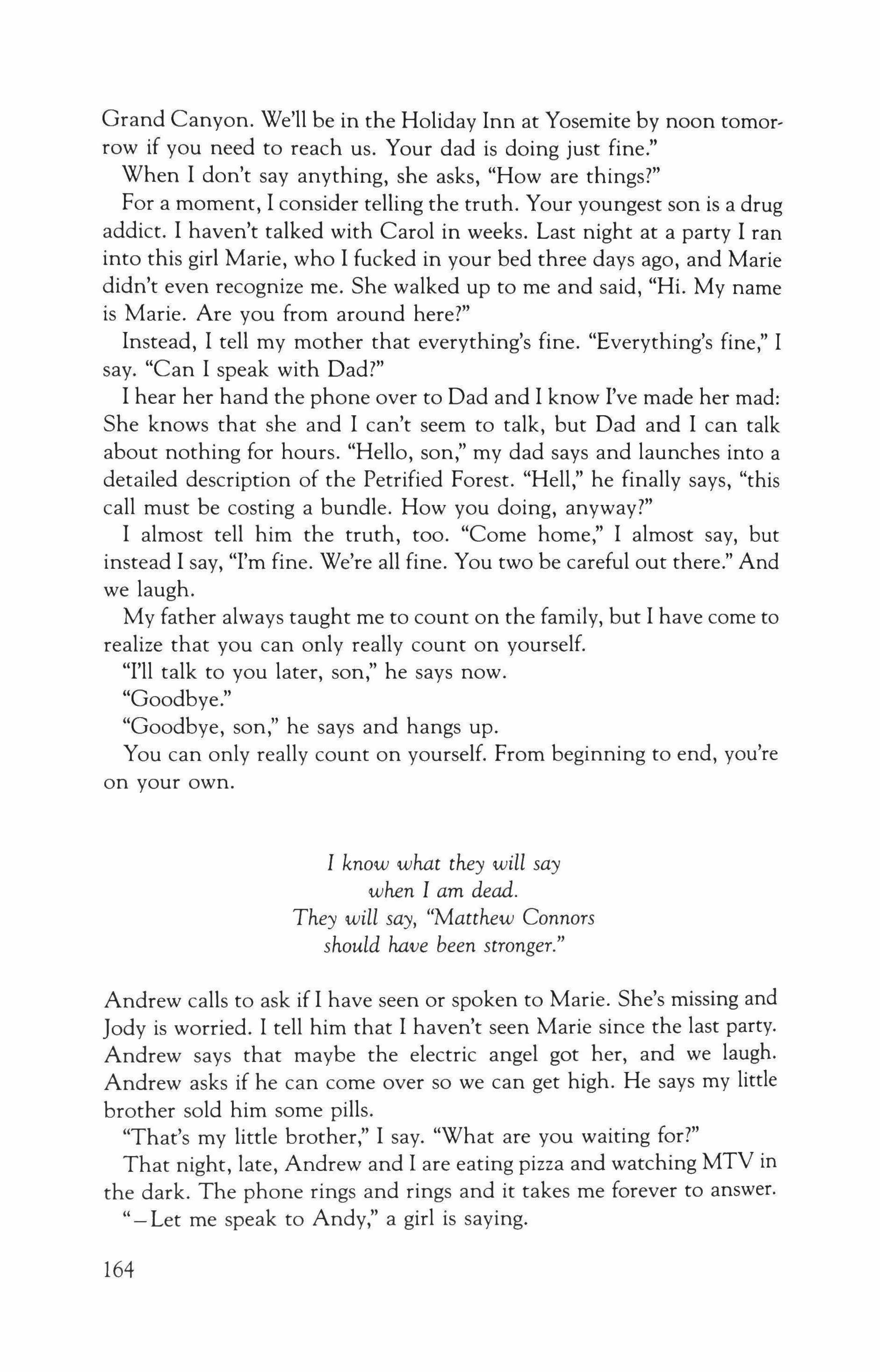
Grand Canyon. We'll be in the Holiday Inn at Yosemite by noon tomorrow if you need to reach us. Your dad is doing just fine."
When I don't say anything, she asks, "How are things?"
For a moment, I consider telling the truth. Your youngest son is a drug addict. I haven't talked with Carol in weeks. Last night at a party I ran into this girl Marie, who I fucked in your bed three days ago, and Marie didn't even recognize me. She walked up to me and said, "Hi. My name is Marie. Are you from around here?"
Instead, I tell my mother that everything's fine. "Everything's fine," I say. "Can I speak with Dad?"
I hear her hand the phone over to Dad and I know I've made her mad: She knows that she and I can't seem to talk, but Dad and I can talk about nothing for hours. "Hello, son," my dad says and launches into a detailed description of the Petrified Forest. "Hell," he finally says, "this call must be costing a bundle. How you doing, anyway?"
I almost tell him the truth, too. "Come home," I almost say, but instead I say, "I'm fine. We're all fine. You two be careful out there." And we laugh.
My father always taught me to count on the family, but I have come to realize that you can only really count on yourself.
"I'll talk to you later, son," he says now.
"Goodbye."
"Goodbye, son," he says and hangs up.
You can only really count on yourself. From beginning to end, you're on your own.
I know what they will say when I am dead. They will say, "Matthew Connors should have been stronger."
Andrew calls to ask if I have seen or spoken to Marie. She's missing and [ody is worried. I tell him that I haven't seen Marie since the last party. Andrew says that maybe the electric angel got her, and we laugh. Andrew asks if he can come over so we can get high. He says my little brother sold him some pills.
"That's my little brother," I say. "What are you waiting for?"
That night, late, Andrew and I are eating pizza and watching MTV in the dark. The phone rings and rings and it takes me forever to answer.
"- Let me speak to Andy," a girl is saying.
164

"Jody?"
"Let me speak to Andy," Jody says. "They found Marie. Marie is dead." "What?"
"She killed herself. With pills. Where's Andy?"
"Jesus," I say. I tell Andrew to come to the phone. "Marie killed herself," I tell him.
"Yeah," Andrew says. He's moving slow. "It's been a tough week for everybody."
At the wake for Marie two nights later, I try standing in the back of the funeral parlor, as far away from her body as possible. A man I have never seen before steps in front of me and stuffs a pair of gray, flimsy gloves into my hands. "You'll use these when you carry the coffin," he says. He's a thin man leaning over me and when I look surprised-this is the first I've heard anything about serving as a pallbearer-the man squints and says, "Well, you were her boyfriend, weren't you?"
When I don't respond, he squints more and leans closer. "You were her boyfriend, weren't you?" he says again.
"Yes," I say. "I guess
When the man turns away, Andrew slips through the quiet crowd and tugs on the gloves. "What are these?" he says.
"The guy thinks I was her boyfriend or something."
Andrew kind of shakes his head and kind of smiles. He slaps two pills into my palm. "Take these," he says. "You look like shit."
When I hesitate, my best friend Andrew tells me, "take them" and I do. Andrew grins. "Everything's fine," he says.
Everything's fine, I tell myself, and then a woman yells, "No."
She is a dark, short, heavy woman dressed in black and I think maybe she is Marie's mother. She is standing near the sofa at the front of the room and she yells "no" again when I realize that she is pointing toward the coffin, where her daughter lies and where my brother alone is standing.
Kent is wearing one of my old sports jackets that is even too small for him. He leans forward and kisses Marie's lips.
"No," the woman yells again and Kent leans forward and kisses Marie once more. Then two guys who look like cousins grab Kent from behind and pull him away from Marie and toward the parlor door. Kent is crying. The cousins are swearing and when I try grabbing Kent, one cousin shoves me away. They take Kent out onto the sidewalk and as I step outside they push Kent and punch Kent and Kent falls to the ground. They swear some more as I try to help Kent stand. They watch
165
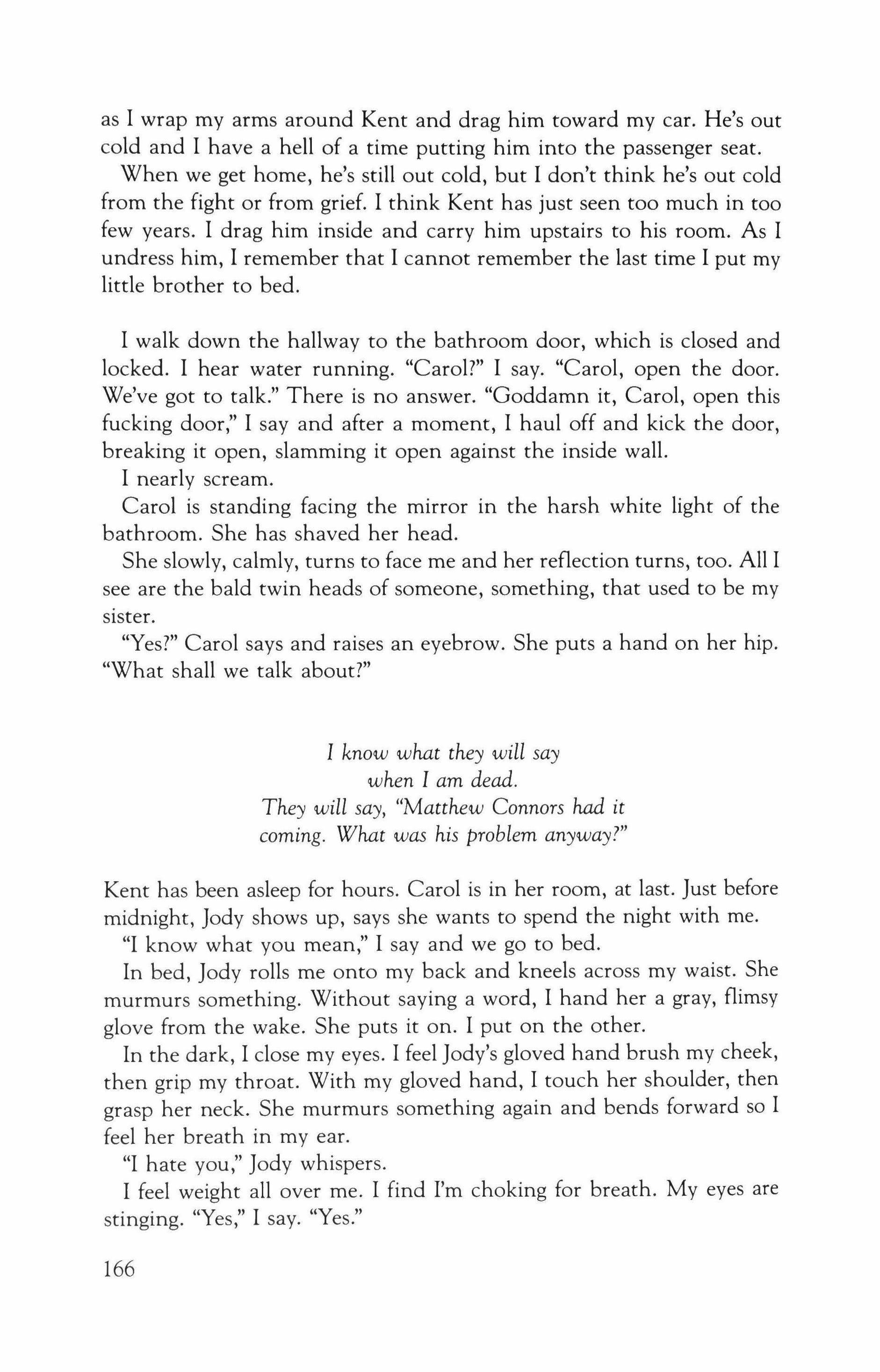
as I wrap my arms around Kent and drag him toward my car. He's out cold and I have a hell of a time putting him into the passenger seat.
When we get home, he's still out cold, but I don't think he's out cold from the fight or from grief. I think Kent has just seen too much in too few years. I drag him inside and carry him upstairs to his room. As I undress him, I remember that I cannot remember the last time I put my little brother to bed.
I walk down the hallway to the bathroom door, which is closed and locked. I hear water running. "Carol?" I say. "Carol, open the door. We've got to talk." There is no answer. "Goddamn it, Carol, open this fucking door," I say and after a moment, I haul off and kick the door, breaking it open, slamming it open against the inside wall.
I nearly scream.
Carol is standing facing the mirror in the harsh white light of the bathroom. She has shaved her head.
She slowly, calmly, turns to face me and her reflection turns, too. All I see are the bald twin heads of someone, something, that used to be my sister.
"Yes?" Carol says and raises an eyebrow. She puts a hand on her hip. "What shall we talk about?"
I know what they will say when I am dead.
They will say, "Matthew Connors had it coming. What was his problem anyway?"
Kent has been asleep for hours. Carol is in her room, at last. Just before midnight, Jody shows up, says she wants to spend the night with me.
"I know what you mean," I say and we go to bed.
In bed, jody rolls me onto my back and kneels across my waist. She murmurs something. Without saying a word, I hand her a gray, flimsy glove from the wake. She puts it on. I put on the other.
In the dark, I close my eyes. I feel [ody's gloved hand brush my cheek, then grip my throat. With my gloved hand, I touch her shoulder, then grasp her neck. She murmurs something again and bends forward so I feel her breath in my ear.
"I hate you," [ody whispers.
I feel weight all over me. I find I'm choking for breath. My eyes are stinging. "Yes," I say. "Yes."
166
Dream On
Janet Kauffman
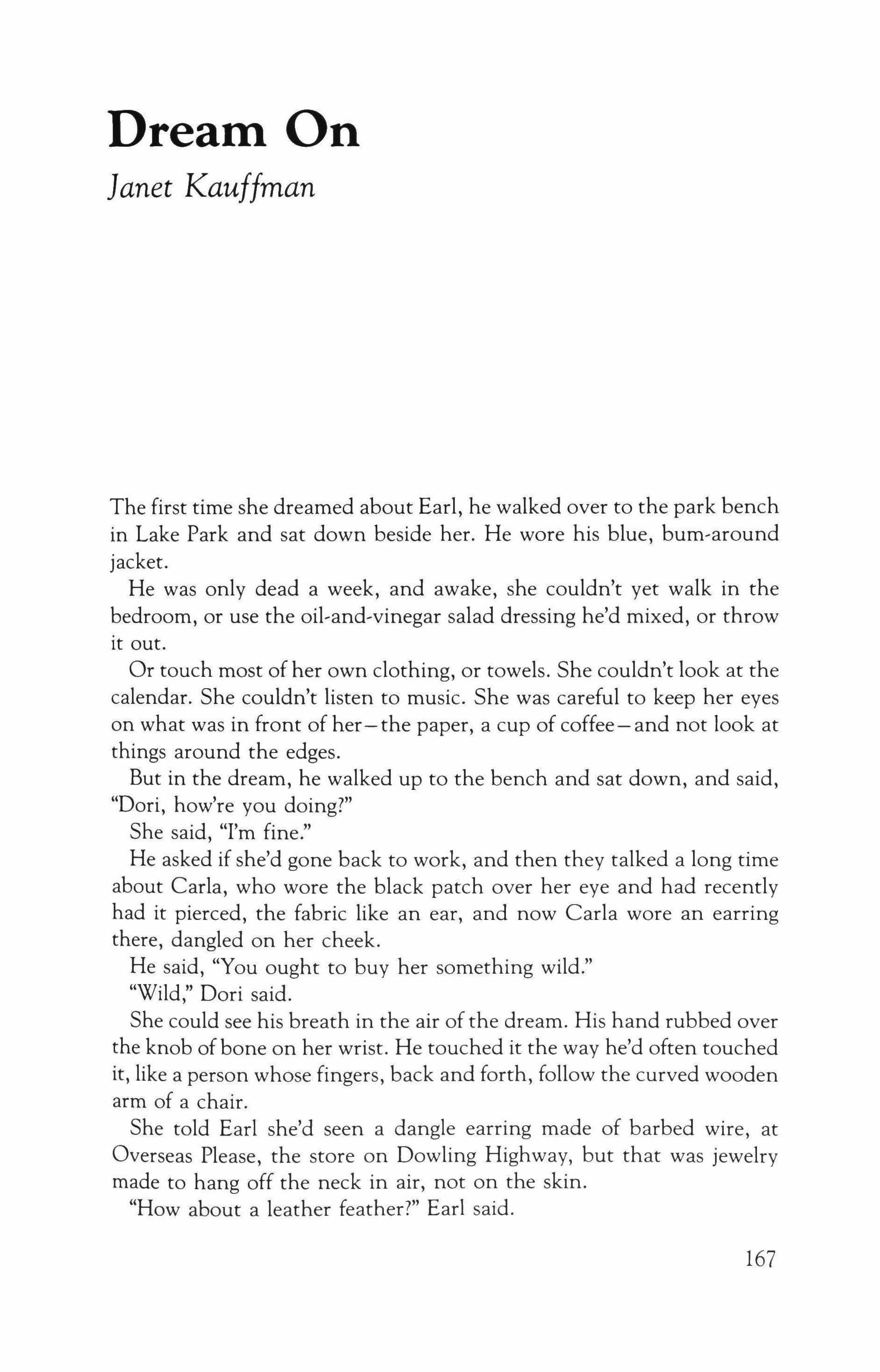
The first time she dreamed about Earl, he walked over to the park bench in Lake Park and sat down beside her. He wore his blue, bum-around jacket.
He was only dead a week, and awake, she couldn't yet walk in the bedroom, or use the oil-and-vinegar salad dressing he'd mixed, or throw it out.
Or touch most of her own clothing, or towels. She couldn't look at the calendar. She couldn't listen to music. She was careful to keep her eyes on what was in front of her-the paper, a cup of coffee-and not look at things around the edges.
But in the dream, he walked up to the bench and sat down, and said, "Dori, how're you doing?"
She said, "I'm fine."
He asked if she'd gone back to work, and then they talked a long time about Carla, who wore the black patch over her eye and had recently had it pierced, the fabric like an ear, and now Carla wore an earring there, dangled on her cheek.
He said, "You ought to buy her something wild." "Wild," Dori said.
She could see his breath in the air of the dream. His hand rubbed over the knob ofbone on her wrist. He touched it the way he'd often touched it, like a person whose fingers, back and forth, follow the curved wooden arm of a chair.
She told Earl she'd seen a dangle earring made of barbed wire, at Overseas Please, the store on Dowling Highway, but that was jewelry made to hang off the neck in air, not on the skin.
"How about a leather feather?" Earl said.
167

Dori woke. She was on the sofa, propped up. "Leather feather," she said out loud. She thought how she'd tell Carla, and how Carla would open her mouth wide and hack out her laugh that fired like quick coughs. "Dream on!" she'd say.
Dori knew it was all in her head. That was fine with her.
Her friend Aleesha in high school, killed in a car crash, hadn't disappeared from dreams in twenty years. In dreams, Aleesha wore the green sweater she'd knitted herself. She walked into a room, looking for her coat, or she sat outside on a rock and asked about Frankie. She was interested in him even though she'd been dead five years when Frank moved to Columbia Street.
"Have you talked to Frankie?" Aleesha'd say.
"Well, not lately."
And when Frankie was dead, the same thing. In dreams he'd show up and ask Dori for the everyday news. He asked about the weather, the temperature, the snow. They'd sledded the quarry slope a few times. He was a guy who'd run that kind of risk, for that kind of pleasure. He asked about Earl, a decade or so later, when Earl, with his chopped hair and red shirts, moved into the place on the lake.
The dead showed interest. Gone from the local scene, they seemed determined not to lose touch. They gave special attention to ordinary matters. They asked Dori if she was doing O.K., and in the dreams, she was. She couldn't deny it.
In the dreams she felt calm as a girl who didn't think about death as loss, but as fact - an ordinary thing: dead bugs on the windshield; or, outside the plate-glass window, dead starlings she'd pick up and bury in a hole. As a girl, she'd seen plenty of chickens killed, an easy snap. She carried them, dead, to the scalding buckets, and she plucked them, fistfuls of feathers, for meat. She wasn't ignorant of death. An uncle died - he was killed by a tornado in Missouri, outside in a field. Nobody knew why he was outside in a tornado, and there was talk about whether he'd been blown there, or if he'd gone out in the open to watch. Nobody knew him well enough to decide which was more likely.
Dori didn't dream about her uncle. But when Aleesha died, and then Frankie, the dead began coming back, to talk in dream. She liked to think - she might even have said - they didn't stay put, they didn't quit. But she knew that wasn't it.
Frankie was twenty-five when he died. He was fine, then he was in the hospital, then he was dead. A cancer in the brain. Dori was at school that year in Lansing, but she might as well have been in a foreign
168

country, it took so long to hear the news. He was dead and buried. She sat in a chair for days, like a back-home survivor of somebody killed in the war, who forces herself to picture the worst, the battle zone, the opening up of the ground, the disappearance of bodies by the hundreds, out of sight - the loved one is lost in this - bulldozed, suffocated, napalmed, strafed, bombed, broken. Although in dream, now and then, very simply it's all undone. The loved one digs out, as buried dogs sometimes do, and there he is, he walks across the yard to say hello.
Frankie didn't die in the war, although there was the war going on then. He died in convulsions. Dori asked his mother. And then she sat in the chair, forcing herself to see things as they were.
He didn't know where he was. His mother said, "Frankie, I'm right here," but he didn't know she was there. They held his arms down, it took four people. Frankie's back arched like a bridge on the bed, rigid. He flailed, they strapped his arms and his legs to the bed. His eyes were open, but he didn't know where he was. For hours, he didn't know anything.
Dori tried to do justice to Frankie, seeing all this. It was right that she have it clearly in mind.
But before long, she dreamed Frankie walked into Dusty's Diner with her and sat down. He asked how school was. She could smell his skin, the Safeguard soap. He wore his cracked ivory ring.
For years, off and on, they talked in dream. Once, Frankie drove her to the quarry. They sat with their legs over the edge of the rock and ate spinach salads on purple plates. Frankie took off his shirt and stretched out on his back. He asked if she loved anybody else these days, and she told him yes. Yes she did.
She said, "What about you?"
He said, the way he always said, "Who needs it!"
He asked if the snow was decent for sledding, and she said, no, it was summer, and that Earl lived on the lake.
She told Frankie she thought she would die of old age.
"That's likely," Frankie said. "I know you." With a toothpick, he scraped between his front teeth. He took a spinach leaf from his plate and rolled it up. He stuck the leaf in his mouth like a cigarette and chewed at it.
Dori said, "Frankie, I miss your teeth."
The years in dream accumulated, collapsed. Dori saw how a dream's indifference to time was its pleasure, its consolation. The dead, of
169

course, didn't age. But more than that, their lives coincided, overlapped, and the past wasn't something done for. She told Earl about Frankie, and sometimes out on the lake, in a lull with a beer, Earl would say, "Hey, it's hot and sunny. Let's toast the guy who loved snow."
Earl built a shower at the back of the house, outside between grapevines, and the day it was finished, they sat naked under it, talking about the dead in their lives, Aleesha, Frankie, Earl's mother, because, Earl said, "Who'd be more in favor of the pleasures of the senses?"
They splashed around. Earl kissed her shoulders, the wet hair on her head. He pushed his fingers through her hair, wrung out some strands. He said, "Your hair's tangled." He sorted it out.
Under the shower, she closed her eyes and let the water wash her eyelids. As a girl she sat under a waterfall sprayed from a hose. She liked to catch the water in her hands, and let it drain away through her fingers.
Earl said, "This side's long. Down to the big freckle." He pressed her wet hair flat on her back, to measure it.
Dori opened her eyes. "Earl," she said, "I think I love every hair you've got. Is there time to kiss them all?"
"We'll take the time," he said.
In dreams now, Earl said, "Dori, hello." He said, "How're you doing?"
They talked about Carla, or they talked about the drought and lake levels, or they talked about Poland, or tennis. Dori said, "Just talk. I miss your voice."
He disappeared so fast, they didn't have time for a word. She was thrown in the water, too. Her glasses flew off, and sank. That was the first thing she knew. In the wind, the boat capsized, the mast pointed down like an arrow. She was pitched in the water off the one side, Earl off the other. She couldn't swim and wore a life jacket. Earl was a strong swimmer, but he was the one under water, tangled, the sort of thing that never happened, and she couldn't believe then, or for hours, that he wouldn't surface, right the boat, and steer them into shore. And make coffee, and tell her the wind was worse than he'd thought, and why not get under the blankets and make love. They'd got themselves into a mess, and out, and they ought to celebrate.
Dori knew what was dream and what wasn't. Earl walked to the edge of the water, low in the drought. The clay was hard, cracked in peculiar patterns. Earl said, "Dori, are you getting sleep?"
She said, "When I dream, I do."
170

"Have you dreamed about Frankie lately?"
"Not for a while. Maybe when it's winter."
Earl sat on the slab of rock they called Flat-top. He wore his white sweater with the deer knitted into it, his red shorts.
Dori said, "Aren't you hot in that sweater?"
"Yeah:' he said. "Maybe I'll let it go." He took off the sweater, shook it, and the deer jumped from the sweater and walked off. "We can catch up with it later."
They walked on the clay shore, no hurry, and Dori told him she heard he'd changed his name, to the Polish spelling.
"Here's proof," he said. And he pulled out, from somewhere behind his back, a bottle of wine with his new name on it, the Polish name. "Itt's a purple wine," he said. "You're a fan of purple, aren't you?"
It was the middle of the day. Dori called Carla and told her about the purple wine and the walking deer.
Carla said, "Sweetheart, that's good. Now put on your purple shirt and get over here. We can talk, too. I got wine you can even drink."
Dori said O.K., that would help. She had a present for Carla anyway, a frilled-up feather she'd cut from black leather with the razor edge of an X-Acto knife. At this rate, it wouldn't be long before she'd cut her hair and buy a new pair of glasses. And although she'd still look exactly like herself, she'd be a woman who could walk to the edge of the water and back. She'd be able to take a shower and let the water strike her eyelids. She'd stand very still. The water would fall off her shoulders at a different angle, and that would help, too.
171
Foreign Aid
Amy Godine

When Ivy Glover was a girl, she discovered the Nazi war against the Jews between a carton of spare fuses and a golf trophy. For the first time in her nine-year-old life her imagination met its match. The book was a photographic history of the Third Reich. Here was the ghetto waif at gunpoint, splayed hands stiff as starfish above a Jackie Coogan cap; here the piggy faces of the lady guards; there the soap. At school, when her math class reached the lesson called Infinity and Miss Parris told them, picture it like this, kids, picture all the grains of sand it takes to make a sand dune, Ivy thought of dunes made of fillings, pocket watches, long dusty braids.
What she learned didn't frighten her. She never thought, for instance, that's me, that bare girl in line there, shivering. This was 1953. Home was Brookline, Massachusetts. Besides, had she been that girl, she would have made it out. Not easily, but there were ways-tunnels to be dug, wires snipped, convents joined, false documents acquired. Oh, she'd suffer. Huddled with a hundred others at the deep edge of a pit, she might even take a bullet in the shin, but come night would wriggle out of there, making her sure moonlit way to the partisan-enchanted woods. What stalled the dream, what split the spell, was her effort to include her family, and in particular her younger brother Hal. He was so drifty, so distractable, suppose he saw something in the course of their escape and when she told him hurry up, he began crying, and all was lost?
Hal hated to be hurried.
Princess Hal, that's what their father called him.
Hurry, Hal. They're after us.
1
172

You hurry. I want to see this thing.
And it could have been a flower clinging to his pajamas, a cricket, toad, scrap of foil, whatever. This was Hal, implacable malingerer, cloven-footed bad boy: last she heard, he was mooning around the Caribbean, some two-blink islet called St. Tiggs. He hadn't changedwould be playing Ferdinand the Bull, chasing flowers until the end - as Ivy, ever Ivy, still played the schemer-rescuer, the only difference being, now, that she got paid for it; instead of Nazis, she went up against Chilean bullyboys in slitted hoods; instead of dragging a small dozy boy in robin's-egg-blue pj's through the black Polish woods, she licked envelopes, goosed the press, hectored middle-level officials on the Hill- and, lo, from a psychiatric hospital in Yugoslavia, a Jehovah's Witness emerged from exile; from an island prison in Peru, a hatmaker put on street clothes after seven years in chains.
Hard work. And notwithstanding all the snappy arguments on human rights as moral ambulance-chasing, or finger-in-the-dike stuff, or the deformed issue of natural-law notions as quaint as they were flawed, it was good work. Ivy liked it. She didn't kid herself. She was no kind of hero, was never going to jiggle anybodv's conscience, change anybody's mind. No policeman ever read one of her reports and said, Good gracious, we did that?
Loss of face-that's all she aimed for.
Keep the guilt, forget the shame. It's plain old squirmy-toed embarrassment that makes the world go round, she liked to say. No one wants to look bad. God knows, my own compulsion to avoid embarrassment runs so deep as to suggest the organizing principle of my life.
In any case, it was the main reason she took up this line of work. Never mind the plummy clerkship, to be a lawyer in 1968 had been powerfully embarrassing. She'd tried not to chafe at the wide-open spaces between justice and the law, not to begrudge the legal system its coy evasions and self-infatuated cant, but '68 was rough. And when Ivy met a guy named Ray Salsa, who worked for a human-rights outfit in New York, and heard him talk about the squalid Chelsea walk-up with its staff of twelve, and all the people he'd helped spring from one rathole or another, she could feel it at once, the rightness, the relief, as the great boulder of embarrassment that rode her like a yoke went as light as wings.
Here, at last, was justice without sophistry, goodness without abstraction, evil so direct and unabashed you could seize it, scalp it, kick butt. Finally, Ivy's conscience, tense and antsy as a trick knee, could relax. Wish I had your guts, the good judge told her at a farewell brunch, but
173

it wasn't guts at all, she'd said, amused. What's gutsy about sticking up for torture victims? What could be more obvious? Less legally imaginative? It was paint-by-numbers goodness, it was Follow the Bouncing Ball on the Mitch Miller Show when she was a kid. Look me up in seven years, she swore, I'll be working on my little brother's tree farm. When he's done with college we're moving to Oregon. Japanese maples. That's the plan.
Well, there were no maples, and there was no farm. Hal never finished college and the sweet dream of Oregon (scented nights under the firs, dulcimers and checkers by a potbellied stove) took on the wistful, stillborn charm of starlight from some long-retired sun. Hal fled to Mexico. Ivy married Ray Salsa, the charismatic activist, in a Soho loft under a silkscreened poster of a baby-toting Sandinista in vibrant peasant garb, and the job she had so airily derided to the judge became her life.
As for law itself, well, sure, sometimes a tweaky envy bruised her mood when she let herself imagine the delirium of making partner, the luxury of secretaries who never had to ask if the word Europe began with Y-E-R. And yes, it made her sigh a little, Mercy's burgeoning reliance on famous legal specialists to shore up its official missions, all those ponderous pro-bonophiles who loved to lend the weight of their last-minute outrage to this or that of Mercy's causes, prison horrors in Somali, poison gas in Iran. But Ivy'd made her choice. She held firm. So she'd never lead a formal mission, never see her name on the reports making the rounds at the UN. Truth was, sans her spadework, Rolodex and notes, the reports would never happen in the first place. Without benefit of her preliminary recon (those off-the-record junkets that threatened to turn Ivy into a world expert on ill-lit hotel lobbies and under-planted parks) the official missions that came after wouldn't turn up squat. Her work more than mattered: she'd made herself (didn't Ray tell her this each day?) indispensable. With all her fan mail she could fill a billboard or, at least, as Ray said, urging her, an office wall.
"Go on. Put 'em up. This place could use some warming up. I walk in here, I feel like I'm going snowblind," he prodded.
Ivy made a face. It seemed like scoring notches on a rifle, show-offy, not nice. Let Ray find inspiration or solace or whatever in the muzzy snapshots of reunited families raising shy toasts, all Ivy ever felt was irritation, verging on revulsion
"Really?" Ray said, interested. "Revulsion? It's that strong?"
"Well, it is."
174
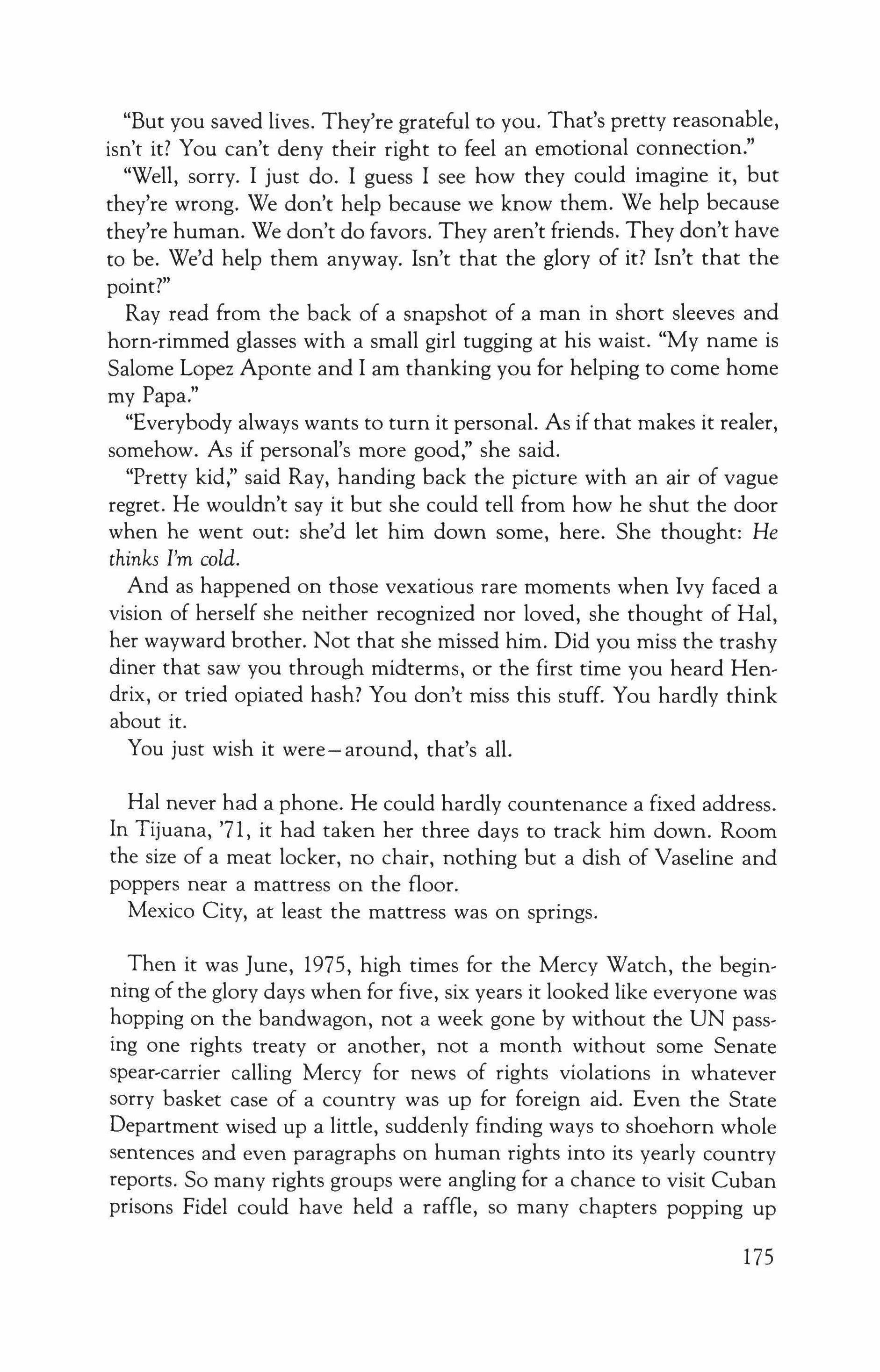
"But you saved lives. They're grateful to you. That's pretty reasonable, isn't it? You can't deny their right to feel an emotional connection."
"Well, sorry. I just do. I guess I see how they could imagine it, but they're wrong. We don't help because we know them. We help because they're human. We don't do favors. They aren't friends. They don't have to be. We'd help them anyway. Isn't that the glory of it? Isn't that the point?"
Ray read from the back of a snapshot of a man in short sleeves and horn-rimmed glasses with a small girl tugging at his waist. "My name is Salome Lopez Aponte and I am thanking you for helping to come home my Papa."
"Everybody always wants to turn it personal. As if that makes it realer, somehow. As if personal's more good," she said.
"Pretty kid," said Ray, handing back the picture with an air of vague regret. He wouldn't say it but she could tell from how he shut the door when he went out: she'd let him down some, here. She thought: He thinks I'm cold.
And as happened on those vexatious rare moments when Ivy faced a vision of herself she neither recognized nor loved, she thought of Hal, her wayward brother. Not that she missed him. Did you miss the trashy diner that saw you through midterms, or the first time you heard Hendrix, or tried opiated hash? You don't miss this stuff. You hardly think about it.
You just wish it were-around, that's all.
Hal never had a phone. He could hardly countenance a fixed address. In Tijuana, '71, it had taken her three days to track him down. Room the size of a meat locker, no chair, nothing but a dish of Vaseline and poppers near a mattress on the floor.
Mexico City, at least the mattress was on springs.
Then it was June, 1975, high times for the Mercy Watch, the beginning of the glory days when for five, six years it looked like everyone was hopping on the bandwagon, not a week gone by without the UN passing one rights treaty or another, not a month without some Senate spear-carrier calling Mercy for news of rights violations in whatever sorry basket case of a country was up for foreign aid. Even the State Department wised up a little, suddenly finding ways to shoehorn whole sentences and even paragraphs on human rights into its yearly country reports. So many rights groups were angling for a chance to visit Cuban prisons Fidel could have held a raffle, so many chapters popping up
175
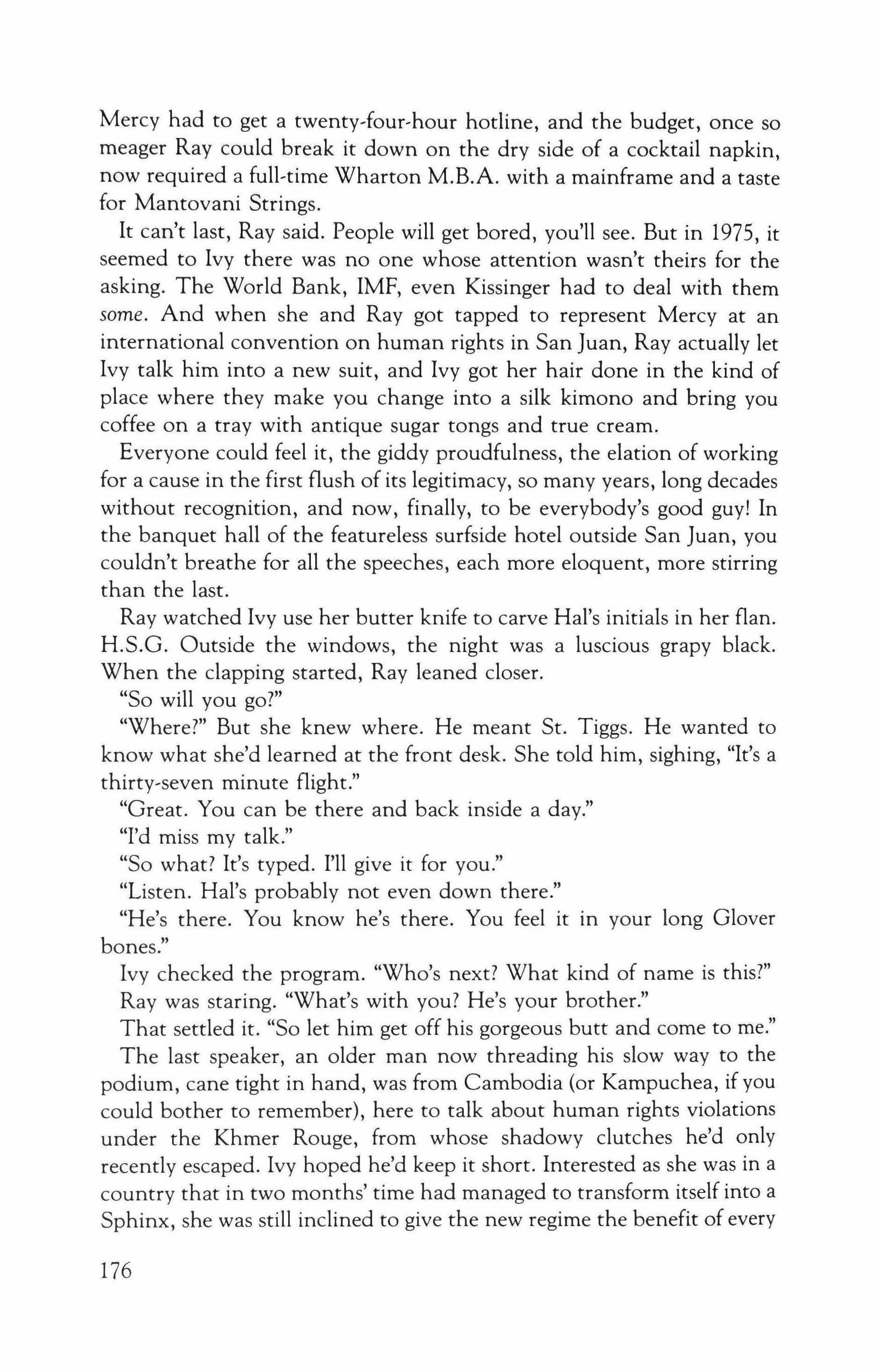
Mercy had to get a twenty-four-hour hotline, and the budget, once so meager Ray could break it down on the dry side of a cocktail napkin, now required a full-time Wharton M.B.A. with a mainframe and a taste for Mantovani Strings.
It can't last, Ray said. People will get bored, you'll see. But in 1975, it seemed to Ivy there was no one whose attention wasn't theirs for the asking. The World Bank, IMF, even Kissinger had to deal with them some. And when she and Ray got tapped to represent Mercy at an international convention on human rights in San Juan, Ray actually let Ivy talk him into a new suit, and Ivy got her hair done in the kind of place where they make you change into a silk kimono and bring you coffee on a tray with antique sugar tongs and true cream.
Everyone could feel it, the giddy proudfulness, the elation of working for a cause in the first flush of its legitimacy, so many years, long decades without recognition, and now, finally, to be everybody's good guy! In the banquet hall of the featureless surfside hotel outside San Juan, you couldn't breathe for all the speeches, each more eloquent, more stirring than the last.
Ray watched Ivy use her butter knife to carve Hal's initials in her flan. H.S.G. Outside the windows, the night was a luscious grapy black. When the clapping started, Ray leaned closer.
"So will you go?"
"Where?" But she knew where. He meant St. Tiggs. He wanted to know what she'd learned at the front desk. She told him, sighing, "It's a thirty-seven minute flight."
"Great. You can be there and back inside a day."
"I'd miss my talk."
"So what? It's typed. I'll give it for you."
"Listen. Hal's probably not even down there."
"He's there. You know he's there. You feel it in your long Glover bones."
Ivy checked the program. "Who's next? What kind of name is this?"
Ray was staring. "What's with you? He's your brother."
That settled it. "So let him get off his gorgeous butt and come to me."
The last speaker, an older man now threading his slow way to the podium, cane tight in hand, was from Cambodia (or Kampuchea, if you could bother to remember), here to talk about human rights violations under the Khmer Rouge, from whose shadowy clutches he'd only recently escaped. Ivy hoped he'd keep it short. Interested as she was in a country that in two months' time had managed to transform itself into a Sphinx, she was still inclined to give the new regime the benefit of every
176
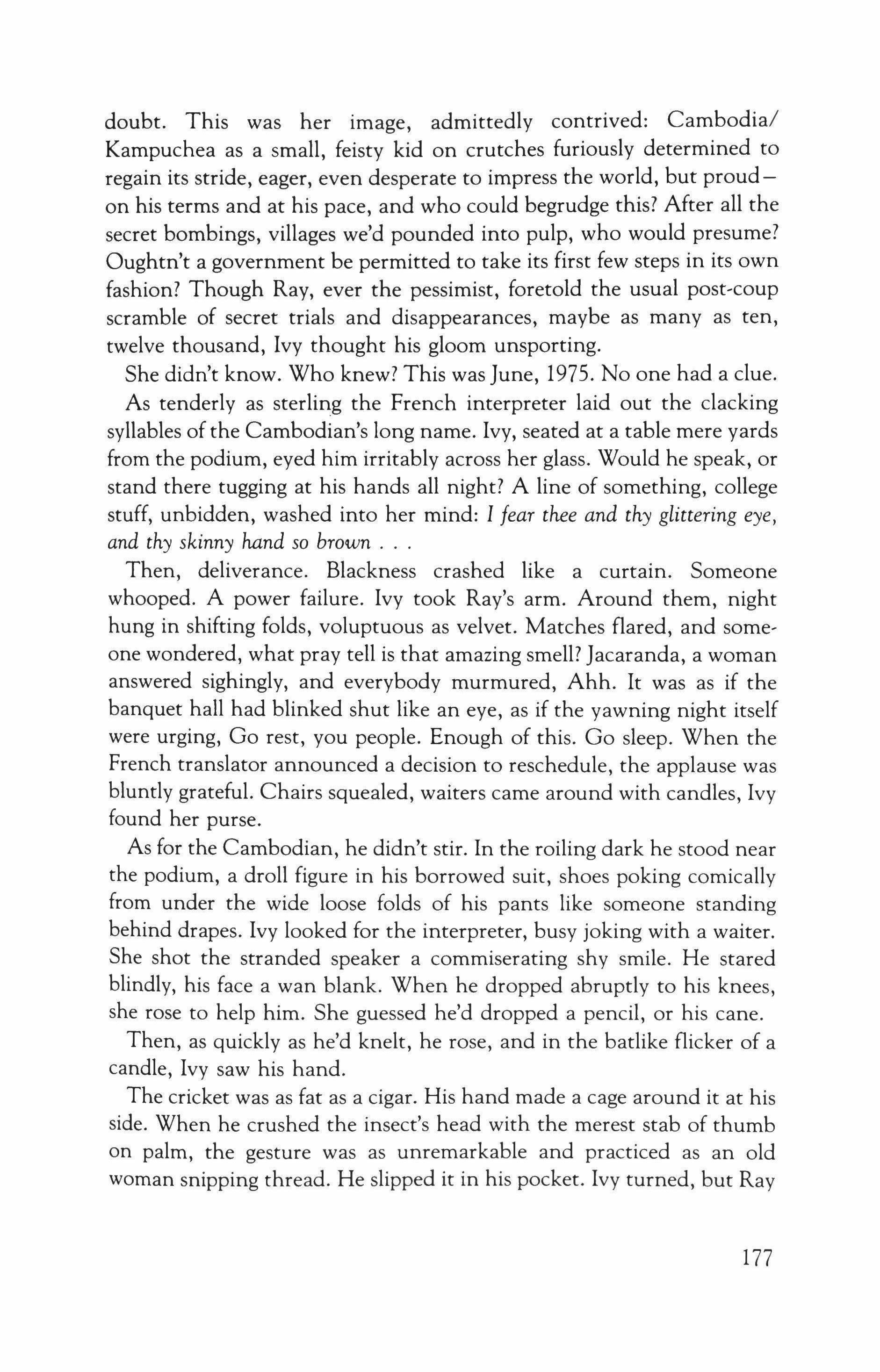
doubt. This was her image, admittedly contrived: Cambodia/ Kampuchea as a small, feisty kid on crutches furiously determined to regain its stride, eager, even desperate to impress the world, but proudon his terms and at his pace, and who could begrudge this? After all the secret bombings, villages we'd pounded into pulp, who would presume? Oughtn't a government be permitted to take its first few steps in its own fashion? Though Ray, ever the pessimist, foretold the usual post-coup scramble of secret trials and disappearances, maybe as many as ten, twelve thousand, Ivy thought his gloom unsporting.
She didn't know. Who knew? This was June, 1975. No one had a clue.
As tenderly as sterling the French interpreter laid out the clacking syllables of the Cambodian's long name. Ivy, seated at a table mere yards from the podium, eyed him irritably across her glass. Would he speak, or stand there tugging at his hands all night? A line of something, college stuff, unbidden, washed into her mind: I fear thee and thy glittering eye, and thy skinny hand so brown
Then, deliverance. Blackness crashed like a curtain. Someone whooped. A power failure. Ivy took Ray's arm. Around them, night hung in shifting folds, voluptuous as velvet. Matches flared, and someone wondered, what pray tell is that amazing smell? Jacaranda, a woman answered sighingly, and everybody murmured, Ahh. It was as if the banquet hall had blinked shut like an eye, as if the yawning night itself were urging, Go rest, you people. Enough of this. Go sleep. When the French translator announced a decision to reschedule, the applause was bluntly grateful. Chairs squealed, waiters came around with candles, Ivy found her purse.
As for the Cambodian, he didn't stir. In the roiling dark he stood near the podium, a droll figure in his borrowed suit, shoes poking comically from under the wide loose folds of his pants like someone standing behind drapes. Ivy looked for the interpreter, busy joking with a waiter. She shot the stranded speaker a commiserating shy smile. He stared blindly, his face a wan blank. When he dropped abruptly to his knees, she rose to help him. She guessed he'd dropped a pencil, or his cane.
Then, as quickly as he'd knelt, he rose, and in the batlike flicker of a candle, Ivy saw his hand.
The cricket was as fat as a cigar. His hand made a cage around it at his side. When he crushed the insect's head with the merest stab of thumb on palm, the gesture was as unremarkable and practiced as an old woman snipping thread. He slipped it in his pocket. Ivy turned, but Ray
177
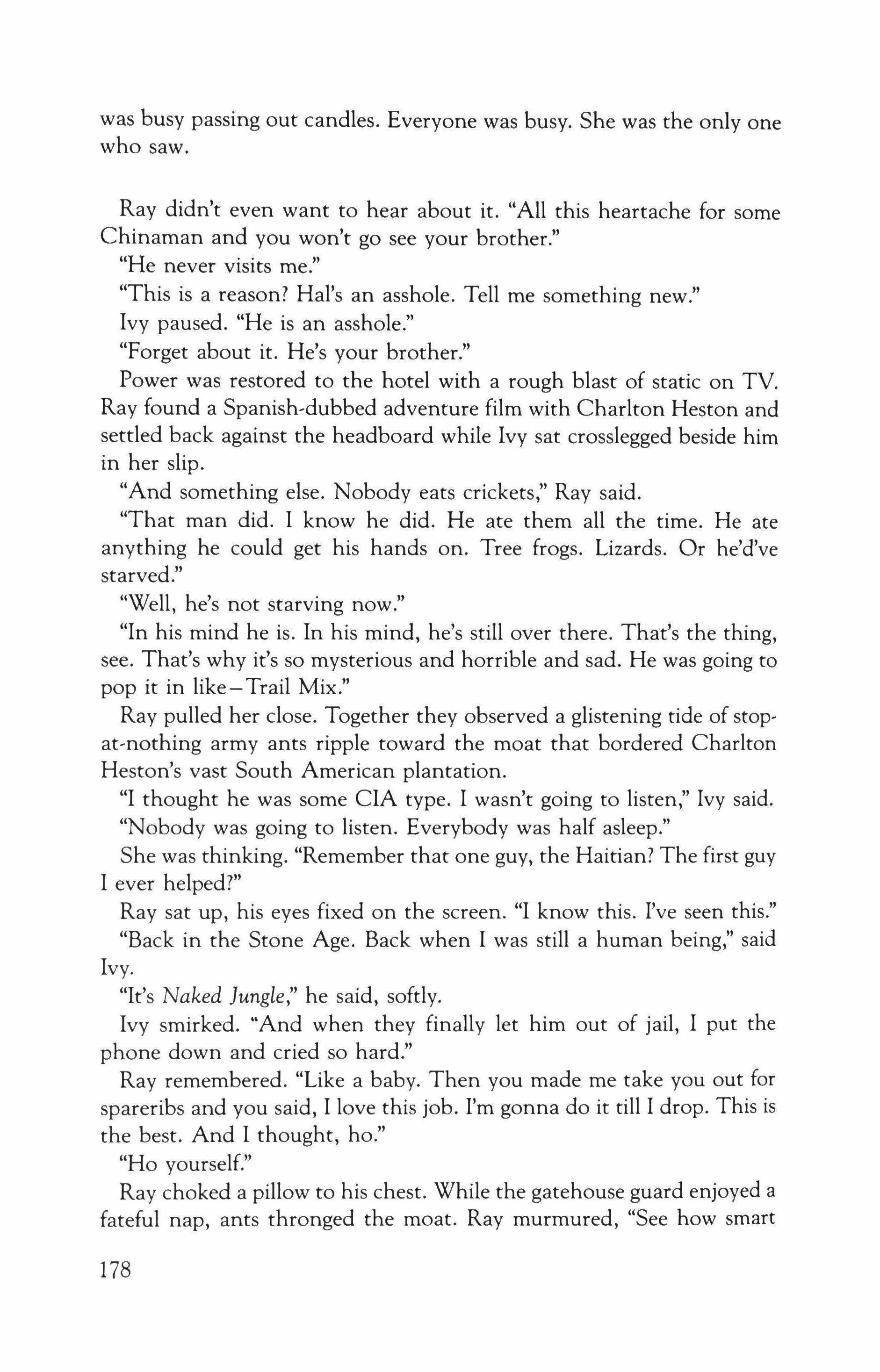
was busy passing out candles. Everyone was busy. She was the only one who saw.
Ray didn't even want to hear about it. "All this heartache for some Chinaman and you won't go see your brother."
"He never visits me."
"This is a reason? Hal's an asshole. Tell me something new."
Ivy paused. "He is an asshole."
"Forget about it. He's your brother."
Power was restored to the hotel with a rough blast of static on TV. Ray found a Spanish-dubbed adventure film with Charlton Heston and settled back against the headboard while Ivy sat crosslegged beside him in her slip.
"And something else. Nobody eats crickets," Ray said.
"That man did. I know he did. He ate them all the time. He ate anything he could get his hands on. Tree frogs. Lizards. Or he'd've starved."
"Well, he's not starving now."
"In his mind he is. In his mind, he's still over there. That's the thing, see. That's why it's so mysterious and horrible and sad. He was going to pop it in like-Trail Mix."
Ray pulled her close. Together they observed a glistening tide of stopat-nothing army ants ripple toward the moat that bordered Charlton Heston's vast South American plantation.
"I thought he was some CIA type. I wasn't going to listen," Ivy said. "Nobody was going to listen. Everybody was half asleep."
She was thinking. "Remember that one guy, the Haitian? The first guy I ever helped?"
Ray sat up, his eyes fixed on the screen. "I know this. I've seen this."
"Back in the Stone Age. Back when I was still a human being," said Ivy.
"It's Naked Jungle," he said, softly.
Ivy smirked. "And when they finally let him out of jail, I put the phone down and cried so hard."
Ray remembered. "Like a baby. Then you made me take you out for spareribs and you said, I love this job. I'm gonna do it till I drop. This is the best. And I thought, ho."
"Ho yourself."
Ray choked a pillow to his chest. While the gatehouse guard enjoyed a fateful nap, ants thronged the moat. Ray murmured, "See how smart
178
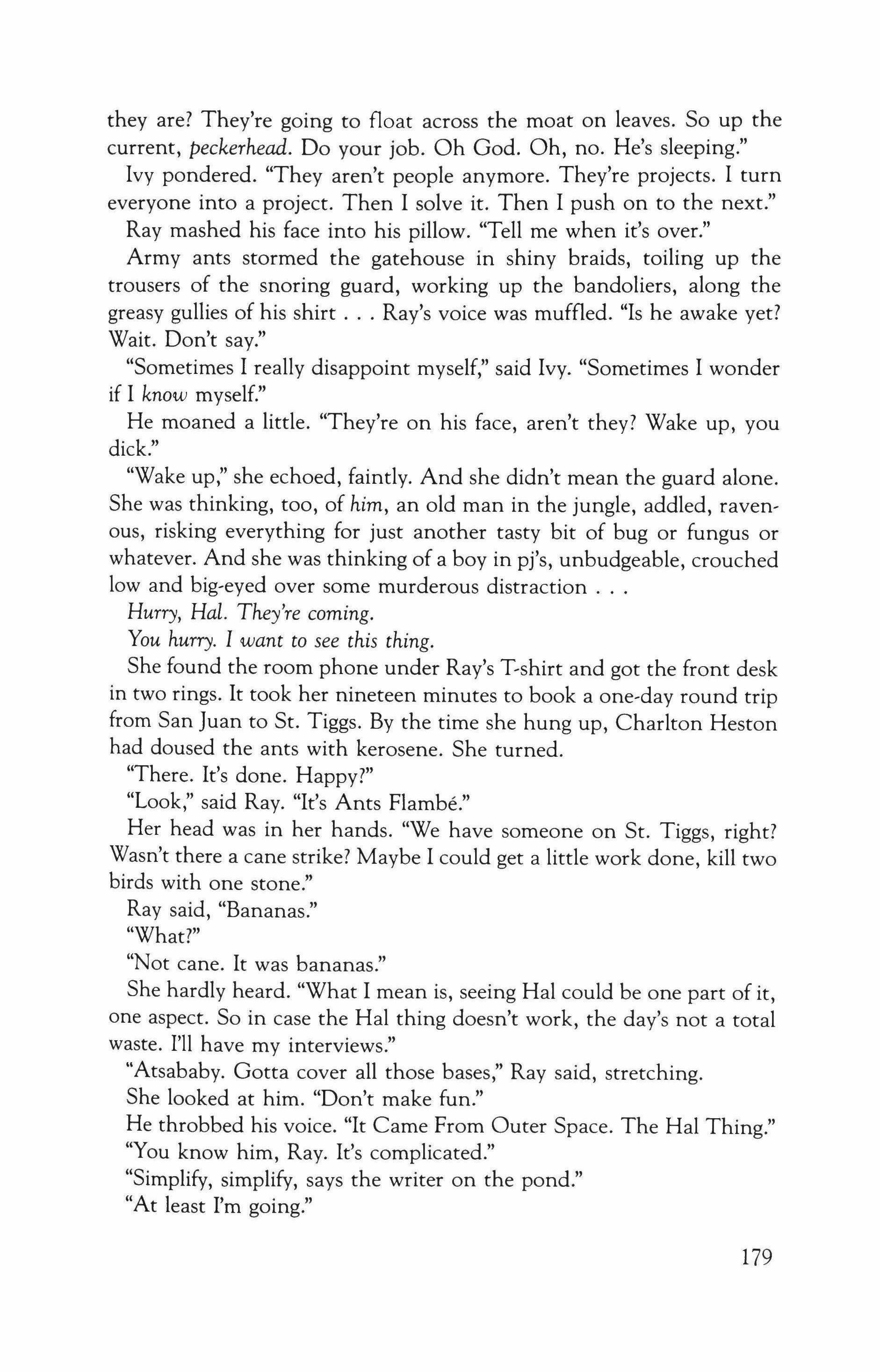
they are? They're going to float across the moat on leaves. So up the current, peckerhead. Do your job. Oh God. Oh, no. He's sleeping."
Ivy pondered. "They aren't people anymore. They're projects. I turn everyone into a project. Then I solve it. Then I push on to the next."
Ray mashed his face into his pillow. "Tell me when it's over."
Army ants stormed the gatehouse in shiny braids, toiling up the trousers of the snoring guard, working up the bandoliers, along the greasy gullies of his shirt Ray's voice was muffled. "Is he awake yet? Wait. Don't say."
"Sometimes I really disappoint myself," said Ivy. "Sometimes I wonder if I know myself."
He moaned a little. "They're on his face, aren't they? Wake up, you dick."
"Wake up," she echoed, faintly. And she didn't mean the guard alone. She was thinking, too, of him, an old man in the jungle, addled, ravenous, risking everything for just another tasty bit of bug or fungus or whatever. And she was thinking of a boy in pj's, unbudgeable, crouched low and big-eyed over some murderous distraction
Hurry, Hal. They're coming.
You hurry. I want to see this thing.
She found the room phone under Ray's T-shirt and got the front desk in two rings. It took her nineteen minutes to book a one-day round trip from San Juan to St. Tiggs. By the time she hung up, Charlton Heston had doused the ants with kerosene. She turned.
"There. It's done. Happy?"
"Look," said Ray. "It's Ants Flambe."
Her head was in her hands. "We have someone on St. Tiggs, right? Wasn't there a cane strike? Maybe I could get a little work done, kill two birds with one stone."
Ray said, "Bananas."
"What?"
"Not cane. It was bananas."
She hardly heard. "What I mean is, seeing Hal could be one part of it, one aspect. So in case the Hal thing doesn't work, the day's not a total waste. I'll have my interviews."
"Atsababy. Gotta cover all those bases," Ray said, stretching.
She looked at him. "Don't make fun."
He throbbed his voice. "It Came From Outer Space. The Hal Thing."
"You know him, Ray. It's complicated."
"Simplify, simplify, says the writer on the pond."
"At least I'm going."
179
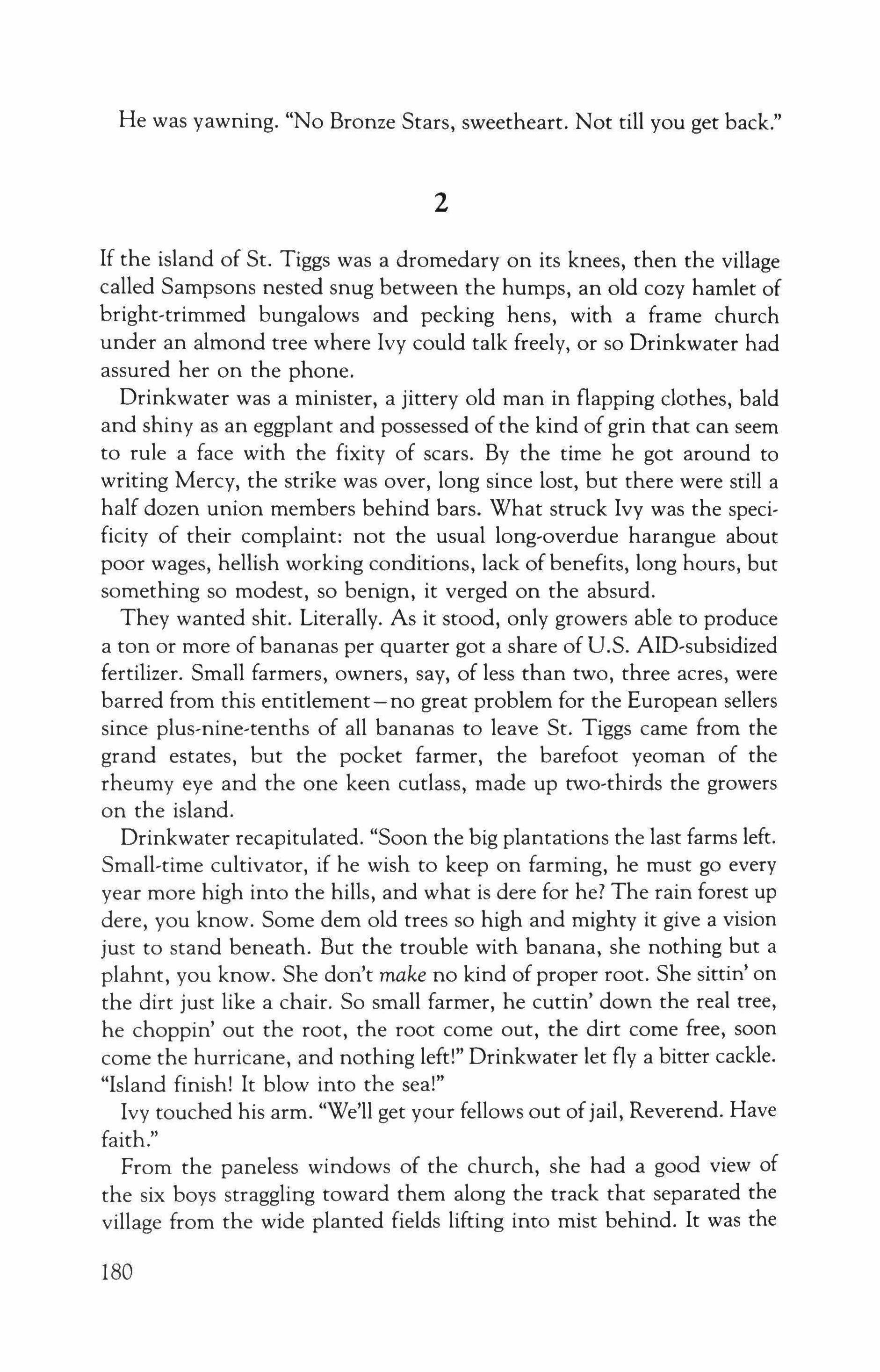
He was yawning. "No Bronze Stars, sweetheart. Not till you get back."
2
If the island of St. Tiggs was a dromedary on its knees, then the village called Sampsons nested snug between the humps, an old cozy hamlet of bright-trimmed bungalows and pecking hens, with a frame church under an almond tree where Ivy could talk freely, or so Drinkwater had assured her on the phone.
Drinkwater was a minister, a jittery old man in flapping clothes, bald and shiny as an eggplant and possessed of the kind of grin that can seem to rule a face with the fixity of scars. By the time he got around to writing Mercy, the strike was over, long since lost, but there were still a half dozen union members behind bars. What struck Ivy was the specificity of their complaint: not the usual long-overdue harangue about poor wages, hellish working conditions, lack of benefits, long hours, but something so modest, so benign, it verged on the absurd. They wanted shit. Literally. As it stood, only growers able to produce a ton or more of bananas per quarter got a share of U.S. AID-subsidized fertilizer. Small farmers, owners, say, of less than two, three acres, were barred from this entitlement - no great problem for the European sellers since plus-nine-tenths of all bananas to leave St. Tiggs came from the grand estates, but the pocket farmer, the barefoot yeoman of the rheumy eye and the one keen cutlass, made up two-thirds the growers on the island.
Drinkwater recapitulated. "Soon the big plantations the last farms left. Small-time cultivator, if he wish to keep on farming, he must go every year more high into the hills, and what is dere for he? The rain forest up dere, you know. Some dem old trees so high and mighty it give a vision just to stand beneath. But the trouble with banana, she nothing but a plahnt, you know. She don't make no kind of proper root. She sittin' on the dirt just like a chair. So small farmer, he cuttin' down the real tree, he choppin' out the root, the root come out, the dirt come free, soon come the hurricane, and nothing left!" Drinkwater let fly a bitter cackle. "Island finish! It blow into the sea!"
Ivy touched his arm. "We'll get your fellows out ofjail, Reverend. Have faith."
From the paneless windows of the church, she had a good view of the six boys straggling toward them along the track that separated the village from the wide planted fields lifting into mist behind. It was the
180

same track that ringed the entire island like a charm bracelet, the charms being, Ivy guessed, those armless windmills from back before the rise of beets and corn, back when sugarcane was king. Hal lived in one of those abandoned windmills. Drinkwater could have told her which, but she'd decided early on she wouldn't ask. Best let the old man think it was his letter brought her.
"Are these my interviews?" she asked.
"Dese is some."
Some kids wore red handkerchieves around their necks, PLO style: had Drinkwater told them they'd be on American TV? Sources said all kinds of things to get people to talk. Offered cash, promised visas, booze-they thought they were doing you a favor.
"And all these kids went to jail for belonging to the union."
"Maybe all. Maybe some it happen only to the father or the brother. But all cahn tell you something."
"Nice work, Reverend."
"I try to get the lawyer, too, you know, but such short notice
She shook her head. "Kids are perfect."
"Shall I ahsk them ?"
"One at a time, please. If you don't mind."
Fear made ninnies out of One and Two. They sipped their Tings and made determined studies of their shoes. Three was more relaxed, but bland, withholding, she couldn't crack the nut. Four got sick of waiting and bailed out before his turn, and Five kept craning around while she was talking to observe a girl washing her hair in a tin tub in the yard next door.
Then came Eldred. Ivy perked. He was a thick sullen boy with a rope to cinch his trousers where the zipper stopped halfway, but his big hands held the fine tremor of palmetto leaves before a gale, and Ivy, who knew the signs, bore down.
"I tellin' she in Queen plain English. Somet'in matter wit' she ears?"
Drinkwater leaned in. "She knows this, Eldred. She is appreciating your good effort here."
"Appreciate?" Eldred cut Drinkwater a wink. "Appreciate me take her through de night, mahn. She have all night for Eldred?"
"You were going to tell me about jail," Ivy said.
"Me see dem here from New York City, Pahm Beach, Mee-ahmi Beach. Dern t'ink dey visitin' a stud farm," Eldred groused.
"Shall we turn the tape off?" Ivy said.
He yawned. "Me need a beer."
181
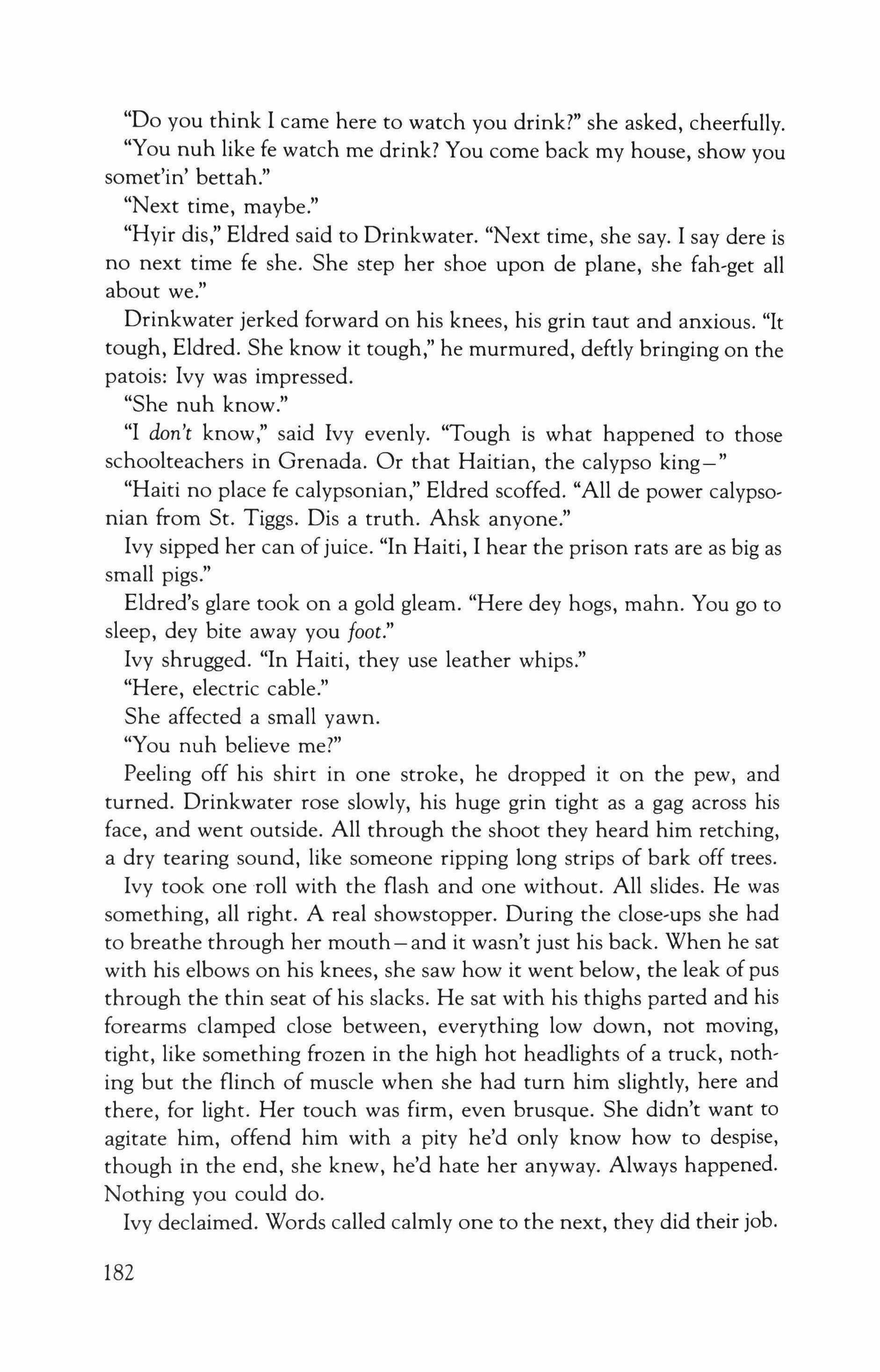
"Do you think I came here to watch you drink?" she asked, cheerfully. "You nuh like fe watch me drink? You come back my house, show you somet'in' bettah."
"Next time, maybe."
"Hvir dis," Eldred said to Drinkwater. "Next time, she say. I say dere is no next time fe she. She step her shoe upon de plane, she fah-get all about we."
Drinkwater jerked forward on his knees, his grin taut and anxious. "It tough, Eldred. She know it tough," he murmured, deftly bringing on the patois: Ivy was impressed.
"She nuh know."
"I don't know," said Ivy evenly. "Tough is what happened to those schoolteachers in Grenada. Or that Haitian, the calypso king-"
"Haiti no place fe calypsonian," Eldred scoffed. "All de power calypso, nian from St. Tiggs. Dis a truth. Ahsk anyone."
Ivy sipped her can ofjuice. "In Haiti, I hear the prison rats are as big as small pigs."
Eldred's glare took on a gold gleam. "Here dey hogs, mahn. You go to sleep, dey bite away you foot."
Ivy shrugged. "In Haiti, they use leather whips."
"Here, electric cable."
She affected a small yawn.
"You nuh believe me?"
Peeling off his shirt in one stroke, he dropped it on the pew, and turned. Drinkwater rose slowly, his huge grin tight as a gag across his face, and went outside. All through the shoot they heard him retching, a dry tearing sound, like someone ripping long strips of bark off trees.
Ivy took one roll with the flash and one without. All slides. He was something, all right. A real showstopper. During the close-ups she had to breathe through her mouth - and it wasn't just his back. When he sat with his elbows on his knees, she saw how it went below, the leak of pus through the thin seat of his slacks. He sat with his thighs parted and his forearms clamped close between, everything low down, not moving, tight, like something frozen in the high hot headlights of a truck, nothing but the flinch of muscle when she had turn him slightly, here and there, for light. Her touch was firm, even brusque. She didn't want to agitate him, offend him with a pity he'd only know how to despise, though in the end, she knew, he'd hate her anyway. Always happened. Nothing you could do.
Ivy declaimed. Words called calmly one to the next, they did their job.
182

She told him how the pictures would be used, and why he should be very proud, and what he had to do if he meant to heal.
"You'll get maggots, Eldred. It's no joke." While the film rewound, Ivy put away her lenses. "Reverend said he gave you pills. Are you taking them?"
The boy was shivering.
"Anyway, it's over. Put your shirt on. You were great."
He rose. "Mahn wit' your name living hyir. Live up Frenchman Cove." Well, here we go, thought Ivy, startled. Here it comes.
"Your name, your face, your voice exahck. And pretty like you, too. Maybe he more pretty." Eldred smoothed his slacks.
"It's a fairly common name," she said.
"That's all right, El." Drinkwater was coming down the aisle.
"He drivin' one of Santy Mini-Makes. You know it Santy when you see on de side, it written, 'RastaSafari Mountain Tours.'" Eldred's voice was scrupulously neutral, but he had her, she could see it in his eyes, the bitter triumph, the scoring kick. "Tourist girl come skippin' off the cruise ship, she got she Thomas Cook traveler check, she got she head full of an idea, she just must have she a true-life Cahribbean ahdventure." He blinked. "And so she do, mahn. So she do."
Ivy'd read about the outlaw rastamen who hid out in the hills, not the millionaire recording artists, the toasters, the emcees, but the real article, the roorv-headed Nattys, crazy, bold as jays, such artful farmers you could be nose-to-nose with a thousand-dollar plant and think you were looking at a fern. She sighed.
"So what is it, Eldred? This fella Santy and his RastaSafari Tours do a little extralegal cultivating on the side?"
He didn't smile. "Do I say dis?"
"Boy, you fixin' to make me vex?" Drinkwater inquired.
"I hopin' wake she up a little, she go mek sport of me. Woman simple, mahn."
Ivy said, "Oh, heck."
"De white boy eye exahck, mahn. I amaze dey let she off de plane." Eldred flapped a careless palm at Ivy's face.
Drinkwater grinned. "Woman only wish to help you and you tellin' she dis shit. She nuh kyeer. Y'understahnd? Get out."
So he knew about Hal, too, thought Ivy. Everybody knew. One look at her and it was evidently obvious, whatever Hal was doing, or had done. And now they had her, bastards, the bud of fear was in her throat, thickening, pinching up her breath.
183

Drinkwater had a bottlecap. He jigged it in his hand. Across the street, lashed to a tire, a muddy sow strained toward a banana peel. When a girl came up beside the sow and started taking down the flat rounds of cassava dough from a clothesline, the sow slumped back on its haunches and sank its snout between its knuckles with a groan.
"He not a bahd boy, you know." Drinkwater was keeping Ivy company while she waited for a cab. "I don't know why he give you such a dusty time."
"He belongs in a hospital. He's putrefying," she said.
He chuckled. "Now you say this. Ahfter you get all the picture."
She was tired. "Would you like them, Reverend?"
"What?"
"Because you can have them. We can stop this thing right here."
"So dahm tough."
"Not so tough."
A flatbed truck with shirtless laborers in back went by. On the doors a slogan gleamed. Don't make no fuss. Revolution is a must. Ivy stared out at the cane fields tilting steeply toward the hills. Skeins of mist twisted high along the green, here dragon-humped, there loose as napkins raveled into shreds. She wished Drinkwater would go away.
"Was it eight years ago, the famous hurricane?" she offered brightly.
"Seven year, two month, six day."
"I remember watching it on television. All the volunteers, the airlift, everybody chipping in from all over. It made quite an impression on me.
Drinkwater grunted. "That dahm airlift. One crate, it landed in my own yard, you know."
"Really?"
"Smack in the button tree." He nodded. "Me son Evan, he fetch it down on his own bahck. So much excitement. Everybody makin' haste to see this thing, you know. Everybody mashin' close to see."
Ivy prodded. "And?"
"Frostbite medecine."
She stared. "They gave you medicine for frostbite on St. Tiggs?"
Drinkwater rubbed his face, his grin as fixed and huge as ever. "My neighbor get a sky box, too. All the way from Germany. Sixteen blowup igloo."
"Stop."
"White man come up in a truck, give him seven dollar fe fetch them out. Good riddance to bad rubbish, I say. Then last month I visitin' me auntie, and right there in she yard dis dahm t'ing. I cahn't believe my
184

eyes. Since when you fix your mind on turning Eskimo? I ask her. Say she gwan use it for a chicken coop. Ten dollar she payout on dat t'ing. And don't you know she chicken never lay one egg. Not one."
It's the kind of story Ray would love, thought Ivy. Her husband was a great collector of horror stories about foreign aid. He hated it himself. Time to stop playing Papa to the world, was his line on it. Give him the choice, he'd stop it all, the subsidies, the pseudo-loans, even Peace Corps. Let the kids out of the crib, let em scrape their knees and catch their colds and bump their pointy little heads-they're going to break our hearts eventually, he said. Sooner we get used to the idea, the better. Ivy used to argue that he missed the point, which had occurred to her one time in Cairo when she heard an English hippie bitching about cabfare to the Pyramids. "Three times wot they charge the locals," the lad had grumbled. "Ask me, it ain't ethical. Do I look like a millionaire to you?" What he'd looked, of course, was beggarly, but what kind of beggar moseys halfway around the world to claim his alms? Never mind the cold sores and serape, his very presence was imperial. The sheer fact of his being there at all implied a privilege so freakish, so extreme, it was a wonder he wasn't handcuffed on the spot.
"You call it charity:' she'd told Ray, "but maybe it's more like a tax. Like hush money, if you see. The penalty we pay for being suffered the capacity to pay at all."
"Taxes give you back something," he'd shot back. "Roads, libraries, Poets in the Schools. What's the last thing Togo did for you?"
Ivy smiled. "Maybe the point is what they don't do."
Ray got a big kick out of that. "So we owe them for not wasting us. They're doing us a favor. Thank you, Egypt. Thank you, Chad. Thank you all for being such good sports about what pigs we are."
He was one cool customer, her husband. He once admitted if Mercy hadn't got him first, he might have joined the CIA. But back to Drinkwater, a man of God, a man with news. Ivy put it to him.
"Who's Santy, Reverend?"
The old man paused. "This a bahd bunch you asking me about, Miss Glover."
"I don't doubt that Hal Glover is many things you don't approve of, sir, but if you know him, you know he's not bad."
Drinkwater ran his thumb along the edge of the bottlecap and flipped it high, his grin hitched tight. "You takin' him bahck home?"
"1 thought this was his home."
He lobbed the bottlecap at the sow. "You will help a boy like Eldred,
185

boy you never met, but this other, your own true blood, your face exahct-"
"Is that a cab?" she broke in, squinting. When it slowed, she turned to shake Drinkwater's hand. He held on to it as if it were a bird about whose navigational ability he had grave doubts.
"You think I speakin' out of turn."
"Forget about it. Just make Eldred take his pills."
His grin was wide. "Charity begin at home, Miss Glover."
"Helping Eldred isn't charity. And my home is in New York."
3
The taxi left her at the scrubby entrance of an unmarked road that looked perfectly negotiable to Ivy, but the driver pled bad shocks, and so she walked. The hour was noon and the heat was foul; against her neck the sun was blunt as cloth. Broadleafed trees spiked the road at careless intervals, and it was these that Ivy aimed for as she trudged, making beelines from one deep splotch of shade to the next as if this were a version of the old game of connect-the-dots, writ large. Two kilometah, the driver had decreed. Ivy put down her camera bag and dried her hands across her shirt. Small reptiles scuffled in the cane to either side of her, shy things, bellies dragging, moving in thick spurts at the sound of her approach. When the stubby tower of the windmill swung into view, she realized she was panting.
Ivy paused under a gourd tree to cool her breath.
Hal's Mini-Moke, a yellow Jeep-ish thing, but slighter, topless, almost toylike, stood up to its hubs in weeds full of birds. Painted writing glittered on the sides: "Island RastaSafari Tours," with a phone number beneath. When she picked her away across the scrubby yard to the open doorway of the windmill, birds lifted screaming from the grass. She stepped in.
A cool ruminative reggae played on a radio. Her brother, humming, stood at a table made of planks on barrels, sorting seed packets into groups. His back to her, he hadn't heard her come. Ivy saw the leather bomber jacket hanging from a peg, and the disheveled sleeping bag on the cot, green geese beating across a flannelly red sea. Flats of leggy seedlings packed in skinny cut-off juice cans were all over. Ivy set down her camera and lifted up a can. She touched the seedling's feathered leaves to her face. He still hadn't turned around. Straw mats softened the slate floor and the missing roof let in a pale, swarmy shaft of light as
186

wide around as a sequoia. High up, swallows featherstitched the blue, and at night, she saw, there would be bats, but at least these thick walls cut the trade winds, and the framed view of the stars through that perfect 0 above would be like looking through a spyglass: cozy.
A pair of gum boots on a cane chair bloomed with fat-fingered work gloves: she wondered if these were the gloves she'd brought Hal back in Mexico along with all his other gear, shears, trowels, sack full of ropy corms. They were good gloves, stiff with lore. The story went like this.
When Hal was sixteen and high on who knows what, he took it on himself to climb a billboard on Route 9 (his father's way to work) and white out the giant eyeballs on the Marlboro man (the horse he left alone). That blind-as-Virgil cowpoke made the news, but the judge was not amused. He gave the surgeon's son a choice: one week in juvie or a summer planting Norway spruce in rest stops along the Massachusetts Turnpike. Planting trees was the judge's notion of community service, and service Hal provided, if a far cry from the judge's original design: each day at lunch, Hal visited a parked semi. There were always two or three around, and when word got out, he could pull in five and six. By summer's end with his noon earnings Hal could afford to buy not only his first vehicle - a sputtery red pickup - but his first good pair of gardening gloves, shears, clippers, spades and trowels.
And that's when it began. Hal worked in arboretums, private nurseries, then, after he quit college, gardens in the Yucatan, Bahamas, Guadeloupe. My great good friends, he called his various employers, and for awhile they were. The famous painter, the nail-polish-remover king, the guy who'd been Bianca Jagger's chef, they all fell in love with Hal, swore he was a gem, a jewel, the diagrams, the things he did with foliage and grasses, astounding really, he gets something going with a garden you swear the plants know when he's coming, even cross their leaves and quake a little, bow their stems.
Then came the postcard, the slip of a PS. BGD's to follow, he'd write her (family shorthand for Boring Gory Details, which in itself was shorthand for disaster), but meantime, no more letters to Mr. Thus-And-So's address.
"Something came up and it stopped working. I'm still trying to figure it all out."
Well, Ivy didn't have to try. What "came up," of course, was Hal. Not dance-your-ass-off, quip-a-minute, pretty-as-a-pinup Hal, not the Hal who could set your pulse to racing fast as meth - Hal the Plum, the Superfine, the Shining Golden Spoils. What came up was Harold Stern Glover, surgeon's son, the closet driven drudge. A bloody workaholic,
187
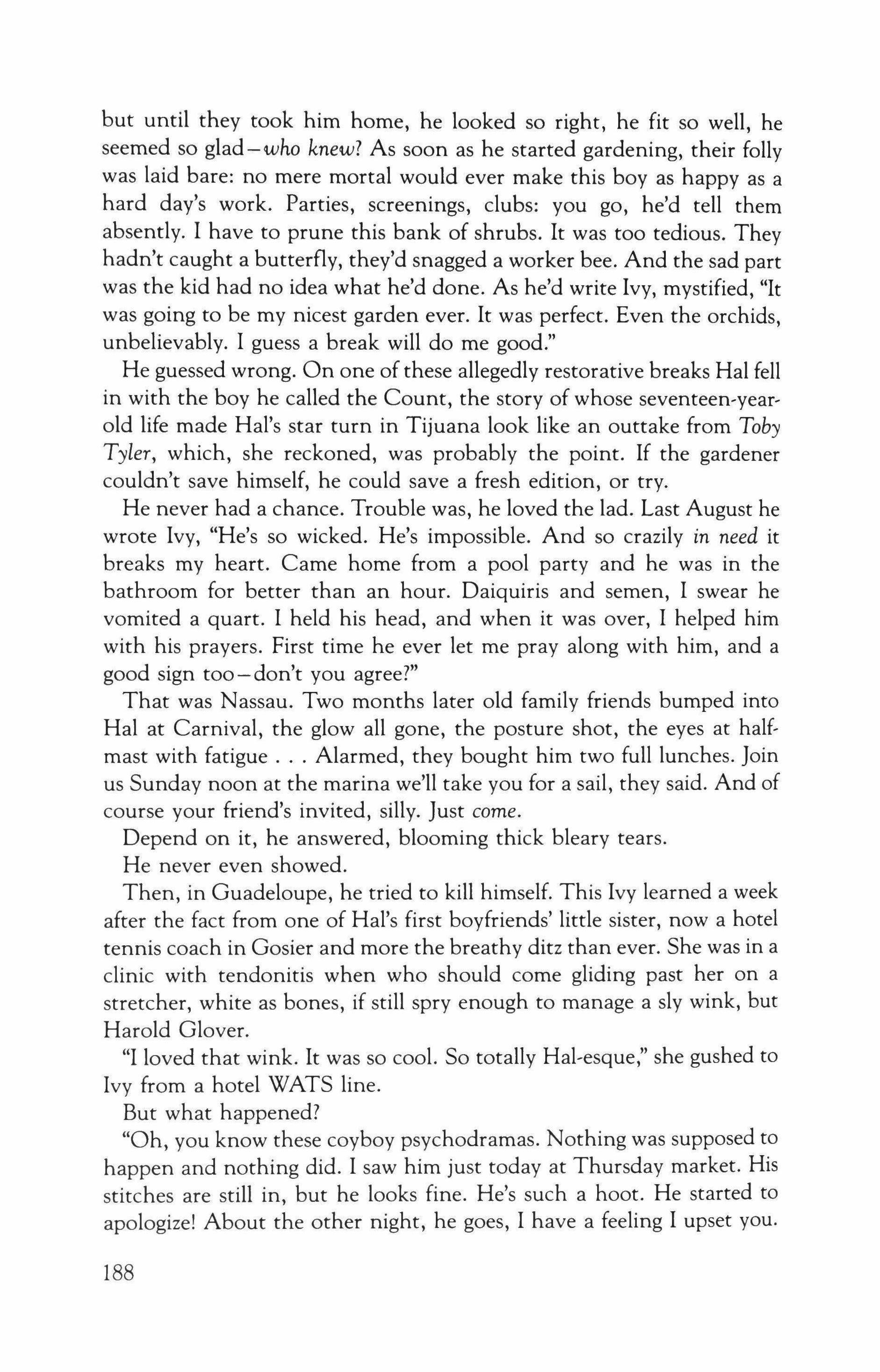
but until they took him home, he looked so right, he fit so well, he seemed so glad-who knew? As soon as he started gardening, their folly was laid bare: no mere mortal would ever make this boy as happy as a hard day's work. Parties, screenings, clubs: you go, he'd tell them absently. I have to prune this bank of shrubs. It was too tedious. They hadn't caught a butterfly, they'd snagged a worker bee. And the sad part was the kid had no idea what he'd done. As he'd write Ivy, mystified, "It was going to be my nicest garden ever. It was perfect. Even the orchids, unbelievably. I guess a break will do me good."
He guessed wrong. On one of these allegedly restorative breaks Hal fell in with the boy he called the Count, the story of whose seventeen-yearold life made Hal's star turn in Tijuana look like an outtake from Toby Tyler, which, she reckoned, was probably the point. If the gardener couldn't save himself, he could save a fresh edition, or try.
He never had a chance. Trouble was, he loved the lad. Last August he wrote Ivy, "He's so wicked. He's impossible. And so crazily in need it breaks my heart. Came home from a pool party and he was in the bathroom for better than an hour. Daiquiris and semen, I swear he vomited a quart. I held his head, and when it was over, I helped him with his prayers. First time he ever let me pray along with him, and a good sign too-don't you agree?"
That was Nassau. Two months later old family friends bumped into Hal at Carnival, the glow all gone, the posture shot, the eyes at halfmast with fatigue Alarmed, they bought him two full lunches. Join us Sunday noon at the marina we'll take you for a sail, they said. And of course your friend's invited, silly. Just come.
Depend on it, he answered, blooming thick bleary tears.
He never even showed.
Then, in Guadeloupe, he tried to kill himself. This Ivy learned a week after the fact from one of Hal's first boyfriends' little sister, now a hotel tennis coach in Gosier and more the breathy ditz than ever. She was in a clinic with tendonitis when who should come gliding past her on a stretcher, white as bones, if still spry enough to manage a sly wink, but Harold Glover.
"I loved that wink. It was so cool. So totally Hal-esque," she gushed to Ivy from a hotel WATS line.
But what happened?
"Oh, you know these coyboy psychodramas. Nothing was supposed to happen and nothing did. I saw him just today at Thursday market. His stitches are still in, but he looks fine. He's such a hoot. He started to apologize! About the other night, he goes, I have a feeling I upset you.
188

Me? I say. A little thing like slashed wrists? Don't be daft. Then I asked him, just straight up. What's up, Hally? Who's the bastard broke your heart? He said, No one. I said, Hal. He said, People make me sad."
Ivy waited. "People make him sad? That's it?"
"Well, no, that's not all of it. It turns out there was this coach in high school, a football coach, a little weekly skirmish in the boiler room -"
Ivy sighed. "Oh, lord."
"Well, forgive me if I'm boring you."
"There was no football coach at the Academy," said Ivy. "There was no football, period. Hal fenced, and played lacrosse."
4
When they hugged, fingers skating up and down their sides, Ivy felt at once how thin he was, the ribs crowded as a comb.
She said, "Oh, now."
Hal spoke into her hair. "I thought at first you were this guy. I had an appointment with this person, but it seems to be not happening, I guess."
She breathed his skin, the stale dank of it. "Maybe he got lost."
"People are so rude sometimes," he said.
Ivy stepped back to see his face. "Hey. You're worked up about this."
He thumbed his eyes. "So how long can you stay?"
She peered. "Who is this guy? Hal. Say."
"Nobody." He wiped his nose. "I don't know. A Texan. Someone's friend. I do these nature tours, the rain forest, the volcano. Listen, can we start again?" He smiled. "Hi," he told her, firmly. "What an unexpected treat."
She smiled. "Well, hey, as long as I was in the hemisphere."
He led her to the makeshift table and set her on the stool. "Juice?"
"I'm fine."
But he was already getting it, a pint of pomegranate juice with a small glass, and polishing the glass for her, and apologizing for his housekeeping, and the weedy mess outside. And now she could have been a neighbor popping in for a cup of sugar, that's how cool he was, how casual and loose: she was unnerved. She'd forgotten about how fast he moved, trying on one mood and tossing it aside for something new as lightly as a change of summer whites. When she explained about the conference in San Juan, and how all of a nutty sudden she decided to come on down for just the day, just do it, he hardly heard. He was gazing at her hair. She cleared her throat.
189

"I'm supposed to be giving this big lecture, but Ray said he'd give it for me." She paused. "It was a humdinger, if you want to know."
"Good old Ray," Hal murmured absently, head canted as he stared. And here was something else she'd managed to forget about him-his unwavering indifference to her husband and their work, to everything to do with Mercy, which he once likened to a group of torture groupies. Still, she persisted:
"Aren't you curious why I decided I should come?" "Sure."
"The wildest thing. This old Cambodian was just about to give a speech, when suddenly the lights went out, and all the waiters were scurrying around with candles-what are you gaping at?"
"Nothing."
She paused. "Anyway, here was this refugee just standing there, no mike, no lights, just all alone up there, and suddenly I saw him reach down for this-cricket, and he She couldn't tell him, it was ludicrous. She warmed. "I don't know. It made me miss you. It got me scared."
Hal leaned close. "You dyed it. You disappeared the gray."
"Tell me about these tours of yours," she said.
He shook his head. "Ray put you up to this, I bet."
"It's just a color rinse." Annoyance surged. "Come on."
"Husbands," Hal said, thoughtfully.
Ivy said, "Who's Santy? Is Santy your new boss?"
This startled him, and she was glad. Their eyes met hard.
"I don't have bosses. Not since Mexico."
"But that's his Jeep outside. And you do tours."
"Ivy Glover, girl detective," he said, lightly.
"Is Santy cute?"
"Cute, my dear, is not the word."
She blinked. "He's gorgeous, isn't he? And black, and big, and mean as hell, and does he pack an AKA7?"
"Uzi, actually, but he's better with a blade."
She stared at him. "What's his deal, Hally? Ganja?"
"Ganja?" he smirked back, amused. "You've been listening to too much reggae, dear."
"You think?"
Hal rolled his eyes. Fussed a little with a loose lock of his hair, fey and sullen as a schoolgirl. He was enjoying this. She sighed.
For starters, he said finally, Santy wasn't anything like black, he was the most delicious honey nutmeg, and he wasn't mean at all. He might
190
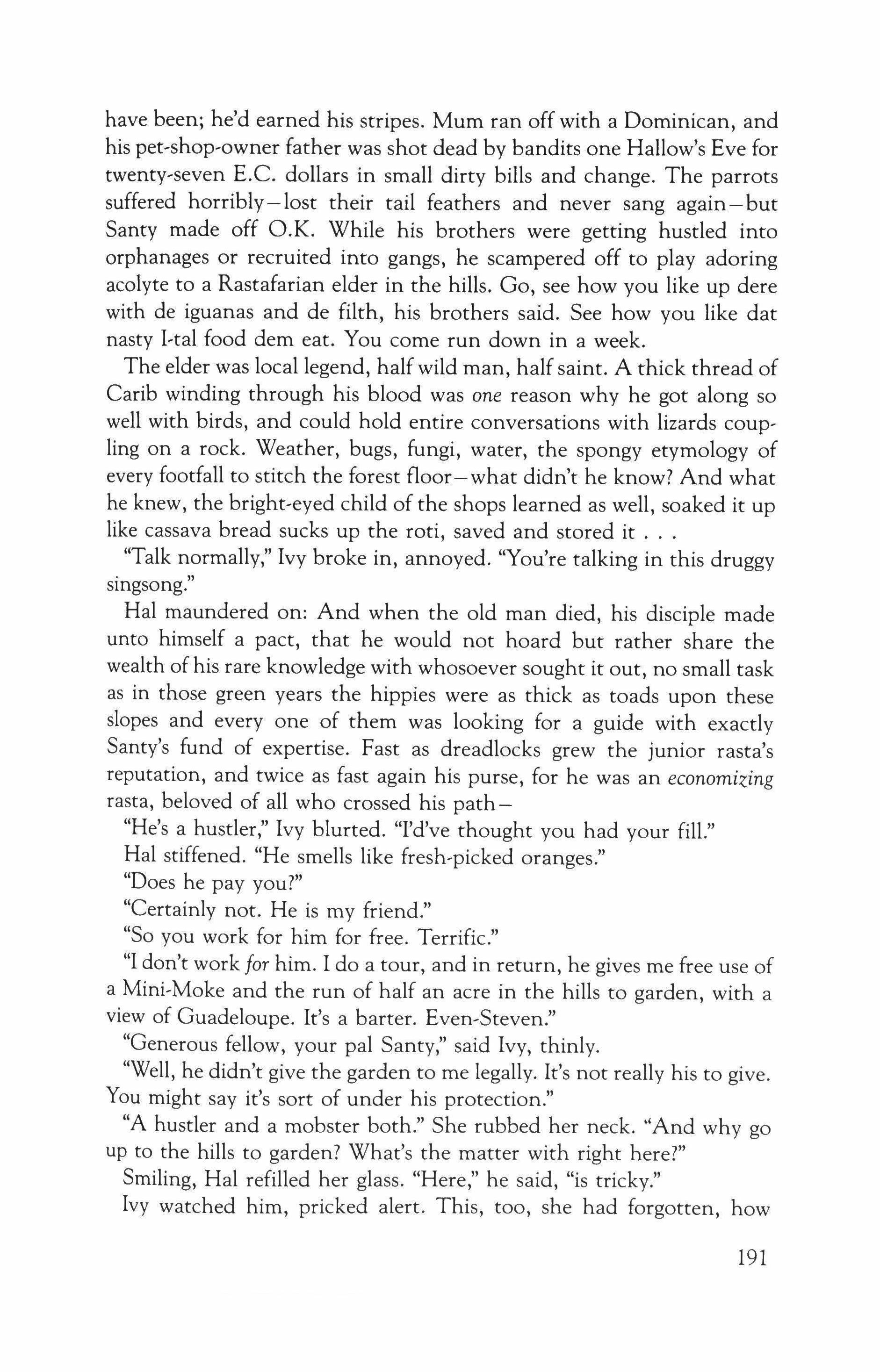
have been; he'd earned his stripes. Mum ran off with a Dominican, and his pet-shop-owner father was shot dead by bandits one Hallow's Eve for twenty-seven E.e. dollars in small dirty bills and change. The parrots suffered horribly -lost their tail feathers and never sang again - but Santy made off O.K. While his brothers were getting hustled into orphanages or recruited into gangs, he scampered off to play adoring acolyte to a Rastafarian elder in the hills. Go, see how you like up dere with de iguanas and de filth, his brothers said. See how you like dat nasty l-tal food dem eat. You come run down in a week.
The elder was local legend, half wild man, half saint. A thick thread of Carib winding through his blood was one reason why he got along so well with birds, and could hold entire conversations with lizards coupling on a rock. Weather, bugs, fungi, water, the spongy etymology of every footfall to stitch the forest floor-what didn't he know? And what he knew, the bright-eyed child of the shops learned as well, soaked it up like cassava bread sucks up the roti, saved and stored it
"Talk normally," Ivy broke in, annoyed. "You're talking in this druggy singsong."
Hal maundered on: And when the old man died, his disciple made unto himself a pact, that he would not hoard but rather share the wealth of his rare knowledge with whosoever sought it out, no small task as in those green years the hippies were as thick as toads upon these slopes and everyone of them was looking for a guide with exactly Santy's fund of expertise. Fast as dreadlocks grew the junior rasta's reputation, and twice as fast again his purse, for he was an economizing rasta, beloved of all who crossed his path-
"He's a hustler," Ivy blurted. "I'd've thought you had your fill."
Hal stiffened. "He smells like fresh-picked oranges."
"Does he pay you?"
"Certainly not. He is my friend."
"So you work for him for free. Terrific."
"I don't work for him. I do a tour, and in return, he gives me free use of a Mini-Moke and the run of half an acre in the hills to garden, with a view of Guadeloupe. It's a barter. Even-Steven."
"Generous fellow, your pal Santy," said Ivy, thinly.
"Well, he didn't give the garden to me legally. It's not really his to give. You might say it's sort of under his protection."
"A hustler and a mobster both." She rubbed her neck. "And why go up to the hills to garden? What's the matter with right here?"
Smiling, Hal refilled her glass. "Here," he said, "is tricky."
Ivy watched him, pricked alert. This, too, she had forgotten, how
191

when you talked to Hal it was like dealing with an extending telescope, the way things widened on you, one topic sort of sliding sneakily out of the last as if by design. She said, "Tricky."
Here, said Hal, was heaven, here was peachy-keen, until two Iranians from Ottawa decided to revive the derelict plantation as a sort of combo wildlife preserve and zoo. In my next lifetime maybe, figured Hal, and kept planting. Then a crew of laborers, mostly kids, began hauling trash out of the old chimneys. The eviction of the white squatter from the windmill was Step Two.
Ivy stopped him. "You're squatting here? You don't pay rent?"
"Everybody squats."
"They squat because they're destitute. You're not." She was trying not to sound put out, but really. Hal had money. Dr. Glover saw to that before he died. It wasn't much, it wouldn't put the kids Hal would never have through med school, but it wasn't nothing, either. Or was Hal still acting like the money wasn't his somehow, like if he never used it, just ignored it, left it lonely as a baby on a doorstep, maybe it would go away, attach itself to someone else, and he'd never have to feel foolish or embarrassed or incidental to his work or any of the other things that money makes you feel when you don't know where it comes from, or how it makes itself get fatter without you feeding it a thing, or generally by what trick of fate it ever wound up being yours at all
"I'll tell the bank to step up your allowance as soon as I get home."
But there was no more allowance. Hal no longer got one. That's what he was telling her.
Ivy said, "Again."
"I can't afford one."
"Hal, please. It's me here. Don't."
But he was telling her the truth. He even offered to get the list out. "It's a good list," he said, consolingly. "Really. You'd be proud. They're worthy causes. All nonprofit."
She held her neck. "Dear God."
"Hey, I even gave to Mercy. Least I think."
She moved her hand across her eyes and squeezed the lids. In the distance, gulls were shouting. "You think."
"Well, there were a bunch."
When Hal was younger, he'd read about some kid who'd started a special fund to reunite the Beatles. The kid had fifty dollars in his piggy bank. Hal sent twenty more. Ivy sighed. "Where were we?"
"The zoo," he said gently, and went on to explain how some thirtyseven jobs were in the offing: the Tiggians were enthralled. Then, as the
192
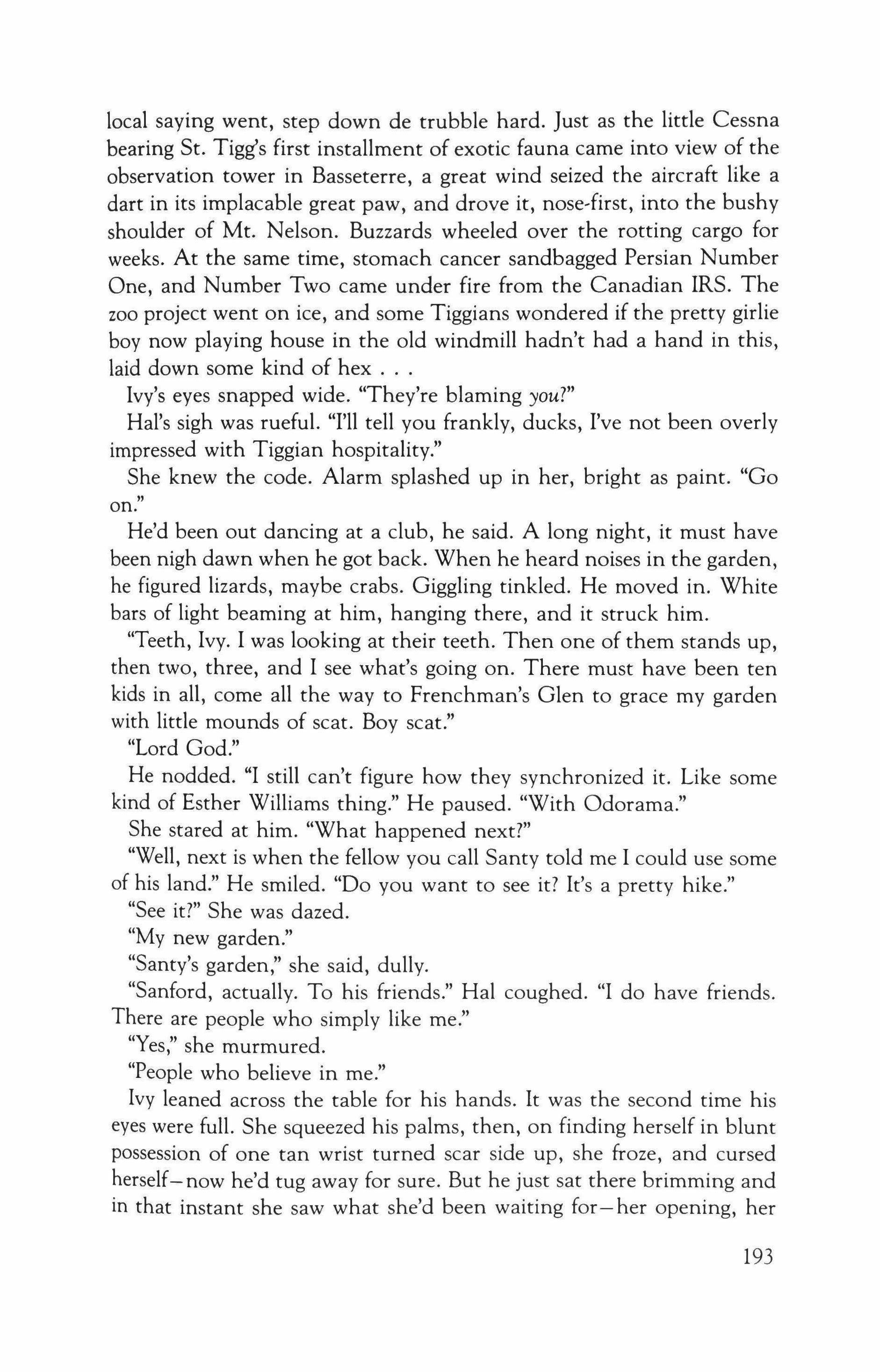
local saying went, step down de trubble hard. Just as the little Cessna bearing St. Tigg's first installment of exotic fauna came into view of the observation tower in Basseterre, a great wind seized the aircraft like a dart in its implacable great paw, and drove it, nose-first, into the bushy shoulder of Mt. Nelson. Buzzards wheeled over the rotting cargo for weeks. At the same time, stomach cancer sandbagged Persian Number One, and Number Two came under fire from the Canadian IRS. The zoo project went on ice, and some Tiggians wondered if the pretty girlie boy now playing house in the old windmill hadn't had a hand in this, laid down some kind of hex
Ivy's eyes snapped wide. "They're blaming you?"
Hal's sigh was rueful. "I'll tell you frankly, ducks, I've not been overly impressed with Tiggian hospitality."
She knew the code. Alarm splashed up in her, bright as paint. "Go on.
He'd been out dancing at a club, he said. A long night, it must have been nigh dawn when he got back. When he heard noises in the garden, he figured lizards, maybe crabs. Giggling tinkled. He moved in. White bars of light beaming at him, hanging there, and it struck him.
"Teeth, Ivy. I was looking at their teeth. Then one of them stands up, then two, three, and I see what's going on. There must have been ten kids in all, come all the way to Frenchman's Glen to grace my garden with little mounds of scat. Boy scat."
"Lord God."
He nodded. "I still can't figure how they synchronized it. Like some kind of Esther Williams thing." He paused. "With Odorama."
She stared at him. "What happened next?"
"Well, next is when the fellow you call Santy told me I could use some of his land." He smiled. "Do you want to see it? It's a pretty hike."
"See it?" She was dazed.
"My new garden."
"Santy's garden," she said, dully.
"Sanford, actually. To his friends." Hal coughed. "I do have friends. There are people who simply like me."
"Yes," she murmured.
"People who believe in me."
Ivy leaned across the table for his hands. It was the second time his eyes were full. She squeezed his palms, then, on finding herself in blunt possession of one tan wrist turned scar side up, she froze, and cursed herself-now he'd tug away for sure. But he just sat there brimming and in that instant she saw what she'd been waiting for- her opening, her
193
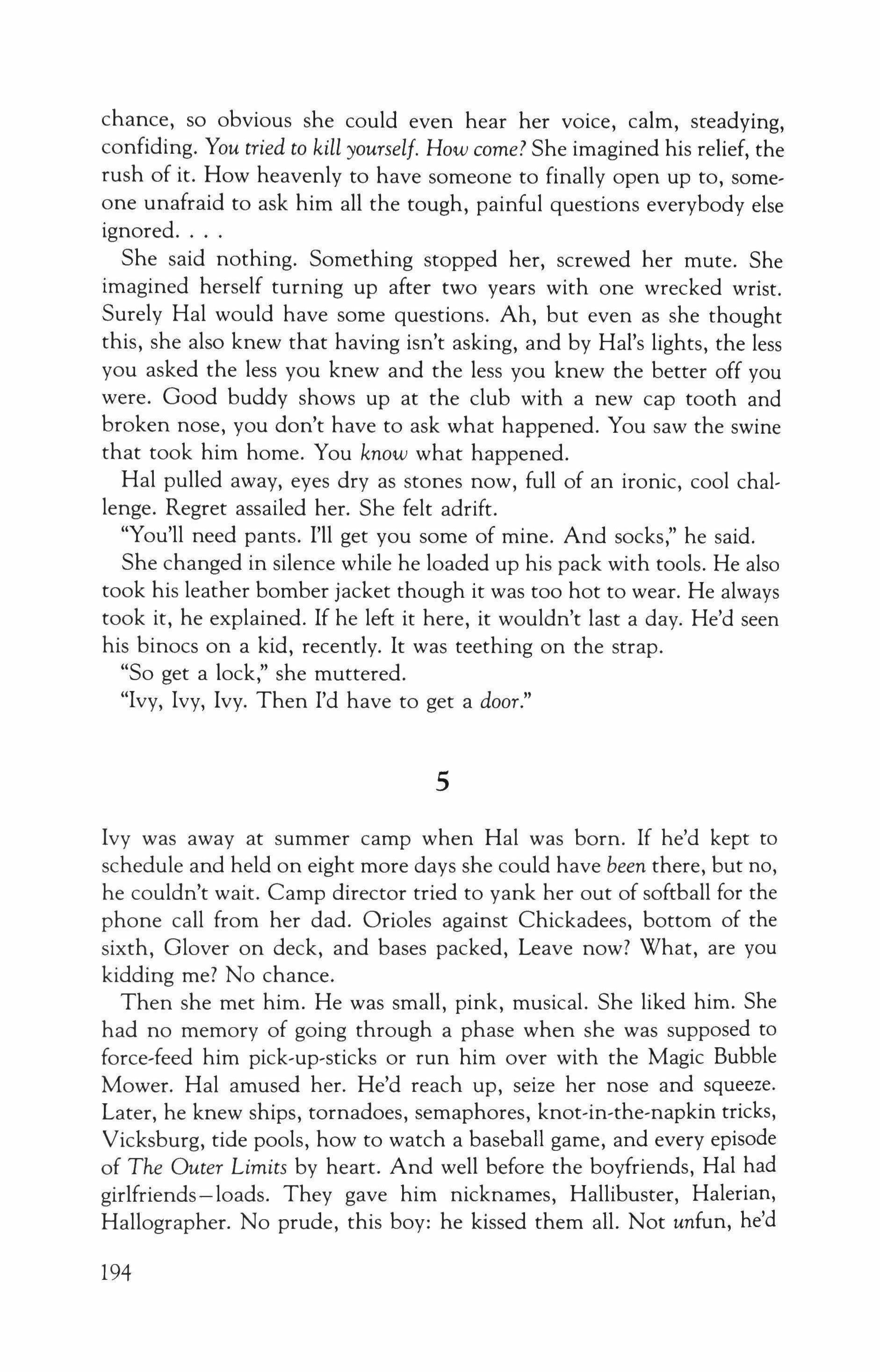
chance, so obvious she could even hear her voice, calm, steadying, confiding. You tried to kill yourself. How come? She imagined his relief, the rush of it. How heavenly to have someone to finally open up to, someone unafraid to ask him all the tough, painful questions everybody else ignored
She said nothing. Something stopped her, screwed her mute. She imagined herself turning up after two years with one wrecked wrist. Surely Hal would have some questions. Ah, but even as she thought this, she also knew that having isn't asking, and by Hal's lights, the less you asked the less you knew and the less you knew the better off you were. Good buddy shows up at the club with a new cap tooth and broken nose, you don't have to ask what happened. You saw the swine that took him home. You know what happened.
Hal pulled away, eyes dryas stones now, full of an ironic, cool challenge. Regret assailed her. She felt adrift.
"You'll need pants. I'll get you some of mine. And socks," he said. She changed in silence while he loaded up his pack with tools. He also took his leather bomber jacket though it was too hot to wear. He always took it, he explained. If he left it here, it wouldn't last a day. He'd seen his binocs on a kid, recently. It was teething on the strap.
"So get a lock," she muttered.
"Ivy, Ivy, Ivy. Then I'd have to get a door."
5
Ivy was away at summer camp when Hal was born. If he'd kept to schedule and held on eight more days she could have been there, but no, he couldn't wait. Camp director tried to yank her out of softball for the phone call from her dad. Orioles against Chickadees, bottom of the sixth, Glover on deck, and bases packed, Leave now? What, are you kidding me? No chance.
Then she met him. He was small, pink, musical. She liked him. She had no memory of going through a phase when she was supposed to force-feed him pick-up-sticks or run him over with the Magic Bubble Mower. Hal amused her. He'd reach up, seize her nose and squeeze. Later, he knew ships, tornadoes, semaphores, knot-in-the-napkin tricks, Vicksburg, tide pools, how to watch a baseball game, and every episode of The Outer Limits by heart. And well before the boyfriends, Hal had girlfriends-loads. They gave him nicknames, Hallibuster, Halerian, Hallographer. No prude, this boy: he kissed them all. Not unfun, he'd
194

tell Ivy after, but it was better just talking. He liked to bring them up to Ivy's room to show her off, get them twitching in the crosshairs of her hard bookish beam. He loved distracting her, his big scary sister, the solemn one, the one with plans. Even then you could trace the outline of a type: the sophomore at the post-prom bash more worried about getting the deck chairs out of the pool than getting laid; the college kid who housesits for the dean; the good buddy, the confessor, the one on airplanes perfect strangers wind up telling, baffled, "Why'm I saying this to you?"
It wasn't charm, it was the opposite of charm, a homely kind of magnetism that was, in large part, honestly unsought, a fluke of physiognomy (the monkish tilt of cheekbone, the old-fashioned, quite unconscious rigor of her gaze). And no sense bucking it. It worked for her-for work, marriage, really just about for everything, except, of course, him. Only Hal could trip her into glibness, get her skidding on that slick bright glass.
Hal swung the Mini-Moke around a shade tree decked in gauzy pur, dah.
"Kudzu?" Ivy guessed.
"Lublub, here."
"Pretty yellow. And the pink?"
"Beebush. You put your hives around, you get a very funky honey."
Ivy reminisced. "Honey on a grapefruit. Remember that?"
He did. "And in tea when we got sick, with cream and what was that stuff Mom used to use? That spicy stuff?"
"Cardamom," Ivy said, smiling. "In the blue mug with the handle like an ear, and when you reached bottom, it said-"
They sang the ancient tune out loud: "All Gone!"
Because it was never what they said, it was the how of it, the riff-iness, the swing, the way the banter moved like crack-the-whip, this dealer's, only swap meet of lore and memories, like trading baseball cards, that loose and sloppy, that relaxed. And she thought, yes, I needed this. This is just fine. This is Hal, the one who gets me, not the way my husband gets me but implicitly, without belaboring it, the way we get our breath, and I can be as indolent and giddy as I want, it doesn't matter. Hal's here. I take on the world. He lets it off. Go figure.
Over the engine's surly grind, Hal named sights. Speed bumps, striped and garish, were Sleeping Policeman. A tree with leaves like giant gloves was the silver trumpet tree, and this one with its thumbtack hide was called the sandbox: slaves got tied to it, and whipped.
She yelled: "I love this. This is great."
195
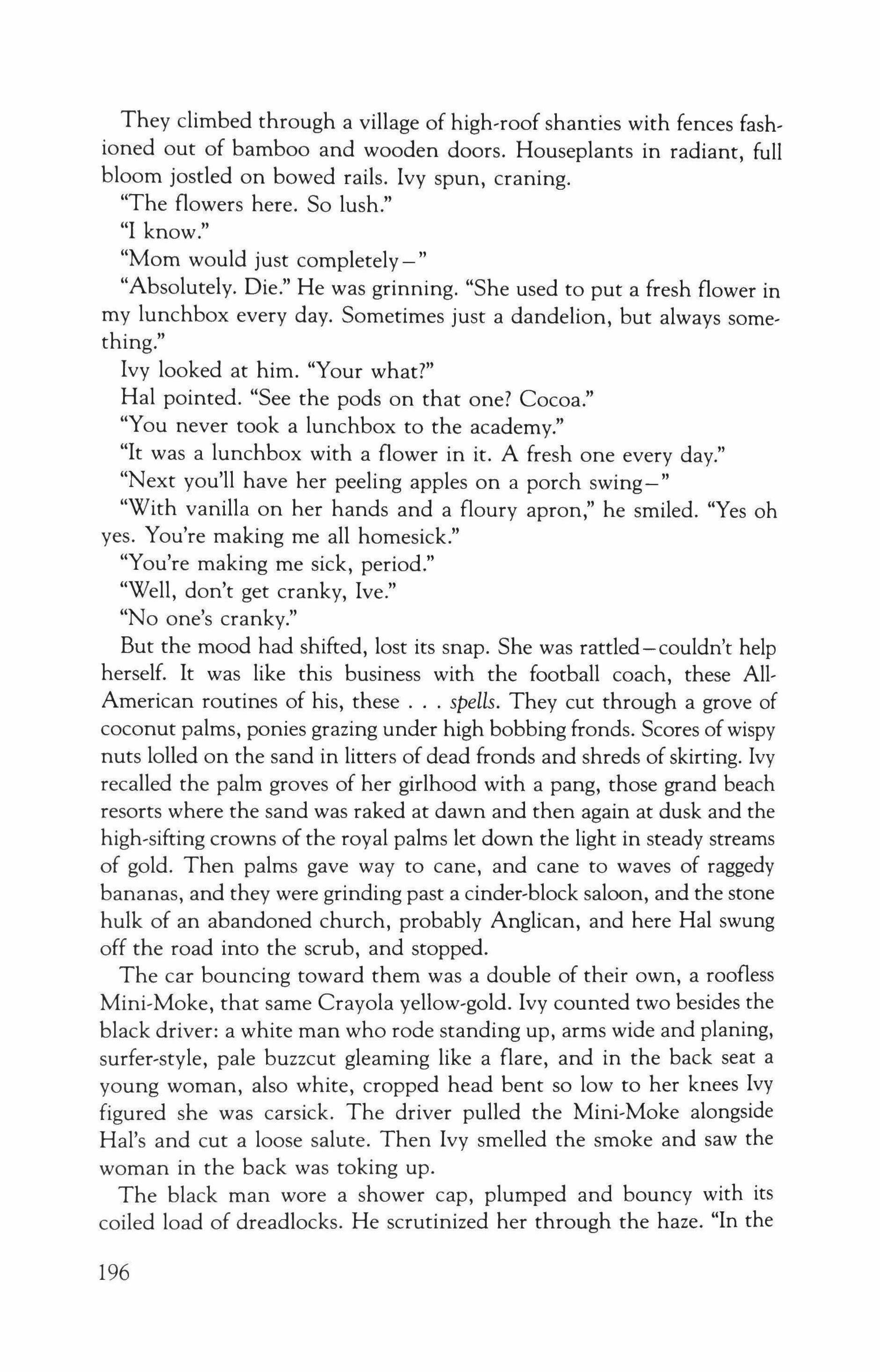
They climbed through a village of high-roof shanties with fences fashioned out of bamboo and wooden doors. Houseplants in radiant, full bloom jostled on bowed rails. Ivy spun, craning.
"The flowers here. So lush."
"I know."
"Mom would just completely -"
"Absolutely. Die." He was grinning. "She used to put a fresh flower in my lunchbox every day. Sometimes just a dandelion, but always something."
Ivy looked at him. "Your what?"
Hal pointed. "See the pods on that one? Cocoa."
"You never took a lunchbox to the academy."
"It was a lunchbox with a flower in it. A fresh one every day."
"Next you'll have her peeling apples on a porch swing-"
"With vanilla on her hands and a floury apron," he smiled. "Yes oh yes. You're making me all homesick."
"You're making me sick, period."
"Well, don't get cranky, Ive."
"No one's cranky."
But the mood had shifted, lost its snap. She was rattled-couldn't help herself. It was like this business with the football coach, these AllAmerican routines of his, these spells. They cut through a grove of coconut palms, ponies grazing under high bobbing fronds. Scores ofwispy nuts lolled on the sand in litters of dead fronds and shreds of skirting. Ivy recalled the palm groves of her girlhood with a pang, those grand beach resorts where the sand was raked at dawn and then again at dusk and the high-sifting crowns of the royal palms let down the light in steady streams of gold. Then palms gave way to cane, and cane to waves of raggedy bananas, and they were grinding past a cinder-block saloon, and the stone hulk of an abandoned church, probably Anglican, and here Hal swung off the road into the scrub, and stopped.
The car bouncing toward them was a double of their own, a roofless Mini-Moke, that same Crayola yellow-gold. Ivy counted two besides the black driver: a white man who rode standing up, arms wide and planing, surfer-style, pale buzzcut gleaming like a flare, and in the back seat a young woman, also white, cropped head bent so low to her knees Ivy figured she was carsick. The driver pulled the Mini-Moke alongside Hal's and cut a loose salute. Then Ivy smelled the smoke and saw the woman in the back was toking up.
The black man wore a shower cap, plumped and bouncy with its coiled load of dreadlocks. He scrutinized her through the haze. "In the
196

Name of the Most High, and in the Name of the Conquering Lion of Judah, I say unto I and I greetings, yes, and I say, too He trailed off. "Where she Stetson?"
"No Stetson, Wellesley. This is Ivy," Hal said. "My big sister."
"Not the Texan?"
"Texan never showed."
"Huh." The man called Wellesley scratched his chest.
"Wellesley here also leads expeditions into the rain forest," said Hal. "He and nature go way back."
Ivy couldn't read his tone. She said, uncertainly, "That's nice."
Wellesley glanced at her, and away. She thought she heard him snort. "Truck come."
Hal said, "I heard."
"I warn him, mahn. This stuff about at least a thousand years old, I say. This trash, mahn. You never move this shit."
Ivy touched Hal's arm. "What shit?"
Hal interpreted: "My sister thinks we're dealing herb."
Wellesley rolled his eyes. "Dis nuh Jamaica, girl."
She ignored him. "Hal."
The blond man had clambered up onto his seat. Swaying slightly in his light-boned stupor, he held a nylon bag in one hand and in the other a spliff as thick as pipe. Without rancor, Wellesley ordered him to get his bony Finnish ass back down or he'd smash his face in. Then he turned to Ivy. He studied her with the frank, unhurried gaze of a curator, head tipped, faintly squinting. She stared back bluntly; she knew better than to take offense. When she was lost in the slums of Marrakesh, she'd seen this same look in the grave, slow-moving stares of the dockworkers, and again, in the dreamy, unapologetic seven minutes a Chilean customs officer took to scrutinize her passport with its gaudy cavalcade of stamps. At first she hadn't understood why he'd tarried so over the stamp for Thailand. Was there some irregularity, some new glitch in Chilean-Thai relations? Then it struck her. He was traveling. Just looking was an act of travel. Just looking at those swirls of ink was as close to racing elephants across a rice paddy as that dreamy man would get.
Wellesley interrupted his own reverie with a brilliant grin. "You know, on dis island is a saying, white mahn mek a garden, always somet'ing nocorrect. Only black mahn mek a righteous garden. Only black mahn know de seed and how to grow. Then Hal Glover come, and everybody say, oh ho. Who dis? Crazy girlie mahn hahve a gift. Hear I: let none stand in his way."
"All right, Wellesley," Hal said, sighing.
197

"Right from the start I tellin' Santy, hear I. Mahn hahve a gift."
"Sweet," said Hal. "But see him in his cups. Oh my."
Wellesley gave his shower cap a lazy pat, and yawned.
"What happens when you're in your cups?" asked Ivy, despite herself.
"Loose me guts up."
"Sorry?"
"Rum. Mek loose me bowel."
Ivy snapped her stare away. Meanwhile, the Finnish tourist continued to rotate on the car seat in slow tiny circles that evoked the revolution of a windup ballerina on a porcelain stand. His eyes were wide and sightless and when Wellesley reached up and tugged the spliff out of his hand, the Finn seemed not to register the loss. In the back seat, the woman lounged with her long legs slung over the door. Wellesley wedged the spliff snugly between her toes, and for one numb moment, Wellesley, Hal and Ivy allowed themselves to be absorbed in the sight of a single smoky arabesque coiling out of the woman's lightly wagging foot. Then Wellesley plucked the travel bag from the still-revolving Finn, and handed it across the gap between the Jeeps to Hal.
"Dem two givin' I a pain all day. It's all right. Keep it. Santy give dem two bahgs more in bahck."
"Hoo boy. They got themselves a stash," Hal murmured, peering.
"I don't go for this," said Ivy, quietly.
"Have they tried it yet?" Hal asked Wellesley.
"No matter if dey do. Dem so high, no kyir what go in dey mouth."
"Very good, Wellesley," Hal said, and set the bag in Ivy's lap. It had the rough heft of a drowsing cat.
"I don't go for this at all," she said.
Wellesley threw the two of them a wink. "Doan use it all at once."
So dump it, Ivy told herself. Go on. Just pitch it out as hard as you can throw. You'd be doing him a favor. Playing hippie queer bandido in some cockamamie drug ring in 1975: pathetic. He was supposed to get the flowers out of his hair six years ago. And of course, knowing him, he would get caught and it would be Ivy to the rescue, not that he'd ask her but she'd come anyway, and maybe he'd say thanks, or maybe he'd just skip the thanks and want to talk about her earrings or something, and she'd let him because she always let him, it was her custom, and because in some secret shameful way it relieved and even thrilled her, this gorgeous heedlessness of his, the mighty shrug that was his life
"I should dump the whole damn thing," she blurted. "I mean, what if I did?"
198

Hal downshifted into second. "Don't you even want to try it?"
She let her head drop back against the headrest while the Mini-Moke took the skinny elbowed turns at a crawl. In the shade of a peeling billboard heralding a Dutch-built test station for winter crops, a pecancolored boy in a soiled baseball cap ministered to a pipe-size length of sugar cane with the solemnity of a fakir calling up a cobra on his flute.
"What I want," she answered, turning, "is to remind you of your options. You don't have to do this. There are ways to make it lighter on yourself. Other ways of being gay." She watched him. "Hal, are you hearing this? Things are changing. You don't know. In New York, there's all this new gay, God, you name it. Gyms. Glee clubs. Caterers. Bookstores. Bagpipe outfits. And I don't think you realize. Everyone's so out."
Hal had on a smile.
"What's funny?"
"Not doctors. Not lawyers. Not college presidents. Bagpipe outfits."
She went warm. "I don't say it's paradise. There's plenty of the old unhappy bullshit. But it beats here, and you'd have friends."
"My friend the bagpipe-playing caterer. How twee,"
"He's better than your Wellesley."
"Don't underestimate our Wellesley. He's a very gifted lad. You ever have a yen to poach a parrot, or log a stand of old-growth hardwood at record speed, he's your man."
"He holds you in contempt, Hal. I mean, you see this. It's obvious."
"A word," said Hal, "I never could abide. "The smuggy puffed-up strut of it, the sheer presumption -"
"He's a thug," she cried. "He craps on your flowers. He calls you girlie boy."
"Not when he's deshabille, he doesn't."
A beat then.
"If you're trying to shock me, little brother
"My dear, I couldn't hope to shock you if I dressed myself in head-totoe electrodes. You're the gal who's seen it all."
She fixed her glare against the road. "Bitch."
"Party crasher. Know-it-all," he said.
"Homo doormat. Patsy. Head case."
He was grinning. "Thrill seeker. Voyeur."
"Tell me. Do you even hear me?"
"Hear you? I don't see you."
"Nice."
He was laughing. "Give it up, Ive. I'm a goner. Let it go."
199
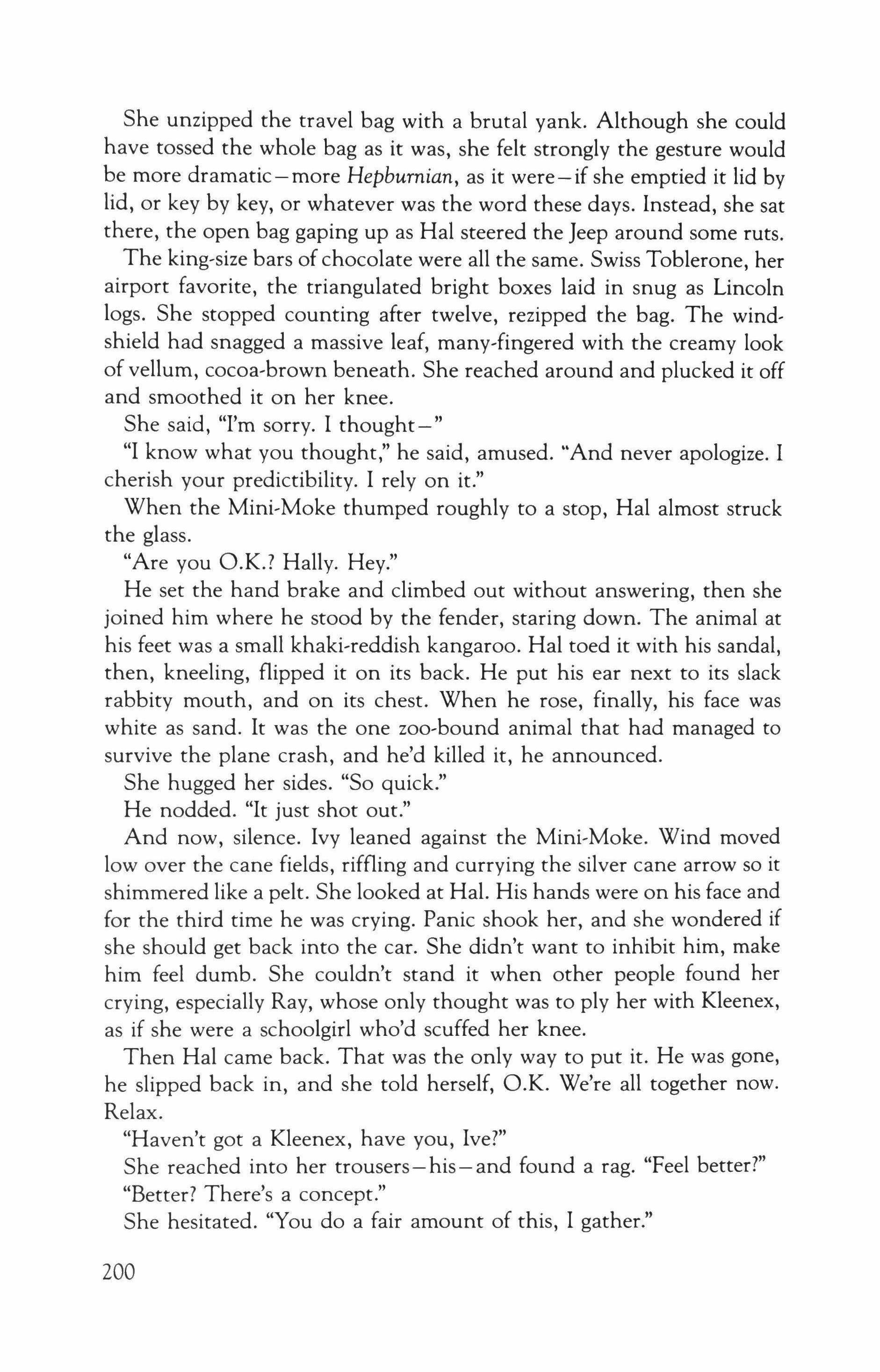
She unzipped the travel bag with a brutal yank. Although she could have tossed the whole bag as it was, she felt strongly the gesture would be more dramatic-more Hepburnian, as it were-if she emptied it lid by lid, or key by key, or whatever was the word these days. Instead, she sat there, the open bag gaping up as Hal steered the Jeep around some ruts.
The king-size bars of chocolate were all the same. Swiss Toblerone, her airport favorite, the triangulated bright boxes laid in snug as Lincoln logs. She stopped counting after twelve, rezipped the bag. The windshield had snagged a massive leaf, many-fingered with the creamy look of vellum, cocoa-brown beneath. She reached around and plucked it off and smoothed it on her knee.
She said, "I'm sorry. I thought-"
"I know what you thought," he said, amused. "And never apologize. I cherish your predictibility. I rely on it."
When the Mini-Moke thumped roughly to a stop, Hal almost struck the glass.
"Are you O.K.? Hally. Hey."
He set the hand brake and climbed out without answering, then she joined him where he stood by the fender, staring down. The animal at his feet was a small khaki-reddish kangaroo. Hal toed it with his sandal, then, kneeling, flipped it on its back. He put his ear next to its slack rabbity mouth, and on its chest. When he rose, finally, his face was white as sand. It was the one zoo-bound animal that had managed to survive the plane crash, and he'd killed it, he announced.
She hugged her sides. "So quick."
He nodded. "It just shot out."
And now, silence. Ivy leaned against the Mini-Moke. Wind moved low over the cane fields, riffling and currying the silver cane arrow so it shimmered like a pelt. She looked at Hal. His hands were on his face and for the third time he was crying. Panic shook her, and she wondered if she should get back into the car. She didn't want to inhibit him, make him feel dumb. She couldn't stand it when other people found her crying, especially Ray, whose only thought was to ply her with Kleenex, as if she were a schoolgirl who'd scuffed her knee.
Then Hal came back. That was the only way to put it. He was gone, he slipped back in, and she told herself, O.K. We're all together now. Relax.
"Haven't got a Kleenex, have you, Ive?"
She reached into her trousers-his-and found a rag. "Feel better?"
"Better? There's a concept."
She hesitated. "You do a fair amount of this, I gather."
200

Hal cleared his eyelids with his fingers then flicked his hand as if shaking off lint. "It's like yawning. I don't think about it." And seeing her, he sighed. "Well, neither would you if you did it umpteen times a day."
The kangaroo had the white scruffy neck of a mutt. Hal hooked his hands high under the kangaroo's thin shoulders and began to lift. Ivy took its hind legs and for a moment they just stood there, the kangaroo between them full and swaying slightly, hammock,like: she thought of sailors' burials at sea.
"Hal." She meant to ask him more about this crying but he spoke:
"Do you think before it died, its whole life flashed before its eyes in one glorious white flash? Like the time that pesky aborigine tried to wing it with a boomerang -
She cut him off. "Let's go."
They moved it, tail dragging, to a clear weedless place between rows of purplish cane, and let it fall. Then something odd happened. When the kangaroo struck the dirt, its skinny arms flopped in across its chest so abruptly it seemed actually deliberate, human, even girlish, as if these were two breasts it wanted to conceal, as if it had been stripped, and this were all it had to show for its ordeal, this reflexive modesty, pathetic coyness.
Ivy grimaced. "Let's get out of here."
"Hold on."
A moment later the car door slammed. When Hal returned he had the bomber jacket folded on his arm.
Ivy said, "Oh, no."
He knelt.
"But it's your most favorite jacket in the world."
When the kangaroo's right arm was in the sleeve, Hal shoved it on its side and slid the rest of the jacket underneath. He jigged the other sleeve up the left arm and hitched the collar up the back of its slack doggy neck. Rising then, expressionless, he scuffed the dirt until he'd loosened up a handful. Through his fingers, trickling down, the dirt pattered on the stiff brown leather as delicate as rain. She stared helpless, her heart chunking up like ice, just seizing there, a thing held fisted.
He took her hand and squeezed. "Ivy. It's a jacket. Come." He pulled her. "Let's head up."
201

Small bluebirds in no great hurry to get out of the way played in the road ruts, up here more like ravines and awash with mud the color of old cider. Hal spritzed her arms, then his, with bug repellent, and they left the Mini-Moke under a wide scented tree with leaves like fans for a trail that picked up where the road petered into weeds. Then more trees closed over them, and they were moving up into the rain forest, frogs like gemstones, waterfalls of moss and a lacy light that drifted down through ferns the size ofparachutes in full-blown bloom. And now there was no more idle chatter, no more playing name-that-leaf. They were into something else here. We have gained, thought Ivy heavily, another front.
Hal led, his backpack bouncing lightly, humming low. When they'd started walking he'd observed there were quicker ways to get where they were going, but this path was his own secret, rarely traveled, not too strenuous and easy on the eyes. And certainly lots of it was pretty, even gorgeous. But Ivy had to wonder- how long could it last? Even her untrained eye snagged on the faint scabs of muddy slash glinting grayly through the green. She remembered Drinkwater's grim prediction: The root come out, the dirt come free soon island finish. She blow into the sea. How long before the lush green cloak that swirled its skirt around this mountain was hemmed back to a cowl? How soon before these farmers, driven off their deep long-tended lowlands by sundry multinational cartels, hacked the island into one shivering defoliated hump fit for little more than raising floppy-leafed dasheen?
"Ive."
Farther up, where the path tugged up a ledge, her brother waited. Weeds snatched at her ankles and full-figured ferns flounced against her hips.
"Sorry. I was thinking." "Watch the roots." "Right."
He reached a hand down and hauled her up. The path grew thin here, turtle-slick with round hard mossy stones. They angled past cool stands of apple-green bamboo as tall as stilts and a plant with leaves that fanned the air like the leaves of an enormous fly. Bromeliads clung spiderlike to any tree that lent support. She strained for birdsong: nothing. Overhead, the forest webbed the sky and what light weaseled through was skittery and weak. She palmed a sweaty cord of hair off her face and swabbed her neck.
6
202

Ahead of her, Hal whistled phrases out of old cartoons. Makes sense, she thought. So much about the place was essentially cartoonish, from the toylike Jeeps to the childish lilt of the Tiggian dialect to the very trees themselves, not trees at all when you looked close so much as giant houseplants, ficus, ginger lily, anthurium, poinsettia, great looking stuff, no question, but no more truly treelike than little girls are like their mothers when they dress up in spike heels and fancy gowns. No wonder Hal adored it. It was the land of make-believe, like being six years old again and wandering around the florist's, everything so high and drippy and bright-smelling, and those vines straight out of Mowgli, and Hal, in a clearing just ahead, reaching out to pull But this was no vine. This was a cable, dangling from an abandoned pylon fashioned out of lashed bamboo. When Hal tugged it, leaves wheeled down in gritty flocks.
"Remember rope swings?" he called back.
She watched him tug. "We never had a rope swing. We had you swinging from a plunger you stuck to the bathroom ceiling. And then we had, as I recall, a mess." Her voice was weary. "And I don't care if that's not hooked up, it's still electric wire and it could be dangerous. Please let go."
"You took the end and tied it into a big knot," Hal said, pulling, "then you swung it way out over the pond, like Tarzan-"
She snapped: "What pond?"
"Behind the sugar house."
"What sugar house?"
Leaf bits continued to swirl down on them, black and dusty. Hal said, "The Peace Corps put this up. It was supposed to bring electricity to a village up here, only by the time the power line got built, the village was defunct. Everybody'd moved away."
"What sugar house?" said Ivy. "What else? The one-room schoolhouse and the sleigh? Did you dip my pigtail in the inkwell? I mean, Jesus, Hal. How thick does this thing get?"
When he kept tugging, Ivy moved behind him. He was yanking it so hard the cable seemed to have caught a backbeat of its own, and now was pulling him, playing him at the end of its long leash like a vc-vc, "Stop it."
Pulling made the bones inside his knuckles shine like dice. She threw her arms around him and twisted him away. She didn't have to pull so hard, he went limp instantly, the cable bounding free with a crack, one last burst of leaves exploding in a cloud of dust. Ivy thought of a cotillion she once read about, the torrent of dead butterflies that came raining cold as cinders onto the marble ballroom floor when the hosts loosed
203
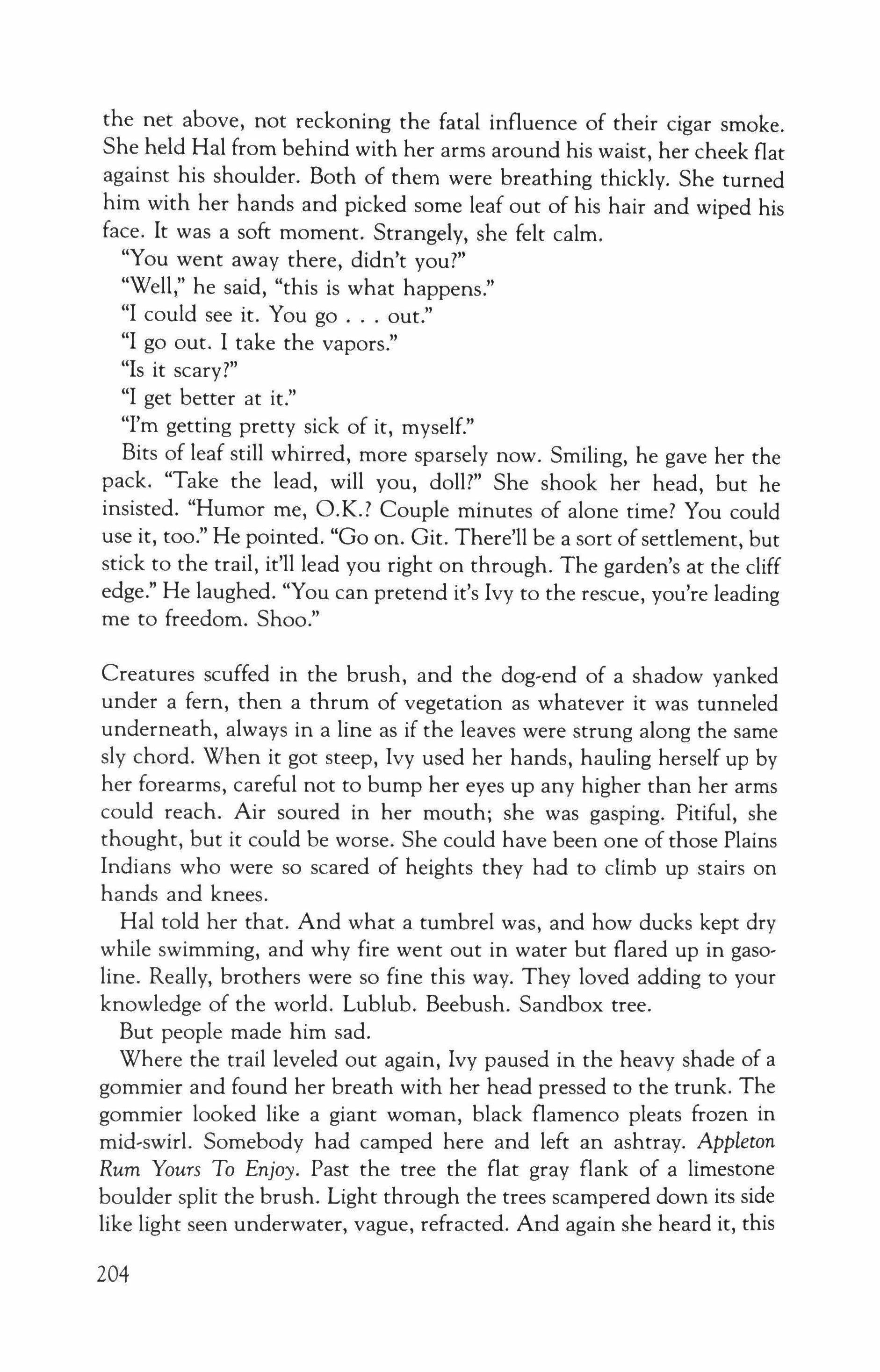
the net above, not reckoning the fatal influence of their cigar smoke. She held Hal from behind with her arms around his waist, her cheek flat against his shoulder. Both of them were breathing thickly. She turned him with her hands and picked some leaf out of his hair and wiped his face. It was a soft moment. Strangely, she felt calm.
"You went away there, didn't you?"
"Well," he said, "this is what happens."
"I could see it. You go out."
"I go out. I take the vapors."
"Is it scary?"
"I get better at it."
"I'm getting pretty sick of it, myself."
Bits of leaf still whirred, more sparsely now. Smiling, he gave her the pack. "Take the lead, will you, doll?" She shook her head, but he insisted. "Humor me, O.K.? Couple minutes of alone time? You could use it, too." He pointed. "Go on. Git. There'll be a sort of settlement, but stick to the trail, it'll lead you right on through. The garden's at the cliff edge." He laughed. "You can pretend it's Ivy to the rescue, you're leading me to freedom. Shoo."
Creatures scuffed in the brush, and the dog-end of a shadow yanked under a fern, then a thrum of vegetation as whatever it was tunneled underneath, always in a line as if the leaves were strung along the same sly chord. When it got steep, Ivy used her hands, hauling herself up by her forearms, careful not to bump her eyes up any higher than her arms could reach. Air soured in her mouth; she was gasping. Pitiful, she thought, but it could be worse. She could have been one of those Plains Indians who were so scared of heights they had to climb up stairs on hands and knees.
Hal told her that. And what a tumbrel was, and how ducks kept dry while swimming, and why fire went out in water but flared up in gasoline. Really, brothers were so fine this way. They loved adding to your knowledge of the world. Lublub. Beebush. Sandbox tree.
But people made him sad.
Where the trail leveled out again, Ivy paused in the heavy shade of a gommier and found her breath with her head pressed to the trunk. The gommier looked like a giant woman, black flamenco pleats frozen in mid-swirl. Somebody had camped here and left an ashtray. Appleton Rum Yours To Enjoy. Past the tree the flat gray flank of a limestone boulder split the brush. Light through the trees scampered down its side like light seen underwater, vague, refracted. And again she heard it, this
204

time not in her voice but in his, with just the perfect tinge of brusque impatience, as if stating something so obvious as to be entirely forgettable, nothing rare about it.
People make me sad.
Silently, she argued back. What people? Where? Do I?
Watch my lips, he said. Not certain people. People. The subject here is aggregate, generic, nothing personal.
But she can't see it. She resists. It's the sentimental side of her, she loves a good, clean, efficient motive. Then she wants to argue with it, pack it down to a matter of opinion, a thing you pick or choose like socks, or sublets. And she could just hear him: Well, land 0' Goshen, honey, I didn't choose this, I was chosen-the silver bullet that stopped her mind in its dogged motive-loving track each time: the choicelessness of sorrow, the thing she, never having sorrowed, never gets.
"But I have. Of course I've sorrowed," Ivy cried, then spun around, but Hal, still out of sight behind the last bend, could not have heard. Pausing then to fumble for a foil-covered chunk of Toblerone in the pack, she put the question to herself again. Had she sorrowed? Had she ever been so sad the sadness turned into the clear pure medium for every other mood she felt? A sadness like an element, cool or boiling, the water staying wet, staying water, the wind that whisks your scarf away still the same sure wind whether it blows leaves or candy wrappers, hailstones or sand?
Even when he teased her, Hal seemed sad. He had a sorrow so faithful, so secure, he could walk away from it without a word and never doubt it would still be there when he came back, constant as a pet, a pillow, a night-light in the hall. And the more she dwelled on it, the more remarkable it seemed. To have accomplished an emotion so steady and informing, the way love was supposed to be, unconditional, just always-sheerly-there well, really, it was enviable, or might have been, if he hadn't been her brother.
But he was.
Indissoluble, defiant, the Toblerone rested on her tongue like rocks. She spat hard.
And here was something weird, a road, striking out across the trail with a headlong bluntness that stopped her in her tracks. The road was new, still evil-looking in the too-black, river-greasy way of fresh-laid asphalt, and for one blind moment she actually made a move as if to step out of her shoes to ford a stream. The sound of a diesel truck snapped her to. Before it heaved itself into sight and did further damage to her already fractured mood, Ivy spied the trailhead across the road and
205
plunged deep into the heavy glove of vegetation until the road behind her was lost to view. Even then, the brute grumble of the engine was still audible, a rank exhaust flavored the air, and Hal's passion for his secret trail seemed suddenly as silly and affected as the trail itself with its fake air of mystery and privileged apartness.
She trudged blindly, hardly conscious of her passage from the leafy dark into a clearing until the heat tightened its white hold on the bare back of her neck, and she looked up, and saw she'd entered something like a settlement, with shacks, and sun in wide sloppy patches on heaps of loose debris.
Nothing stirred. Usually, in villages like these, dogs abounded, drooling, witless, full of bile. Here, silence. Then she saw the bamboo pylon tilting up behind a bank of rubble and realized where she was. This was the village that got the power line nobody wound up using, and Hal wasn't kidding-it was a ghost town, Third World style, old Clorox bottles instead of tumbleweeds, rain-stiffened bags of portland cement along the path, and where the louvered shutters of a cowboy tavern might have swung, a sheet of plywood listing off a rubber-tire hinge.
Hal had it wrong on one point, though. Not everyone was gone. A smear of woodsmoke was on the breeze, and from one building, a drying shed or warehouse, came the drowsy grumble of a generator and something very like-dear God, could this be true? -the ever-dreamy scent of Maid's Night Out, pass the duck sauce somebody and is that your egg roll or can l?
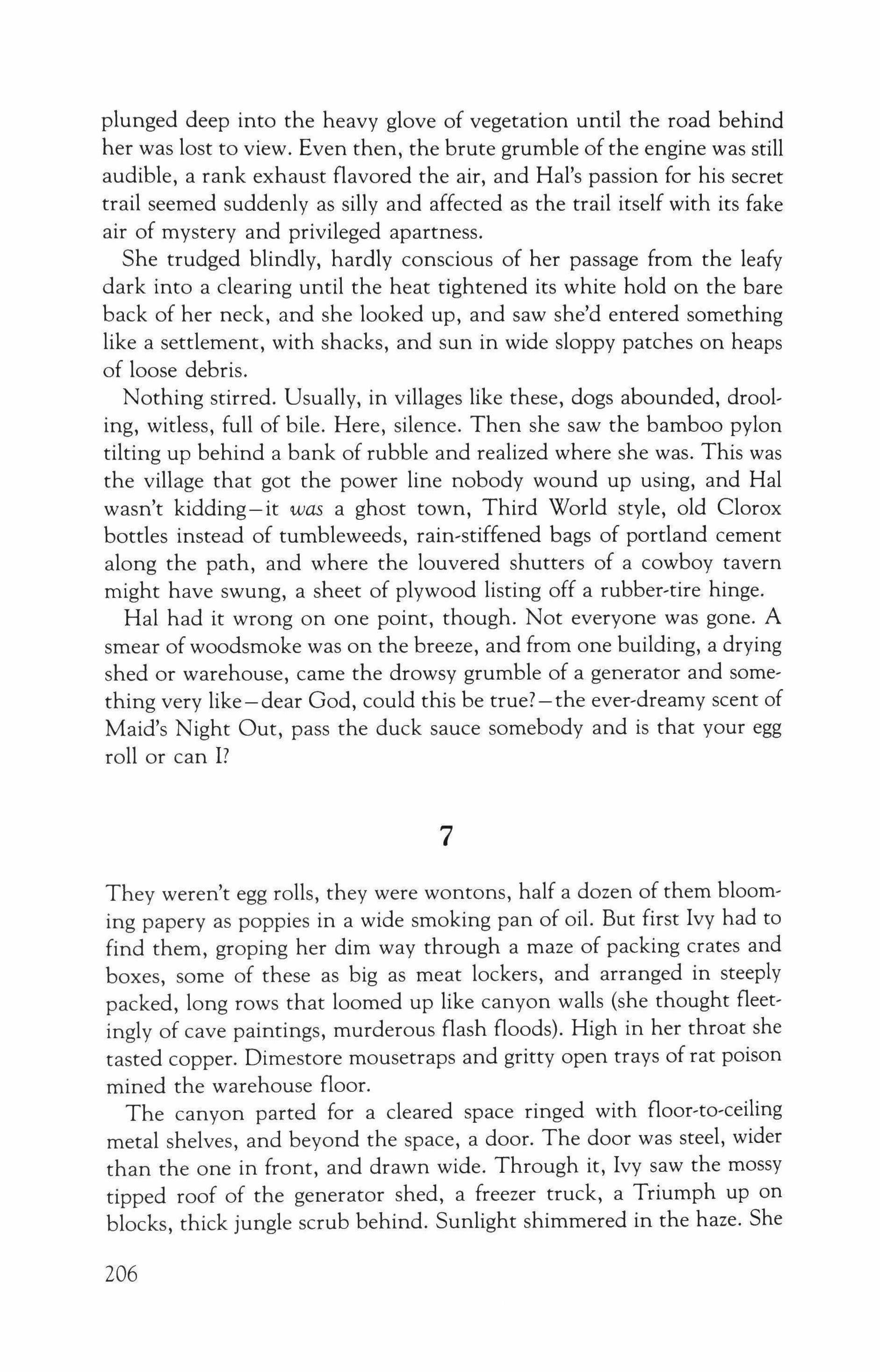
They weren't egg rolls, they were wantons, half a dozen of them blooming papery as poppies in a wide smoking pan of oil. But first Ivy had to find them, groping her dim way through a maze of packing crates and boxes, some of these as big as meat lockers, and arranged in steeply packed, long rows that loomed up like canyon walls (she thought fleetingly of cave paintings, murderous flash floods). High in her throat she tasted copper. Dimestore mousetraps and gritty open trays of rat poison mined the warehouse floor.
The canyon parted for a cleared space ringed with floor-to-ceiling metal shelves, and beyond the space, a door. The door was steel, wider than the one in front, and drawn wide. Through it, Ivy saw the mossy tipped roof of the generator shed, a freezer truck, a Triumph up on blocks, thick jungle scrub behind. Sunlight shimmered in the haze. She
7
206

cupped her eyes and, squinting, saw chickens. They stood fussing in the ragged shadow of the coop, a precarious affair of plywood gussied up with spray-paint renderings of an angel with red long wings and yellow hair, holding a machine gun. The chickens jerked in and out of the painted coop like players in a cuckoo clock.
She didn't see the man until she turned back into the room.
He lay beneath a shelf, his upper torso out of sight, his lower half, feet, legs and hips, grinding comically as he strained to get at whatever it was that had rolled or wiggled out of reach. She barked a stiff cough.
"I know, I know, I hear you. Be right up," he answered, startling her: she was expecting a Tiggian, not a voice like this, so aggressively American, banjo-twangy, pebbled with fatigue. Again she saw him strain, knees crooked high inside the loose blue trousers, black shoes with muddy laces clamped flat against the floor. Then he crawled out and spanked his slacks clean, an elfin man with a white shock of bristly hair and colorless assessing eyes, a dusty wee man with wrinkles deep enough to hide dimes in, a bottle of La Choy soy sauce in his hand, and something else about him, something known, though she wouldn't get it till he passed a slow palm across his brow, streaking comets of wet dust across the pale square of skin.
It was his forehead. Ivy knew it from a picture, some famous dustbowlera snapshot of a farmer somewhere, pale-eyed inside the squint, the brow so tanless it looked naked over the rough Scots-Irish set of cheek and stubbled jaw. Worn, wary, immovably unsentimental, a kind of face (the flat-eyed squint, the bloodless mouth) that never failed to move her, make her feel weirdly rattled, jacklit somehow, lacking all credentials.
"Help me out here, missy. You with a tour?"
When Ivy shook her head, he stepped over to the stove and turned it off. "No tour, no guide, no nuthin." He raised a quantity of dripping wontons from the pan with a long-handled fork, and dropped them lightly on a paper plate.
"Well, honey, I would love to help you but we have a pretty strict procedure. I don't take walk-ins without a guide and that's that."
"I'm not a walk-in, I'm a sneak-in. I smelled the food and was seduced," she ventured, girlishly-a risky move, but it paid off. Unsmiling, he held out a plate.
"Go on. They're no good cold."
"That's fine, really. I didn't mean -"
"Got six more waiting for me in the pan." He gestured loosely at a stack of cinder blocks. "Take a sit."
207
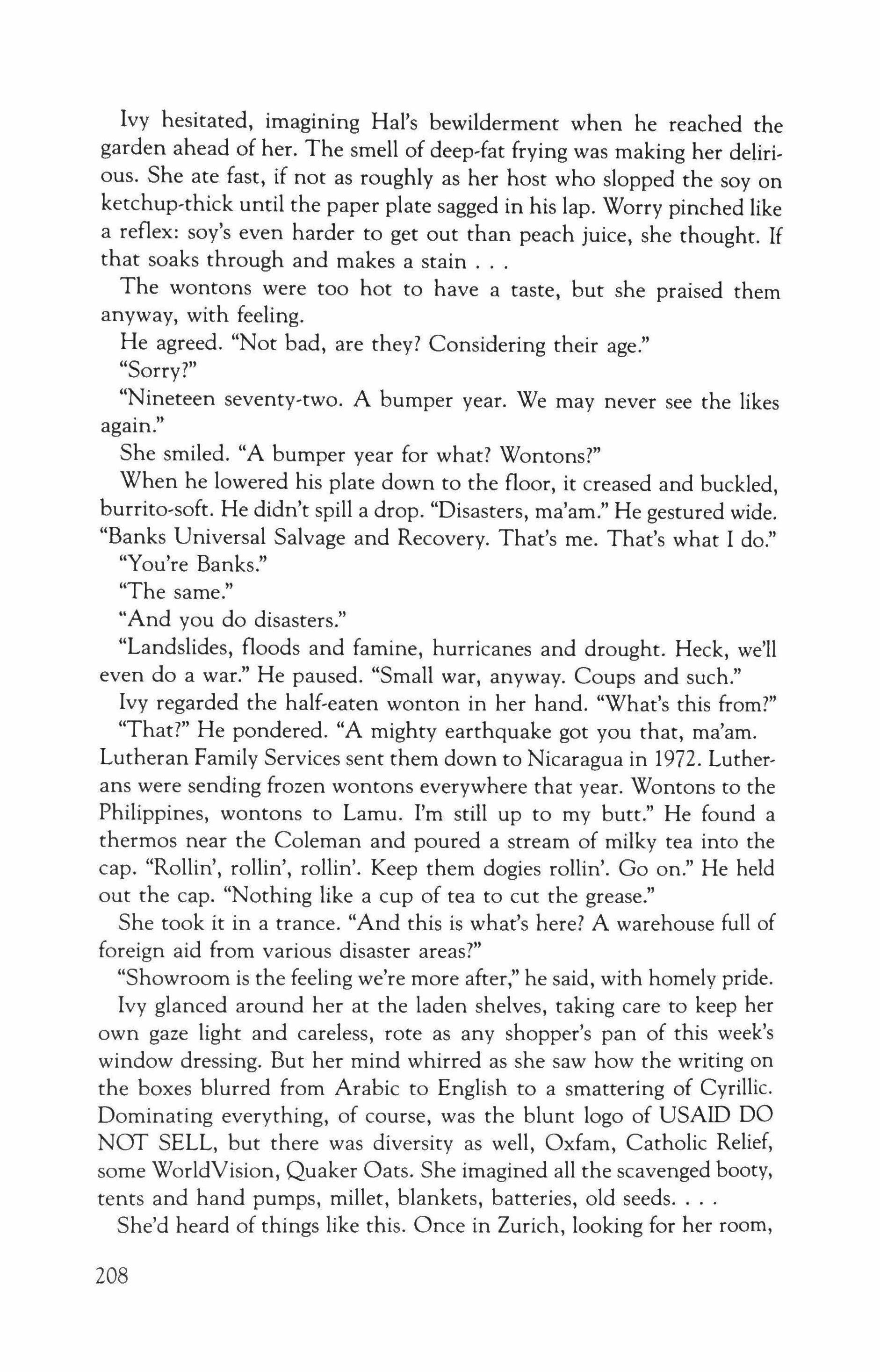
Ivy hesitated, imagining Hal's bewilderment when he reached the garden ahead of her. The smell of deep-fat frying was making her delirious. She ate fast, if not as roughly as her host who slopped the soy on ketchup-thick until the paper plate sagged in his lap. Worry pinched like a reflex: soy's even harder to get out than peach juice, she thought. If that soaks through and makes a stain
The wontons were too hot to have a taste, but she praised them anyway, with feeling.
He agreed. "Not bad, are they? Considering their age."
"Sorry?"
"Nineteen seventy-two. A bumper year. We may never see the likes again."
She smiled. "A bumper year for what? Wontons?"
When he lowered his plate down to the floor, it creased and buckled, burrito-soft, He didn't spill a drop. "Disasters, ma'am." He gestured wide. "Banks Universal Salvage and Recovery. That's me. That's what I do."
"You're Banks."
"The same."
"And you do disasters."
"Landslides, floods and famine, hurricanes and drought. Heck, we'll even do a war." He paused. "Small war, anyway. Coups and such."
Ivy regarded the half-eaten wonton in her hand. "What's this from?"
"That?" He pondered. "A mighty earthquake got you that, ma'am. Lutheran Family Services sent them down to Nicaragua in 1972. Luther, ans were sending frozen wontons everywhere that year. Wontons to the Philippines, wontons to Lamu. I'm still up to my butt." He found a thermos near the Coleman and poured a stream of milky tea into the cap. "Rollin', rollin', rollin'. Keep them dogies rollin'. Go on." He held out the cap. "Nothing like a cup of tea to cut the grease."
She took it in a trance. "And this is what's here? A warehouse full of foreign aid from various disaster areas?"
"Showroom is the feeling we're more after," he said, with homely pride. Ivy glanced around her at the laden shelves, taking care to keep her own gaze light and careless, rote as any shopper's pan of this week's window dressing. But her mind whirred as she saw how the writing on the boxes blurred from Arabic to English to a smattering of Cyrillic. Dominating everything, of course, was the blunt logo of USAID DO NOT SELL, but there was diversity as well, Oxfam, Catholic Relief, some WorldVision, Quaker Oats. She imagined all the scavenged booty, tents and hand pumps, millet, blankets, batteries, old seeds
She'd heard of things like this. Once in Zurich, looking for her room,
208
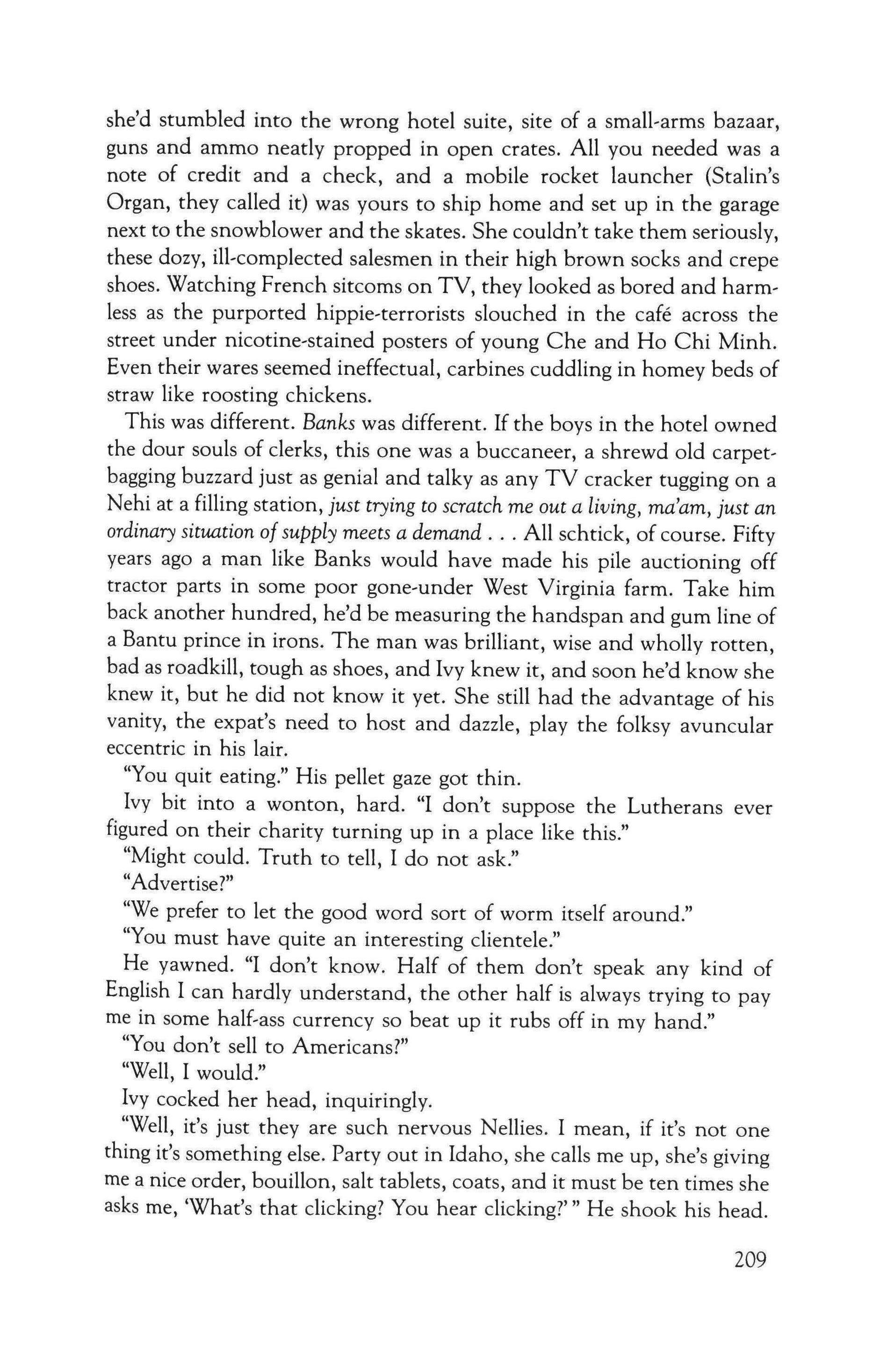
she'd stumbled into the wrong hotel suite, site of a small-arms bazaar, guns and ammo neatly propped in open crates. All you needed was a note of credit and a check, and a mobile rocket launcher (Stalin's Organ, they called it) was yours to ship home and set up in the garage next to the snowblower and the skates. She couldn't take them seriously, these dozy, ill-complected salesmen in their high brown socks and crepe shoes. Watching French sitcoms on TV, they looked as bored and harmless as the purported hippie-terrorists slouched in the cafe across the street under nicotine-stained posters of young Che and Ho Chi Minh. Even their wares seemed ineffectual, carbines cuddling in homey beds of straw like roosting chickens.
This was different. Banks was different. If the boys in the hotel owned the dour souls of clerks, this one was a buccaneer, a shrewd old carpetbagging buzzard just as genial and talky as any TV cracker tugging on a Nehi at a filling station, just trying to scratch me out a living, ma'am, just an ordinary situation ofsupply meets a demand All schtick, of course. Fifty years ago a man like Banks would have made his pile auctioning off tractor parts in some poor gone-under West Virginia farm. Take him back another hundred, he'd be measuring the handspan and gum line of a Bantu prince in irons. The man was brilliant, wise and wholly rotten, bad as roadkill, tough as shoes, and Ivy knew it, and soon he'd know she knew it, but he did not know it yet. She still had the advantage of his vanity, the expat's need to host and dazzle, play the folksy avuncular eccentric in his lair.
"You quit eating." His pellet gaze got thin.
Ivy bit into a wonton, hard. "I don't suppose the Lutherans ever figured on their charity turning up in a place like this."
"Might could. Truth to tell, I do not ask."
"Advertise?"
"We prefer to let the good word sort of worm itself around."
"You must have quite an interesting clientele."
He yawned. "I don't know. Half of them don't speak any kind of English I can hardly understand, the other half is always trying to pay me in some half-ass currency so beat up it rubs off in my hand."
"You don't sell to Americans?"
"Well, I would."
Ivy cocked her head, inquiringly.
"Well, it's just they are such nervous Nellies. I mean, if it's not one thing it's something else. Party out in Idaho, she calls me up, she's giving me a nice order, bouillon, salt tablets, coats, and it must be ten times she asks me, 'What's that clicking? You hear clicking?' He shook his head.
209
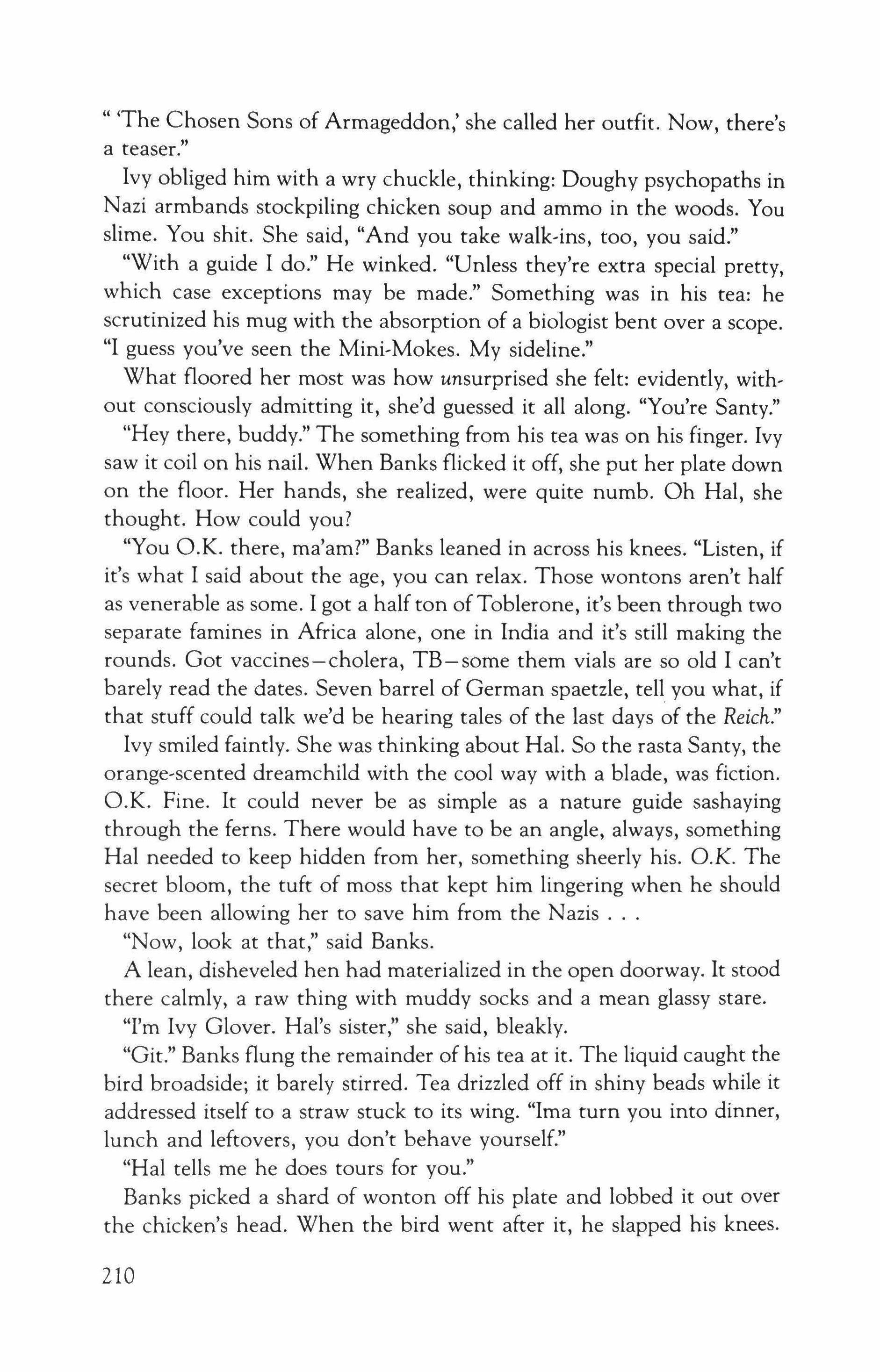
'The Chosen Sons of Armageddon,' she called her outfit. Now, there's a teaser."
Ivy obliged him with a wry chuckle, thinking: Doughy psychopaths in Nazi armbands stockpiling chicken soup and ammo in the woods. You slime. You shit. She said, "And you take walk-iris, too, you said."
"With a guide I do." He winked. "Unless they're extra special pretty, which case exceptions may be made." Something was in his tea: he scrutinized his mug with the absorption of a biologist bent over a scope. "I guess you've seen the Mini-Mokes, My sideline."
What floored her most was how unsurprised she felt: evidently, without consciously admitting it, she'd guessed it all along. "You're Santy."
"Hey there, buddy." The something from his tea was on his finger. Ivy saw it coil on his nail. When Banks flicked it off, she put her plate down on the floor. Her hands, she realized, were quite numb. Oh Hal, she thought. How could you?
"You O.K. there, ma'am?" Banks leaned in across his knees. "Listen, if it's what I said about the age, you can relax. Those wontons aren't half as venerable as some. I got a half ton ofToblerone, it's been through two separate famines in Africa alone, one in India and it's still making the rounds. Got vaccines-cholera, TB-some them vials are so old I can't barely read the dates. Seven barrel of German spaetzle, tell you what, if that stuff could talk we'd be hearing tales of the last days of the Reich."
Ivy smiled faintly. She was thinking about Hal. So the rasta Santy, the orange-scented dreamchild with the cool way with a blade, was fiction. O.K. Fine. It could never be as simple as a nature guide sashaying through the ferns. There would have to be an angle, always, something Hal needed to keep hidden from her, something sheerly his. O.K. The secret bloom, the tuft of moss that kept him lingering when he should have been allowing her to save him from the Nazis
"Now, look at that," said Banks.
A lean, disheveled hen had materialized in the open doorway. It stood there calmly, a raw thing with muddy socks and a mean glassy stare.
"I'm Ivy Glover. Hal's sister," she said, bleakly.
"Git." Banks flung the remainder of his tea at it. The liquid caught the bird broadside; it barely stirred. Tea drizzled off in shiny beads while it addressed itself to a straw stuck to its wing. "Ima turn you into dinner, lunch and leftovers, you don't behave yourself."
"Hal tells me he does tours for you."
Banks picked a shard of wonton off his plate and lobbed it out over the chicken's head. When the bird went after it, he slapped his knees.
210

"You know, that bird is wild for Chinese. She'll come begging every time."
"Hal Glover," Ivy said. "He works for you."
"I guess I ought to know who works for me, ma'am."
"What's the problem, Mr. Banks? Are his tours not working out?"
That stopped him. He regarded her, amused. Problem? he repeated. Hal Glover's tours were flat-out hands-down all-stops-out the best damn nature tours south of Havana. Why, you could point to anything, bamboo, a clump of moss, and Hal would have a name for it, plus a half dozen legends, and a use. He was a sponge, this kid. Knew botanicals from soup to nuts, the folklore and the Latin stuff, and could give it back, what's more, in spades. Why, Banks himself had taken one of Hal's tours. Learned a holy heap:
"Hal told all about the canopy. I never even knew the word. Well, he made it just hop to life. He said that's where the action is. Not down where we are on the trails, like we think, but way up in the treetops where we don't have a clue. That's the plaza suite, the penthouse. That's where all the monkeys, parrots and the rest of them are having them a time. And everything down low, it's just a dead zone, like the bottom level of a parking garage. So if you want to see the rain forest like it is, you need to get yourself a vantage point up over it, like birds do. You need to get on up above."
Ivy had no trouble with this skein of reminiscence. People took to Hal, felt grateful, moved, let in on something-and why not? Here were these weird woods, this cacophony of green, and this one guy, not even local, not even black, could turn the gibberish to poetry, decode it and make it legible, make it talk. Banks's praise made a bond between them, a pact of pride in Hal's excellence, and for one deluded moment, she even nodded him along, relieved.
Then, silence, and again Santy's eyes went small and unsurprisable; she saw the boxes towering around, recalled their source; was chilled. No way, she knew, could this dull crook, this gassy peddler of hijacked disaster aid presume to think he knew her brother. One thin parsnip out of the whole gorgeous stew, that much, maybe, Banks understood-but of the rest of Hal, the stock and salt of him, the old man didn't have a clue. Didn't know about the Beatles fund. Didn't know about the Count. Didn't know how Hal used to do the Pony right along with the go-go girls on Shindig on the hassock in the den, making copper fish molds in the kitchen jiggle on their hooks.
And what about the mermaid? Bet Santy wasn't on to her.
When Hal was twelve Dr. Glover operated on a mermaid. At least,
211
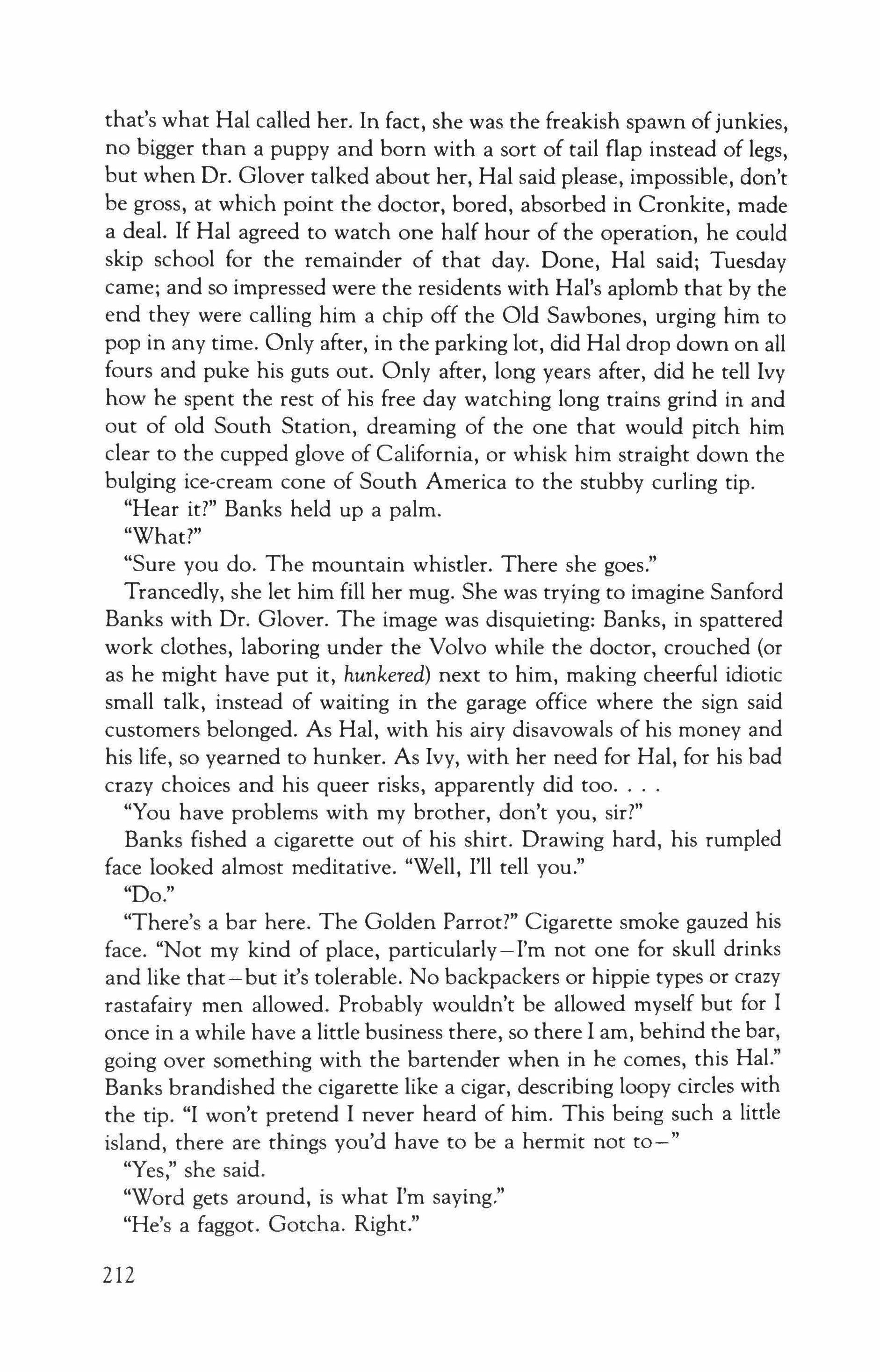
that's what Hal called her. In fact, she was the freakish spawn ofjunkies, no bigger than a puppy and born with a sort of tail flap instead of legs, but when Dr. Glover talked about her, Hal said please, impossible, don't be gross, at which point the doctor, bored, absorbed in Cronkite, made a deal. If Hal agreed to watch one half hour of the operation, he could skip school for the remainder of that day. Done, Hal said; Tuesday came; and so impressed were the residents with Hal's aplomb that by the end they were calling him a chip off the Old Sawbones, urging him to pop in any time. Only after, in the parking lot, did Hal drop down on all fours and puke his guts out. Only after, long years after, did he tell Ivy how he spent the rest of his free day watching long trains grind in and out of old South Station, dreaming of the one that would pitch him clear to the cupped glove of California, or whisk him straight down the bulging ice-cream cone of South America to the stubby curling tip.
"Hear it!" Banks held up a palm.
"What!"
"Sure you do. The mountain whistler. There she goes."
Trancedly, she let him fill her mug. She was trying to imagine Sanford Banks with Dr. Glover. The image was disquieting: Banks, in spattered work clothes, laboring under the Volvo while the doctor, crouched (or as he might have put it, hunkered) next to him, making cheerful idiotic small talk, instead of waiting in the garage office where the sign said customers belonged. As Hal, with his airy disavowals of his money and his life, so yearned to hunker. As Ivy, with her need for Hal, for his bad crazy choices and his queer risks, apparently did too
"You have problems with my brother, don't you, sir!"
Banks fished a cigarette out of his shirt. Drawing hard, his rumpled face looked almost meditative. "Well, I'll tell you."
"Do."
"There's a bar here. The Golden Parrot?" Cigarette smoke gauzed his face. "Not my kind of place, particularly-I'm not one for skull drinks and like that-but it's tolerable. No backpackers or hippie types or crazy rastafairy men allowed. Probably wouldn't be allowed myself but for I once in a while have a little business there, so there I am, behind the bar, going over something with the bartender when in he comes, this Hal."
Banks brandished the cigarette like a cigar, describing loopy circles with the tip. "I won't pretend I never heard of him. This being such a little island, there are things you'd have to be a hermit not to-"
"Yes," she said.
"Word gets around, is what I'm saying."
"He's a faggot. Gotcha. Right."
212
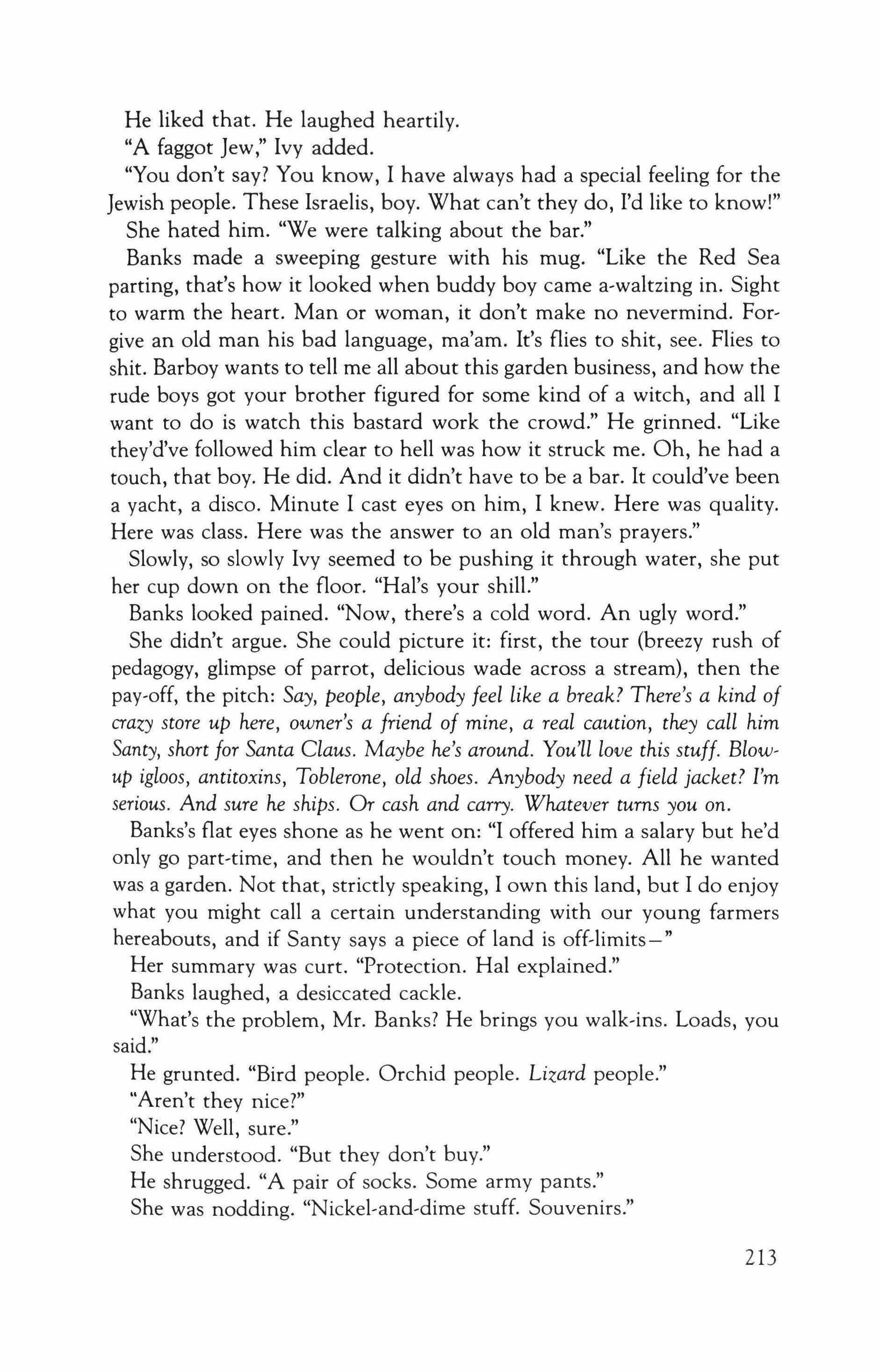
He liked that. He laughed heartily.
"A faggot Jew," Ivy added.
"You don't say? You know, I have always had a special feeling for the Jewish people. These Israelis, boy. What can't they do, I'd like to know!"
She hated him. "We were talking about the bar."
Banks made a sweeping gesture with his mug. "Like the Red Sea parting, that's how it looked when buddy boy came a-waltzing in. Sight to warm the heart. Man or woman, it don't make no nevermind. Forgive an old man his bad language, ma'am. It's flies to shit, see. Flies to shit. Barboy wants to tell me all about this garden business, and how the rude boys got your brother figured for some kind of a witch, and all I want to do is watch this bastard work the crowd." He grinned. "Like they'd've followed him clear to hell was how it struck me. Oh, he had a touch, that boy. He did. And it didn't have to be a bar. It could've been a yacht, a disco. Minute I cast eyes on him, I knew. Here was quality. Here was class. Here was the answer to an old man's prayers."
Slowly, so slowly Ivy seemed to be pushing it through water, she put her cup down on the floor. "Hal's your shill."
Banks looked pained. "Now, there's a cold word. An ugly word."
She didn't argue. She could picture it: first, the tour (breezy rush of pedagogy, glimpse of parrot, delicious wade across a stream), then the pay-off, the pitch: Say, people, anybody feel like a break? There's a kind of crazy store up here, owner's a friend of mine, a real caution, they call him Santy, short for Santa Claus. Maybe he's around. You'll love this stuff. Blowup igloos, antitoxins, Toblerone, old shoes. Anybody need a field jacket? I'm serious. And sure he ships. Or cash and carry. Whatever turns you on.
Banks's flat eyes shone as he went on: "I offered him a salary but he'd only go part-time, and then he wouldn't touch money. All he wanted was a garden. Not that, strictly speaking, I own this land, but I do enjoy what you might call a certain understanding with our young farmers hereabouts, and if Santy says a piece of land is off-limits -"
Her summary was curt. "Protection. Hal explained."
Banks laughed, a desiccated cackle.
"What's the problem, Mr. Banks? He brings you walk-ins. Loads, you said."
He grunted. "Bird people. Orchid people. Lizard people."
"Aren't they nice?"
"Nice? Well, sure."
She understood. "But they don't buy."
He shrugged. "A pair of socks. Some army pants."
She was nodding. "Nickel-and-dime stuff. Souvenirs."
213
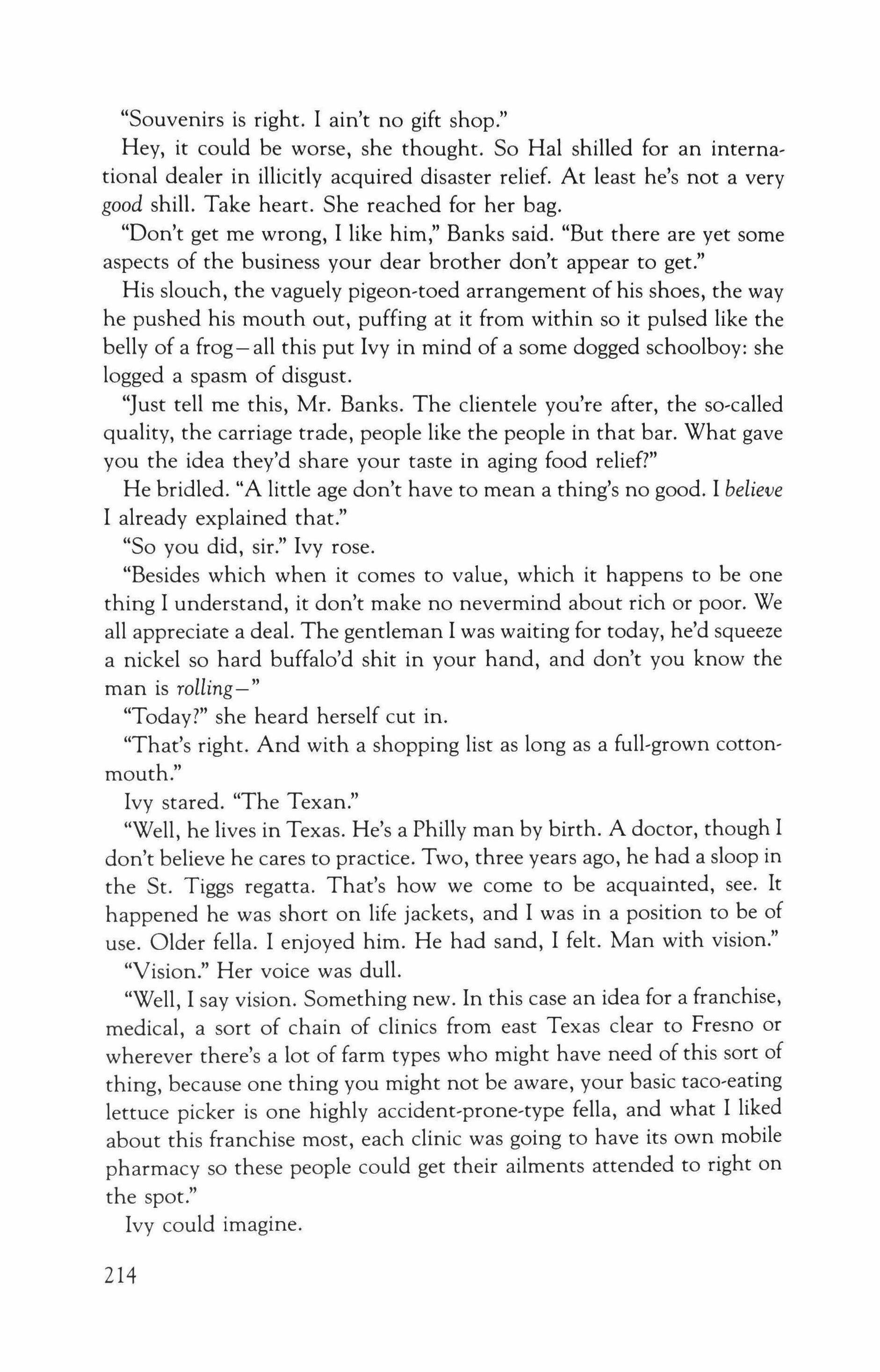
"Souvenirs is right. I ain't no gift shop."
Hey, it could be worse, she thought. So Hal shilled for an international dealer in illicitly acquired disaster relief. At least he's not a very good shill. Take heart. She reached for her bag.
"Don't get me wrong, I like him," Banks said. "But there are yet some aspects of the business your dear brother don't appear to get."
His slouch, the vaguely pigeon-toed arrangement of his shoes, the way he pushed his mouth out, puffing at it from within so it pulsed like the belly of a frog - all this put Ivy in mind of a some dogged schoolboy: she logged a spasm of disgust.
"Just tell me this, Mr. Banks. The clientele you're after, the so-called quality, the carriage trade, people like the people in that bar. What gave you the idea they'd share your taste in aging food relief?"
He bridled. "A little age don't have to mean a thing's no good. I believe I already explained that."
"So you did, sir." Ivy rose.
"Besides which when it comes to value, which it happens to be one thing I understand, it don't make no nevermind about rich or poor. We all appreciate a deal. The gentleman I was waiting for today, he'd squeeze a nickel so hard buffalo'd shit in your hand, and don't you know the man is rolling -
"Today?" she heard herself cut in.
"That's right. And with a shopping list as long as a full-grown cottonmouth."
Ivy stared. "The Texan."
"Well, he lives in Texas. He's a Philly man by birth. A doctor, though I don't believe he cares to practice. Two, three years ago, he had a sloop in the St. Tiggs regatta. That's how we come to be acquainted, see. It happened he was short on life jackets, and I was in a position to be of use. Older fella. I enjoyed him. He had sand, I felt. Man with vision."
"Vision." Her voice was dull.
"Well, I say vision. Something new. In this case an idea for a franchise, medical, a sort of chain of clinics from east Texas clear to Fresno or wherever there's a lot of farm types who might have need of this sort of thing, because one thing you might not be aware, your basic taco-eating lettuce picker is one highly accident-prone-type fella, and what I liked about this franchise most, each clinic was going to have its own mobile pharmacy so these people could get their ailments attended to right on the spot."
Ivy could imagine.
214
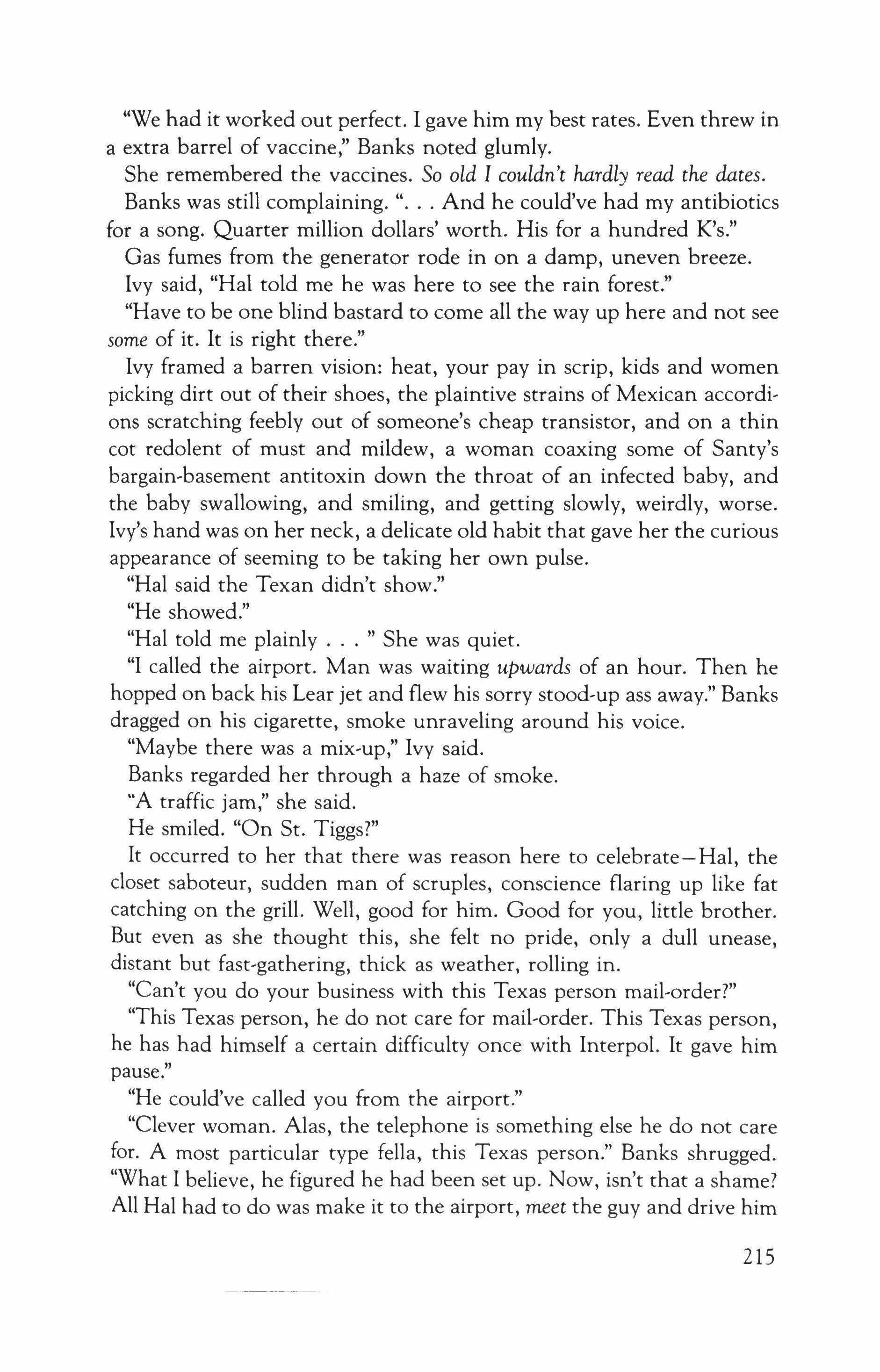
"We had it worked out perfect. I gave him my best rates. Even threw in a extra barrel of vaccine," Banks noted glumly.
She remembered the vaccines. So old I couldn't hardly read the dates.
Banks was still complaining. " And he could've had my antibiotics for a song. Quarter million dollars' worth. His for a hundred K's."
Gas fumes from the generator rode in on a damp, uneven breeze.
Ivy said, "Hal told me he was here to see the rain forest."
"Have to be one blind bastard to come all the way up here and not see some of it. It is right there."
Ivy framed a barren vision: heat, your pay in scrip, kids and women picking dirt out of their shoes, the plaintive strains of Mexican accordions scratching feebly out of someone's cheap transistor, and on a thin cot redolent of must and mildew, a woman coaxing some of Santy's bargain-basement antitoxin down the throat of an infected baby, and the baby swallowing, and smiling, and getting slowly, weirdly, worse. Ivy's hand was on her neck, a delicate old habit that gave her the curious appearance of seeming to be taking her own pulse.
"Hal said the Texan didn't show."
"He showed."
"Hal told me plainly She was quiet.
"I called the airport. Man was waiting upwards of an hour. Then he hopped on back his Lear jet and flew his sorry stood-up ass away." Banks dragged on his cigarette, smoke unraveling around his voice.
"Maybe there was a mix-up," Ivy said.
Banks regarded her through a haze of smoke.
"A traffic jam," she said.
He smiled. "On St. Tiggs?"
It occurred to her that there was reason here to celebrate-Hal, the closet saboteur, sudden man of scruples, conscience flaring up like fat catching on the grill. Well, good for him. Good for you, little brother. But even as she thought this, she felt no pride, only a dull unease, distant but fast-gathering, thick as weather, rolling in.
"Can't you do your business with this Texas person mail-order?"
"This Texas person, he do not care for mail-order. This Texas person, he has had himself a certain difficulty once with Interpol. It gave him pause."
"He could've called you from the airport."
"Clever woman. Alas, the telephone is something else he do not care for. A most particular type fella, this Texas person." Banks shrugged. "What I believe, he figured he had been set up. Now, isn't that a shame? All Hal had to do was make it to the airport, meet the guy and drive him
215
up. All of which is just to say, Mission Impossible this thing was pretty plainly not."
She pulled her pack on. "I'd better go."
Banks was blowing smoke rings. "I don't know," he said. "I shouldn't take it personal, but it's my makeup. You know hemophiliacs? Someone hurts my feelings, I just bleed away like a ole pig." He drained his tea in one loud gulp and eyed her bluntly. "Seen his garden?"
"No."
"Nor I. These old bones of mine won't get me up there. Word is it's a pretty chunk of land. He's lucky." He blinked. "So far, anyway. Our young farmers hereabouts, they have ideas of their own."
It took a moment for this point to gain a working foothold in Ivy's mind. And now she felt it, not in her mind but on her flesh, around her neck, fear rising, prickling up her like a case of chills.
"Well, who knows what they're up to, these damn crazy rastafairies. I try to keep an eye out for my friends but these kids, they'll tell you all the land is theirs. Or ought to be. I blame the reggae. It's a pestilence."
"Mr. Banks, is Hal going to lose this garden, too?"
"Lord, let's hope not. That would have to be some kind of record."
"I thought this garden was protected."
He let go a heavy sigh. "Well, I do my best, ma'am. I surely do. But fate will work its course."
The numbness in Ivy's fingers seemed to have trickled back into her wrists. She yanked the pack straps tight. Banks rose stiffly, slapping down his slacks.
"Say, do you like Toblerone? Santy hates to send a visitor away without a treat."
"I had some."
"Have some more. I have a ton."
"It was bad."
His eyes held fast and dancy on her own. "Melt it in a little milk, it'll cook up just fine."
"It was," she said, her back already turned, "inedible."
He was chuckling as she left. "Somebody'll eat it, honey. Someone always does."

What kept going through her mind was this: a saying of her father's, something he used to work into his lectures at the med school. Ifyou hear
8
216
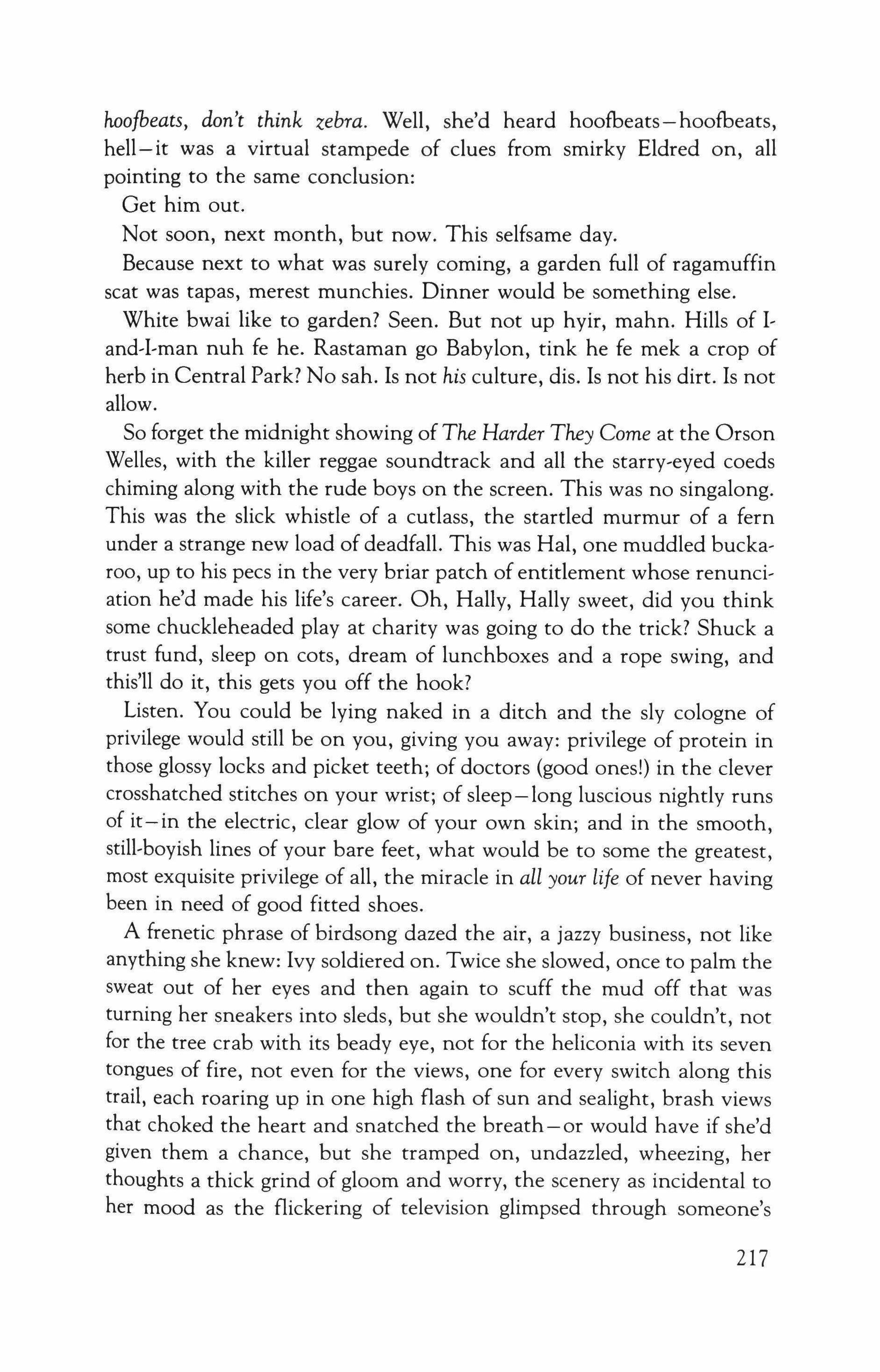
hoofbeats, don't think zebra. Well, she'd heard hoofbeats-hoofbeats, hell-it was a virtual stampede of clues from smirky Eldred on, all pointing to the same conclusion:
Get him out.
Not soon, next month, but now. This selfsame day.
Because next to what was surely coming, a garden full of ragamuffin scat was tapas, merest munchies. Dinner would be something else.
White bwai like to garden? Seen. But not up hyir, mahn. Hills of land-I-rnan nuh fe he. Rastaman go Babylon, tink he fe mek a crop of herb in Central Park? No sah. Is not his culture, dis. Is not his dirt. Is not allow.
So forget the midnight showing of The Harder They Come at the Orson Welles, with the killer reggae soundtrack and all the starry-eyed coeds chiming along with the rude boys on the screen. This was no singalong. This was the slick whistle of a cutlass, the startled murmur of a fern under a strange new load of deadfall. This was Hal, one muddled buckaroo, up to his pees in the very briar patch of entitlement whose renunciation he'd made his life's career. Oh, Hally, Hally sweet, did you think some chuckleheaded play at charity was going to do the trick? Shuck a trust fund, sleep on cots, dream of lunchboxes and a rope swing, and this'll do it, this gets you off the hook?
Listen. You could be lying naked in a ditch and the sly cologne of privilege would still be on you, giving you away: privilege of protein in those glossy locks and picket teeth; of doctors (good ones!) in the clever crosshatched stitches on your wrist; of sleep-long luscious nightly runs of it-in the electric, clear glow of your own skin; and in the smooth, still-boyish lines of your bare feet, what would be to some the greatest, most exquisite privilege of all, the miracle in all your life of never having been in need of good fitted shoes.
A frenetic phrase of birdsong dazed the air, a jazzy business, not like anything she knew: Ivy soldiered on. Twice she slowed, once to palm the sweat out of her eyes and then again to scuff the mud off that was turning her sneakers into sleds, but she wouldn't stop, she couldn't, not for the tree crab with its beady eye, not for the heliconia with its seven tongues of fire, not even for the views, one for every switch along this trail, each roaring up in one high flash of sun and sealight, brash views that choked the heart and snatched the breath-or would have if she'd given them a chance, but she tramped on, undazzled, wheezing, her thoughts a thick grind of gloom and worry, the scenery as incidental to her mood as the flickering of television glimpsed through someone's
217
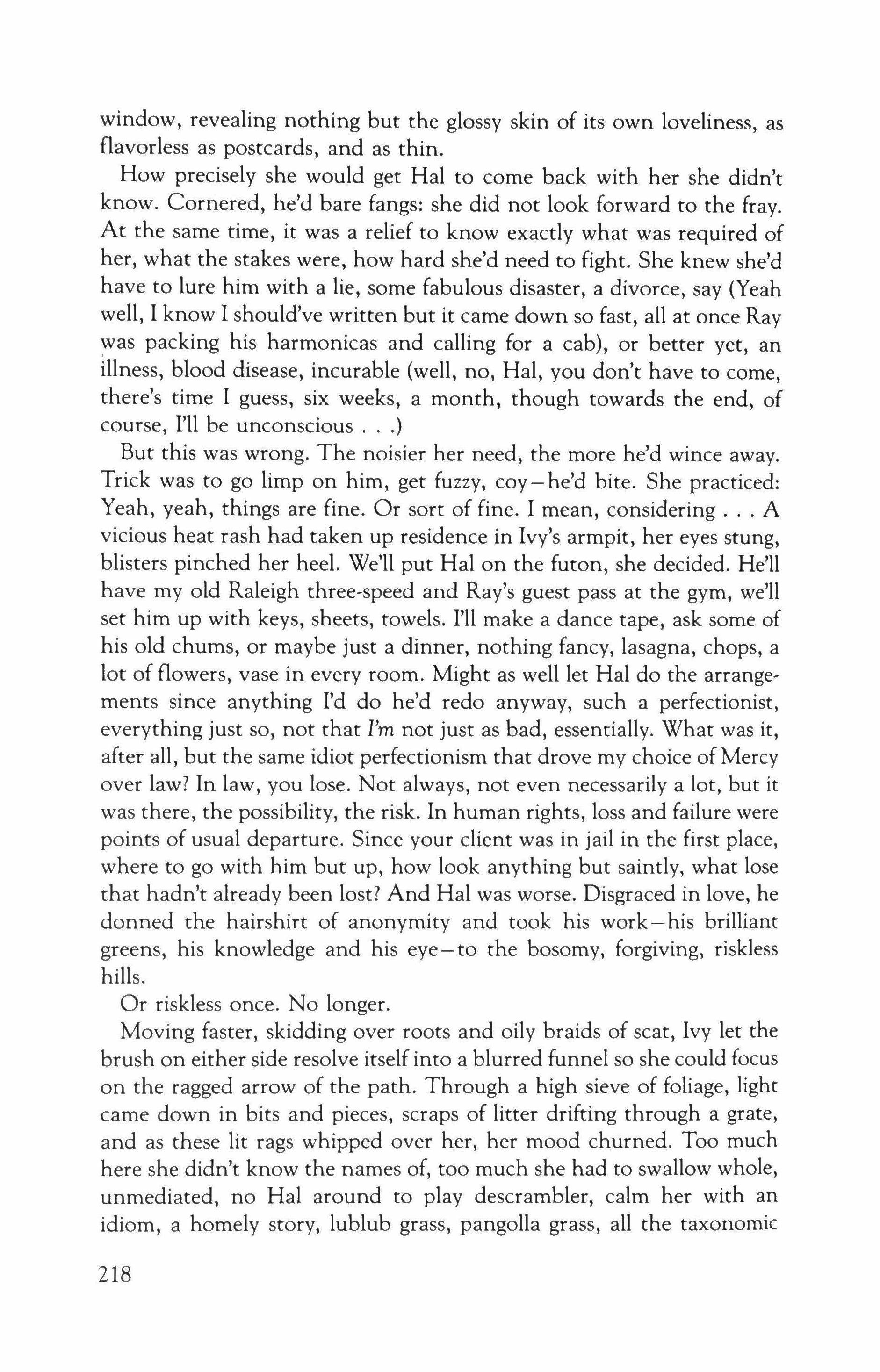
window, revealing nothing but the glossy skin of its own loveliness, as flavorless as postcards, and as thin.
How precisely she would get Hal to come back with her she didn't know. Cornered, he'd bare fangs: she did not look forward to the fray. At the same time, it was a relief to know exactly what was required of her, what the stakes were, how hard she'd need to fight. She knew she'd have to lure him with a lie, some fabulous disaster, a divorce, say (Yeah well, I know I should've written but it came down so fast, all at once Ray was packing his harmonicas and calling for a cab), or better yet, an illness, blood disease, incurable (well, no, Hal, you don't have to come, there's time I guess, six weeks, a month, though towards the end, of course, I'll be unconscious )
But this was wrong. The noisier her need, the more he'd wince away. Trick was to go limp on him, get fuzzy, coy-he'd bite. She practiced: Yeah, yeah, things are fine. Or sort of fine. I mean, considering A vicious heat rash had taken up residence in Ivy's armpit, her eyes stung, blisters pinched her heel. We'll put Halon the futon, she decided. He'll have my old Raleigh three-speed and Ray's guest pass at the gym, we'll set him up with keys, sheets, towels. I'll make a dance tape, ask some of his old chums, or maybe just a dinner, nothing fancy, lasagna, chops, a lot of flowers, vase in every room. Might as well let Hal do the arrangements since anything I'd do he'd redo anyway, such a perfectionist, everything just so, not that I'm not just as bad, essentially. What was it, after all, but the same idiot perfectionism that drove my choice of Mercy over law? In law, you lose. Not always, not even necessarily a lot, but it was there, the possibility, the risk. In human rights, loss and failure were points of usual departure. Since your client was in jail in the first place, where to go with him but up, how look anything but saintly, what lose that hadn't already been lost? And Hal was worse. Disgraced in love, he donned the hairshirt of anonymity and took his work - his brilliant greens, his knowledge and his eye-to the bosomy, forgiving, riskless hills.
Or riskless once. No longer.
Moving faster, skidding over roots and oily braids of scat, Ivy let the brush on either side resolve itself into a blurred funnel so she could focus on the ragged arrow of the path. Through a high sieve of foliage, light came down in bits and pieces, scraps of litter drifting through a grate, and as these lit rags whipped over her, her mood churned. Too much here she didn't know the names of, too much she had to swallow whole, unmediated, no Hal around to play descrarnbler, calm her with an idiom, a homely story, lublub grass, pangolla grass, all the taxonomic
218

fixatives that broke a landscape into intelligible working parts. Not that words alone could do the trick. You take these leaves. Big as surfboards. Moths that imitated faded leaves right down to the little veins and fake spots of decay. Everything was in disguise, off-key, a little monstrous. Hummingbirds resembled bees whirring in the bright beaks of heliconia, or-still weirder-twiddling thumbs. Bamboo, back home a skinny plant you lugged home in a pot, dribbling vermiculite, ascended here in great arcing sheaves like the ribs of a cathedral, sclerotic lichens weathering the wood to the rigidity of stone, stand after stand vaulting up to join ranks in a filigree of leaf, forming bandy-legged arcades. Fit a name to something and before you even got it on, it was splitting at the seams. Not like home, the forests of her girlhood, the woods at camp, ski slopes, milk-white birches behind playing fields at school, even the great good oaks of Central Park, trickless, singular and bold, like galleons at full sail riding proudfully in bowls of clear good light. The roots they grew reached deep and true, none of this sinister meandering. Back home, dirt was dirt, not massy fists of root. Back home, mammals lived where they were meant to live, in mounds, holes and hollow trunks, not larking about the treetops, shrieking, more like birds than beasts.
Well, that's it, then, she told herself. Forget New York. Forget the gym pass. Forget bagpipes, futons, Chinese take-out on the roof. She'd take him to the country, Bucks County, maybe Connecticut, or Woodstock, nothing too remote. All those one-time potheads with their posh boutique nurseries: he'd find work, always had. Or better, get his own thing going, buy a mess ofland and hang a shingle off a mailbox: H.S. Glover, Landscape Gardener, Perennials and Herbs. Kind of spread you fall in love with the moment you clap eyes on it, theirs for pennies, good view, a berry patch, one pond with moody willow, barns, one pair gently mischievous, good-natured ghosts Now that Hal had turned himself into a pauper she guessed she'd have to foot the bill, but hell, a noble cause. At dusk, they'd flap a blanket over crabgrass and count bats cannonading from the eaves. They'd get fat eating powdery donuts and over-milky coffee at country auctions-but not too country, not too bush, nothing outright Appalachian. There would have to be a getaway in striking distance, college town with three used bookshops, squatty library, small but startlingly half-decent art museum, diner where a guy like Hal could wander in and conversation wouldn't drop dead in its tracks. He'd be the guy who bought the Old Whosis place. Friendly kinda fella, seems. Not like these other Sunday gardeners. This one works.
219
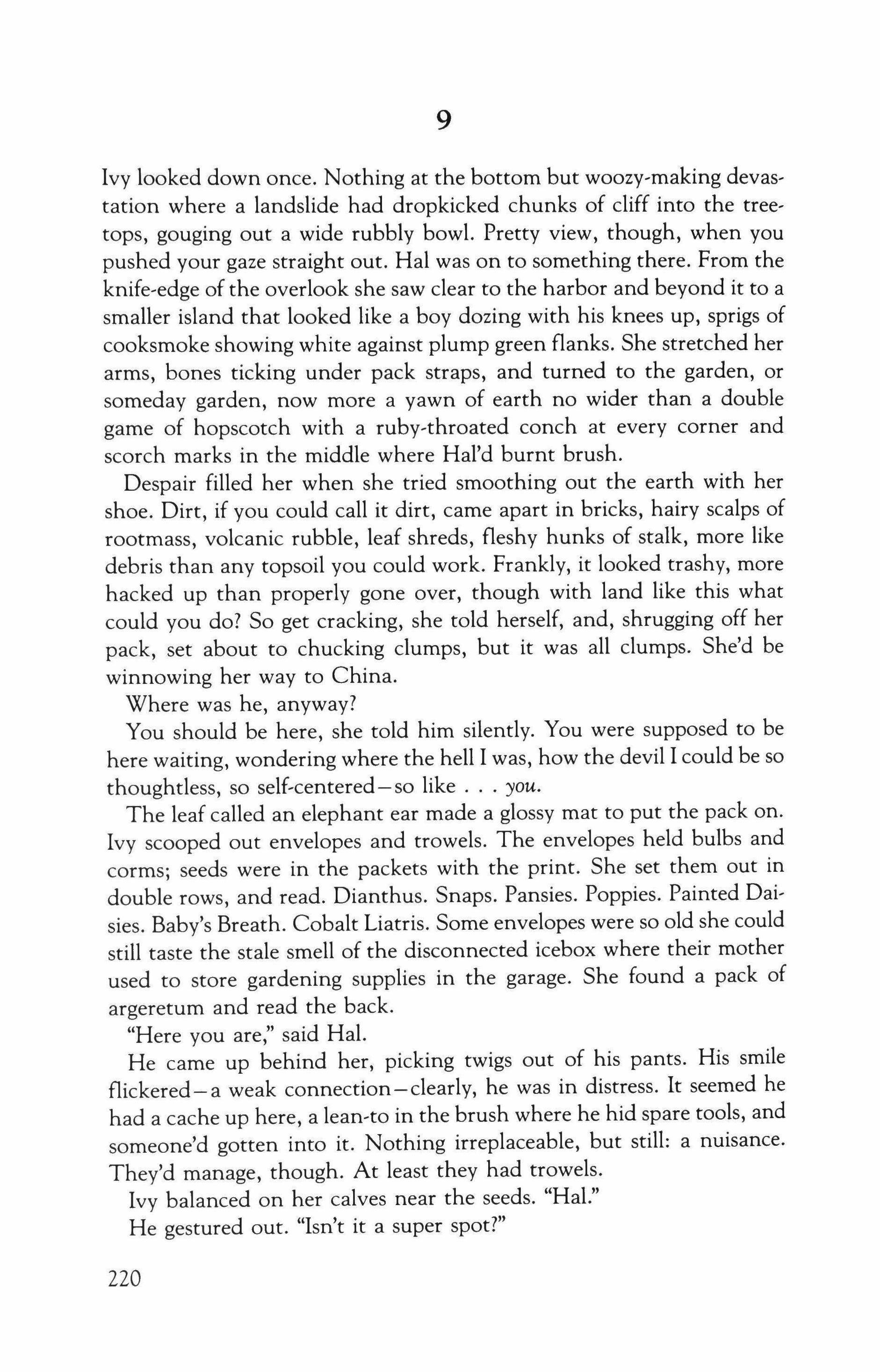
Ivy looked down once. Nothing at the bottom but woozy-making devastation where a landslide had dropkicked chunks of cliff into the treetops, gouging out a wide rubbly bowl. Pretty view, though, when you pushed your gaze straight out. Hal was on to something there. From the knife-edge of the overlook she saw clear to the harbor and beyond it to a smaller island that looked like a boy dozing with his knees up, sprigs of cooksmoke showing white against plump green flanks. She stretched her arms, bones ticking under pack straps, and turned to the garden, or someday garden, now more a yawn of earth no wider than a double game of hopscotch with a ruby-throated conch at every corner and scorch marks in the middle where Hal'd burnt brush.
Despair filled her when she tried smoothing out the earth with her shoe. Dirt, if you could call it dirt, came apart in bricks, hairy scalps of rootmass, volcanic rubble, leaf shreds, fleshy hunks of stalk, more like debris than any topsoil you could work. Frankly, it looked trashy, more hacked up than properly gone over, though with land like this what could you do? So get cracking, she told herself, and, shrugging off her pack, set about to chucking clumps, but it was all clumps. She'd be winnowing her way to China.
Where was he, anyway?
You should be here, she told him silently. You were supposed to be here waiting, wondering where the hell I was, how the devil I could be so thoughtless, so self-centered - so like you.
The leaf called an elephant ear made a glossy mat to put the pack on. Ivy scooped out envelopes and trowels. The envelopes held bulbs and corms; seeds were in the packets with the print. She set them out in double rows, and read. Dianthus. Snaps. Pansies. Poppies. Painted Daisies. Baby's Breath. Cobalt Liatris. Some envelopes were so old she could still taste the stale smell of the disconnected icebox where their mother used to store gardening supplies in the garage. She found a pack of argeretum and read the back.
"Here you are," said Hal.
He came up behind her, picking twigs out of his pants. His smile flickered-a weak connection-clearly, he was in distress. It seemed he had a cache up here, a lean-to in the brush where he hid spare tools, and someone'd gotten into it. Nothing irreplaceable, but still: a nuisance. They'd manage, though. At least they had trowels.
Ivy balanced on her calves near the seeds. "Hal."
He gestured out. "Isn't it a super spot?"
9
220

"These packets here."
He scuffed the ground. "And the drainage is to die:"
"They won't work. They're for Zone Three. It says so on the back here. There's a diagram. You see?"
He laughed. "Little Miss Literal."
"Plus, they've expired."
"Not all of them."
"Yes, all." Between her borrowed clothes and Hal's old pants, the smell of unwashed laundry was suddenly unbearable. "And something else. I met your buddy Santy." She took his ankle. "Sit, please." Above, the wide bowl of the sky held a watery clear broth of blue. Hawks were turning. "I don't think this Mr. Santy has your best interests at heart, Hal."
He was smiling. "People get so worked up over nothing."
She held his ankle tight. "Hally, please sit with me."
He yanked away. "Let me tell you something, dear heart. This garden is going to be a knockout. This garden has a brilliant future. Mark my words."
"Hal."
He made a move away from her, then stopped.
In a mottled span of light under a vine, the kangaroo stood motionless, Hal's bomber jacket hanging off its frame in long full folds.
It wasn't dead. They'd simply stunned it. It had never died at all and here it stood, long lip lifting from black-and-pinkish gums, one lank kangaroo in stiff-shouldered bomber jacket with arms so long they dragged the ground. It sneezed. They saw its tail lift and fall, thwacking hard behind. Then it took off bounding down toward the brush, black arms flapping loose like pennants with each galvanic leap, and disappeared into a lush bed of ferns.
"Cool," Hal murmured.
Ivy didn't think so. She thought it was spookier than shit. She looked at Hal, now standing with the wide pink mouth of a conch pressed to his ear. White as milk, his face wore the abstracted, slightly dreamy look of someone who has been placed on hold and made to listen to Muzak.
"Come back," she commanded.
He blinked at her, and smiled. "You have an anniversary next week. Do you and Ray go out?"
God help me, she thought. I think I'm really going to have to murder him. "Sometimes yes, and sometimes no. Sometimes we stay home and make a lot of rich desserts. Hal, can we bear down a little, please? Just some?"
221
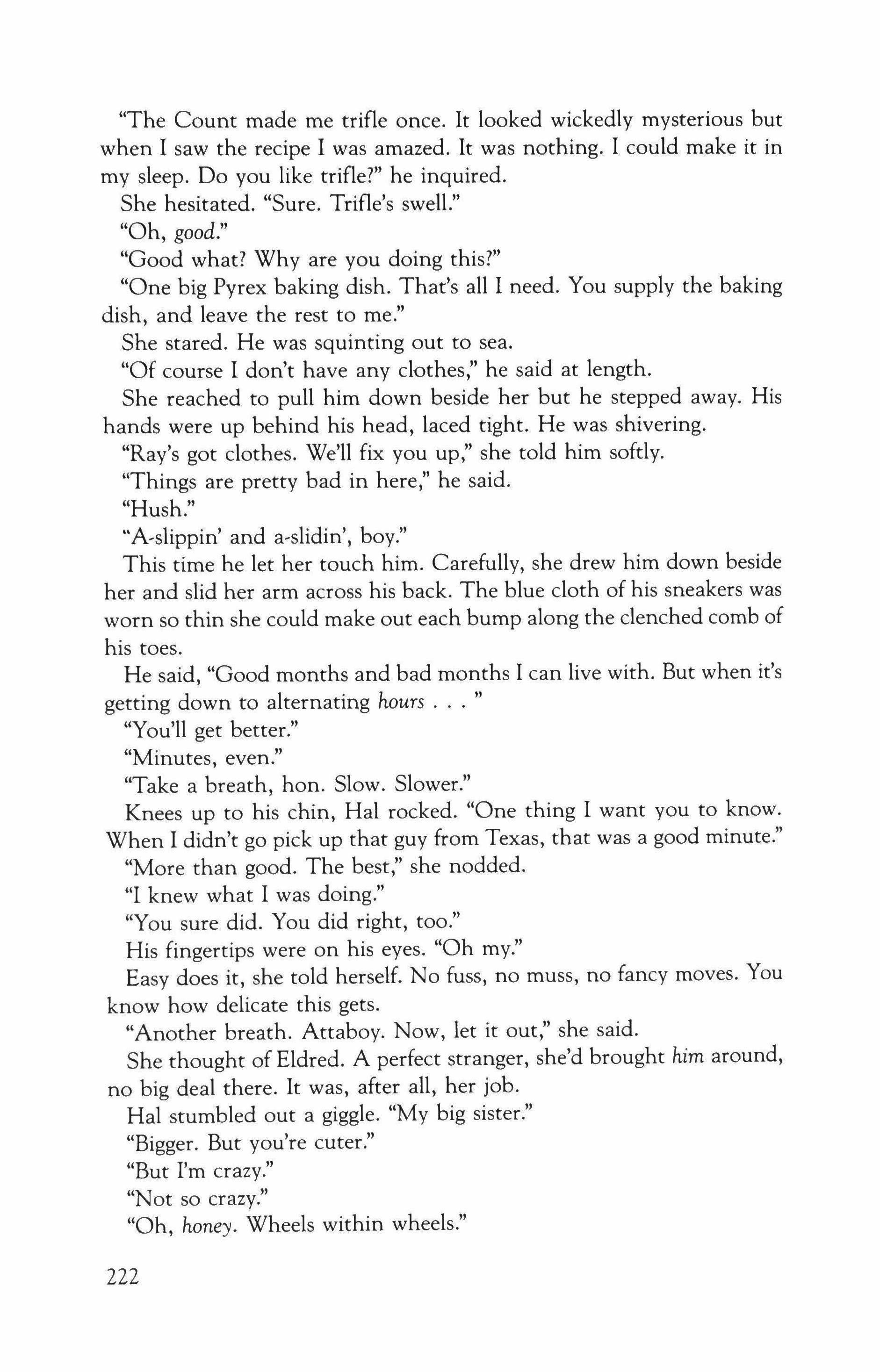
"The Count made me trifle once. It looked wickedly mysterious but when I saw the recipe I was amazed. It was nothing. I could make it in my sleep. Do you like trifle?" he inquired.
She hesitated. "Sure. Trifle's swell."
"Oh, good."
"Good what? Why are you doing this?"
"One big Pyrex baking dish. That's all I need. You supply the baking dish, and leave the rest to me."
She stared. He was squinting out to sea.
"Of course I don't have any clothes," he said at length.
She reached to pull him down beside her but he stepped away. His hands were up behind his head, laced tight. He was shivering.
"Ray's got clothes. We'll fix you up," she told him softly.
"Things are pretty bad in here," he said.
"Hush."
"Aeslippin' and a-slidin', boy."
This time he let her touch him. Carefully, she drew him down beside her and slid her arm across his back. The blue cloth of his sneakers was worn so thin she could make out each bump along the clenched comb of his toes.
He said, "Good months and bad months I can live with. But when it's getting down to alternating hours
"You'll get better."
"Minutes, even."
"Take a breath, hon. Slow. Slower."
Knees up to his chin, Hal rocked. "One thing I want you to know. When I didn't go pick up that guy from Texas, that was a good minute."
"More than good. The best," she nodded.
"I knew what I was doing."
"You sure did. You did right, too."
His fingertips were on his eyes. "Oh my."
Easy does it, she told herself. No fuss, no muss, no fancy moves. You know how delicate this gets.
"Another breath. Attaboy. Now, let it out," she said.
She thought of Eldred. A perfect stranger, she'd brought him around, no big deal there. It was, after all, her job.
Hal stumbled out a giggle. "My big sister."
"Bigger. But you're cuter."
"But I'm crazy."
"Not so crazy."
"Oh, honey. Wheels within wheels."
222

O.K., she thought, it's time. Stripping in a little line here, time to bring this beauty home. She gave him a squeeze. "We won't worry about it now. First, we get you packed."
"Right." He didn't stir. "It's not getting well I'm scared of. It's staying second-rate. Know what I mean? Second-rate-ness was never in the plan." Ivy rose and started putting trowels back into the pack. "You do bear with me," he observed.
"Let's go, hon."
"Where's it come from?"
She put out her hand. "Up, up, up."
His gaze was grave. "Say, do you and Ray have window boxes?"
"Somewhere, probably." She wanted to get going.
"I do lovely window boxes."
"Wonderful. Sounds great."
"And I'll get a place as soon as I get work. I swear it."
"Hal. Dear God. One thing at a time."
He got up slowly, one palm still clamped on his skull.
"Here. Hold my hand," she said.
"One thing that makes me nuts. Not that I'm not already nuts. But it grieves me, Ive, this sweet garden in the hands of some moronic rasta. Marijuana is a sorry weed." He rubbed his face. "Boy, I'm beat."
"You'll do more gardens."
"Stupid gardens."
She took him hard by the shoulders. "Lovely gardens. Gardens they'll be studying for years. You think I'm kidding?" Hal blinked at her. "Amazing things will happen in these gardens. Holy men from India will kneel in your mint. Satyrs. Nymphs. Hidden sprinklers in the grass that only go off when we're wearing our best clothes."
He swayed a little. "Neat," he said.
"Kings, Hal. They'll come on elephants from strange lands to cool their feet in the pure waters of your fountain. I'm telling you. It's in the bag." She gestured wildly. "Even now a royal elephant falls to its knees. Drums roll as the beautiful young king ascends the howdah. An eerie keening fills the air."
His smile was faint. "Listen, just while you're talking, is it O.K. if I rest a little?" Turning from her, he took some steps.
"Rest on the plane," she told him, startled.
He walked some more. "Just if I could find a nice place to rest a little where maybe it's not so full of dirt."
She stared after him.
"All this dirt up here," he said.
223

"Hey," she said. And louder: "Hey."
But he continued to head out the way he'd started, following the direction of his legs. She screamed, of course. At least she thought she screamed. Strange this was the one thing she never could remember. What she would recall was the air leaning back against her when she broke after him, and the bare gravel jabbing roughly at her knees and palms when she got to where the cliff gave way to air. High as she was, she could still make out the twirl of him, the way he'd landed not face first but on his side, spilt, less like something aimed than just let go, surrendered. And how his head was pulled back from his body as if he'd caught sight of something, like the jar of marmalade Alice glimpses as she tumbles down the rabbit hole, or a scrawl of lichen, or a fern he knew and knew he knew, just not well enough to name before this last berth felt the loose slap of his bones. 10
Ray Salsa would have this to say:
Let me offer an analogy. I tell you I'm in human rights. What's your reaction? Face it, you're in awe. Maybe you have a Mercy coffee mug, a T-shirt. Maybe we're your heroes. That's the first phase, the friendly phase. We hate to see it end.
Then, phase two. Not so friendly. You've been thinking. Human rights, eh? Not to say you're anti-rights but let's talk about this, let's work this out. What gives us the right to draw some arbitrary line between one grade of suffering (call it hi-rest) and the rest-say, torture in a Guatemalan jail versus some cop pounding a black man in Detroit, or for that matter, any form of human heartache, right down to a kid with a sore tooth comes home from school to kiss his mother and she nearly slaps him bald: and who are we to say that what he feels isn't torture, that it-sorry, sonny-does not make the cut?
To which I say, it makes the cut. Come Judgment Day, everybody's a contender, everybody makes that shining cut on high. I not only know this, I goddam well insist upon it. But here's where I get stuck. I have this snippet lifetime, and this need - call it selfish, call it small-for tangible results. Our work with Mercy, it's sort of like the supermarket sweepstakes. We get one minute to fill the cart with freebies. Do we drift along detergents maybe, stock up on Cheerios and milk-or, make a beeline for the T�bones, double sirloins, flake crab?
One minute. Think about it. What's it going to be? Steak, or Cheer-
224

ios? Or to put another spin on it. Torture, disappearances, jail without trial, or- him. Mister Cheerios himself.
Hal had a life, see. Not much of one that I can see but don't get me going there. And don't go asking, well, isn't it more complicated, and what about the head thing, clinical depression, maybe worse. If it was complicated, it was very simple. This was his life, his golden gift. And a gift (at least, how I was raised) is news. I mean, the luck of him! Of all of us!
And never mind if the gift is maybe not quite to your taste or maybe it doesn't fit so wonderful, whatever. A man, a free man, peak of health, all faculties intact, who does this, who would junk the gift, what can I say? This kind of prick, I have but one thing to tell him. Go fuck yourself. And if he's dead? So what. Go fuck yourself. Same thing.
What Santy couldn't figure was why Hal never asked. Knowed goddamned well I could've helped, he said.
My number-two freezer truck, it's one whole side of it laid out in rows of pharmaceuticals, and every bitty bottle its name right on it and instructions on how to use. Kid could've had his pick. Which it only goes to show the little pansy never did take this operation serious. His loss too, I'll tell you. Knowing me, old softie here, I wouldn't've charged him hardly nothing. And my knockout drops do not come cheap, better believe.
Took a winch to get him out. Big army chopper whaling around up there, whipping up a stew of grit. The rastafairies thought it was a raid, like to scare them half to death. As for that sorry patch of nothing he called a garden, you want it? Take it. It's on me. After this, the farmers won't go near. It's spoilt now. Blue waves of light flaring off the cliff at night, a lady singing songs you listen long enough, gone lose your mind. Even Wellesley's got a story. Went up once, just one time directly after, come back with a grin like death. Swears up and down he saw him. It's Hal, he says. He's back. And come back, he has the nerve to tell me (do this beat all?) as a damn kangaroo.
Swing now to a metal-sided tract house filled with suitcases and boxes only partially unpacked. The hour: beyond late, unheard-of, friendless. The lawn: black as fur out there under a starless Nebraskan sky just just starting to relent into a blue.
At least this is how I see it. I could be wrong. He could be living in a trailer, or over a storefront pentecostal church on a street where cowboys once raced the first electric trolley down its rough muddy length.
225
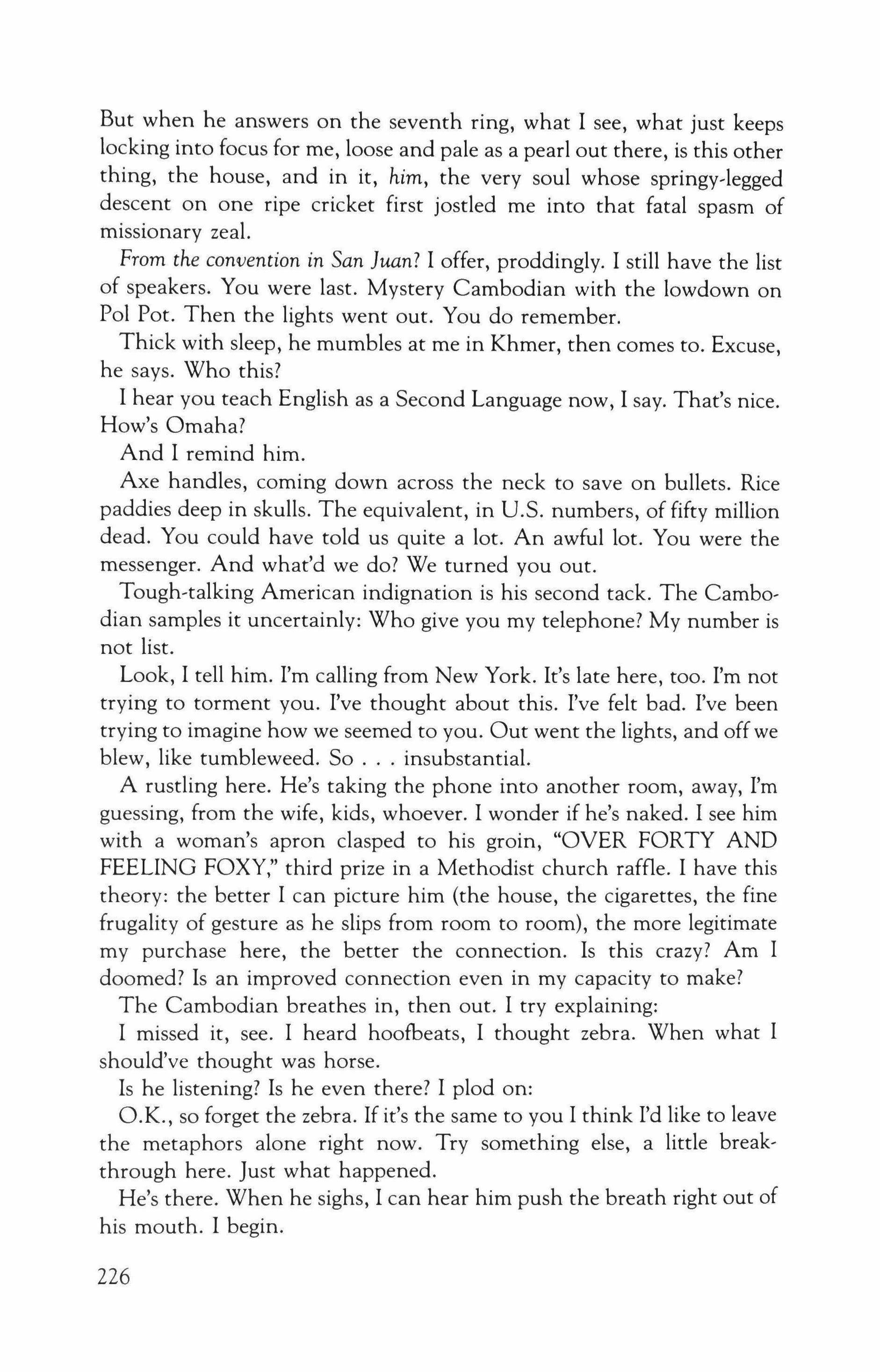
But when he answers on the seventh ring, what I see, what just keeps locking into focus for me, loose and pale as a pearl out there, is this other thing, the house, and in it, him, the very soul whose springy-legged descent on one ripe cricket first jostled me into that fatal spasm of missionary zeal.
From the convention in San Juan? I offer, proddingly. I still have the list of speakers. You were last. Mystery Cambodian with the lowdown on Pol Pot. Then the lights went out. You do remember.
Thick with sleep, he mumbles at me in Khmer, then comes to. Excuse, he says. Who this?
I hear you teach English as a Second Language now, I say. That's nice. How's Omaha?
And I remind him.
Axe handles, coming down across the neck to save on bullets. Rice paddies deep in skulls. The equivalent, in U.S. numbers, of fifty million dead. You could have told us quite a lot. An awful lot. You were the messenger. And what'd we do? We turned you out.
Tough-talking American indignation is his second tack. The Cambodian samples it uncertainly: Who give you my telephone? My number is not list.
Look, I tell him. I'm calling from New York. It's late here, too. I'm not trying to torment you. I've thought about this. I've felt bad. I've been trying to imagine how we seemed to you. Out went the lights, and off we blew, like tumbleweed. So insubstantial.
A rustling here. He's taking the phone into another room, away, I'm guessing, from the wife, kids, whoever. I wonder if he's naked. I see him with a woman's apron clasped to his groin, "OVER FORTY AND FEELING FOXY," third prize in a Methodist church raffle. I have this theory: the better I can picture him (the house, the cigarettes, the fine frugality of gesture as he slips from room to room), the more legitimate my purchase here, the better the connection. Is this crazy? Am I doomed? Is an improved connection even in my capacity to make?
The Cambodian breathes in, then out. I try explaining: I missed it, see. I heard hoofbeats, I thought zebra. When what I should've thought was horse.
Is he listening? Is he even there? I plod on:
O.K., so forget the zebra. If it's the same to you I think I'd like to leave the metaphors alone right now. Try something else, a little breakthrough here. Just what happened.
He's there. When he sighs, I can hear him push the breath right out of his mouth. I begin.
226

My brother, who you don't know, died last year. O.K., not died. Let's get this out. Right where I could see, he killed himself, kaboom. And afterwards I used to think of stuff, the one line, the saving speech, the key thing I could've said that would've changed the course of history. Are you familiar with this particular routine? I actually kept lists. If I'd said this, if I'd done that? You see what I was up to? Anything to help me think there was something I could have done to tip the scales.
Another pause. I ratchet out a laugh.
Come on now, Omaha. You've been there. We all want to feel responsible. Then, when things screw up, we get to feel guilty, and get over feeling guilty, and then it's home-free.
Into a wide palm of silence a hunch presents itself to the Cambodian like a small unexpected gift.
You are in troubles, ma'am?
And from the mouth of wogs, I think, but do I say this? Seconds drift. Asshole, I tell him silently. Not because he is, particularly. More to see if it changes anything to think it.
Just don't hang up, I say.
He coughs into his fist. Outside the back door, where I see him standing, feed corn draws a smudgy line between the night sky and the yard. All the unsold lots of the development are high with corn, undoubtedly to him a savage crop: small children have been known to lose themselves in it for days, sometimes to die!
This phone call gonna cost a bundle, he informs me.
Let it. I'm at the office.
Skyscraper? he wonders, shyly.
I tell him, Sure. Why not? The biggest one you ever saw. And now, I ask you. Name this tune. Is it not pathetic that the action of men on men is so partial? And every man an infinitely repellent orb, and holds his individual being on that condition. Hello? Hey, Omaha, you there?
He coughs. Could be Emmes-sahn?
That's Mister Emerson to you, Jack.
But he's done it. I'm impressed. He knows it, too. He's proud. Everybody in my family a good reader, he says, boldly. Everybody get library card first thing. It free.
Hey, I say. This land is your land, this land is my land.
Not my land yet. First National own now, but someday mine. Well, that's fine. That's just ducky. Clearly, you are looking at the bright side.
Bright side right side, he agrees.
Which is very largely true. Nonetheless (I have to tell him), one has 227
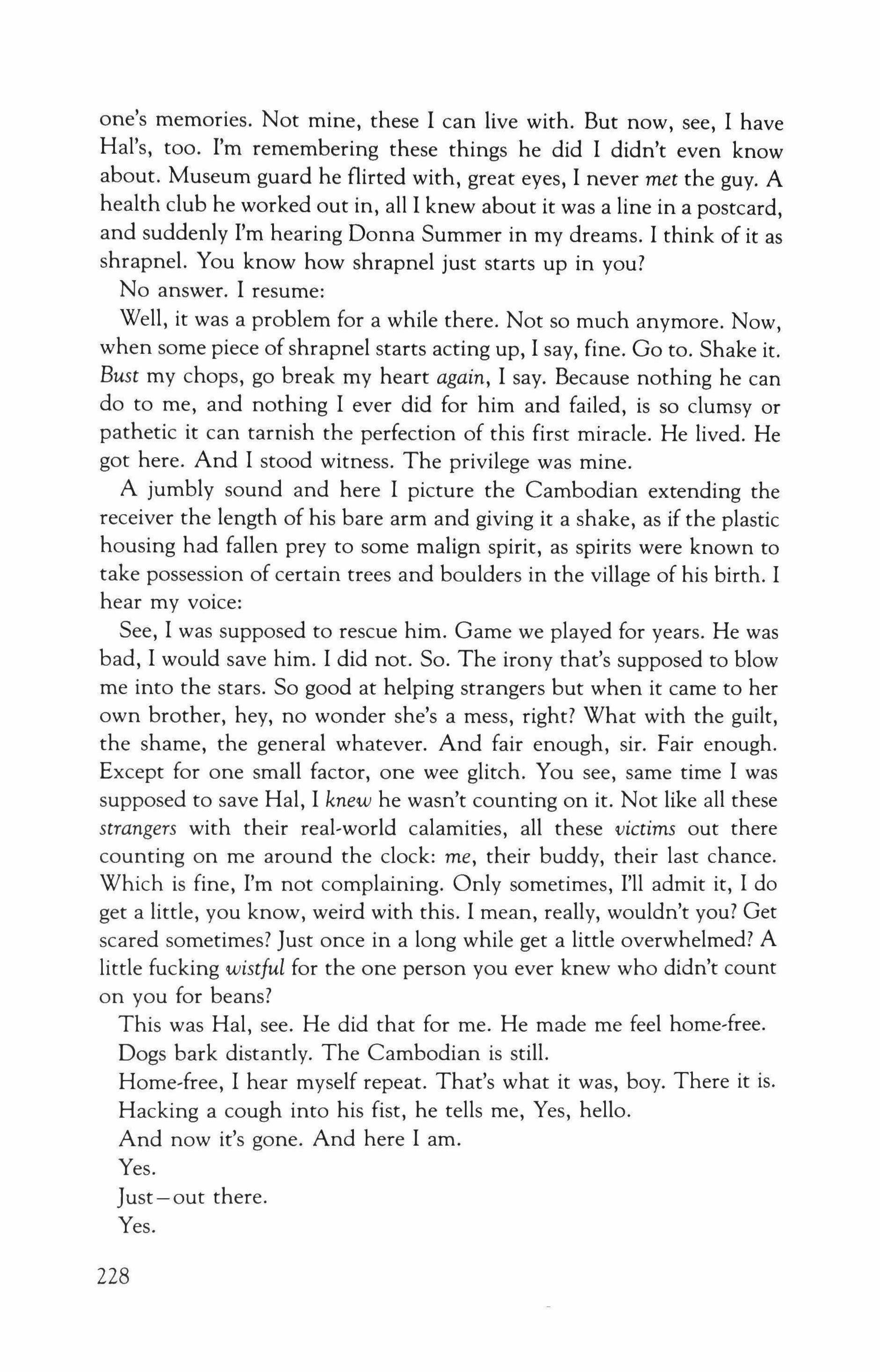
one's memories. Not mine, these I can live with. But now, see, I have Hal's, too. I'm remembering these things he did I didn't even know about. Museum guard he flirted with, great eyes, I never met the guy. A health club he worked out in, all I knew about it was a line in a postcard, and suddenly I'm hearing Donna Summer in my dreams. I think of it as shrapnel. You know how shrapnel just starts up in you?
No answer. I resume:
Well, it was a problem for a while there. Not so much anymore. Now, when some piece of shrapnel starts acting up, I say, fine. Go to. Shake it. Bust my chops, go break my heart again, I say. Because nothing he can do to me, and nothing I ever did for him and failed, is so clumsy or pathetic it can tarnish the perfection of this first miracle. He lived. He got here. And I stood witness. The privilege was mine.
A jumbly sound and here I picture the Cambodian extending the receiver the length of his bare arm and giving it a shake, as if the plastic housing had fallen prey to some malign spirit, as spirits were known to take possession of certain trees and boulders in the village of his birth. I hear my voice:
See, I was supposed to rescue him. Game we played for years. He was bad, I would save him. I did not. So. The irony that's supposed to blow me into the stars. So good at helping strangers but when it came to her own brother, hey, no wonder she's a mess, right? What with the guilt, the shame, the general whatever. And fair enough, sir. Fair enough. Except for one small factor, one wee glitch. You see, same time I was supposed to save Hal, I knew he wasn't counting on it. Not like all these strangers with their real-world calamities, all these victims out there counting on me around the clock: me, their buddy, their last chance. Which is fine, I'm not complaining. Only sometimes, I'll admit it, I do get a little, you know, weird with this. I mean, really, wouldn't you? Get scared sometimes? Just once in a long while get a little overwhelmed? A little fucking wistful for the one person you ever knew who didn't count on you for beans?
This was Hal, see. He did that for me. He made me feel home-free.
Dogs bark distantly. The Cambodian is still.
Home-free, I hear myself repeat. That's what it was, boy. There it is.
Hacking a cough into his fist, he tells me, Yes, hello. And now it's gone. And here I am.
Yes.
Just-out there.
Yes.
228
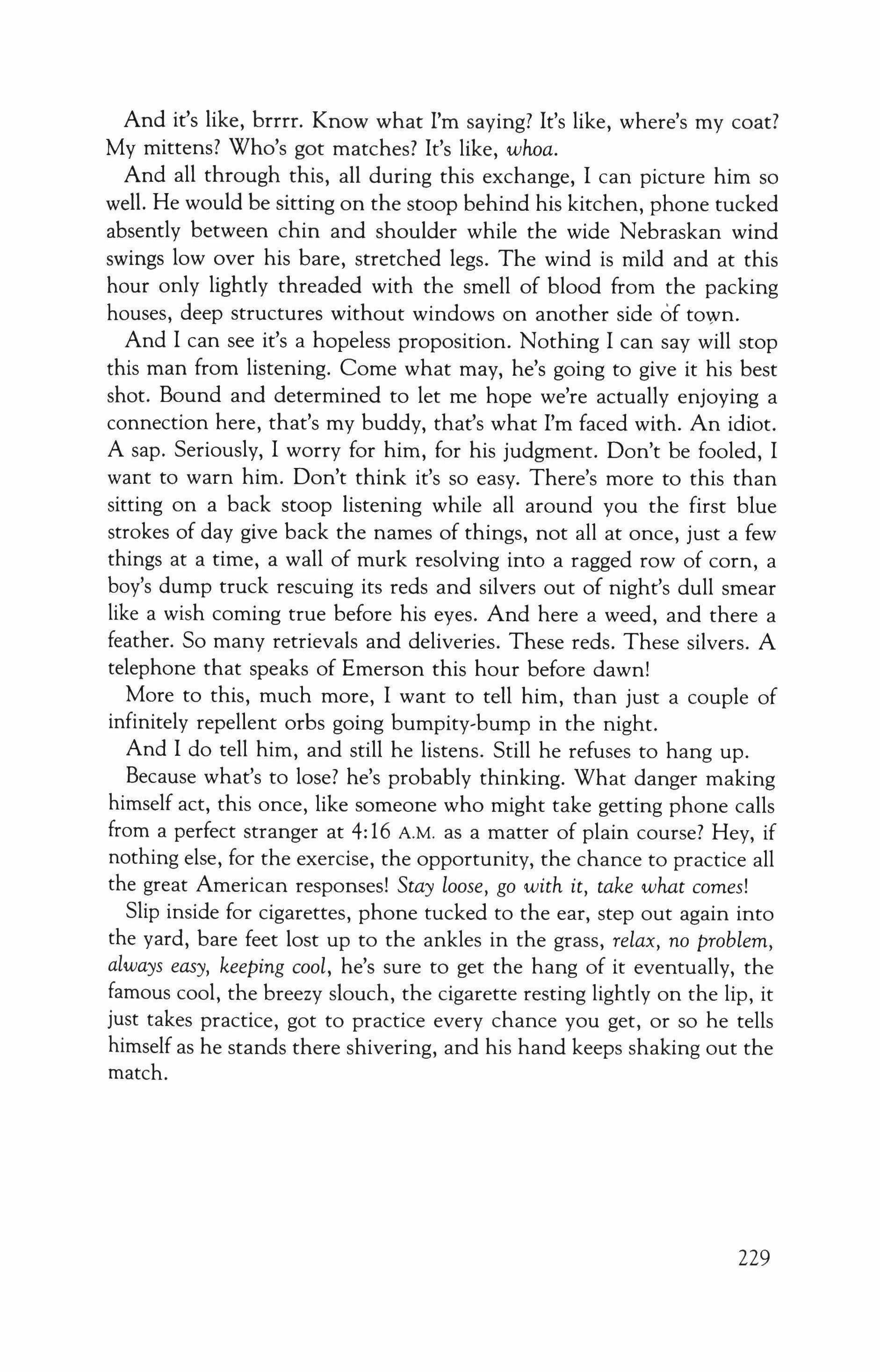
And it's like, brrrr. Know what I'm saying? It's like, where's my coat? My mittens? Who's got matches? It's like, whoa.
And all through this, all during this exchange, I can picture him so well. He would be sitting on the stoop behind his kitchen, phone tucked absently between chin and shoulder while the wide Nebraskan wind swings low over his bare, stretched legs. The wind is mild and at this hour only lightly threaded with the smell of blood from the packing houses, deep structures without windows on another side of town.
And I can see it's a hopeless proposition. Nothing I can say will stop this man from listening. Come what may, he's going to give it his best shot. Bound and determined to let me hope we're actually enjoying a connection here, that's my buddy, that's what I'm faced with. An idiot. A sap. Seriously, I worry for him, for his judgment. Don't be fooled, I want to warn him. Don't think it's so easy. There's more to this than sitting on a back stoop listening while all around you the first blue strokes of day give back the names of things, not all at once, just a few things at a time, a wall of murk resolving into a ragged row of corn, a boy's dump truck rescuing its reds and silvers out of night's dull smear like a wish coming true before his eyes. And here a weed, and there a feather. So many retrievals and deliveries. These reds. These silvers. A telephone that speaks of Emerson this hour before dawn!
More to this, much more, I want to tell him, than just a couple of infinitely repellent orbs going bumpity-bump in the night.
And I do tell him, and still he listens. Still he refuses to hang up. Because what's to lose? he's probably thinking. What danger making himself act, this once, like someone who might take getting phone calls from a perfect stranger at 4: 16 A.M. as a matter of plain course? Hey, if nothing else, for the exercise, the opportunity, the chance to practice all the great American responses! Stay loose, go with it, take what comes! Slip inside for cigarettes, phone tucked to the ear, step out again into the yard, bare feet lost up to the ankles in the grass, relax, no problem, always easy, keeping cool, he's sure to get the hang of it eventually, the famous cool, the breezy slouch, the cigarette resting lightly on the lip, it just takes practice, got to practice every chance you get, or so he tells himself as he stands there shivering, and his hand keeps shaking out the match.
229
Between Salvage and Silvershades: John Berger and What's Left
Fred Pfeil

I discovered John Berger's work twenty years ago now, beginning with his masterpiece G.; and took him as the model for the committed writer I wanted to become.
"Committed" writer, "committed" writing: the very word is apt to seem quaint or even arcane today. But for me back then, just out of school and jobbing around in my early twenties, it seemed there might be a space in the national culture for writing that was both politically and formally progressive. After all, the FBI, CIA and Nixon were, each and all, in disgrace; the U.S. was finally giving up in Vietnam; new or newly mobilized constituencies of women and minorities were opening things up inside the Democratic Party and out on the streets; and in the first half of the decade there were more wildcat strikes than at any time since the heroic days of 1932-36. Still more promising was the general cultural climate such official events fed off and into, of revulsion for the deal as it went down plus the liminal sense that it just might be put together differently. In this roiling medium of jaundice, frustration and utopian desire I both found myself as a writer and politically came of age, through a set of personal circumstances which don't matter here. What does is my encounter with Berger's writing, starting with G. in '73 and stretching on through the rest of the decade; and that matters both in terms of what I wanted and what I mistook.
What I wanted, first of all, was to have the freedom Berger exercised to be both artist and intellectual, to range across fiction, nonfiction and film, and meld imagination with analysis in each; no other writer I could think of at the time, and certainly no American writer, seemed interested in even trying to be a writer like that. But I also wanted to perceive the way Berger could, and to have the forms and language with which to
230
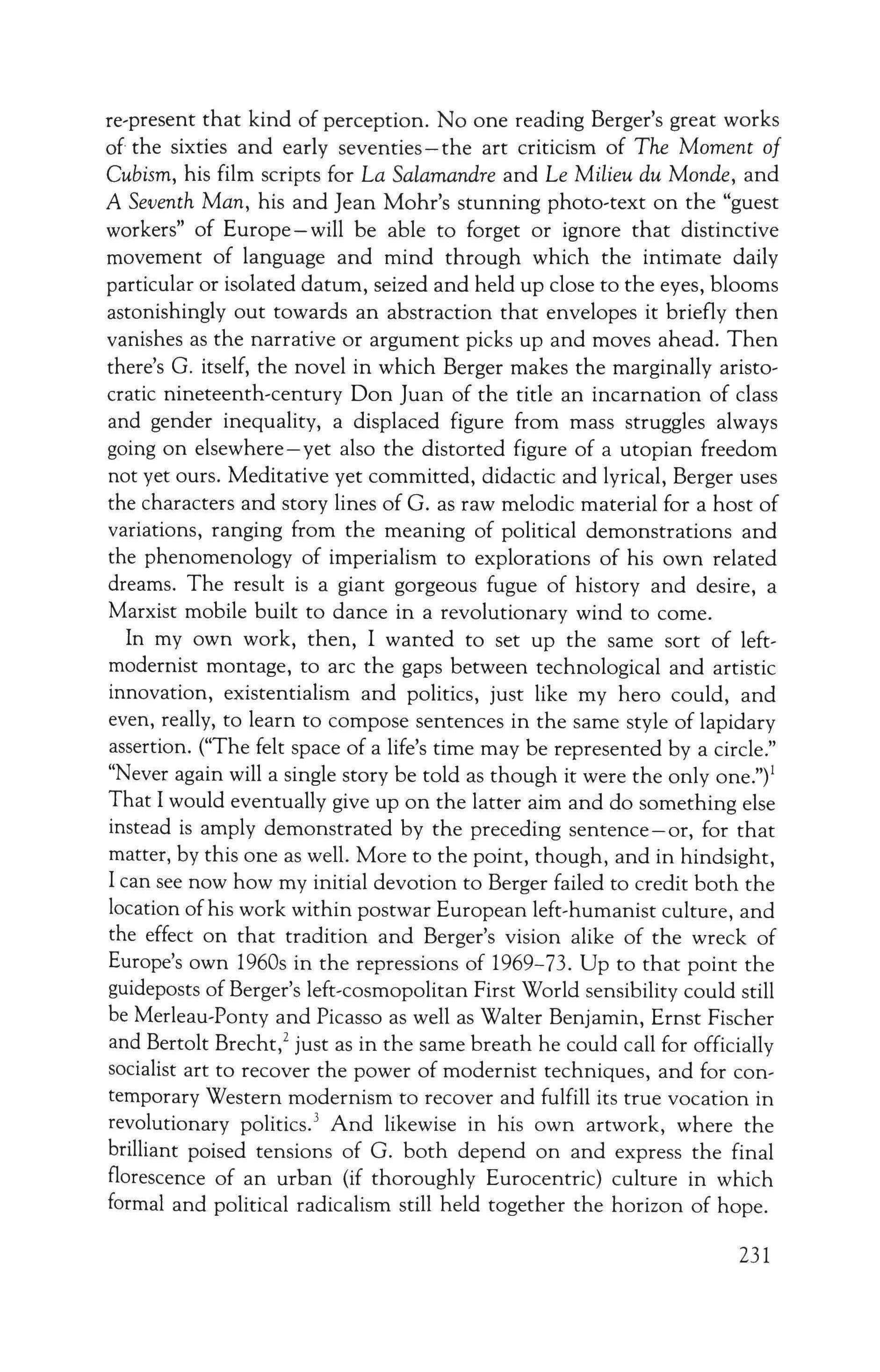
re-present that kind of perception. No one reading Berger's great works of the sixties and early seventies-the art criticism of The Moment of Cubism, his film scripts for La Salamandre and Le Milieu du Monde, and A Seventh Man, his and Jean Mohr's stunning photo-text on the "guest workers" of Europe-will be able to forget or ignore that distinctive movement of language and mind through which the intimate daily particular or isolated datum, seized and held up close to the eyes, blooms astonishingly out towards an abstraction that envelopes it briefly then vanishes as the narrative or argument picks up and moves ahead. Then there's G. itself, the novel in which Berger makes the marginally aristocratic nineteenth-century Don Juan of the title an incarnation of class and gender inequality, a displaced figure from mass struggles always going on elsewhere-yet also the distorted figure of a utopian freedom not yet ours. Meditative yet committed, didactic and lyrical, Berger uses the characters and story lines of G. as raw melodic material for a host of variations, ranging from the meaning of political demonstrations and the phenomenology of imperialism to explorations of his own related dreams. The result is a giant gorgeous fugue of history and desire, a Marxist mobile built to dance in a revolutionary wind to come.
In my own work, then, I wanted to set up the same sort of leftmodernist montage, to arc the gaps between technological and artistic innovation, existentialism and politics, just like my hero could, and even, really, to learn to compose sentences in the same style of lapidary assertion. ("The felt space of a life's time may be represented by a circle." "Never again will a single story be told as though it were the only one.")' That I would eventually give up on the latter aim and do something else instead is amply demonstrated by the preceding sentence-or, for that matter, by this one as well. More to the point, though, and in hindsight, I can see now how my initial devotion to Berger failed to credit both the location ofhis work within postwar European left-humanist culture, and the effect on that tradition and Berger's vision alike of the wreck of Europe's own 1960s in the repressions of 1969-73. Up to that point the guideposts of Berger's left-cosmopolitan First World sensibility could still be Merleau-Ponty and Picasso as well as Walter Benjamin, Ernst Fischer and Bertolt Brecht,' just as in the same breath he could call for officially socialist art to recover the power of modernist techniques, and for contemporary Western modernism to recover and fulfill its true vocation in revolutionary politics.' And likewise in his own artwork, where the brilliant poised tensions of G. both depend on and express the final florescence of an urban (if thoroughly Eurocentric) culture in which formal and political radicalism still held together the horizon of hope.
231
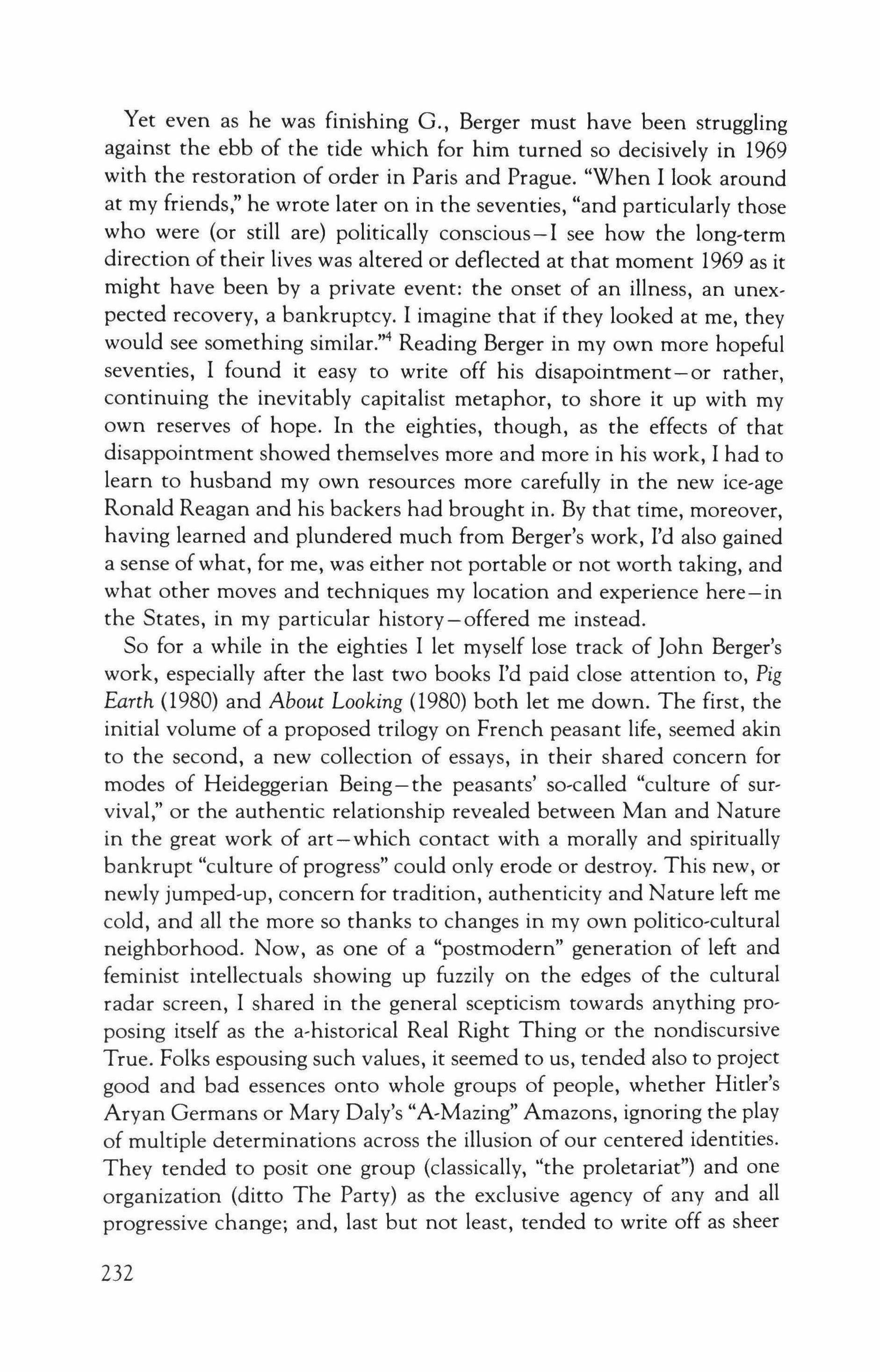
Yet even as he was finishing G., Berger must have been struggling against the ebb of the tide which for him turned so decisively in 1969 with the restoration of order in Paris and Prague. "When I look around at my friends," he wrote later on in the seventies, "and particularly those who were (or still are) politically conscious-I see how the long-term direction of their lives was altered or deflected at that moment 1969 as it might have been by a private event: the onset of an illness, an unexpected recovery, a bankruptcy. I imagine that if they looked at me, they would see something similar." Reading Berger in my own more hopeful seventies, I found it easy to write off his disapointment-or rather, continuing the inevitably capitalist metaphor, to shore it up with my own reserves of hope. In the eighties, though, as the effects of that disappointment showed themselves more and more in his work, I had to learn to husband my own resources more carefully in the new ice-age Ronald Reagan and his backers had brought in. By that time, moreover, having learned and plundered much from Berger's work, I'd also gained a sense of what, for me, was either not portable or not worth taking, and what other moves and techniques my location and experience here-in the States, in my particular history-offered me instead.
So for a while in the eighties I let myself lose track of John Berger's work, especially after the last two books I'd paid close attention to, Pig Earth (1980) and About Looking (1980) both let me down. The first, the initial volume of a proposed trilogy on French peasant life, seemed akin to the second, a new collection of essays, in their shared concern for modes of Heideggerian Being - the peasants' so-called "culture of survival," or the authentic relationship revealed between Man and Nature in the great work of art-which contact with a morally and spiritually bankrupt "culture of progress" could only erode or destroy. This new, or newly jumped-up, concern for tradition, authenticity and Nature left me cold, and all the more so thanks to changes in my own politico-cultural neighborhood. Now, as one of a "postmodern" generation of left and feminist intellectuals showing up fuzzily on the edges of the cultural radar screen, I shared in the general scepticism towards anything proposing itself as the a-historical Real Right Thing or the nondiscursive True. Folks espousing such values, it seemed to us, tended also to project good and bad essences onto whole groups of people, whether Hider's Aryan Germans or Mary Daly's "A�Mazing" Amazons, ignoring the play of multiple determinations across the illusion of our centered identities. They tended to posit one group (classically, "the proletariat") and one organization (ditto The Party) as the exclusive agency of any and all progressive change; and, last but not least, tended to write off as sheer
232

manipulation and/or poisonous garbage the so-called "mass culture" which seemed, to many of us who'd grown up on it, a lot more complicated and even, occasionally, more liberating than that.
Why then have I come back around, at the turn of this new decade, to take another look at Berger's recent work? Partly just because the aforementioned trilogy, Berger's major project of the past decade, is now complete-and partly for the sake of my own troubled mind, to give that newly completed work, quite literally, the benefit of the doubt. For by 1991 it had begun to seem more and more that those so-called "new social movements" -of women, gays and lesbians, people of color, environmentalists and peaceniks-from which our left-postmodernist art and poststructuralist theories derived their warrant and their energy were mired in a balkanized babble of turf fights whose resolution the increasingly irrational and academicized theories they sanctioned were helpless to effect. And meanwhile, the collapse of the rotten regimes of Eastern Europe and the U.S.S.R. was being quite effectively employed to extinguish even the ideal of some more humane alternative to freemarket capitalism from the face of the earth.
Was the turn Berger had taken from Marxist modernism to a politics of authenticity, then, more adequate to the needs of this present than the postmodern garden path I was on, with its think-globallv-act-Iocallv politics of ever-shifting - i.e., ever-limping, ever-breaking-down - affiliations? For that matter, was my previous understanding of Berger's turn borne out by the trilogy as a whole? And what does "adequate to the needs of the present" even mean now that socialism is everywhere less a dirty word than a dumb bad joke and the other so-called social movements appear as either a welter of squalling sects or, worse yet, just so many taste and lifestyle choices, with hair-dos, clothes and special lingos to match? In such a bad and addled moodmy own equivalent, I suppose, of Berger's seventies disappointment-I read and meditated my way through Into Their Labours; and what follows is the record of what I thought I found.
Into Their Labours is composed of Pig Earth (1980), Once in Europa (1987), and Lilac and Flag (1990): the first two, collections of stories, with a few lyric poems interspersed among them, and the concluding work a novel. The stories and the novel, taken as a whole, chart "the peasant's odyssey from village to metropolis'? that Berger first explored in A Seventh Man, while depicting it as one composed of various disjunctive stages, including the non-stage of staying home. Anyone stage, then, may constitute the frame and determine the structure of an individual
233
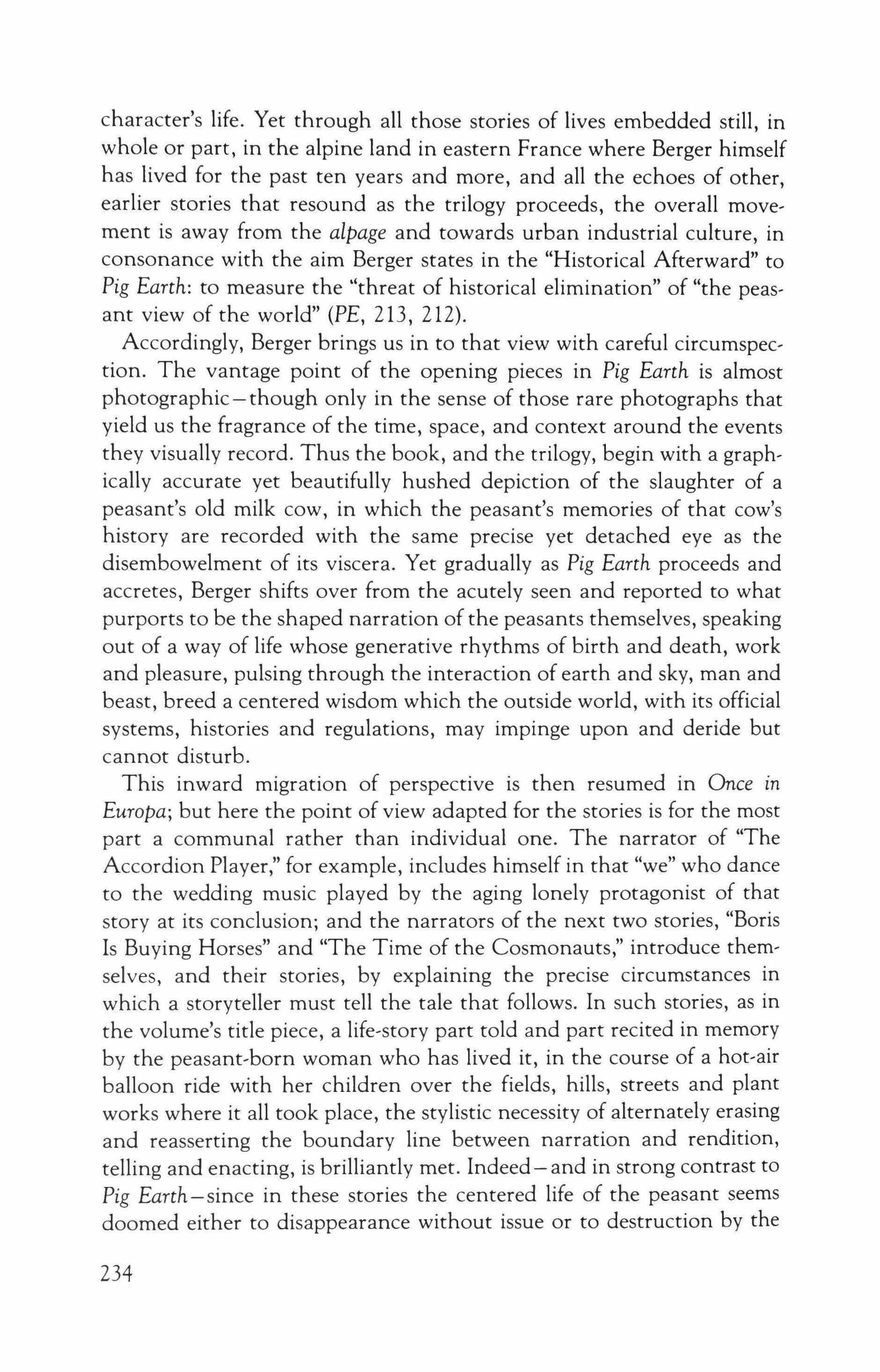
character's life. Yet through all those stories of lives embedded still, in whole or part, in the alpine land in eastern France where Berger himself has lived for the past ten years and more, and all the echoes of other, earlier stories that resound as the trilogy proceeds, the overall movement is away from the alpage and towards urban industrial culture, in consonance with the aim Berger states in the "Historical Afterward" to Pig Earth: to measure the "threat of historical elimination" of "the peasant view of the world" (PE, 213, 212).
Accordingly, Berger brings us in to that view with careful circumspection. The vantage point of the opening pieces in Pig Earth is almost photographic-though only in the sense of those rare photographs that yield us the fragrance of the time, space, and context around the events they visually record. Thus the book, and the trilogy, begin with a graphically accurate yet beautifully hushed depiction of the slaughter of a peasant's old milk cow, in which the peasant's memories of that cow's history are recorded with the same precise yet detached eye as the disembowelment of its viscera. Yet gradually as Pig Earth proceeds and accretes, Berger shifts over from the acutely seen and reported to what purports to be the shaped narration of the peasants themselves, speaking out of a way of life whose generative rhythms of birth and death, work and pleasure, pulsing through the interaction of earth and sky, man and beast, breed a centered wisdom which the outside world, with its official systems, histories and regulations, may impinge upon and deride but cannot disturb.
This inward migration of perspective is then resumed in Once in Europa; but here the point of view adapted for the stories is for the most part a communal rather than individual one. The narrator of "The Accordion Player," for example, includes himself in that "we" who dance to the wedding music played by the aging lonely protagonist of that story at its conclusion; and the narrators of the next two stories, "Boris Is Buying Horses" and "The Time of the Cosmonauts," introduce themselves, and their stories, by explaining the precise circumstances in which a storyteller must tell the tale that follows. In such stories, as in the volume's title piece, a life-story part told and part recited in memory by the peasant-born woman who has lived it, in the course of a hot-air balloon ride with her children over the fields, hills, streets and plant works where it all took place, the stylistic necessity of alternately erasing and reasserting the boundary line between narration and rendition, telling and enacting, is brilliantly met. Indeed - and in strong contrast to Pig Earth-since in these stories the centered life of the peasant seems doomed either to disappearance without issue or to destruction by the
234

agents, witting and unwitting, of urban industrial life, it is from this very contradiction between form and content, between sage, surefooted tell, ing and the destruction of the collectivity on which such narrative wisdom depends, that the collection derives its considerable pathos and power.
In Lilac and Flag, the concluding novel, as this same gap opens wider still, Berger continues to weave his plot along the guiding theme of love. Here the lovers are Zsuzsa and Sucus, two poor but spunky young sub, proles who bedazzle one another when their paths cross in the course of their forays through the indifferently smashed and shattering terrain of an oneirically composite city called Troy. Sucus is the son of a former peasant who dies as a result of burns suffered when the defective TV he is watching blows up in his face, leaving his son only that knife with which he made his meager living shucking oysters at the fish warehouse where he met his wife. Zsuzsa is from even farther down, the daughter of an office cleaning woman and, with her and Zsuzsa's drug-dealing brother Naisa and several other kids, denizen of a half-built, half, collapsing hovel in a neighborhood called Barbek, on Rat Hill. The novel's action ripples out and back from the transcendent miracle of the two lovers' love, depicted here as a quasi-biological triumph over the heartless degradation of the urban capitalist landscape, the purest and most elemental resistance remaining to those whose strength in comrnunity and closeness to nature has otherwise been completely stripped away: thus the lovers' exultantly elemental names for one another, Lilac and Flag. Yet, before their love comes to its paradoxical fruition and ends with Sucus's suicide, we will have come to know several other characters and urban sites from following the two lovers, singly and together, in their languidly desperate Brownian movement across the city as workers, hustlers and thieves, on this or that side of the law.
One of Lilac and Flag's chief pleasures lies in these adroitly counter, puntal melodies of simultaneous yet disparate events, serialized connection and recurrence, a kind of modernist music made familiar to us by the early-twentierh-centurv figurations of Woolf, Doblin and Joyce: as, for example, when Sucus sets himself up on the Alexanderplatz, with lab coat and sphygmomanometer, to take the blood pressures of passersby in perfect unawareness that a member of the construction crew on which he used to work, Murat the Turk, now an unemployed cripple, is hawking revolutionary newspapers just down the block. But in Lilac and Flag such quintessentially modernist connections are often as not given a fresh twist in a surprising direction: back towards the all-butobliterated communal ethos suggested by the shared origin in the same
235
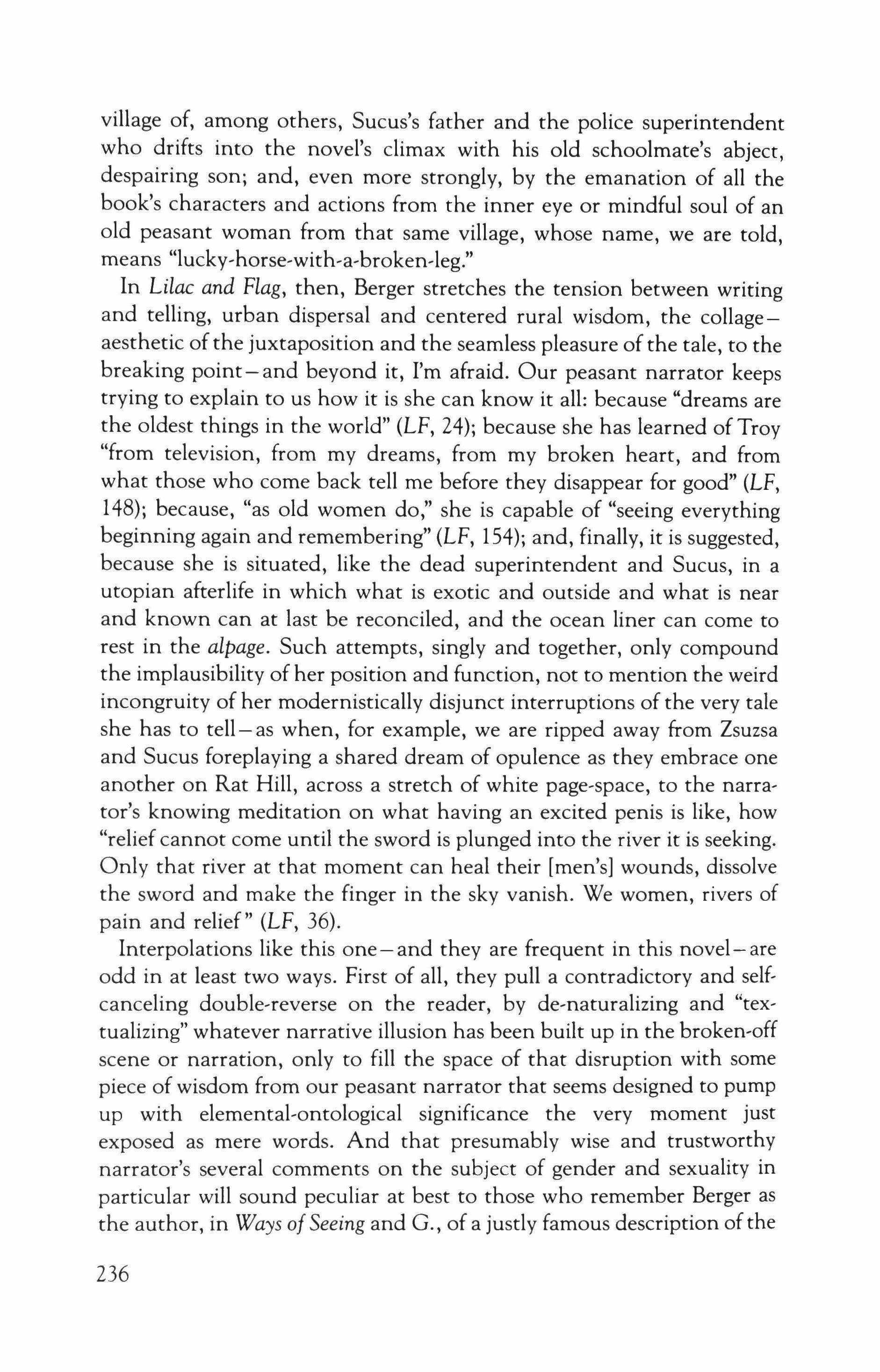
village of, among others, Sucus's father and the police superintendent who drifts into the novel's climax with his old schoolmate's abject, despairing son; and, even more strongly, by the emanation of all the book's characters and actions from the inner eye or mindful soul of an old peasant woman from that same village, whose name, we are told, means "luckv-horse-with-a-broken-Ieg."
In Lilac and Flag, then, Berger stretches the tension between writing and telling, urban dispersal and centered rural wisdom, the collageaesthetic ofthe juxtaposition and the seamless pleasure of the tale, to the breaking point-and beyond it, I'm afraid. Our peasant narrator keeps trying to explain to us how it is she can know it all: because "dreams are the oldest things in the world" (LF, 24); because she has learned of Troy "from television, from my dreams, from my broken heart, and from what those who come back tell me before they disappear for good" (LF, 148); because, "as old women do," she is capable of "seeing everything beginning again and remembering" (LF, 154); and, finally, it is suggested, because she is situated, like the dead superintendent and Sucus, in a utopian afterlife in which what is exotic and outside and what is near and known can at last be reconciled, and the ocean liner can come to rest in the alpage. Such attempts, singly and together, only compound the implausibility of her position and function, not to mention the weird incongruity of her modernistically disjunct interruptions of the very tale she has to tell- as when, for example, we are ripped away from Zsuzsa and Sucus foreplaying a shared dream of opulence as they embrace one another on Rat Hill, across a stretch of white page-space, to the narrator's knowing meditation on what having an excited penis is like, how "relief cannot come until the sword is plunged into the river it is seeking. Only that river at that moment can heal their [men's] wounds, dissolve the sword and make the finger in the sky vanish. We women, rivers of pain and relief" (LF, 36).
Interpolations like this one - and they are frequent in this novel- are odd in at least two ways. First of all, they pull a contradictory and selfcanceling double-reverse on the reader, by de-naturalizing and "rextualizing" whatever narrative illusion has been built up in the broken-off scene or narration, only to fill the space of that disruption with some piece of wisdom from our peasant narrator that seems designed to pump up with elemental-ontological significance the very moment just exposed as mere words. And that presumably wise and trustworthy narrator's several comments on the subject of gender and sexuality in particular will sound peculiar at best to those who remember Berger as the author, in Ways ofSeeing and G., of a justly famous description ofthe
236

introjected prison of mirrors in which women within sexist society must live. When Berger wrote, in 1972, "Men look at women. Women watch themselves being looked at,"? the surrounding context made it clear he was describing a situation he wished, and assumed his readers would wish, to see transformed. When, in 1990, he has the peasant woman narrating his novel inform us that "the men were right to compare us with flowers. Not because we are pure, but because, like flowers, we were created to attract" (LF, 171-72), it would seem we are to bow our heads in hushed affirmation of this portentous, eternal truth.
However much such utterances contradict positions taken in Berger's earlier work, they are consistent with the perspective elaborated in this trilogy as a whole, throughout which both sexual-romantic love and the peasant's perspective and way of life are taken to be unproblematic modes of Being and Truth. Even when, as in most of Once in Europa, these states are opposed to one another, the call of love leading the peasant away from the village or faithfulness to farm and family leading to celibacy and near-mad grief, both are seen to be endowed with a depth and authenticity which the urban-tainted, serialized realm of history and politics can only taint or despoil. More generally it is as if, in the collapse of Berger's earlier, modernist synthesis, the phenomenological dimension of his work has pulled away from the historical with which it used to coexist in a productive tension, just as Berger's fascination with the mysteries of eros seems to have split off from the sensitivity to gender inequality that once complicated and enriched it. Such dialectical tensions have devolved, in turn, into a set of parallel binaries with fixed valences: sex (and the regressive truth of its ever-heterosexual gender polarities) is to the contingent morass of the social-historical what life in the alpage is to life in the city, i.e., what truth is to maya, good to bad.
"His hope had been revolutionary and this hope has become diminished, if not exhausted. This is probably why he would like to stop time." The words come from Berger's description of one of the post-'68 characters in his film script Jonah who will be 25 in the year 2000. Yet on the evidence of this trilogy they seem more applicable than ever, fifteen years later, to Berger himself. How else to explain the recurrence of the figure of the wounded or crippled leftist in both the most ambitious stories of Pig Earth and Once in Europa and again in Lilac and Flag? In "The Three Lives of Lucie Cabrol," he is a Communist maquisard with a leg wound, whom the story's title character tries to hide from the Gestapo, and for whom she harbors a fierce solicitude clearly tinged with erotic desire. In "Once in Europa," he is Michel, the militant Com-
237

munist worker whom the protagonist Odile settles for finally as a husband, long after both the motorcycle crash that renders him legless and the industrial accident that fells the first and most intense love of her life. Only in Lilac and Flag is the crippled leftist, the aforementioned Murat the Turk, not a contender for the affections of that feisty, canny woman who-like Pig Earth's Lucie Cabrol and Once in Europa's Odile Blanc, and unlike all the men of all three books-is capable of moving boldly back and forth across the borders between peasant meadow and city market, authentic sexual love and deceitful serialized exchange, which men can apparently only live as polarities that weaken or destroy them. For it is not only leftist males who find their powers thwarted and defeated in these books, who are unable to negotiate the shifts their female lovers manage with such ease, as the death of Zsuzsa's Sucus and the melancholy yearning of Lucie Cabrol's Jean, to choose only a few representative nonleftists, testifies. For such men, for all men, there are only two escape routes from the attrition they suffer and the oppositions in which they are stuck: either through the utopian community of death, conjured up in both "The Three Lives of Lucie Cabrol" and the closing pages of Lilac and Flag; or in and through the wise forest of the woman's body it-lor her-?) self. "Inside," the wise woman narrating Lilac and Flag tells us, at the end of a scene in which one of the sad former villagers goes off with a prostitute: "where we were before we had to learn about life and were thrown out." (LF, 133) And why, Sucus asks his father, is the village from which he, like all the novel's other former peasants, has come from called a name which means-remember?"lucky-horse-with-a-broken leg?" Because, the father replies solemnly, "If your horse breaks a leg, you have to stay where you are." (LF, 48)
In an essay written somewhere between Jonah and Pig Earth in the mid-seventies, Berger compares peasant eating habits to the way we alienated consumers chow down. The "peasant way of eating," he tells us, "is centred on the act of eating itself and on the food eaten: it is centripetal and physical. Whereas the bourgeois way of eating is centred on fantasy, ritual and spectacle: it is centrifugal and cultural. The first can complete itself in satisfaction; the second is never complete and gives rise to an appetite which, in essence, is insatiable." And today, on the other side of Lilac and Flag, he writes of the collapse of Soviet-style state socialism across the Eastern bloc in 1989 in the same way, as a revolution "made without utopian illusions without the dreaded, classic exhortation of FORWARD," but "Rather, the hope of a return," a
238
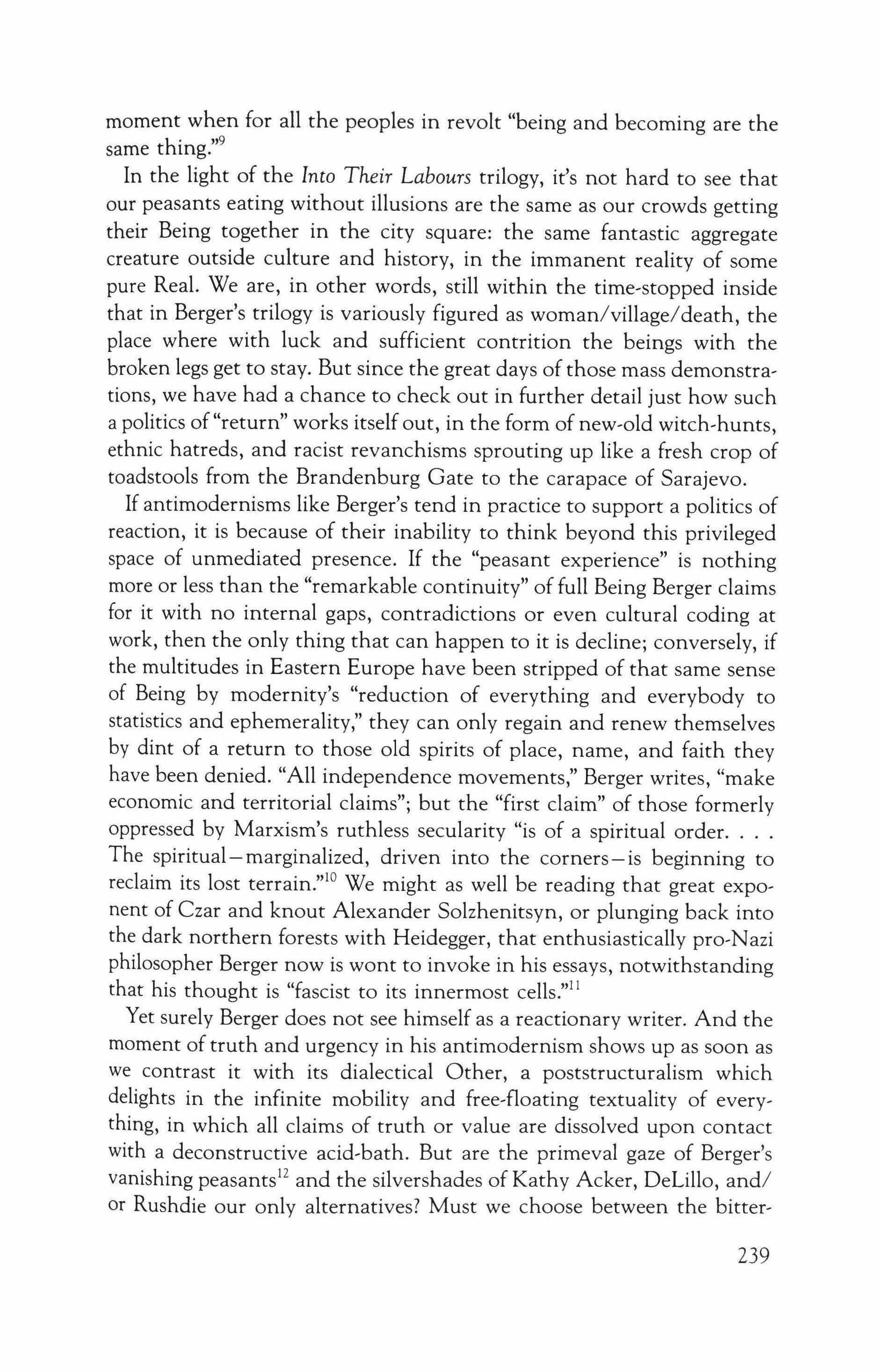
moment when for all the peoples in revolt "being and becoming are the hi ,,9 same t mg.
In the light of the Into Their Labours trilogy, it's not hard to see that our peasants eating without illusions are the same as our crowds getting their Being together in the city square: the same fantastic aggregate creature outside culture and history, in the immanent reality of some pure Real. We are, in other words, still within the time-stopped inside that in Berger's trilogy is variously figured as woman/village/death, the place where with luck and sufficient contrition the beings with the broken legs get to stay. But since the great days of those mass demonstrations, we have had a chance to check out in further detail just how such a politics of "return" works itself out, in the form of new-old witch-hunts, ethnic hatreds, and racist revanchisms sprouting up like a fresh crop of toadstools from the Brandenburg Gate to the carapace of Sarajevo.
If antimodernisms like Berger's tend in practice to support a politics of reaction, it is because of their inability to think beyond this privileged space of unmediated presence. If the "peasant experience" is nothing more or less than the "remarkable continuity" of full Being Berger claims for it with no internal gaps, contradictions or even cultural coding at work, then the only thing that can happen to it is decline; conversely, if the multitudes in Eastern Europe have been stripped of that same sense of Being by modernity's "reduction of everything and everybody to statistics and ephemerality," they can only regain and renew themselves by dint of a return to those old spirits of place, name, and faith they have been denied. "All independence movements," Berger writes, "make economic and territorial claims"; but the "first claim" of those formerly oppressed by Marxism's ruthless secularity "is of a spiritual order The spiritual-marginalized, driven into the corners-is beginning to reclaim its lost terrain."? We might as well be reading that great exponent of Czar and knout Alexander Solzhenitsyn, or plunging back into the dark northern forests with Heidegger, that enthusiastically pro-Nazi philosopher Berger now is wont to invoke in his essays, notwithstanding that his thought is "fascist to its innermost cells,"!'
Yet surely Berger does not see himself as a reactionary writer. And the moment of truth and urgency in his antimodernism shows up as soon as we contrast it with its dialectical Other, a poststructuralism which delights in the infinite mobility and free-floating textuality of everything, in which all claims of truth or value are dissolved upon contact with a deconstructive acid-bath. But are the primeval gaze of Berger's vanishing peasants" and the silvershades of Kathy Acker, Delillo, and/ or Rushdie our only alternatives? Must we choose between the bitter-
239
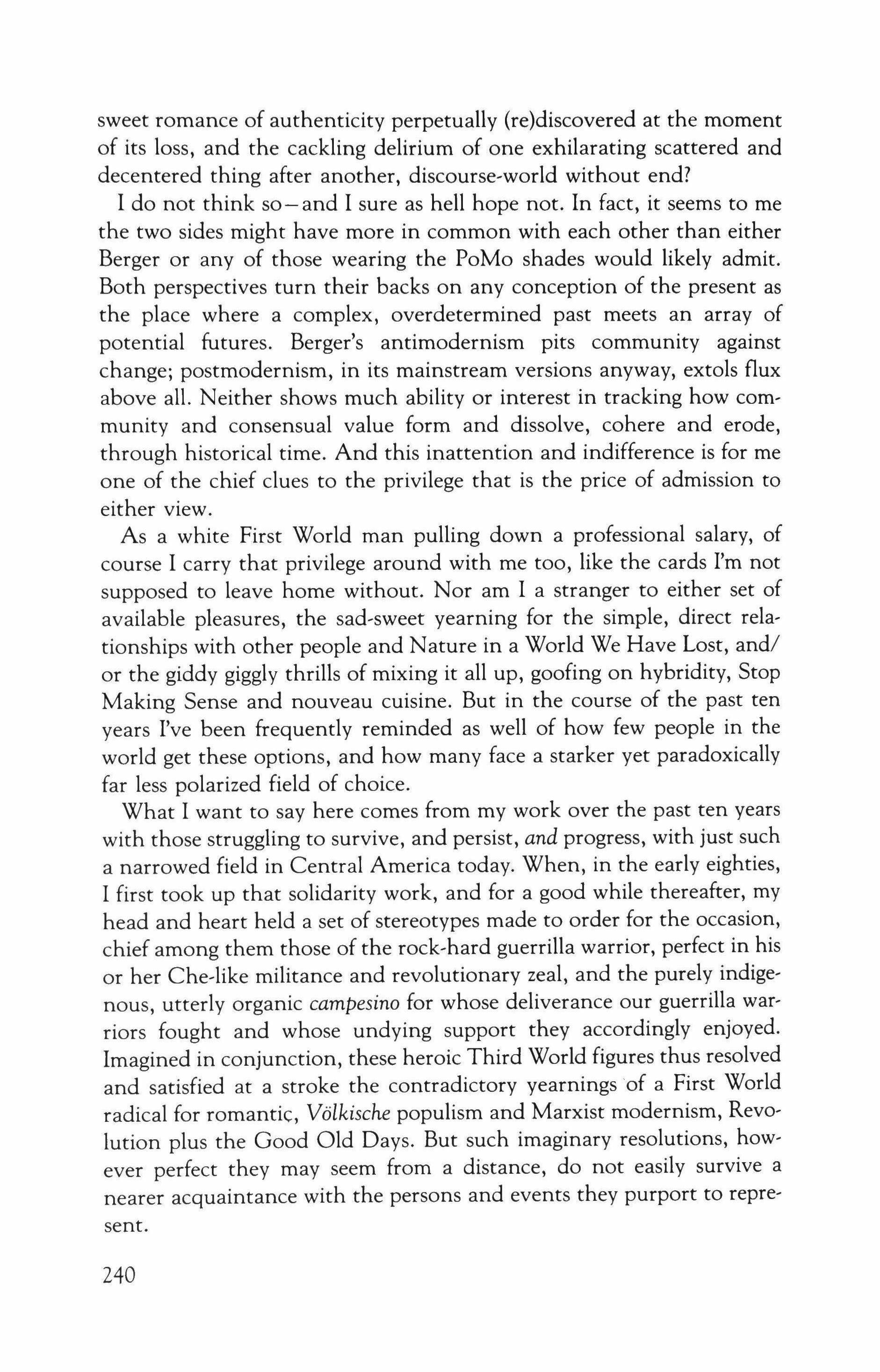
sweet romance of authenticity perpetually (re)discovered at the moment of its loss, and the cackling delirium of one exhilarating scattered and decentered thing after another, discourse-world without end?
I do not think so-and I sure as hell hope not. In fact, it seems to me the two sides might have more in common with each other than either Berger or any of those wearing the PoMo shades would likely admit. Both perspectives turn their backs on any conception of the present as the place where a complex, overdetermined past meets an array of potential futures. Berger's antimodernism pits community against change; postmodernism, in its mainstream versions anyway, extols flux above all. Neither shows much ability or interest in tracking how cornmunity and consensual value form and dissolve, cohere and erode, through historical time. And this inattention and indifference is for me one of the chief clues to the privilege that is the price of admission to either view.
As a white First World man pulling down a professional salary, of course I carry that privilege around with me too, like the cards I'm not supposed to leave home without. Nor am I a stranger to either set of available pleasures, the sad-sweet yearning for the simple, direct relationships with other people and Nature in a World We Have Lost, and/ or the giddy giggly thrills of mixing it all up, goofing on hybriditv, Stop Making Sense and nouveau cuisine. But in the course of the past ten years I've been frequently reminded as well of how few people in the world get these options, and how many face a starker yet paradoxically far less polarized field of choice.
What I want to say here comes from my work over the past ten years with those struggling to survive, and persist, and progress, with just such a narrowed field in Central America today. When, in the early eighties, I first took up that solidarity work, and for a good while thereafter, my head and heart held a set of stereotypes made to order for the occasion, chief among them those of the rock-hard guerrilla warrior, perfect in his or her Che-like militance and revolutionary zeal, and the purely indigenous, utterly organic campesino for whose deliverance our guerrilla warriors fought and whose undying support they accordingly enjoyed. Imagined in conjunction, these heroic Third World figures thus resolved and satisfied at a stroke the contradictory yearnings of a First World radical for romantic, Volkische populism and Marxist modernism, Revolution plus the Good Old Days. But such imaginary resolutions, however perfect they may seem from a distance, do not easily survive a nearer acquaintance with the persons and events they purport to represent.
240
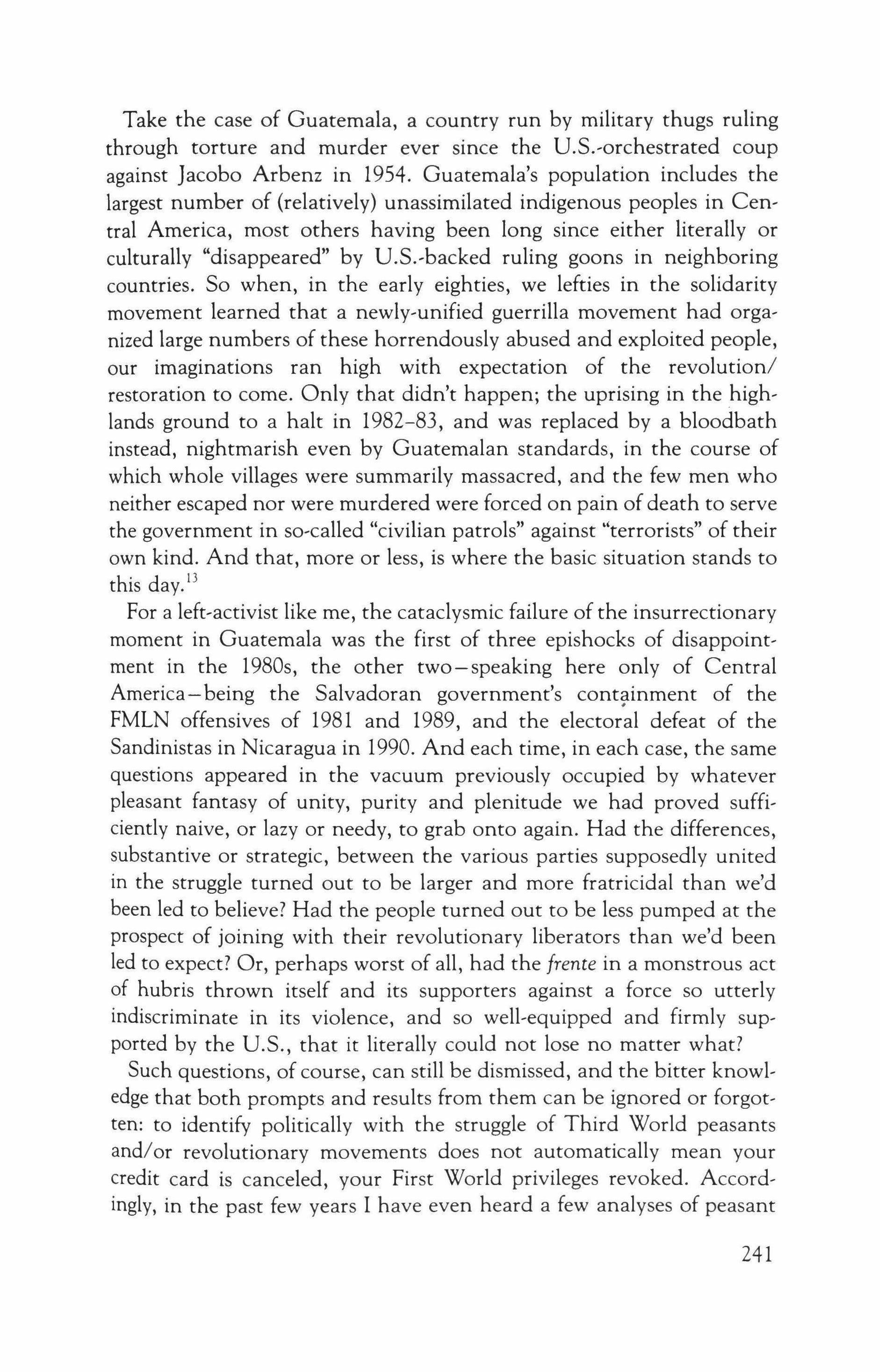
Take the case of Guatemala, a country run by military thugs ruling through torture and murder ever since the U.S.-orchestrated coup against Jacobo Arbenz in 1954. Guatemala's population includes the largest number of (relatively) unassimilated indigenous peoples in Central America, most others having been long since either literally or culturally "disappeared" by U.S.-backed ruling goons in neighboring countries. So when, in the early eighties, we lefties in the solidarity movement learned that a newly-unified guerrilla movement had organized large numbers of these horrendously abused and exploited people, our imaginations ran high with expectation of the revolution/ restoration to come. Only that didn't happen; the uprising in the highlands ground to a halt in 1982-83, and was replaced by a bloodbath instead, nightmarish even by Guatemalan standards, in the course of which whole villages were summarily massacred, and the few men who neither escaped nor were murdered were forced on pain of death to serve the government in so-called "civilian patrols" against "terrorists" of their own kind. And that, more or less, is where the basic situation stands to this day.':'
For a left-activist like me, the cataclysmic failure of the insurrectionary moment in Guatemala was the first of three epishocks of disappointment in the 1980s, the other two-speaking here only of Central America-being the Salvadoran government's containment of the FMLN offensives of 1981 and 1989, and the electoral defeat of the Sandinistas in Nicaragua in 1990. And each time, in each case, the same questions appeared in the vacuum previously occupied by whatever pleasant fantasy of unity, purity and plenitude we had proved sufficiently naive, or lazy or needy, to grab onto again. Had the differences, substantive or strategic, between the various parties supposedly united in the struggle turned out to be larger and more fratricidal than we'd been led to believe? Had the people turned out to be less pumped at the prospect of joining with their revolutionary liberators than we'd been led to expect? Or, perhaps worst of all, had the /rente in a monstrous act of hubris thrown itself and its supporters against a force so utterly indiscriminate in its violence, and so well-equipped and firmly supported by the U.S., that it literally could not lose no matter what?
Such questions, of course, can still be dismissed, and the bitter knowledge that both prompts and results from them can be ignored or forgotten: to identify politically with the struggle of Third World peasants and/or revolutionary movements does not automatically mean your credit card is canceled, your First World privileges revoked. Accordingly, in the past few years I have even heard a few analyses of peasant
241

resistance and government repression in Guatemala by left-feminist poststructuralists casting their respective subjects in the hot-but-dim lights provided by such superstars of theory as Jean Baudrillard, Jacques Lacan and M. Derrida. Yet for all such persistences, I still believe that for most of us who have put in some time within this movement, and have been willing to listen to what those Central American people most directly involved in it have to tell us, the likelihood that we will indulge in any of these pleasant, privileged fantasies-whether PoMo, populistromantic, revolutionary Marxist-modernist or any blend of the threegrows less and less. Such choices, one comes to gather, are at best irrelevant to what is actually happening, and at worst an obscene menu of potential appropriations and distortions for consumption up here in EI Norte. In either case, in any case, they are not ones available or even attractive to those on whom the bombs fall, those pulled in and tortured for belonging to a union, a health co-op, a Christian committee for the displaced.
Instead of such choices, then - and precisely because I remain a white First World male - I try to recall the example of Quiche Indian Rigoberra Menchu=whose highland family was demolished in the repression, and who learned Spanish, the language of the conquerors and exploiters, so that she could tell the story of her family, village and people to a European outsider who could in turn get it published in the First World.14 I think, moreover, of the cultural portrait her testimonio constructs, not of some unspoiled people living in a timeless realm, but of a community shifting and learning and moving around - being exploited, becoming politicized, retaining some rituals and dropping others, living out a sophisticated, multiple relation to both historical and so-called "mythic" time. IS Or I think of the weaving collective I know of that began some seven years ago in a village on the edge of the Guatemalan highlands. Funded by a combination of small grants and loans put together by a Canadian activist, and constructed by the men and women of the village, the collective is sustained today by the stillevolving skill and power of the women, whose labors may be said to have saved the villagers as a whole from either dropping like flies as plantation labor in the fincas on the west coast, or dying a slow, starving death in the hills. And just as, six years ago, the villagers were savvy enough to invite the local Army garrison over to join the celebration when their new building was done, the women today are quite blithely indifferent to the Canadian middleman's alarm at the "inauthenticity" of the industrially dyed wool and thread they are now importing from
242
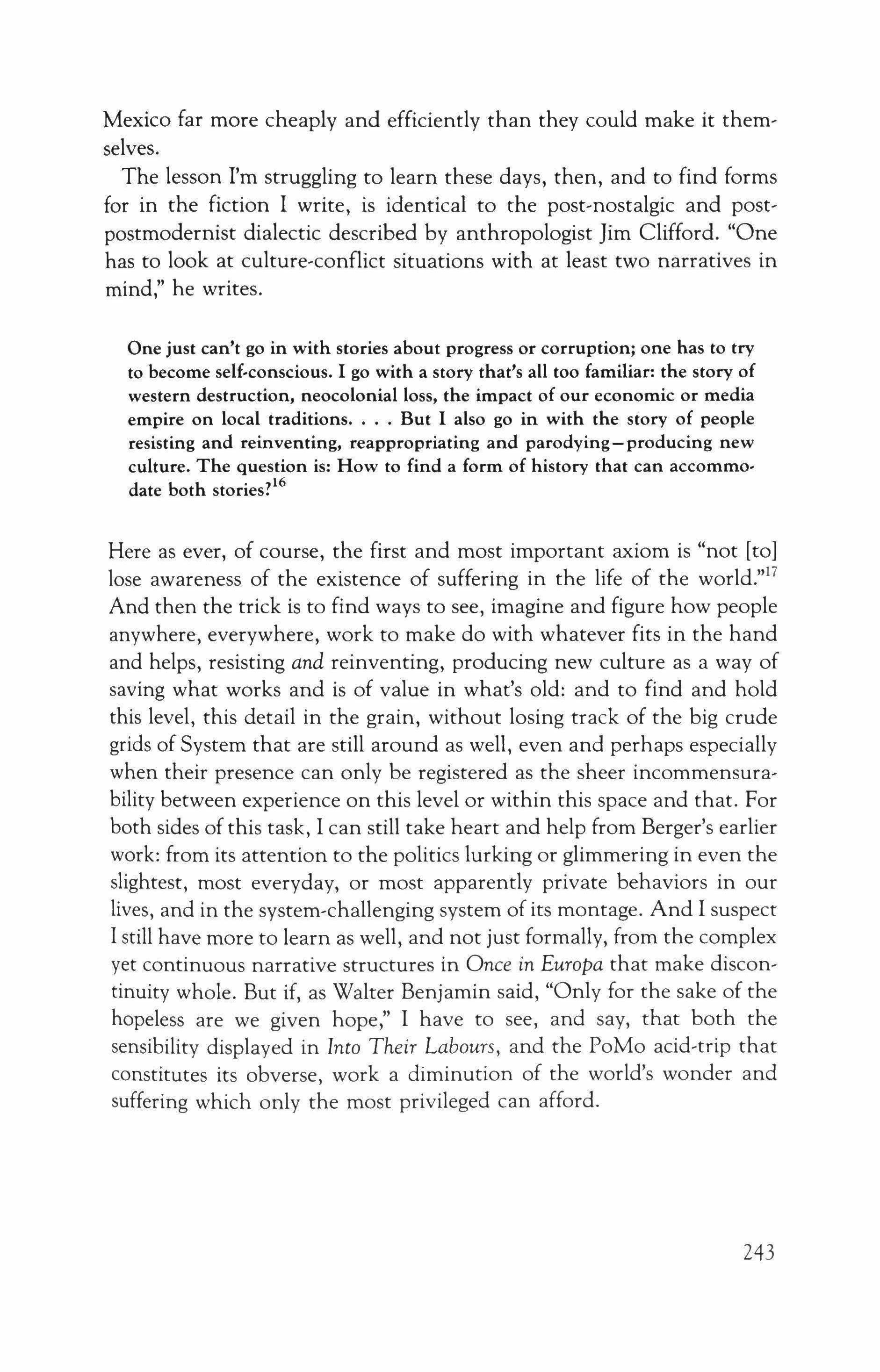
Mexico far more cheaply and efficiently than they could make it themselves.
The lesson I'm struggling to learn these days, then, and to find forms for in the fiction I write, is identical to the post-nostalgic and postpostmodernist dialectic described by anthropologist Jim Clifford. "One has to look at culture-conflict situations with at least two narratives in mind," he writes.
One just can't go in with stories about progress or corruption; one has to try to become self-conscious. I go with a story that's all too familiar: the story of western destruction, neocolonial loss, the impact of our economic or media empire on local traditions. But I also go in with the story of people resisting and reinventing, reappropriating and parodying-producing new culture. The question is: How to find a form of history that can accommodate both stories?16
Here as ever, of course, the first and most important axiom is "not [to] lose awareness of the existence of suffering in the life of the world.I" And then the trick is to find ways to see, imagine and figure how people anywhere, everywhere, work to make do with whatever fits in the hand and helps, resisting and reinventing, producing new culture as a way of saving what works and is of value in what's old: and to find and hold this level, this detail in the grain, without losing track of the big crude grids of System that are still around as well, even and perhaps especially when their presence can only be registered as the sheer incommensurability between experience on this level or within this space and that. For both sides of this task, I can still take heart and help from Berger's earlier work: from its attention to the politics lurking or glimmering in even the slightest, most everyday, or most apparently private behaviors in our lives, and in the system-challenging system of its montage. And I suspect I still have more to learn as well, and not just formally, from the complex yet continuous narrative structures in Once in Europa that make discontinuity whole. But if, as Walter Benjamin said, "Only for the sake of the hopeless are we given hope," I have to see, and say, that both the sensibility displayed in Into Their Labours, and the PoMo acid-trip that constitutes its obverse, work a diminution of the world's wonder and suffering which only the most privileged can afford.
243
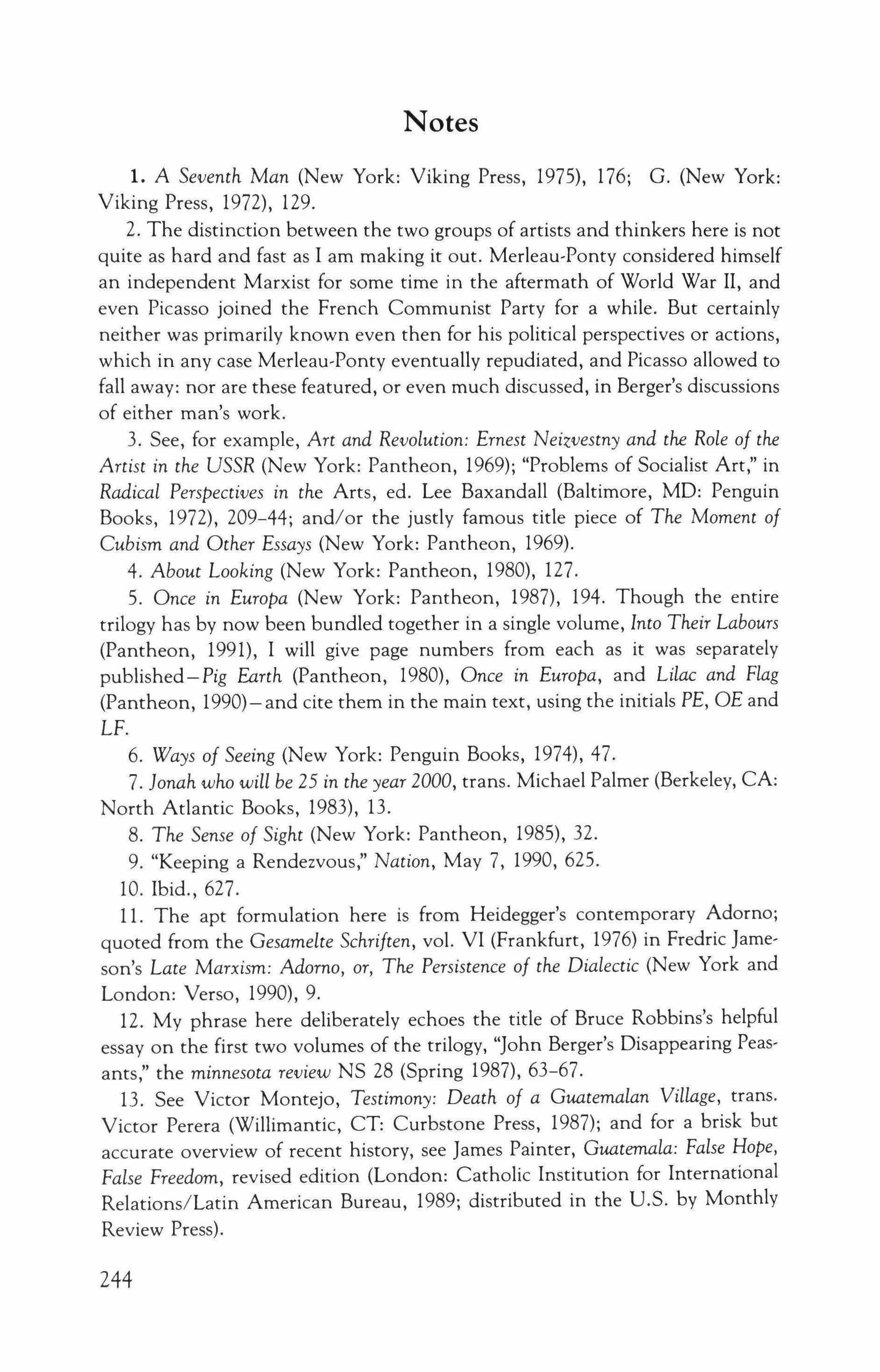
Notes
1. A Seventh Man (New York: Viking Press, 1975), 176; G. (New York: Viking Press, 1972), 129.
2. The distinction between the two groups of artists and thinkers here is not quite as hard and fast as I am making it out. Merleau-Ponty considered himself an independent Marxist for some time in the aftermath of World War II, and even Picasso joined the French Communist Party for a while. But certainly neither was primarily known even then for his political perspectives or actions, which in any case Merleau-Ponty eventually repudiated, and Picasso allowed to fall away: nor are these featured, or even much discussed, in Berger's discussions of either man's work.
3. See, for example, Art and Revolution: Ernest Neizvestny and the Role of the Artist in the USSR (New York: Pantheon, 1969); "Problems of Socialist Art," in Radical Perspectives in the Arts, ed. Lee Baxandall (Baltimore, MD: Penguin Books, 1972), 209-44; and/or the justly famous title piece of The Moment of Cubism and Other Essays (New York: Pantheon, 1969).
4. About Looking (New York: Pantheon, 1980), 127.
5. Once in Europa (New York: Pantheon, 1987), 194. Though the entire trilogy has by now been bundled together in a single volume, Into Their Labours (Pantheon, 1991), I will give page numbers from each as it was separately published-Pig Earth (Pantheon, 1980), Once in Europa, and Lilac and Flag (Pantheon, 1990)-and cite them in the main text, using the initials PE, OE and LF.
6. Ways of Seeing (New York: Penguin Books, 1974),47.
7. Jonah who will be 25 in the year 2000, trans. Michael Palmer (Berkeley, CA: North Atlantic Books, 1983), 13.
8. The Sense of Sight (New York: Pantheon, 1985), 32.
9. "Keeping a Rendezvous," Nation, May 7, 1990, 625.
10. Ibid., 627.
11. The apt formulation here is from Heidegger's contemporary Adorno; quoted from the Gesamelte Schriften, vol. VI (Frankfurt, 1976) in Fredric Jameson's Late Marxism: Adorno, or, The Persistence of the Dialectic (New York and London: Verso, 1990),9.
12. My phrase here deliberately echoes the title of Bruce Robbins's helpful essay on the first two volumes of the trilogy, "John Berger's Disappearing Peasants," the minnesota review NS 28 (Spring 1987), 63-67.
13. See Victor Montejo, Testimony: Death of a Guatemalan Village, trans. Victor Perera (Willimantic, CT: Curbstone Press, 1987); and for a brisk but accurate overview of recent history, see James Painter, Guatemala: False Hope, False Freedom, revised edition (London: Catholic Institution for International Relations/Latin American Bureau, 1989; distributed in the U.S. by Monthly Review Press).
244
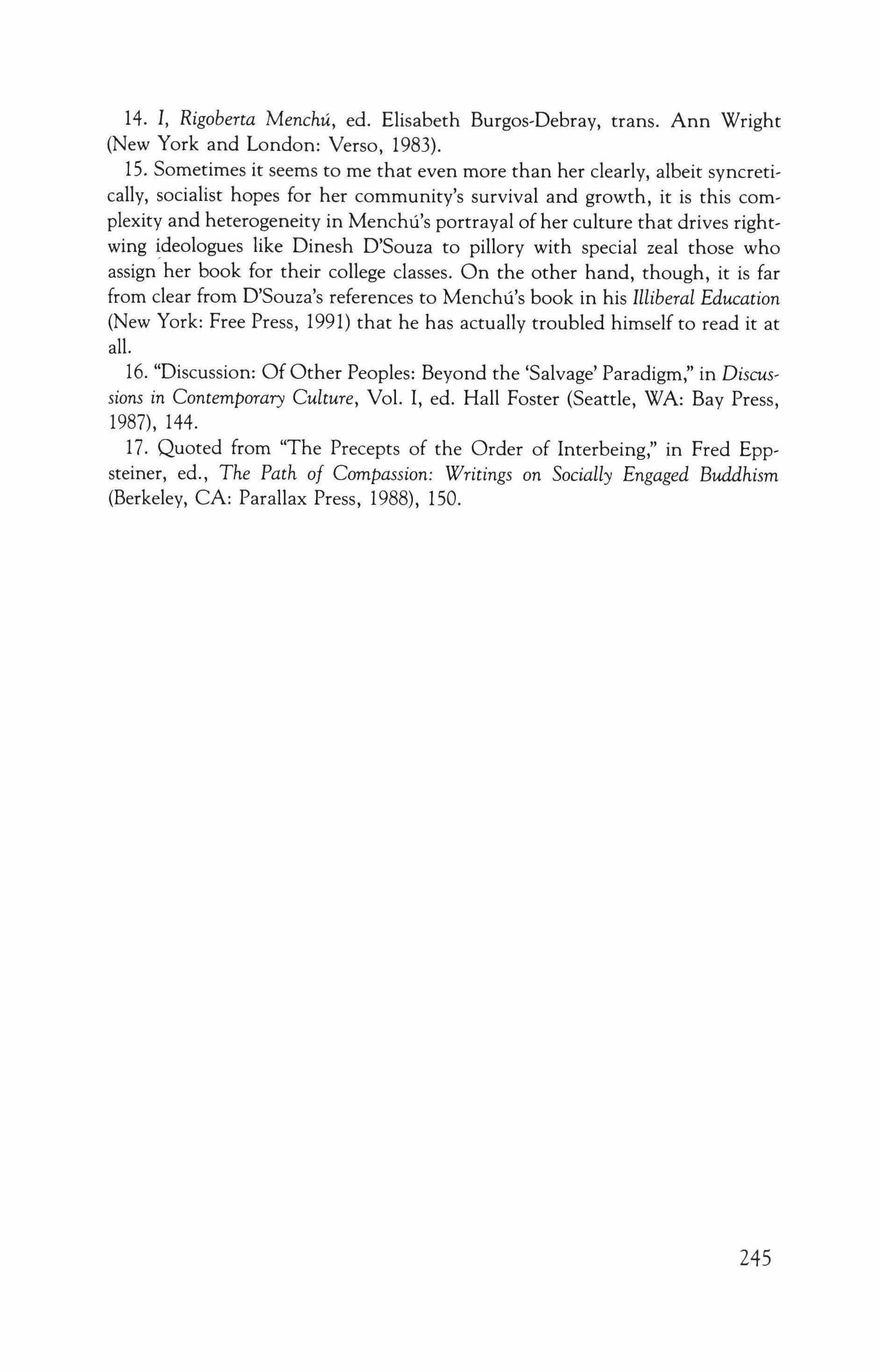
14. I, Rigoberta Menchu, ed. Elisabeth Burgos-Debray, trans. Ann Wright (New York and London: Verso, 1983).
15. Sometimes it seems to me that even more than her clearly, albeit syncretically, socialist hopes for her community's survival and growth, it is this complexity and heterogeneity in Menchu's portrayal of her culture that drives rightwing ideologues like Dinesh D'Souza to pillory with special zeal those who assign'her book for their college classes. On the other hand, though, it is far from clear from D'Souza's references to Menchu's book in his Illiberal Education (New York: Free Press, 1991) that he has actually troubled himself to read it at all.
16. "Discussion: Of Other Peoples: Beyond the 'Salvage' Paradigm," in Discussions in Contemporary Culture, Vol. I, ed. Hall Foster (Seattle, WA: Bay Press, 1987), 144.
17. Quoted from "The Precepts of the Order of Interbeing," in Fred Eppsteiner, ed., The Path of Compassion: Writings on Socially Engaged Buddhism (Berkeley, CA: Parallax Press, 1988), 150.
245
Contributors

Charles Tomlinson's most recent books are Collected Poems, 1951, 1981 (1986) and The Door in the WaU (1992), both published by Oxford University Press. He received the Hudson Review's Bennett Award for Literature in 1993 and the Cittadella Premio Europeo in 1991. * * * Attilio Bertolucci is one of Italy's most highly regarded contemporary poets. His recent works, all published in Italy by Garzanti, include a novel in verse, La camera da letto (1984, 1988)j his collected poems, Le Poesie (1990)j selected prose, Aritmie (1991)j and a new volume of poems, Verso le sorgenti del Cinghio (1993). * * * Cynthia Shearer is a writer with the Center for the Study of Southern Culture at the University of Mississippi. Her fiction has appeared in The Quarterly, the Oxford American and Ladies' Home Journal. "Radioland" is part of a novel she is writing. * * * Born in Greece of Italian parents, Alberto Savinio (1891,1952) was a painter, a composer of music for the opera and ballet, a stage and costume designer, a playwright and the author of almost thirty books and pamphlets. The brother of the surrealist painter Giorgio de Chirico, Savinio lived for many years in Paris, where he helped produce the journal Les Soirees de Paris and was influenced by avant-garde writers and artists. His books include La Casa Ispirata (1925), Angelica 0 La Nona di Maggio (1927), Casa la Vita (1943) and Tutta La Vita (1945). * * * Gilbert Alter-Gilbert has translated and edited The Fantastic Tales of Alberto Savinio, forthcoming from John Calder, Ltd., and Riverrun Press and on audiocassette from Audio Literature, Inc., of San Francisco.
Steve Fay's poems have appeared in various literary journals including the MississiPPi Valley Review and the James Dickey Newsletter. He holds an MFA in writing from Warren Wilson College, and lives in Fulton County, Illinois. * * * Joyce Carol Oates's latest books include
246
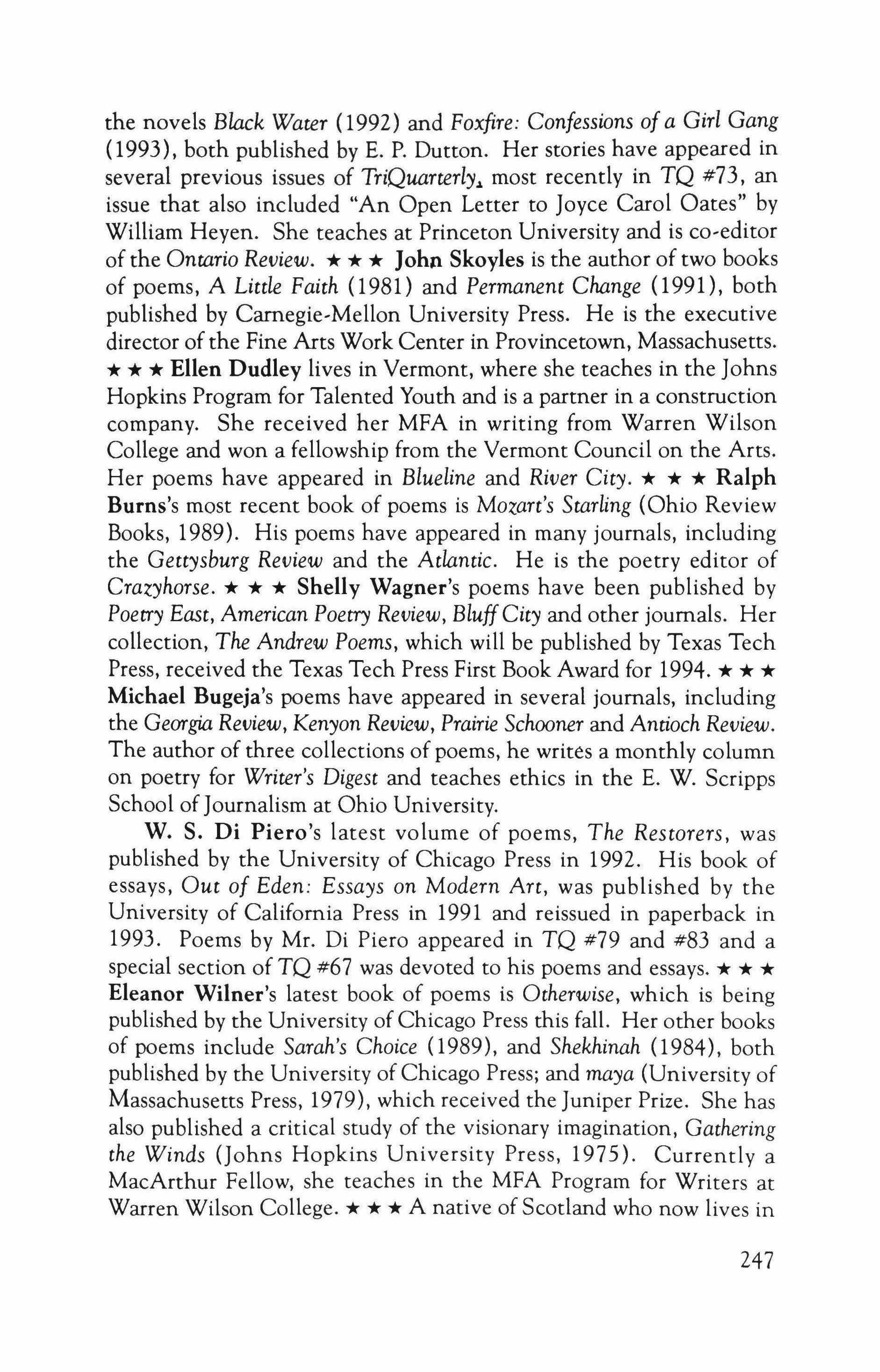
the novels Black Water (1992) and Foxfire: Confessions of a Girl Gang (1993), both published by E. P. Dutton. Her stories have appeared in several previous issues of TriQuarterly.l. most recently in TQ #73, an issue that also included "An Open Letter to Joyce Carol Oates" by William Heyen. She teaches at Princeton University and is co-editor of the Oncario Review. * * * John Skoyles is the author of two books of poems, A Little Faith (1981) and Permanent Change (1991), both published by Carnegie,Mellon University Press. He is the executive director ofthe Fine Arts Work Center in Provincetown, Massachusetts. * * * Ellen Dudley lives in Vermont, where she teaches in the Johns Hopkins Program for Talented Youth and is a partner in a construction company. She received her MFA in writing from Warren Wilson College and won a fellowship from the Vermont Council on the Arts. Her poems have appeared in Blueline and River City. * * * Ralph Burns's most recent book of poems is Mozart's Scarling (Ohio Review Books, 1989). His poems have appeared in many journals, including the Gettysburg Review and the Atlantic. He is the poetry editor of Crazyhorse. * * * Shelly Wagner's poems have been published by Poetry East, American Poetry Review, BluffCity and other journals. Her collection, The Andrew Poems, which will be published by Texas Tech Press, received the Texas Tech Press First Book Award for 1994. * * *
Michael Bugeja's poems have appeared in several journals, including the Georgia Review, Kenyon Review, Prairie Schooner and Antioch Review. The author of three collections of poems, he writes a monthly column on poetry for Writer's Digest and teaches ethics in the E. W. Scripps School of Journalism at Ohio University.
W. S. Di Piero's latest volume of poems, The Restorers, was published by the University of Chicago Press in 1992. His book of essays, Out of Eden: Essays on Modern Art, was published by the University of California Press in 1991 and reissued in paperback in 1993. Poems by Mr. Di Piero appeared in TQ #79 and #83 and a special section of TQ #67 was devoted to his poems and essays. * * * Eleanor Wilner's latest book of poems is Otherwise, which is being published by the University of Chicago Press this fall. Her other books of poems include Sarah's Choice (1989), and Shekhinah (1984), both published by the University of Chicago Press; and maya (University of Massachusetts Press, 1979), which received the Juniper Prize. She has also published a critical study of the visionary imagination, Gathering the Winds (Johns Hopkins University Press, 1975). Currently a MacArthur Fellow, she teaches in the MFA Program for Writers at Warren Wilson College.
* * * A native of Scotland who now lives in
247
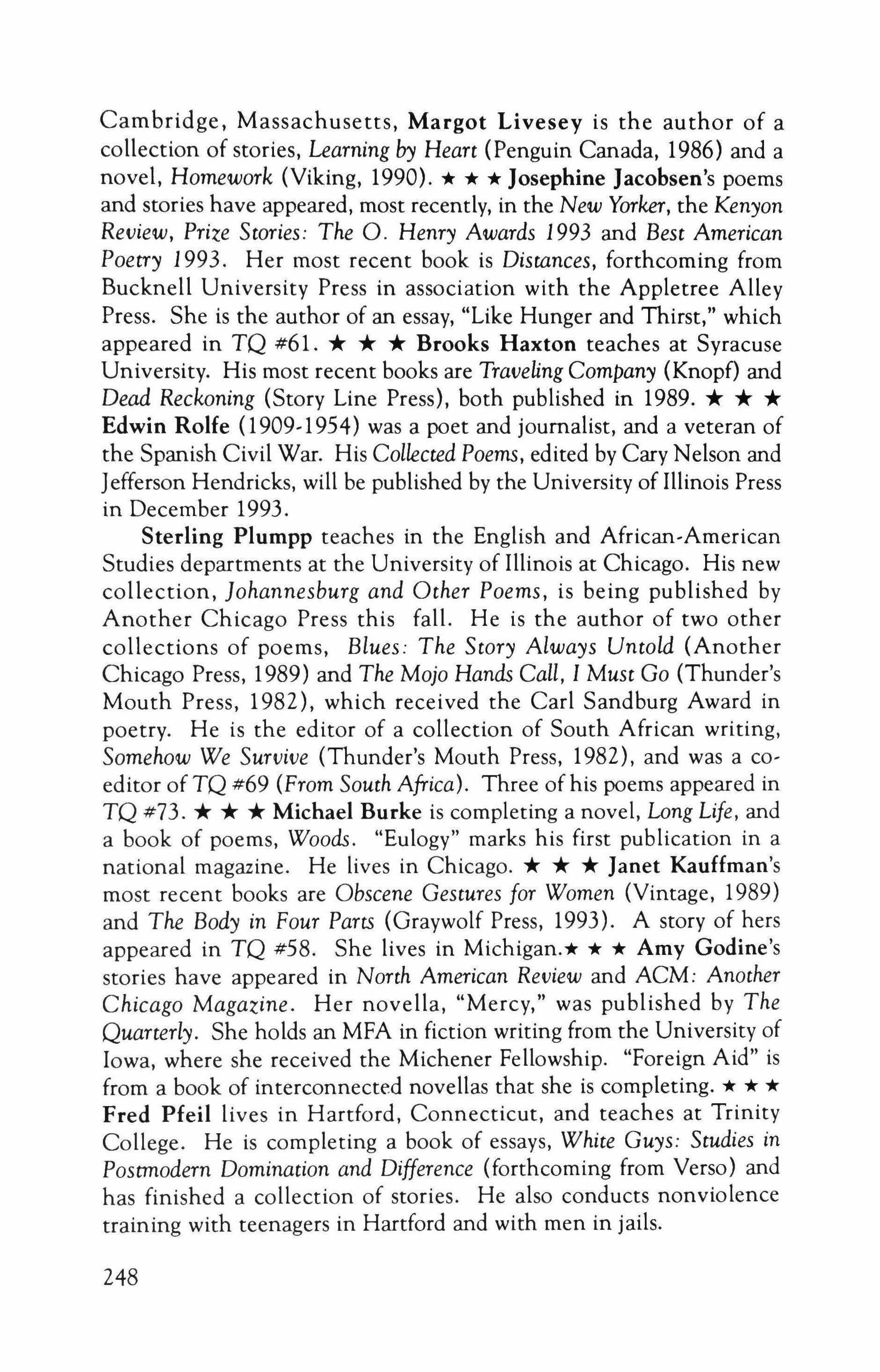
Cambridge, Massachusetts, Margot Livesey is the author of a collection of stories, Learning by Heart (Penguin Canada, 1986) and a novel, Homework (Viking, 1990). * * * Josephine Jacobsen's poems and stories have appeared, most recently, in the New Yorker, the Kenyon Review, Prize Stories: The O. Henry Awards 1993 and Best American Poetry 1993. Her most recent book is Distances, forthcoming from Bucknell University Press in association with the Appletree Alley Press. She is the author of an essay, "Like Hunger and Thirst," which appeared in TQ #61. * * * Brooks Haxton teaches at Syracuse University. His most recent books are Traveling Company (Knopf) and Dead Reckoning (Story Line Press), both published in 1989. * * * Edwin Rolfe (1909-1954) was a poet and journalist, and a veteran of the Spanish Civil War. His Collected Poems, edited by Cary Nelson and Jefferson Hendricks, will be published by the University of Illinois Press in December 1993.
Sterling Plumpp teaches in the English and African-American Studies departments at the University of Illinois at Chicago. His new collection, Johannesburg and Other Poems, is being published by Another Chicago Press this fall. He is the author of two other collections of poems, Blues: The Story Always Untold (Another Chicago Press, 1989) and The Mojo Hands Call, I Must Go (Thunder's Mouth Press, 1982), which received the Carl Sandburg Award in poetry. He is the editor of a collection of South African writing, Somehow We Survive (Thunder's Mouth Press, 1982), and was a coeditor ofTQ #69 (From South Africa). Three of his poems appeared in TQ #73. * * * Michael Burke is completing a novel, Long Life, and a book of poems, Woods. "Eulogy" marks his first publication in a national magazine. He lives in Chicago. * * * Janet Kauffman's most recent books are Obscene Gestures for Women (Vintage, 1989) and The Body in Four Parts (Graywolf Press, 1993). A story of hers appeared in TQ #58. She lives in Mtchigan.x * * Amy Godine's stories have appeared in North American Review and ACM: Another Chicago Magazine. Her novella, "Mercy," was published by The Quarterly. She holds an MFA in fiction writing from the University of Iowa, where she received the Michener Fellowship. "Foreign Aid" is from a book of interconnected novellas that she is completing. * * * Fred Pfeil lives in Hartford, Connecticut, and teaches at Trinity College. He is completing a book of essays, White Guys: Studies in Poscmodern Domination and Difference (forthcoming from Verso) and has finished a collection of stories. He also conducts nonviolence training with teenagers in Hartford and with men in jails.
248
Trafika
An International Literary Review
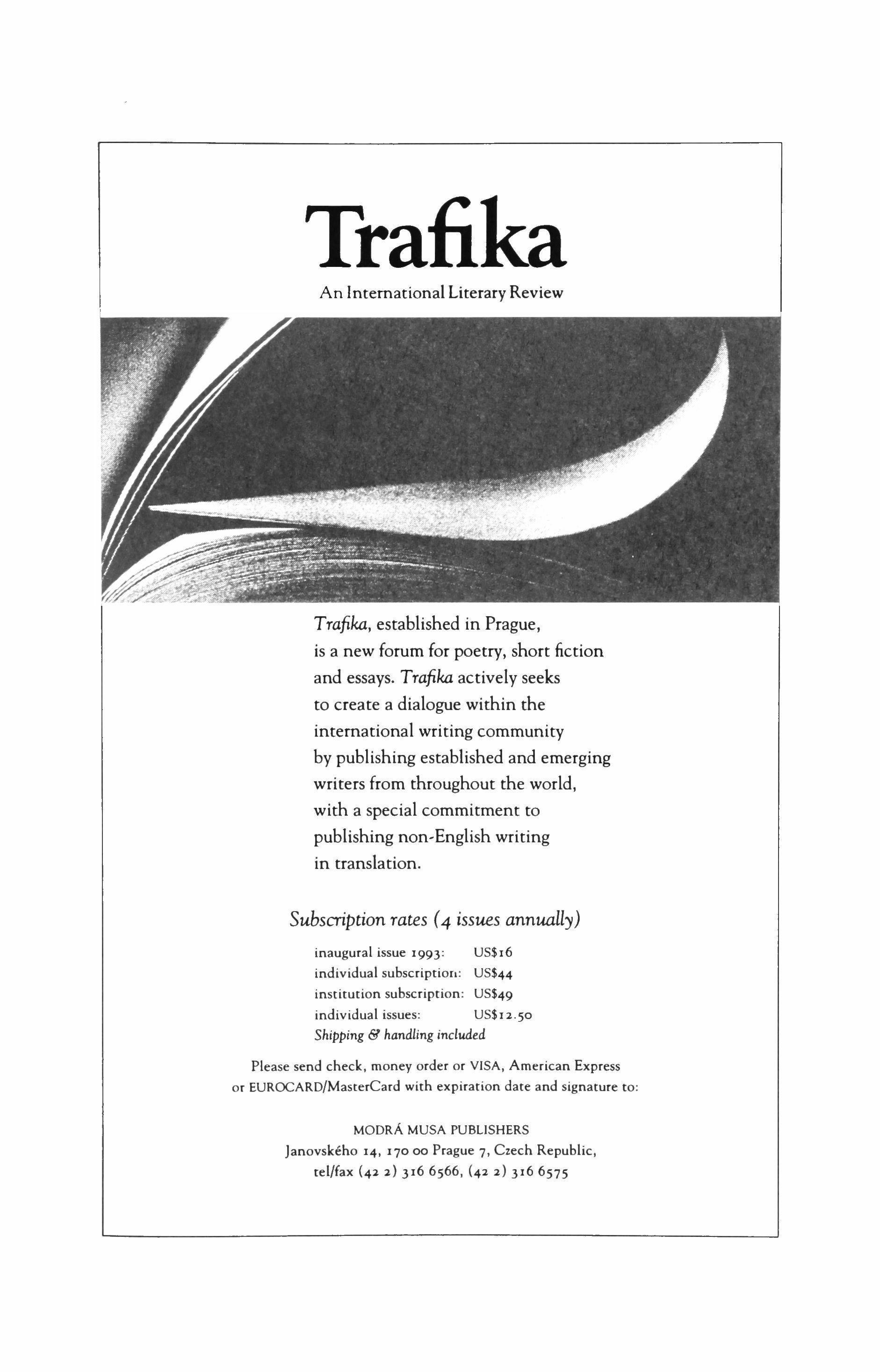
Trafika, established in Prague, is a new forum for poetry, short fiction and essays. Trafika actively seeks to create a dialogue within the international writing community by publishing established and emerging writers from throughout the world, with a special commitment to publishing non-English writing in translation.
Subscription rates (4 issues annually)
inaugural issue 1993:
individual subscription: US$44
institution subscription: US$49
individual issues: US$12·50
Shipping & handling included
Please send check, money order or VISA, American Express or EUROCARD/MasterCard with expiration date and signature to:
MODRA MUSA PUBLISHERS
[anovskeho '4, '7000 Prague 7, Czech Republic, tel/fax (41. 1.) 316 6566, (41. 2) 316 6575
NEW from the PhOeniX
David Ferry
Dwelling Places
Poems and Translations
"David Ferry's Dwelling Places is a marvelous, extremely moving book, distinguished by Ferry's characteristic formal virtuosity, extraordinarily fresh and 'inner' translations, and a kind of driven anguished rage at both the social conditions in which human beings have to live and the mysteriously unchangeable tragedies of individual human lives. The translations amplify and deepen the contemporary scenes. I feel that in the future this will be perceived as a great book."
-Frank Bidart
'Poper $7.95 74 pages
David Ferry is the unnner ofthe 1993 Ingram Merrill Foundation Awardfor Poetry and Translation
Susan Hahn
Incontinence
"A sensuous and harrowing book of expulsions, of bodily knowledge and love lost, of the mind's subtler methods of torture, ofobsessiveness confronted and ultimately triumphed over through the healing powers of art. In the high stakes of these poems, writing itself becomes a soul's journey, a necessary means and instrument of redemption."-Edward Hirsch
'Poper $8.95 80 pages
POet s serres
Eleanor Wilner
Otherwise
"Wilner writes in the tradition of passionate human and spiritual engagement which springs from the Hebrew prophets, and her concerns are global. These are poems of furious insight into myth, culture, and history, illuminated by sensuous detail, wrung by pity, animated by hope."-Alicia Ostriker
'Poper $11.95 160 pages
Christine Garren
Afterworld
"I like Christine Garren's poetry for its fervor and idiosyncrasy. It lives in the common places of daily life but opens into mysterious invisible orders. Afterworld is a strange and compelling book by a gifted visionary artist."
-W. S. Di Piero
'Poper $7.95 62 pages
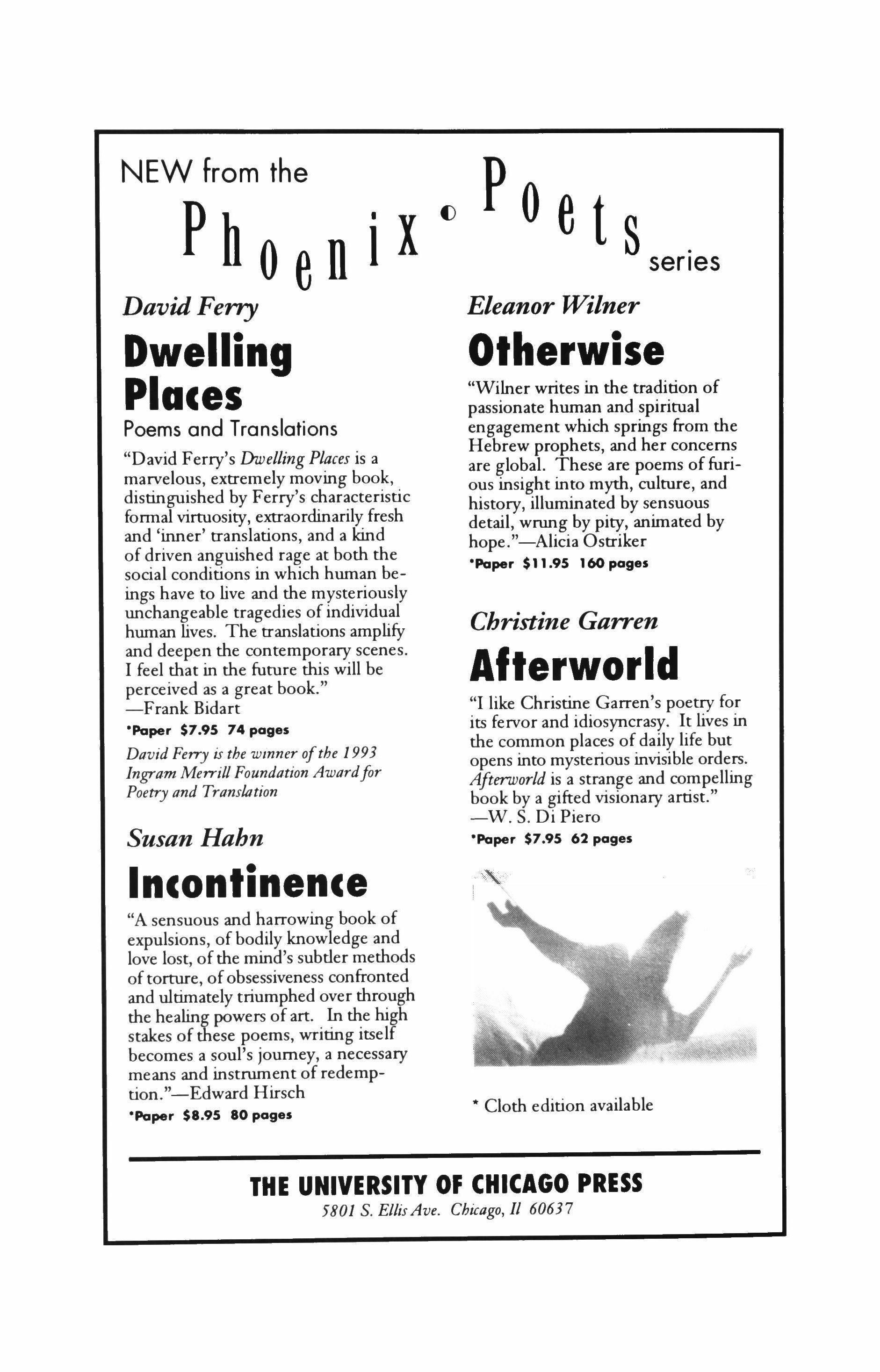
Cloth edition available
UNIVERSITY
CHICAGO PRESS
THE
OF
5801 S. EllisAve. Chicago, II 60637
Robert Pack
FATHERING THE MAP
New and Selected later Poems
A rich selection from his last five books, along with a collection of new poems, Fathering the Map takes us from the personal reflections distilled in the lyrics of Waking to My Name to the worldly reckonings ofInheritance and back again. Robert Pack has fashioned poems of intimate experience, scientific meditations, philosophical wonder, poems that breathe the knowledge of man and woman, young and old, artist and human animal.
"Fathering the Map has the eloquent pathos of being elegiac even where it intends to be celebratory. At their best, these poems legitimately find an honorable place in the American tradition that culminated in Robert Frost."-Harold Bloom
Cloth $24.95 301 pages
 Mary Kinzie
Mary Kinzie
THE CURE OF POETRY IN AN AGE OF PROSE
Moral Essays on the Poet's Calling
A distinguished poet, critic, and teacher assesses the situation of poetry over the past twenty-five years. In essays on "the rhapsodic fallacy," confessionalism, and the romance of perceptual response, Kinzie diagnoses some of the trends that have hampered the poet's calling. She examines individual poets-such as Elizabeth Bishop, Seamus Heaney, and John Ashbery-who preserve the special character of poetry as "the ground of resemblance, controlled in time, from which literature ofall kinds takes shape."
"A noble book, a generous contribution to everyone's moral wealth. Mary Kinzie's capacity to describe poetic texts is unexampled in the criticism of our time. She is a reader ofprofound and rational enthusiasms which instruct the heart."
-Allen Grossman, The Johns Hopkins University
Paper $16.95 352 pages
Cloth $49.00
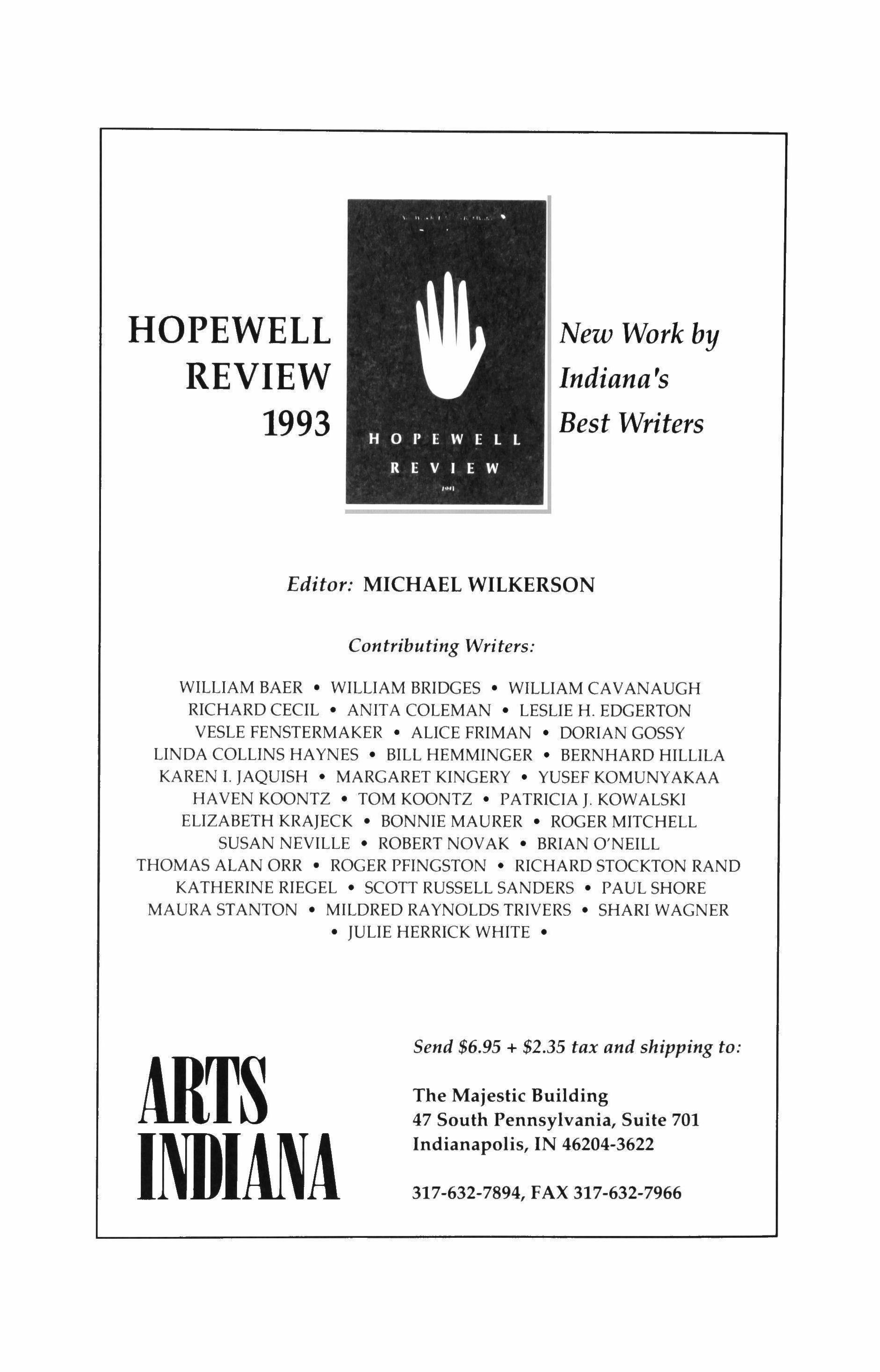 Editor: MICHAEL WILKERSON
Editor: MICHAEL WILKERSON
Contributing Writers:
WILLIAM BAER • WILLIAM BRIDGES WILLIAM CAVANAUGH
RICHARD CECIL ANITA COLEMAN LESLIE H. EDGERTON VESLE FENSTERMAKER ALICE FRIMAN DORIAN GOSSY
LINDA COLLINS HAYNES BILL HEMMINGER BERNHARD HILLILA
KAREN I. JAQUISH MARGARET KINGERY YUSEF KOMUNYAKAA
HAVEN KOONTZ • TOM KOONTZ PATRICIAJ. KOWALSKI
ELIZABETH KRAJECK BONNIE MAURER ROGER MITCHELL
SUSAN NEVILLE ROBERT NOVAK BRIAN O'NEILL
THOMAS ALAN ORR ROGER PFINGSTON RICHARD STOCKTON RAND
KATHERINE RIEGEL SCOTT RUSSELL SANDERS PAUL SHORE
MAURA STANTON MILDRED RAYNOLDS TRIVERS SHARI WAGNER
JULIE HERRICK WHITE
1993 New Work by Indiana's Best Writers
HOPEWELL REVIEW
ARTS INDIANA Send $6.95 + $2.35 tax and shipping to: The Majestic Building 47 South Pennsylvania, Suite 701 Indianapolis, IN 46204-3622 317-632-7894, FAX 317-632-7966
MARGARET LAURENCE
FIVE PAPERBACKS
''A writer ofgreatfeeling. "-Mary Renault
The Diviners
With an AfieruordbyMarg{fretAtwood
"Mrs. Laurence's [novel] is both poetic and muscular, and her heroine is certainly one of the more humane, unglorified, unpolemical, believable women to have appeared in recent fiction."
-The New Yorker
$12.95 392 pages
A Bird In the House Stories
Eight interconnected short stories narrated by Vanessa MacLeod as she matures from a child of ten into a mature young woman oftwenty.
$9.95 208 pages
The fire-Dwellers
Convinced that life has more to offer than the tedious routine of her days, Stacey MacAindra yearns to recover some of the passion of her early romance.
"A swift-flowing stream of dialogue, reaction, reproach, and nostalgia."-Atlantic
$10.95 316 pages
The Stone Angel
"It is her [Laurence's] admirable achievement to strike, with an equally sure touch, the peculiar note and the universal; she gives us a portrait ofa remarkable character and at the same time the picture of old age itself."-HonorTracy, New Republic
$10.95 288 pages
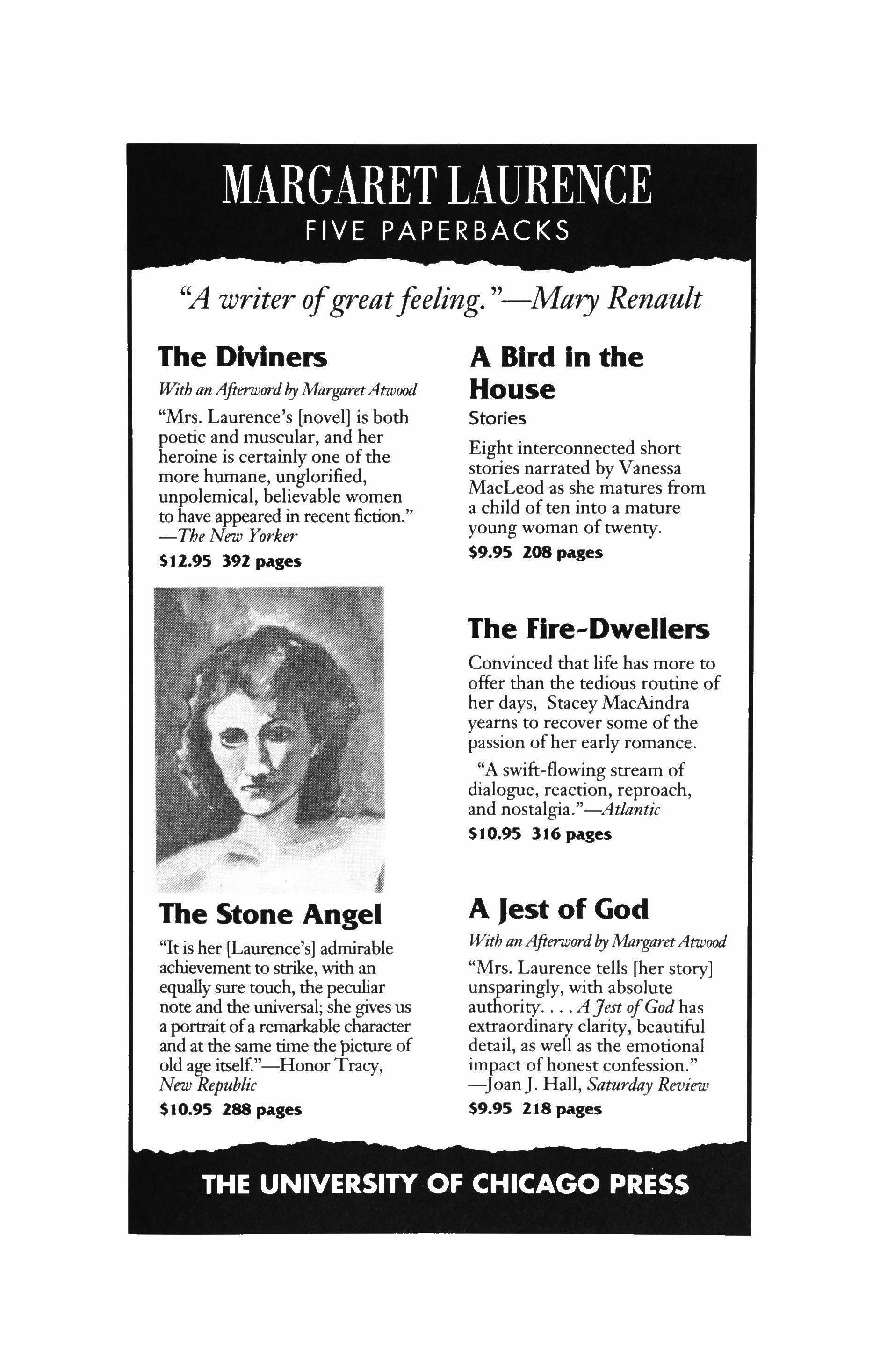
A Jest of God
With an AfienoordbyMargaretAtwood
"Mrs. Laurence tells [her story] unsparingly, with absolute authority A Jest ofGod has extraordinary clarity, beautiful detail, as well as the emotional impact of honest confession."
-JoanJ. Hall, Saturday Review
$9.95 21S pages
THE UNIVERSITY OF CHICAGO PRESS
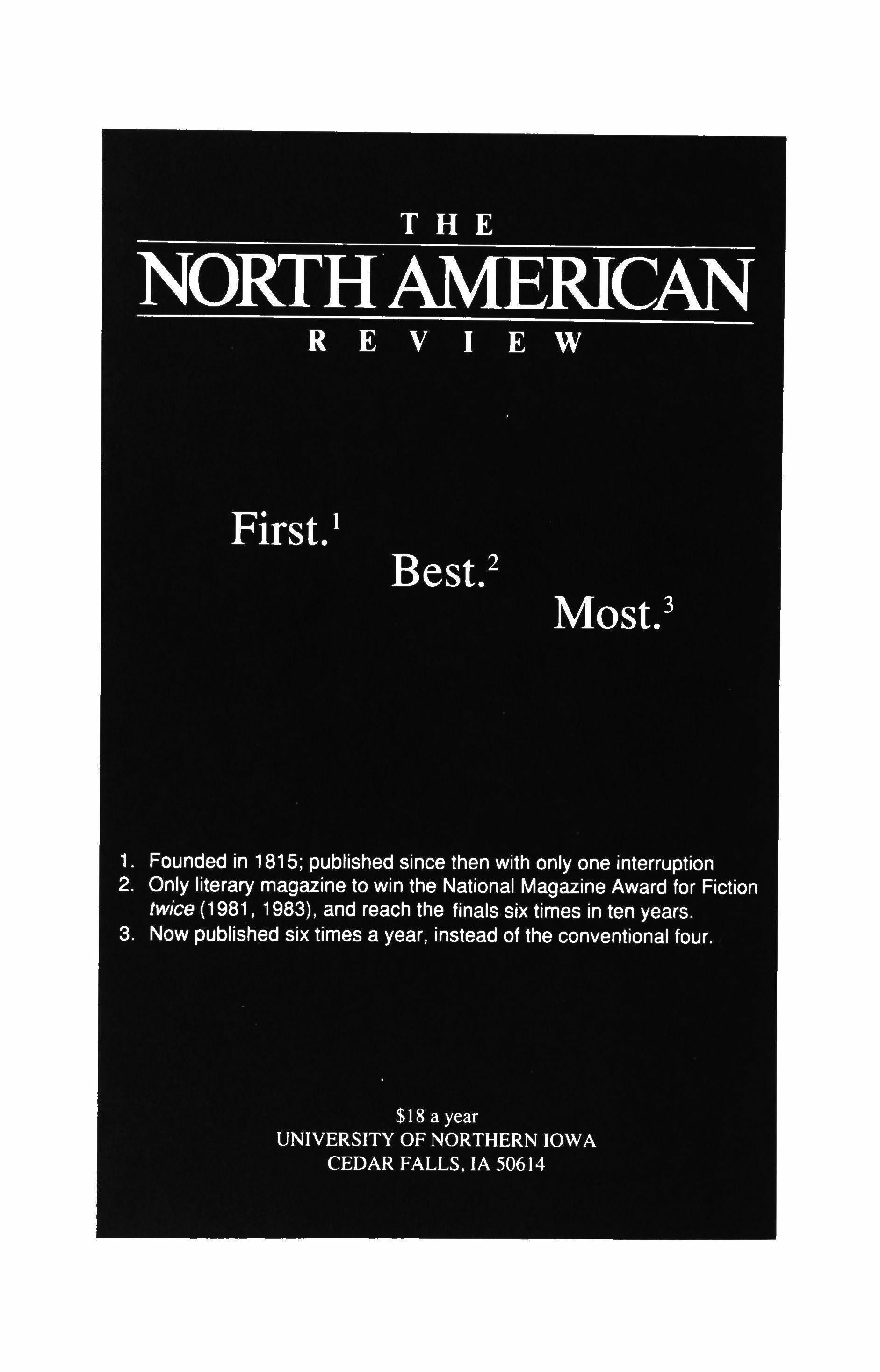
Featuring work by:
Alice
Adams
John Ashbery
Madison Smartt Bell
Amy Clampitt Tom Disch
Marilyn Hacker
Donald Hall
Phillip Lopate
Clarence Major David Mamet
Joyce Carol Oates
Francine Prose
Isaac Bashevis Singer
Gilbert Sorrentino
Elizabeth Spencer
John Updike Peter Viereck

BOULEVARD
"One of the best literary magazines in America" The Philadelphia Inquirer
"Among scores of literary titles, one of the most innovative is Boulevard." Library Journal
"Boulevard is the kind of magazine that publishes not just good fiction and poetry but works of compelling fact." The Washington Post
"Boulevard is what a literary magazine should be." Literary Milgazine Review
"A literary delight. A treasure trove." USA Today
"This is a consistently outstanding publication, perhaps the best of the recently founded literary reviews." Magazines for Libraries
Subscribe now at these special prices!
Three issues $12 Six issues $20 Nine issues $25 For subscription outside the U.S., add $3.00.
NAME
ADDRESS
CI1YISTATE/Zll' CODE
Make checks payable to Opojaz, Inc. c/o Richard Burgin, P.O. Box 30386, Phila., Pa 19103
THE AMERICAN VOICE

"Elegant,fearless, andstunning JJ
-A READER
RECENT CONTRIBUTORS to THE AMERICAN VOICE include Isabel Allende, Maya Angelou, Wendell Berry, Jorge Luis Borges, Kay Boyle, Olga Broumas, Ernesto Cardenal, Wanda Coleman, Sharon Doubiago, Andrea Dworkin, Louise Erdrich, Harrop Freeman, Eduardo Galeano, Susan Griffin, Doris Grumbach, Linda Hogan, Li-Young Lee, Honor Moore, Robin Morgan, Fae Myenne Ng, Marge Piercy, Chaim Potok, Margaret Randall, Bienvenido Santos, LilyTuck,Jean Valentine, Apple Vail.
"Being independent... away from the centers ofpublishing power and the received ideas of what to publish, The American Voice is an important magazine. JJ
-MICHAEL MARTONE, LiteraryMagazine Review
SALLIE BINGHAM, Publisher FREDERICK SMOCK, Editor
MICHELLE CLIFF, MARGUERITE FEITIOWITZ and BARBARA SMI11I, Contributing Editors
Available at fine bookstores, or bysubscription, $15
The American Voice 332 W. Broadway #1215· Louisville KY 40202
FICTION,
POETRY, ESSAYS SINCE 1947

Published three times per year. Sample copy $5.00. One year subscription $11.00. Available from 251 Goldwin Smith Hall, Cornell University, Ithaca, NY 14853
EPOCH
Painting, "Monument with Kerbstones," 1991 by Camille Ward. Oil on paper 14" x 16"
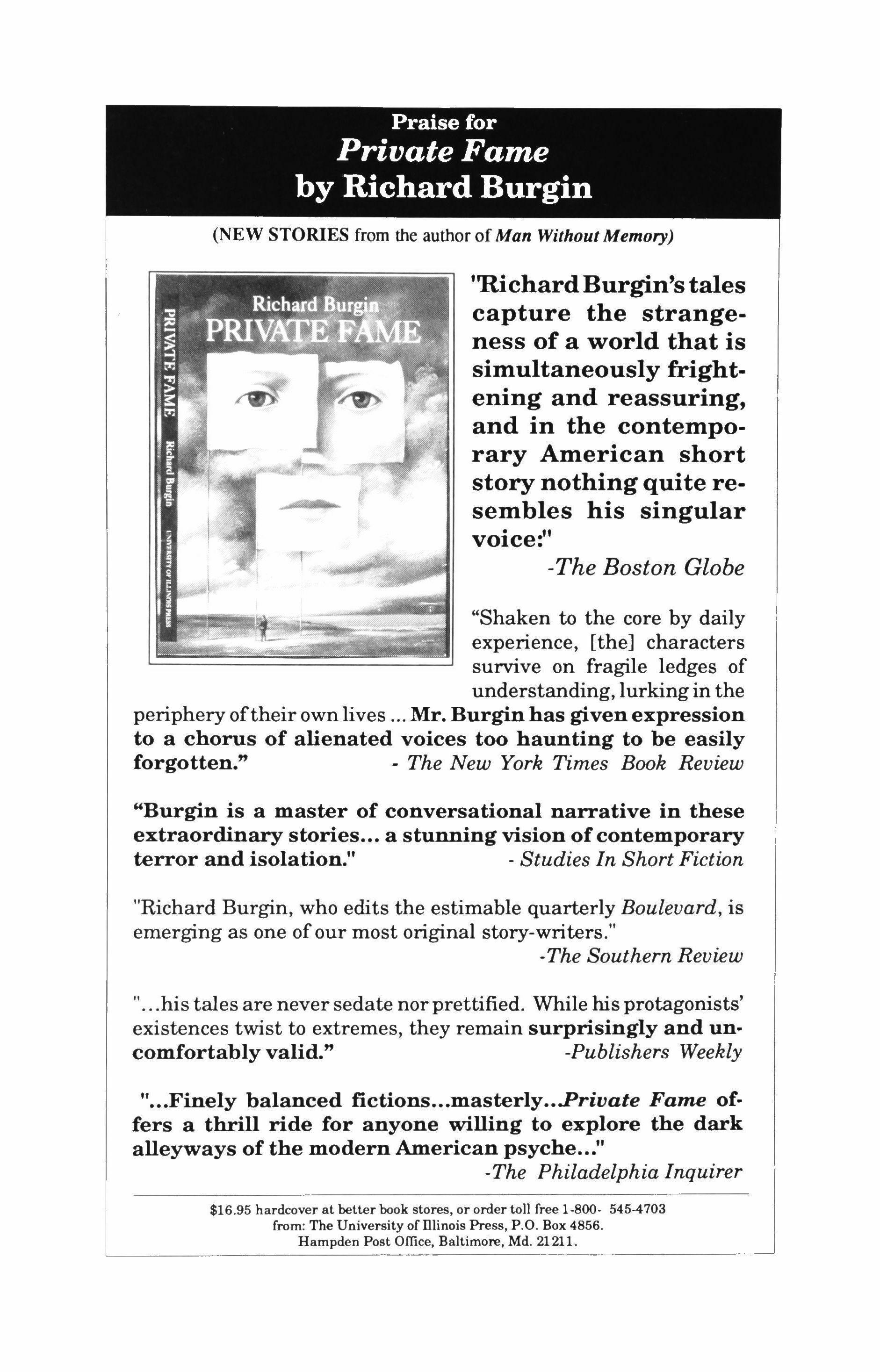
Praise for Private Fame
by Richard Burgin
(NEW STORIES from the author of Man Without Memory)
"RichardBurgin's tales capture the strangeness of a world that is simultaneously frightening and reassuring, and in the contemporary American short story nothing quite resembles his singular voice:"
- The Boston Globe
"Shaken to the core by daily experience, [the] characters survive on fragile ledges of understanding, lurking in the periphery oftheir own lives Mr. Burgin has givenexpression to a chorus of alienated voices too haunting to be easily forgotten."
- The New York Times Book Review
"Burgin is a master of conversational narrative in these extraordinary stories a stunning vision of contemporary terror and isolation." - Studies In Short Fiction
"Richard Burgin, who edits the estimable quarterly Boulevard, is emerging as one of our most original story-writers."
- The Southern Review
his tales are never sedate nor prettified. While his protagonists' existences twist to extremes, they remain surprisingly and uncomfortably valid." -Publishers Weekly
Finely balanced tictions masterly .Private Fame offers a thrill ride for anyone willing to explore the dark alleyways of the modern American psyche " -The Philadelphia Inquirer
j
$16.95 hardcover at better book stores, or order toll free 1-800· 545-4703 from: The University oflllinois Press, P.O. Box 4856. Hampden Post Office, Baltimore, Md. 21211.
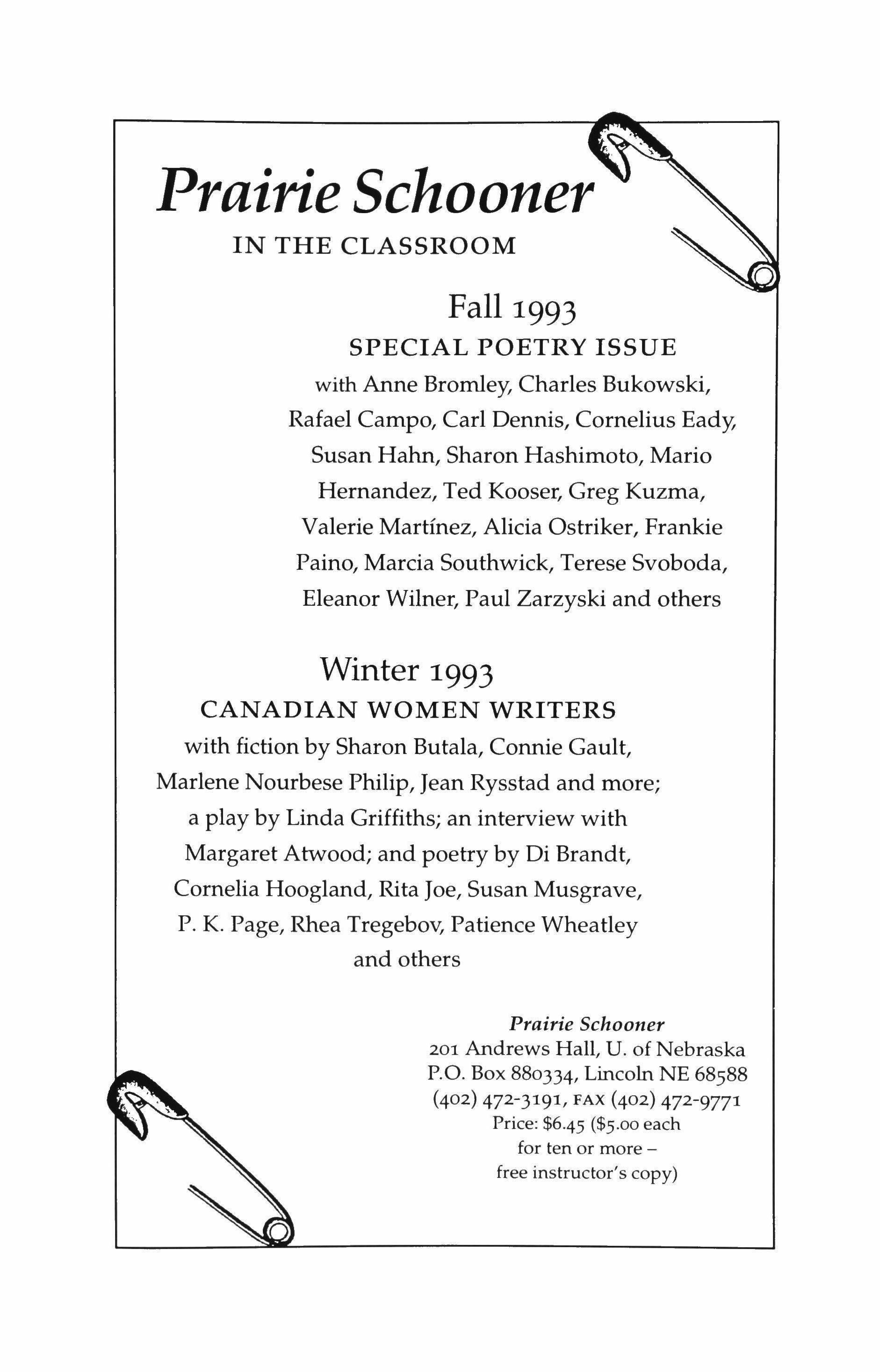
Prairie Schooner
IN THE CLASSROOM
Fall 1993
SPECIAL POETRY ISSUE
with Anne Bromley, Charles Bukowski, Rafael Campo, Carl Dennis, Cornelius Eady, Susan Hahn, Sharon Hashimoto, Mario
Hernandez, Ted Kooser, Greg Kuzma, Valerie Martinez, Alicia Ostriker, Frankie
Paino, Marcia Southwick, Terese Svoboda, Eleanor Wilner, Paul Zarzyski and others
Winter 1993
CANADIAN WOMEN WRITERS
with fiction by Sharon Butala, Connie Gault, Marlene Nourbese Philip, Jean Rysstad and more; a play by Linda Griffiths; an interview with Margaret Atwood; and poetry by Di Brandt, Cornelia Hoogland, Rita Joe, Susan Musgrave, P. K. Page, Rhea Tregebov, Patience Wheatley and others
Prairie Schooner
201 Andrews Hall, U. of Nebraska
P.O. Box 880334, Lincoln NE 68588 (402) 472-3191, FAX (402) 472-9771
Price: $6.45 ($5.00 each for ten or morefree instructor's copy)
SHENANDOAH
THE WASHINGTON AND LEE UNIVERSITY REVIEW
rock solid deserves its good reputation." Literary Magazine Review
Betty Adcock
Neal Bowers
Frederick Busch
Henry Carlile
Philip Dacey
Brendan Galvin
Susan Hahn
Donald Hall
Seamus Heaney
William Hoffman
Andrew Hudgins
x. J. Kennedy
Nanci Kincaid
Kathy Mangan
William Matthews
Heather Ross Miller
Robert Morgan
Robert Pack
Janet Peery
Richard Russo
Lisa Sandlin
Robert B. Shaw
Jeanne Murray Walker
Robert Wrigley
"The best literary magazines have always endeavored to discover, accommodate, and sustain good writing Shenandoah does all three." Booklist
SHENANDOAH, Box 722, Lexington, Virginia 24450
Name
Addre�
City, State, Zip
Single issue: 53.50
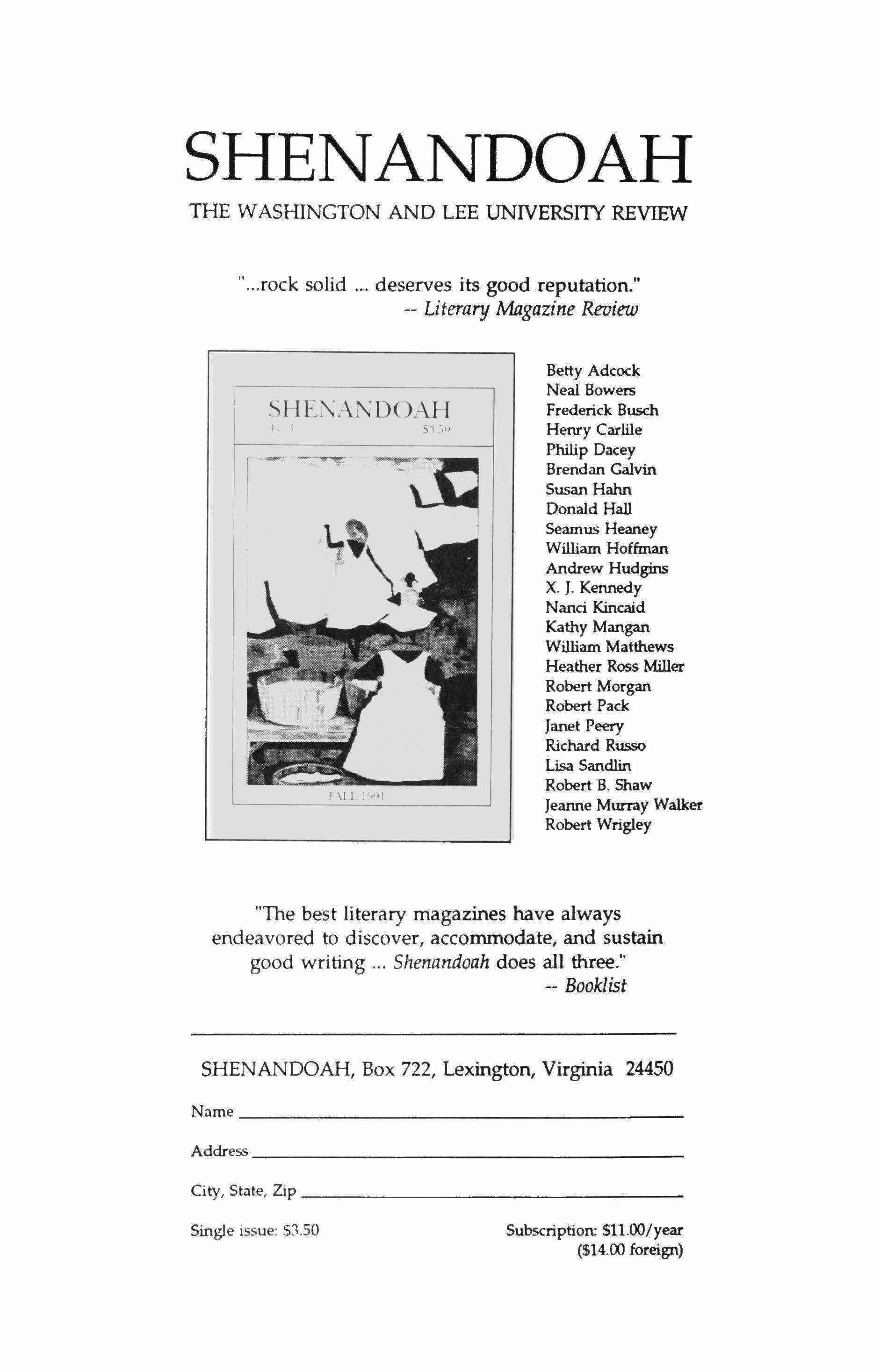
Subscription: SU.OO/year ($14.00 foreign)
F \1 I 111\11

ZYZZYVA
puts West Coast writers on the map
Bill
Bcnmn Bill II<!kson Lucia BeIIi.n
Dougbs Bullil
ThOllW Chnllenlcn Tom CIaJk Anlhony Cbrvoe
CoIenw. Gillian Conoley Dennil Cooper Alfml Coppd Peler Coyote Alev Lytle Crolllitr Beverly
Dahltn John Daniel Miclud Davidion Jean Day Denioe Dee Gmt Dennio W.s. 0. Picro Cnig L. 0.11
William Dickey Sharon Doubiago Alan Dunda Stephen £mellOn George Evw Lawrtllce Fcrlingh:tti
MF.K. l'ilher CI.udi1 Stillman Fnnb Lynn Freed Judilh Freenun Jomua Freiwald Benl'.min Friedhnd Glori, Frym Blair Fuller G.G. Gach Tess Gillagher Abnm George: Amy Gentler Martlu Gies Bmy Giffonl Molly Giles am: Girard Robert GlUck ClwIes Sbelby Goerlitz Rocky G6mtt Guillermo Gomez·Pel, Jill Gonet Charies Goodrich Philip KID Gourula Judy Grahn Samuel Green Richanl Grolling Thom Gum John Haines Sam Hamill JOlCph HanIcn am. Hudman K,1harine Harer D,vid I-hrN Carla Huryuun Robert H...
Robert Hault Floile Klcin Healy Lyo Hejiniln Dale lind Jamea Herndon Juan Fc�pc H= Jim Heynen Brenda Hillnun Jane Hillhficld Gam:n Hongo Jamea D. Houston Fanny Howe Andrew Hoycm In. S. 0mni1 Joyce
Jcnkim BudJohm Chuleo Johnmn Alice J Joe Kane Karen Kubo Larry K<m><y Lawrence Ked SUWI Kennedy
Stephen Kessler MllP" Kesler Kevin Killian Myung Mi Kim Carolyn Kim FAward KleinIchmidt AugUit
Khmahler Peler Koch Arnold KotlerJohn Krich JlDICI Krwoe C.H Kwock John L'HewtUX s.Intore La Puma
P� Lamanti, Daniel J. LangtonJeremy Lamor CllOlyn I.w Dorianno Laux Larbi Layachi UIIUh LeGuin JacqucI
Lalie Dease Leverto. David Levi StnUII Pbilip Levine
Genny Lim Leo litw>k Smh LiuBmy LDpcz Wmg Tek Lep:ndary W I Coul wrilm Dol jet in ZYZZYVA:
Lum Suoly Lydon N,thanid Mukey Qarence Major Alice Adan David Anlm Jean M fwd Kay Boyle
Devonh Major Tom Mandel William M Mandd Morton T.C.Boy� Rzy BndbJry 0wIcs Buko'Mki EIhan <:min
Mucui Slcfanie MarliI JWc Mmhall VICtor L. M>rllne% fkab Cacn Midud a..bon PI! Gmroy Pete DcxIerJom
Michad McClure Brian McConnick Rutlwme LIDD lkCum DIdion Dim: Di Paima fhnictt Doerr .Join Grq:my
Robert McDowell John McNally Sandra McPhenon Leoawd Dum. W_ Evmon Cazullidd Uccy Foaburg Mazy
Michadi J'UICII Milkr ez..hw Milo",Janice Miri�kani John Gail5kill lmnanl Gardner Wb Gibson Hc:rbcrt Gold
MiIChell Stephen Milehdl Cherrie Mlnp Wrighl Morri. WIlliam Goldmm Bed! GUlcheon Olkley Hall MlaX
Jess Mowry MelilA MytInger Nulu Nafi.l Peler N'juian HdJlin Diane jollllon Ken K"")' Anne LaMott Flb Leoawd N,than Henry No)'C' TIIU Nunrully JlDl<I J. Leffiand Anniste"! Maupan Crn McF.dden Terry
OGndy John O'Keef. Annegrcl Ogden Robert OnOP' McMilbnJelliaMaim!]we Montoya BMo Mukmjec
Mlclud Palmer W�lct Pavhch Dtrtk PtlI N,chola.. Rzy Mqo Kem NIIII1 Diana OHdu TULe Obm
Percll, Robert Pelm Brend, Petmon Wlnnq Otro 'I11IIrus l'y!dmn Jollllhan Rlban Join Kathleen Phelfer Fnna:. Plullipi Cecile Pill..!' Rocby Tom Robbin. Ricbanl Rodriguez Jerome fUrry Polkmhorn Jm Pollack, Randall Potts Rolhcnberg Qville Schell D,vid Slnddo Kim SUffonl
Arthur Qwnn Leroy V. Q\lintuu Carl Mo'" W_ St&nl � � Duidle SteeHag< Stew""
Orb.ndo Ranu Stephen Raldiff: SUWI Rawlins Walbce �AmyTmJoya: Tlnmpm I'bilip WlWen
Adncnne Rich RWI Riviere M.C. Roberts Kit SImy Anne W.Iliam! Aug.1SI WWon � Wong
Robinson Stephen Rodefer Lawrence Rogen
Camille Roy Vern Rutuh K,y Ryan !.on Marie Sampson Elb, SinchCl Riclurd S,unden T,d S,vinar Leslie Scilipino Donald Schenk L,ura Schiff Brenda Din Schildgen RSchiuter Dennil Schmit>: PSchnoidre Fred Schowaller Hart Schulz CllOlyn Sec John T. Sdlwsky Tom SextDn lindsey Shere John Shirley
AllOn Sbunn Ron SillimanJohn Oliver SimDnJWc Skelley Edwud Snullfield Mui SII1lDwDod Martin
Czuz SmiIh Guy Snyder Danid Solomon C,lhy Song Gilbert So tino Guy Soto Albert SperilCll
Marilyn Stablcin T1Il1olhy Steele Lin M Steinman John Steppling Fnnk SIcW2rt Jcs&a Stone Ron
Stnckland Cole Swensen Ehllbeth Tallent Muy TallMounllin Kazwh Tamhashi John
Thoaw Bart Thurber Sallie T1Sdale Stephan Tom: Mike Tuggle John van d Zee
Nance Van WlDckel Victor E. VilWelior Stephen VmcerJ Genld V12Cnour
William T. Vollnun Muy Michael Wagner Mce Walker D,vid Rllns Wallace
Irma Wallem Christopher Wanlcn Burell W,tlen Kathleen We er John V.
Walion John WItte Miduel Wolfe Terry Wolverton John Woodall Tho"", Edwin WoodhoUl< Dwight V,tes fcj Ve Guy Voung
IWhy Mer Opal Palmu Adiu Eld Admn FnnciIW X. AJ.rain Christopher Alwnder Peler Alwnder Shaman Alexit p.w. Gum AlIm II1bd AIlendt Calhym Alpert Michad Amman Don Alber Joe Btnb
Bautista Marvin Bdl Michad
Bdl Dodie
Ste
BWh DiU Bames D,vid Buth lUnuin C.
S.
Bdhmy
Dan Bern Alan
LiA
Gim
Bemheimcr
Bemalein
Bcmault Dum:
Leo
Bn:nner
Brett
Peter
Deborah BNDU
BigEagIe Charies BocadOlU Cum Bloch Bill Bnd.! KriI Bnndenbwger Jamea M B�1um
Bnudy Kale Bnvellll2D SIIIIII!I<I'
Peler
Jamea Broughton
Browning
LDma Dee CemnIa Marilyn Chandler Nedi Cberkovslci Marilyn Chin Eric Chock
Michelle
Clinton
T.
Benj2Jllin E. Colby Wanda
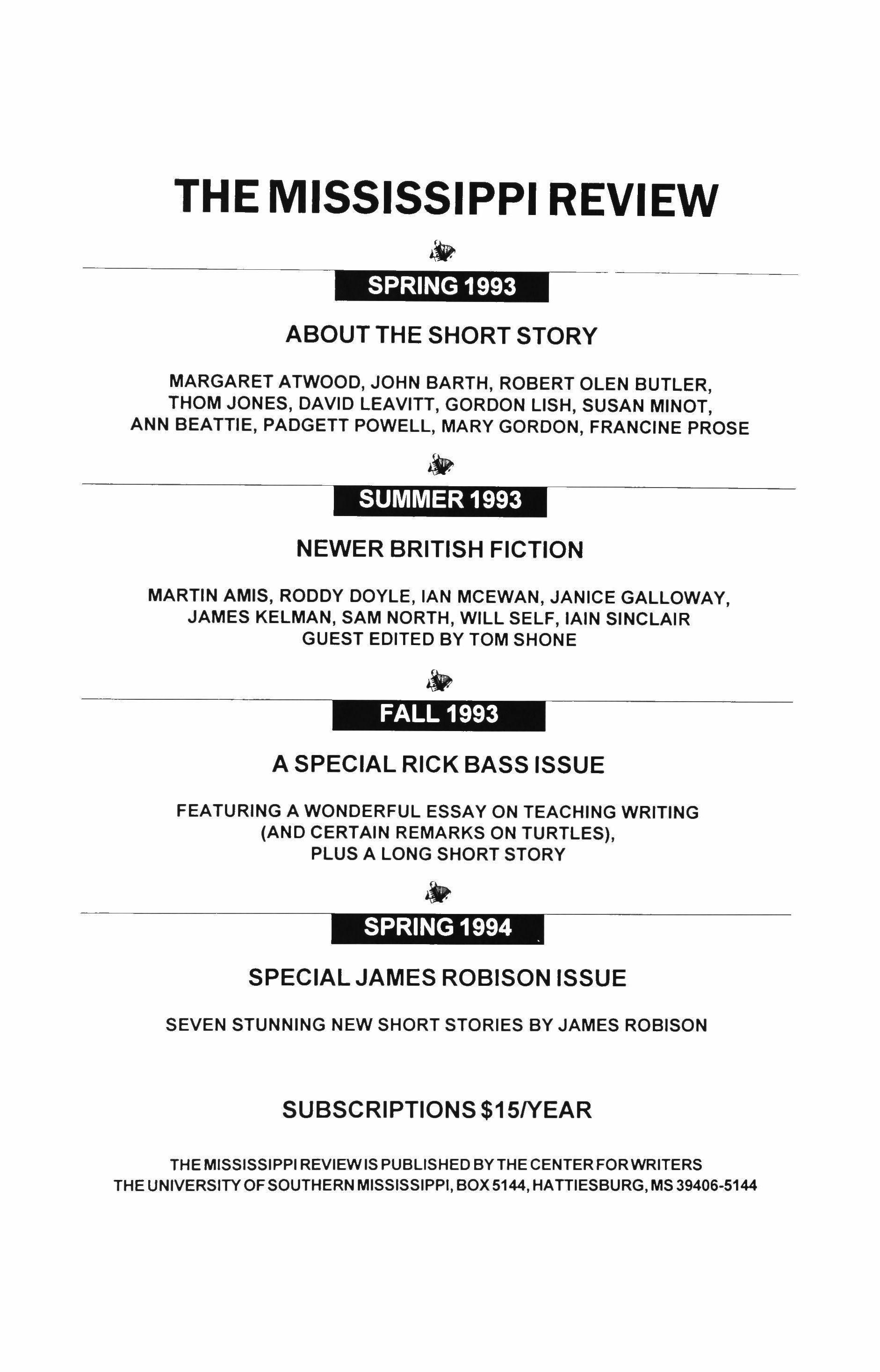
THE MISSISSIPPI REVIEW
ABOUTTHESHORTSTORY
MARGARET ATWOOD, JOHN BARTH, ROBERT OLEN BUTLER, THOM JONES, DAVID LEAVITT, GORDON LlSH, SUSAN MINOT, ANN BEATTIE, PADGETT POWELL, MARY GORDON, FRANCINE PROSE
NEWER BRITISH FICTION
MARTIN AMIS, RODDY DOYLE, IAN MCEWAN, JANICE GALLOWAY, JAMES KELMAN, SAM NORTH, WILL SELF, lAIN SINCLAIR GUEST EDITED BY TOM SHONE
� IIIa:;;)1�'ClVPF
A SPECIAL RICK BASS ISSUE
WONDERFUL ESSAY ON TEACHING WRITING (AND CERTAIN REMARKS ON TURTLES),
A LONG SHORT STORY SPECIAL JAMES ROBISON ISSUE
STUNNING NEW SHORT STORIES BY JAMES ROBISON SUBSCRIPTIONS $15NEAR THE MISSISSIPPI REVIEW IS PUBLISHED BY THE CENTER FORWRITERS THE UNIVERSITY OF SOUTHERN MISSISSIPPI, BOX 5144, HATIIESBURG, MS 39406-5144
FEATURING A
PLUS
SEVEN
MILKWEED EDITIONS
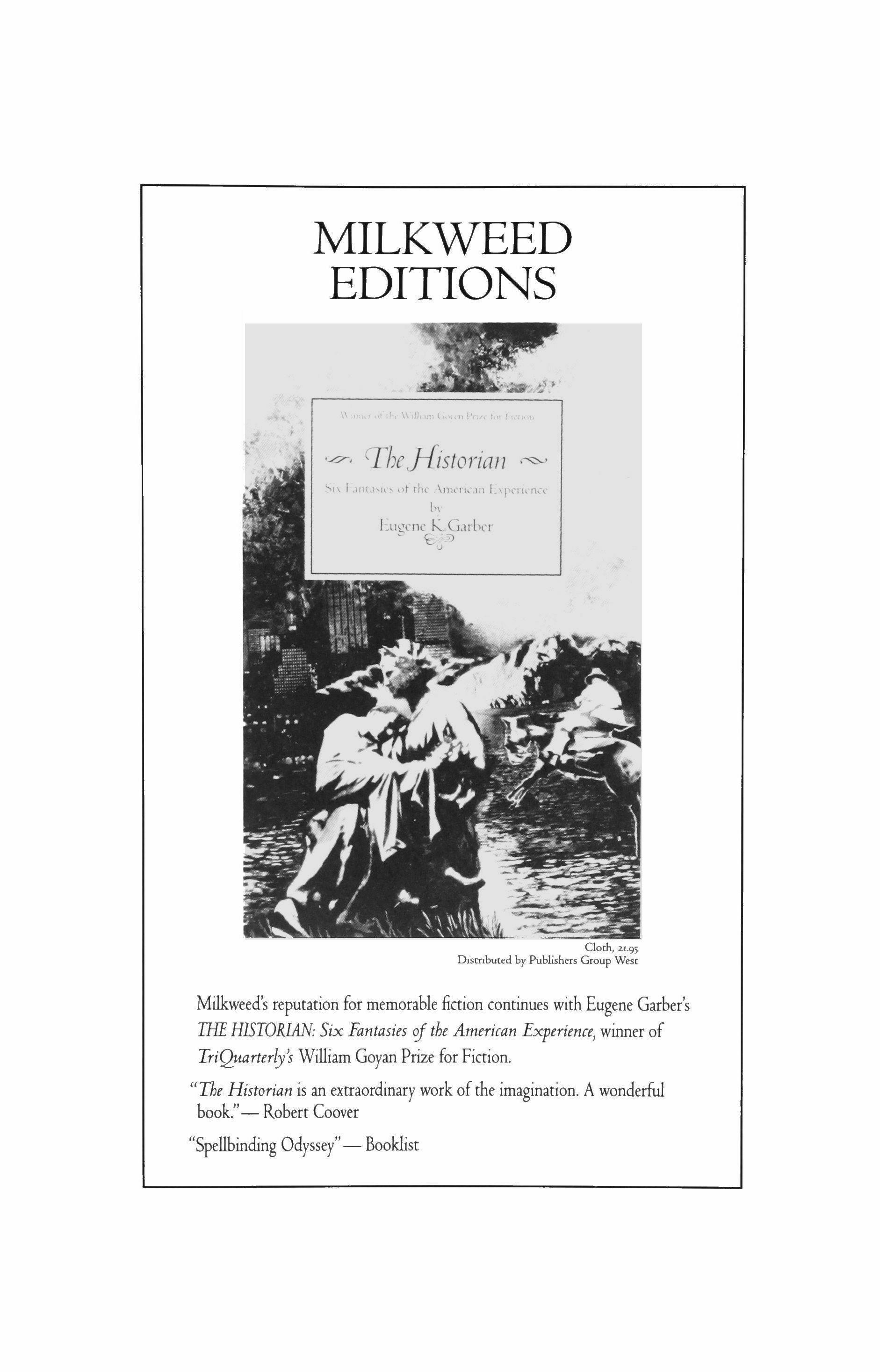
Milkweed's reputation for memorable fiction continues with Eugene Garber's THE HISTORIAN: Six Fantasies 0/ the American Experience, winner of TriQJtarterly's William Goyan Prize for Fiction.
"The Historian is an extraordinary work ofthe imagination. A wonderful book." - Robert Coover
"Spellbinding Odyssey" - Booklist
1\1 iI""l,' ,,!', rrhej{istorzal1 �,
Cloth, 21.95
Disrnbured by Publishers Group West
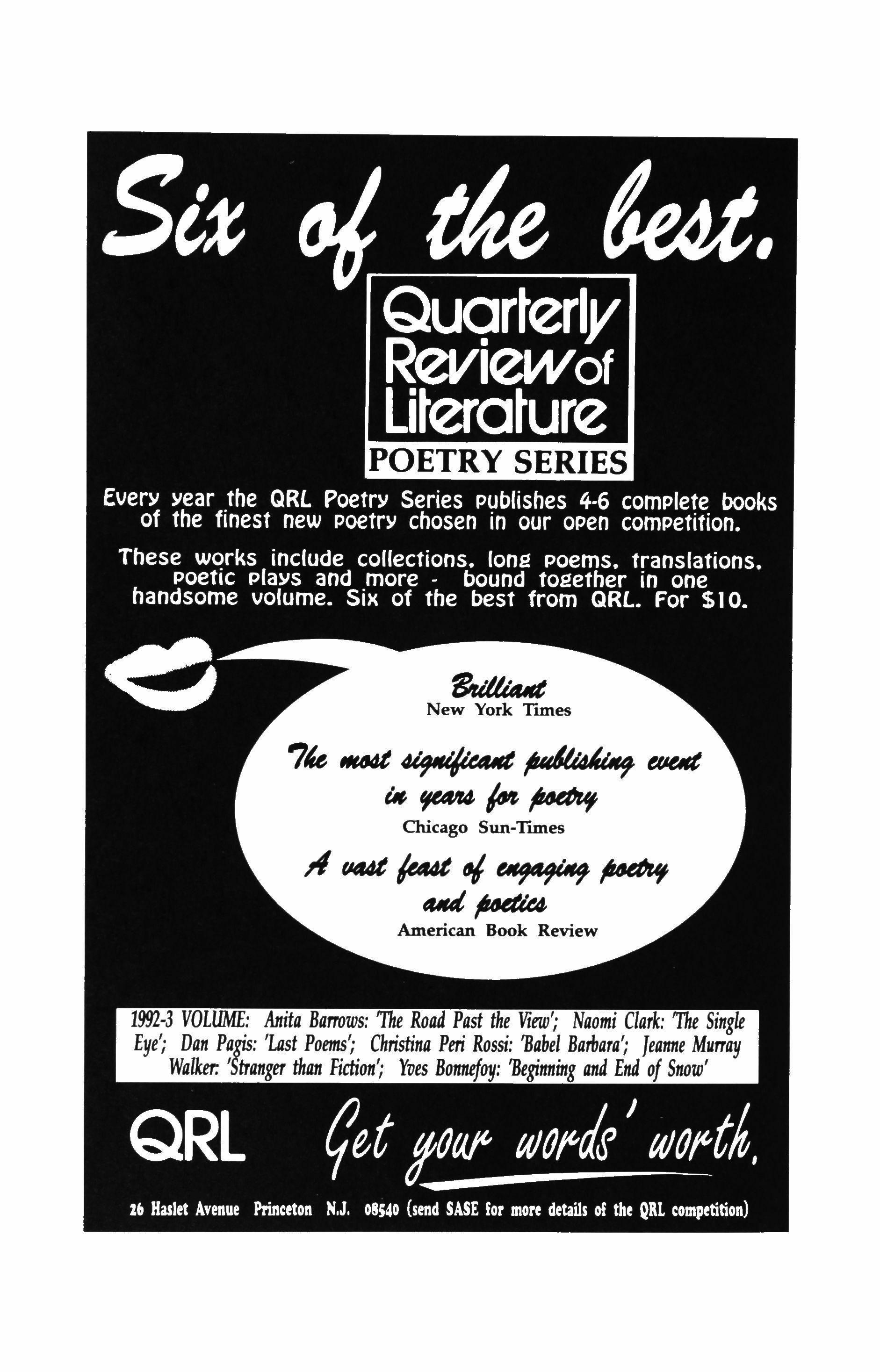
�tIt New York Times 7� IIUJ4t 4�tIt /HI1lI4� etJeIIt '* � 1M fl4dvf Chicago Sun-Times '" fIMt jeMt " �rf,et"'" fl4dvf 4114 fJNfie4 American Book Review
"Fresh news from old geographies "
-Voice Literary Supplement
Meena Alexander
Urmila Banerjee
Vinay Dharwadker
Jayanta Mahapatra
R. Parthasarathy
Satyajit Ray
Gulam mohammed Sheikh
Shashi Tharoor
CHICAGO REVIEW

Agha Shahid Ali
Nabaneeta Dev Sen
Chitra Divakaruni
Rukmini Bhaya Nair
A. K. Ramanujan
Raghuvir Sahay
Kedarnath Singh
Mahadevi Varma
The richness and vitality of contemporary Indian letters has never been so fully represented as in Chicago Review's recent special issue. Designed to convey new developments along with ongoing traditions, the issue brings together the works of fifty-five authors from thirteen different languages.
Chicago Review.
Since 1946, a leading voice in the world of literature.
To order a copy of 38: 1/2, our special issue on contemporary Indian literatures, send a check or money orderfor $7.00 to Chicago Review, 5801 South Kenwood Avenue, Chicago, IL 60637.
CONTEMPORA.RY INDIAN LITERATURES
Where you can still hmr people thinking for themselves
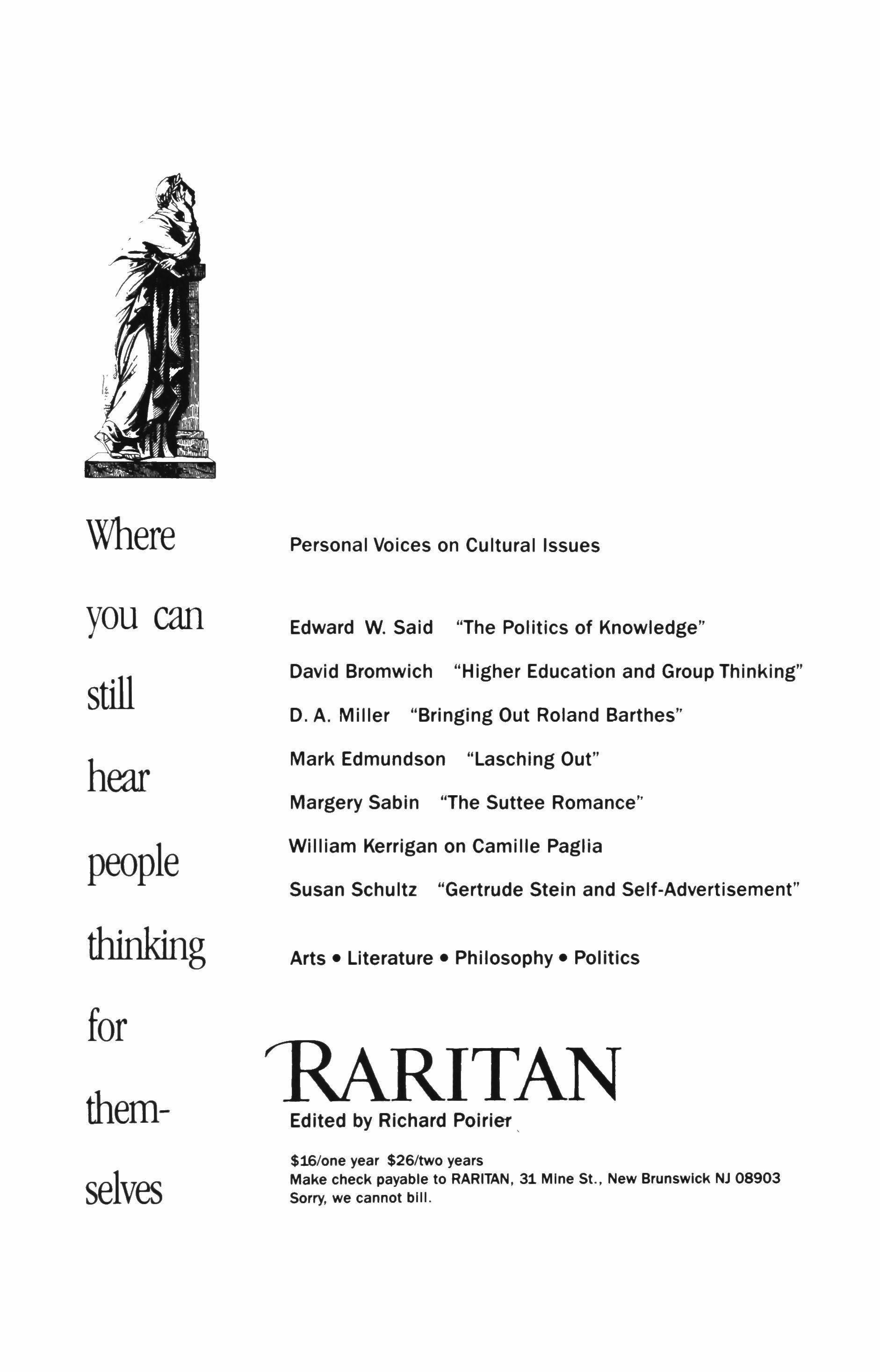
Personal Voices on Cultural Issues
Edward W. Said "The Politics of Knowledge"
David Bromwich "Higher Education and Group Thinking"
D. A. Miller "Bringing Out Roland Barthes"
Mark Edmundson "Lasching Out"
Margery Sabin "The Suttee Romance"
William Kerrigan on Camille Paglia
Susan Schultz "Gertrude Stein and Self-Advertisement"
Arts. Literature • Philosophy. Politics
Edited by Richard Poirier
SiS/one
'RARITAN
RARITAN,
Mine St., New Brunswick NJ 08903
year $26/two years Make check payable to
31
Sorry, we cannot bill.
''Boldand promiscuous" -The
Nation
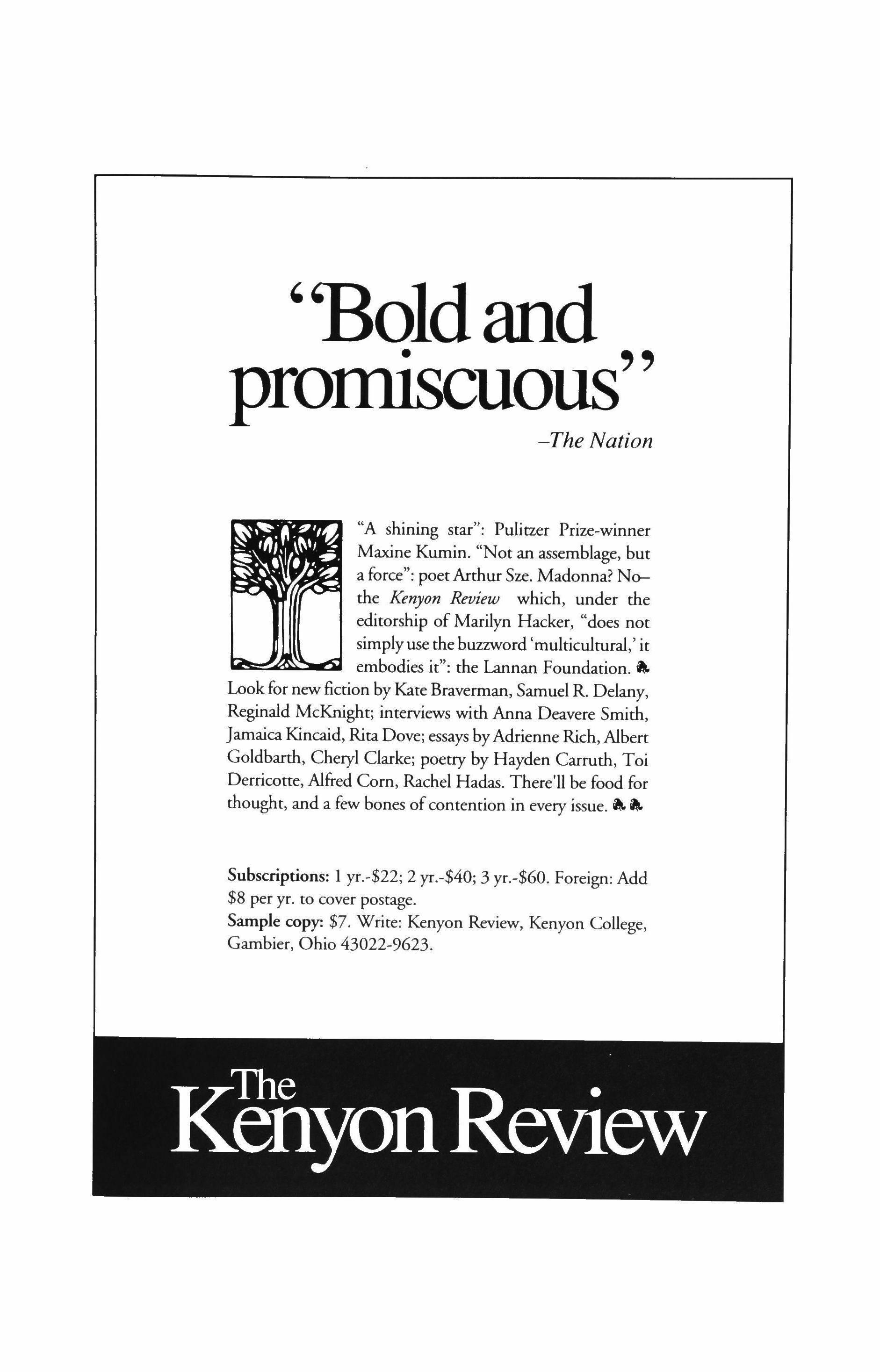
"A shining star": Pulitzer Prize-winner Maxine Kumin. "Not an assemblage, but a force": poetArthur Sze. Madonna? No-the Kenyon Review which, under the editorship of Marilyn Hacker, "does not simply use the buzzword 'multicultural,' it embodies it": the Lannan Foundation. a.
Look for new fiction by Kate Braverman, Samuel R. Delany, Reginald McKnight; interviews with Anna Deavere Smith, Jamaica Kincaid, Rita Dove; essays byAdrienne Rich, Albert Goldbarth, Cheryl Clarke; poetry by Hayden Carruth, Toi Derricorre, Alfred Corn, Rachel Hadas. There'll be food for thought, and a few bones ofcontention in every issue. a. a.
Subscriptions: 1 yr.-$22; 2 yr.-$40; 3 yr.-$60. Foreign: Add $8 per yr. to cover postage.
Sample copy: $7. Write: Kenyon Review, Kenyon College, Gambier, Ohio 43022-9623.
HEAD ON OUT WITH CNCw£tttcrs
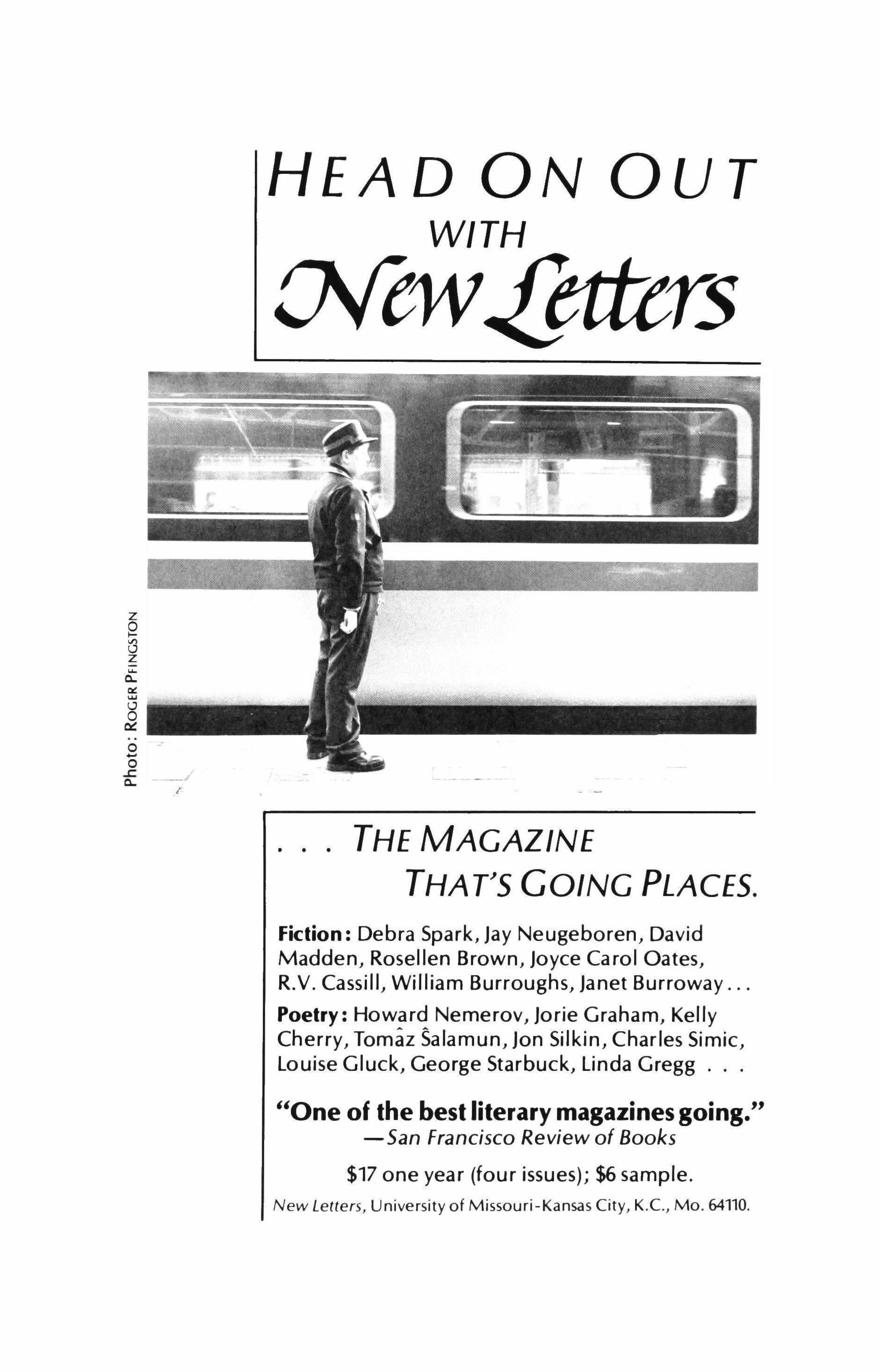
Fiction: Debra Spark, jay Neugeboren, David Madden, Rosellen Brown, joyce Carol Oates, R.V. Cassill, William Burroughs, janet Burroway
Poetry: Howard Nemerov, lorie Graham, Kelly Cherry, Tornaz Salamun, jon Silkin, Charles Simic, Louise Gluck, George Starbuck, Linda Gregg
z e Q Z � '" Q 0 � 0 '0 L 0.. E THE MAGAZINE THAT�S GOING PLACES.
"One of the best literarymagazinesgoing." -San Francisco Review of Books $17 one year (four issues); $6 sample. New Letters, University of Missouri-Kansas City, K.C., Mo. 64110.
THE 1992 1993 PUSHCART PRZE
BEST OFTHE SMALL PRESSES
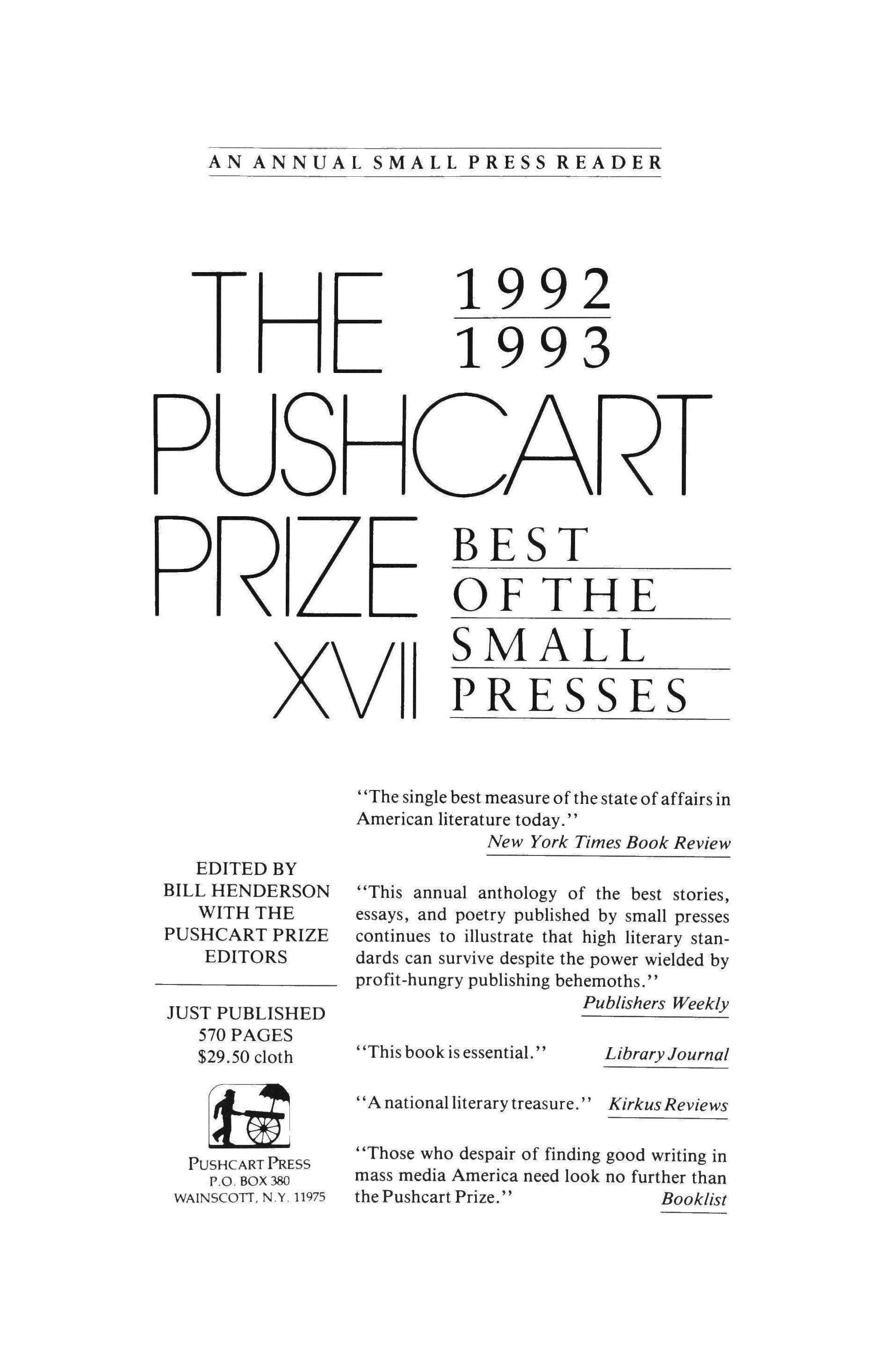
EDITED BY BILL HENDERSON WITH THE PUSHCART PRIZE EDITORS
JUST PUBLISHED 570 PAGES
$29.50 cloth
PUSHCART PRESS
P.O. BOX 380 WAINSCOTT, NY. 11975
"The single best measure of the state ofaffairs in American literature today. New York Times Book Review
"This annual anthology of the best stories, essays, and poetry published by small presses continues to illustrate that high literary standards can survive despite the power wielded by profit-hungry publishing behemoths." Publishers Weekly
"This book is essential." Library Journal
"A national literary treasure." KirkusReviews
"Those who despair of finding good writing in mass media America need look no further than the Pushcart Prize." Booklist
AN
SMALL PRESS READER
ANNUAL
xv
YALE REVIEW
Exploring the broader movements in American culture, The Yale Review has set the standard for nearly a century. Essays, fiction, poetry, and reviews by some of our most thoughtful and provocative writers continue to challenge and delight readers.
Won't you consider becoming one?

ISSN 0044-0124, Published Quarterly
Subscription rates for Volume 81, 1993 of The Yale Review: Individual: r--------------------------------------------------------------,
One year: $21.50 (N America)
Two years: $38.50 (N America)
Three Years: $60.00 (N America)
$32.50 (Overseas)
$60.00 (Overseas)
$87.00 (Overseas)
Name Address City State Zip
Phone PAYMENT: 0 money order 0 check 0 MC 0 Visa 0 Amex Card # Exp.
Signature
Please make checks payable to Blackwell Publishers.
SubTotal In Canada: 7% GST Total Mail to: Journals Dept. Blackwell Publishers 238 Main Street Cambridge, MA 02142 or Call Toll-Free (800) 835-6770
What is THE THREEPENNY REVIEW?
� ITS WRITERS:
John Berger, Paul Bowles, Lars Eighner, Louise Gluck, Nadine Gordimer, Thorn Gunn, Elizabeth Hardwick, Diane Johnson, Tony Kushner, Leonard Michaels, Czeslaw Milosz, Robert Pinsky, Luc Sante, Vikram Seth, Susan Sontag, Amy Tan, Gore Vidal...
� ITS READERS:
"The Threepenny Review continues to be one of the brightest, liveliest, most intelligent and culturally alert journals in the country. It's one of the very few magazines that give one the feeling that there really is a conversation going on in this country about the arts and about ideas. I always read it with pleasure."
-Robert Hass
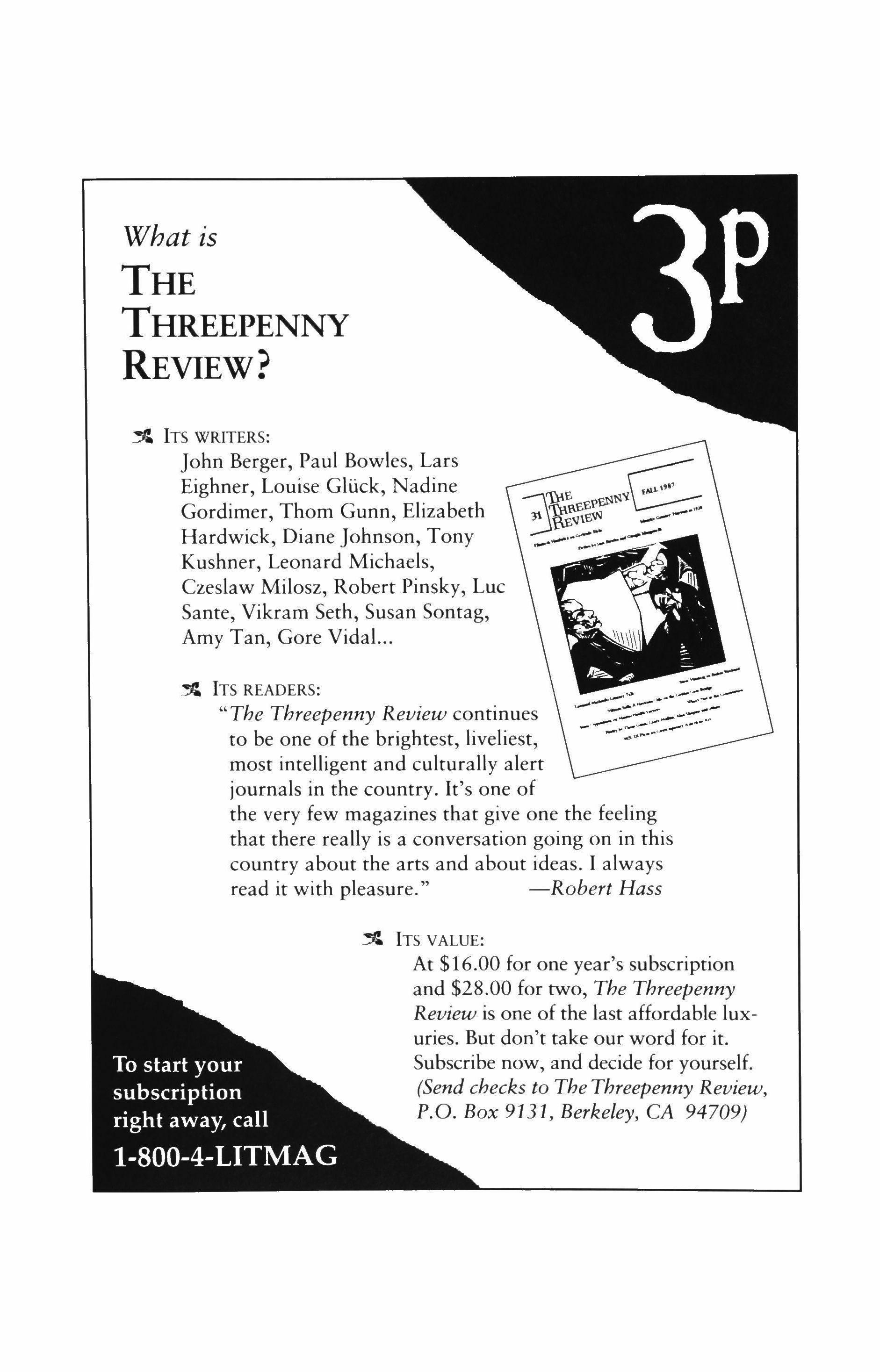
� ITS VALUE:
At $16.00 for one year's subscription and $28.00 for two, The Threepenny Review is one of the last affordable luxuries. But don't take our word for it. Subscribe now, and decide for yourself.
(Send checks to The Threepenny Review, P.O. Box 9131, Berkeley, CA 94709)
To start your subscription right away, call 1-800-4-LITMAG
TriQuarterly thanks the following donors and life subscribers:
David C. Abercrombie
Mr. and Mrs. Walter L. Adams
Amin Alimard
Lois Ames
Richard H. Anderson
Roger Anderson
Sandy Anderson
I. N. C. Aniebo
Anonymous
University of Arizona Poetry Center
Gayle Arnzen
Michael Attas
Asa Baber
Hadassah Baskin
Lee Philip Bell
Tom G. Bell
Sandra Berris
Simon J. Blattner, Jr.
Mr. and Mrs. Andrew K. Block
Carol Bly
Susan DeWitt Bodemer
Kay Bonetti
Robert Boruch
Mr. and Mrs. Richard S. Brennan
Van K. Brock
Gwendolyn Brooks
Timothy Browne
Paul Bundy
Eric O. Cahn
David Cassak
Stephen Chapman
Anthony Chase
Michael Chwe
Willard Cook
Mr. and Mrs. William Cottle
Robert A. Creamer
Andrew Cyr
Doreen Davie
Kenneth Day
Mark W. DeBree
Elizabeth Des Pres
Alan Distler
Anstiss Drake
J. A. Dufresne
Mr. and Mrs. Donald Egan
John B. Elliott
Christopher English
Carol Erickson
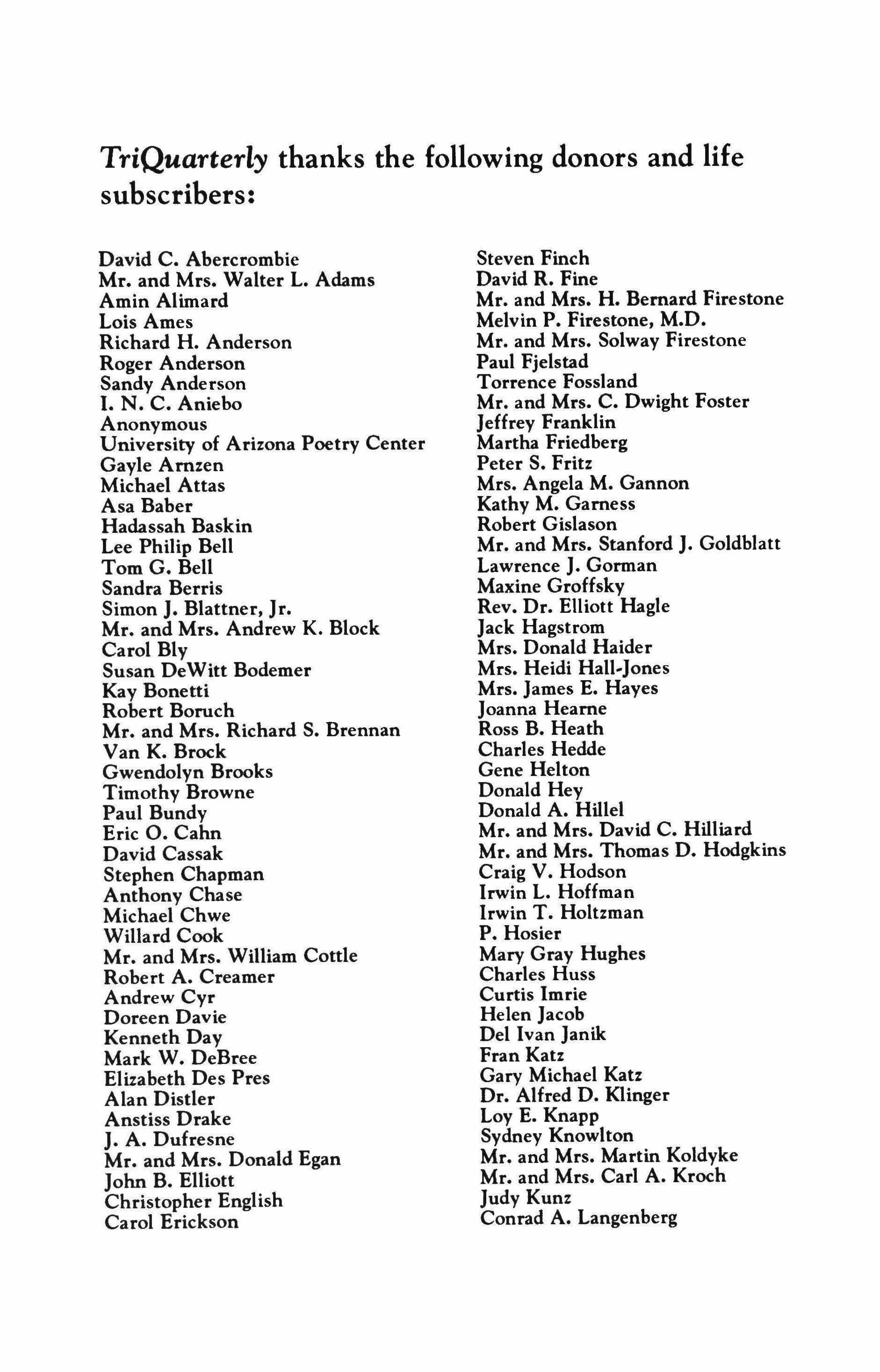
Steven Finch
David R. Fine
Mr. and Mrs. H. Bernard Firestone
Melvin P. Firestone, M.D.
Mr. and Mrs. Solway Firestone
Paul Fjelstad
Torrence Fossland
Mr. and Mrs. C. Dwight Foster
Jeffrey Franklin
Martha Friedberg
Peter S. Fritz
Mrs. Angela M. Gannon
Kathy M. Garness
Robert Gislason
Mr. and Mrs. Stanford J. Goldblatt
Lawrence J. Gorman
Maxine Groffsky
Rev. Dr. Elliott Hagle
Jack Hagstrom
Mrs. Donald Haider
Mrs. Heidi Hall-Jones
Mrs. James E. Hayes
Joanna Hearne
Ross B. Heath
Charles Hedde
Gene Helton
Donald Hey
Donald A. Hillel
Mr. and Mrs. David C. Hilliard
Mr. and Mrs. Thomas D. Hodgkins
Craig V. Hodson
Irwin L. Hoffman
Irwin T. Holtzman
P. Hosier
Mary Gray Hughes
Charles Huss
Curtis Imrie
Helen Jacob
Del Ivan Janik
Fran Katz
Gary Michael Katz
Dr. Alfred D. Klinger
Loy E. Knapp
Sydney Knowlton
Mr. and Mrs. Martin Koldyke
Mr. and Mrs. Carl A. Kroch
Judy Kunz
Conrad A. Langenberg
John Larroquette
Isaac Lassiter
Dorothy Latiak
Elizabeth Leibik
Patrick A. Lezark
Patricia W. Linton
Philip Lister
Mr. and Mrs. W. J. Lorentz de Haas
Kubet Luchterhand
Ellen L. Marks
Richard Marmulstein
James Marquardt
Charles T. Martin, Jr.
Ms. Jane Mayer
Kevin McCanna
Robert D. McChesney
Charles Gene McDaniel
Martin H. McGrath
Robert McMillan
Michael Meaney
George Meredith
Lois Adele Meyer
Cliff Michel Gallery
University of Michigan Hopwood Room
Ralph Miller
Kenneth Monroe
James E. Morrison IV
Max Nathan
Dean Neprud
Fred S. Novy
Paul Peters and Rosemarie Kozdron
Scott Peters
Jane Petro
Mrs. Marlene Welsh Phillips
Evelyn Pine
Doyle Pitman
Fran Podulka
Geraldine R. Pratt
Alex T. Primm
Richard Prinz, M.D.
Honora Rankine-Galloway
Anne Katheryn Ream
J. M. Reese
Peter Reich
Susan Reiners
Don Reynolds
Mary Ellen Reynolds
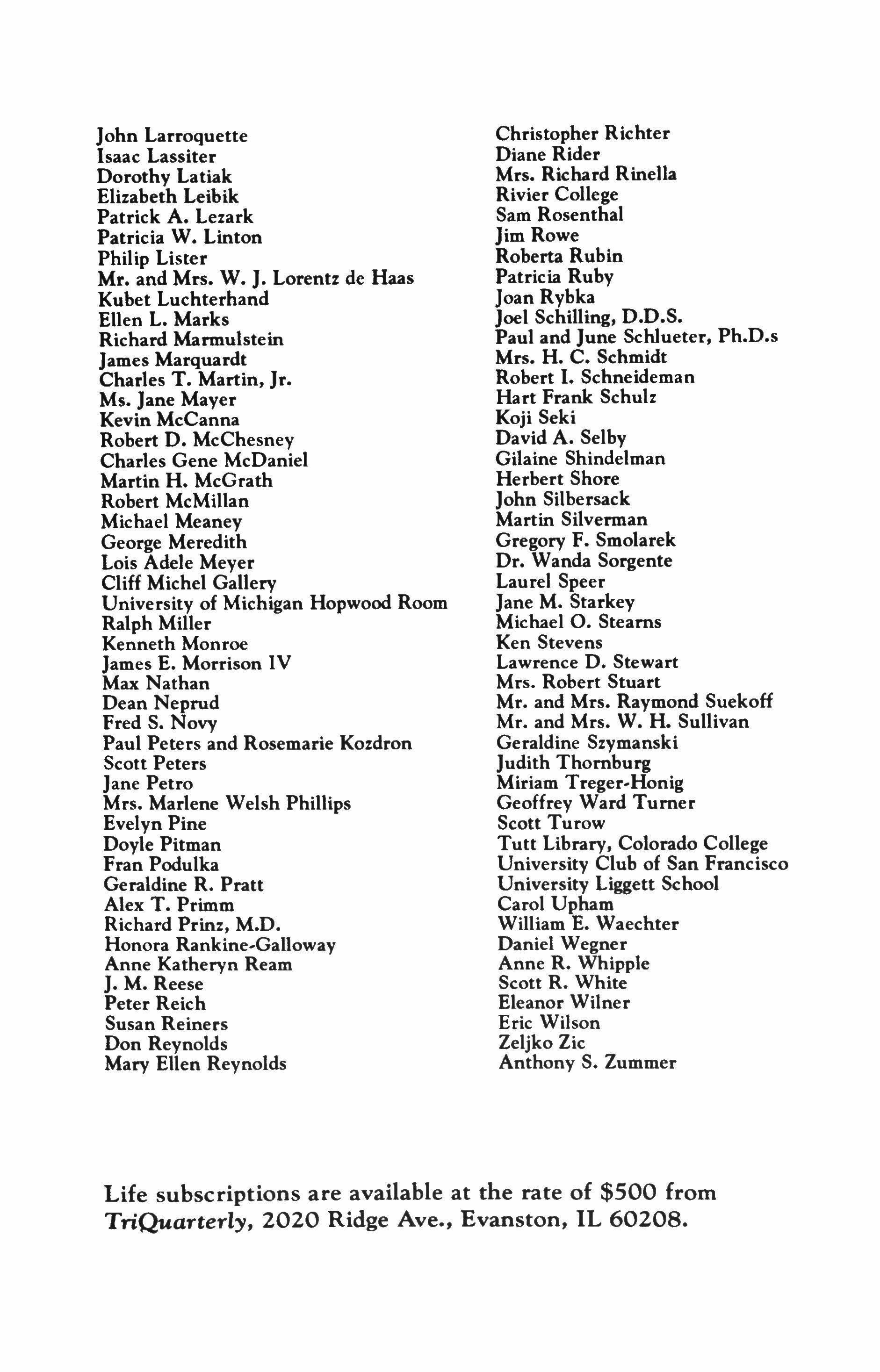
Christopher Richter
Diane Rider
Mrs. Richard Rinella
Rivier College
Sam Rosenthal
Jim Rowe
Roberta Rubin
Patricia Ruby
Joan Rybka
Joel Schilling, D.D.S.
Paul and June Schlueter, Ph.Dis
Mrs. H. C. Schmidt
Robert I. Schneideman
Hart Frank Schulz
Koji Seki
David A. Selby
Gilaine Shindelman
Herbert Shore
John Silbersack
Martin Silverman
Gregory F. Smolarek
Dr. Wanda Sorgente
Laurel Speer
Jane M. Starkey
Michael O. Steams
Ken Stevens
Lawrence D. Stewart
Mrs. Robert Stuart
Mr. and Mrs. Raymond Suekoff
Mr. and Mrs. W. H. Sullivan
Geraldine Szymanski
Judith Thornburg
Miriam Treger-Honig
Geoffrey Ward Turner
Scott Turow
Tutt Library, Colorado College
University Club of San Francisco
University Liggett School
Carol Upham
William E. Waechter
Daniel Wegner
Anne R. Whipple
Scott R. White
Eleanor Wilner
Eric Wilson
leljko lic
Anthony S. lummer
Life subscriptions are available at the rate of $500 from TriQuarterly, 2020 Ridge Ave., Evanston, IL 60208.

Michael Bugeja
Michael Burke
Ralph Burns
Ellen Dudley
Steve Fay
Brooks Haxton
Cynthia Shearer
John Skoyles
Shelly Wagner
Edwin Rolfe (1909-54) and Fred Pfeil on John Berger
� �
� � o 33 74470 79069 ,I TriQuarterly $9.95




























 Translated by Charles Tomlinson
Translated by Charles Tomlinson






 Cave Mouth
Cave Mouth









 Translated by Gilbert Alter-Gilbert
Translated by Gilbert Alter-Gilbert

































































 Medusa by Anthony Frederick Sandys
Medusa by Anthony Frederick Sandys















 Medusa by Caravaggio
Medusa by Caravaggio
































 for Lionel Beukes
for Lionel Beukes






























































































 Mary Kinzie
Mary Kinzie
 Editor: MICHAEL WILKERSON
Editor: MICHAEL WILKERSON





















